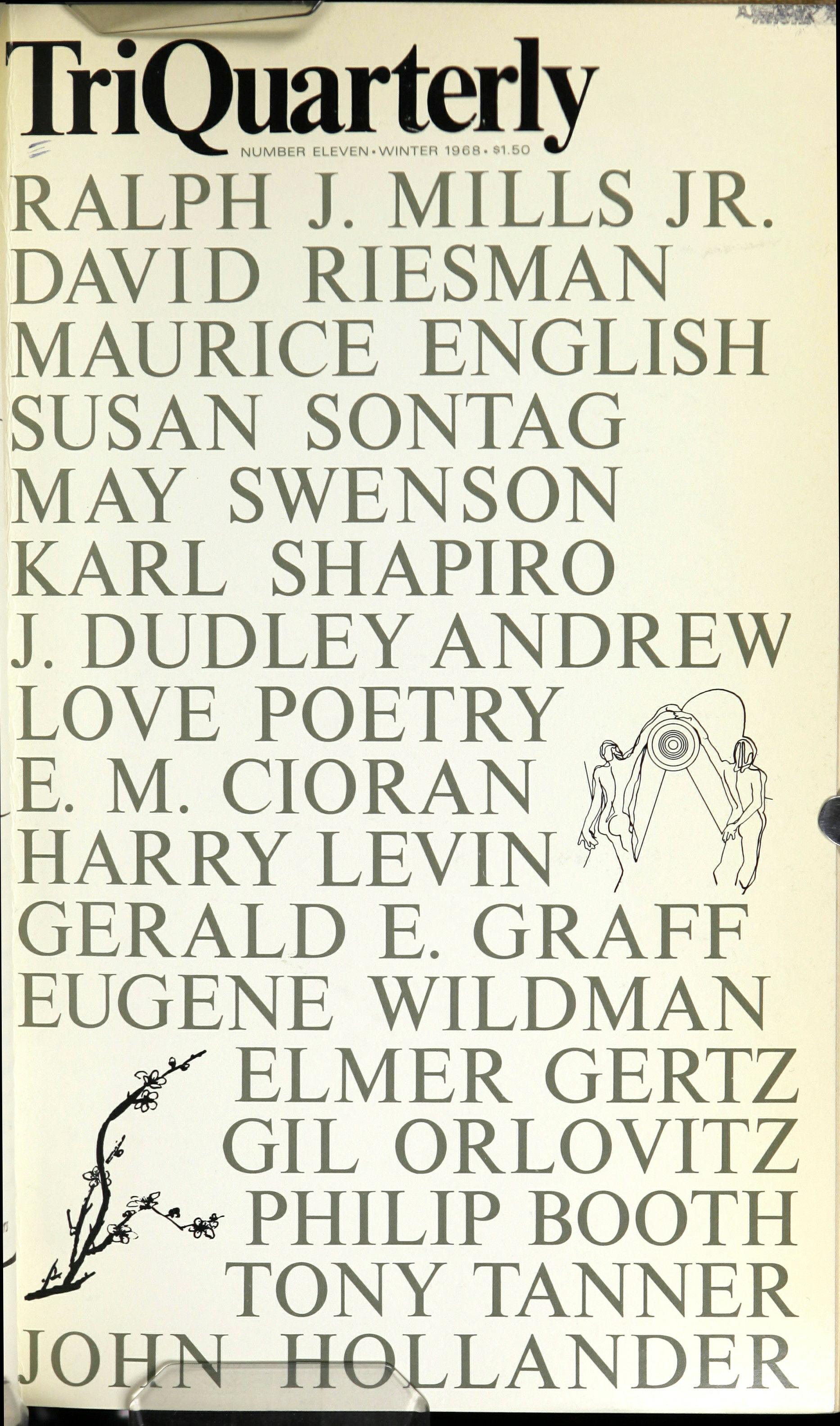
• • -$ NUMBER EL V N· WINTrR I $1 50 • • • •

NUMBER ELEVEN. WINTER 1088
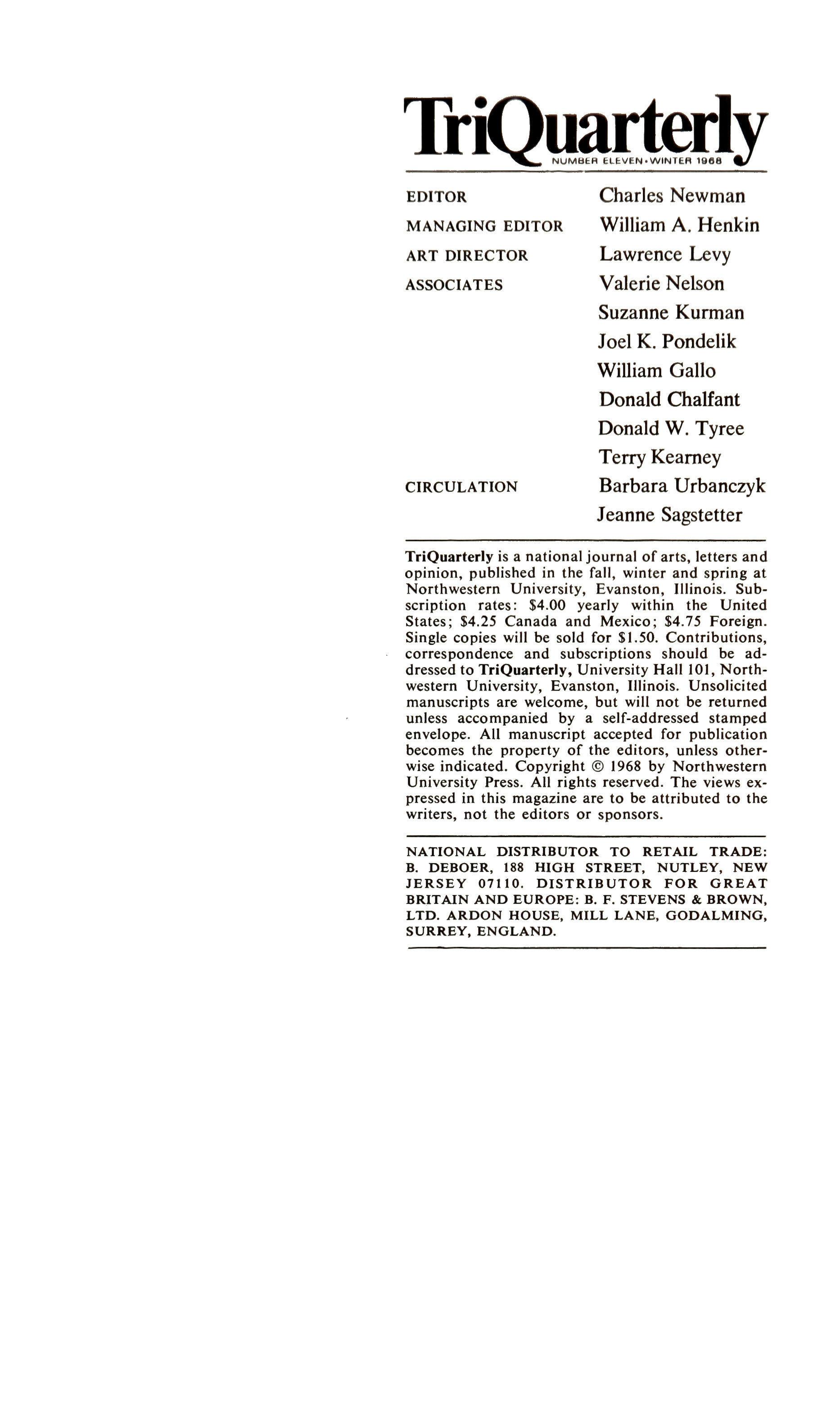
EDITOR
MANAGING EDITOR
ART DIRECTOR
ASSOCIATES
CIRCULATION
Charles Newman
William A. Henkin
Lawrence Levy
Valerie Nelson
Suzanne Kurman
Joel K. Pondelik
William Gallo
Donald Chalfant
Donald W. Tyree
Terry Kearney
Barbara Urbanczyk
Jeanne Sagstetter
TriQuarterly is a national journal of arts, letters and opinion, published in the fall, winter and spring at Northwestern University, Evanston, Illinois. Subscription rates: $4.00 yearly within the United States; $4.25 Canada and Mexico; S4.75 Foreign. Single copies will be sold for SI.50. Contributions, correspondence and subscriptions should be addressed to TriQuarterly, University Hall 101, Northwestern University, Evanston, Illinois. Unsolicited manuscripts are welcome, but will not be returned unless accompanied by a self-addressed stamped envelope. All manuscript accepted for publication becomes the property of the editors, unless otherwise indicated. Copyright © 1968 by Northwestern University Press. All rights reserved. The views expressed in this magazine are to be attributed to the writers, not the editors or sponsors.
NATIONAL DISTRIBUTOR TO RETAIL TRADE: B. DEBOER, 188 HIGH STREET, NUTLEY, NEW JERSEY 07110. DISTRIBUTOR FOR GREAT BRITAIN AND EUROPE: B. F. STEVENS & BROWN, LTD. ARDON HOUSE, MILL LANE, GODALMING, SURREY, ENGLAND.
Cioran
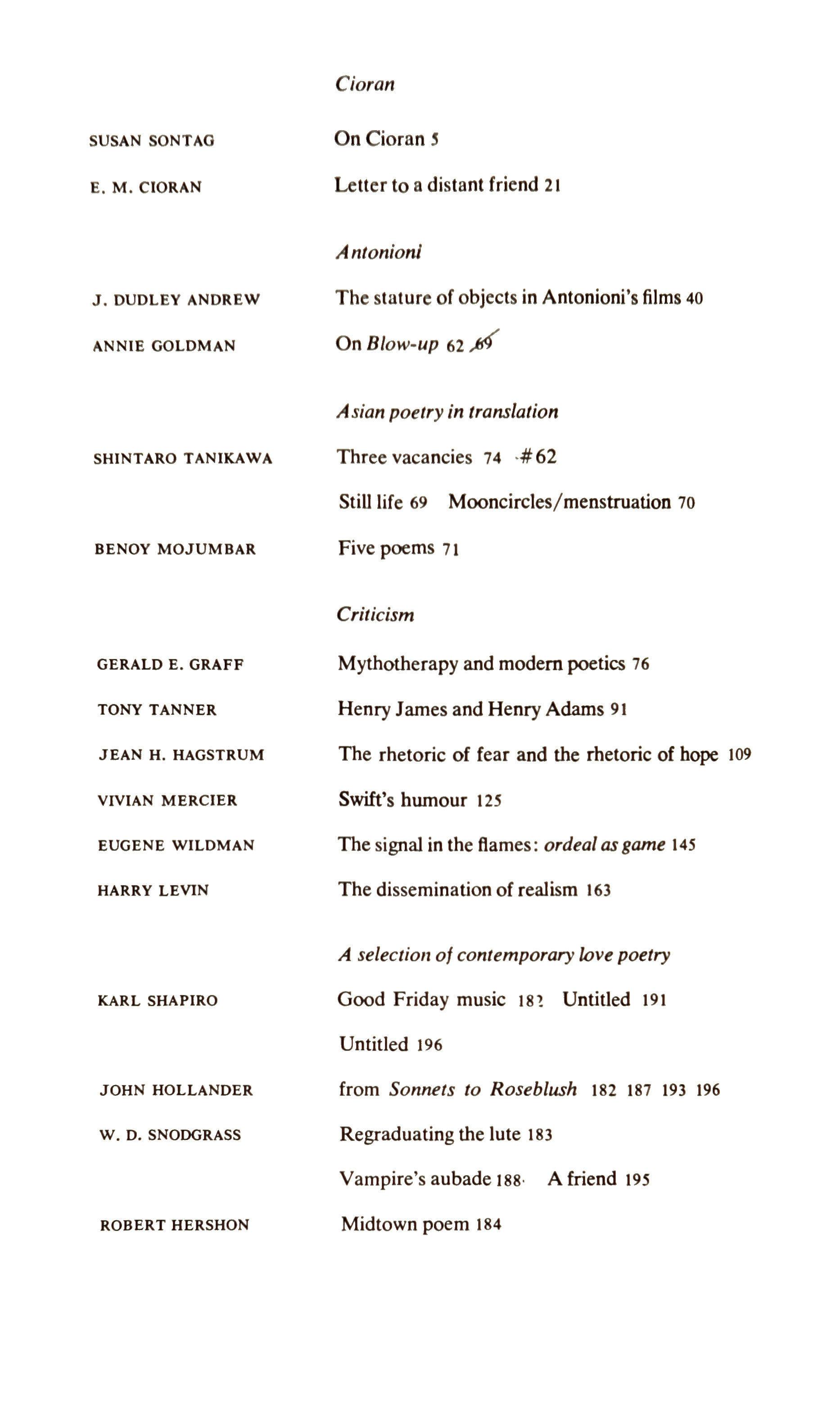
SUSAN SONTAG
E. M. CIORAN
J. DUDLEY ANDREW
ANNIE GOLDMAN
SHINTARO TANIKAWA
BENOY MOJUMBAR
GERALD E. GRAFF
TONY TANNER
JEAN H. HAGSTRUM
VIVIAN MERCIER
EUGENE WILDMAN
HARRY LEVIN
KARL SHAPIRO
JOHN HOLLANDER
W. D. SNODGRASS
ROBERT HERSHON
OnCioran 5
Letter to a distant friend 21
Antoniord
The stature of objects in Antonioni's films 40 On Blow-up 62,JJ(
Asian poetry in translation
Three vacancies 74 -#62
Still life 69 Mooncircles/menstruation 70
Five poems 71
Criticism
Mythotherapy and modem poetics 76
Henry James and Henry Adams 91
The rhetoric of fear and the rhetoric of hope 109
Swift's humour 125
The signal in the flames: ordeal as game 145
The dissemination of realism 163
A selection of contemporary love poetry
Good Friday music 18"! Untitled 191
Untitled 196 from Sonnets to Roseblush 182 187 193 196
Regraduating the lute 183
Vampire's aubade 188· A friend 195
Midtown poem 184
JOHN FREDERICK NIMS
PHILIP BOOTH
MAY SWENSON
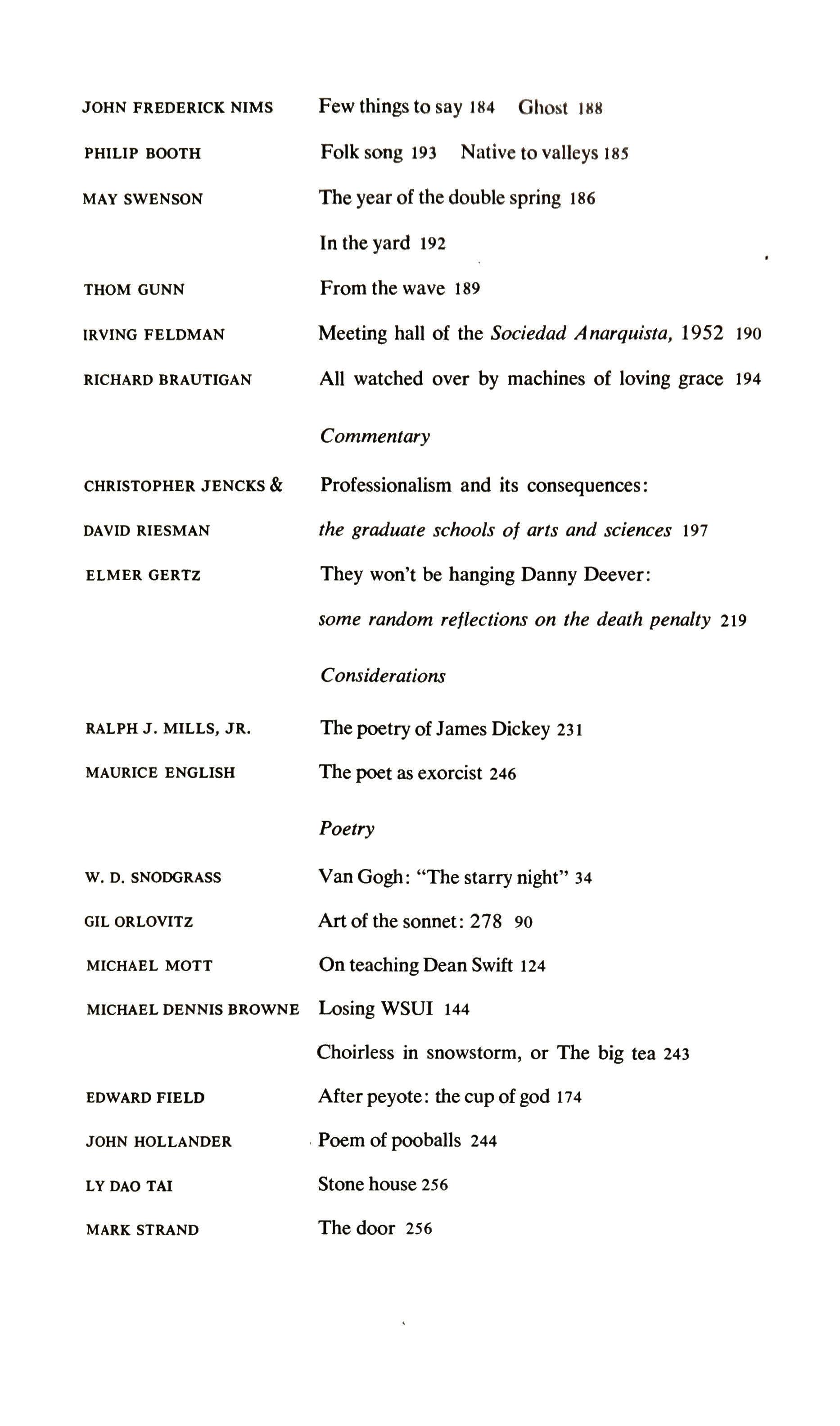
THOM GUNN
IRVING FELDMAN
RICHARD BRAUTIGAN
CHRISTOPHER JENCKS & DAVID RIESMAN
ELMER GERTZ
RALPH J. MILLS, JR.
MAURICE ENGLISH
W. D. SNODGRASS
GIL ORLOVITZ
MICHAEL MOTT
MICHAEL DENNIS BROWNE
Few things to say 184 Ghost JIIII
Folk song 193 Native to valleys 185
The year of the double spring 186
In the yard 192
From the wave 189
Meeting hall of the Sociedad Anarquista, 1952 190
All watched over by machines of loving grace 194
Commentary
Professionalism and its consequences:
the graduate schools of arts and sciences 197
They won't be hanging Danny Deever:
some random reflections on the death penalty 219
Considerations
The poetry of James Dickey 231
The poet as exorcist 246
Poetry
Van Gogh: "The starry night" 34
Art of the sonnet: 278 90
On teaching Dean Swift 124
Losing WSUI 144
Choirless in snowstorm, or The big tea 243
EDWARD FIELD
JOHN HOLLANDER
LY DAO TAl
MARK STRAND
After peyote: the cup of god 174
Poem of pooballs 244
Stone house 256
The door 256
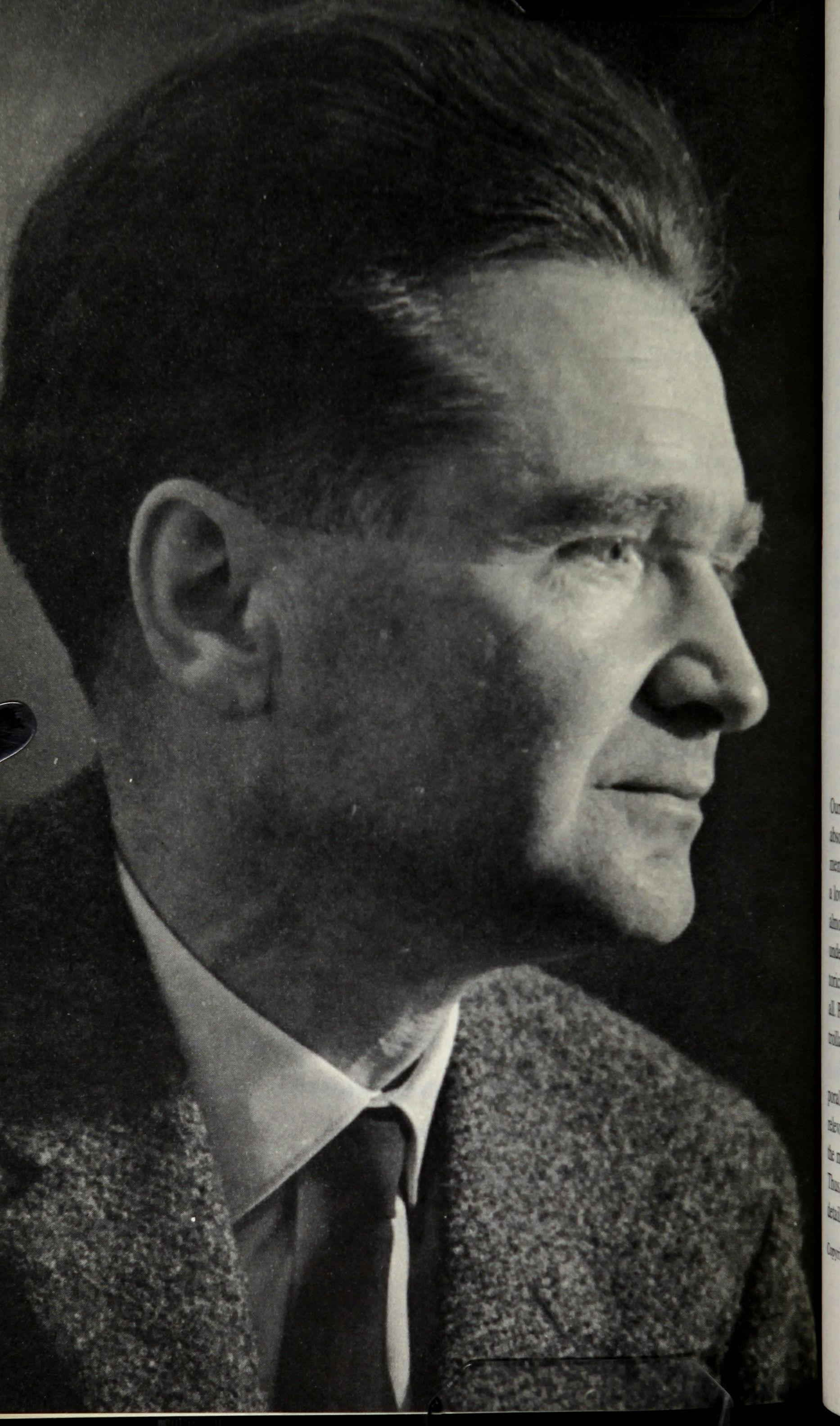
"What is the good of passing from one untenable position to another, of seeking justification always on the same plane?"
-Samuel Beckett
"Every now and then it is possible to have absolutely nothing; the possibility of nothing."
-Ilobn Cage
Ours is a time in which every intellectual or artistic or moral event gets absorbed by a predatory embrace of consciousness: historicizing. Any statement or act can be assessed as a necessarily transient "development" or, on a lower level, belittled as mere "fashion." The human mind possesses now, almost as second nature, a perspective on its own achievements that fatally undermines their value and their claim to truth. For over a century, this historicizing perspective has dominated our ability to understand anything at all. Perhaps once a marginal tic of consciousness, it's now a gigantic, uncontrollable gesture the gesture whereby man indefatigably patronizes himself. We understand something by locating it in a multi-determined temporal continuum. Existence is no more than the precarious attainment of relevance in an intensely mobile flux of past, present, and future. But even the most relevant events carry within them the form of their obsolescence. Thus, a single work is eventually a contribution to a body of work; the details of a life form part of a life-history; an individual life-history is unintel-
Copyright
©
1968 by Susan Sontag
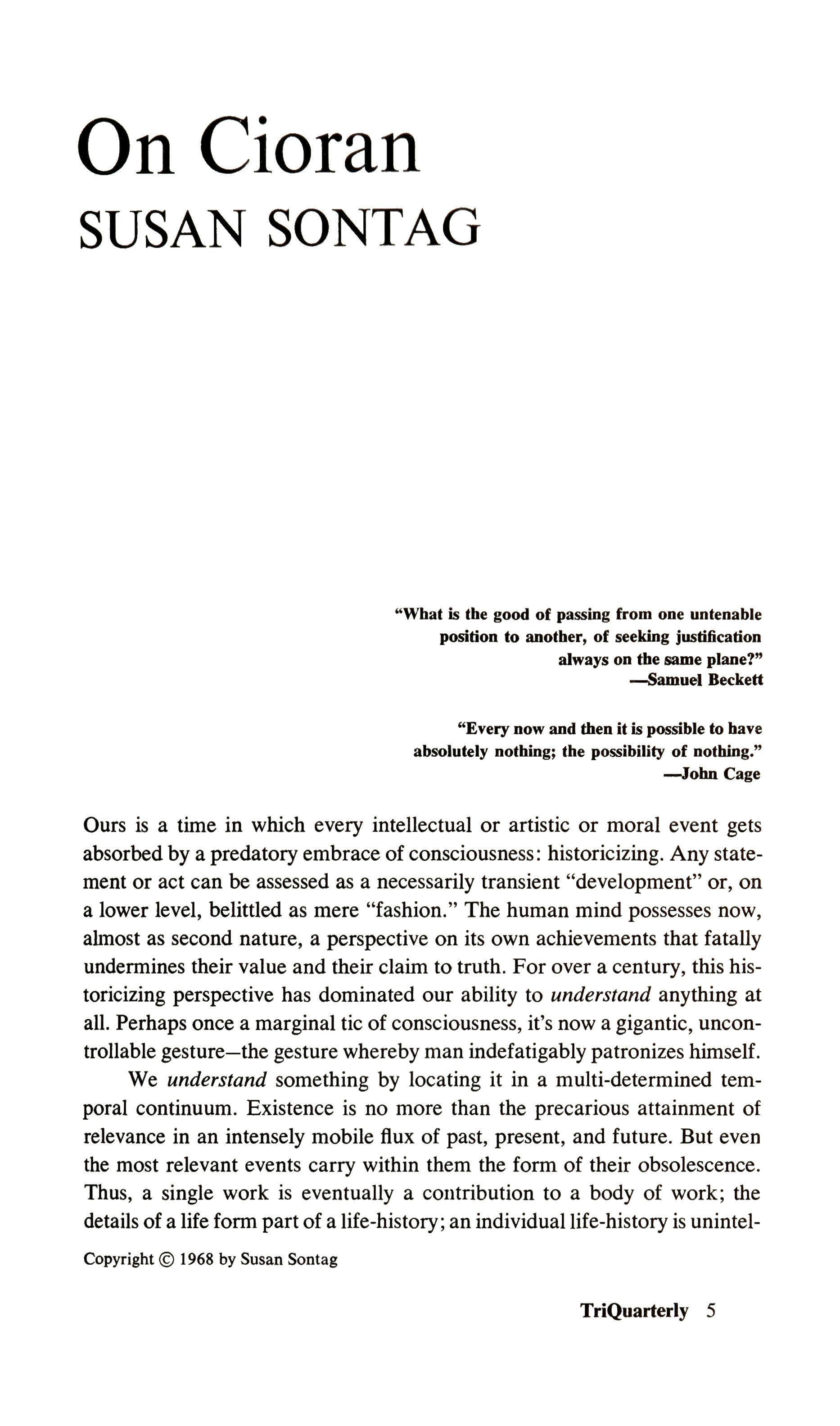
TriQuarterly 5
•
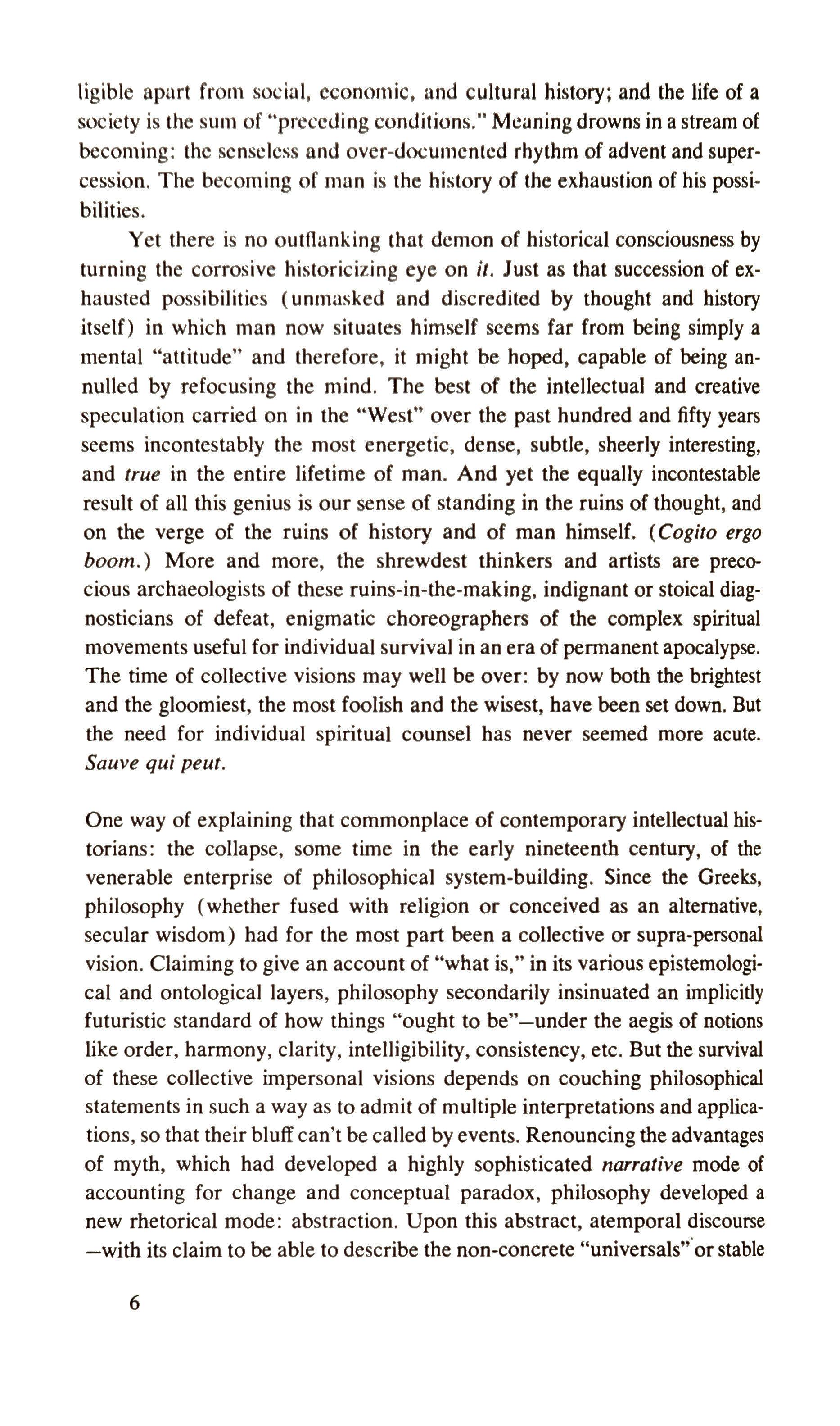
ligible apart from social, economic, and cultural history; and the life of a society is the SUllI of "preceding conditions." Meaning drowns in a stream of becoming: the senseless and over-documented rhythm of advent and supercession. The becoming of man is the history of the exhaustion of his possibilities.
Yet there is no outflanking that demon of historical consciousness by turning the corrosive historicizing eye on it. Just as that succession of exhausted possibilities (unmasked and discredited by thought and history itself) in which man now situates himself seems far from being simply a mental "attitude" and therefore, it might be hoped, capable of being annulled by refocusing the mind. The best of the intellectual and creative speculation carried on in the "West" over the past hundred and fifty years seems incontestably the most energetic, dense, subtle, sheerly interesting, and true in the entire lifetime of man. And yet the equally incontestable result of all this genius is our sense of standing in the ruins of thought, and on the verge of the ruins of history and of man himself. (Cogito ergo boom.) More and more, the shrewdest thinkers and artists are precocious archaeologists of these ruins-in-the-making, indignant or stoical diagnosticians of defeat, enigmatic choreographers of the complex spiritual movements useful for individual survival in an era of permanent apocalypse. The time of collective visions may well be over: by now both the brightest and the gloomiest, the most foolish and the wisest, have been set down. But the need for individual spiritual counsel has never seemed more acute. Sauve qui peut.
One way of explaining that commonplace of contemporary intellectual historians: the collapse, some time in the early nineteenth century, of the venerable enterprise of philosophical system-building. Since the Greeks, philosophy (whether fused with religion or conceived as an alternative, secular wisdom) had for the most part been a collective or supra-personal vision. Claiming to give an account of "what is," in its various epistemological and ontological layers, philosophy secondarily insinuated an implicitly futuristic standard of how things "ought to be" under the aegis of notions like order, harmony, clarity, intelligibility, consistency, etc. But the survival of these collective impersonal visions depends on couching philosophical statements in such a way as to admit of multiple interpretations and applications, so that their bluff can't be called by events. Renouncing the advantages of myth, which had developed a highly sophisticated narrative mode of accounting for change and conceptual paradox, philosophy developed a new rhetorical mode: abstraction. Upon this abstract, atemporal discourse -with its claim to be able to describe the non-concrete "universals" or stable
6

forms that underpin the mutable world the authority of philosophy has always rested. More generally, the very possibility of the objective. formalized visions of Being and of human knowledge proposed by traditional philosophy depends on a particular relation between permanent structures and change in human experience. in which "nature" is the dominant theme and change is recessive. But this relation has been upset permanently? since the era climaxed by the French Revolution, when "history" finally pulled up alongside "nature" and then took the lead.
At the point that "history" usurps "nature" as the decisive framework for human experience, man begins to think historically about his experience and the traditional ahistorical categories of philosophy become hollowed out. The only thinker to meet this awesome challenge head-on was Hegel, who thought he could salvage the philosophical enterprise from this radical reorientation of human consciousness by presenting philosophy as, in fact, no more and no less than the history of philosophy. Still, Hegel could not refuse to present his own system as true that is, as beyond history by virtue of its incorporation of the historical perspective. So far as Hegel's system was true, then, it ended philosophy. Only the last philosophical system was philosophy, truly conceived. So "the eternal" is re-established once more, after all; and history comes (or will come) to an end. But history did not stop. Mere time proved Hegelianism as a system, though not as a method, bankrupt. (As a method, proliferating into all the sciences of man, it confirmed and gave the largest single intellectual impetus to the consolidation of historical consciousness.)
And this quest for the eternal once so glamorous and inevitable a gesture of consciousness now stood exposed, as the root of philosophical thinking, in all its pathos and childishness. Philosophy dwindled into an outmoded fantasy of the mind, part of the provincialism of the spirit, the childhood of man. However firmly philosophical statements might cohere into an argument, there seemed no way of dispelling the radical question that had arisen as to the "value" of the terms composing the statements, no way of restoring a vast loss of confidence in the verbal currency in which philosophical arguments had been transacted. Confounded by the new surge of an increasingly secularized, drastically more competent and efficient human will bent on controlling, manipulating, and modifying "nature," its ventures into concrete ethical and political prescription lagging far behind the accelerating "historical" change of the human landscape (among which changes must be counted the sheer accumulation of concrete empirical knowledge stored in printed books and documents), philosophy's leading words came to seem excessively overdetermined, Or, what amounts to the same thing, undernourished, emptied of meaning.
7
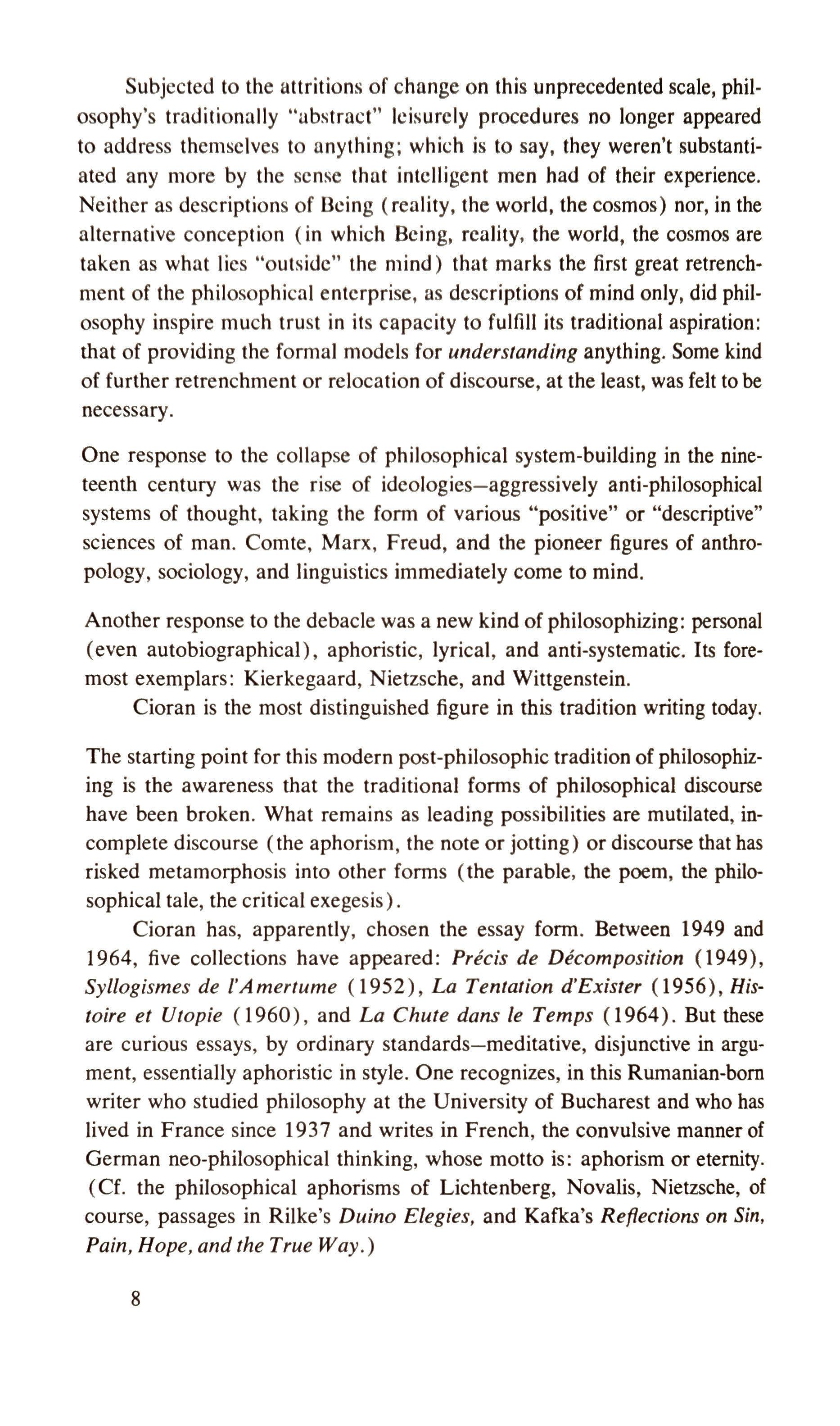
Subjected to the attritions of change on this unprecedented scale, philosophy's traditionally "abstract" leisurely procedures no longer appeared to address themselves to anything; which is to say, they weren't substantiated any more by the sense that intelligent men had of their experience. Neither as descriptions of Being (reality, the world, the cosmos) nor, in the alternative conception (in which Being, reality, the world, the cosmos are taken as what lies "outside' the mind) that marks the first great retrenchment of the philosophical enterprise, as descriptions of mind only, did philosophy inspire much trust in its capacity to fulfill its traditional aspiration: that of providing the fOI'111al models for understanding anything. Some kind of further retrenchment or relocation of discourse, at the least, was felt to be necessary.
One response to the collapse of philosophical system-building in the nineteenth century was the rise of ideologies aggressively anti-philosophical systems of thought, taking the form of various "positive" or "descriptive" sciences of man. Comte, Marx, Freud, and the pioneer figures of anthropology, sociology, and linguistics immediately come to mind.
Another response to the debacle was a new kind of philosophizing: personal (even autobiographical), aphoristic, lyrical, and anti-systematic. Its foremost exemplars: Kierkegaard, Nietzsche, and Wittgenstein.
Cioran is the most distinguished figure in this tradition writing today.
The starting point for this modern post-philosophic tradition of philosophizing is the awareness that the traditional fOl'I11S of philosophical discourse have been broken. What remains as leading possibilities are mutilated, incomplete discourse (the aphorism, the note or jotting) or discourse that has risked metamorphosis into other forms (the parable, the poem, the philosophical tale, the critical exegesis)
Cioran has, apparently, chosen the essay form. Between 1949 and 1964, five collections have appeared: Precis de Decomposition (1949), Syllogismes de l'Amertume (1952), La Tentation d'Exister (1956), Histoire et Utopie (1960), and La Chute dans le Temps (1964). But these are curious essays, by ordinary standards meditative, disjunctive in argument, essentially aphoristic in style. One recognizes, in this Rumanian-born writer who studied philosophy at the University of Bucharest and who has lived in France since 1937 and writes in French, the convulsive manner of German neo-philosophical thinking, whose motto is: aphorism or eternity. (Cf. the philosophical aphorisms of Lichtenberg, Novalis, Nietzsche, of course, passages in Rilke's Duino Elegies, and Kafka's Reflections on Sin, Pain, Hope, and the True Way.) 8
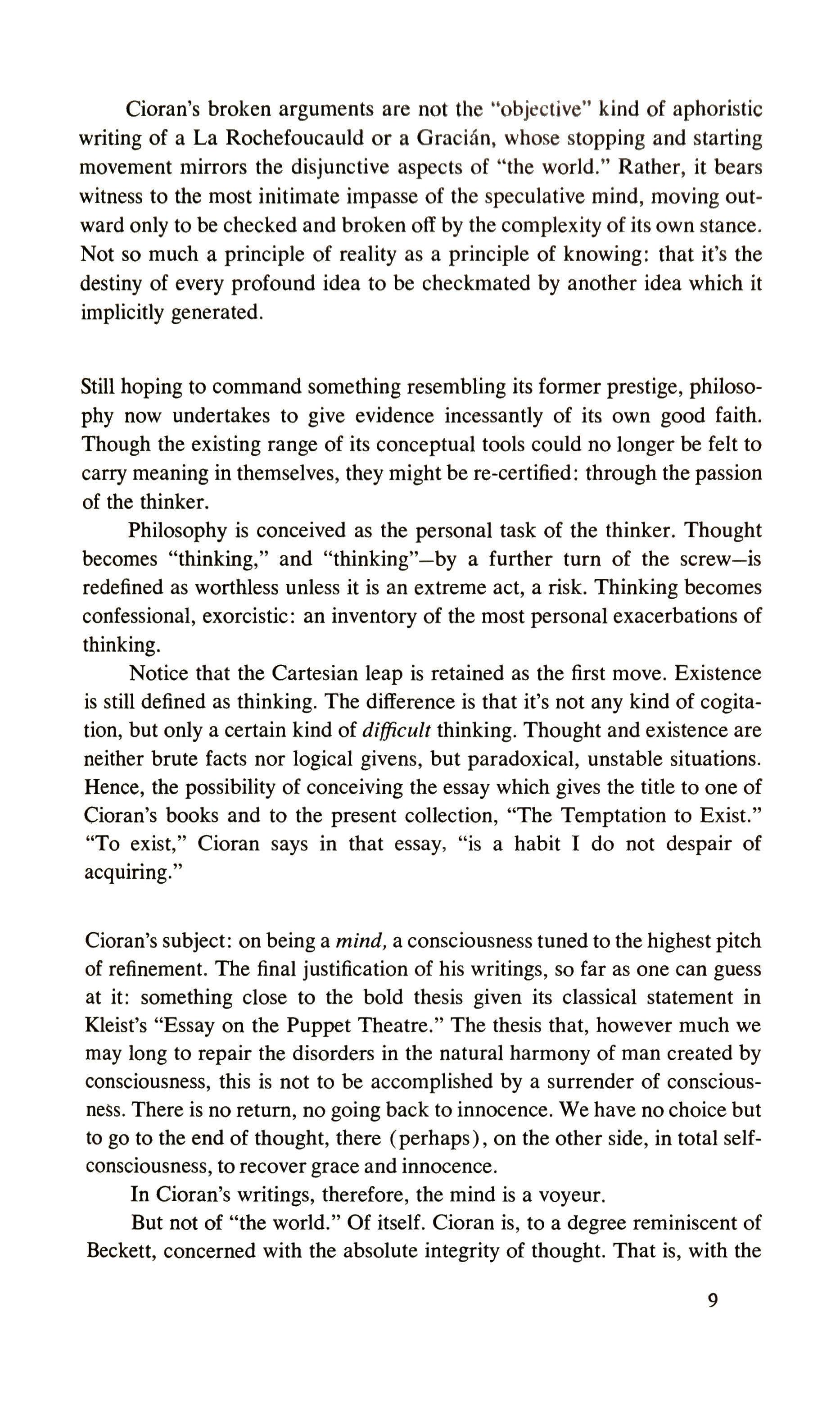
Cioran's broken arguments are not tile "objective' kind of aphoristic writing of a La Rochefoucauld or a Gracian, whose stopping and starting movement mirrors the disjunctive aspects of "the world," Rather, it bears witness to the most initimate impasse of the speculative mind, moving outward only to be checked and broken off by the complexity of its own stance. Not so much a principle of reality as a principle of knowing: that it's the destiny of every profound idea to be checkmated by another idea which it implicitly generated.
Still hoping to command something resembling its former prestige, philosophy now undertakes to give evidence incessantly of its own good faith. Though the existing range of its conceptual tools could no longer be felt to carry meaning in themselves, they might be re-certified: through the passion of the thinker.
Philosophy is conceived as the personal task of the thinker. Thought becomes "thinking," and "thinking" by a further turn of the screw is redefined as worthless unless it is an extreme act, a risk. Thinking becomes confessional, exorcistic: an inventory of the most personal exacerbations of thinking.
Notice that the Cartesian leap is retained as the first move. Existence is still defined as thinking. The difference is that it's not any kind of cogitation, but only a certain kind of difficult thinking. Thought and existence are neither brute facts nor logical givens, but paradoxical, unstable situations. Hence, the possibility of conceiving the essay which gives the title to one of Cioran's books and to the present collection, "The Temptation to Exist." "To exist," Cioran says in that essay, "is a habit I do not despair of acquiring.
Cioran's subject: on being a mind, a consciousness tuned to the highest pitch of refinement. The final justification of his writings, so far as one can guess at it: something close to the bold thesis given its classical statement in Kleist's "Essay on the Puppet Theatre." The thesis that, however much we may long to repair the disorders in the natural harmony of man created by consciousness, this is not to be accomplished by a surrender of consciousness. There is no return, no going back to innocence. We have no choice but to go to the end of thought, there (perhaps), on the other side, in total selfconsciousness, to recover grace and innocence.
In Cioran's writings, therefore, the mind is a voyeur. But not of "the world." Of itself. Cioran is, to a degree reminiscent of Beckett, concerned with the absolute integrity of thought. That is, with the
9

reduction or circumscription of thought to thinking about thinking. "The only free mind," Cioran remarks in one of his finest essays, "Thinking Against Oneself," is "the one that, pure of all intimacy with being or objects, plies its own vacuity."
Yet, throughout, this act of mental disembowelment retains its "Faustian" or "Western" passionateness. Cioran will allow no possibility that anyone born into this culture can attain as a way out of the trap-an "Eastern" abnegation of mind. (Compare Cioran's self-consciously futile longing for the East with Levi-Strauss' affirmative nostalgia for "neolithic" consciousness. )
Philosophy becomes tortured thinking. Thinking that devours itselfand continues intact and even flourishes, in spite of these repeated acts of self-cannibalism. Or because of them, perhaps? The thinker plays both roles in the passion-play of thought. He is both protagonist and antagonist, both suffering Prometheus and the remorseless eagle who consumes his perpetually regenerated entrails.
Cioran writes about impossible states of being, about unthinkable thoughts. That's his material for speculation (thinking against oneself, etc.). But he comes after Nietzsche, who set down almost all of Cioran's position almost a century ago. An interesting question: why does a subtle, powerful mind consent to say what has, for the most part, already been said? In order to make those ideas genuinely his own? Because, while they were true when originally set down, they have since become more true?
Whatever the answer, one may guess that the "fact" of Nietzsche has consequences for Cioran. He must tighten the screws, make the argument denser. More excruciating. More rhetorical.
Characteristically, Cioran begins an essay where another writer would end it. And, beginning with the conclusion, he goes on from there.
His is the kind of writing that's meant for readers who, in a sense, already know what he says; they have traversed these vertiginous thoughts for themselves. Cioran doesn't make any of the usual efforts to "persuade," with his oddly lyrical chains of ideas, his merciless irony, his gracefully delivered allusions to nothing less than the whole of European thought since the Greeks. An argument is to be "recognized," and without too much help. Good taste demands that the thinker furnish only pithy glimpses of intellectual and spiritual torment. Hence, Cioran's tone one of immense dignity, dogged, sometimes playful, often haughty. But for all of what may appear arrogance, there is nothing complacent in Cioran, unless it be his very sense of futility and his uncompromisingly elitist attitude toward the life of the mind.
10
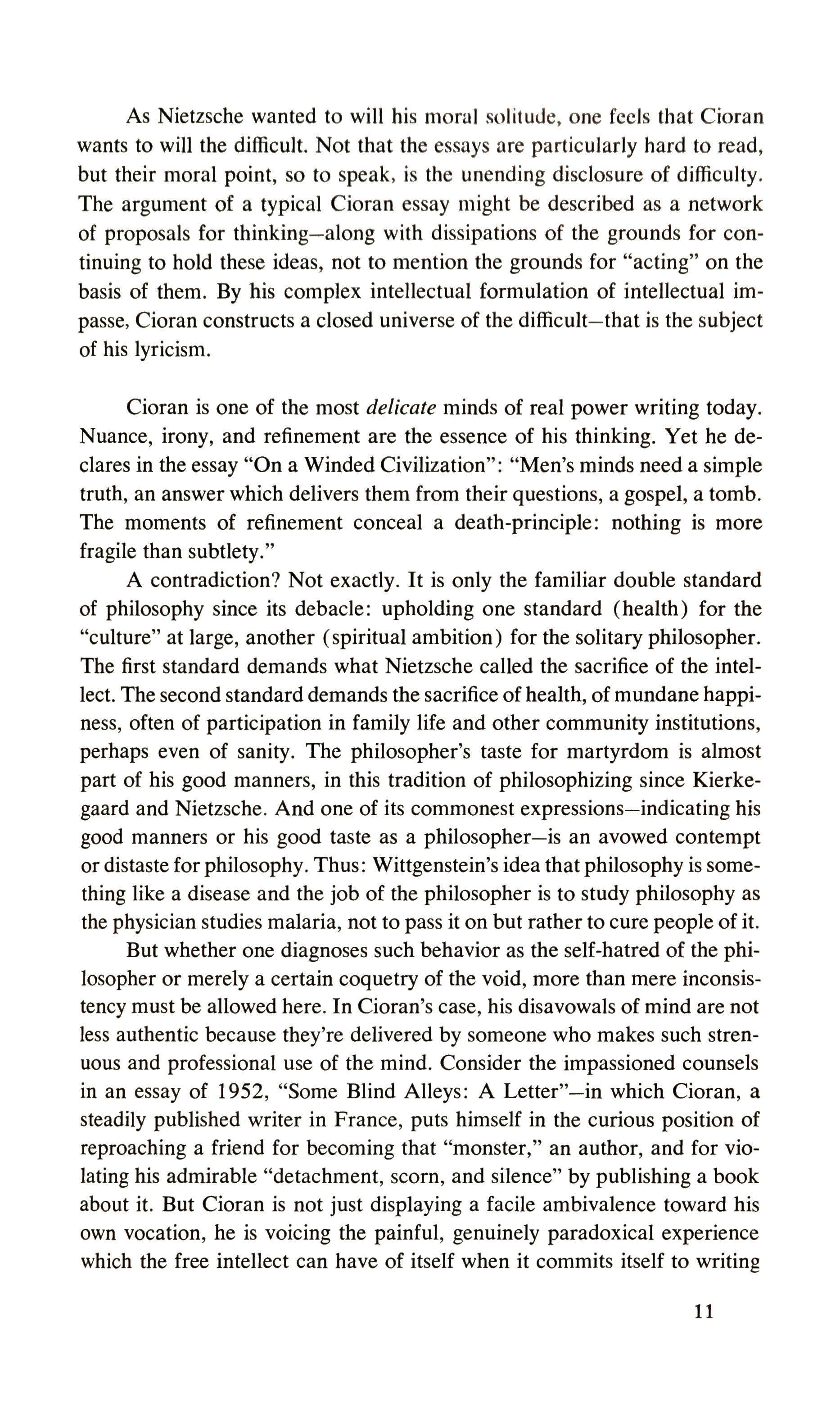
As Nietzsche wanted to will his moral solitude, one feels that Cioran wants to will the difficult. Not that the essays are particularly hard to read, but their moral point, so to speak, is the unending disclosure of difficulty. The argument of a typical Cioran essay might be described as a network of proposals for thinking along with dissipations of the grounds for continuing to hold these ideas, not to mention the grounds for "acting" on the basis of them. By his complex intellectual formulation of intellectual impasse, Cioran constructs a closed universe of the difficult that is the subject of his lyricism.
Cioran is one of the most delicate minds of real power writing today. Nuance, irony, and refinement are the essence of his thinking. Yet he declares in the essay "On a Winded Civilization": "Men's minds need a simple truth, an answer which delivers them from their questions, a gospel, a tomb. The moments of refinement conceal a death-principle: nothing is more fragile than subtlety."
A contradiction? Not exactly. It is only the familiar double standard of philosophy since its debacle: upholding one standard (health) for the "culture" at large, another (spiritual ambition) for the solitary philosopher. The first standard demands what Nietzsche called the sacrifice of the intellect. The second standard demands the sacrifice of health, of mundane happiness, often of participation in family life and other community institutions, perhaps even of sanity. The philosopher's taste for martyrdom is almost part of his good manners, in this tradition of philosophizing since Kierkegaard and Nietzsche. And one of its commonest expressions indicating his good manners or his good taste as a philosopher is an avowed contempt or distaste for philosophy. Thus: Wittgenstein's idea that philosophy is something like a disease and the job of the philosopher is to study philosophy as the physician studies malaria, not to pass it on but rather to cure people of it. But whether one diagnoses such behavior as the self-hatred of the philosopher or merely a certain coquetry of the void, more than mere inconsistency must be allowed here. In Cioran's case, his disavowals of mind are not less authentic because they're delivered by someone who makes such strenuous and professional use of the mind. Consider the impassioned counsels in an essay of 1952, "Some Blind Alleys: A Letter" in which Cioran, a steadily published writer in France, puts himself in the curious position of reproaching a friend for becoming that "monster," an author, and for violating his admirable "detachment, scorn, and silence" by publishing a book about it. But Cioran is not just displaying a facile ambivalence toward his own vocation, he is voicing the painful, genuinely paradoxical experience which the free intellect can have of itself when it commits itself to writing
11
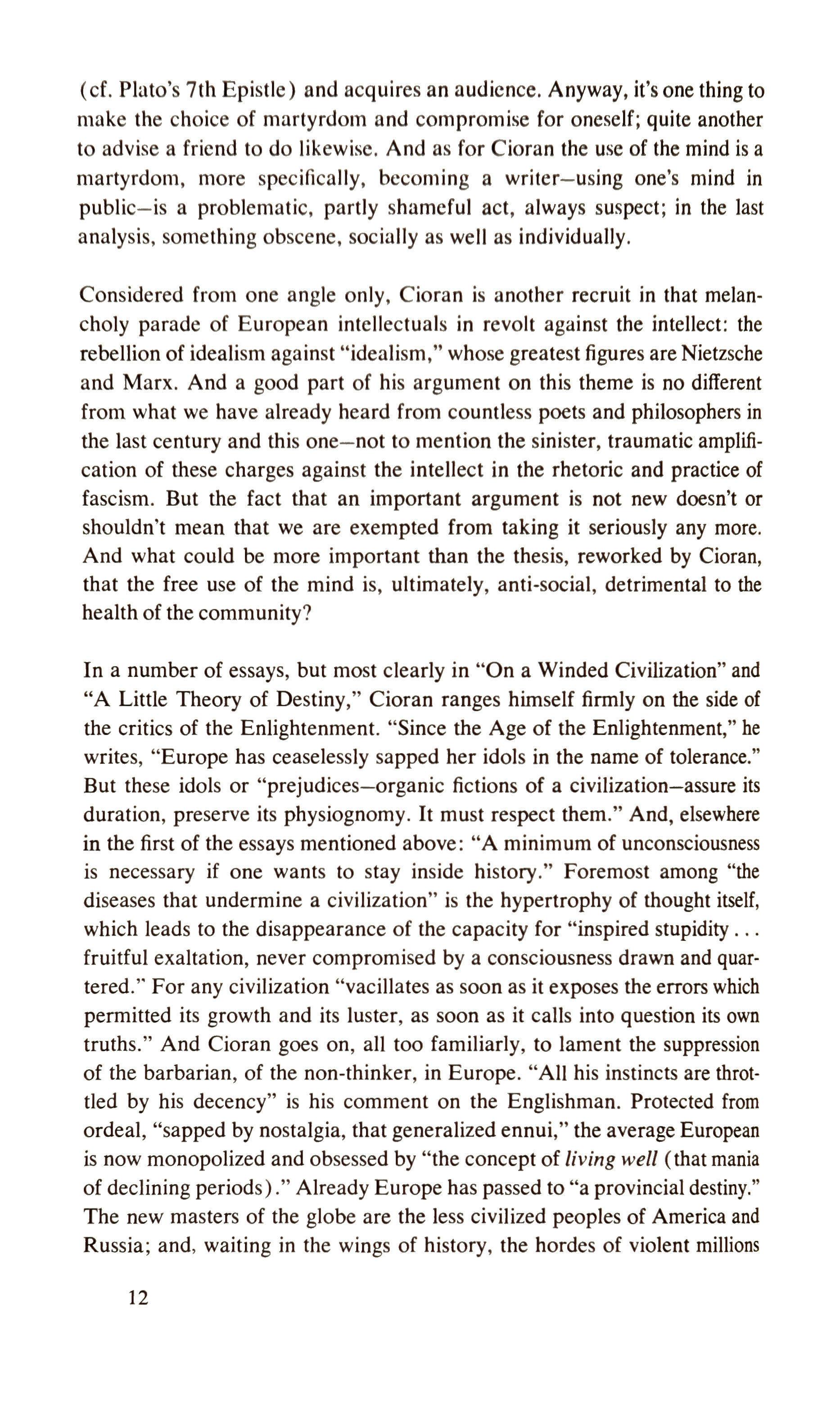
(cf. Plato's 7th Epistle) and acquires an audience. Anyway, it's one thing to make the choice of martyrdom and compromise for oneself; quite another to advise a friend to do likewise. And as for Cioran the use of the mind is a martyrdom, more specifically, becoming a writer using one's mind in public is a problematic, partly shameful act, always suspect; in the last analysis, something obscene, socially as well as individually.
Considered from one angle only, Cioran is another recruit in that melancholy parade of European intellectuals in revolt against the intellect: the rebellion of idealism against "idealism," whose greatest figures are Nietzsche and Marx. And a good part of his argument on this theme is no different from what we have already heard from countless poets and philosophers in the last century and this one not to mention the sinister, traumatic amplification of these charges against the intellect in the rhetoric and practice of fascism. But the fact that an important argument is not new doesn't or shouldn't mean that we are exempted from taking it seriously any more. And what could be more important than the thesis, reworked by Cioran, that the free use of the mind is, ultimately, anti-social, detrimental to the health of the community?
In a number of essays, but most clearly in "On a Winded Civilization" and "A Little Theory of Destiny," Cioran ranges himself firmly on the side of the critics of the Enlightenment. "Since the Age of the Enlightenment," he writes, "Europe has ceaselessly sapped her idols in the name of tolerance." But these idols or "prejudices organic fictions of a civilization assure its duration, preserve its physiognomy. It must respect them." And, elsewhere in the first of the essays mentioned above: "A minimum of unconsciousness is necessary if one wants to stay inside history." Foremost among "the diseases that undermine a civilization" is the hypertrophy of thought itself, which leads to the disappearance of the capacity for "inspired stupidity fruitful exaltation, never compromised by a consciousness drawn and quartered." For any civilization "vacillates as soon as it exposes the errors which permitted its growth and its luster, as soon as it calls into question its own truths." And Cioran goes on, all too familiarly, to lament the suppression of the barbarian, of the non-thinker, in Europe. "All his instincts are throttled by his decency" is his comment on the Englishman. Protected from ordeal, "sapped by nostalgia, that generalized ennui," the average European is now monopolized and obsessed by "the concept of living well (that mania of declining periods) Already Europe has passed to "a provincial destiny." The new masters of the globe are the less civilized peoples of America and Russia; and, waiting in the wings of history, the hordes of violent millions
12
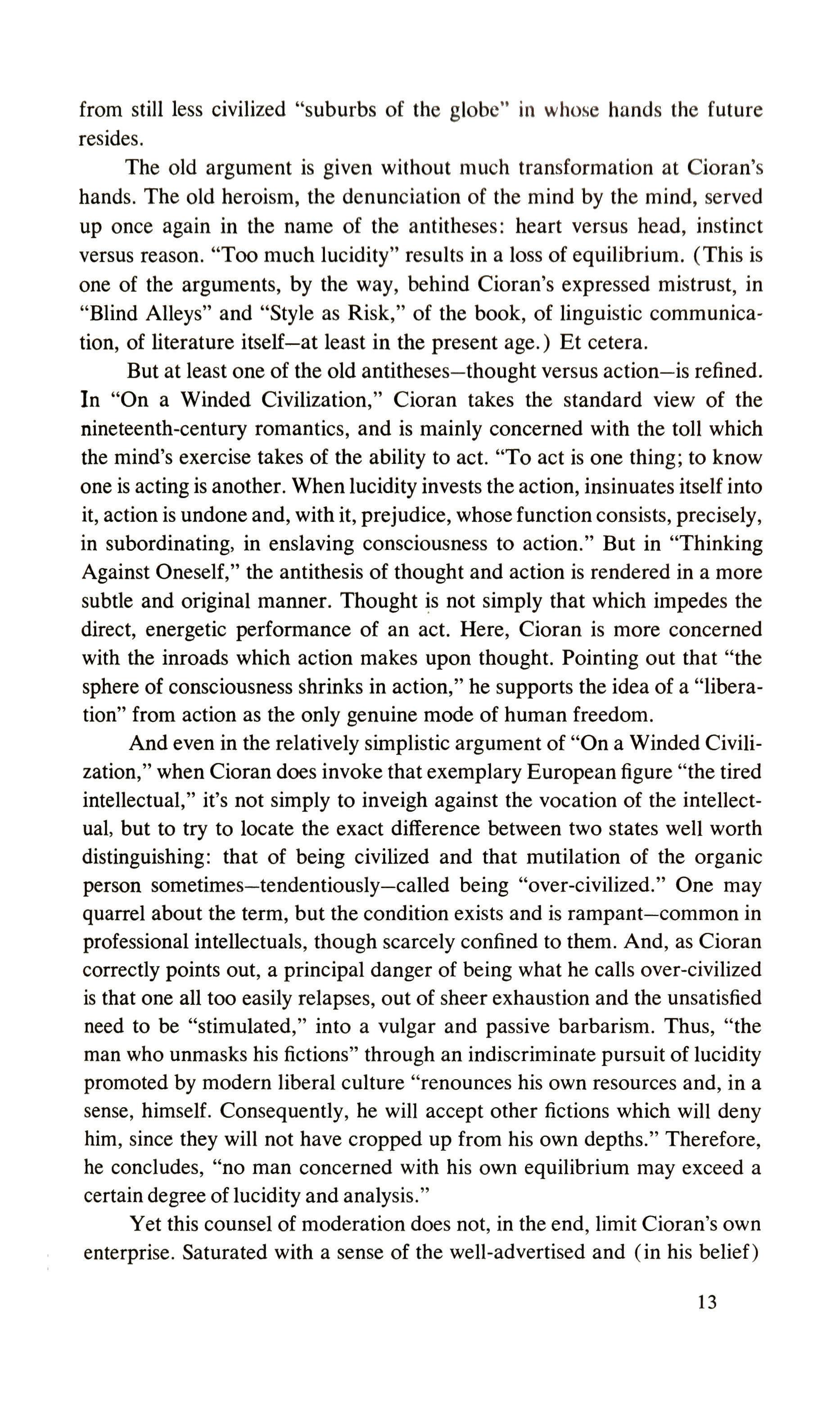
from still less civilized "suburbs of the globe" in whose hands the future resides.
The old argument is given without much transformation at Cioran's hands. The old heroism, the denunciation of the mind by the mind, served up once again in the name of the antitheses: heart versus head, instinct versus reason. "Too much lucidity" results in a loss of equilibrium. (This is one of the arguments, by the way, behind Cioran's expressed mistrust, in "Blind Alleys" and "Style as Risk," of the book, of linguistic communication, of literature itself at least in the present age.) Et cetera.
But at least one of the old antitheses thought versus action is refined. In "On a Winded Civilization," Cioran takes the standard view of the nineteenth-century romantics, and is mainly concerned with the toll which the mind's exercise takes of the ability to act. "To act is one thing; to know one is acting is another. When lucidity invests the action, insinuates itself into it, action is undone and, with it, prejudice, whose function consists, precisely, in subordinating, in enslaving consciousness to action." But in "Thinking Against Oneself," the antithesis of thought and action is rendered in a more subtle and original manner. Thought is not simply that which impedes the direct, energetic performance of an act. Here, Cioran is more concerned with the inroads which action makes upon thought. Pointing out that "the sphere of consciousness shrinks in action," he supports the idea of a "liberation" from action as the only genuine mode of human freedom.
And even in the relatively simplistic argument of "On a Winded Civilization," when Cioran does invoke that exemplary European figure "the tired intellectual," it's not simply to inveigh against the vocation of the intellectual, but to try to locate the exact difference between two states well worth distinguishing: that of being civilized and that mutilation of the organic person sometimes tendentiously called being "over-civilized." One may quarrel about the term, but the condition exists and is rampant common in professional intellectuals, though scarcely confined to them. And, as Cioran correctly points out, a principal danger of being what he calls over-civilized is that one all too easily relapses, out of sheer exhaustion and the unsatisfied need to be "stimulated," into a vulgar and passive barbarism. Thus, "the man who unmasks his fictions" through an indiscriminate pursuit of lucidity promoted by modern liberal culture "renounces his own resources and, in a sense, himself. Consequently, he will accept other fictions which will deny him, since they will not have cropped up from his own depths." Therefore, he concludes, "no man concerned with his own equilibrium may exceed a certain degree of lucidity and analysis."
Yet this counsel of moderation does not, in the end, limit Cioran's own enterprise. Saturated with a sense of the well-advertised and (in his belief)
13
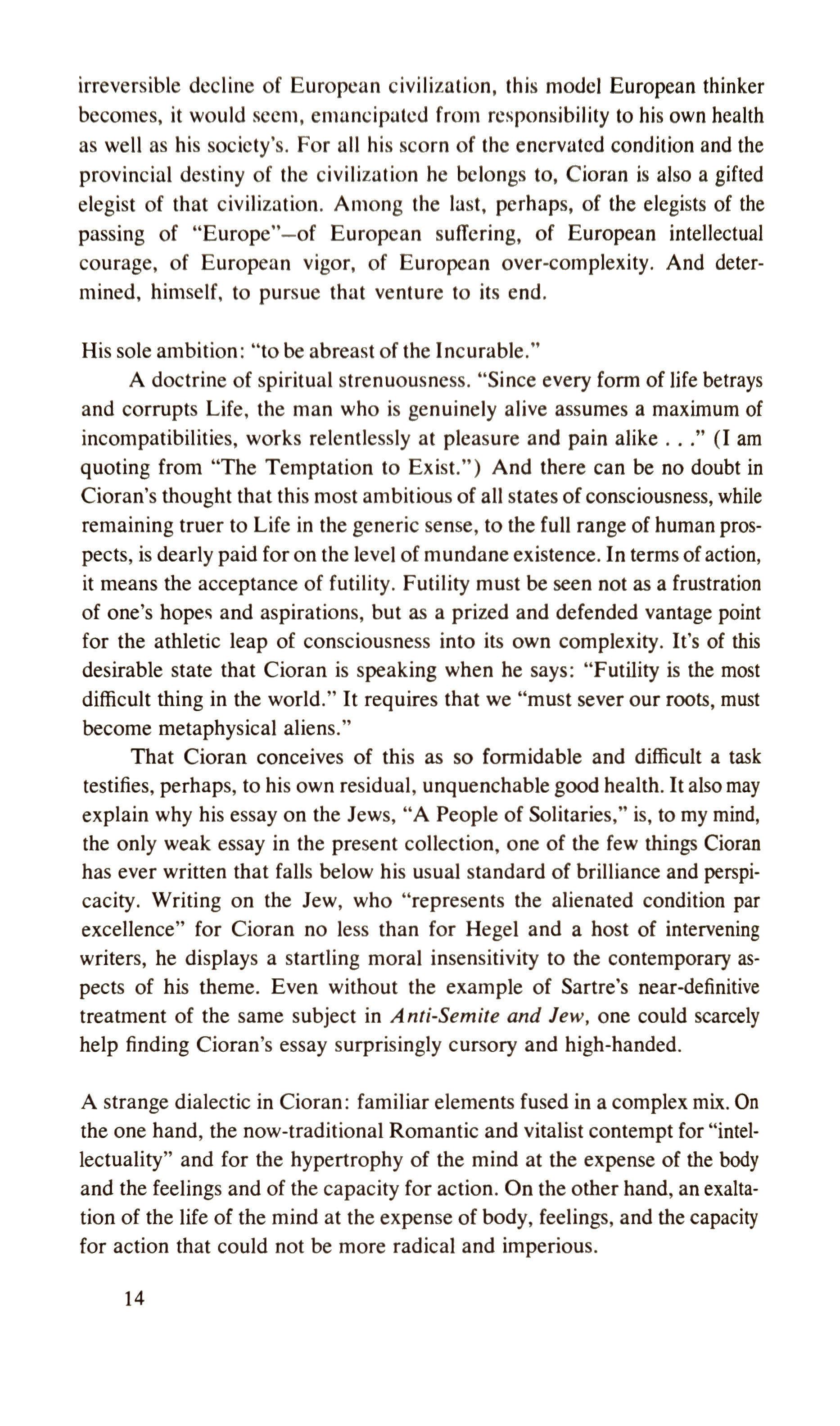
irreversible decline of European civilization, this model European thinker becomes, it would seem, emancipated from responsibility to his own health as well as his society's. For all his scorn of the enervated condition and the provincial destiny of the civilization he belongs to, Cioran is also a gifted elegist of that civilization. Among the last, perhaps, of the elegists of the passing of "Europe" of European suffering, of European intellectual courage, of European vigor, of European over-complexity. And determined, himself, to pursue that venture to its end.
His sole ambition: "to be abreast of the Incurable."
A doctrine of spiritual strenuousness. "Since every fonn of life betrays and corrupts Life, the man who is genuinely alive assumes a maximum of incompatibilities, works relentlessly at pleasure and pain alike (I am quoting from "The Temptation to Exist.") And there can be no doubt in Cioran's thought that this most ambitious of all states of consciousness, while remaining truer to Life in the generic sense, to the full range of human prospects, is dearly paid for on the level of mundane existence. In terms ofaction, it means the acceptance of futility. Futility must be seen not as a frustration of one's hopes and aspirations, but as a prized and defended vantage point for the athletic leap of consciousness into its own complexity. It's of this desirable state that Cioran is speaking when he says: "Futility is the most difficult thing in the world." It requires that we "must sever our roots, must become metaphysical aliens."
That Cioran conceives of this as so formidable and difficult a task testifies, perhaps, to his own residual, unquenchable good health. It also may explain why his essay on the Jews, "A People of Solitaries," is, to my mind, the only weak essay in the present collection, one of the few things Cioran has ever written that falls below his usual standard of brilliance and perspicacity. Writing on the Jew, who "represents the alienated condition par excellence" for Cioran no less than for Hegel and a host of intervening writers, he displays a startling moral insensitivity to the contemporary aspects of his theme. Even without the example of Sartre's near-definitive treatment of the same subject in Anti-Semite and Jew, one could scarcely help finding Cioran's essay surprisingly cursory and high-handed.
A strange dialectic in Cioran: familiar elements fused in a complex mix. On the one hand, the now-traditional Romantic and vitalist contempt for "intellectuality" and for the hypertrophy of the mind at the expense of the body and the feelings and of the capacity for action. On the other hand, an exaltation of the life of the mind at the expense of body, feelings, and the capacity for action that could not be more radical and imperious.
14
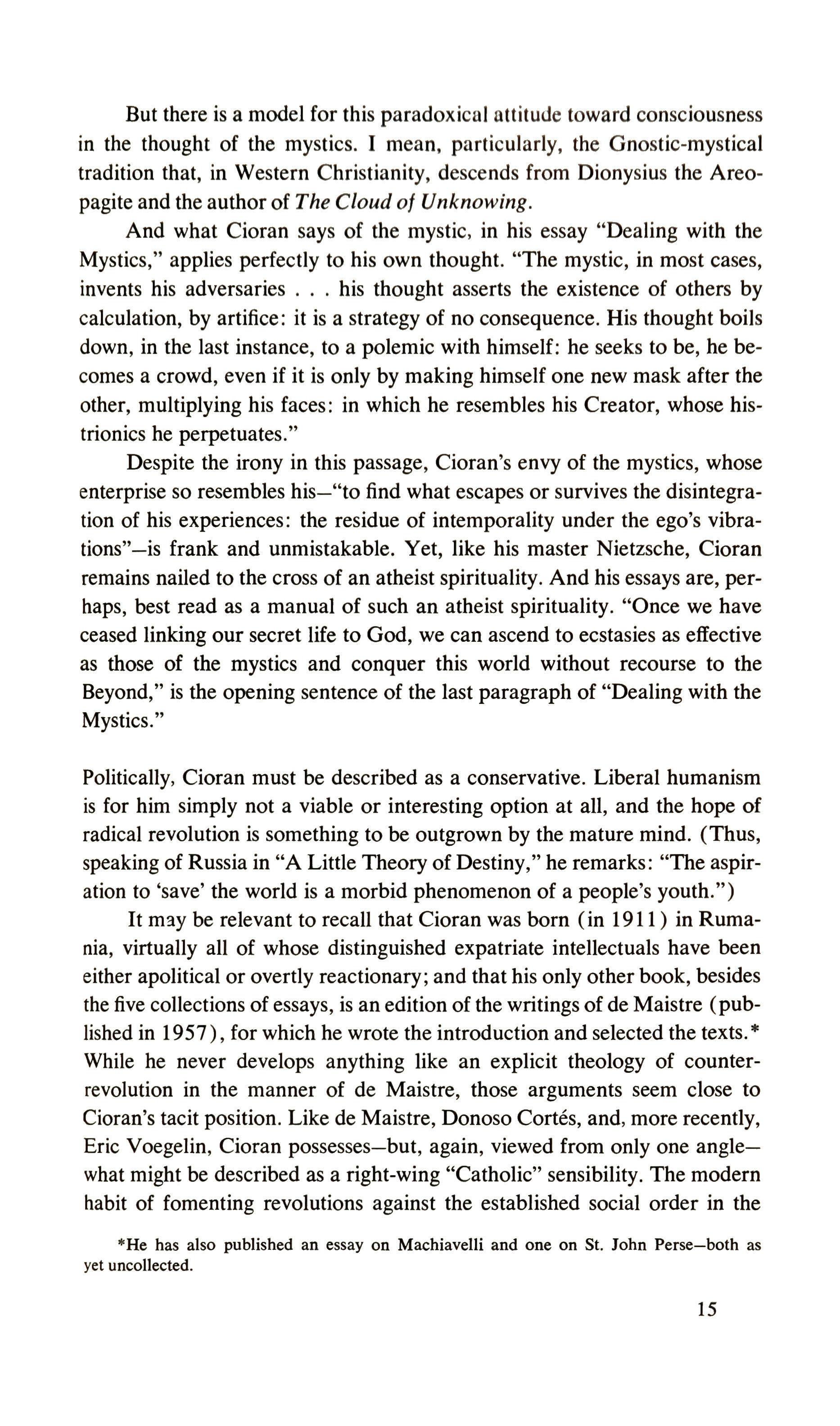
But there is a model for this paradoxical attitude toward consciousness in the thought of the mystics. I mean, particularly, the Gnostic-mystical tradition that, in Western Christianity, descends from Dionysius the Areopagite and the author of The Cloud of Unknowing.
And what Cioran says of the mystic, in his essay "Dealing with the Mystics," applies perfectly to his own thought. "The mystic, in most cases, invents his adversaries his thought asserts the existence of others by calculation, by artifice: it is a strategy of no consequence. His thought boils down, in the last instance, to a polemic with himself: he seeks to be, he becomes a crowd, even if it is only by making himself one new mask after the other, multiplying his faces: in which he resembles his Creator, whose histrionics he perpetuates."
Despite the irony in this passage, Cioran's envy of the mystics, whose enterprise so resembles his "to find what escapes or survives the disintegration of his experiences: the residue of intemporality under the ego's vibrations" is frank and unmistakable. Yet, like his master Nietzsche, Cioran remains nailed to the cross of an atheist spirituality. And his essays are, perhaps, best read as a manual of such an atheist spirituality. "Once we have ceased linking our secret life to God, we can ascend to ecstasies as effective as those of the mystics and conquer this world without recourse to the Beyond," is the opening sentence of the last paragraph of "Dealing with the Mystics."
Politically, Cioran must be described as a conservative. Liberal humanism is for him simply not a viable or interesting option at all, and the hope of radical revolution is something to be outgrown by the mature mind. (Thus, speaking of Russia in "A Little Theory of Destiny," he remarks: "The aspiration to 'save' the world is a morbid phenomenon of a people's youth.")
It may be relevant to recall that Cioran was born (in 1911) in Rumania, virtually all of whose distinguished expatriate intellectuals have been either apolitical or overtly reactionary; and that his only other book, besides the five collections of essays, is an edition of the writings of de Maistre (published in 1957), for which he wrote the introduction and selected the texts. * While he never develops anything like an explicit theology of counterrevolution in the manner of de Maistre, those arguments seem close to Cioran's tacit position. Like de Maistre, Donoso Cortes, and, more recently, Eric Voegelin, Cioran possesses but, again, viewed from only one anglewhat might be described as a right-wing "Catholic" sensibility. The modern habit of fomenting revolutions against the established social order in the
*He has also published an essay on Machiavelli and one on St. John Perse-both as yet uncollected.
15
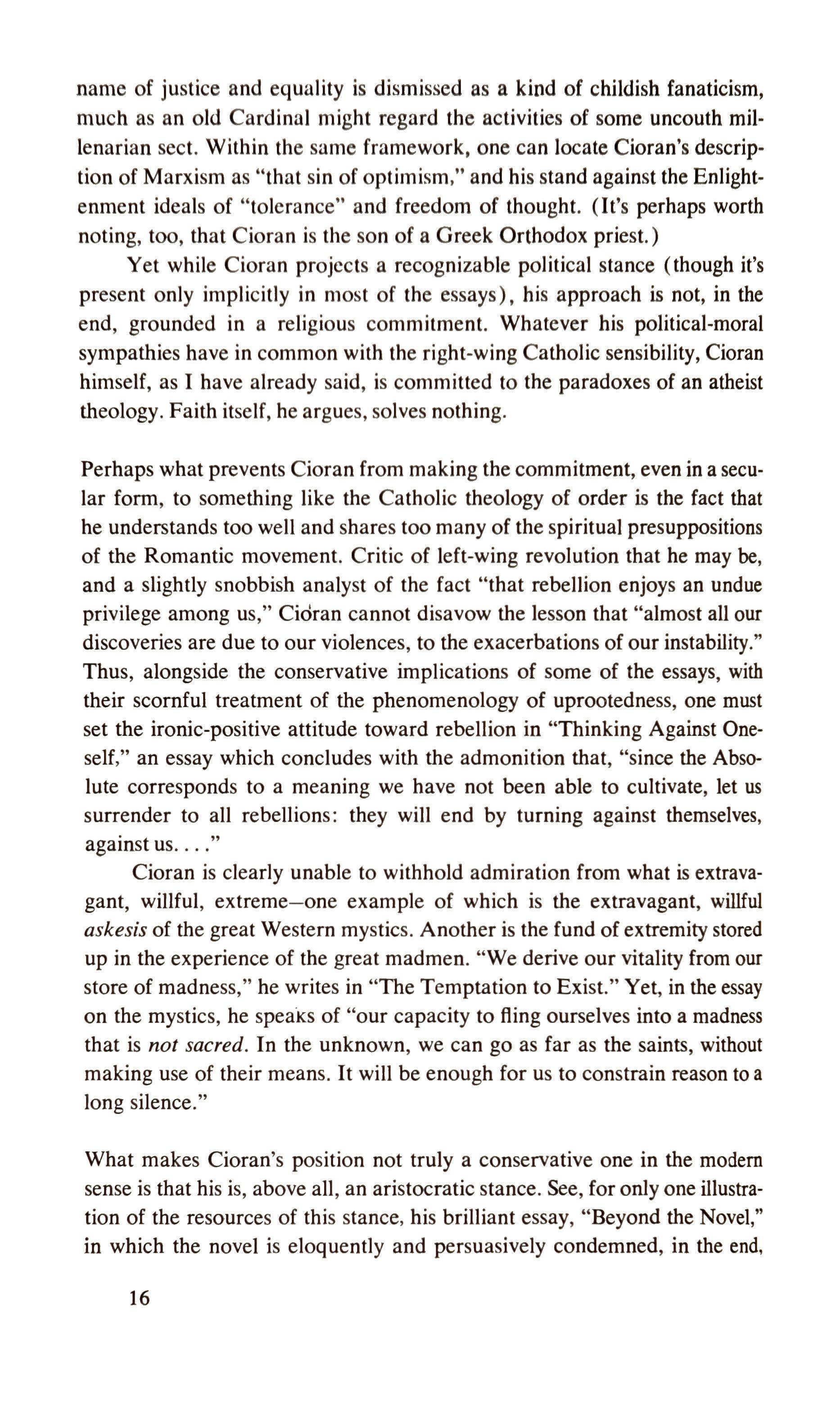
name of justice and equality is dismissed as a kind of childish fanaticism, much as an old Cardinal might regard the activities of some uncouth millenarian sect. Within the same framework, one can locate Cioran's description of Marxism as "that sin of optimism," and his stand against the Enlightenment ideals of "tolerance" and freedom of thought. (It's perhaps worth noting, too, that Cioran is the son of a Greek Orthodox priest.)
Yet while Cioran projects a recognizable political stance (though it's present only implicitly in most of the essays), his approach is not, in the end, grounded in a religious commitment. Whatever his political-moral sympathies have in common with the right-wing Catholic sensibility, Cioran himself, as I have already said, is committed to the paradoxes of an atheist theology. Faith itself, he argues, solves nothing.
Perhaps what prevents Cioran from making the commitment, even in a secular form, to something like the Catholic theology of order is the fact that he understands too well and shares too many of the spiritual presuppositions of the Romantic movement. Critic of left-wing revolution that he may be, and a slightly snobbish analyst of the fact "that rebellion enjoys an undue privilege among us," Cidran cannot disavow the lesson that "almost all our discoveries are due to our violences, to the exacerbations of our instability." Thus, alongside the conservative implications of some of the essays, with their scornful treatment of the phenomenology of uprootedness, one must set the ironic-positive attitude toward rebellion in "Thinking Against Oneself," an essay which concludes with the admonition that, "since the Absolute corresponds to a meaning we have not been able to cultivate, let us surrender to all rebellions: they will end by turning against themselves, against us
Cioran is clearly unable to withhold admiration from what is extravagant, willful, extreme one example of which is the extravagant, willful askesis of the great Western mystics. Another is the fund of extremity stored up in the experience of the great madmen. "We derive our vitality from our store of madness," he writes in "The Temptation to Exist." Yet, in the essay on the mystics, he speaks of "our capacity to fling ourselves into a madness that is not sacred. In the unknown, we can go as far as the saints, without making use of their means. It will be enough for us to constrain reason to a long silence."
What makes Cioran's position not truly a conservative one in the modem sense is that his is, above all, an aristocratic stance. See, for only one illustration of the resources of this stance, his brilliant essay, "Beyond the Novel," in which the novel is eloquently and persuasively condemned, in the end,
16

for its spiritual vulgarity for its devotion to what Cioran calls "destiny in lower case."
Throughout Cioran's writings, what is being posed is the problem of spiritual good taste. Avoiding vulgarity and the dilution of the self is, needless to say, the prerequisite for the arduous double task of maintaining an intact self which one is able fully to affirm and yet, at the same time, transcend. Cioran's chief accusation against the emotion of self-pity, for instance, is that the person who indulges in it has, by rejecting his miseries and relegating them outside his nature, "ceased to communicate with his life which he turns into an object." It may seem outrageous when Cioran writes, as he often does, of resisting the vulgar temptation to be happy and of the "impasse of happiness." But such judgments are far from an unfeeling affectation, once one grants his impossible project: "to be nowhere, when no external condition obliges you to do so to extricate yourself from the world what a labor of abolition!"
More realistically, perhaps the best to be hoped for is a series of situations, a life, a milieu, which leave part of the venturesome consciousness free for its labors. One may recall Cioran's description of Spain in "A Little Theory of Destiny": "They live in a kind of melodious asperity, a tragic non-seriousness, which saves them from vulgarity, from happiness, and from success."
Certainly, Cioran's writings suggest, the role of the writer isn't likely to provide this kind of spiritual leverage. In "Advantages of Exile" and the brief "Verbal Demiurgy," he describes how the vocation of literature, particularly that of the poet, creates insurmountable conditions of inauthenticity. One may suffer, but when one deposits this suffering in literature the result is "an accumulation of confusions, an inflation of horrors, of jrissons that date. One cannot keep renewing Hell, whose very character is tmono ony
Whether the vocation of the philosopher is any less compromised can hardly be proved. (Reason is dying, Cioran says in "Style as Risk," in both philosophy and art.) But at least philosophy, I imagine Cioran feels, maintains somewhat higher standards of decorum. Untempted by the same kind of fame or emotional rewards that can descend on the poet, perhaps the philosopher, a little better than the poet, can comprehend and respect the modesty of the inexpressible.
When Cioran describes Nietzsche's philosophy as "a sum of attitudes"mistakenly scrutinized by scholars for the constants that the philosopher has rejected it's clear that he accepts the Nietzschean standard, with its critique of "truth" as system and consistency, as his own
17

In "Blind Alleys," Cioran speaks of "the stupidities inherent in the cult of truth."
The implication, here and elsewhere, is that what the true philosopher says is not something "true" but rather something necessary or liberating. For "the truth" is identified with depersonalization.
Once again, the line from Nietzsche to Cioran cannot be overemphasized. And, in the case of both writers, the critique of "truth" is intimately connected with the attitude toward "history."
Thus, one cannot understand Nietzsche's questioning of the value of truth in general and of the usefulness of historical truth in particular without grasping the link between the two notions. Nietzsche doesn't reject historical thinking because it is false. On the contrary, it must be rejected because it is true a debilitating truth that has to be overthrown to allow a more inclusive orientation for human consciousness.
As Cioran says in "The Temptation to Exist": "History is merely an inessential mode of being, the most effective fOI III of our infidelity to ourselves, a metaphysical refusal." And, in "Thinking Against Oneself," he refers to "history, man's aggression against himself."
Granted that the stamp of Nietzsche is to be found both upon the form of Cioran's thinking as well as on his principal attitudes, he most resembles Nietzsche in his temperament. It's the temperament or personal style shared with Nietzsche that explains the connections, in Cioran's work, between such disparate materials as: the emphasis on the strenuousness of an ambitious spiritual life; the project of self-mastery through "thinking against oneself"; the recurrent Nietzschean thematics of strength versus weakness, health versus sickness; the savage and sometimes shrill deployment of irony (quite different from the near-systematic, dialectical interplay of irony and seriousness to be found in Kierkegaard's writings) ; the preoccupation with the struggle against banality and boredom; the ambivalent attitude toward the poet's vocation; the seductive, but always finally resisted, lure of religious consciousness: and, of course, the hostility toward history and to most aspects of "modem" life.
What's missing in Cioran's work is anything parallel to Nietzsche's heroic effort to surmount nihilism (the doctrine of eternal recurrence).
And where Cioran most differs from Nietzsche is in not following Nietzsche's critique of Platonism. Contemptuous of history, yet haunted by time and mortality, Nietzsche still refused anything that harked back to the rhetoric established by Plato for going beyond time and death; and indeed worked hard at exposing what he thought essentially fraudulent and of bad faith in the Platonic intellectual transcendence. Cioran, apparently,
18
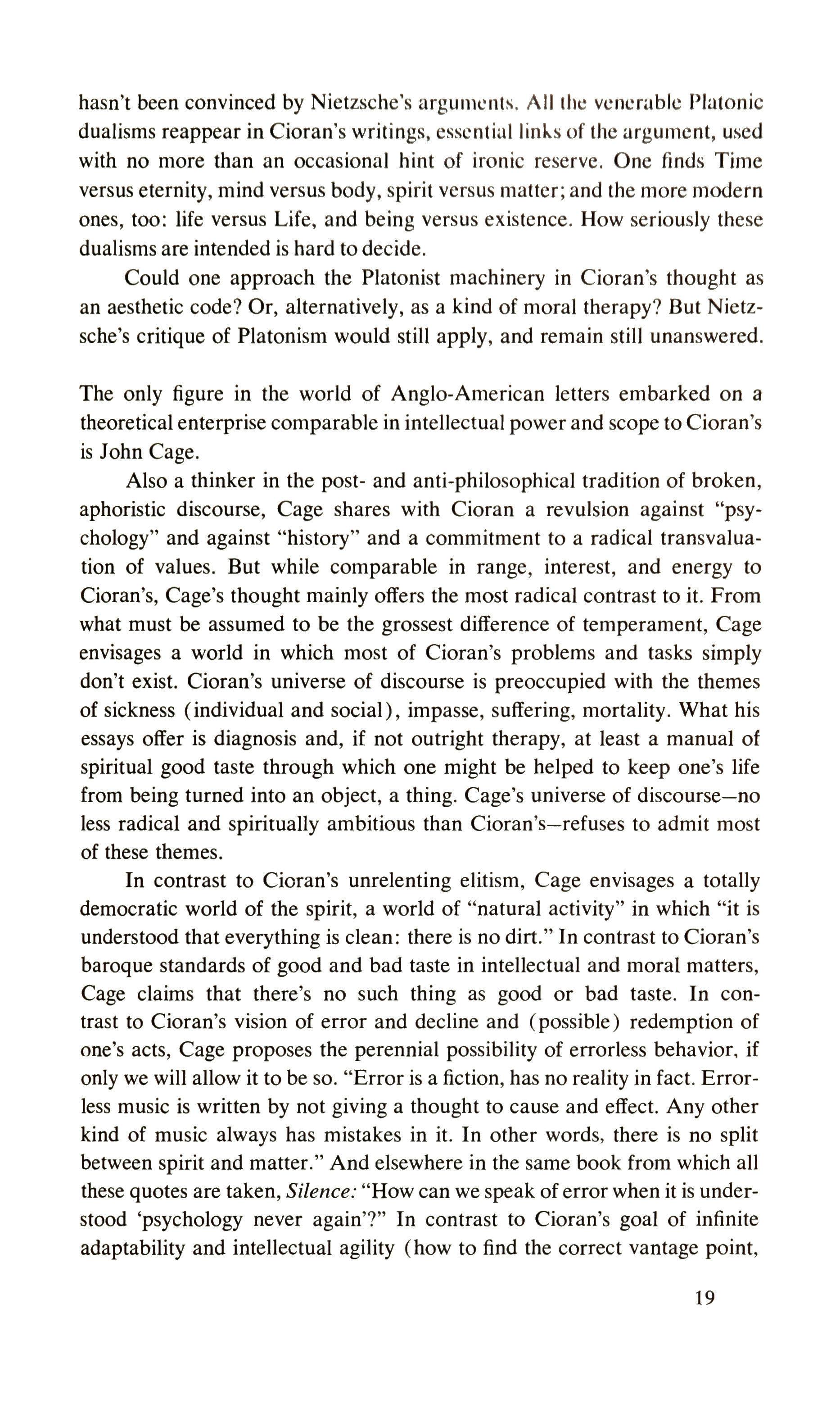
hasn't been convinced by Nietzsche's arguments, All the venerable Platonic dualisms reappear in Cioran's writings, essential links of the argument, used with no more than an occasional hint of ironic reserve. One finds Time versus eternity, mind versus body, spirit versus matter; and the more modern ones, too: life versus Life, and being versus existence. How seriously these dualisms are intended is hard to decide.
Could one approach the Platonist machinery in Cioran's thought as an aesthetic code? Or, alternatively, as a kind of moral therapy? But Nietzsche's critique of Platonism would still apply, and remain still unanswered.
The only figure in the world of Anglo-American letters embarked on a theoretical enterprise comparable in intellectual power and scope to Cioran's is John Cage.
Also a thinker in the post- and anti-philosophical tradition of broken, aphoristic discourse, Cage shares with Cioran a revulsion against "psychology" and against "history" and a commitment to a radical transvaluation of values. But while comparable in range, interest, and energy to Cioran's, Cage's thought mainly offers the most radical contrast to it. From what must be assumed to be the grossest difference of temperament, Cage envisages a world in which most of Cioran's problems and tasks simply don't exist. Cioran's universe of discourse is preoccupied with the themes of sickness (individual and social), impasse, suffering, mortality. What his essays offer is diagnosis and, if not outright therapy, at least a manual of spiritual good taste through which one might be helped to keep one's life from being turned into an object, a thing. Cage's universe of discourse no less radical and spiritually ambitious than Cioran's refuses to admit most of these themes.
In contrast to Cioran's unrelenting elitism, Cage envisages a totally democratic world of the spirit, a world of "natural activity" in which "it is understood that everything is clean: there is no dirt." In contrast to Cioran's baroque standards of good and bad taste in intellectual and moral matters, Cage claims that there's no such thing as good or bad taste. In contrast to Cioran's vision of error and decline and (possible) redemption of one's acts, Cage proposes the perennial possibility of errorless behavior, if only we will allow it to be so. "Error is a fiction, has no reality in fact. Errorless music is written by not giving a thought to cause and effect. Any other kind of music always has mistakes in it. In other words, there is no split between spirit and matter." And elsewhere in the same book from which all these quotes are taken, Silence: "How can we speak of error when it is understood 'psychology never again'?" In contrast to Cioran's goal of infinite adaptability and intellectual agility (how to find the correct vantage point,
19

the right place to stand in a treacherous world), Cage proposes for our experience a world in which it's never preferable to do other than we are doing or be elsewhere than we are. "It is only irritating," he says, "to think one would like to be somewhere else. Here we are now."
What is striking, in the context of this comparison, is how devoted Cioran is to the will and its capacity to transform the world. Compare Cage's: "Do you only take the position of doing nothing, and things will of themselves become transformed." What different views can be entailed by the radical rejection of history is easily seen by thinking first of Cioran and then of Cage, who writes: "To be & be the present. Would it be a repetition? Only if we thought we owned it, but since we don't, it is free & so are we."
Reading Cage, one becomes aware how much Cioran is still confined within the premises of the historicizing consciousness; how inescapably he continues to repeat these gestures, much as he longs to transcend them. Of necessity then, Cioran's thought is halfway between anguished reprise of these gestures and a genuine transvaluation of them. Perhaps, for a unified transvaluation, one must look to those thinkers, like Cage, who whether from spiritual strength or spiritual insensitivity is, to speak bluntly, a secondary issue are able to jettison far more of the inherited anguish and complexity of this civilization. Cioran's fierce, tensely argued speculations sum up brilliantly the decaying urgencies of "Western" thought, but offer no relief from them beyond the considerable satisfactions of the understanding. Relief, of course, is scarcely Cioran's intention. His aim is diagnosis. For relief, it may be that one must abandon the pride of knowing and feeling so much a local pride that has cost everyone hideously by now.
Novalis wrote that "philosophy is properly Home-sickness; the wish to be everywhere at home." If the human mind can be everywhere at home, it must in the end give up its local "European" pride and something else-that will seem strangely unfeeling and intellectually simplistic must be allowed in. "All that is necessary," says Cage with his own devastating irony, "is an empty space of time and letting it act in its magnetic way."
20
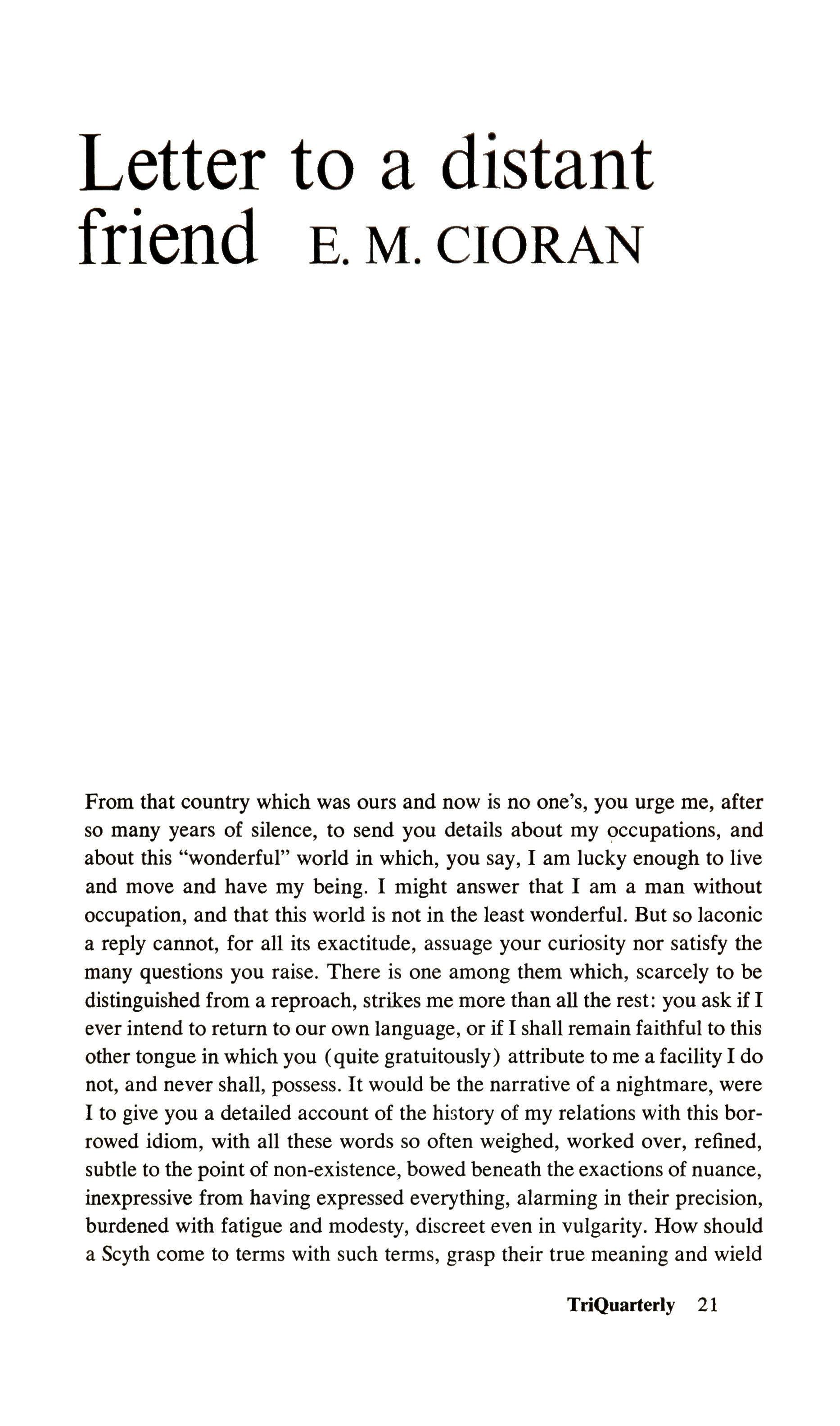
From that country which was ours and now is no one's, you urge me, after so many years of silence, to send you details about my occupations, and about this "wonderful" world in which, you say, I aln lucky enough to live and move and have my being. I might answer that I am a man without occupation, and that this world is not in the least wonderful. But so laconic a reply cannot, for all its exactitude, assuage your curiosity nor satisfy the many questions you raise. There is one among them which, scarcely to be distinguished from a reproach, strikes me more than all the rest: you ask if I ever intend to return to our own language, or if I shall remain faithful to this other tongue in which you (quite gratuitously) attribute to me a facility I do not, and never shall, possess. It would be the narrative of a nightmare, were I to give you a detailed account of the history of my relations with this borrowed idiom, with all these words so often weighed, worked over, refined, subtle to the point of non-existence, bowed beneath the exactions of nuance, inexpressive from having expressed everything, alarming in their precision, burdened with fatigue and modesty, discreet even in vulgarity. How should a Scyth come to terms with such terms, grasp their true meaning and wield
TriQuarterly 21
• •
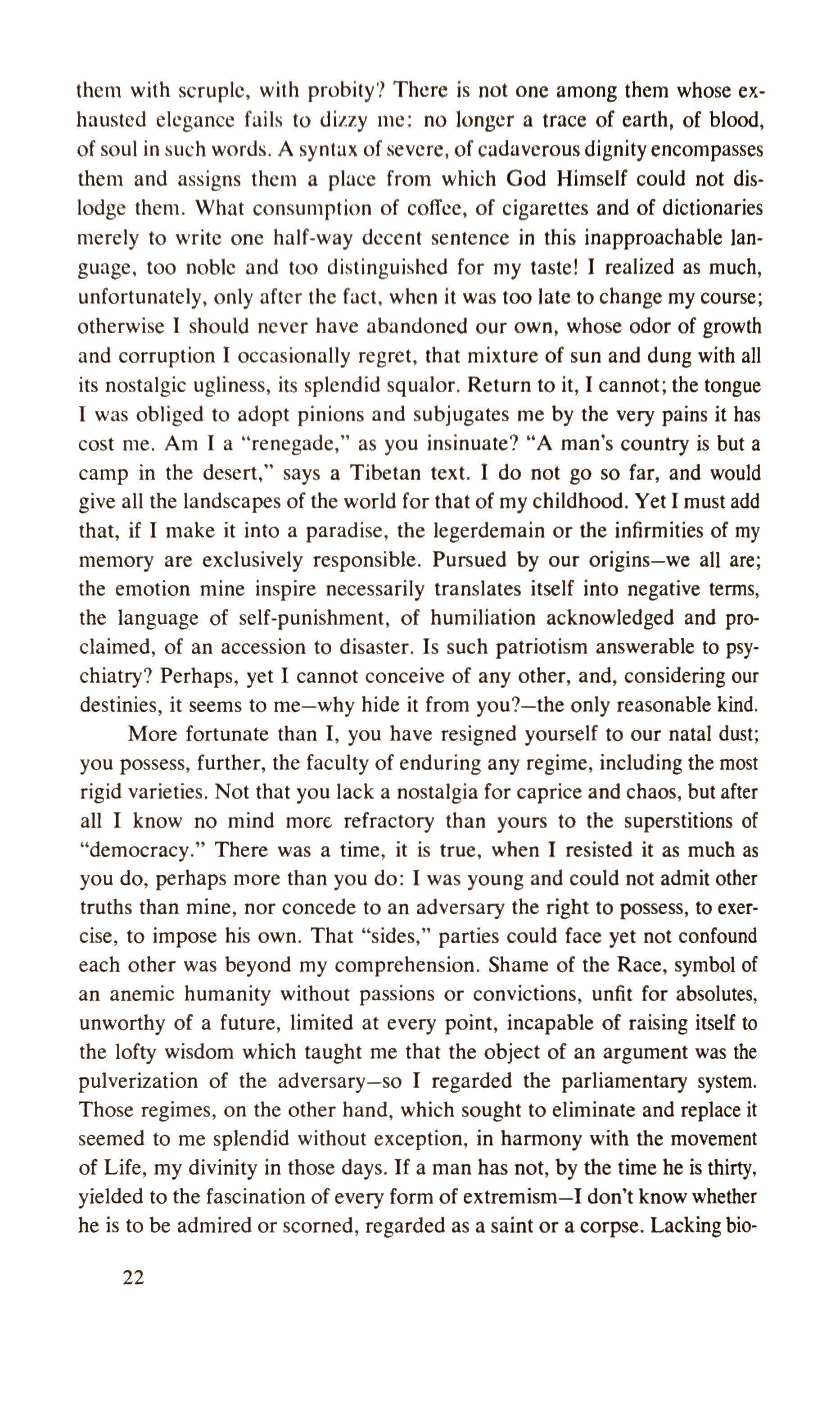
them with scruple, with probity'? There is not one among them whose exhausted elegance fails to dizzy me: no longer a trace of earth, of blood, of soul in such words. A syntax of severe, of cadaverous dignity encompasses them and assigns them a place from which God Himself could not dislodge them, What consumption of coffee, of cigarettes and of dictionaries merely to write one half-way decent sentence in this inapproachable language, too noble and too distinguished for my taste! I realized as much, unfortunately, only after the fact, when it was too late to change my course; otherwise I should never have abandoned our own, whose odor of growth and corruption I occasionally regret, that mixture of sun and dung with all its nostalgic ugliness, its splendid squalor. Return to it, I cannot; the tongue I was obliged to adopt pinions and subjugates me by the very pains it has cost me. Am I a "renegade," as you insinuate? "A man's country is but a camp in the desert," says a Tibetan text. I do not go so far, and would give all the landscapes of the world for that of my childhood. Yet I must add that, if I make it into a paradise, the legerdemain or the infirmities of my memory are exclusively responsible. Pursued by our origins we all are; the emotion mine inspire necessarily translates itself into negative terms, the language of self-punishment, of humiliation acknowledged and proclaimed, of an accession to disaster. Is such patriotism answerable to psychiatry? Perhaps, yet I cannot conceive of any other, and, considering our destinies, it seems to me why hide it from you? the only reasonable kind. More fortunate than I, you have resigned yourself to our natal dust; you possess, further, the faculty of enduring any regime, including the most rigid varieties. Not that you lack a nostalgia for caprice and chaos, but after all I know no mind more refractory than yours to the superstitions of "democracy." There was a time, it is true, when I resisted it as much as you do, perhaps more than you do: I was young and could not admit other truths than mine, nor concede to an adversary the right to possess, to exercise, to impose his own. That "sides," parties could face yet not confound each other was beyond my comprehension. Shame of the Race, symbol of an anemic humanity without passions or convictions, unfit for absolutes, unworthy of a future, limited at every point, incapable of raising itself to the lofty wisdom which taught me that the object of an argument was the pulverization of the adversary so I regarded the parliamentary system. Those regimes, on the other hand, which sought to eliminate and replace it seemed to me splendid without exception, in harmony with the movement of Life, my divinity in those days. If a man has not, by the time he is thirty, yielded to the fascination of every form of extremism I don't know whether he is to be admired or scorned, regarded as a saint or a corpse. Lacking bio-
22

logical resources, has he not located himself above or below time? Positive or negative, the deficiency is no more than that. With neither the desire nor the will to destroy, he is suspect, he has triumphed over the demon or, more serious still, was never possessed by one. To live in any true sense of the word is to reject others; to accept them, one must be able to renounce, to do oneself violence, to act against one's own nature, to weaken oneself,' we conceive freedom only for ourselves we extend it to our neighbors only at the cost of exhausting efforts; whence the precariousness of liberalism, a defiance of our instincts, a brief and miraculous success, a state of exception, at the antipodes of our deepest imperatives. By our nature we are unsuited to it: only the debilitation of our forces makes us accessible to it: tragedy of a race which must debase itself on one hand to be ennobled on the other, and of which no member, unless by a precocious decrepitude, sacrifices to "humane" principles. Tolerance, the function of an extinguished ardor, of a disequilibrium resulting not from an excess but from a dearth of energytolerance cannot seduce the young. We do not involve ourselves in political struggles with impunity; it is to the cult of which the young were the object that our age owes its bloodthirsty aspect: the century's convulsions emanate from them, from their readiness to espouse an aberration and to translate it into action. Give them the hope or the occasion of a massacre, they will follow you blindly. At the end of adolescence, a man is a fanatic by definition; I have been one myself, and to the limits of absurdity. Do you remember that period when I poured out incendiary tirades, less from a love of scandal than a longing to escape a fever which, without the outlet of verbal dementia, would certainly have consumed me? Convinced that the evils of our society derived from old men, I conceived of a liquidation of every citizen over the age of forty, that onset of sclerosis and mummification, that turning-point after which, I chose to believe, every individual becomes an insult to the nation and a burden to the collectivity. So admirable did the project seem to me that I did not hesitate to divulge it; those concerned were something less than appreciative of its tenor and labelled me a cannibal: my career as a public benefactor began under discouraging auspices. You yourself, though so generous and, in your way, so enterprising, by dint of reservations and objections had persuaded me to give it up. Was my project so blameworthy? It merely expressed what every man who loves his country hopes for in his inmost heart: the suppression of half his compatriots. When I think of those moments of enthusiasm and frenzy, of the wild speculations that raddled and ravaged my mind, I attribute them now not to dreams of philanthropy and destruction, to the obsession with some unascertainable purity, but to an animal melancholy which, concealed beneath the
23
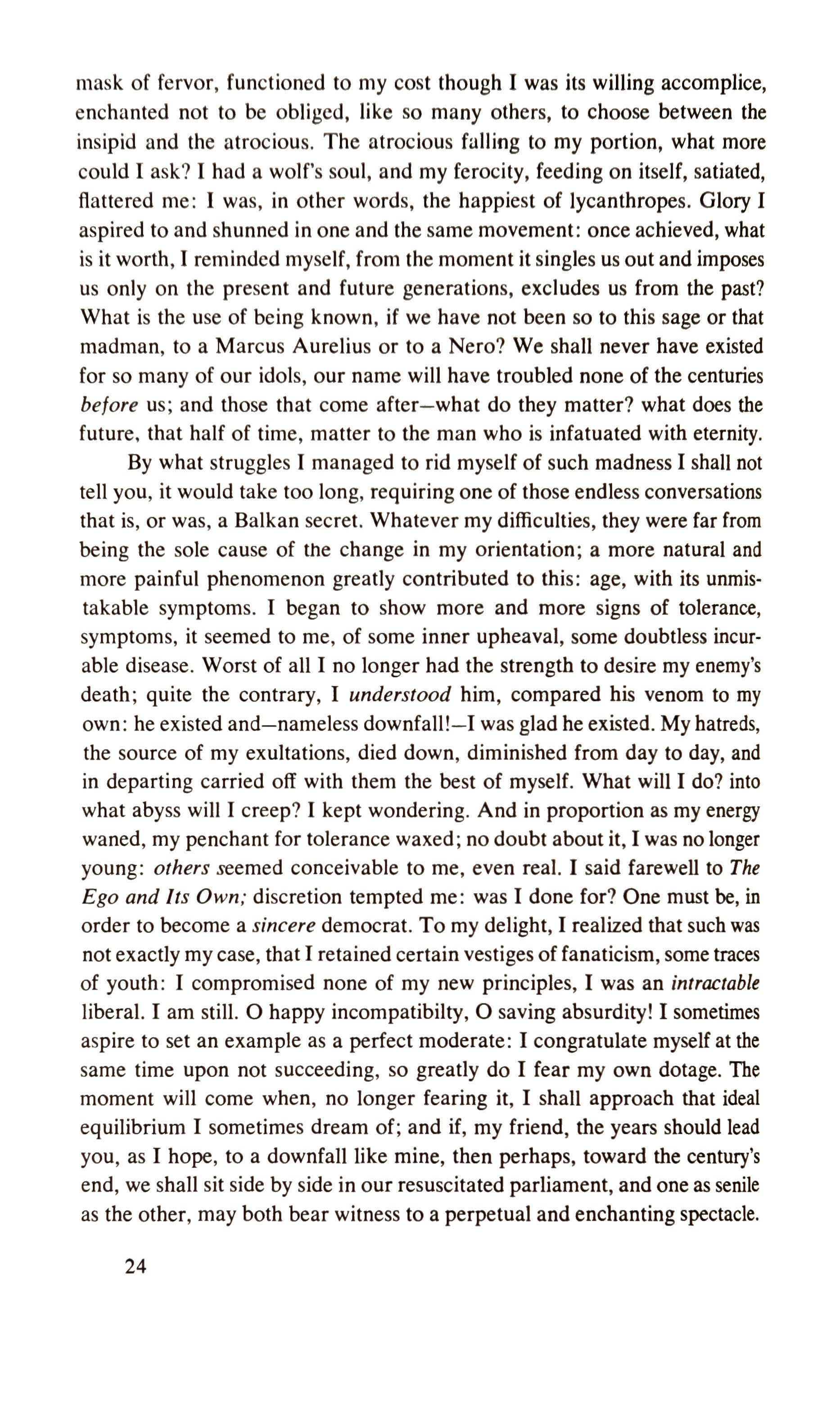
mask of fervor, functioned to my cost though I was its willing accomplice, enchanted not to be obliged, like so many others, to choose between the insipid and the atrocious. The atrocious falling to my portion, what more could I ask? I had a wolf's soul, and my ferocity, feeding on itself, satiated, flattered me: I was, in other words, the happiest of lycanthropes. Glory I aspired to and shunned in one and the same movement: once achieved, what is it worth, I reminded myself, from the moment it singles us out and imposes us only on the present and future generations, excludes us from the past? What is the use of being known, if we have not been so to this sage or that madman, to a Marcus Aurelius or to a Nero? We shall never have existed for so many of our idols, our name will have troubled none of the centuries before us; and those that come after what do they matter? what does the future, that half of time, matter to the man who is infatuated with eternity. By what struggles I managed to rid myself of such madness I shall not tell you, it would take too long, requiring one of those endless conversations that is, or was, a Balkan secret. Whatever my difficulties, they were far from being the sole cause of the change in my orientation; a more natural and more painful phenomenon greatly contributed to this: age, with its unmistakable symptoms. I began to show more and more signs of tolerance, symptoms, it seemed to me, of some inner upheaval, some doubtless incurable disease. Worst of all I no longer had the strength to desire my enemy's death; quite the contrary, I understood him, compared his venom to my own: he existed and nameless downfall! I was glad he existed. My hatreds, the source of my exultations, died down, diminished from day to day, and in departing carried off with them the best of myself. What will I do? into what abyss will I creep? I kept wondering. And in proportion as my energy waned, my penchant for tolerance waxed; no doubt about it, I was no longer young: others seemed conceivable to me, even real. I said farewell to The Ego and Its Own,' discretion tempted me: was I done for? One must be, in order to become a sincere democrat. To my delight, I realized that such was not exactly my case, that I retained certain vestiges of fanaticism, some traces of youth: I compromised none of my new principles, I was an intractable liberal. I am still. 0 happy incompatibilty, 0 saving absurdity! I sometimes aspire to set an example as a perfect moderate: I congratulate myself at the same time upon not succeeding, so greatly do I fear my own dotage. The moment will come when, no longer fearing it, I shall approach that ideal equilibrium I sometimes dream of; and if, my friend, the years should lead you, as I hope, to a downfall like mine, then perhaps, toward the century's end, we shall sit side by side in our resuscitated parliament, and one as senile as the other, may both bear witness to a perpetual and enchanting spectacle.
24
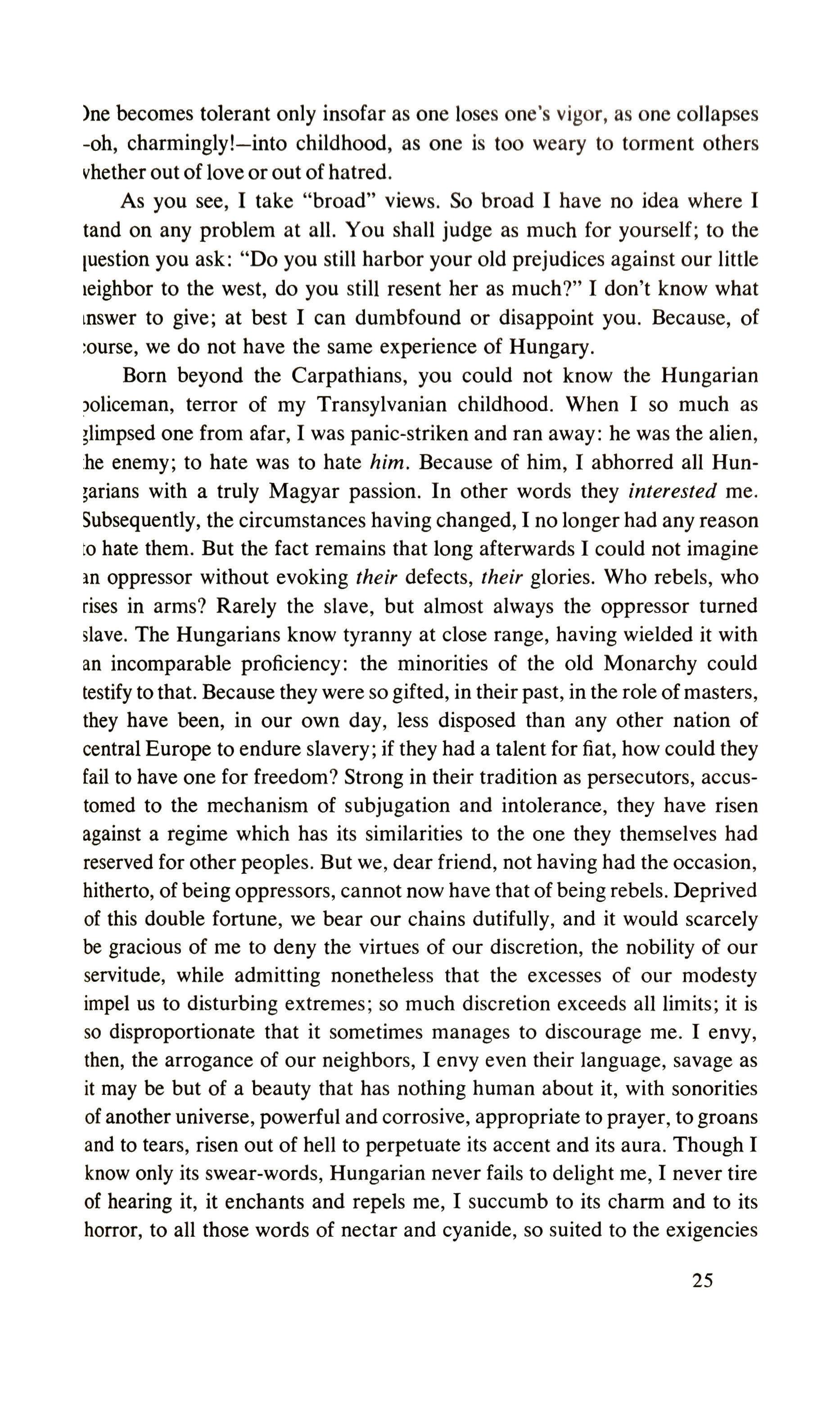
)ne becomes tolerant only insofar as one loses one's vigor, as one collapses -oh, charmingly! into childhood, as one is too weary to torment others vhether out of love or out of hatred.
As you see, I take "broad" views. So broad I have no idea where I tand on any problem at all. You shall judge as much for yourself; to the [uestion you ask: "Do you still harbor your old prejudices against our little ieighbor to the west, do you still resent her as much?" I don't know what inswer to give; at best I can dumbfound or disappoint you. Because, of .ourse, we do not have the same experience of Hungary.
Born beyond the Carpathians, you could not know the Hungarian ooliceman, terror of my Transylvanian childhood. When I so much as �limpsed one from afar, I was panic-striken and ran away: he was the alien, he enemy; to hate was to hate him. Because of him, I abhorred all Hun�arians with a truly Magyar passion. In other words they interested me. Subsequently, the circumstances having changed, I no longer had any reason to hate them. But the fact remains that long afterwards I could not imagine in oppressor without evoking their defects, their glories. Who rebels, who rises in arms? Rarely the slave, but almost always the oppressor turned slave. The Hungarians know tyranny at close range, having wielded it with an incomparable proficiency: the minorities of the old Monarchy could testify to that. Because they were so gifted, in their past, in the role of masters, they have been, in our own day, less disposed than any other nation of central Europe to endure slavery; if they had a talent for fiat, how could they fail to have one for freedom? Strong in their tradition as persecutors, accustomed to the mechanism of subjugation and intolerance, they have risen against a regime which has its similarities to the one they themselves had reserved for other peoples. But we, dear friend, not having had the occasion, hitherto, of being oppressors, cannot now have that of being rebels. Deprived of this double fortune, we bear our chains dutifully, and it would scarcely be gracious of me to deny the virtues of our discretion, the nobility of our servitude, while admitting nonetheless that the excesses of our modesty impel us to disturbing extremes; so much discretion exceeds all limits; it is so disproportionate that it sometimes manages to discourage me. I envy, then, the arrogance of our neighbors, I envy even their language, savage as it may be but of a beauty that has nothing human about it, with sonorities of another universe, powerful and corrosive, appropriate to prayer, to groans and to tears, risen out of hell to perpetuate its accent and its aura. Though I know only its swear-words, Hungarian never fails to delight me, I never tire of hearing it, it enchants and repels me, I succumb to its charm and to its horror, to all those words of nectar and cyanide, so suited to the exigencies
25
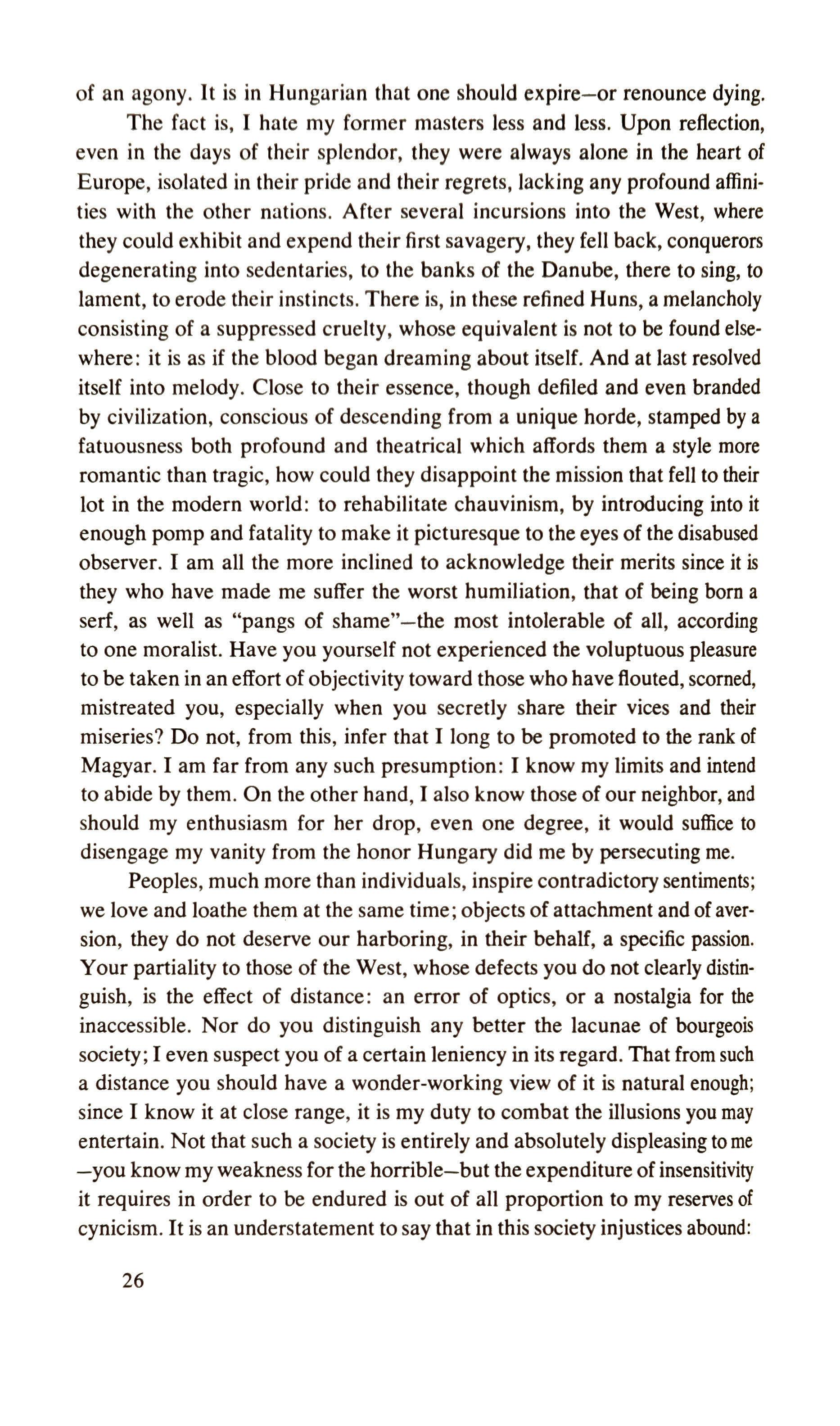
of an agony. It is in Hungarian that one should expire or renounce dying. The fact is, I hate my former masters less and less. Upon reflection, even in the days of their splendor, they were always alone in the heart of Europe, isolated in their pride and their regrets, lacking any profound affinities with the other nations. After several incursions into the West, where they could exhibit and expend their first savagery, they fell back, conquerors degenerating into sedentaries, to the banks of the Danube, there to sing, to lament, to erode their instincts. There is, in these refined Huns, a melancholy consisting of a suppressed cruelty, whose equivalent is not to be found elsewhere: it is as if the blood began dreaming about itself. And at last resolved itself into melody. Close to their essence, though defiled and even branded by civilization, conscious of descending from a unique horde, stamped by a fatuousness both profound and theatrical which affords them a style more romantic than tragic, how could they disappoint the mission that fell to their lot in the modern world: to rehabilitate chauvinism, by introducing into it enough pomp and fatality to make it picturesque to the eyes of the disabused observer. I am all the more inclined to acknowledge their merits since it is they who have made me suffer the worst humiliation, that of being born a serf, as well as "pangs of shame" the most intolerable of all, according to one moralist. Have you yourself not experienced the voluptuous pleasure to be taken in an effort of objectivity toward those who have flouted, scorned, mistreated you, especially when you secretly share their vices and their miseries? Do not, from this, infer that I long to be promoted to the rank of Magyar. I am far from any such presumption: I know my limits and intend to abide by them. On the other hand, I also know those of our neighbor, and should my enthusiasm for her drop, even one degree, it would suffice to disengage my vanity from the honor Hungary did me by persecuting me. Peoples, much more than individuals, inspire contradictory sentiments; we love and loathe them at the same time; objects of attachment and of aversion, they do not deserve our harboring, in their behalf, a specific passion. Your partiality to those of the West, whose defects you do not clearly distinguish, is the effect of distance: an error of optics, or a nostalgia for the inaccessible. Nor do you distinguish any better the lacunae of bourgeois society; I even suspect you of a certain leniency in its regard. That from such a distance you should have a wonder-working view of it is natural enough; since I know it at close range, it is my duty to combat the illusions you may entertain. Not that such a society is entirely and absolutely displeasing to me -you know my weakness for the horrible but the expenditure of insensitivity it requires in order to be endured is out of all proportion to my reserves of cynicism. It is an understatement to say that in this society injustices abound:
26
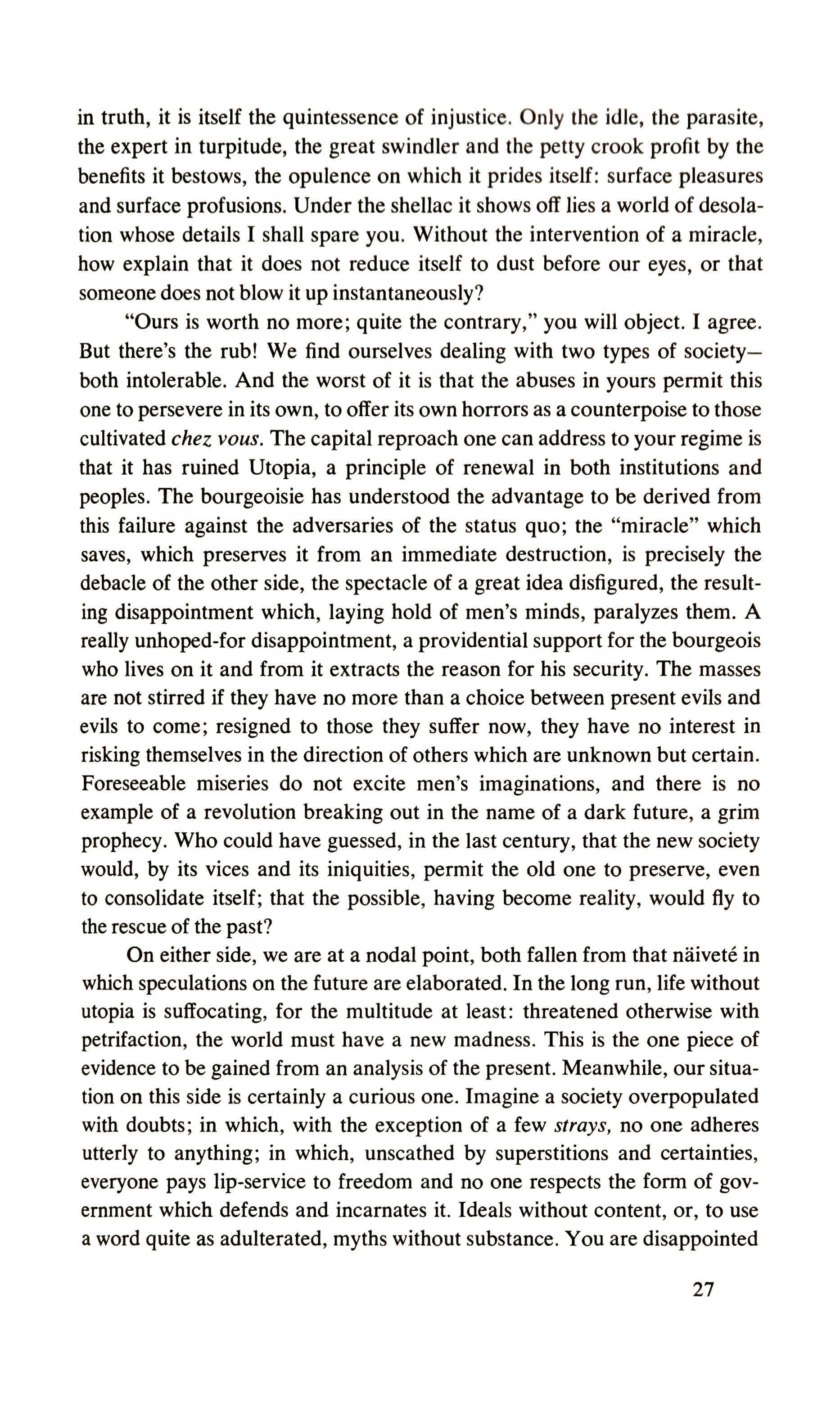
in truth, it is itself the quintessence of injustice. Only the idle, the parasite, the expert in turpitude, the great swindler and the petty crook profit by the benefits it bestows, the opulence on which it prides itself: surface pleasures and surface profusions. Under the shellac it shows off lies a world of desolation whose details I shall spare you. Without the intervention of a miracle, how explain that it does not reduce itself to dust before our eyes, or that someone does not blow it up instantaneously?
"Ours is worth no more; quite the contrary," you will object. I agree. But there's the rub! We find ourselves dealing with two types of societyboth intolerable. And the worst of it is that the abuses in yours permit this one to persevere in its own, to offer its own horrors as a counterpoise to those cultivated chez vous. The capital reproach one can address to your regime is that it has ruined Utopia, a principle of renewal in both institutions and peoples. The bourgeoisie has understood the advantage to be derived from this failure against the adversaries of the status quo; the "miracle" which saves, which preserves it from an immediate destruction, is precisely the debacle of the other side, the spectacle of a great idea disfigured, the resulting disappointment which, laying hold of men's minds, paralyzes them. A really unhoped-for disappointment, a providential support for the bourgeois who lives on it and from it extracts the reason for his security. The masses are not stirred if they have no more than a choice between present evils and evils to come; resigned to those they suffer now, they have no interest in risking themselves in the direction of others which are unknown but certain. Foreseeable miseries do not excite men's imaginations, and there is no example of a revolution breaking out in the name of a dark future, a grim prophecy. Who could have guessed, in the last century, that the new society would, by its vices and its iniquities, permit the old one to preserve, even to consolidate itself; that the possible, having become reality, would fly to the rescue of the past?
On either side, we are at a nodal point, both fallen from that naivete in which speculations on the future are elaborated. In the long run, life without utopia is suffocating, for the multitude at least: threatened otherwise with petrifaction, the world must have a new madness. This is the one piece of evidence to be gained from an analysis of the present. Meanwhile, our situation on this side is certainly a curious one. Imagine a society overpopulated with doubts; in which, with the exception of a few strays, no one adheres utterly to anything; in which, unscathed by superstitions and certainties, everyone pays lip-service to freedom and no one respects the form of government which defends and incarnates it. Ideals without content, or, to use a word quite as adulterated, myths without substance. You are disappointed
27

after promises which could not be kept; we, by a lack of any promises at all. At least we are aware of the advantage the intelligence gains from a regime which, for the moment, lets it function as it will, without submitting it to the rigors of any imperative. The bourgeois believes in nothing, true enough; but this truth is, I daresay, the positive side of his vacuum, for freedom can only be manifested in the void of beliefs, in the absence of axioms, and only where the laws have no more authority than a hypothesis. If you were to object that the bourgeois nonetheless believes in something, that money perfectly fulfills, for him, the function of a dogma, I should reply that this worst of all dogmas is, strange as it may seem, the one that is the most endurable for the mind. We forgive others their wealth if, in exchange, they let us starve to death in our own way. No, it is not so sinister, this society which pays no attention to you, which abandons you, guarantees you the right to attack it, invites you, even obliges you to do so in its hours of sloth when it lacks energy to execrate itself. As indifferent, in the last instance, to its own fate as to yours, it is in no way eager to infringe upon your misfortunes, neither to reduce nor to aggravate them, and if it exploits you, it does so by an automatism, without premeditation or spite, as is appropriate to weary and satiated brutes that are as contaminated by skepticism as their victims. The difference between regimes is less important than it appears; you are alone by force, we without constraint. Is the gap so wide between an inferno and a ravaging paradise? All societies are bad; but there are degrees, I admit, and if I have chosen this one, it is because I can distinguish among the nuances of trumpery.
Freedom, I was saying, demands, in order to manifest itself, a vacuum; it requires a void and succumbs to it. The condition which determines is the very one which annihilates it. It lacks foundations; the more complete it is, the more it overhangs an abyss, for everything threatens it, down to the principle from which it derives. Man is so little made to endure or deserve it, that the very benefits he receives from it crush him, and freedom ultimately burdens him to the point where he prefers, to its excesses, those of terror. To these disadvantages are added others: a liberal society, eliminating "mystery," "the absolute," "order," and possessing a true metaphysic no more than a true police, casts the individual back upon himself, while dividing him from what he is, from his own depths. If such a society lacks roots, if it is essentially superficial, this is because freedom, fragile in itself, has no means of maintaining itself, of surviving the dangers which threaten it from without and from within; it appears, moreover, only in the twilight of a regime, only at the moment when a class is declining, dissolving: it was the collapse of the aristocracy which allowed the Eighteenth Century to
28
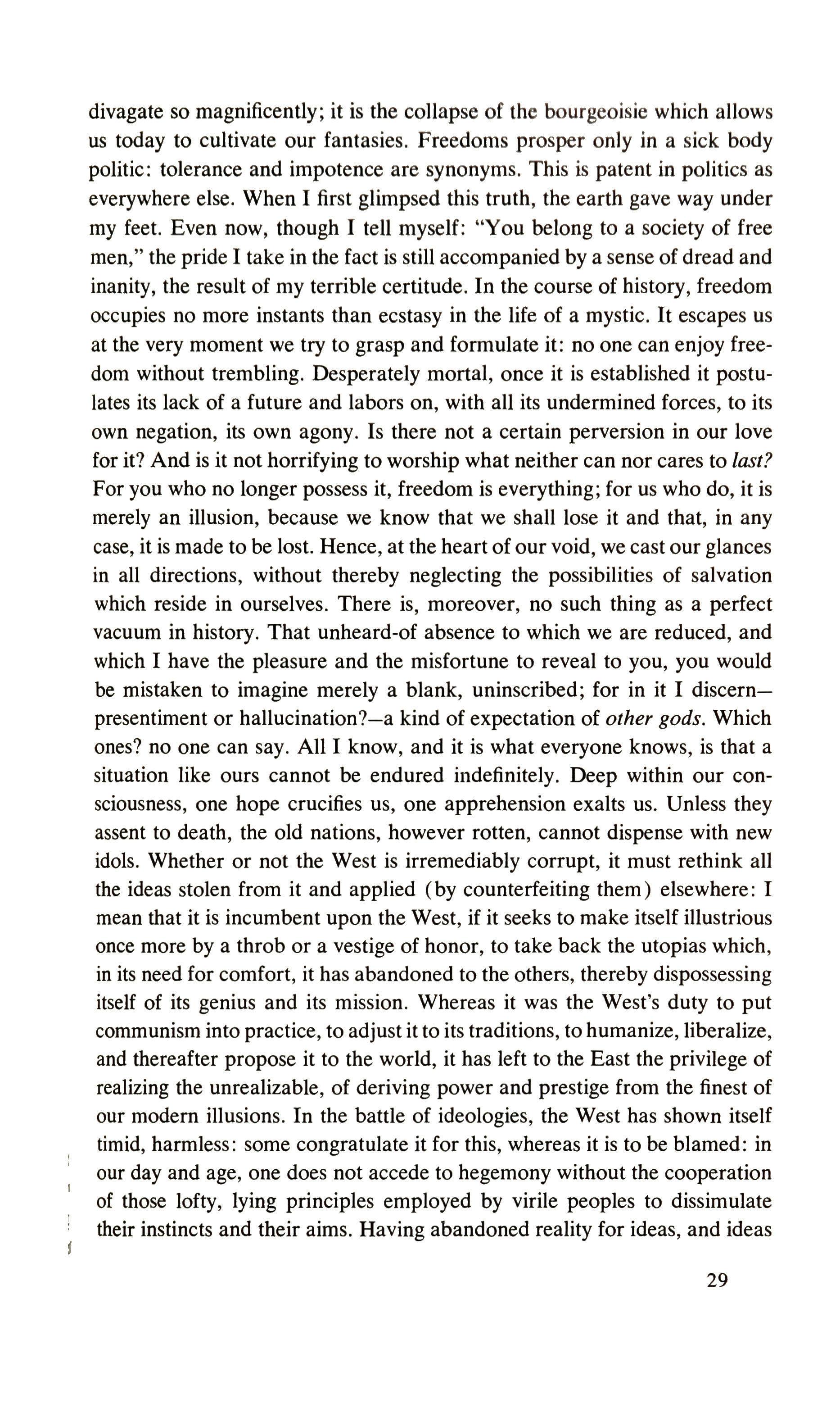
divagate so magnificently; it is the collapse of the bourgeoisie which allows us today to cultivate our fantasies. Freedoms prosper only in a sick body politic: tolerance and impotence are synonyms. This is patent in politics as everywhere else. When I first glimpsed this truth, the earth gave way under my feet. Even now, though I tell myself: "You belong to a society of free men," the pride I take in the fact is still accompanied by a sense of dread and inanity, the result of my terrible certitude. In the course of history, freedom occupies no more instants than ecstasy in the life of a mystic. It escapes us at the very moment we try to grasp and formulate it: no one can enjoy freedom without trembling. Desperately mortal, once it is established it postulates its lack of a future and labors on, with all its undermined forces, to its own negation, its own agony. Is there not a certain perversion in our love for it? And is it not horrifying to worship what neither can nor cares to last? For you who no longer possess it, freedom is everything; for us who do, it is merely an illusion, because we know that we shall lose it and that, in any case, it is made to be lost. Hence, at the heart of our void, we cast our glances in all directions, without thereby neglecting the possibilities of salvation which reside in ourselves. There is, moreover, no such thing as a perfect vacuum in history. That unheard-of absence to which we are reduced, and which I have the pleasure and the misfortune to reveal to you, you would be mistaken to imagine merely a blank, uninscribed; for in it I discernpresentiment or hallucination? a kind of expectation of other gods. Which ones? no one can say. All I know, and it is what everyone knows, is that a situation like ours cannot be endured indefinitely. Deep within our consciousness, one hope crucifies us, one apprehension exalts us. Unless they assent to death, the old nations, however rotten, cannot dispense with new idols. Whether or not the West is irremediably corrupt, it must rethink all the ideas stolen from it and applied (by counterfeiting them) elsewhere: I mean that it is incumbent upon the West, if it seeks to make itself illustrious once more by a throb or a vestige of honor, to take back the utopias which, in its need for comfort, it has abandoned to the others, thereby dispossessing itself of its genius and its mission. Whereas it was the West's duty to put communism into practice, to adjust it to its traditions, to humanize, liberalize, and thereafter propose it to the world, it has left to the East the privilege of realizing the unrealizable, of deriving power and prestige from the finest of our modern illusions. In the battle of ideologies, the West has shown itself timid, harmless: some congratulate it for this, whereas it is to be blamed: in our day and age, one does not accede to hegemony without the cooperation of those lofty, lying principles employed by virile peoples to dissimulate their instincts and their aims. Having abandoned reality for ideas, and ideas
I
I I j 29
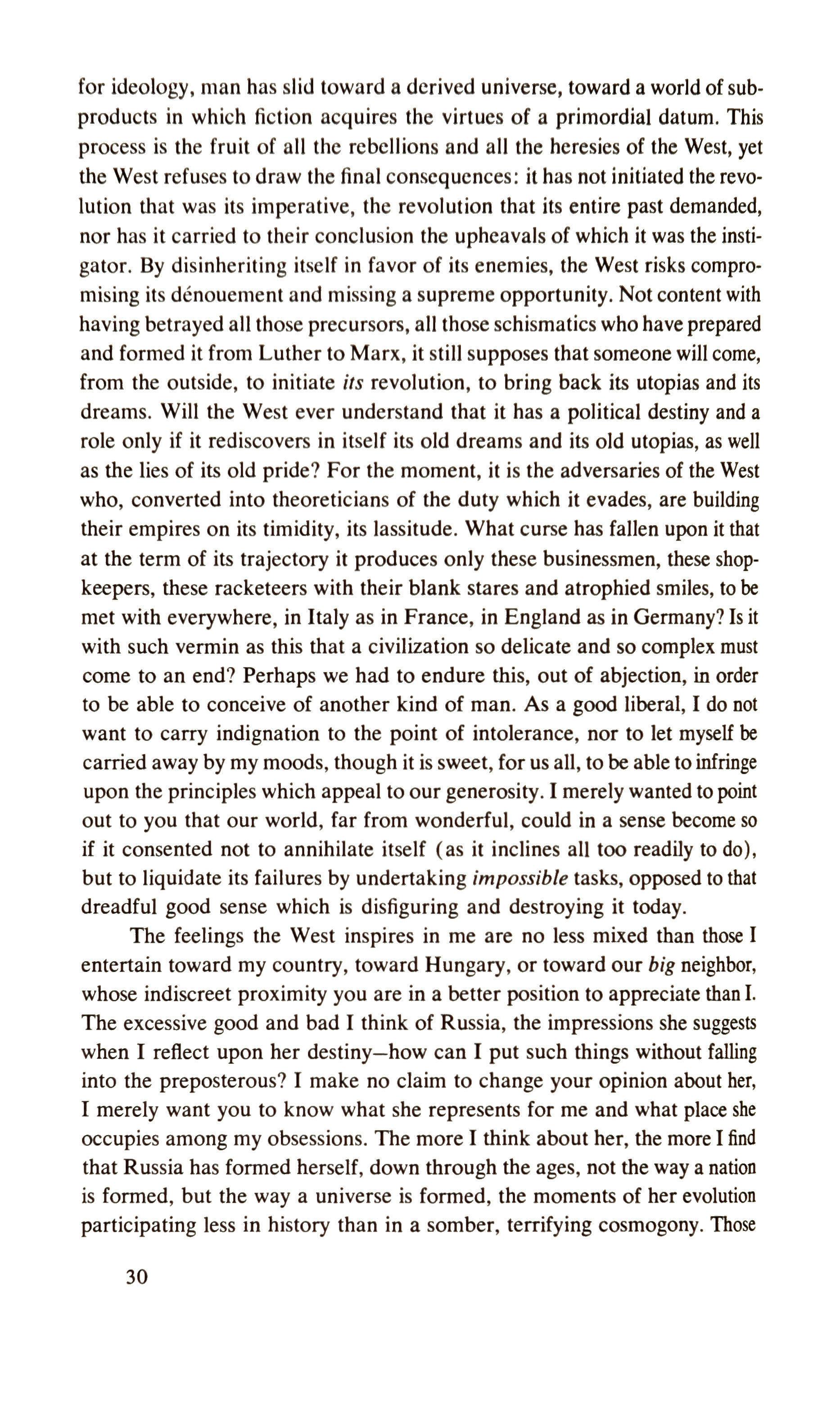
for ideology, man has slid toward a derived universe, toward a world of subproducts in which fiction acquires the virtues of a primordial datum. This process is the fruit of all the rebellions and all the heresies of the West, yet the West refuses to draw the final consequences: it has not initiated the revolution that was its imperative, the revolution that its entire past demanded, nor has it carried to their conclusion the upheavals of which it was the instigator. By disinheriting itself in favor of its enemies, the West risks compromising its denouement and missing a supreme opportunity. Not content with having betrayed all those precursors, all those schismatics who have prepared and formed it from Luther to Marx, it still supposes that someone will come, from the outside, to initiate its revolution, to bring back its utopias and its dreams. Will the West ever understand that it has a political destiny and a role only if it rediscovers in itself its old dreams and its old utopias, as well as the lies of its old pride? For the moment, it is the adversaries of the West who, converted into theoreticians of the duty which it evades, are building their empires on its timidity, its lassitude. What curse has fallen upon it that at the term of its trajectory it produces only these businessmen, these shopkeepers, these racketeers with their blank stares and atrophied smiles, to be met with everywhere, in Italy as in France, in England as in Germany? Is it with such vermin as this that a civilization so delicate and so complex must come to an end? Perhaps we had to endure this, out of abjection, in order to be able to conceive of another kind of man. As a good liberal, I do not want to carry indignation to the point of intolerance, nor to let myself be carried away by my moods, though it is sweet, for us all, to be able to infringe upon the principles which appeal to our generosity. I merely wanted to point out to you that our world, far from wonderful, could in a sense become so if it consented not to annihilate itself (as it inclines all too readily to do), but to liquidate its failures by undertaking impossible tasks, opposed to that dreadful good sense which is disfiguring and destroying it today.
The feelings the West inspires in me are no less mixed than those I entertain toward my country, toward Hungary, or toward our big neighbor, whose indiscreet proximity you are in a better position to appreciate than I. The excessive good and bad I think of Russia, the impressions she suggests when I reflect upon her destiny how can I put such things without falling into the preposterous? I make no claim to change your opinion about her, I merely want you to know what she represents for me and what place she occupies among my obsessions. The more I think about her, the more I find that Russia has formed herself, down through the ages, not the way a nation is formed, but the way a universe is formed, the moments of her evolution participating less in history than in a somber, terrifying cosmogony. Those
30
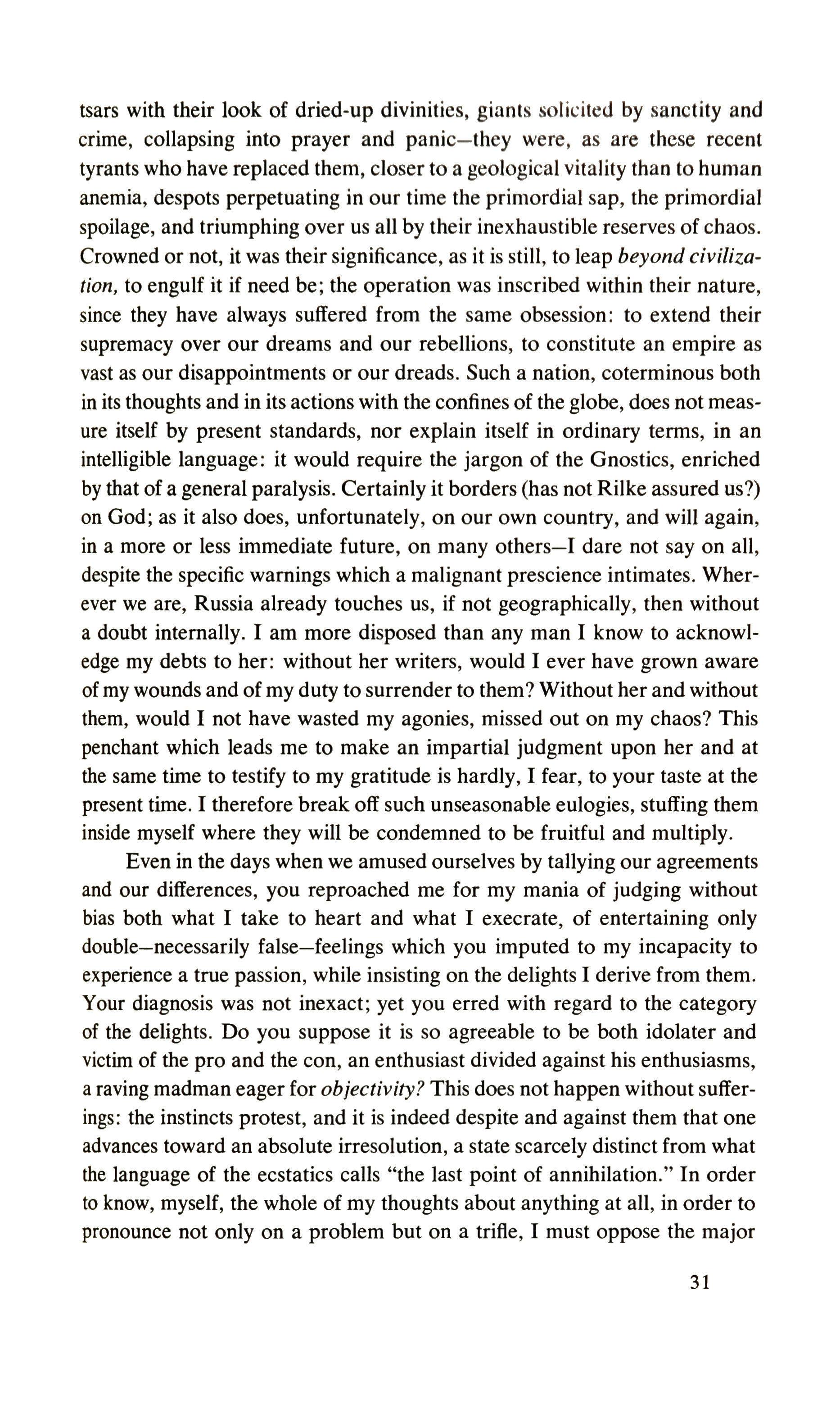
tsars with their look of dried-up divinities, giants solicited by sanctity and crime, collapsing into prayer and panic they were, as are these recent tyrants who have replaced them, closer to a geological vitality than to human anemia, despots perpetuating in our time the primordial sap, the primordial spoilage, and triumphing over us all by their inexhaustible reserves of chaos. Crowned or not, it was their significance, as it is still, to leap beyond civilization, to engulf it if need be; the operation was inscribed within their nature, since they have always suffered from the same obsession: to extend their supremacy over our dreams and our rebellions, to constitute an empire as vast as our disappointments or our dreads. Such a nation, coterminous both in its thoughts and in its actions with the confines of the globe, does not measure itself by present standards, nor explain itself in ordinary terms, in an intelligible language: it would require the jargon of the Gnostics, enriched by that of a general paralysis. Certainly it borders (has not Rilke assured us?) on God; as it also does, unfortunately, on our own country, and will again, in a more or less immediate future, on many others I dare not say on all, despite the specific warnings which a malignant prescience intimates. Wherever we are, Russia already touches us, if not geographically, then without a doubt internally. I am more disposed than any man I know to acknowledge my debts to her: without her writers, would I ever have grown aware of my wounds and of my duty to surrender to them? Without her and without them, would I not have wasted my agonies, missed out on my chaos? This penchant which leads me to make an impartial judgment upon her and at the same time to testify to my gratitude is hardly, I fear, to your taste at the present time. I therefore break off such unseasonable eulogies, stuffing them inside myself where they will be condemned to be fruitful and multiply, Even in the days when we amused ourselves by tallying our agreements and our differences, you reproached me for my mania of judging without bias both what I take to heart and what I execrate, of entertaining only double necessarily false feelings which you imputed to my incapacity to experience a true passion, while insisting on the delights I derive from them. Your diagnosis was not inexact; yet you erred with regard to the category of the delights. Do you suppose it is so agreeable to be both idolater and victim of the pro and the con, an enthusiast divided against his enthusiasms, a raving madman eager for objectivity? This does not happen without sufferings: the instincts protest, and it is indeed despite and against them that one advances toward an absolute irresolution, a state scarcely distinct from what the language of the ecstatics calls "the last point of annihilation." In order to know, myself, the whole of my thoughts about anything at all, in order to pronounce not only on a problem but on a trifle, I must oppose the major
31
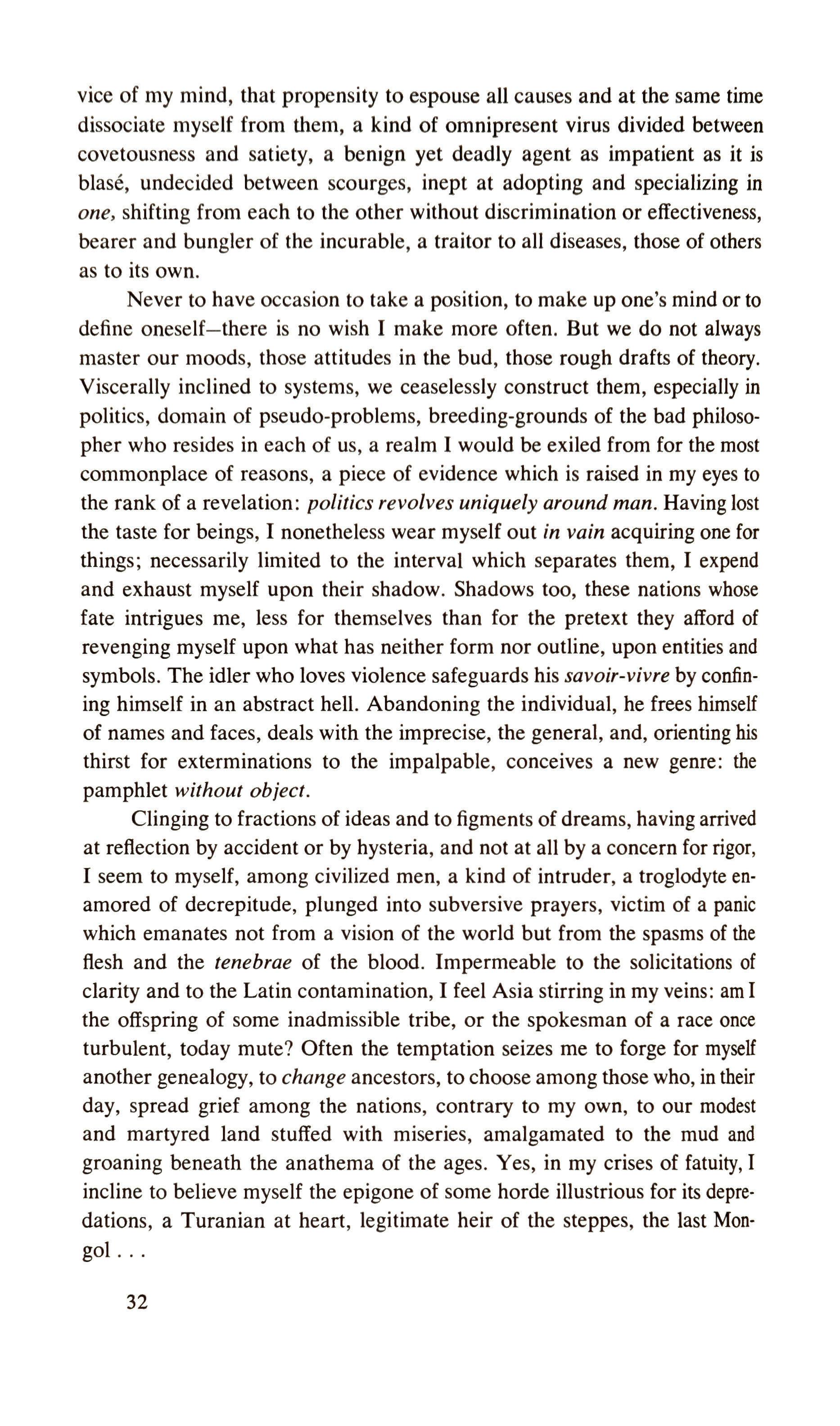
vice of my mind, that propensity to espouse all causes and at the same time dissociate myself from them, a kind of omnipresent virus divided between covetousness and satiety, a benign yet deadly agent as impatient as it is blase, undecided between scourges, inept at adopting and specializing in one, shifting from each to the other without discrimination or effectiveness, bearer and bungler of the incurable, a traitor to all diseases, those of others as to its own.
Never to have occasion to take a position, to make up one's mind or to define oneself there is no wish I make more often. But we do not always master our moods, those attitudes in the bud, those rough drafts of theory. Viscerally inclined to systems, we ceaselessly construct them, especially in politics, domain of pseudo-problems, breeding-grounds of the bad philosopher who resides in each of us, a realm I would be exiled from for the most commonplace of reasons, a piece of evidence which is raised in my eyes to the rank of a revelation: politics revolves uniquely around man. Having lost the taste for beings, I nonetheless wear myself out in vain acquiring one for things; necessarily limited to the interval which separates them, I expend and exhaust myself upon their shadow. Shadows too, these nations whose fate intrigues me, less for themselves than for the pretext they afford of revenging myself upon what has neither form nor outline, upon entities and symbols. The idler who loves violence safeguards his savoir-vivre by confining himself in an abstract hell. Abandoning the individual, he frees himself of names and faces, deals with the imprecise, the general, and, orienting his thirst for exterminations to the impalpable, conceives a new genre: the pamphlet without object.
Clinging to fractions of ideas and to figments of dreams, having arrived at reflection by accident or by hysteria, and not at all by a concern for rigor, I seem to myself, among civilized men, a kind of intruder, a troglodyte enamored of decrepitude, plunged into subversive prayers, victim of a panic which emanates not from a vision of the world but from the spasms of the flesh and the tenebrae of the blood. Impermeable to the solicitations of clarity and to the Latin contamination, I feel Asia stirring in my veins: am I the offspring of some inadmissible tribe, or the spokesman of a race once turbulent, today mute? Often the temptation seizes me to forge for myself another genealogy, to change ancestors, to choose among those who, in their day, spread grief among the nations, contrary to my own, to our modest and martyred land stuffed with miseries, amalgamated to the mud and groaning beneath the anathema of the ages. Yes, in my crises of fatuity, I incline to believe myself the epigone of some horde illustrious for its depredations, a Turanian at heart, legitimate heir of the steppes, the last Mongol
32
I would not end here without once again warning you against the enthusiasm or the jealousy my "luck" inspires in you, specifically the opportunity to loll in a city whose memory doubtless haunts you, despite your roots in our evaporated country. This city, which I would exchange for no other in the world, is for that very reason the source of my misfortunes. All that is not Paris being equal in my eyes, I often regret that wars have spared it, that it has not perished like so many others. Destroyed, it would have rid me of the happiness of living here, I could have spent my days elsewhere, at the ends of the earth. I shall never forgive Paris for having bound me to space, for making me from somewhere. Mind you, I am not forgetting for a moment that four-fifths of its inhabitants, as Chamfort has already noted, "die of grief." I should add further, for your edification, that the remaining fifth, the privileged few of whom I am one, are no different in their feelings, and that they even envy that majority its advantage of knowing of what to die.
translated by Richard Howard
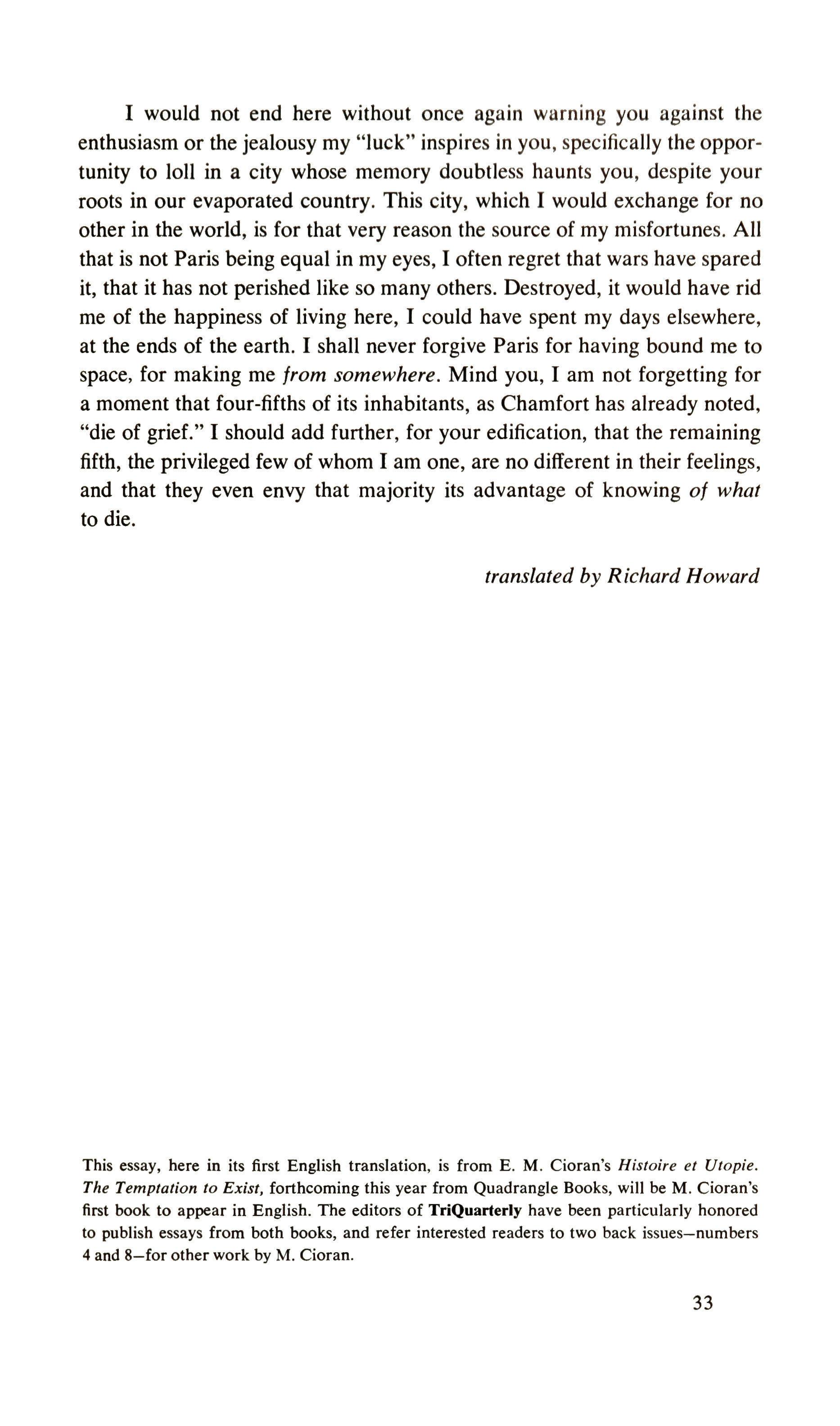
This essay, here in its first English translation, is from E. M. Cioran's Histoire et Utopie. The Temptation to Exist, forthcoming this year from Quadrangle Books, will be M. Cioran's first book to appear in English. The editors of TriQuarterly have been particularly honored to publish essays from both books, and refer interested readers to two back issues-numbers 4 and 8-for other work by M. Cioran.
33
an

Only the little town remains beyond all shock and dazzle only this little still stands calm.
Row on row, the gray frame cottages, sheds
And small barns of an old Dutch town. Brownish-red Houses with stepped gables and with high stoops, With white or yellow doors. Plane over plane, The angled roofs, receding, old as a memory what flowers were blossoming, how the fruit trees bore,' had the nightingale been heard yet,' the text of Father's sermon Edge over edge, slate roofs ascending Like the planes of a deteIInined head, Like stone stairs converging, step by step, To its still dead-center, hurricane's eye, This village chapel tiny as a child's toy
And as a far
There is something about Father narrow-minded, icy-cold, like iron Face by face, its quartz-blue Salients upholding that slim spire into The sky's rush, keen as your mother's needle Pricking the horizon, mast firm in breaking Waters, some lighthouse How could I possibly be in any way of any use to anyone? I am good for something! where there shines
No light.
Poems by W. D. Snodgrass. Copyright � 1968 by W. D. Snodgrass.
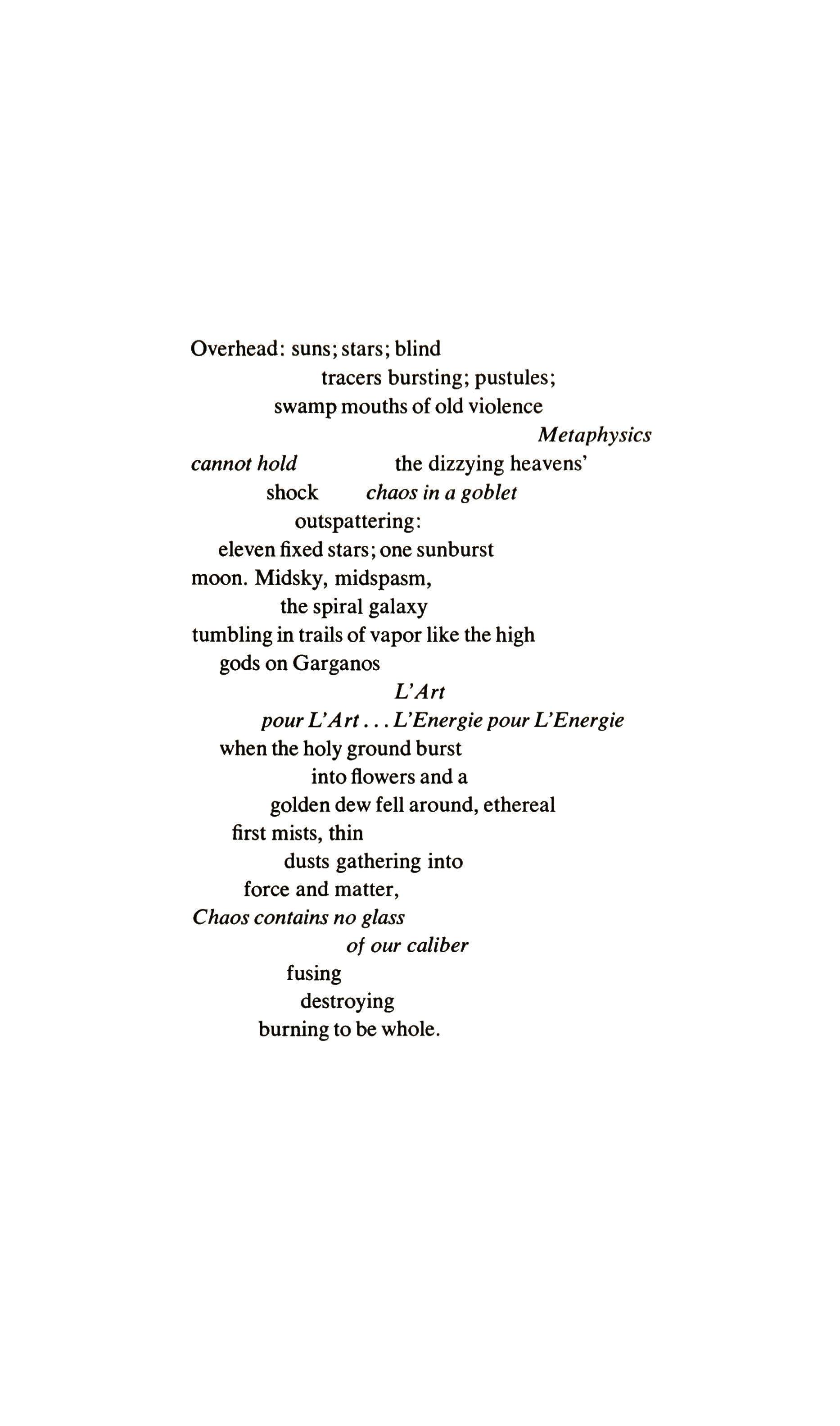
Overhead: suns; stars; blind tracers bursting; pustules; swamp mouths of old violence
Metaphysics
cannot hold the dizzying heavens' shock chaos in a goblet outspattering: eleven fixed stars; one sunburst moon. Midsky, midspasm, the spiral galaxy tumbling in trails of vapor like the high gods on Garganos
L'Art
pour L'Art L'Energie pour L'Energie when the holy ground burst into flowers and a golden dew fell around, ethereal first mists, thin dusts gathering into force and matter, Chaos contains no glass of our caliber fusing destroying burning to be whole.
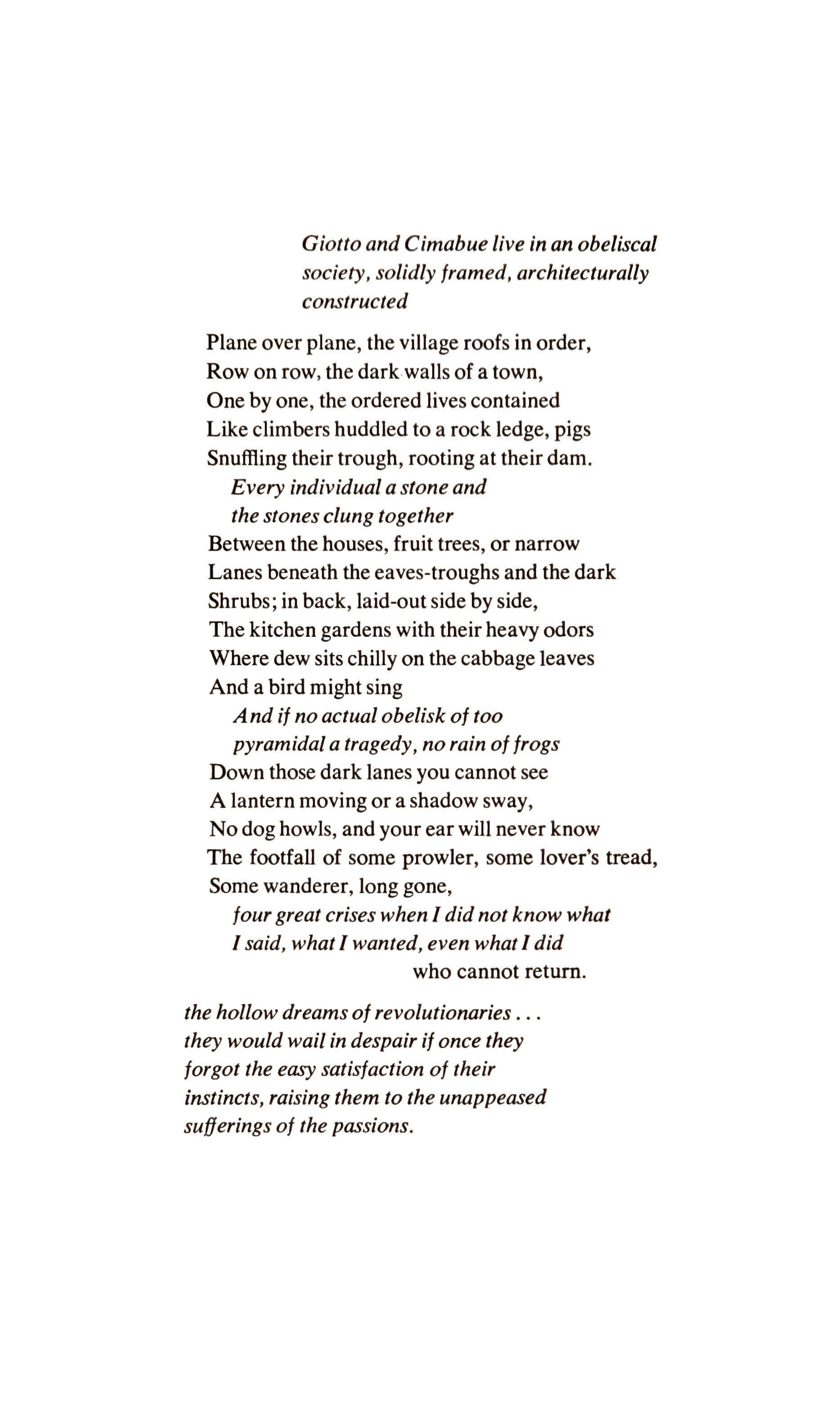
Giotto and Cimabue live in an obeliscal society. solidly framed. architecturally constructed
Plane over plane, the village roofs in order, Row on row. the dark walls of a town, One by one, the ordered lives contained Like climbers huddled to a rock ledge, pigs Snuffling their trough, rooting at their dam. Every individual a stone and the stones clung together
Between the houses, fruit trees, or narrow Lanes beneath the eaves-troughs and the dark Shrubs; in back, laid-out side by side, The kitchen gardens with their heavy odors Where dew sits chilly on the cabbage leaves And a bird mightsing
And if no actual obelisk of too pyramidal a tragedy, no rain offrogs Down those dark lanes you cannot see A lantern moving or a shadow sway, No dog howls, and your ear will never know The footfall of some prowler, some lover's tread, Some wanderer, long gone, fourgreat crises when I did not know what I said, what I wanted, even what I did who cannot retur n.
the hollow dreams of revolutionaries they would wail in despair if once they forgot the easy satisfaction of their instincts, raising them to the unappeased sufferings of the passions.
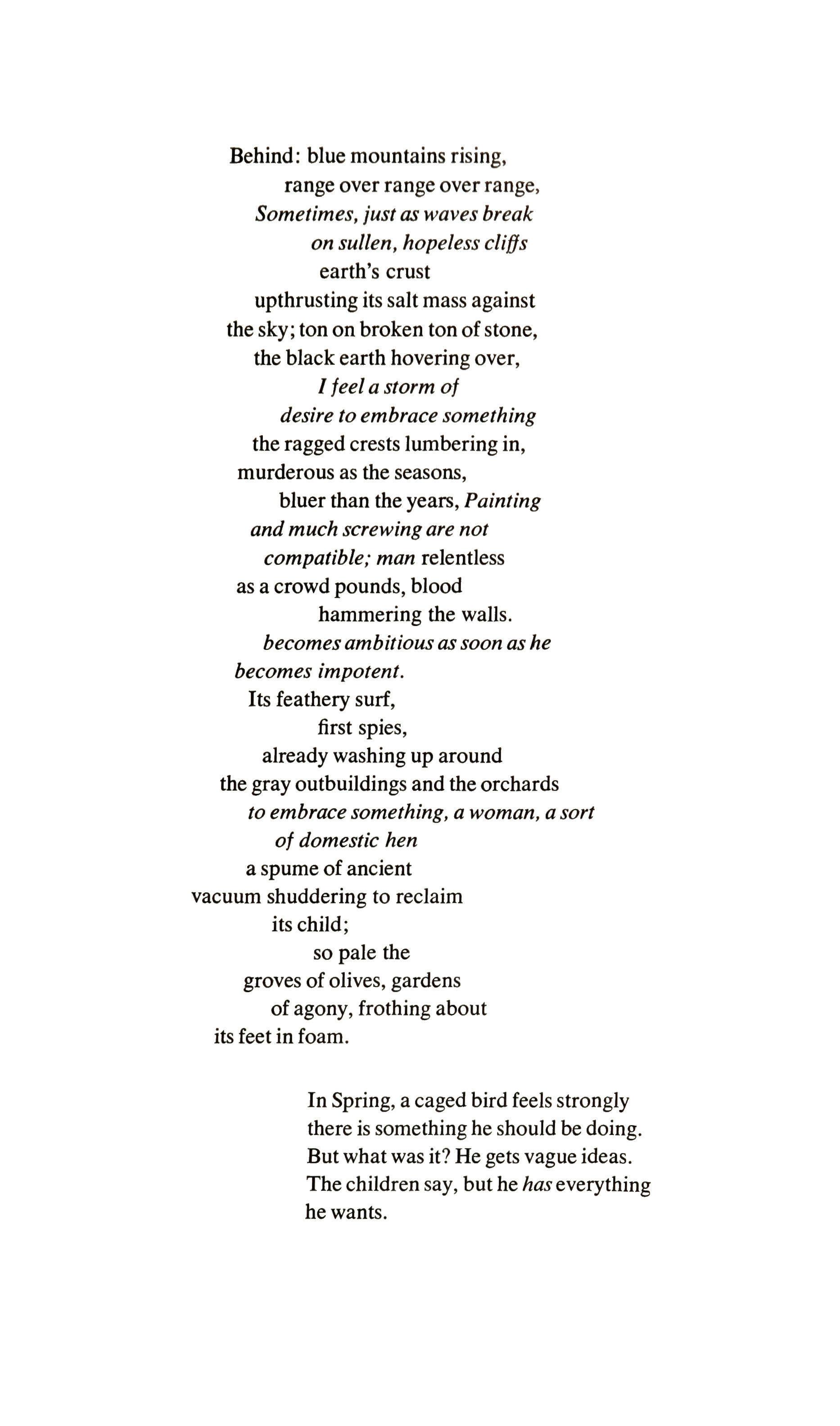
Behind: blue mountains rising, range over range over range, Sometimes, just as waves break on sullen, hopeless cliffs earth's crust
upthrusting its salt mass against the sky; ton on broken ton of stone, the black earth hovering over, I feel a storm of desire to embrace something the ragged crests lumbering in, murderous as the seasons, bluer than the years, Painting and much screwing are not compatible,· man relentless as a crowd pounds, blood hammering the walls. becomesambitious as soon as he becomes impotent. Its feathery surf, first spies, already washing up around the gray outbuildings and the orchards to embrace something, a woman, a sort of domestic hen a spume of ancient vacuum shuddering to reclaim its child; so pale the groves of olives, gardens of agony, frothing about its feet in foam.
In Spring, a caged bird feels strongly there is something he should be doing. But what was it? He gets vague ideas. The children say, but he has everything he wants.
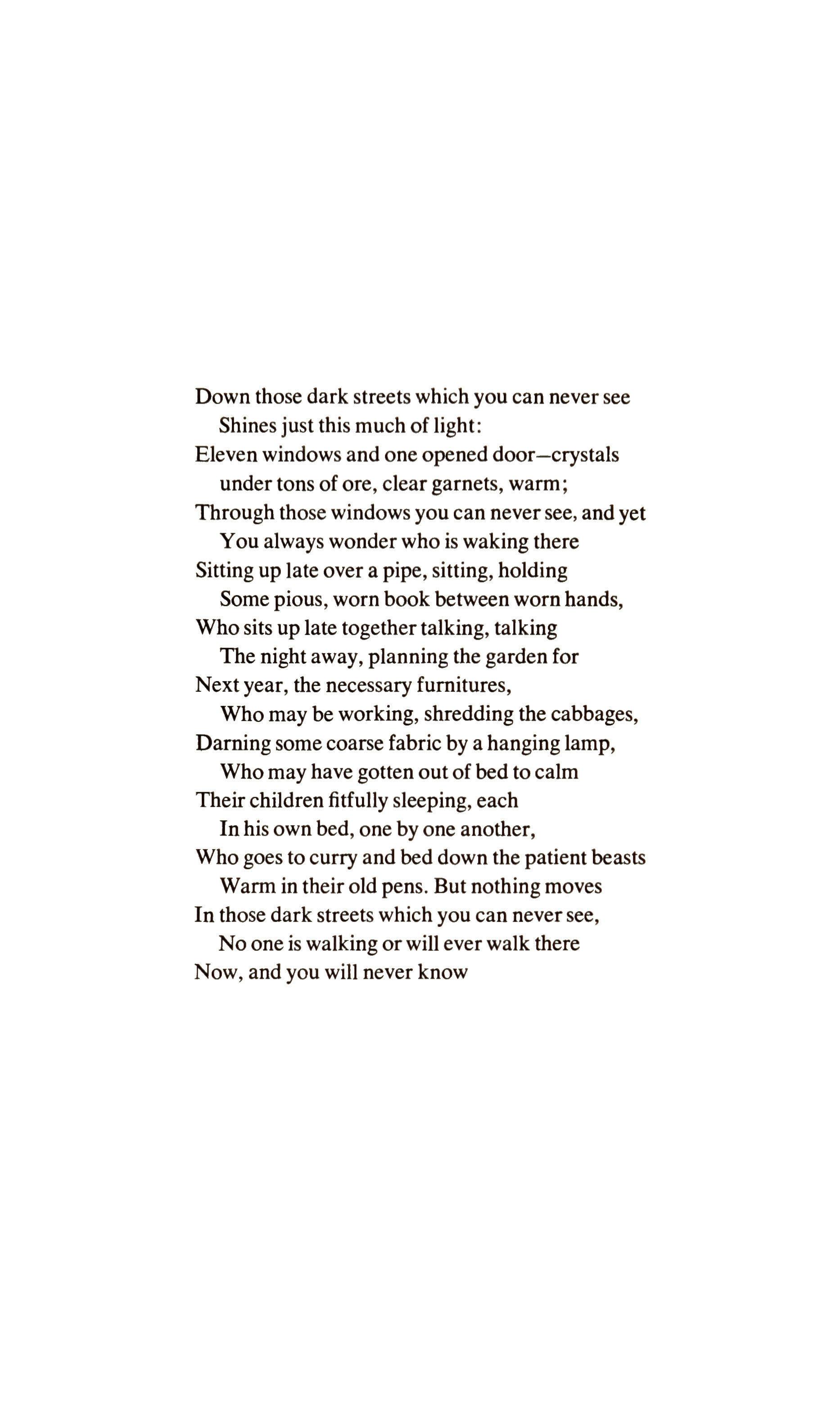
Down those dark streets which you can never see
Shines just this much of light: Eleven windows and one opened door crystals under tons of ore, clear garnets, warm; Through those windows you can never see, and yet You always wonder who is waking there
Sitting up late over a pipe, sitting, holding Some pious, worn book between worn hands, Who sits up late togethertalking, talking The night away, planning the garden for Next year, the necessary fumitures, Who may be working, shredding the cabbages, Darning some coarse fabric by a hanging lamp, Who may have gotten out of bed to calm Their children fitfully sleeping, each In his own bed, one by one another, Who goes to curry and bed down the patient beasts Warm in their old pens. But nothing moves In those dark streets which you can never see, No one is walking or will ever walk there Now, and you will never know
Before: one black tree between you and the town: one cypress mocks the thin blue spire, licking up like flame the green metabolism of this forest sword that drives you from the town.
I have sown a little garden of poppies, sweet peas and mignonette. Now we must wait and see what comes of it.
Still, though, the little town, how peacefully It lies under the watchful eyes of that Fierce heaven.
And the poor baby, too, whom I had cared for as if he were my own
Nothing moves there yet, yet How separate, how floating like a raft, like Seaweed drifting outward on the tide, already Dim, half gone, We take death to reach a star diminishing into Some middle distance of the past. Some canvasses that will retain their calm even in the catastrophe.
And still so calm and still so still
Z66 heen kan gaan.
 W. D. SNODGRASS
W. D. SNODGRASS
This poem contains many quotations from Van Gogh's letters and ends with his last words. This phrase could mean, "This is the way to go," "I'd like to die like this," or "I want to go home."
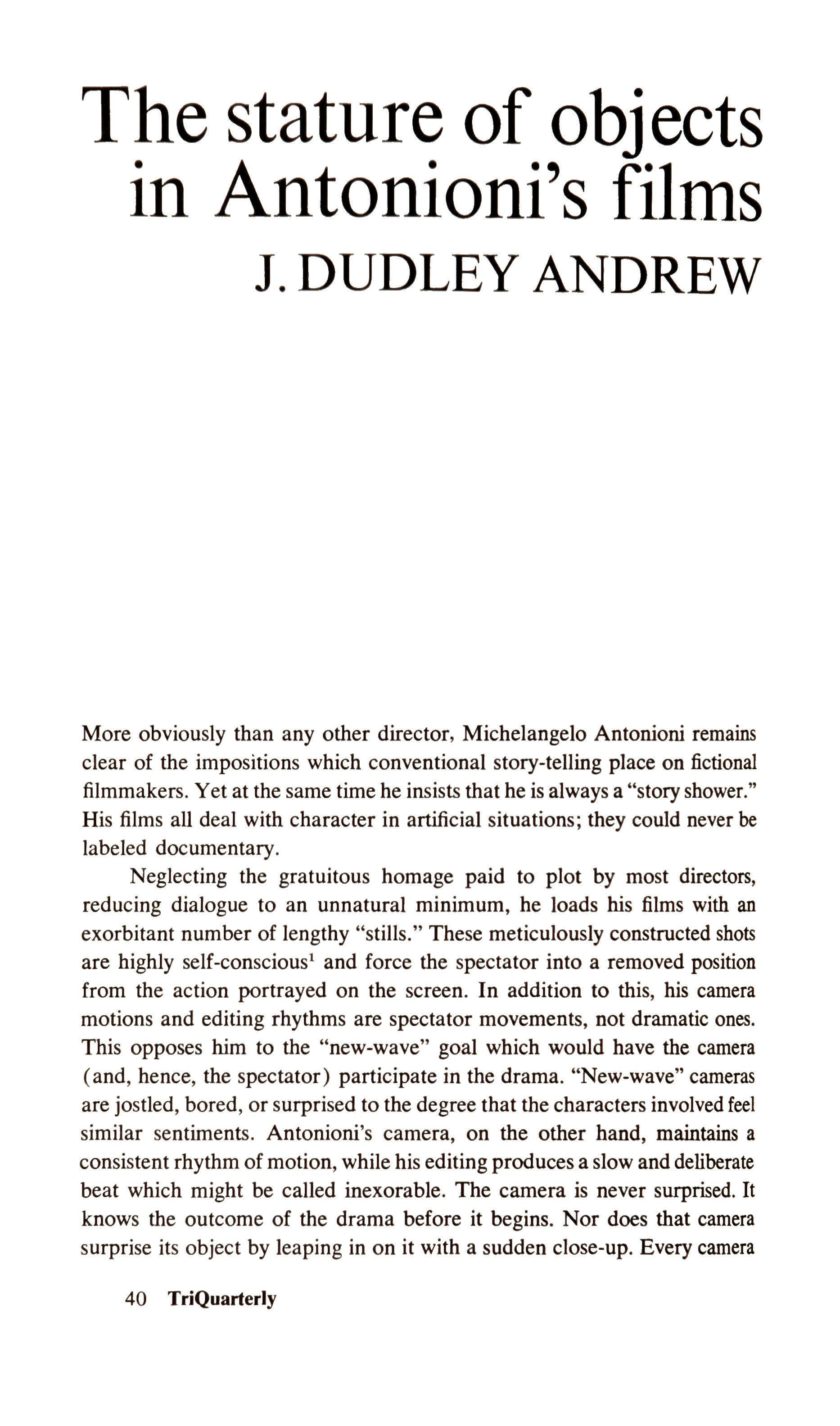
More obviously than any other director, Michelangelo Antonioni remains clear of the impositions which conventional story-telling place on fictional filmmakers. Yet at the same time he insists that he is always a "story shower." His films all deal with character in artificial situations; they could never be labeled documentary.
Neglecting the gratuitous homage paid to plot by most directors, reducing dialogue to an unnatural minimum, he loads his films with an exorbitant number of lengthy "stills." These meticulously constructed shots are highly self-conscious' and force the spectator into a removed position from the action portrayed on the screen. In addition to this, his camera motions and editing rhythms are spectator movements, not dramatic ones. This opposes him to the "new-wave" goal which would have the camera (and, hence, the spectator) participate in the drama. "New-wave" cameras are jostled, bored, or surprised to the degree that the characters involved feel similar sentiments. Antonioni's camera, on the other hand, maintains a consistent rhythm of motion, while his editing produces a slow and deliberate beat which might be called inexorable. The camera is never surprised. It knows the outcome of the drama before it begins. Nor does that camera surprise its object by leaping in on it with a sudden close-up. Every camera
40 TriQuarterly
•

movement is rather the result of deliberate and careful planning, in that there is never movement without significant pictorial development.
His camera, then, as ideal spectator, knows precisely what to look for (and consequently what to reveal) in a given situation and in an entire film. But what precisely does it look for? Certainly not plotted drama, for each of his films since II Grido contains scenes which are inconsequential to the story line proper. Certainly not fact or verite, for each of these films is obviously controlled regarding detail, color, dialogue and peripheral motion. Indeed his films are controlled and stylized to the degree that they form an independent and self-sufficient universe in which just certain chosen articles appear, in which just certain words are spoken. Instead his camera looks to discover character, to probe motivation, to establish a manner of existing in a given situation.
Antonioni's early works parallel to some degree those of Alexandre Astruc in that they both focus on "moments of crisis." But whereas Astruc has since merely perfected his exposition of such moments, has improved his technique, Antonioni has sought to uncover the motivations and personal effects of these moments. � Indeed he has literally neutralized dramatic power in deference to psychological study. His films have become entirely "vertical" in emphasis.
The psychological studies he pursues in his films are valid only in the structures of those individual films. He literally creates a universe in which characters can act and be observed. He does not resort to the distortion of an otherwise objective reality as Fellini has done in 81/2. Instead he includes in his universe only those objects, shapes, and colors which satisfy the relationship he wishes to establish between his character and the world. The physical structures of this world becomes the driving force against which the character stands. The ensemble of objects may oppose or ratify the character's feelings, but in any case they are directly related to those feelings. Indeed every motivation in his films is object-oriented, for the world pictured on the screen is the total world for the characters on the screen. It encompasses every possibility open to them. We might echo Jean Mitry: a film is not a story cut out of the world; it is rather a world built around a story."
The primary concern of each film he has made is the particular relation it sees between the characters and the objects it presents them. Every frame corroborates and re-inforces that relationship, giving it physical power. The drama carries this relationship out to its conclusion (or to a conclusion) imparting the strength of the whole film to what has been shown again and again within the individual scenes. Action is thereby subservient to a state of existence, although it presents the physical situations which harbor that
41
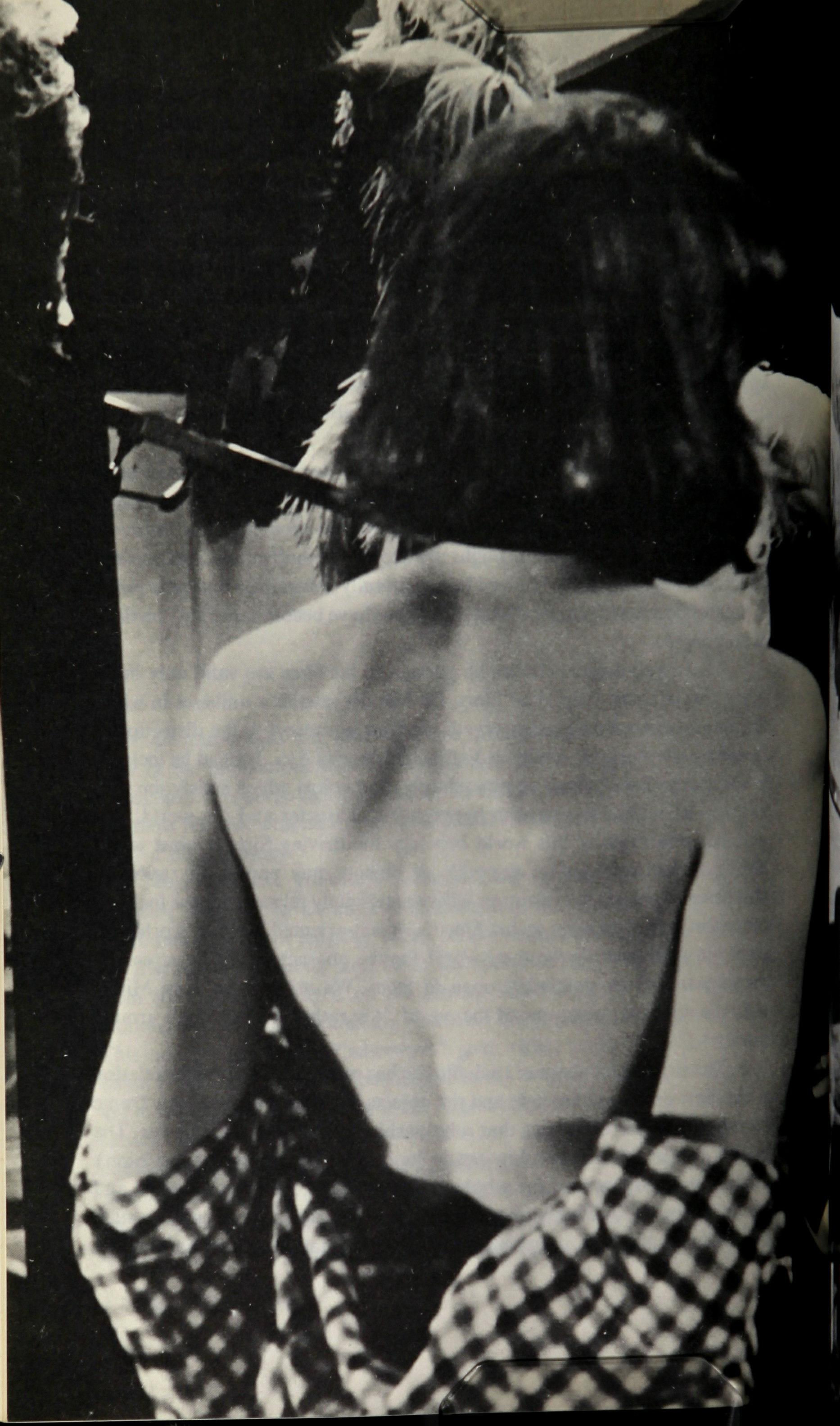
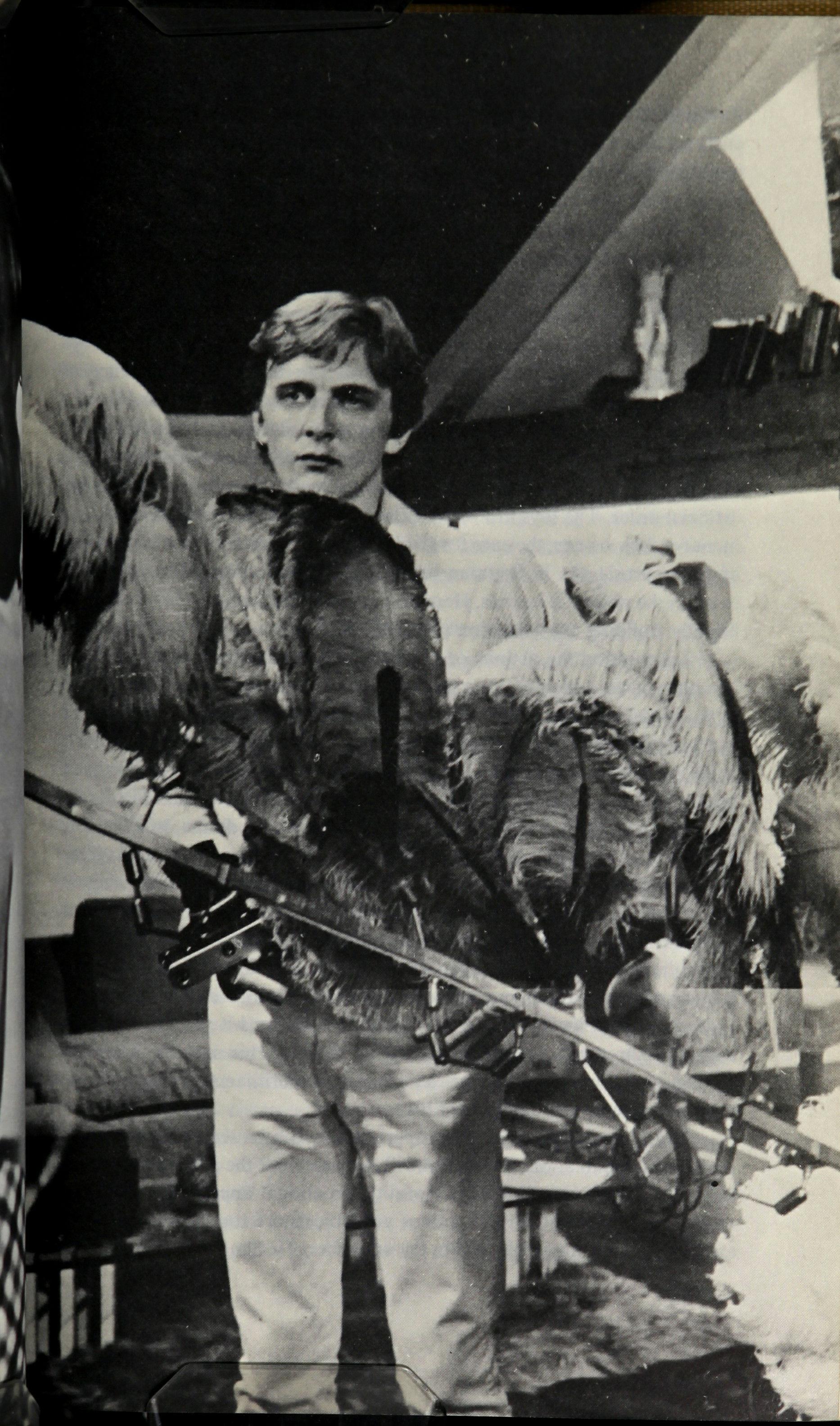
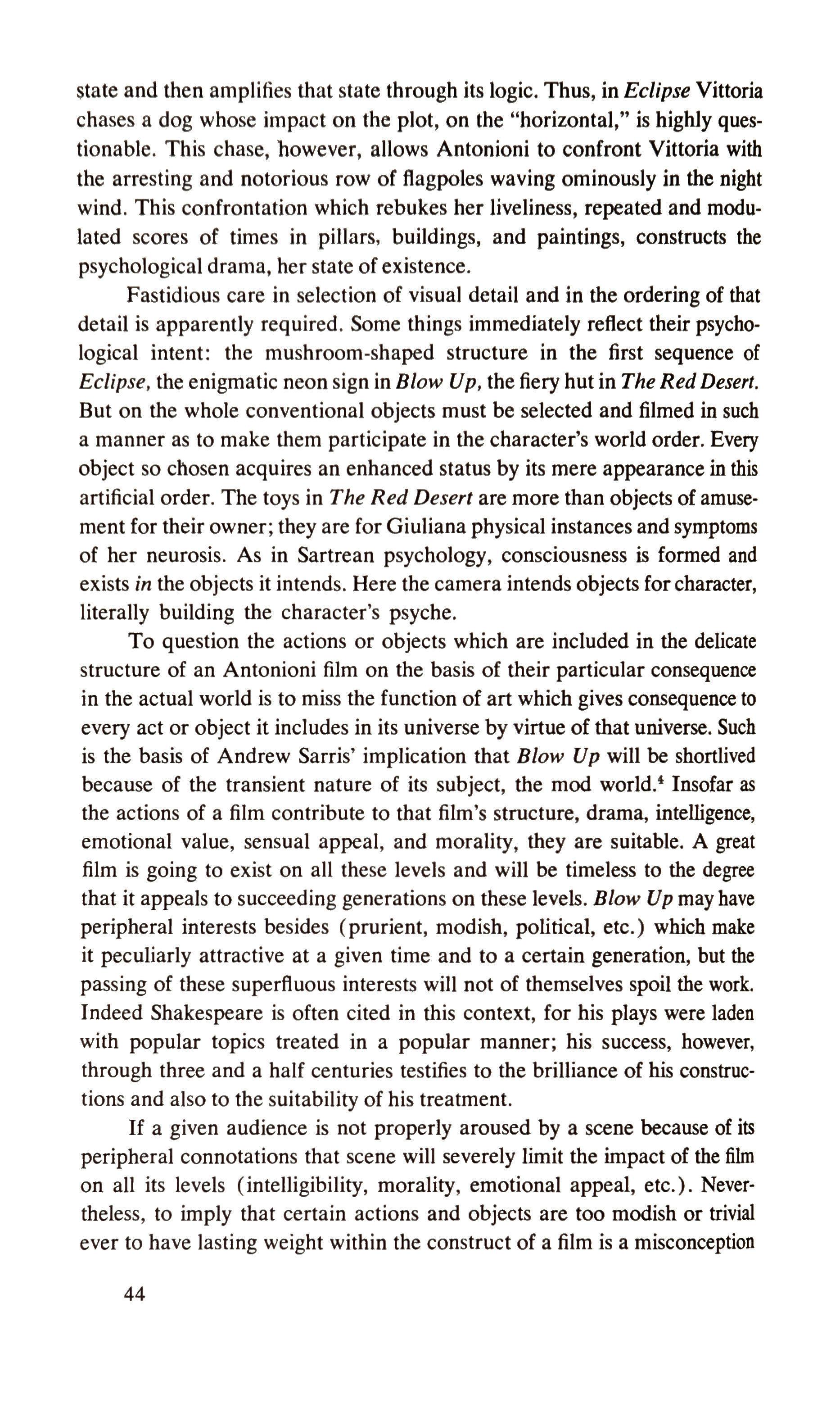
state and then amplifies that state through its logic. Thus, in Eclipse Vittoria chases a dog whose impact on the plot, on the "horizontal," is highly questionable. This chase, however, allows Antonioni to confront Vittoria with the arresting and notorious row of flagpoles waving ominously in the night wind. This confrontation which rebukes her liveliness, repeated and modulated scores of times in pillars, buildings, and paintings, constructs the psychological drama, her state of existence.
Fastidious care in selection of visual detail and in the ordering of that detail is apparently required. Some things immediately reflect their psychological intent: the mushroom-shaped structure in the first sequence of Eclipse, the enigmatic neon sign in Blow Up, the fiery hut in The Red Desert. But on the whole conventional objects must be selected and filmed in such a manner as to make them participate in the character's world order. Every object so chosen acquires an enhanced status by its mere appearance in this artificial order. The toys in The Red Desert are more than objects of amusement for their owner; they are for Giuliana physical instances and symptoms of her neurosis. As in Sartrean psychology, consciousness is formed and exists in the objects it intends. Here the camera intends objects for character, literally building the character's psyche.
To question the actions or objects which are included in the delicate structure of an Antonioni film on the basis of their particular consequence in the actual world is to miss the function of art which gives consequence to every act or object it includes in its universe by virtue of that universe. Such is the basis of Andrew Sarris' implication that Blow Up will be shortlived because of the transient nature of its subject, the mod world.' Insofar as the actions of a film contribute to that film's structure, drama, intelligence, emotional value, sensual appeal, and morality, they are suitable. A great film is going to exist on all these levels and will be timeless to the degree that it appeals to succeeding generations on these levels. Blow Up may have peripheral interests besides (prurient, modish, political, etc.) which make it peculiarly attractive at a given time and to a certain generation, but the passing of these superfluous interests will not of themselves spoil the work. Indeed Shakespeare is often cited in this context, for his plays were laden with popular topics treated in a popular manner; his success, however, through three and a half centuries testifies to the brilliance of his constructions and also to the suitability of his treatment.
If a given audience is not properly aroused by a scene because of its peripheral connotations that scene will severely limit the impact of the film on all its levels (intelligibility, morality, emotional appeal, etc.). Nevertheless, to imply that certain actions and objects are too modish or trivial ever to have lasting weight within the construct of a film is a misconception
44
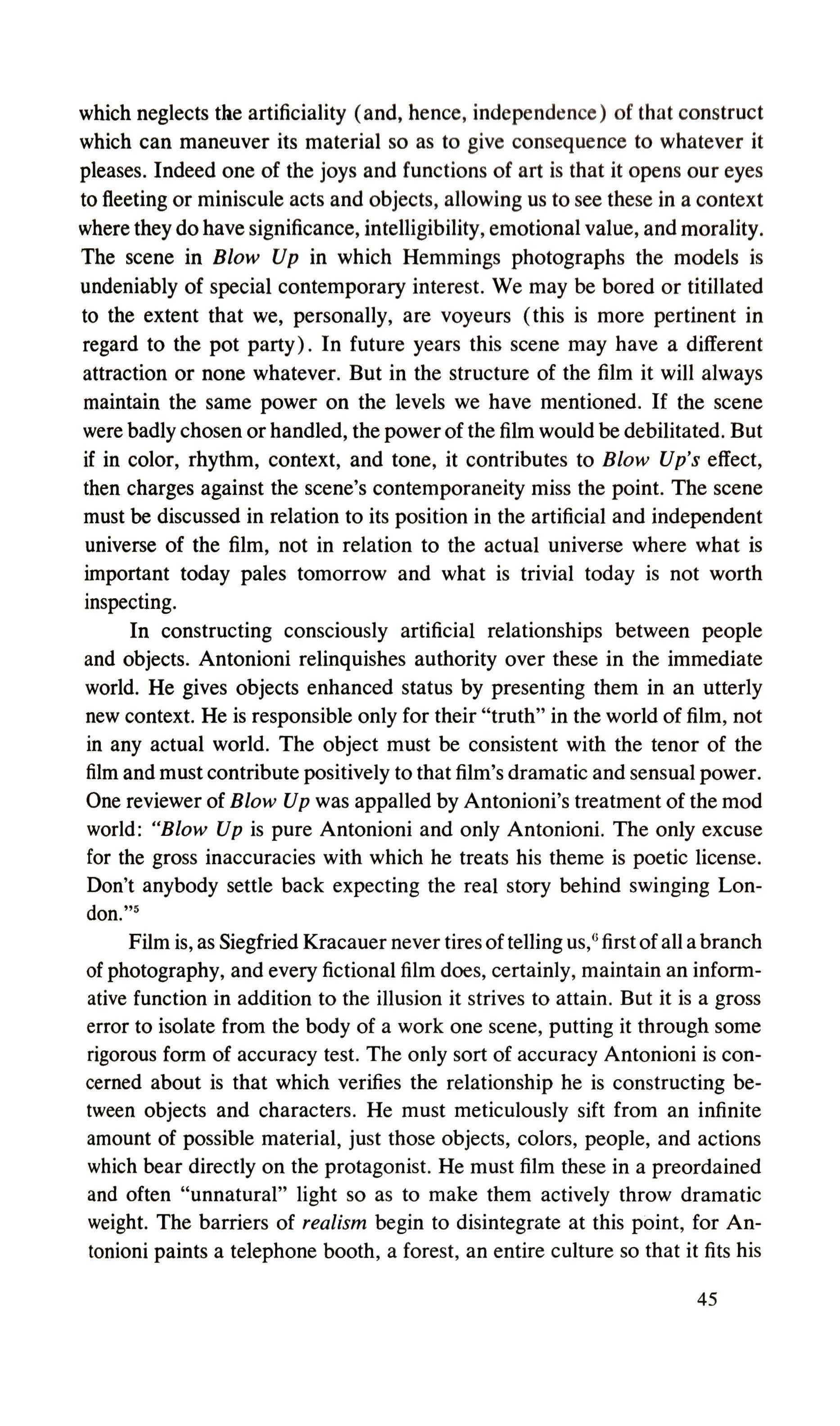
which neglects the artificiality (and, hence, independence) of that construct which can maneuver its material so as to give consequence to whatever it pleases. Indeed one of the joys and functions of art is that it opens our eyes to fleeting or miniscule acts and objects, allowing us to see these in a context where they do have significance, intelligibility, emotional value, and morality. The scene in Blow Up in which Hemmings photographs the models is undeniably of special contemporary interest. We may be bored or titillated to the extent that we, personally, are voyeurs (this is more pertinent in regard to the pot party). In future years this scene may have a different attraction or none whatever. But in the structure of the film it will always maintain the same power on the levels we have mentioned. If the scene were badly chosen or handled, the powerof the film would be debilitated. But if in color, rhythm, context, and tone, it contributes to Blow Up's effect, then charges against the scene's contemporaneity miss the point. The scene must be discussed in relation to its position in the artificial and independent universe of the film, not in relation to the actual universe where what is important today pales tomorrow and what is trivial today is not worth inspecting.
In constructing consciously artificial relationships between people and objects. Antonioni relinquishes authority over these in the immediate world. He gives objects enhanced status by presenting them in an utterly new context. He is responsible only for their "truth" in the world of film, not in any actual world. The object must be consistent with the tenor of the film and must contribute positively to that film's dramatic and sensual power. One reviewer of Blow Up was appalled by Antonioni's treatment of the mod world: "Blow Up is pure Antonioni and only Antonioni. The only excuse for the gross inaccuracies with which he treats his theme is poetic license. Don't anybody settle back expecting the real story behind swinging London."!
Film is, as Siegfried Kracauer never tires oftelling US,6 first of all a branch of photography, and every fictional film does, certainly, maintain an informative function in addition to the illusion it strives to attain. But it is a gross error to isolate from the body of a work one scene, putting it through some rigorous form of accuracy test. The only sort of accuracy Antonioni is concerned about is that which verifies the relationship he is constructing between objects and characters. He must meticulously sift from an infinite amount of possible material, just those objects, colors, people, and actions which bear directly on the protagonist. He must film these in a preordained and often "unnatural" light so as to make them actively throw dramatic weight. The barriers of realism begin to disintegrate at this point, for Antonioni paints a telephone booth, a forest, an entire culture so that it fits his
45

delicate tale and gives that tale both life and significance. The purpose of the film is not to vivify a culture or a photographed object in itself, but to create a new artistic universe in which character and contrived situation may interact, resolve themselves, and be judged.
Although Antonioni's films are, as we have said, not in the least documentaries, many misread his lack of concern with plot as an attempt to avoid contrivance. This is utterly false. His freedom from the logic which plot requires enables him to move his characters freely into whatever locale he may desire. He is able to bring various unrelated objects and areas into direct confrontation with the protagonist, thereby unitingdisparate elements. The beginning of Blow Up finds David Hemmings in a flop house, a studio, a bathroom, a friend's apartment, a car, a pawn shop, and a park. None of these locales appears as a necessary consequence of some earlier action. Each was chosen only for its power to physically render the forces affecting the character who moves within each of these scenes. Nearly every scene in Eclipse is self-engendered, contributing nothing to the "horizontal" development of that film, but expressing concretely the state of affairs between the people and objects involved.
These scenes which come on and off the screen seemingly without external logic need have only one fOIIn of consistency or accuracy: that their relation to the protagonist develops the overall statement of the film which is itself a developed and consequential relationship between its characters and situations. The scenes in Blow Up which present the Yardbirds, the young model aspirants, or the pot party certainly lack "good journalism.?" but each fits the universe of Hemmings' mind. Each is colored, slowed, exaggerated, or distorted so that it does indeed fit that universe. We simply cannot accept the power of the cinema to unveil a character through his surroundings, and then ask for photographic (journalistic) accuracy to boot. This is analogous to criticizing Picasso for misrepresenting the true shape of a guitar in his paintings.
Indeed the analogy might be expanded. For painting looks not to things but to the manner of seeing them. It concretely expresses the pattern of seeing which the author of the painting applies to all the objects in his range of vision. As Merleau-Ponty has said: "Vision is not a matter of things belonging to a huge real world and a small private one. It is a thinking which deciphers strictly the signs given within the body."? Fine art concretizes that thinking, applies it out of context to an ideal situation, perhaps even to a trite situation (such as still life). Similarly, Antonioni's world is a diagram of sight. It is a program of vision which removes itself from simple recording in order to see how people see. It is a venture into the imaginary
46
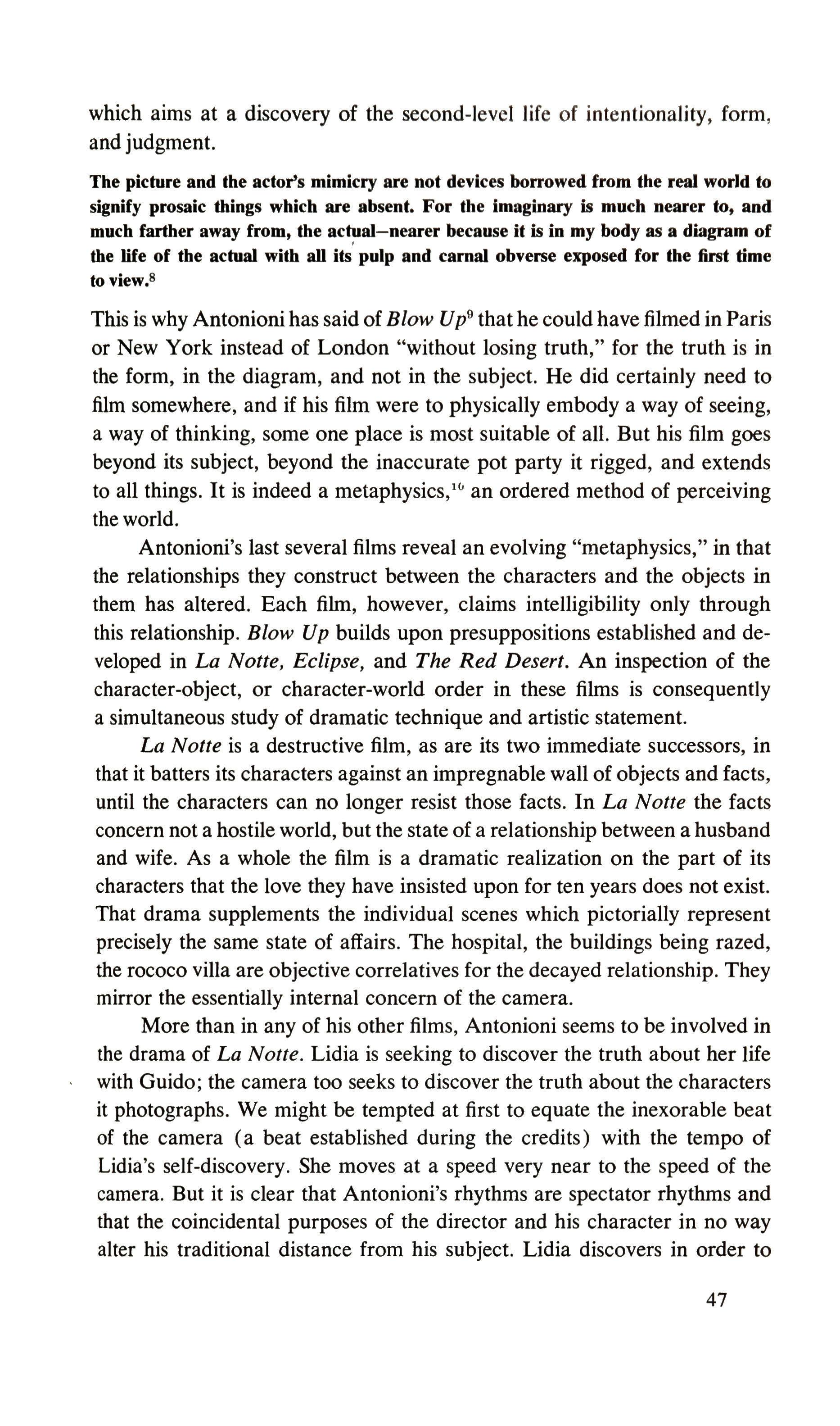
which aims at a discovery of the second-level life of intentionality, form, and judgment.
The picture and the actor's mimicry are not devices borrowed from the real world to signify prosaic things which are absent. For the Imaginary is much nearer to, and much farther away from, the actual-nearer because it is in my body as a diagram of the life of the actual with all its pulp and carnal obverse exposed for the first time toview.8
This is why Antonioni has said of Blow Up9 that he could have filmed in Paris or New York instead of London "without losing truth," for the truth is in the form, in the diagram, and not in the subject. He did certainly need to film somewhere, and if his film were to physically embody a way of seeing, a way of thinking, some one place is most suitable of all. But his film goes beyond its subject, beyond the inaccurate pot party it rigged, and extends to all things. It is indeed a metaphysics," an ordered method of perceiving the world.
Antonioni's last several films reveal an evolving "metaphysics," in that the relationships they construct between the characters and the objects in them has altered. Each film, however, claims intelligibility only through this relationship. Blow Up builds upon presuppositions established and developed in La Notte, Eclipse, and The Red Desert. An inspection of the character-object, or character-world order in these films is consequently a simultaneous study of dramatic technique and artistic statement.
La Notte is a destructive film, as are its two immediate successors, in that it batters its characters against an impregnable wall of objects and facts, until the characters can no longer resist those facts. In La Notte the facts concern not a hostile world, but the state of a relationship between a husband and wife. As a whole the film is a dramatic realization on the part of its characters that the love they have insisted upon for ten years does not exist. That drama supplements the individual scenes which pictorially represent precisely the same state of affairs. The hospital, the buildings being razed, the rococo villa are objective correlatives for the decayed relationship. They mirror the essentially internal concern of the camera.
More than in any of his other films, Antonioni seems to be involved in the drama of La Notte. Lidia is seeking to discover the truth about her life with Guido; the camera too seeks to discover the truth about the characters it photographs. We might be tempted at first to equate the inexorable beat of the camera (a beat established during the credits) with the tempo of Lidia's self-discovery. She moves at a speed very near to the speed of the camera. But it is clear that Antonioni's rhythms are spectator rhythms and that the coincidental purposes of the director and his character in no way alter his traditional distance from his subject. Lidia discovers in order to
47
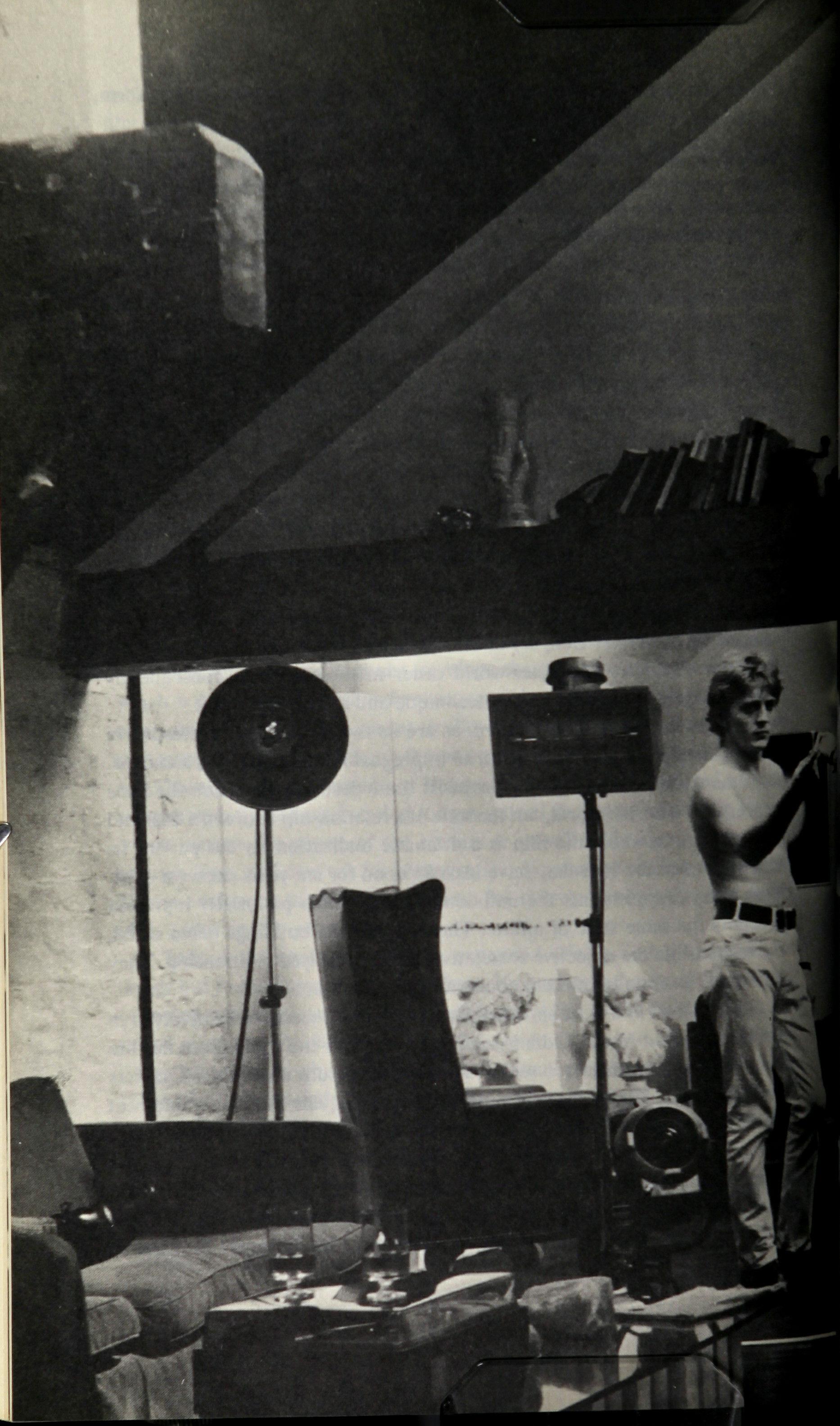
-
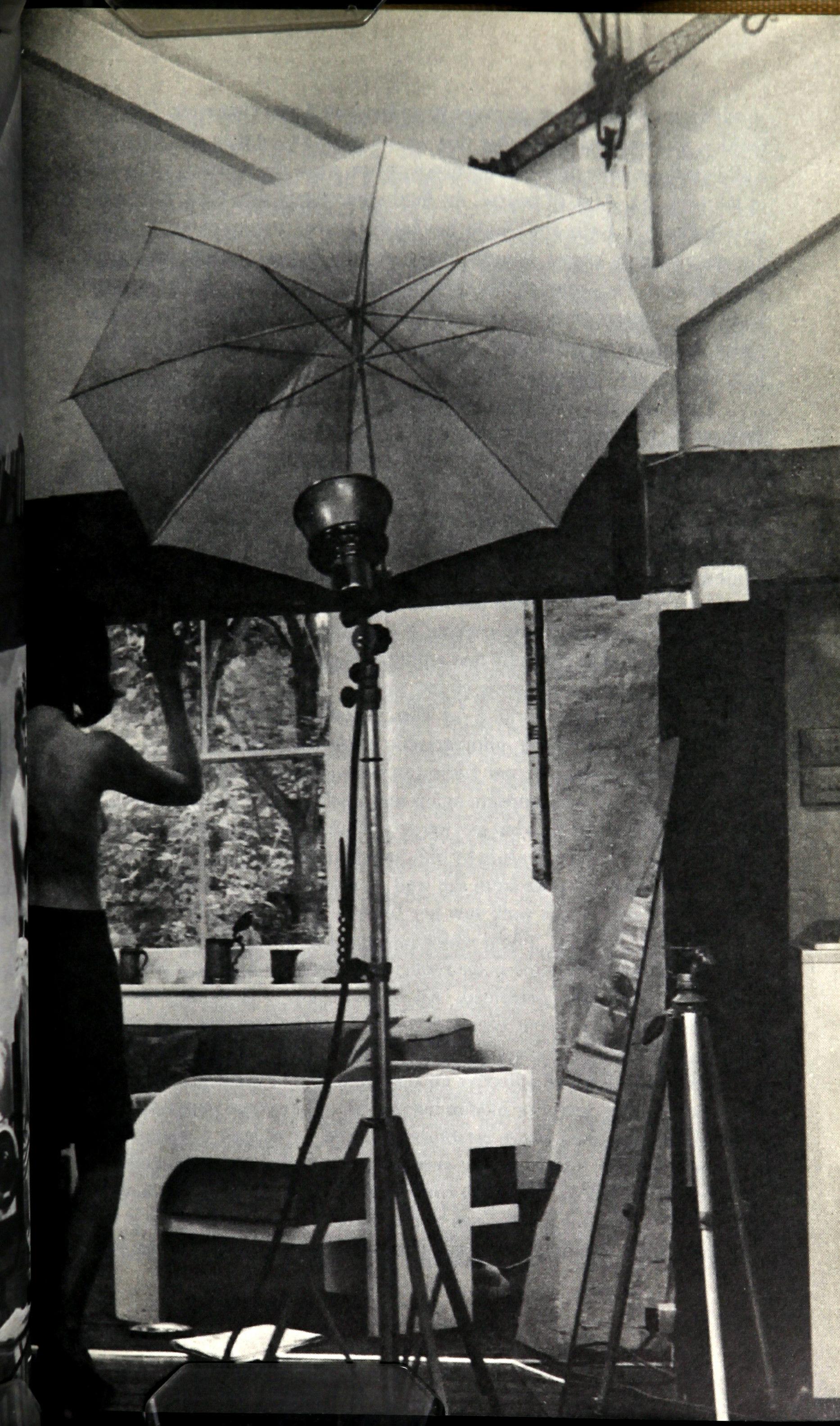

continue as character; we, in order to understand her as character. There is, besides, an overwhelming sense that we are more aware than she; we physically see the architecture bearing down on her, while she is merely conscious of the pressure. And, of course, the final scene establishes the artistic roles unambiguously: Lidia and Guido, having discovered to some extent what the audience already knows, namely, that their love is dead, resume their roles as characters. They react to this knowledge; in this case, they react hypocritically in a useless embrace. We, having seen the fullness of their psychic states, continue to watch their reaction, continue to judge it, and continue to relate it to all that has gone before.
The fact that Antonioni has chosen to develop his characters so thoroughly in this film says nothing about the function of character in film, but it does say a great deal about the focus of his concern in this particular film. He develops at length sophisticated characters in a cultured world, but there is no doubt that the characters are of prime interest while the world merely reinforces that interest. The final scene testifies to this concern, for Antonioni takes his characters at last out of culture and isolates them in a sand trap where their actions are no longer buffered by convention, where the aimlessness of their love-making is a naked, undisguised response to a situation which was painfully and ambiguously exposed to them within the architectural and social forms of the world.
The status of the world in La Notte is secondary but at the same time essential. It provides the photographic evidence which piles up in an avalanche that neither we nor Lidia can deny. We cannot help but feel the isolation of Lidia who appears again and again behind barred or glassed windows. We cannot help but feel the decadence of the relationship when the drama takes us again and againby buildings being ripped apart. Lidia herself pulls some excess plaster from the wall of a building during her long and purposeless walk. That walk saw her likewise confronting the bare anger of teen-agers in a fight, a fight which contained all of Lidia's restrained animosity. She watched home-made rockets lose their initial energy and return to earth, empty and deformed. All of these are not, strictly speaking, symbols. They are visual correlatives which make tangible and real the sentiments of the characters involved. Visual correlatives are certainly the most powerful form of objective correlative as they expose, in context and in repetition, the secret or hidden interior life. The accumulation of scenes like those mentioned above establishes a force, or at least a feeling in the spectator's mind, which can be subsequently employed in the context of the drama as a whole. But, in La Notte it is apparent that the physical details serve as a mirror for the feelings of the characters involved, and it is those feelings which compose the elements of the drama and which must finally
50
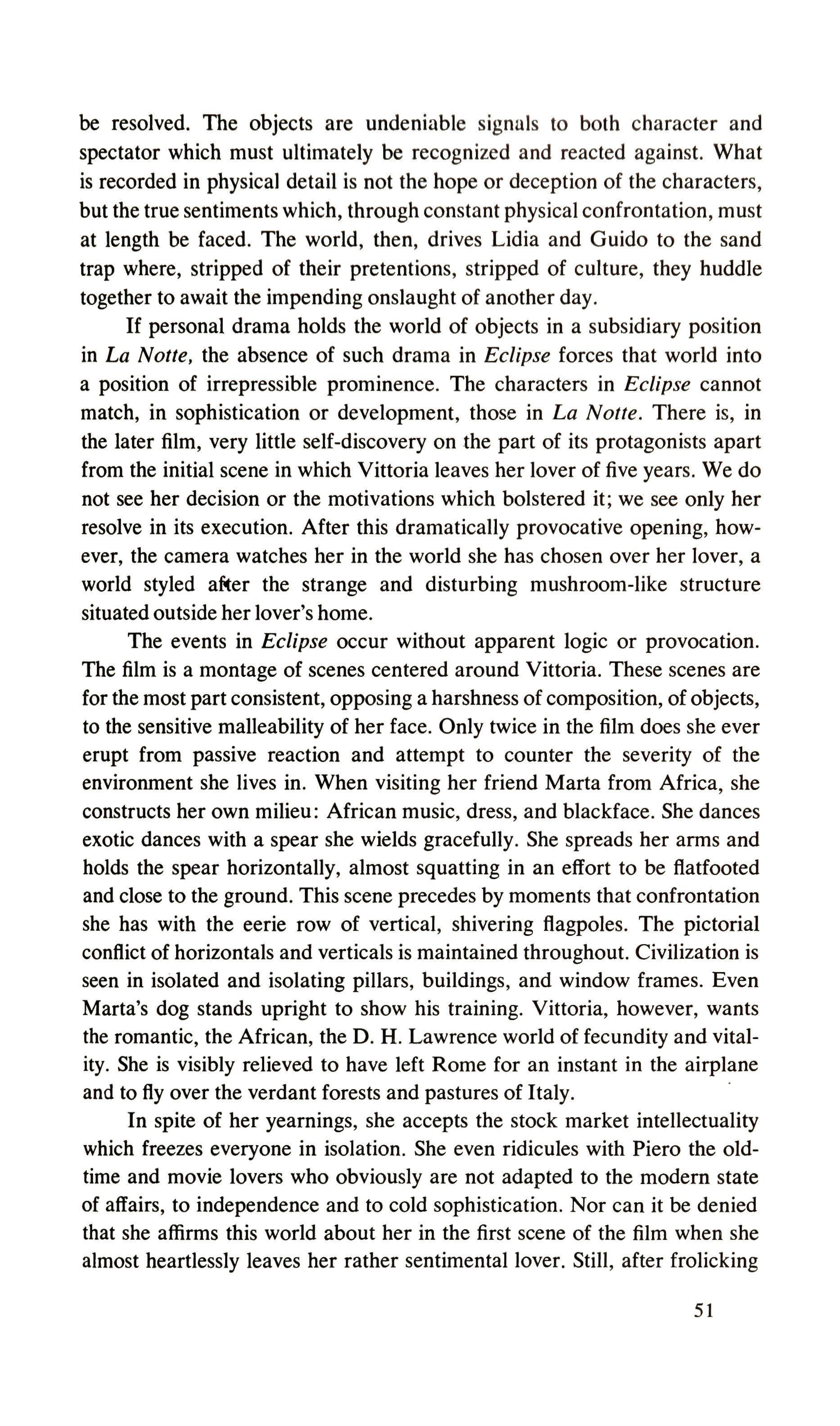
be resolved. The objects are undeniable signals to both character and spectator which must ultimately be recognized and reacted against. What is recorded in physical detail is not the hope or deception of the characters, but the true sentiments which, through constant physical confrontation, must at length be faced. The world, then, drives Lidia and Guido to the sand trap where, stripped of their pretentions, stripped of culture, they huddle together to await the impending onslaught of another day.
If personal drama holds the world of objects in a subsidiary position in La Notte, the absence of such drama in Eclipse forces that world into a position of irrepressible prominence. The characters in Eclipse cannot match, in sophistication or development, those in La Notte. There is, in the later film, very little self-discovery on the part of its protagonists apart from the initial scene in which Vittoria leaves her lover of five years. We do not see her decision or the motivations which bolstered it; we see only her resolve in its execution. After this dramatically provocative opening, however, the camera watches her in the world she has chosen over her lover, a world styled after the strange and disturbing mushroom-like structure situated outside her lover's home.
The events in Eclipse occur without apparent logic or provocation. The film is a montage of scenes centered around Vittoria. These scenes are for the most part consistent, opposing a harshness of composition, of objects, to the sensitive malleability of her face. Only twice in the film does she ever erupt from passive reaction and attempt to counter the severity of the environment she lives in. When visiting her friend Marta from Africa, she constructs her own milieu: African music, dress, and blackface. She dances exotic dances with a spear she wields gracefully. She spreads her arms and holds the spear horizontally, almost squatting in an effort to be flatfooted and close to the ground. This scene precedes by moments that confrontation she has with the eerie row of vertical, shivering flagpoles. The pictorial conflict of horizontals and verticals is maintained throughout. Civilization is seen in isolated and isolating pillars, buildings, and window frames. Even Marta's dog stands upright to show his training. Vittoria, however, wants the romantic, the African, the D. H. Lawrence world of fecundity and vitality. She is visibly relieved to have left Rome for an instant in the airplane and to fly over the verdant forests and pastures of Italy.
In spite of her yearnings, she accepts the stock market intellectuality which freezes everyone in isolation. She even ridicules with Piero the oldtime and movie lovers who obviously are not adapted to the modern state of affairs, to independence and to cold sophistication. Nor can it be denied that she affirms this world about her in the first scene of the film when she almost heartlessly leaves her rather sentimental lover. Still, after frolicking
51
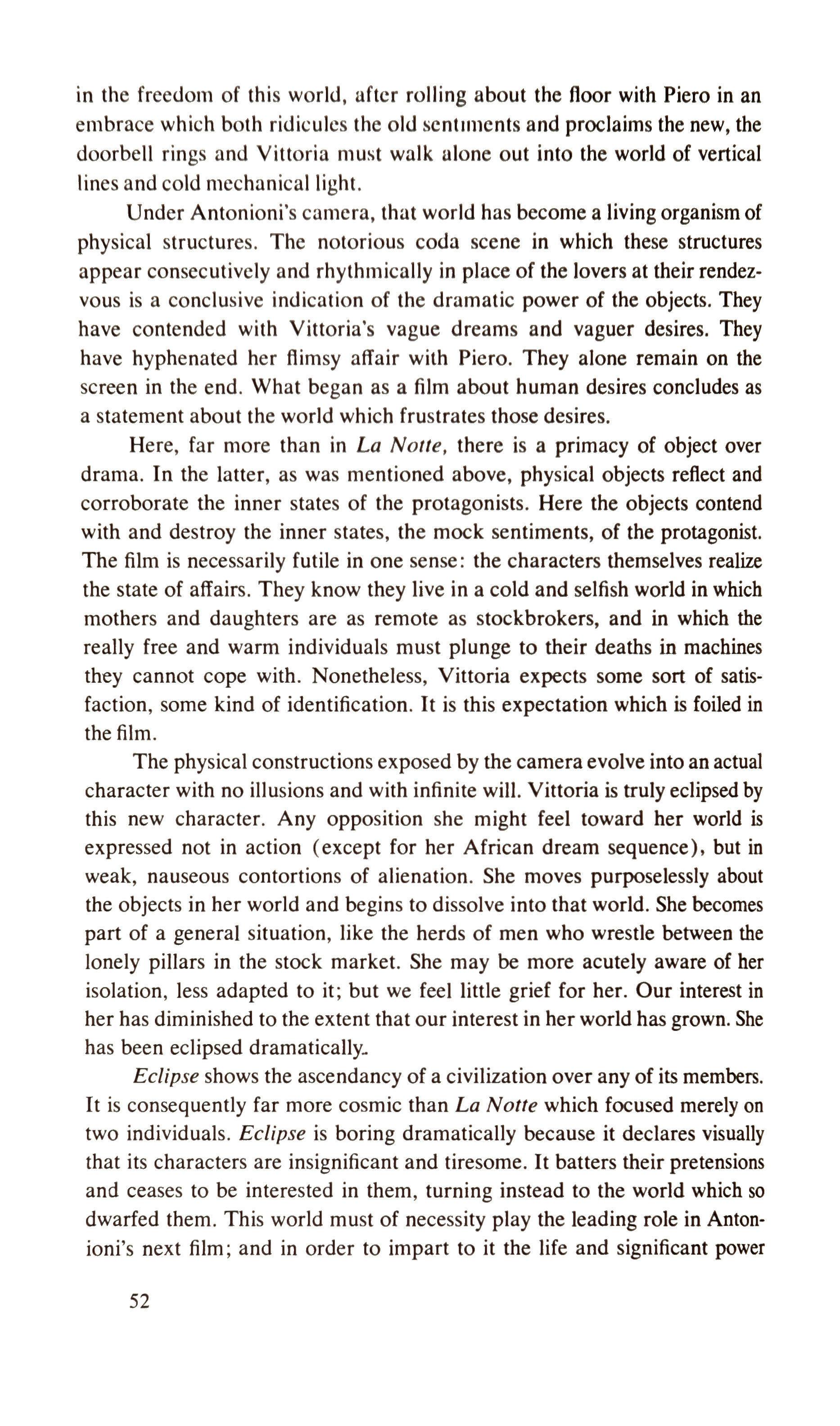
in the freedom of this world, after rolling about the floor with Piero in an embrace which both ridicules the old scnuments and proclaims the new, the doorbell rings and Vittoria must walk alone out into the world of vertical lines and cold mechanical light.
Under Antonioni's camera, that world has become a living organism of physical structures. The notorious coda scene in which these structures appear consecutively and rhythmically in place of the lovers at their rendezvous is a conclusive indication of the dramatic power of the objects. They have contended with Vittoria's vague dreams and vaguer desires. They have hyphenated her flimsy affair with Piero. They alone remain on the screen in the end. What began as a film about human desires concludes as a statement about the world which frustrates those desires. Here, far more than in La Notte, there is a primacy of object over drama. In the latter, as was mentioned above, physical objects reflect and corroborate the inner states of the protagonists. Here the objects contend with and destroy the inner states, the mock sentiments, of the protagonist. The film is necessarily futile in one sense: the characters themselves realize the state of affairs. They know they live in a cold and selfish world in which mothers and daughters are as remote as stockbrokers, and in which the really free and warm individuals must plunge to their deaths in machines they cannot cope with. Nonetheless, Vittoria expects some sort of satisfaction, some kind of identification. It is this expectation which is foiled in the film.
The physical constructions exposed by the camera evolve into an actual character with no illusions and with infinite will. Vittoria is truly eclipsed by this new character. Any opposition she might feel toward her world is expressed not in action (except for her African dream sequence), but in weak, nauseous contortions of alienation. She moves purposelessly about the objects in her world and begins to dissolve into that world. She becomes part of a general situation, like the herds of men who wrestle between the lonely pillars in the stock market. She may be more acutely aware of her isolation, less adapted to it; but we feel little grief for her. Our interest in her has diminished to the extent that our interest in her world has grown. She has been eclipsed dramatically, Eclipse shows the ascendancy of a civilization over any of its members. It is consequently far more cosmic than La Notte which focused merely on two individuals. Eclipse is boring dramatically because it declares visually that its characters are insignificant and tiresome. It batters their pretensions and ceases to be interested in them, turning instead to the world which so dwarfed them. This world must of necessity play the leading role in Antonioni's next film; and in order to impart to it the life and significant power
52
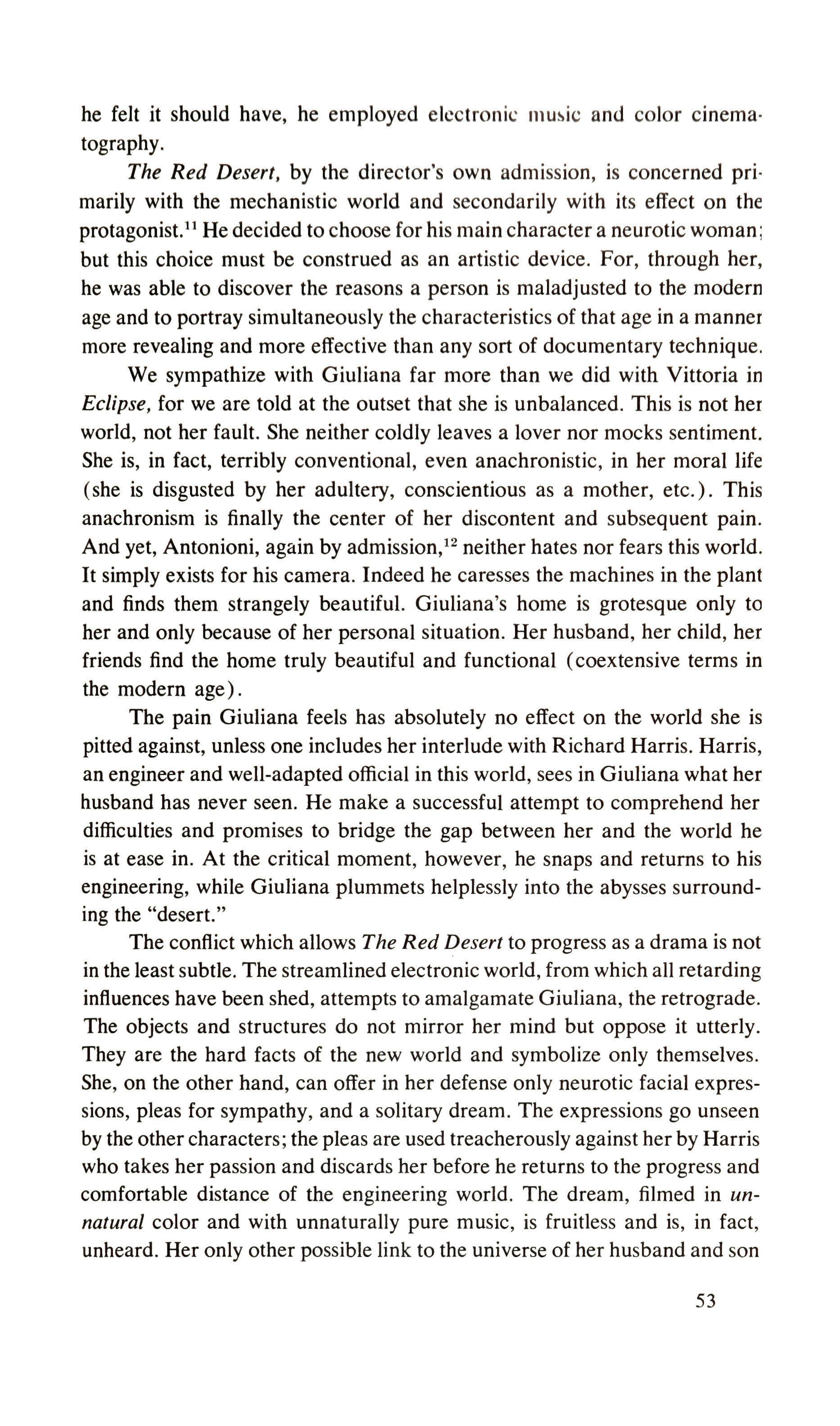
he felt it should have, he employed electronic music and color cinematography.
The Red Desert, by the director's own admission, is concerned primarily with the mechanistic world and secondarily with its effect on the protagonist. II He decided to choose for his main character a neurotic woman; but this choice must be construed as an artistic device. For, through her, he was able to discover the reasons a person is maladjusted to the modern age and to portray simultaneously the characteristics of that age in a manner more revealing and more effective than any sort of documentary technique.
We sympathize with Giuliana far more than we did with Vittoria in Eclipse, for we are told at the outset that she is unbalanced. This is not her world, not her fault. She neither coldly leaves a lover nor mocks sentiment. She is, in fact, terribly conventional, even anachronistic, in her moral life (she is disgusted by her adultery, conscientious as a mother, etc.). This anachronism is finally the center of her discontent and subsequent pain. And yet, Antonioni, again by admission," neither hates nor fears this world. It simply exists for his camera. Indeed he caresses the machines in the plant and finds them strangely beautiful. Giuliana's home is grotesque only to her and only because of her personal situation. Her husband, her child, her friends find the home truly beautiful and functional (coextensive terms in the modern age).
The pain Giuliana feels has absolutely no effect on the world she is pitted against, unless one includes her interlude with Richard Harris. Harris, an engineer and well-adapted official in this world, sees in Giuliana what her husband has never seen. He make a successful attempt to comprehend her difficulties and promises to bridge the gap between her and the world he is at ease in. At the critical moment, however, he snaps and returns to his engineering, while Giuliana plummets helplessly into the abysses surrounding the "desert."
The conflict which allows The Red Desert to progress as a drama is not in the least subtle. The streamlined electronic world, from which all retarding influences have been shed, attempts to amalgamate Giuliana, the retrograde. The objects and structures do not mirror her mind but oppose it utterly. They are the hard facts of the new world and symbolize only themselves. She, on the other hand, can offer in her defense only neurotic facial expressions, pleas for sympathy, and a solitary dream. The expressions go unseen by the other characters; the pleas are used treacherously against her by Harris who takes her passion and discards her before he returns to the progress and comfortable distance of the engineering world. The dream, filmed in unnatural color and with unnaturally pure music, is fruitless and is, in fact, unheard. Her only other possible link to the universe of her husband and son
53

is through the store she owns. Yet this remains empty, sadly empty, throughout the film.
In following points of conflict between the woman and the world, Antonioni shows us first the snarls of that world, those things which she must succumb to obsequiously if she intends to continue: the noise and ropes, the metal and rust, the filthy water and fog, the aphrodisiacs and sterile architecture. These prick her and drive her into the corners of her empty store or into the corner of Harris' room where she dreams for love and personal communication, a dream she is not allowed to get away with. She must learn, along with the birds, that the yellow smoke which rises daily in greater and greater billows, is poisonous and must be avoided.
Whether or not Giuliana recovers is relatively unimportant to the film's impact. She has had her breakdown; she has sought to overcome her neurosis through dream, wish, tenderness, and passion; she has realized her failure. More important, she has realized that she is truly different, that the world is there for acceptance. She is not the heroine who romantically would not be moulded by a constricting situation. She is the pitiable neurotic whose gaze was not so strong as the camera's. Giuliana is a foil for Antonioni's real concern, the modern milieu and its relation to men. It seems as though Antonioni were freeing himself from the last vestige of nostalgia, from the last tie that bound him to the classical characters and considerations of La Notte, for he turns love and interpersonality into the scream of a neurotic woman and then looks upon her coldly as neurotic, that is, with pity but without admiration.
The objects which served as a mirror for psychic states in La Notte, which grew to organic proportions in Eclipse, and which poisoned the last resistor in The Red Desert, are now supreme. They have moved into a position of unassailable dominance in the dramatic universe of Michelangelo Antonioni. In his next film, Blow Up, it is the objects which control the drama and the characters who reflect that drama.
Blow Up at last shows us the end product, a world where man has indeed adjusted to his milieu. There are here no recognizable or classical neuroses, no pleas for love and communication. We see, rather, the modem world at work, uncontested by dissenting members. Even a cursory inspection of the characters reveals that they are not only in tune with their milieu, but represent that milieu. A finite period of time has elapsed since "the red desert" ground Giuliana under. She was the last retrograde member and significantly could not even speak with her own child. That child, inquisitive about his world, adjusted to that world, has grown into the David Hemmings of Blow Up.
The lives of all the characters in Blow Up are utterly distinct from one
54

another, attaining delineation, however, only in perspective with the people and things around them. Everything, everyone, every event is meant to stand out starkly in a type of living "pop" collage which has no apparent governing principle. When Hemmings is consumed in sorting out the "fantastic" murder he has stumbled upon, no one will share it with him. He tells Sarah, whose interest in such a grotesque event wanes as it turns her attention back on her own personal problems. Hemmings, pondering his own predicament, is vaguely deferential and sympathetic to Sarah but returns single-mindedly to his mystery the moment she leaves. He enters a rock session in search of the girl in his picture and leaves with the neck of a guitar running frantically from an hysterical crowd whom the musicians (The Yardbirds) don't even notice. Next he drives to the "pot" party to acquaint his partner Ron with the occurrence; but Ron, annoyed, returns to his own trip.
The point here is not that this culture curbs communication or interpersonality (that may describe to some extent The Red Desert, but here it is the given) ; rather it is that everyone and every thing holds up its end of the collage senselessly. Visually this is expressed through color and composition. Hemmings stands out prominently, even absurdly, in the context of the park, just as his propellor does in the context of his studio. That studio itself looks curiously like a pop art painting. It is here that Hemmings captures the significant or characteristic expressions of his generation on photographic plates. But it is here too that he lives. The influence of the symmetrical screens, the colored setting paper, and the mod decor is visibly noticeable in his movement and appearance. He is perfectly at home amid his own sets, as though they were made for him and not for his models, as though they grew up around him spontaneously, moulding him in their own image and likeness. He poses his models behind screens and has them move passionately for him as he calmly focuses a lens or trips the shutter; yet he too moves about his screens, posing for Antonioni's calm and revealmg camera.
In fact, when Hemmings begins to piece together the murder and we actually hear the ominous murmur of the trees in the park, we suddenly realize that the studio is a perfect metaphor for his mind. The pop art paintings (one of which is an iris-eye), the admixture of objects of some certain sophistication (liquor, the phonograph) together with those representing juvenile fetishes (the propellor, caravan wallpaper) and finally the section reserved for his work (which by contrast is meticulously keptup) all constitute the various elements of his psyche. He pastes the blowups on his wall like old memories and then tries to imagine what they might mean. We hear the trees; we are in his mind. Hemmings' studio we might oppose
55
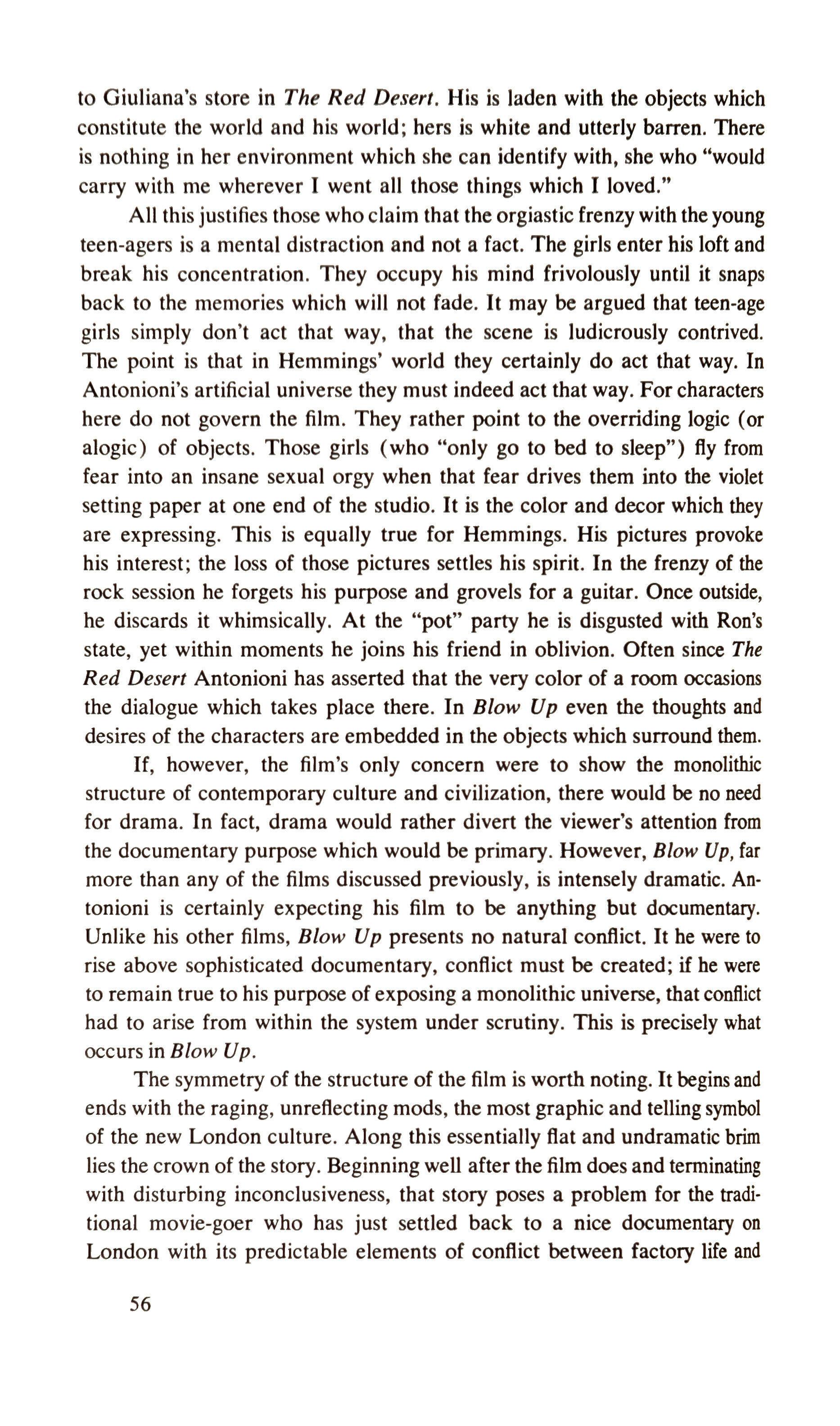
to Giuliana's store in The Red Desert. His is laden with the objects which constitute the world and his world; hers is white and utterly barren. There is nothing in her environment which she can identify with, she who "would carry with me wherever I went all those things which I loved."
All this justifies those who claim that the orgiastic frenzy with the young teen-agers is a mental distraction and not a fact. The girls enter his loft and break his concentration. They occupy his mind frivolously until it snaps back to the memories which will not fade. It may be argued that teen-age girls simply don't act that way, that the scene is ludicrously contrived. The point is that in Hemmings' world they certainly do act that way. In Antonioni's artificial universe they must indeed act that way. For characters here do not govern the film. They rather point to the overriding logic (or alogic) of objects. Those girls (who "only go to bed to sleep") fly from fear into an insane sexual orgy when that fear drives them into the violet setting paper at one end of the studio. It is the color and decor which they are expressing. This is equally true for Hemmings. His pictures provoke his interest; the loss of those pictures settles his spirit. In the frenzy of the rock session he forgets his purpose and grovels for a guitar. Once outside, he discards it whimsically. At the "pot" party he is disgusted with Ron's state, yet within moments he joins his friend in oblivion. Often since The Red Desert Antonioni has asserted that the very color of a room occasions the dialogue which takes place there. In Blow Up even the thoughts and desires of the characters are embedded in the objects which surround them. If, however, the film's only concern were to show the monolithic structure of contemporary culture and civilization, there would be no need for drama. In fact, drama would rather divert the viewer's attention from the documentary purpose which would be primary. However, Blow Up, far more than any of the films discussed previously, is intensely dramatic. Antonioni is certainly expecting his film to be anything but documentary. Unlike his other films, Blow Up presents no natural conflict. It he were to rise above sophisticated documentary, conflict must be created; if he were to remain true to his purpose of exposing a monolithic universe, that conflict had to arise from within the system under scrutiny. This is precisely what occurs in Blow Up.
The symmetry of the structure of the film is worth noting. It begins and ends with the raging, unreflecting mods, the most graphic and telling symbol of the new London culture. Along this essentially flat and undramatic brim lies the crown of the story. Beginning well after the film does and terminating with disturbing inconclusiveness, that story poses a problem for the traditional movie-goer who has just settled back to a nice documentary on London with its predictable elements of conflict between factory life and
56
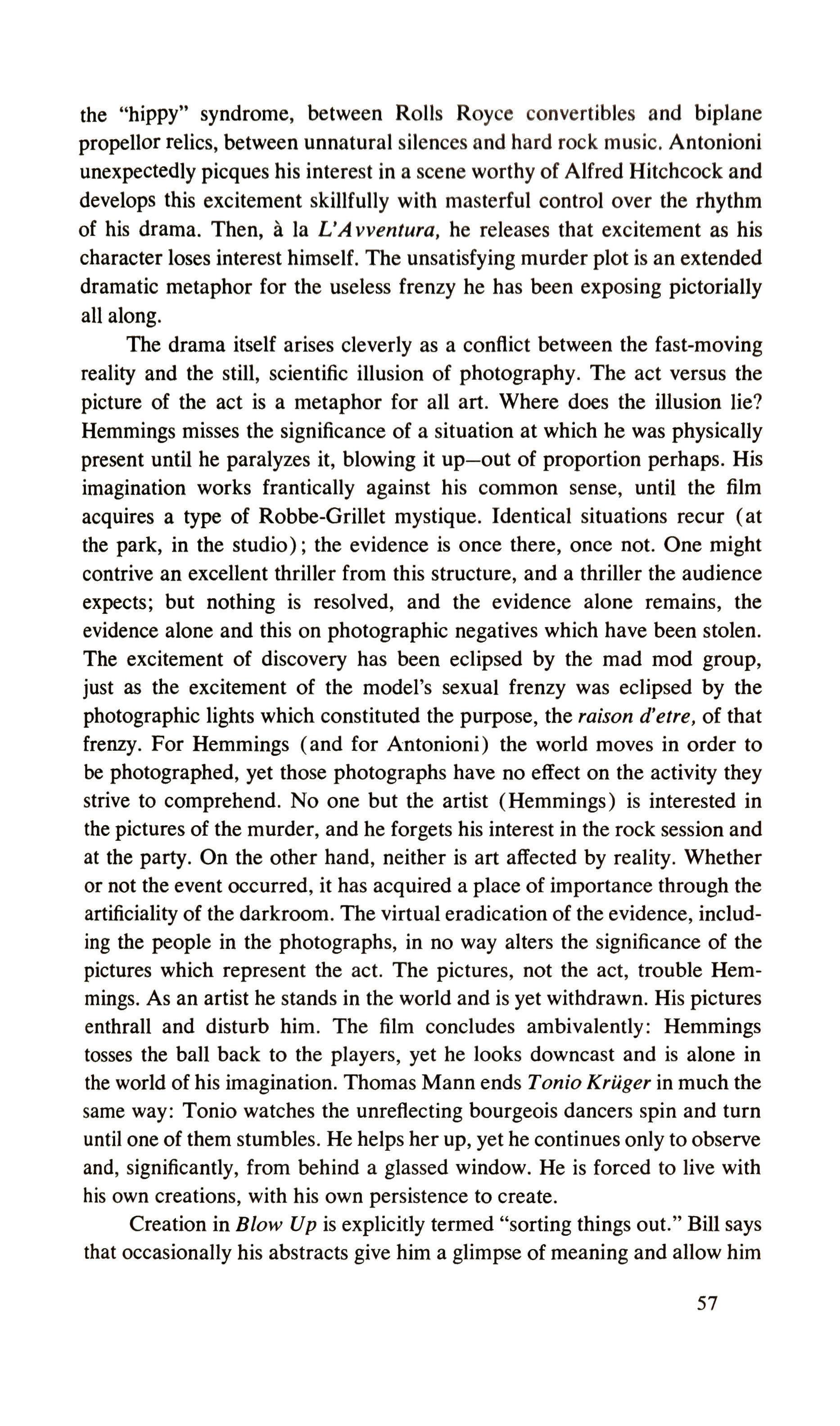
the "hippy" syndrome, between Rolls Royce convertibles and biplane propellor relics, between unnatural silences and hard rock music. Antonioni unexpectedly picques his interest in a scene worthy of Alfred Hitchcock and develops this excitement skillfully with masterful control over the rhythm of his drama. Then, a la L'A vventura, he releases that excitement as his character loses interest himself. The unsatisfying murder plot is an extended dramatic metaphor for the useless frenzy he has been exposing pictorially all along.
The drama itself arises cleverly as a conflict between the fast-moving reality and the still, scientific illusion of photography. The act versus the picture of the act is a metaphor for all art. Where does the illusion lie? Hemmings misses the significance of a situation at which he was physically present until he paralyzes it, blowing it up out of proportion perhaps. His imagination works frantically against his common sense, until the film acquires a type of Robbe-Grillet mystique. Identical situations recur (at the park, in the studio); the evidence is once there, once not. One might contrive an excellent thriller from this structure, and a thriller the audience expects; but nothing is resolved, and the evidence alone remains, the evidence alone and this on photographic negatives which have been stolen. The excitement of discovery has been eclipsed by the mad mod group, just as the excitement of the model's sexual frenzy was eclipsed by the photographic lights which constituted the purpose, the raison d'etre, of that frenzy. For Hemmings (and for Antonioni) the world moves in order to be photographed, yet those photographs have no effect on the activity they strive to comprehend. No one but the artist (Hemmings) is interested in the pictures of the murder, and he forgets his interest in the rock session and at the party. On the other hand, neither is art affected by reality. Whether or not the event occurred, it has acquired a place of importance through the artificiality of the darkroom. The virtual eradication of the evidence, including the people in the photographs, in no way alters the significance of the pictures which represent the act. The pictures, not the act, trouble Hemmings. As an artist he stands in the world and is yet withdrawn. His pictures enthrall and disturb him. The film concludes ambivalently: Hemmings tosses the ball back to the players, yet he looks downcast and is alone in the world of his imagination. Thomas Mann ends Tonio Kruger in much the same way: Tonio watches the unreflecting bourgeois dancers spin and turn until one of them stumbles. He helps her up, yet he continues only to observe and, significantly, from behind a glassed window. He is forced to live with his own creations, with his own persistence to create. Creation in Blow Up is explicitly termed "sorting things out." Bill says that occasionally his abstracts give him a glimpse of meaning and allow him
57
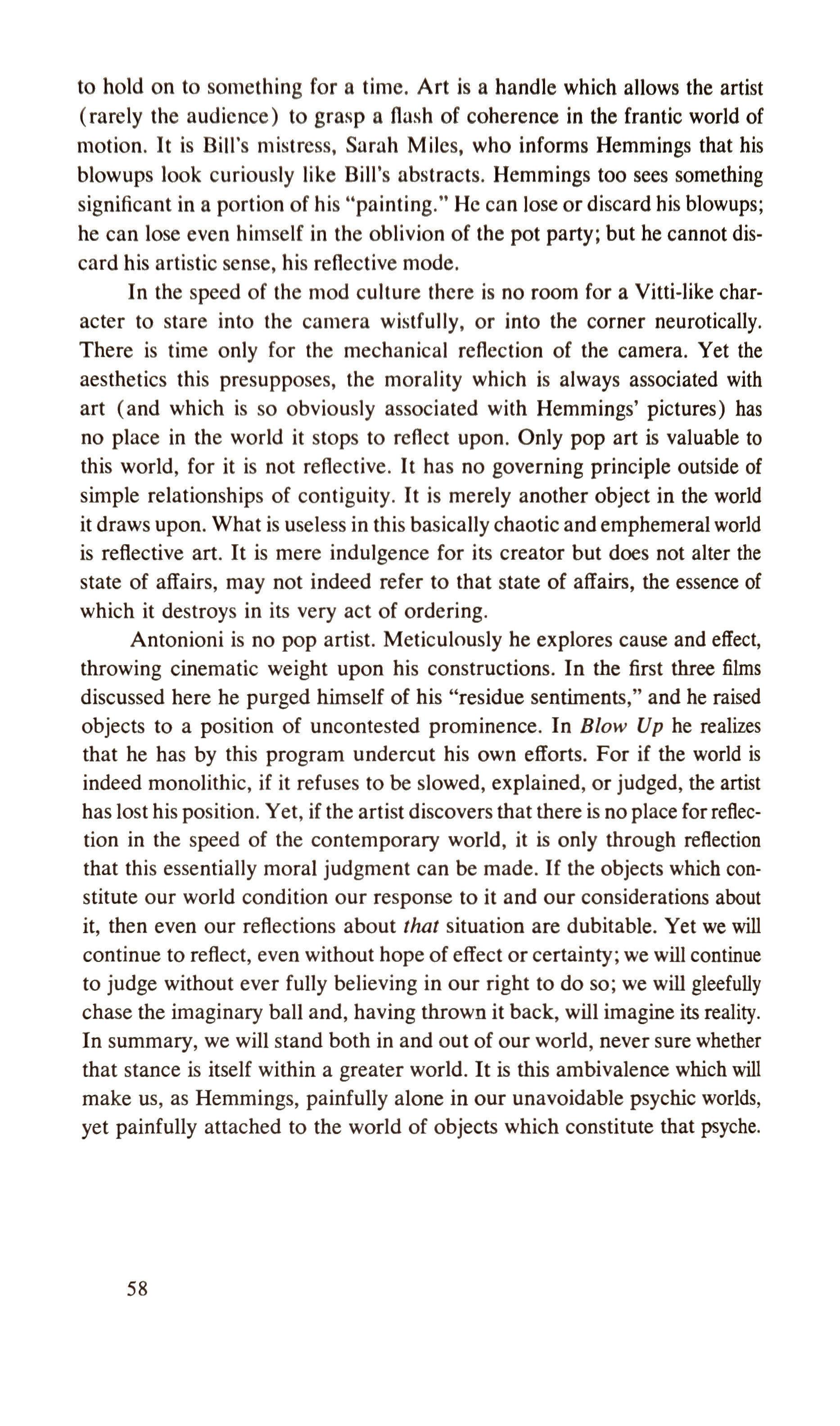
to hold on to something for a time. Art is a handle which allows the artist (rarely the audience) to grasp a flash of coherence in the frantic world of motion. It is Bill's mistress, Sarah Miles, who informs Hemmings that his blowups look curiously like Bill's abstracts. Hemmings too sees something significant in a portion of his "painting." He can lose or discard his blowups; he can lose even himself in the oblivion of the pot party; but he cannot discard his artistic sense, his reflective mode.
In the speed of the mod culture there is no room for a Vitti-like character to stare into the camera wistfully, or into the corner neurotically. There is time only for the mechanical reflection of the camera. Yet the aesthetics this presupposes, the morality which is always associated with art (and which is so obviously associated with Hemmings' pictures) has no place in the world it stops to reflect upon. Only pop art is valuable to this world, for it is not reflective. It has no governing principle outside of simple relationships of contiguity. It is merely another object in the world it draws upon. What is useless in this basically chaotic and emphemeral world is reflective art. It is mere indulgence for its creator but does not alter the state of affairs, may not indeed refer to that state of affairs, the essence of which it destroys in its very act of ordering.
Antonioni is no pop artist. Meticulously he explores cause and effect, throwing cinematic weight upon his constructions. In the first three films discussed here he purged himself of his "residue sentiments," and he raised objects to a position of uncontested prominence. In Blow Up he realizes that he has by this program undercut his own efforts. For if the world is indeed monolithic, if it refuses to be slowed, explained, or judged, the artist has lost his position. Yet, if the artist discovers that there is no place forreflection in the speed of the contemporary world, it is only through reflection that this essentially moral judgment can be made. If the objects which constitute our world condition our response to it and our considerations about it, then even our reflections about that situation are dubitable. Yet we will continue to reflect, even without hope of effect or certainty; we will continue to judge without ever fully believing in our right to do so; we will gleefully chase the imaginary ball and, having thrown it back, will imagine its reality. In summary, we will stand both in and out of our world, never sure whether that stance is itself within a greater world. It is this ambivalence which will make us, as Hemmings, painfully alone in our unavoidable psychic worlds, yet painfully attached to the world of objects which constitute that psyche.
58
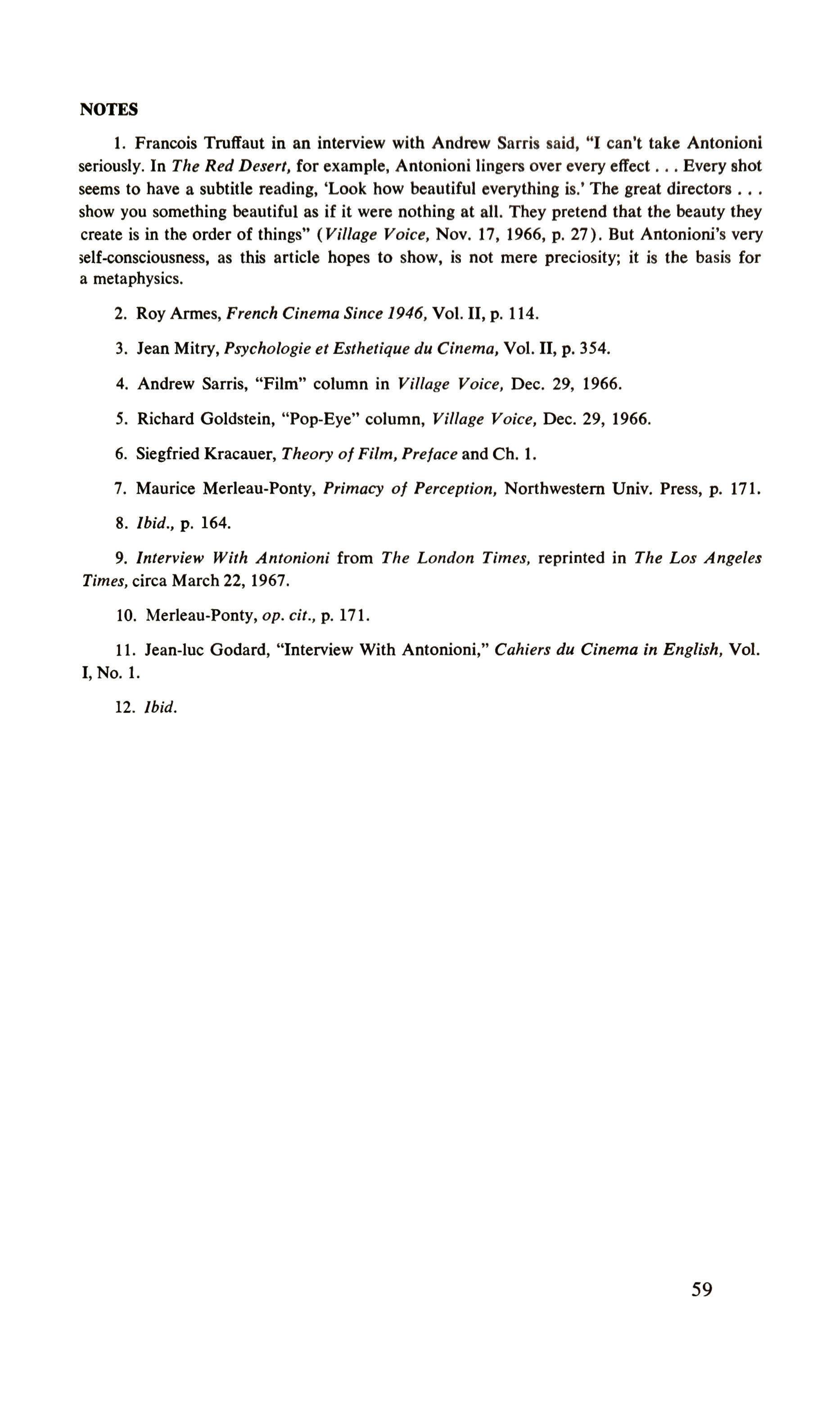
NOTES
I. Francois Truffaut in an interview with Andrew Sarris said, "I can't take Antonioni seriously. In The Red Desert, for example, Antonioni lingers over every effect Every shot seems to have a subtitle reading, 'Look how beautiful everything is.' The great directors ••. show you something beautiful as if it were nothing at all. They pretend that the beauty they create is in the order of things" (Village Voice, Nov. 17, 1966, p. 27). But Antonioni's very self consciousness, as this article hopes to show, is not mere preciosity; it is the basis for a metaphysics.
2. Roy Armes, French Cinema Since 1946, Vol. II, p. 114.
3. Jean Mitry, Psychologie et Esthetique du Cinema, Vol. II, p. 354.
4. Andrew Sarris, "Film" column in Village Voice, Dec. 29, 1966.
5. Richard Goldstein, "Pop-Eye" column, Village Voice, Dec. 29, 1966.
6. Siegfried Kracauer, Theory of Film, Preface and Ch. I.
7. Maurice Merleau-Ponty, Primacy of Perception, Northwestern Univ. Press, p. 171.
8. lbid., p. 164.
9. Interview With Antonioni from The London Times, reprinted in The Los Angeles Times, circa March 22, 1967.
10. Merleau-Ponty, op. cit., p. 171.
11. Jean-Iue Godard, "Interview With Antonioni," Cahiers du Cinema in English, Vol. I, No. I.
12. Ibid.
59


I \
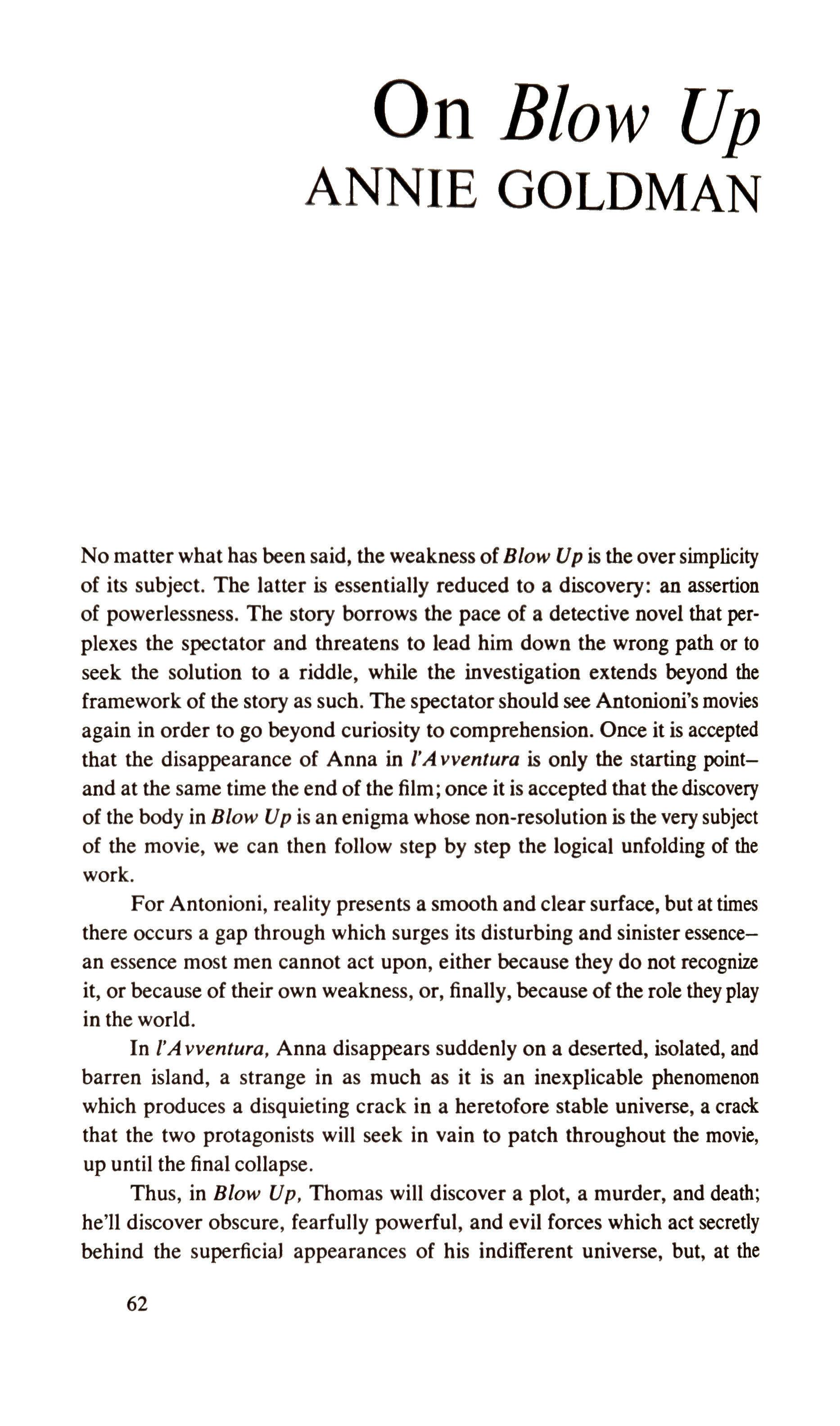
No matter what has been said, the weakness of Blow Up is the over simplicity of its subject. The latter is essentially reduced to a discovery: an assertion of powerlessness. The story borrows the pace of a detective novel that perplexes the spectator and threatens to lead him down the wrong path or to seek the solution to a riddle, while the investigation extends beyond the framework of the story as such. The spectator should see Antonioni's movies again in order to go beyond curiosity to comprehension. Once it is accepted that the disappearance of Anna in ['A vventura is only the starting pointand at the same time the end of the film; once it is accepted that the discovery of the body in Blow Up is an enigma whose non-resolution is the very subject of the movie, we can then follow step by step the logical unfolding of the work.
For Antonioni, reality presents a smooth and clear surface, but at times there occurs a gap through which surges its disturbing and sinister essencean essence most men cannot act upon, either because they do not recognize it, or because of their own weakness, or, finally, because of the role theyplay in the world.
In ['A vventura, Anna disappears suddenly on a deserted, isolated, and barren island, a strange in as much as it is an inexplicable phenomenon which produces a disquieting crack in a heretofore stable universe, a crack that the two protagonists will seek in vain to patch throughout the movie, up until the final collapse.
Thus, in Blow Up, Thomas will discover a plot, a murder, and death; he'll discover obscure, fearfully powerful, and evil forces which act secretly behind the superficiaJ appearances of his indifferent universe, but, at the
62
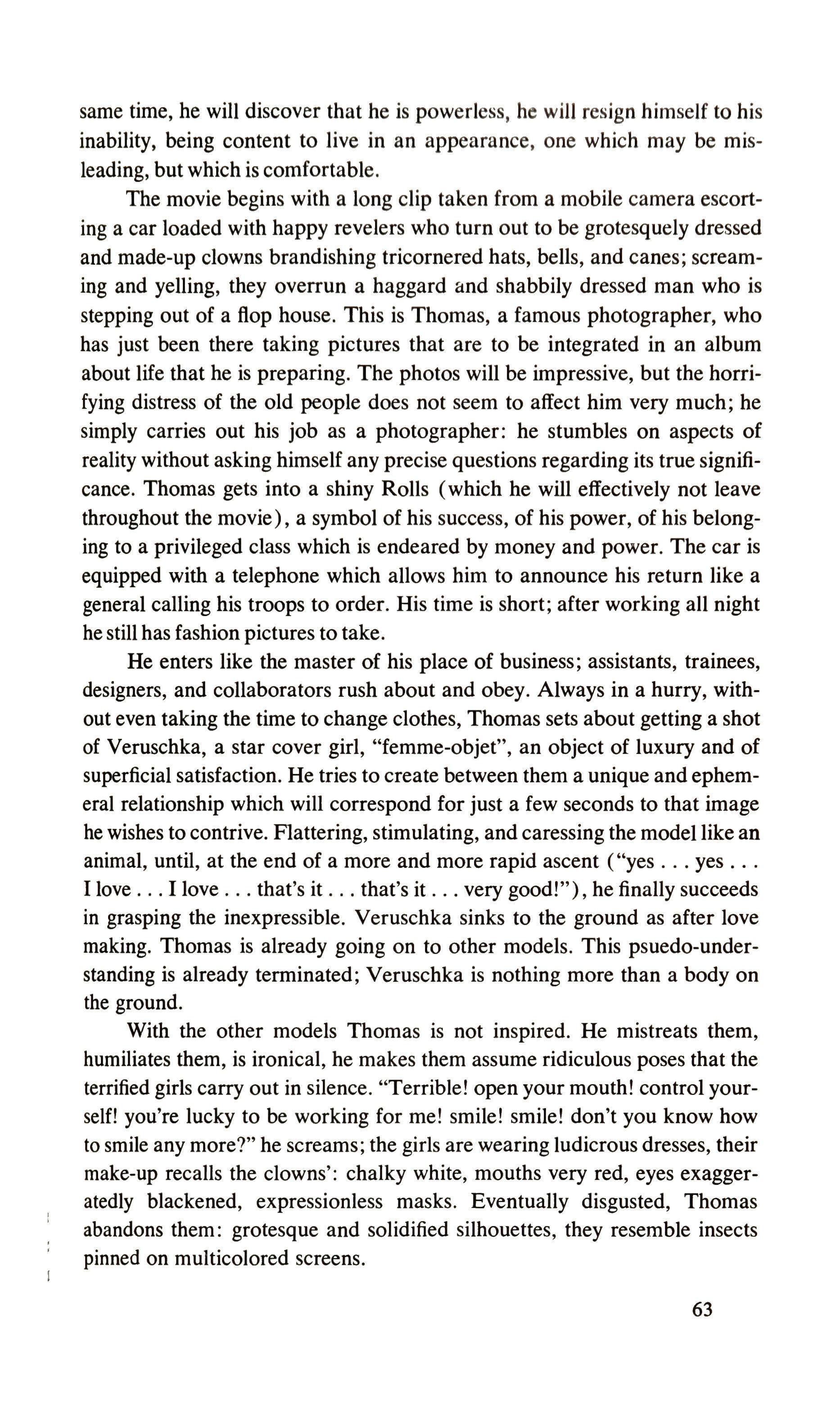
same time, he will discover that he is powerless, he will resign himself to his inability, being content to live in an appearance, one which may be misleading, but which is comfortable.
The movie begins with a long clip taken from a mobile camera escorting a car loaded with happy revelers who turn out to be grotesquely dressed and made-up clowns brandishing tricornered hats, bells, and canes; screaming and yelling, they overrun a haggard and shabbily dressed man who is stepping out of a flop house. This is Thomas, a famous photographer, who has just been there taking pictures that are to be integrated in an album about life that he is preparing. The photos will be impressive, but the horrifying distress of the old people does not seem to affect him very much; he simply carries out his job as a photographer: he stumbles on aspects of reality without asking himself any precise questions regarding its true significance. Thomas gets into a shiny Rolls (which he will effectively not leave throughout the movie), a symbol of his success, of his power, of his belonging to a privileged class which is endeared by money and power. The car is equipped with a telephone which allows him to announce his return like a general calling his troops to order. His time is short; after working all night he still has fashion pictures to take.
He enters like the master of his place of business; assistants, trainees, designers, and collaborators rush about and obey. Always in a hurry, without even taking the time to change clothes, Thomas sets about getting a shot of Veruschka, a star cover girl, "femme-objet", an object of luxury and of superficial satisfaction. He tries to create between them a unique and ephemeral relationship which will correspond for just a few seconds to that image he wishes to contrive. Flattering, stimulating, and caressing the model like an animal, until, at the end of a more and more rapid ascent ("yes yes I love I love that's it that's it very good!") he finally succeeds in grasping the inexpressible. Veruschka sinks to the ground as after love making. Thomas is already going on to other models. This psuedo-understanding is already terminated; Veruschka is nothing more than a body on the ground.
With the other models Thomas is not inspired. He mistreats them, humiliates them, is ironical, he makes them assume ridiculous poses that the terrified girls carry out in silence. "Terrible! open your mouth! control yourself! you're lucky to be working for me! smile! smile! don't you know how to smile any more?" he screams; the girls are wearing ludicrous dresses, their make-up recalls the clowns': chalky white, mouths very red, eyes exaggeratedly blackened, expressionless masks. Eventually disgusted, Thomas abandons them: grotesque and solidified silhouettes, they resemble insects pinned on multicolored screens.
I 63
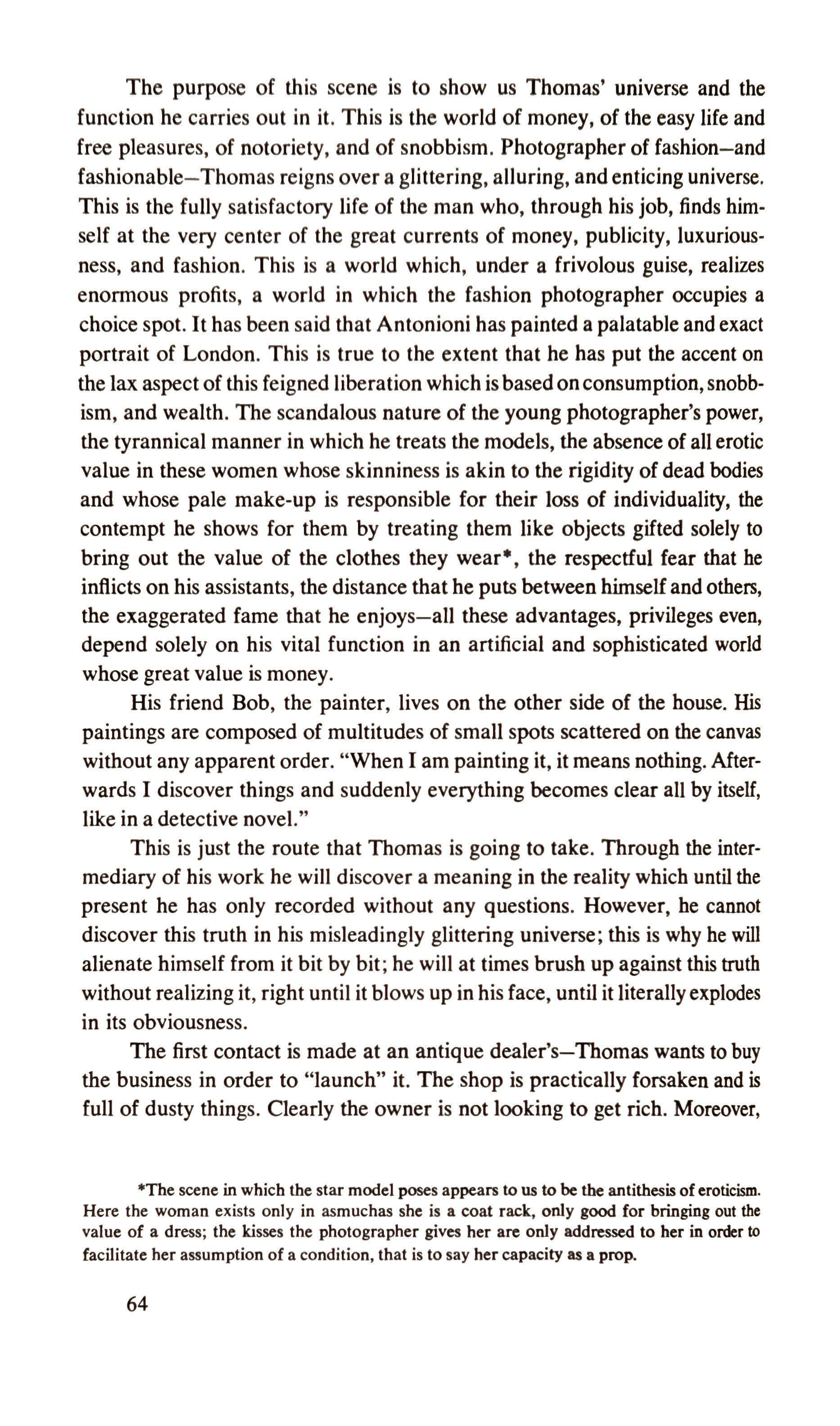
The purpose of this scene is to show us Thomas' universe and the function he carries out in it. This is the world of money, of the easy life and free pleasures, of notoriety, and of snobbism. Photographer of fashion and fashionable Thomas reigns over a glittering, alluring, and enticing universe. This is the fully satisfactory life of the man who, through his job, finds himself at the very center of the great currents of money, publicity, luxuriousness, and fashion. This is a world which, under a frivolous guise, realizes enormous profits, a world in which the fashion photographer occupies a choice spot. It has been said that Antonioni has painted a palatable and exact portrait of London. This is true to the extent that he has put the accent on the lax aspect of this feigned liberation which isbased on consumption, snobbism, and wealth. The scandalous nature of the young photographer's power, the tyrannical manner in which he treats the models, the absence of all erotic value in these women whose skinniness is akin to the rigidity of dead bodies and whose pale make-up is responsible for their loss of individuality, the contempt he shows for them by treating them like objects gifted solely to bring out the value of the clothes they wear", the respectful fear that he inflicts on his assistants, the distance that he puts between himself and others, the exaggerated faille that he enjoys all these advantages, privileges even, depend solely on his vital function in an artificial and sophisticated world whose great value is money.
His friend Bob, the painter, lives on the other side of the house. His paintings are composed of multitudes of small spots scattered on the canvas without any apparent order. "When I am painting it, it means nothing. Afterwards I discover things and suddenly everything becomes clear all by itself, like in a detective novel."
This is just the route that Thomas is going to take. Through the intermediary of his work he will discover a meaning in the reality which until the present he has only recorded without any questions. However, he cannot discover this truth in his misleadingly glittering universe; this is why he will alienate himself from it bit by bit; he will at times brush up against this truth without realizing it, right until it blows up in his face, until it literallyexplodes in its obviousness.
The first contact is made at an antique dealer's Thomas wants to buy the business in order to "launch" it. The shop is practically forsaken and is full of dusty things. Clearly the owner is not looking to get rich. Moreover,
*The scene in which the star model poses appears to us to be the antithesis of eroticism. Here the woman exists only in asmuchas she is a coat rack, only good for bringing out the value of a dress; the kisses the photographer gives her are only addressed to her in order to facilitate her assumption of a condition, that is to say her capacity as a prop.
64
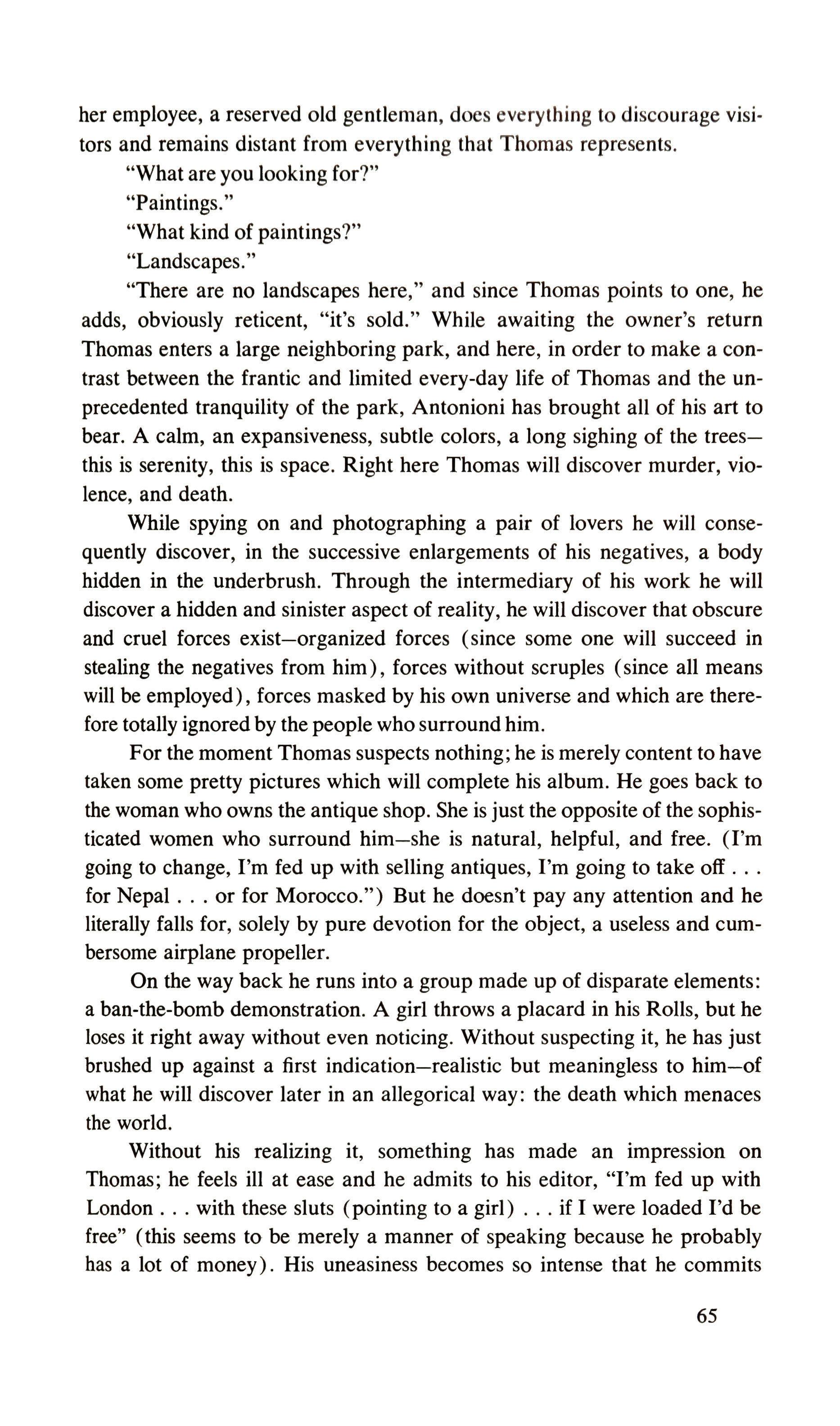
her employee, a reserved old gentleman, does everything to discourage visitors and remains distant from everything that Thomas represents.
"What are you looking for?"
"Paintings.
"What kind of paintings?"
"Landscapes.
"There are no landscapes here," and since Thomas points to one, he adds, obviously reticent, "it's sold. While awaiting the owner's return Thomas enters a large neighboring park, and here, in order to make a contrast between the frantic and limited every-day life of Thomas and the unprecedented tranquility of the park, Antonioni has brought all of his art to bear. A calm, an expansiveness, subtle colors, a long sighing of the treesthis is serenity, this is space. Right here Thomas will discover murder, violence, and death.
While spying on and photographing a pair of lovers he will consequently discover, in the successive enlargements of his negatives, a body hidden in the underbrush. Through the intermediary of his work he will discover a hidden and sinister aspect of reality, he will discover that obscure and cruel forces exist organized forces (since some one will succeed in stealing the negatives from him), forces without scruples (since all means will be employed), forces masked by his own universe and which are therefore totally ignoredby the people who surround him.
For the moment Thomas suspects nothing; he is merely content to have taken some pretty pictures which will complete his album. He goes back to the woman who owns the antique shop. She is just the opposite of the sophisticated women who surround him she is natural, helpful, and free. (I'm going to change, I'm fed up with selling antiques, I'm going to take off for Nepal or for Morocco.") But he doesn't pay any attention and he literally falls for, solely by pure devotion for the object, a useless and cumbersome airplane propeller.
On the way back he runs into a group made up of disparate elements: a ban-the-bomb demonstration. A girl throws a placard in his Rolls, but he loses it right away without even noticing. Without suspecting it, he has just brushed up against a first indication realistic but meaningless to him of what he will discover later in an allegorical way: the death which menaces the world.
Without his realizing it, something has made an impression on Thomas; he feels ill at ease and he admits to his editor, "I'm fed up with London with these sluts (pointing to a girl) if I were loaded I'd be free" (this seems to be merely a manner of speaking because he probably has a lot of money). His uneasiness becomes so intense that he commits
65

two thoughtless acts: having arrived in his quiet old street, unjustified, furious, and beside himself, he blows his horn violently, but nothing happens (only an amazed neighbor comes out); right on the doorstep of his studio he telephones one of his girlfriends asking her to urgently call him back.
Vanessa, the young woman photographed in the park then drops in; her insistence on getting the negatives back perplexes Thomas. This is no ordinary woman as opposed to so many women Thomas knows, she isn't interested in the least in posing, she is not familiar with modern jazz (she cannot follow the beat) ; she offers herself with shameless ease, not like the girls who habitually give themselves to him in order to benefit from his reputation, but, on the contrary, to preserve her anonymity. In the end, once her mission accomplished (or so she believes), she is capable of sincere desire. The delivery of the propeller, however, breaks the spell and she flees. Then Thomas goes to develop and enlarge the famous negatives (these are slow and minute scenes: the search for truth demands time, patience, and sense). He is going to discover a body hidden in a thicket a body he actually locates in the park that night. Shaken, Thomas takes refuge at Bob's in order to impart to him his find. Here an incident destroys the myth that was the love of the couple who are his friends. Interrupting Bob's and Patricia's lovemaking, Thomas prepares to leave when Patricia motions hiln to stay. Substituting Thomas' presence for the body of her husband which is weighing down on her, she attains pleasure through a monumental lie. Even if this love is so proved false, Pat is happy with it. •
Moreover, Thomas has an ambiguous relationship with her; there are indications of tenderness, affection, and perhaps love, but these indications are characterized by the impossibility to concretize this love. Some details seem, in addition, to suggest a certain sexual impotency. In appearance, Thomas dominates people and things; in fact, this domination is not so certain. He can only provide Pat with pleasure through the intermediary of another's body (this is the other aspect of the embrace scene). With the models he contents himself with little liberties. With Vanessa the delivery of the propeller prevents the completion of the sex act. Finally, with the two aroused girls who are dying to be celebrities, they, in the end, are the ones who force him to make love after besieging him, pursuing him, knocking him down, and even undressing him.
Meanwhile his negatives have been stolen and Vanessa has disappeared, leaving a false address. Thomas seeks aid from those around him, but only finds depressed, hypnotized (the jazz club scene), stupefied, and drugged (the marijuana party) creatures. Weary, he ends up letting him-
*Later she tells Thomas that she will never separate from Bob.
66
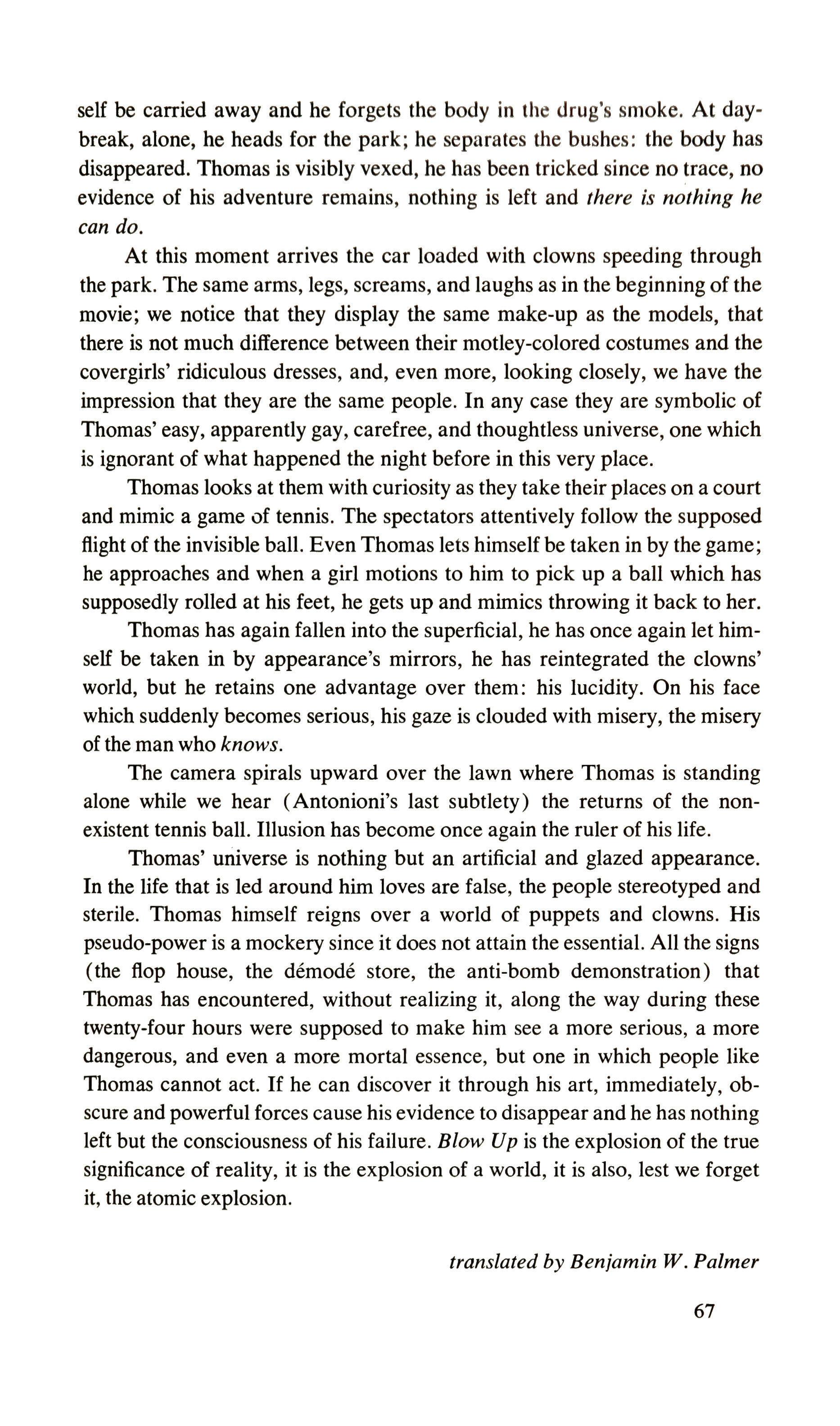
self be carried away and he forgets the body in tile drug's smoke. At daybreak, alone, he heads for the park; he separates the bushes: the body has disappeared. Thomas is visibly vexed, he has been tricked since no trace, no evidence of his adventure remains, nothing is left and there is nothing he can do.
At this moment arrives the car loaded with clowns speeding through the park. The same arms, legs, screams, and laughs as in the beginning of the movie; we notice that they display the same make-up as the models, that there is not much difference between their motley-colored costumes and the covergirls' ridiculous dresses, and, even more, looking closely, we have the impression that they are the same people. In any case they are symbolic of Thomas' easy, apparently gay, carefree, and thoughtless universe, one which is ignorant of what happened the night before in this very place.
Thomas looks at them with curiosity as they take their places on a court and mimic a game of tennis. The spectators attentively follow the supposed flight of the invisible ball. Even Thomas lets himself be taken in by the game; he approaches and when a girl motions to him to pick up a ball which has supposedly rolled at his feet, he gets up and mimics throwing it back to her.
Thomas has again fallen into the superficial, he has once again let himself be taken in by appearance's mirrors, he has reintegrated the clowns' world, but he retains one advantage over them: his lucidity. On his face which suddenly becomes serious, his gaze is clouded with misery, the misery of the man who knows.
The camera spirals upward over the lawn where Thomas is standing alone while we hear (Antonioni's last subtlety) the returns of the nonexistent tennis ball. Illusion has become once again the ruler of his life.
Thomas' universe is nothing but an artificial and glazed appearance. In the life that is led around him loves are false, the people stereotyped and sterile. Thomas himself reigns over a world of puppets and clowns. His pseudo-power is a mockery since it does not attain the essential. All the signs (the flop house, the demode store, the anti-bomb demonstration) that Thomas has encountered, without realizing it, along the way during these twenty-four hours were supposed to make him see a more serious, a more dangerous, and even a more mortal essence, but one in which people like Thomas cannot act. If he can discover it through his art, immediately, obscure and powerful forces cause his evidence to disappear and he has nothing left but the consciousness of his failure. Blow Up is the explosion of the true significance of reality, it is the explosion of a world, it is also, lest we forget it, the atomic explosion.
translated by Benjamin W. Palmer
67

I � 1 I ,)�' 'f > '" ; " 'I ;.-1 � t.:.� 'i /.1 1 .' I/ I� 'f); I 'r •
THREE POEMS BY SHUNTAROTANIKAWA (1931- )
translated by Thomas Fitzsimmons

Because the world itself loves me (cruelly at times gently) I can always be alone
Even when first I was given another all I could hear was the world, its voices; for me there are only the simple grief and joys I belong always and only to the world
Sky trees earth's flood of people into these I leap and that richness is me
But turn me to one person singly the whole world fades there is no me
1
small table by the bed a lamp circle of its light a clock by the clock her glasses
clock ticks spectacles shine looking I feel nothing
just wanted to mention the few things and myself first mention and last clock clocks on I am through another moment and I may explode
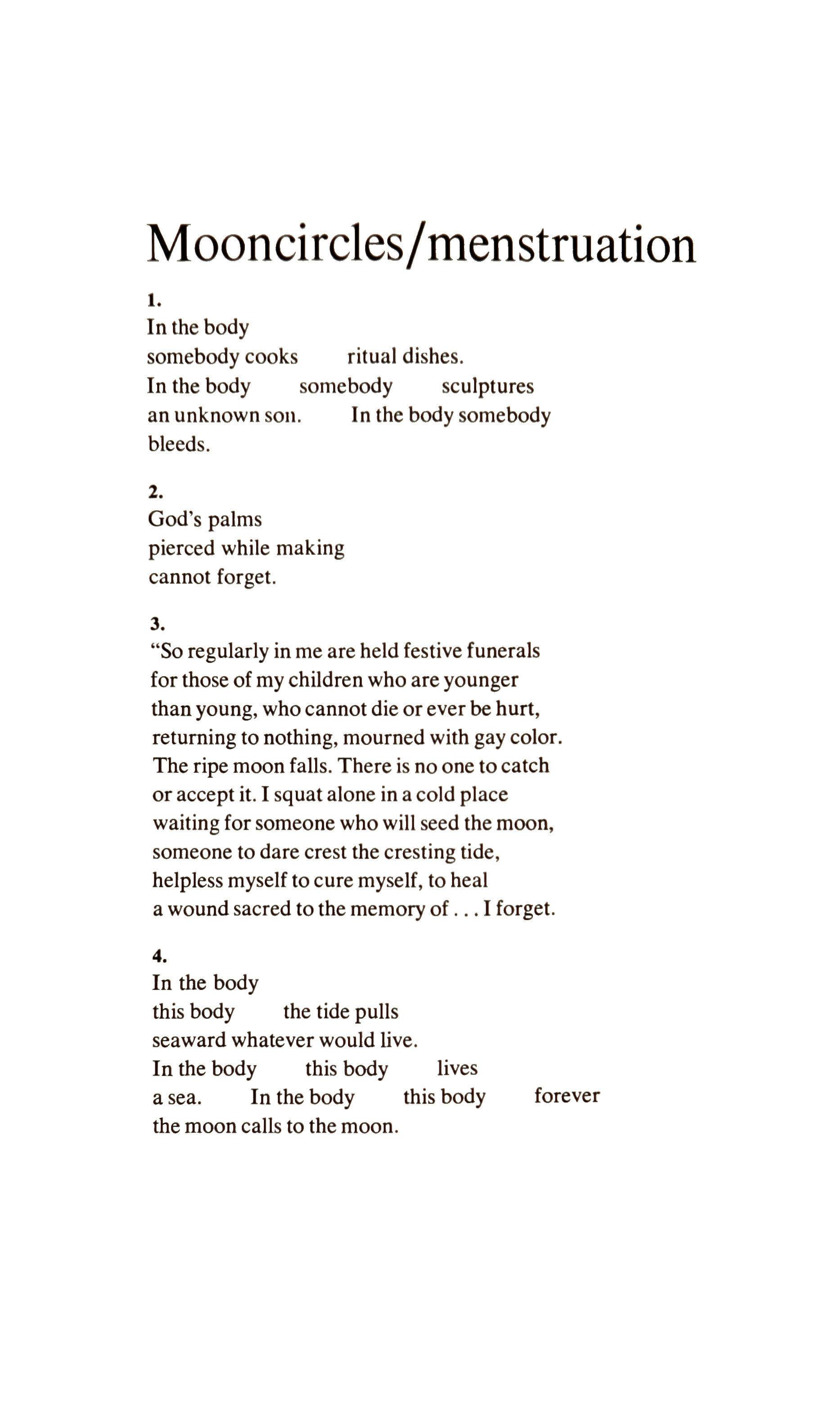
OOnClfC es
1. In the body somebody cooks ritual dishes. In the body somebody sculptures an unknown SOli. In the body somebody bleeds.
2. God's palms pierced while making cannot forget.
3.
"So regularly in me are held festive funerals for those of my children who are younger than young, who cannot die or ever be hurt, returning to nothing, mourned with gay color. The ripe moon falls. There is no one to catch or accept it. I squat alone in a cold place waiting for someone who will seed the moon, someone to dare crest the cresting tide, helpless myself to cure myself, to heal a wound sacred to the memory of I forget.
4. In the body this body the tide pulls seaward whatever would live. In the body this body a sea. In the body the moon calls to the moon. lives this body forever
FIVE POEMS BY
BENOY MOJUMDAR
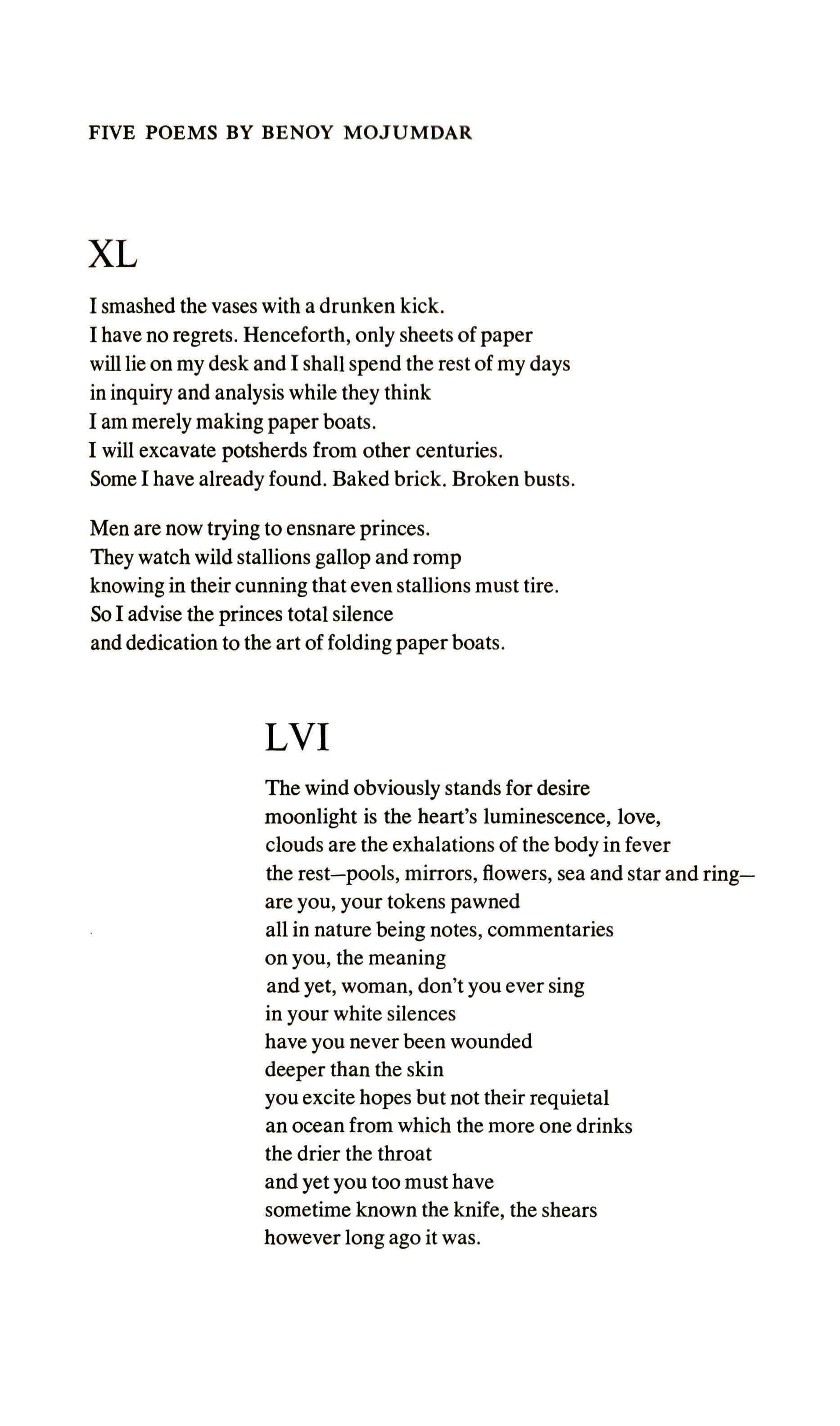
I smashed the vases with a drunken kick. I have no regrets. Henceforth, only sheets of paper will lie on my desk and I shall spend the rest of my days in inquiry and analysis while they think I am merelymaking paper boats. I will excavate potsherds from other centuries. Some I have already found. Baked brick. Broken busts.
Men are now trying to ensnare princes. They watch wild stallions gallop and romp knowing in their cunning that even stallions must tire. So I advise the princes total silence and dedication to the art of folding paperboats.
LVI
The wind obviously stands for desire moonlight is the heart's luminescence, love, clouds are the exhalations of the body in fever the rest pools, mirrors, flowers, sea and star and ringare you, your tokens pawned all in nature being notes, commentaries on you, the meaning and yet, woman, don't you ever sing in your white silences have you never been wounded deeper than the skin you excite hopes but not their requietal an ocean from which the more one drinks the drier the throat and yet you too must have sometime known the knife, the shears however long ago it was.
With what dazzling hopes I rose from sleep today Although I wondered if I would dare to look up from my cup and face the others at morning tea the thought of the stroll later up the mall, up the hill to the highest peak with you held me up. But you have wandered off. Lost. Quite conceivably dead. You left me on the street like a bastard child, or maybe you never were? You are a faded mirage.
I think of life; a wound heals but hair never grows on the scar. Like ruminative flies lying still at night my throbs may only be biding their time as they did the day of return from hospital. Occasionally, like a child wetting a strange bed in sleep they will squirt out unbidden, drenching unfamiliar ground.

I have lost this wager. Time wins. It rained last night, or did I merely long for it in my sleep? The rain now lies in pools, mirrors for the sky to shave off its lather of clouds, fermenting mosquitoes, flies.
All that was delight and nourishment in the mouth last night turns into sordid history this pure dawn shreds of meat painful and stinking in crevices of the teeth that no brushing can dislodge. The blue stone in my ring simmers with unquenchable thirst. I fear the day of my death will be one like this.
We have visitations still. To wake up in a strange village at night and feel a languid snake glide over one's naked chest, to be soaked in sweat in awed silence.
o snake, do you know that the rise was another's body? Do you care what is happening in my heart? Suddenly the white song of wild geeseprayers to the moon for a little warmth.
He is gone, leaving a changed man.
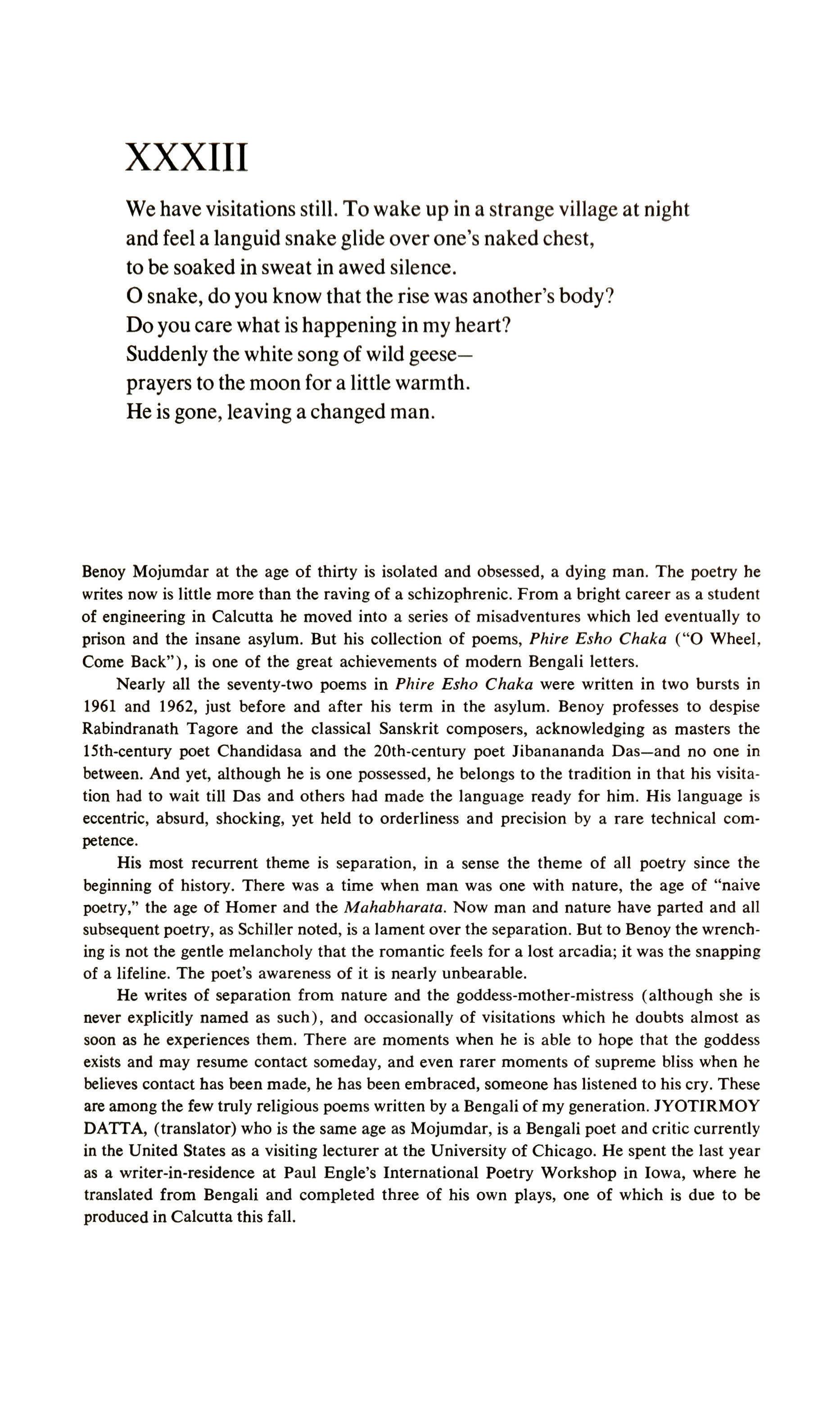
Benoy Mojumdar at the age of thirty is isolated and obsessed, a dying man. The poetry he writes now is little more than the raving of a schizophrenic. From a bright career as a student of engineering in Calcutta he moved into a series of misadventures which led eventually to prison and the insane asylum. But his collection of poems, Phire Esho Chaka ("0 Wheel, Come Back"), is one of the great achievements of modern Bengali letters.
Nearly all the seventy-two poems in Phire Esho Chaka were written in two bursts in 1961 and 1962, just before and after his term in the asylum. Benoy professes to despise Rabindranath Tagore and the classical Sanskrit composers, acknowledging as masters the 15th-century poet Chandidasa and the 20th-century poet Jibanananda Das-and no one in between. And yet, although he is one possessed, he belongs to the tradition in that his visitation had to wait till Das and others had made the language ready for him. His language is eccentric, absurd, shocking, yet held to orderliness and precision by a rare technical competence.
His most recurrent theme is separation, in a sense the theme of all poetry since the beginning of history. There was a time when man was one with nature, the age of "naive poetry," the age of Homer and the Mahabharata. Now man and nature have parted and all subsequent poetry, as Schiller noted, is a lament over the separation. But to Benoy the wrenching is not the gentle melancholy that the romantic feels for a lost arcadia; it was the snapping of a lifeline. The poet's awareness of it is nearly unbearable.
He writes of separation from nature and the goddess-mother-mistress (although she is never explicitly named as such), and occasionally of visitations which he doubts almost as soon as he experiences them. There are moments when he is able to hope that the goddess exists and may resume contact someday, and even rarer moments of supreme bliss when he believes contact has been made, he has been embraced, someone has listened to his cry. These are among the few truly religious poems written by a Bengali of my generation. IYOTIRMOY DATTA, (translator) who is the same age as Mojurndar, is a Bengali poet and critic currently in the United States as a visiting lecturer at the University of Chicago. He spent the last year as a writer-in-residence at Paul Engle's International Poetry Workshop in Iowa, where he translated from Bengali and completed three of his own plays, one of which is due to be produced in Calcutta this fall.
acanas
I've fallen in love with the Splendid One: death decay form place end part has He none, and no birthmarks.
o mother, I love Him. Listen to me, mother, I fell for the Handsome One Who is not of this world, has no fear: therefore, Arjuna of the Jasmines is my husband.
Take the rest of them, these husbandswho die, who rot,and throw them into kitchen fires!
MAHADEVIYAKKA
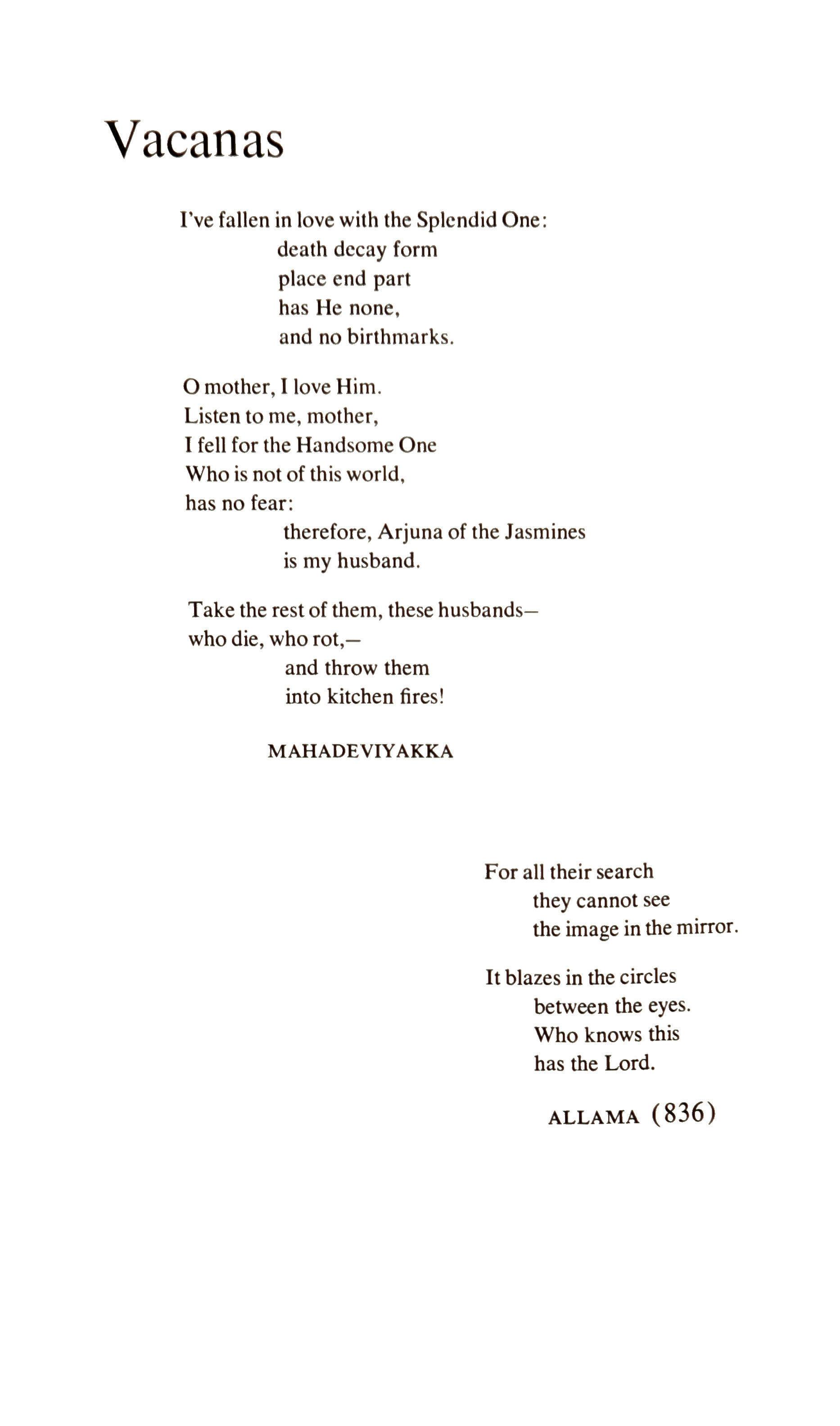
For all their search they cannot see the image in the mirror. It blazes in the circles between the eyes. Who knows this has the Lord.
ALLAMA (836)
You take the water we wash your feet with, You take the food we offer and you say it's yours, everything, goods, life, honor-
You're really the whore who takes every last bit of her night's wages, and will take no words for payment,
You, my lord of the meeting rivers!
BASAVANNA (468)

Speaking of Siva: religious lyrics (vacanas) from medieval Kannada Vacanas, literally 'sayings', are free verse poems. The metre they use is the metre of syntax. not the metre of received syllabic prosody. Some of them were set to music and sung.
The three great vacanakara's ('vacana-makers') were contemporaries in the twelfth century: Allama, the master of them all, subtle, intricate, serene; Basavanna, saint-in-theworld, intense, contemptuous of priest and worldling, devoted to the Lord and His men; Mahadeviyakka, joined to her Lord in physical and metaphysical love. Devana Dasimayya lived a century earlier; his vacanas are direct, searing, often crude.
Each saint had his signature, the name of his favorite form of Lord Siva. For Dasimayya it was Ramanatha, 'the master of Rama' (Rama was a devotee of Siva). For Mahadeviyakka, He was Cennamallikarjuna, the lover, the Handsome Arjuna of the Jasmines. For Basavanna, He was the Lord of the Meeting Rivers, Kudalasangamadeva; for Allama, Guheswara, the Lord of the Caves. The poems normally call upon the Lord by name, and address themselves to him.
Vacanas are the expression of a militantly reformist religious movement, the Virasaiva movement. Basavanna, who was also the minister of Bijjala (ca. 1156), a king of Karnatak, is usually considered the leader of this movement. It was a protest movement, a 'protestant' movement even-against caste and priest, scripture and ritual, superstition and blind learning, against everything that substituted abstraction for experience. The language was the racy colloquial of local dialectal speech, earthy and fresh in its images, sinewy in its rhythms, unashamed in its use of the naked native Kannada of the streets. The vacana poets and saints were not learned pundits but weavers, ferrymen, washermen, potters, and even women.
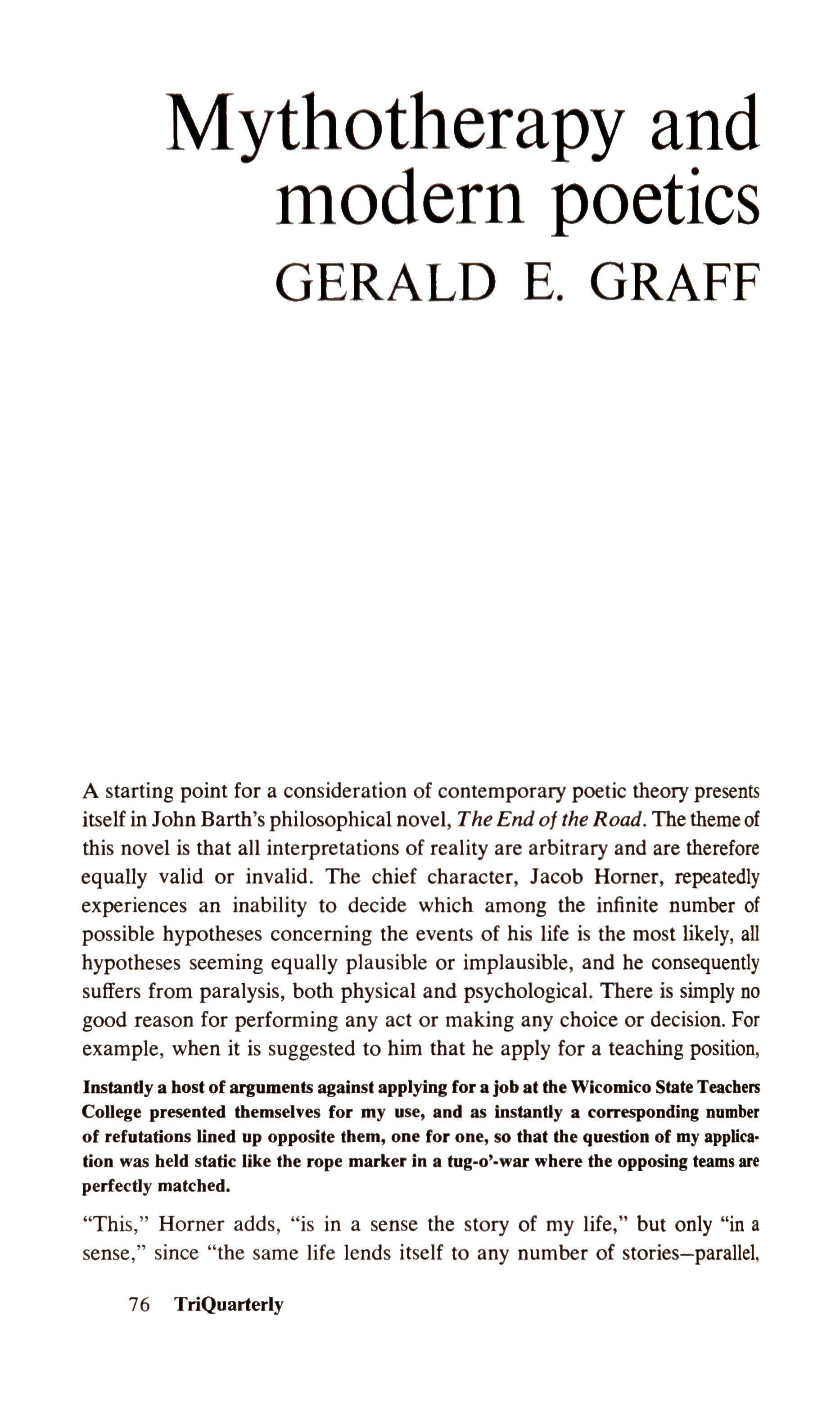
A starting point for a consideration of contemporary poetic theory presents itself in John Barth's philosophical novel, The End of the Road. The theme of this novel is that all interpretations of reality are arbitrary and are therefore equally valid or invalid. The chief character, Jacob Horner, repeatedly experiences an inability to decide which among the infinite number of possible hypotheses concerning the events of his life is the most likely, all hypotheses seeming equally plausible or implausible, and he consequently suffers from paralysis, both physical and psychological. There is simply no good reason for performing any act or making any choice or decision. For example, when it is suggested to him that he apply for a teaching position,
Instandya host of arguments against applying for a job at the Wicomico State Teachers CoUege presented themselves for my use, and as instandy a corresponding number of refutations lined up opposite them, one for one, so that the question of my application was held static like the rope marker in a tug-o'-war where the opposing teams are perfectly matched.
"This," Horner adds, "is in a sense the story of my life," but only "in a sense," since "the same life lends itself to any number of stories-parallel,
76 TriQuarterly
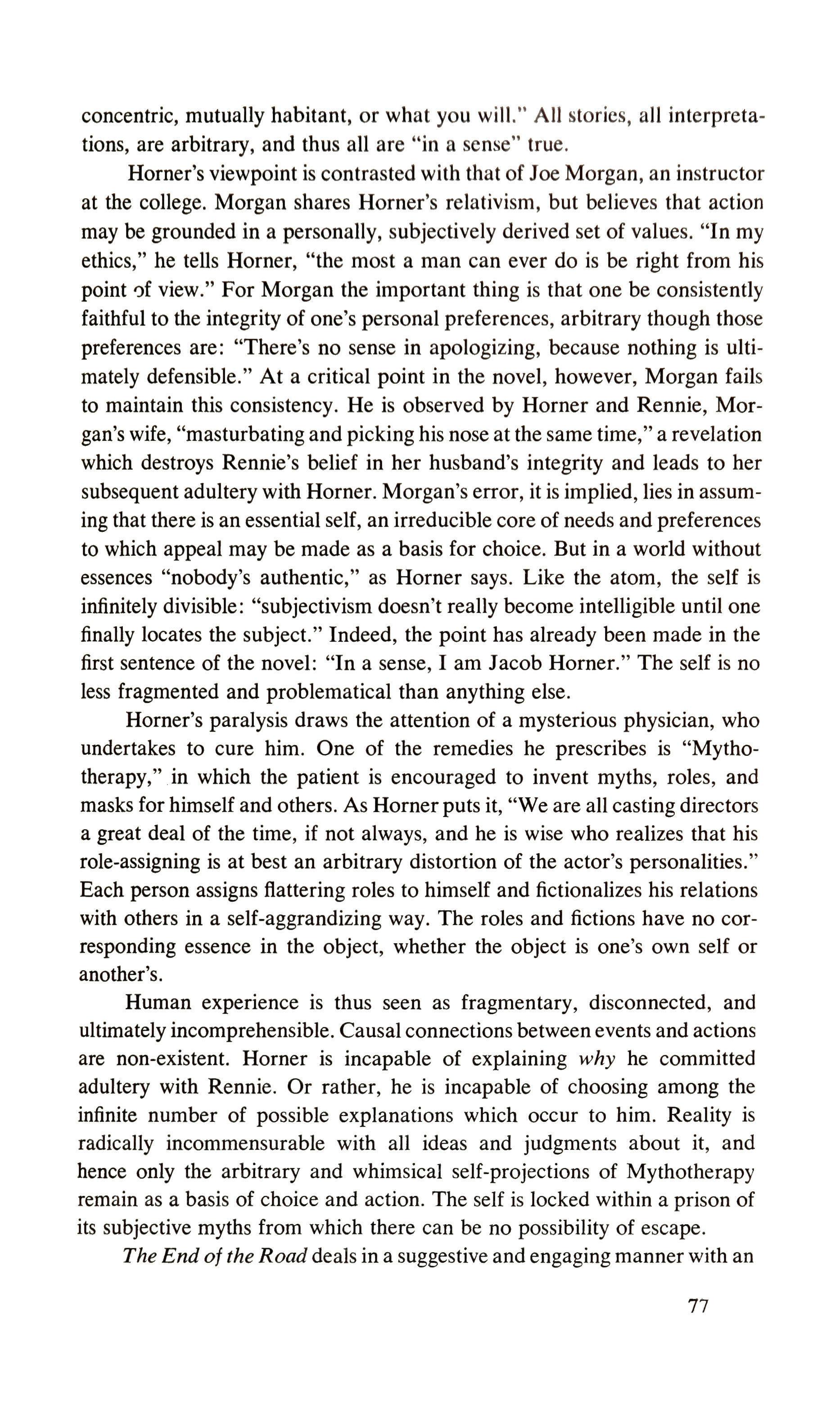
concentric, mutually habitant, or what you will." All stories, all interpretations, are arbitrary, and thus all are "in a sense" true.
Horner's viewpoint is contrasted with that of Joe Morgan, an instructor at the college. Morgan shares Horner's relativism, but believes that action may be grounded in a personally, subjectively derived set of values. "In my ethics," he tells Horner, "the most a man can ever do is be right from his point of view." For Morgan the important thing is that one be consistently faithful to the integrity of one's personal preferences, arbitrary though those preferences are: "There's no sense in apologizing, because nothing is ultimately defensible." At a critical point in the novel, however, Morgan fails to maintain this consistency. He is observed by Horner and Rennie, Morgan's wife, "masturbating and picking his nose at the same time," a revelation which destroys Rennie's belief in her husband's integrity and leads to her subsequent adultery with Horner. Morgan's error, it is implied, lies in assuming that there is an essential self, an irreducible core of needs and preferences to which appeal may be made as a basis for choice. But in a world without essences "nobody's authentic," as Horner says. Like the atom, the self is infinitely divisible: "subjectivism doesn't really become intelligible until one finally locates the subject." Indeed, the point has already been made in the first sentence of the novel: "In a sense, I am Jacob Horner." The self is no less fragmented and problematical than anything else. Horner's paralysis draws the attention of a mysterious physician, who undertakes to cure him. One of the remedies he prescribes is "Mythotherapy," in which the patient is encouraged to invent myths, roles, and masks for himself and others. As Horner puts it, "We are all casting directors a great deal of the time, if not always, and he is wise who realizes that his role-assigning is at best an arbitrary distortion of the actor's personalities." Each person assigns flattering roles to himself and fictionalizes his relations with others in a self-aggrandizing way. The roles and fictions have no corresponding essence in the object, whether the object is one's own self or another's.
Human experience is thus seen as fragmentary, disconnected, and ultimately incomprehensible. Causal connections between events and actions are non-existent. Horner is incapable of explaining why he committed adultery with Rennie. Or rather, he is incapable of choosing among the infinite number of possible explanations which occur to him. Reality is radically incommensurable with all ideas and judgments about it, and hence only the arbitrary and whimsical self-projections of Mythotherapy remain as a basis of choice and action. The self is locked within a prison of its subjective myths from which there can be no possibility of escape.
The End of the Road deals in a suggestive and engaging manner with an
77
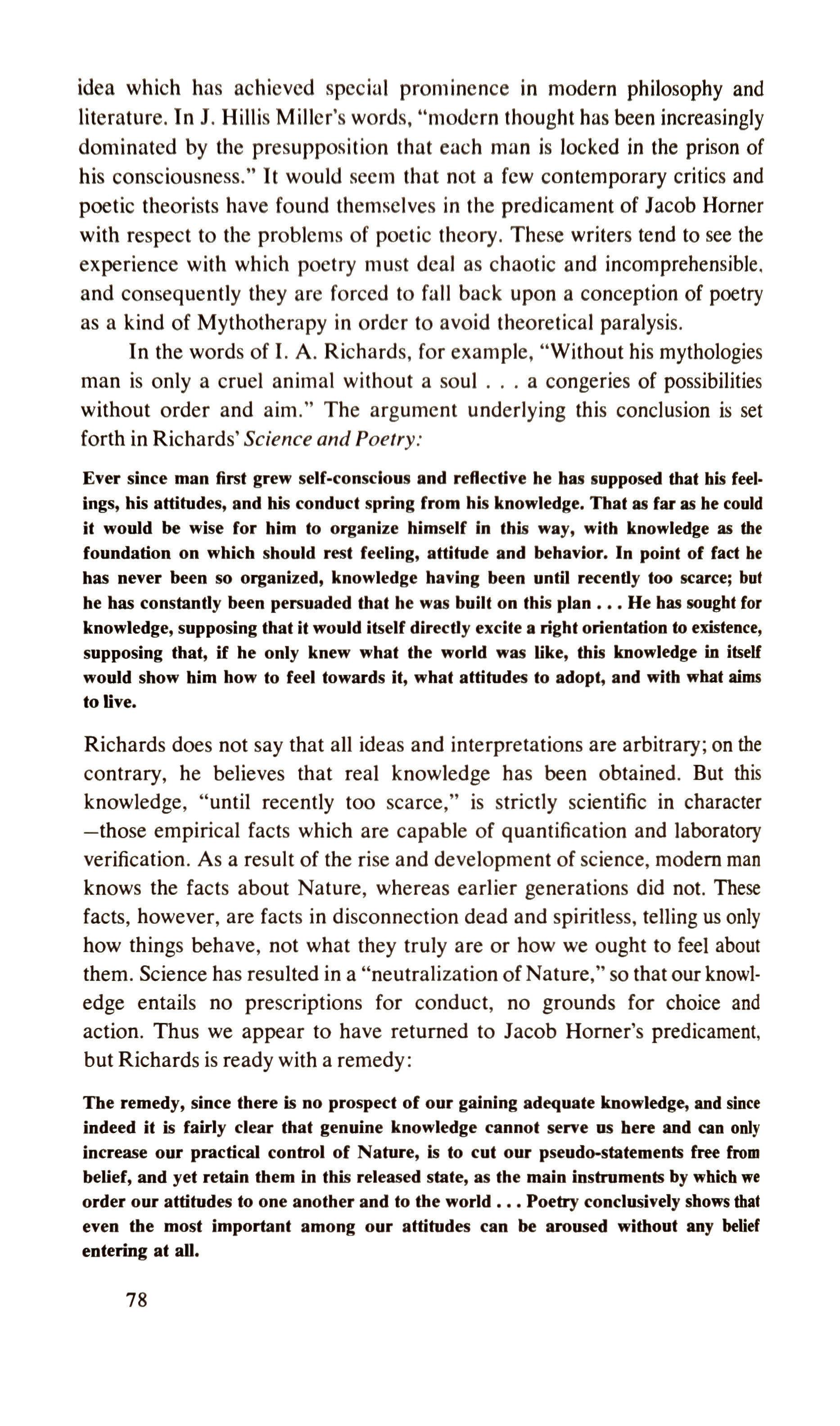
idea which has achieved special prominence in modern philosophy and literature. In J. Hillis Miller's words, "modern thought has been increasingly dominated by the presupposition that each man is locked in the prison of his consciousness." It would seem that not a few contemporary critics and poetic theorists have found themselves in the predicament of Jacob Horner with respect to the problems of poetic theory. These writers tend to see the experience with which poetry must deal as chaotic and incomprehensible. and consequently they are forced to fall back upon a conception of poetry as a kind of Mythotherapy in order to avoid theoretical paralysis.
In the words of I. A. Richards, for example, "Without his mythologies man is only a cruel animal without a soul a congeries of possibilities without order and aim." The argument underlying this conclusion is set forth in Richards' Science and Poetry:
Ever since man first grew self-conscious and reflective he has supposed that his feelings, his attitudes, and his conduct spring from his knowledge. That as far as he could it would be wise for him to organize himself in this way, with knowledge as the foundation on which should rest feeling, attitude and behavior. In point of fact be has never been so organized, knowledge having been until recently too scarce; but he has constantly been persuaded that he was built on this plan He has lOught for knowledge, supposing that it would itself directly excite a right orientation to existence, supposing that, if he only knew what the world was like, this knowledge in itseH would show him how to feel towards it, what attitudes to adopt, and with what aims to live.
Richards does not say that all ideas and interpretations are arbitrary; on the contrary, he believes that real knowledge has been obtained. But this knowledge, "until recently too scarce," is strictly scientific in character -those empirical facts which are capable of quantification and laboratory verification. As a result of the rise and development of science, modem man knows the facts about Nature, whereas earlier generations did not. These facts, however, are facts in disconnection dead and spiritless, telling us only how things behave, not what they truly are or how we ought to feel about them. Science has resulted in a "neutralization ofNature," so that our knowledge entails no prescriptions for conduct, no grounds for choice and action. Thus we appear to have returned to Jacob Homer's predicament, but Richards is ready with a remedy:
The remedy, since there is no prospect of our gaining adequate knowledge, and since indeed it is fairly clear that genuine knowledge cannot serve us here and can only increase our practical control of Nature, is to cut our pseudo-statements fIee from belief, and yet retain them in this released state, as the main instruments by whicb we order our attitudes to one another and to the world Poetry conclusively shows that even the most important among our attitudes can be aroused without any beUef entering at aU.
78
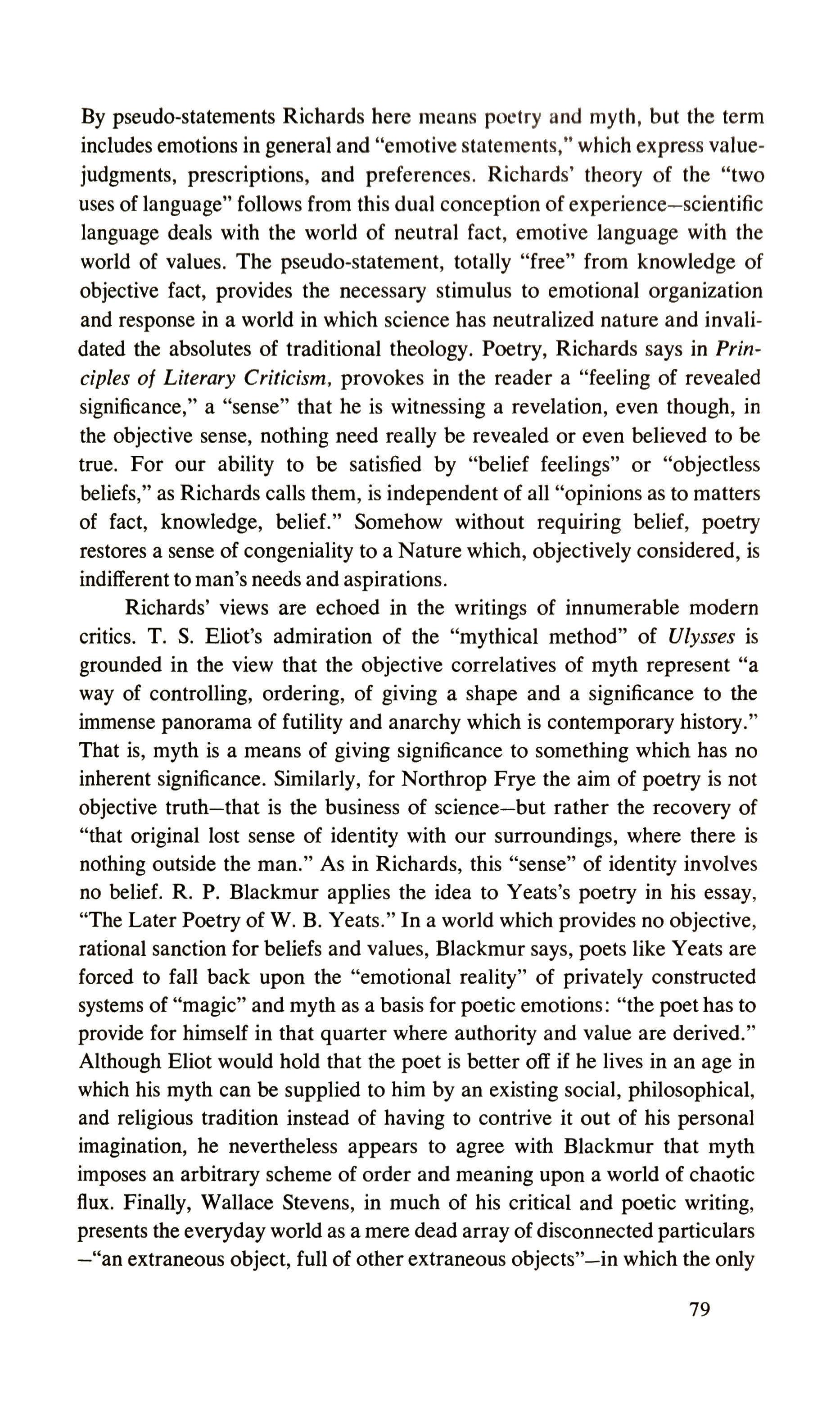
By pseudo-statements Richards here means poetry and myth, but the term includes emotions in general and "emotive statements," which express valuejudgments, prescriptions, and preferences. Richards' theory of the "two uses of language" follows from this dual conception of experience scientific language deals with the world of neutral fact, emotive language with the world of values. The pseudo-statement, totally "free" from knowledge of objective fact, provides the necessary stimulus to emotional organization and response in a world in which science has neutralized nature and invalidated the absolutes of traditional theology. Poetry, Richards says in Principles of Literary Criticism, provokes in the reader a "feeling of revealed significance," a "sense" that he is witnessing a revelation, even though, in the objective sense, nothing need really be revealed or even believed to be true. For our ability to be satisfied by "belief feelings" or "objectless beliefs," as Richards calls them, is independent of all "opinions as to matters of fact, knowledge, belief." Somehow without requiring belief, poetry restores a sense of congeniality to a Nature which, objectively considered, is indifferent to man's needs and aspirations.
Richards' views are echoed in the writings of innumerable modern critics. T. S. Eliot's admiration of the "mythical method" of Ulysses is grounded in the view that the objective correlatives of myth represent "a way of controlling, ordering, of giving a shape and a significance to the immense panorama of futility and anarchy which is contemporary history." That is, myth is a means of giving significance to something which has no inherent significance. Similarly, for Northrop Frye the aim of poetry is not objective truth that is the business of science but rather the recovery of "that original lost sense of identity with our surroundings, where there is nothing outside the man." As in Richards, this "sense" of identity involves no belief. R. P. Blackmur applies the idea to Yeats's poetry in his essay, "The Later Poetry of W. B. Yeats." In a world which provides no objective, rational sanction for beliefs and values, Blackmur says, poets like Yeats are forced to fall back upon the "emotional reality" of privately constructed systems of "magic" and myth as a basis for poetic emotions: "the poet has to provide for himself in that quarter where authority and value are derived." Although Eliot would hold that the poet is better off if he lives in an age in which his myth can be supplied to him by an existing social, philosophical, and religious tradition instead of having to contrive it out of his personal imagination, he nevertheless appears to agree with Blackmur that myth imposes an arbitrary scheme of order and meaning upon a world of chaotic flux. Finally, Wallace Stevens, in much of his critical and poetic writing, presents the everyday world as a mere dead array of disconnected particulars -"an extraneous object, full of other extraneous objects" in which the only
79
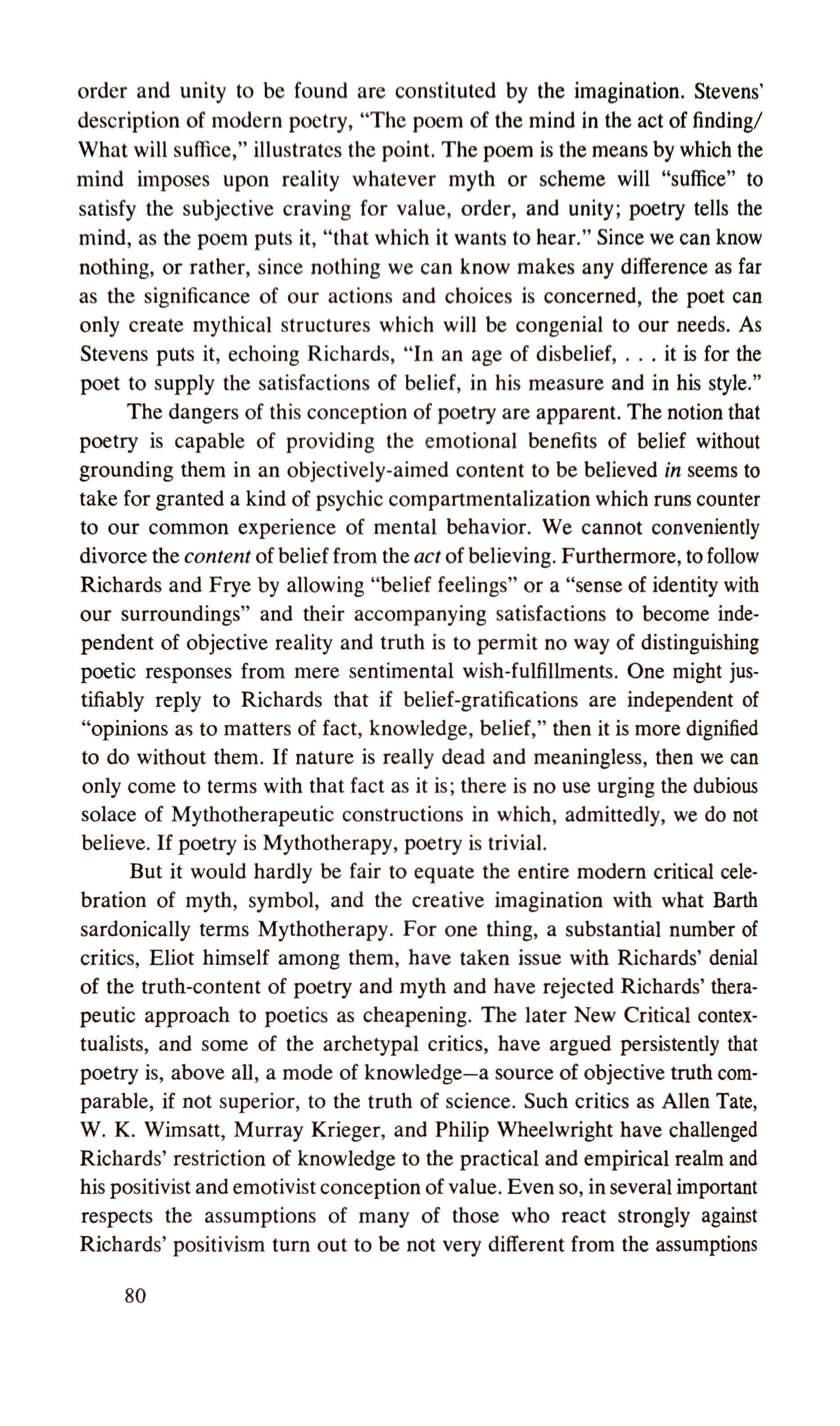
order and unity to be found are constituted by the imagination. Stevens' description of modern poetry, "The poem of the mind in the act of finding/ What will suffice," illustrates the point. The poem is the means by which the mind imposes upon reality whatever myth or scheme will "suffice" to satisfy the subjective craving for value, order, and unity; poetry tells the mind, as the poem puts it, "that which it wants to hear." Since we can know nothing, or rather, since nothing we can know makes any difference as far as the significance of our actions and choices is concerned, the poet can only create mythical structures which will be congenial to our needs. As Stevens puts it, echoing Richards, "In an age of disbelief, it is for the poet to supply the satisfactions of belief, in his measure and in his style."
The dangers of this conception of poetry are apparent. The notion that poetry is capable of providing the emotional benefits of belief without grounding them in an objectively-aimed content to be believed in seems to take for granted a kind of psychic compartmentalization which runs counter to our common experience of mental behavior. We cannot conveniently divorce the content of belief from the act of believing. Furthermore, to follow Richards and Frye by allowing "belief feelings" or a "sense of identity with our surroundings" and their accompanying satisfactions to become independent of objective reality and truth is to permit no way of distinguishing poetic responses from mere sentimental wish-fulfillments. One might justifiably reply to Richards that if belief-gratifications are independent of "opinions as to matters of fact, knowledge, belief," then it is more dignified to do without them. If nature is really dead and meaningless, then we can only come to terms with that fact as it is; there is no use urging the dubious solace of Mythotherapeutic constructions in which, admittedly, we do not believe. If poetry is Mythotherapy, poetry is trivial.
But it would hardly be fair to equate the entire modem critical celebration of myth, symbol, and the creative imagination with what Barth sardonically terms Mythotherapy. For one thing, a substantial number of critics, Eliot himself among them, have taken issue with Richards' denial of the truth-content of poetry and myth and have rejected Richards' therapeutic approach to poetics as cheapening. The later New Critical contextualists, and some of the archetypal critics, have argued persistently that poetry is, above all, a mode of knowledge a source of objective truth comparable, if not superior, to the truth of science. Such critics as Allen Tate, W. K. Wimsatt, Murray Krieger, and Philip Wheelwright have challenged Richards' restriction of knowledge to the practical and empirical realm and his positivist and emotivist conception of value. Even so, in several important respects the assumptions of many of those who react strongly against Richards' positivism tum out to be not very different from the assumptions
80
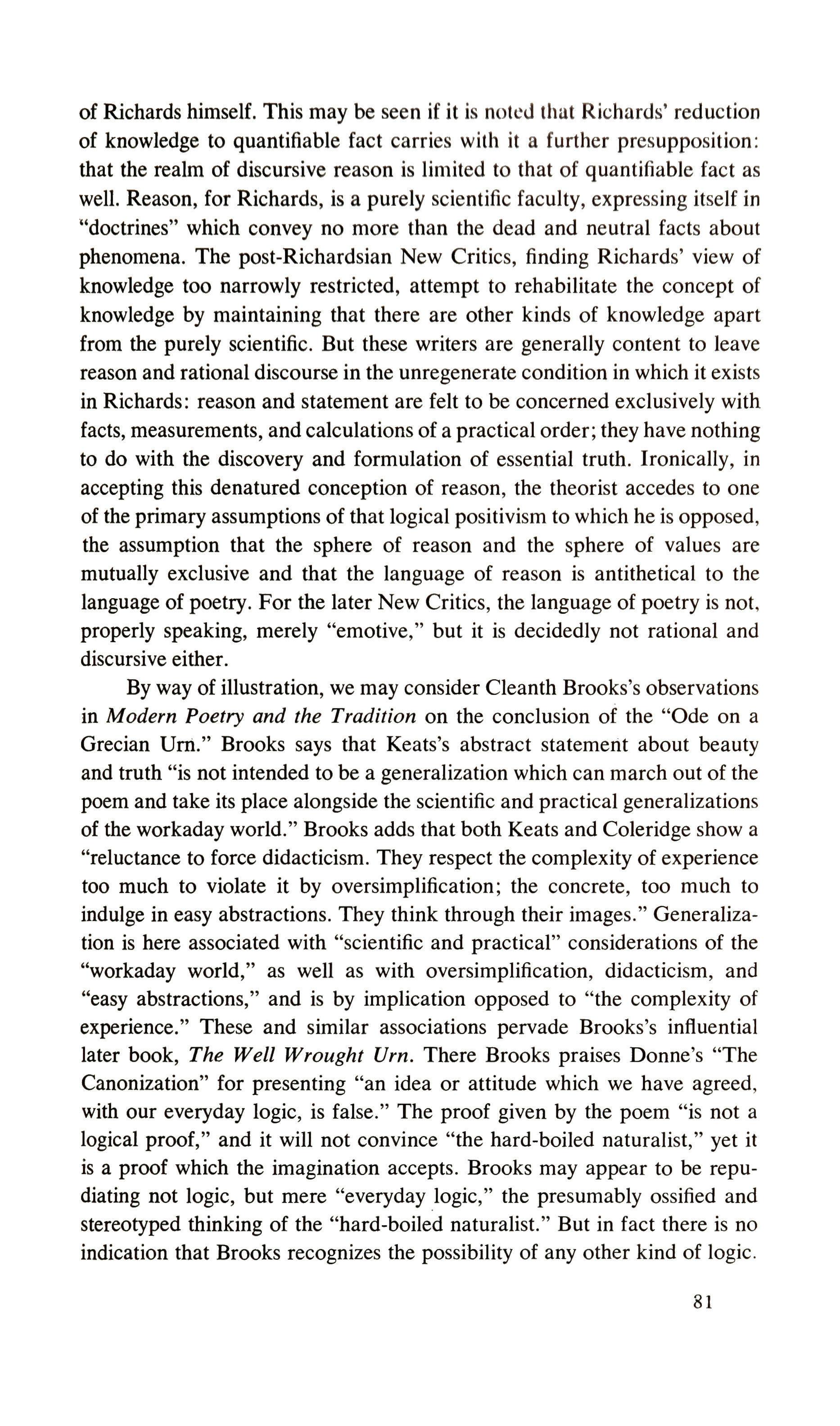
of Richards himself. This may be seen if it is noted that Richards' reduction of knowledge to quantifiable fact carries with it a further presupposition: that the realm of discursive reason is limited to that of quantifiable fact as well. Reason, for Richards, is a purely scientific faculty, expressing itself in "doctrines' which convey no more than the dead and neutral facts about phenomena. The post-Richardsian New Critics, finding Richards' view of knowledge too narrowly restricted, attempt to rehabilitate the concept of knowledge by maintaining that there are other kinds of knowledge apart from the purely scientific. But these writers are generally content to leave reason and rational discourse in the unregenerate condition in which it exists in Richards: reason and statement are felt to be concerned exclusively with facts, measurements, and calculations of a practical order; they have nothing to do with the discovery and formulation of essential truth. Ironically, in accepting this denatured conception of reason, the theorist accedes to one of the primary assumptions of that logical positivism to which he is opposed, the assumption that the sphere of reason and the sphere of values are mutually exclusive and that the language of reason is antithetical to the language of poetry. For the later New Critics, the language of poetry is not, properly speaking, merely "emotive," but it is decidedly not rational and discursive either.
By way of illustration, we may consider Cleanth Brooks's observations in Modern Poetry and the Tradition on the conclusion of the "Ode on a Grecian Urn." Brooks says that Keats's abstract statement about beauty and truth "is not intended to be a generalization which can march out of the poem and take its place alongside the scientific and practical generalizations of the workaday world." Brooks adds that both Keats and Coleridge show a "reluctance to force didacticism. They respect the complexity of experience too much to violate it by oversimplification; the concrete, too much to indulge in easy abstractions. They think through their images." Generalization is here associated with "scientific and practical" considerations of the "workaday world," as well as with oversimplification, didacticism, and "easy abstractions," and is by implication opposed to "the complexity of experience." These and similar associations pervade Brooks's influential later book, The Well Wrought Urn. There Brooks praises Donne's "The Canonization" for presenting "an idea or attitude which we have agreed, with our everyday logic, is false." The proof given by the poem "is not a logical proof," and it will not convince "the hard-boiled naturalist," yet it is a proof which the imagination accepts. Brooks may appear to be repudiating not logic, but mere "everyday logic," the presumably ossified and stereotyped thinking of the "hard-boiled naturalist." But in fact there is no indication that Brooks recognizes the possibility of any other kind of logic.
81
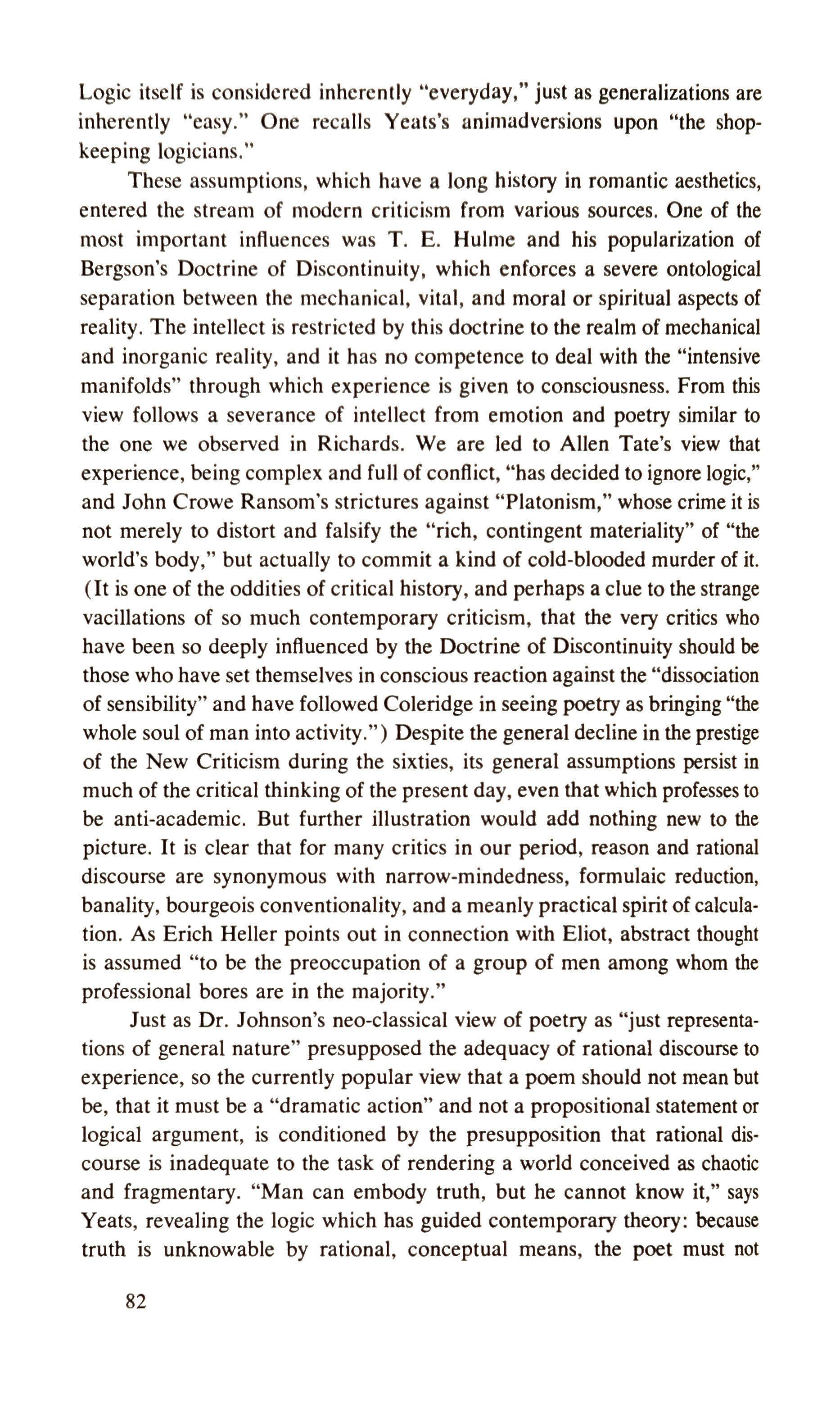
Logic itself is considered inherently "everyday," just as generalizations are inherently "easy." One recalls Yeats's animadversions upon "the shopkeeping logicians."
These assumptions, which have a long history in romantic aesthetics, entered the stream of modern criticism from various sources. One of the most important influences was T. E. Hulme and his popularization of Bergson's Doctrine of Discontinuity, which enforces a severe ontological separation between the mechanical, vital, and moral or spiritual aspects of reality. The intellect is restricted by this doctrine to the realm of mechanical and inorganic reality, and it has no competence to deal with the "intensive manifolds" through which experience is given to consciousness. From this view follows a severance of intellect from emotion and poetry similar to the one we observed in Richards. We are led to Allen Tate's view that experience, being complex and full of conflict, "has decided to ignore logic," and John Crowe Ransom's strictures against "Platonism," whose crime it is not merely to distort and falsify the "rich, contingent materiality" of "the world's body," but actually to commit a kind of cold-blooded murder of it. (It is one of the oddities of critical history, and perhaps a clue to the strange vacillations of so much contemporary criticism, that the very critics who have been so deeply influenced by the Doctrine of Discontinuity should be those who have set themselves in conscious reaction against the "dissociation of sensibility" and have followed Coleridge in seeing poetry as bringing "the whole soul of man into activity.") Despite the general decline in the prestige of the New Criticism during the sixties, its general assumptions persist in much of the critical thinking of the present day, even that which professes to be anti-academic. But further illustration would add nothing new to the picture. It is clear that for many critics in our period, reason and rational discourse are synonymous with narrow-mindedness, formulaic reduction, banality, bourgeois conventionality, and a meanly practical spirit of calculation. As Erich Heller points out in connection with Eliot, abstract thought is assumed "to be the preoccupation of a group of men among whom the professional bores are in the majority."
Just as Dr. Johnson's neo-classical view of poetry as "just representations of general nature" presupposed the adequacy of rational discourse to experience, so the currently popular view that a poem should not mean but be, that it must be a "dramatic action" and not a propositional statement or logical argument, is conditioned by the presupposition that rational discourse is inadequate to the task of rendering a world conceived as chaotic and fragmentary. "Man can embody truth, but he cannot know it," says Yeats, revealing the logic which has guided contemporary theory: because truth is unknowable by rational, conceptual means, the poet must not
82
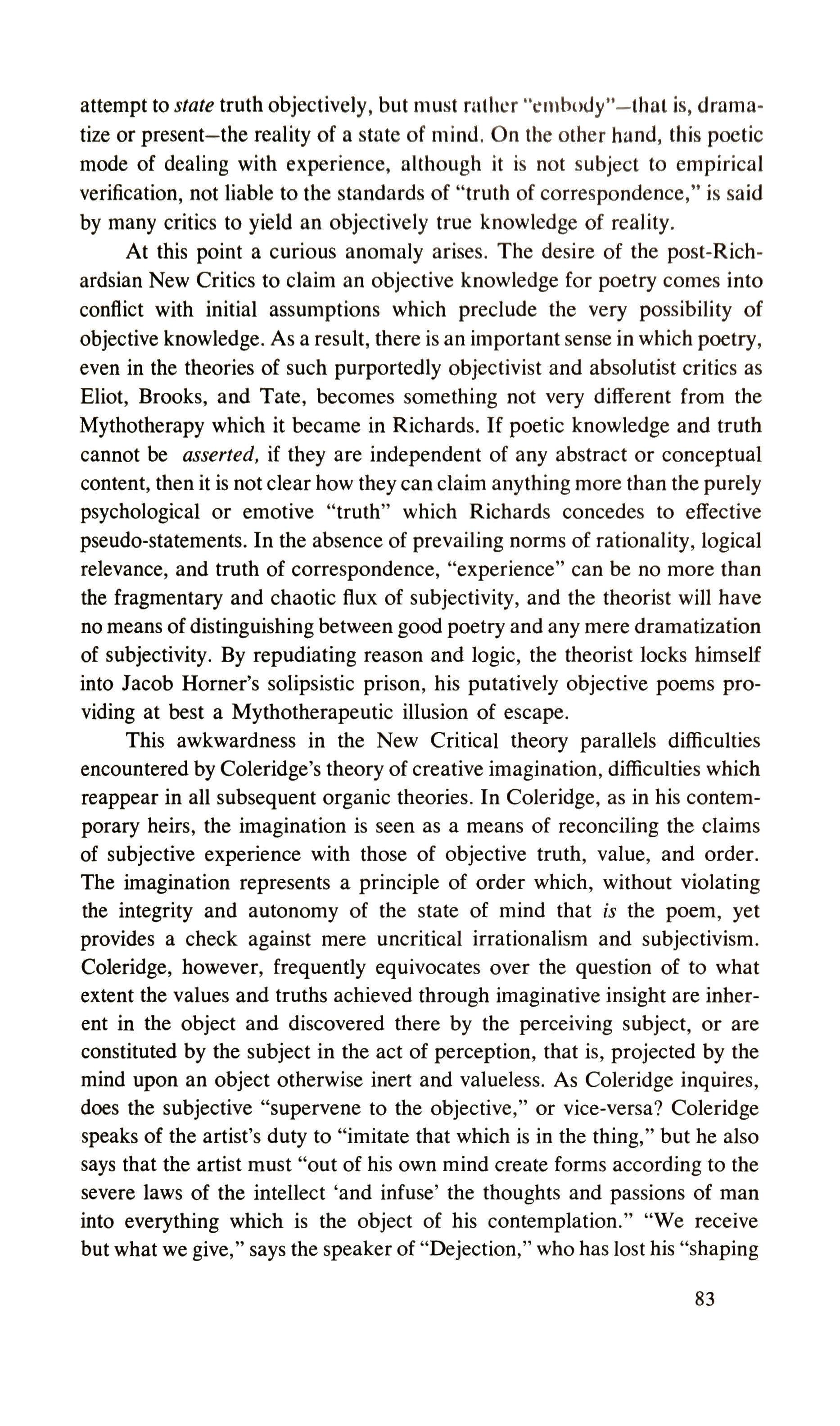
attempt to state truth objectively, but must ruther "embody' that is, dramatize or present the reality of a state of mind, On the other hand, this poetic mode of dealing with experience, although it is not subject to empirical verification, not liable to the standards of "truth of correspondence," is said by many critics to yield an objectively true knowledge of reality.
At this point a curious anomaly arises. The desire of the post-Richardsian New Critics to claim an objective knowledge for poetry comes into conflict with initial assumptions which preclude the very possibility of objective knowledge. As a result, there is an important sense in which poetry, even in the theories of such purportedly objectivist and absolutist critics as Eliot, Brooks, and Tate, becomes something not very different from the Mythotherapy which it became in Richards. If poetic knowledge and truth cannot be asserted, if they are independent of any abstract or conceptual content, then it is not clear how they can claim anything more than the purely psychological or emotive "truth" which Richards concedes to effective pseudo-statements. In the absence of prevailing norms of rationality, logical relevance, and truth of correspondence, "experience" can be no more than the fragmentary and chaotic flux of subjectivity, and the theorist will have no means of distinguishing between good poetry and any mere dramatization of subjectivity. By repudiating reason and logic, the theorist locks himself into Jacob Horner's solipsistic prison, his putatively objective poems providing at best a Mythotherapeutic illusion of escape.
This awkwardness in the New Critical theory parallels difficulties encountered by Coleridge's theory of creative imagination, difficulties which reappear in all subsequent organic theories. In Coleridge, as in his contemporary heirs, the imagination is seen as a means of reconciling the claims of subjective experience with those of objective truth, value, and order. The imagination represents a principle of order which, without violating the integrity and autonomy of the state of mind that is the poem, yet provides a check against mere uncritical irrationalism and subjectivism. Coleridge, however, frequently equivocates over the question of to what extent the values and truths achieved through imaginative insight are inherent in the object and discovered there by the perceiving subject, or are constituted by the subject in the act of perception, that is, projected by the mind upon an object otherwise inert and valueless. As Coleridge inquires, does the subjective "supervene to the objective," or vice-versa? Coleridge speaks of the artist's duty to "imitate that which is in the thing," but he also says that the artist must "out of his own mind create forms according to the severe laws of the intellect 'and infuse' the thoughts and passions of man into everything which is the object of his contemplation." "We receive but what we give," says the speaker of "Dejection," who has lost his "shaping
83
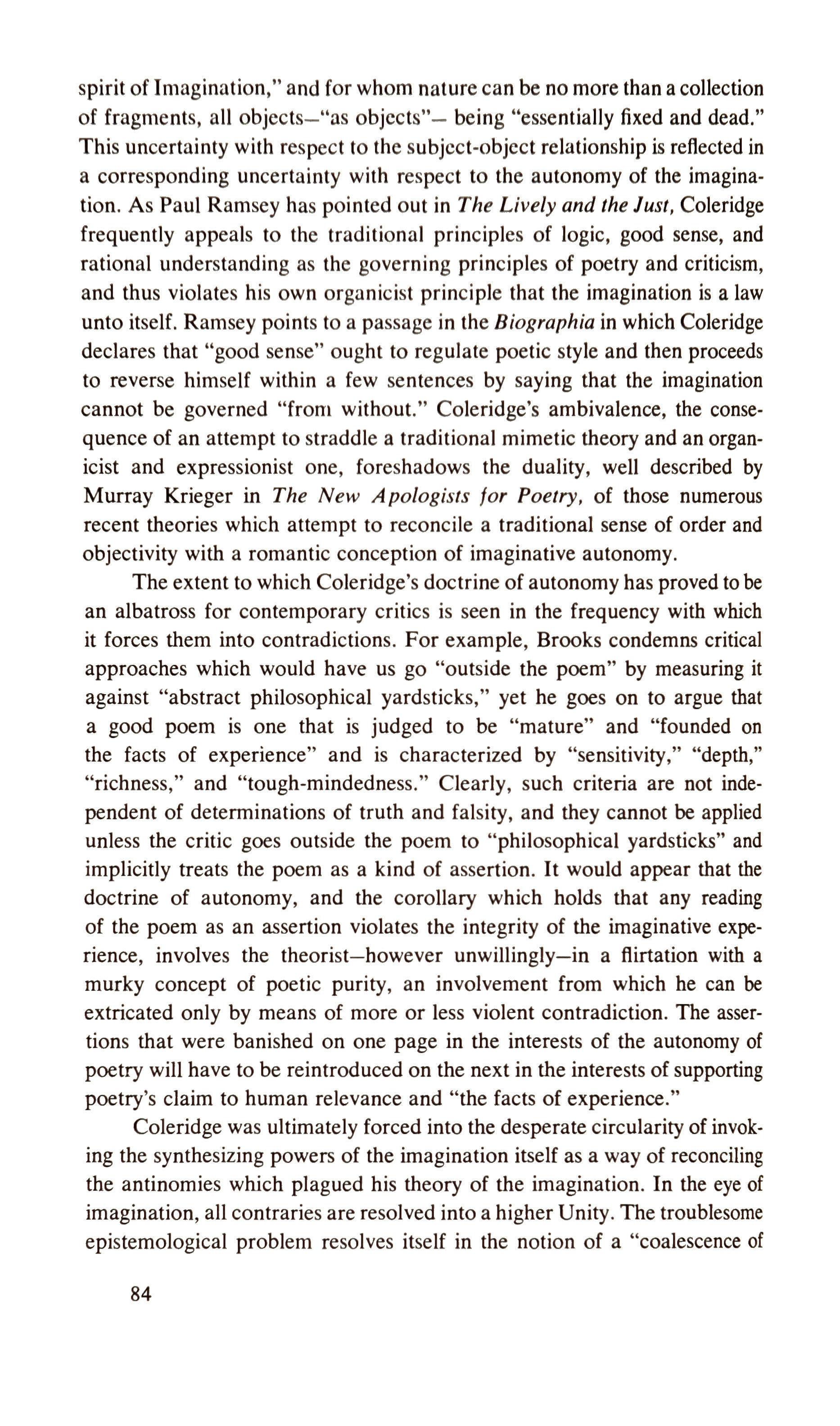
spirit of Imagination," and for whom nature can be no more than a collection of fragments, all objects "as objects" being "essentially fixed and dead." This uncertainty with respect to the subject-object relationship is reflected in a corresponding uncertainty with respect to the autonomy of the imagination. As Paul Ramsey has pointed out in The Lively and the Just, Coleridge frequently appeals to the traditional principles of logic, good sense, and rational understanding as the governing principles of poetry and criticism, and thus violates his own organicist principle that the imagination is a law unto itself. Ramsey points to a passage in the Biographia in which Coleridge declares that "good sense" ought to regulate poetic style and then proceeds to reverse himself within a few sentences by saying that the imagination cannot be governed "from without." Coleridge's ambivalence, the consequence of an attempt to straddle a traditional mimetic theory and an organicist and expressionist one, foreshadows the duality, well described by Murray Krieger in The New Apologists for Poetry, of those numerous recent theories which attempt to reconcile a traditional sense of order and objectivity with a romantic conception of imaginative autonomy.
The extent to which Coleridge's doctrine of autonomy has proved to be an albatross for contemporary critics is seen in the frequency with which it forces them into contradictions. For example, Brooks condemns critical approaches which would have us go "outside the poem" by measuring it against "abstract philosophical yardsticks," yet he goes on to argue that a good poem is one that is judged to be "mature" and "founded on the facts of experience" and is characterized by "sensitivity," "depth," "richness," and "tough-mindedness." Clearly, such criteria are not independent of determinations of truth and falsity, and they cannot be applied unless the critic goes outside the poem to "philosophical yardsticks" and implicitly treats the poem as a kind of assertion. It would appear that the doctrine of autonomy, and the corollary which holds that any reading of the poem as an assertion violates the integrity of the imaginative experience, involves the theorist however unwillingly in a flirtation with a murky concept of poetic purity, an involvement from which he can be extricated only by means of more or less violent contradiction. The assertions that were banished on one page in the interests of the autonomy of poetry will have to be reintroduced on the next in the interests of supporting poetry's claim to human relevance and "the facts of experience."
Coleridge was ultimately forced into the desperate circularity of invoking the synthesizing powers of the imagination itself as a way of reconciling the antinomies which plagued his theory of the imagination. In the eye of imagination, all contraries are resolved into a higher Unity. The troublesome epistemological problem resolves itself in the notion of a "coalescence of
84
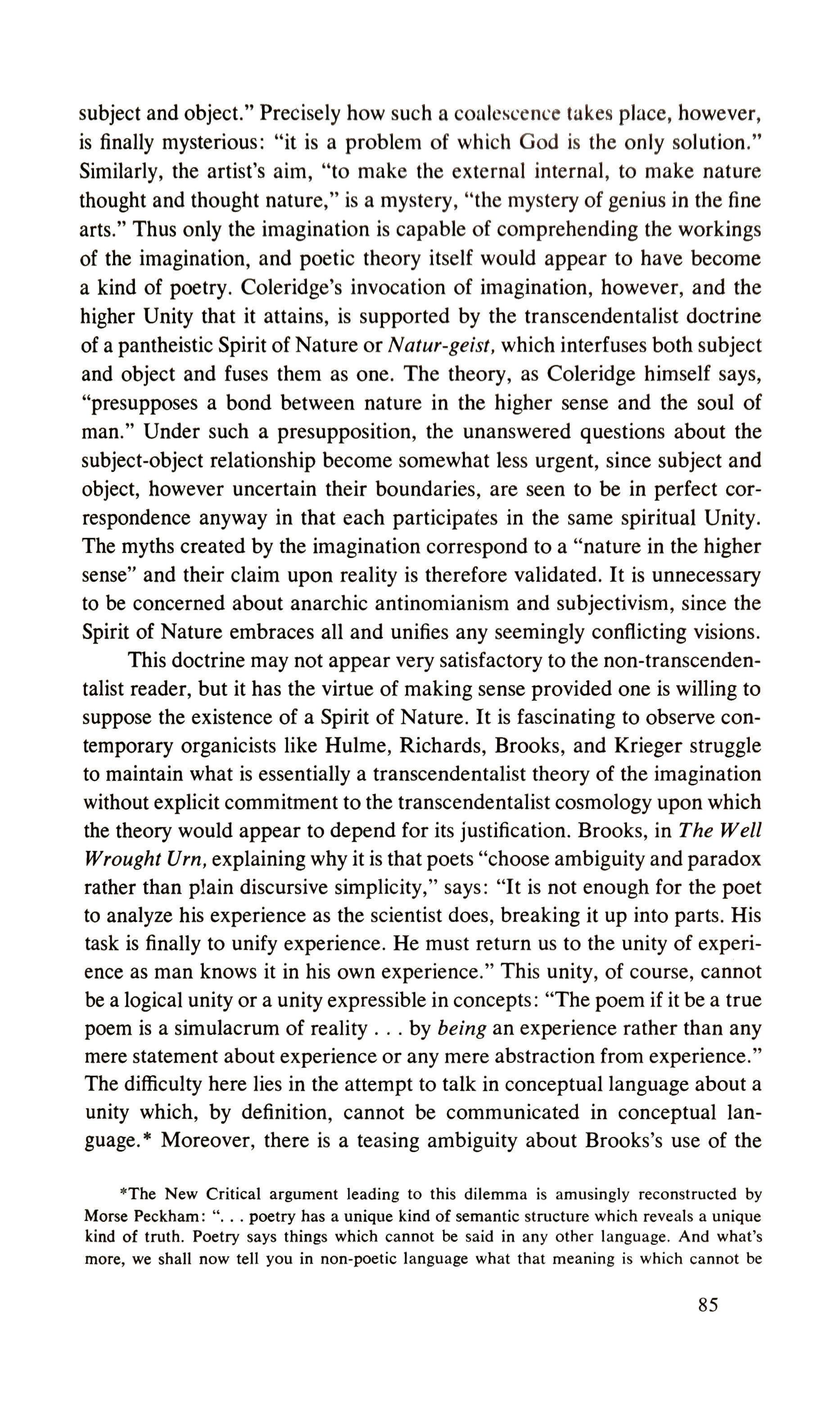
subject and object." Precisely how such a coalescence takes place, however, is finally mysterious: "it is a problem of which God is the only solution," Similarly, the artist's aim, "to make the external internal, to make nature thought and thought nature," is a mystery, "the mystery of genius in the fine arts." Thus only the imagination is capable of comprehending the workings of the imagination, and poetic theory itself would appear to have become a kind of poetry. Coleridge's invocation of imagination, however, and the higher Unity that it attains, is supported by the transcendentalist doctrine of a pantheistic Spirit of Nature or Natur-geist, which interfuses both subject and object and fuses them as one. The theory, as Coleridge himself says, "presupposes a bond between nature in the higher sense and the soul of man." Under such a presupposition, the unanswered questions about the subject-object relationship become somewhat less urgent, since subject and object, however uncertain their boundaries, are seen to be in perfect correspondence anyway in that each participates in the same spiritual Unity. The myths created by the imagination correspond to a "nature in the higher sense" and their claim upon reality is therefore validated. It is unnecessary to be concerned about anarchic antinomianism and subjectivism, since the Spirit of Nature embraces all and unifies any seemingly conflicting visions. This doctrine may not appear very satisfactory to the non-transcendentalist reader, but it has the virtue of making sense provided one is willing to suppose the existence of a Spirit of Nature. It is fascinating to observe contemporary organicists like Hulme, Richards, Brooks, and Krieger struggle to maintain what is essentially a transcendentalist theory of the imagination without explicit commitment to the transcendentalist cosmology upon which the theory would appear to depend for its justification. Brooks, in The Well Wrought Urn, explaining why it is that poets "choose ambiguity and paradox rather than plain discursive simplicity," says: "It is not enough for the poet to analyze his experience as the scientist does, breaking it up into parts. His task is finally to unify experience. He must return us to the unity of experience as man knows it in his own experience." This unity, of course, cannot be a logical unity or a unity expressible in concepts: "The poem if it be a true poem is a simulacrum of reality by being an experience rather than any mere statement about experience or any mere abstraction from experience." The difficulty here lies in the attempt to talk in conceptual language about a unity which, by definition, cannot be communicated in conceptual language. * Moreover, there is a teasing ambiguity about Brooks's use of the
*The New Critical argument leading to this dilemma is amusingly reconstructed by Morse Peckham: poetry has a unique kind of semantic structure which reveals a unique kind of truth. Poetry says things which cannot be said in any other language. And what's more, we shall now tell you in non-poetic language what that meaning is which cannot be 85
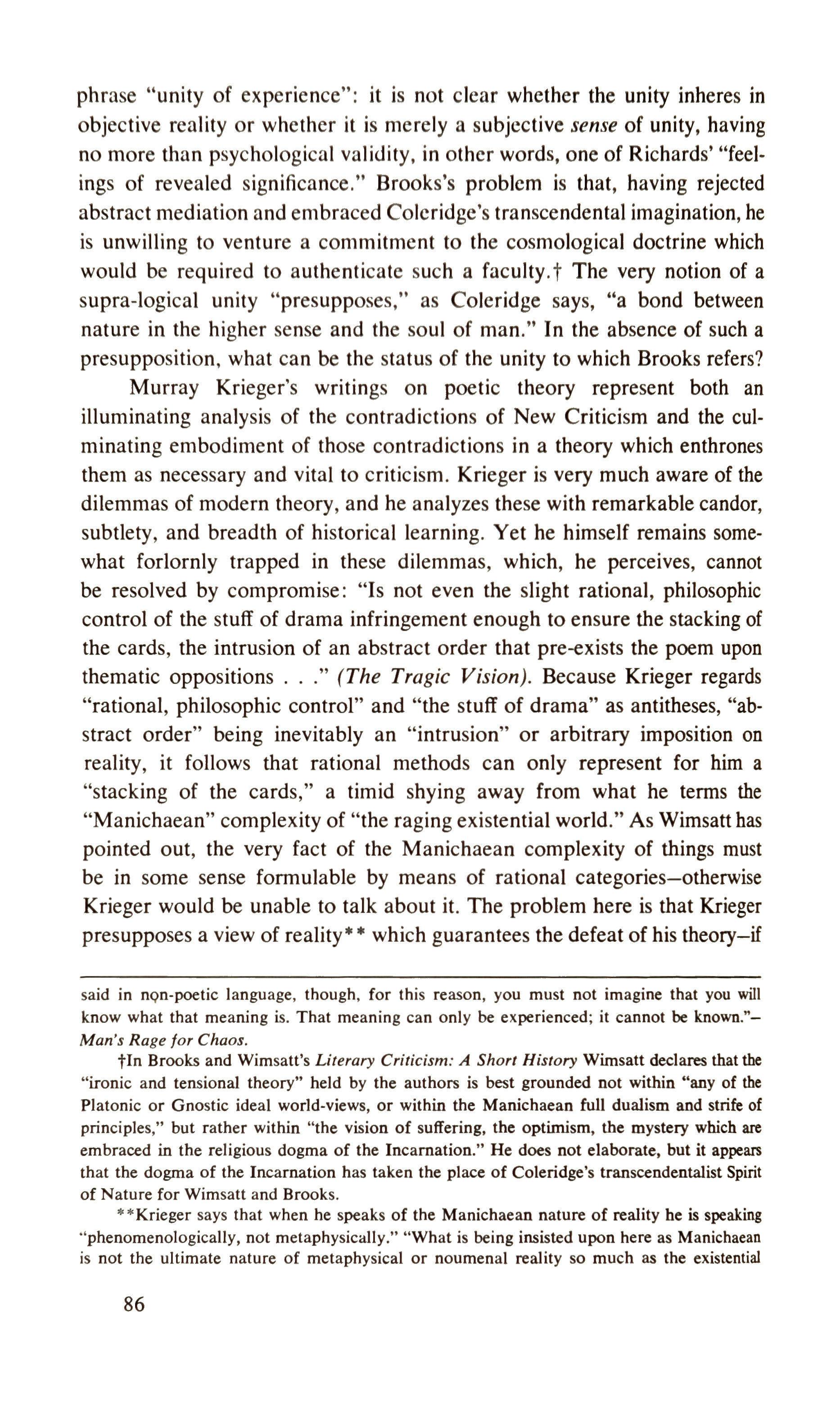
phrase "unity of experience": it is not clear whether the unity inheres in objective reality or whether it is merely a subjective sense of unity, having no more than psychological validity, in other words, one of Richards' "feelings of revealed significance." Brooks's problem is that, having rejected abstract mediation and embraced Coleridge's transcendental imagination, he is unwilling to venture a commitment to the cosmological doctrine which would be required to authenticate such a faculty.t The very notion of a supra-logical unity "presupposes," as Coleridge says, "a bond between nature in the higher sense and the soul of man." In the absence of such a presupposition, what can be the status of the unity to which Brooks refers?
Murray Krieger's writings on poetic theory represent both an illuminating analysis of the contradictions of New Criticism and the culminating embodiment of those contradictions in a theory which enthrones them as necessary and vital to criticism. Krieger is very much aware of the dilemmas of modern theory, and he analyzes these with remarkable candor, subtlety, and breadth of historical learning. Yet he himself remains somewhat forlornly trapped in these dilemmas, which, he perceives, cannot be resolved by compromise: "Is not even the slight rational, philosophic control of the stuff of drama infringement enough to ensure the stacking of the cards, the intrusion of an abstract order that pre-exists the poem upon thematic oppositions (The Tragic Vision). Because Krieger regards "rational, philosophic control" and "the stuff of drama" as antitheses, "abstract order" being inevitably an "intrusion" or arbitrary imposition on reality, it follows that rational methods can only represent for him a "stacking of the cards," a timid shying away from what he terms the "Manichaean" complexity of "the raging existential world." As Wimsatt has pointed out, the very fact of the Manichaean complexity of things must be in some sense formulable by means of rational categories otherwise Krieger would be unable to talk about it. The problem here is that Krieger presupposes a view of reality+" which guarantees the defeat of his theory-if
said in non-poetic language. though, for this reason, you must not imagine that you will know what that meaning is. That meaning can only be experienced; it cannot be Irnown."Man's Rage for Chaos.
tIn Brooks and Wimsatt's Literary Criticism: A Short History Wimsatt declares that the "ironic and tensional theory" held by the authors is best grounded not within "any of the Platonic or Gnostic ideal world-views, or within the Manichaean full dualism and strife of principles," but rather within "the vision of suffering, the optimism, the mystery which are embraced in the religious dogma of the Incarnation." He does not elaborate, but it appears that the dogma of the Incarnation has taken the place of Coleridge's transcendentalist Spirit of Nature for Wimsatt and Brooks.
**Krieger says that when he speaks of the Manichaean nature of reality he is speaking "phenomenologically, not metaphysically." "What is being insisted upon here as Manichaean is not the ultimate nature of metaphysical or noumenal reality so much as the existential
86
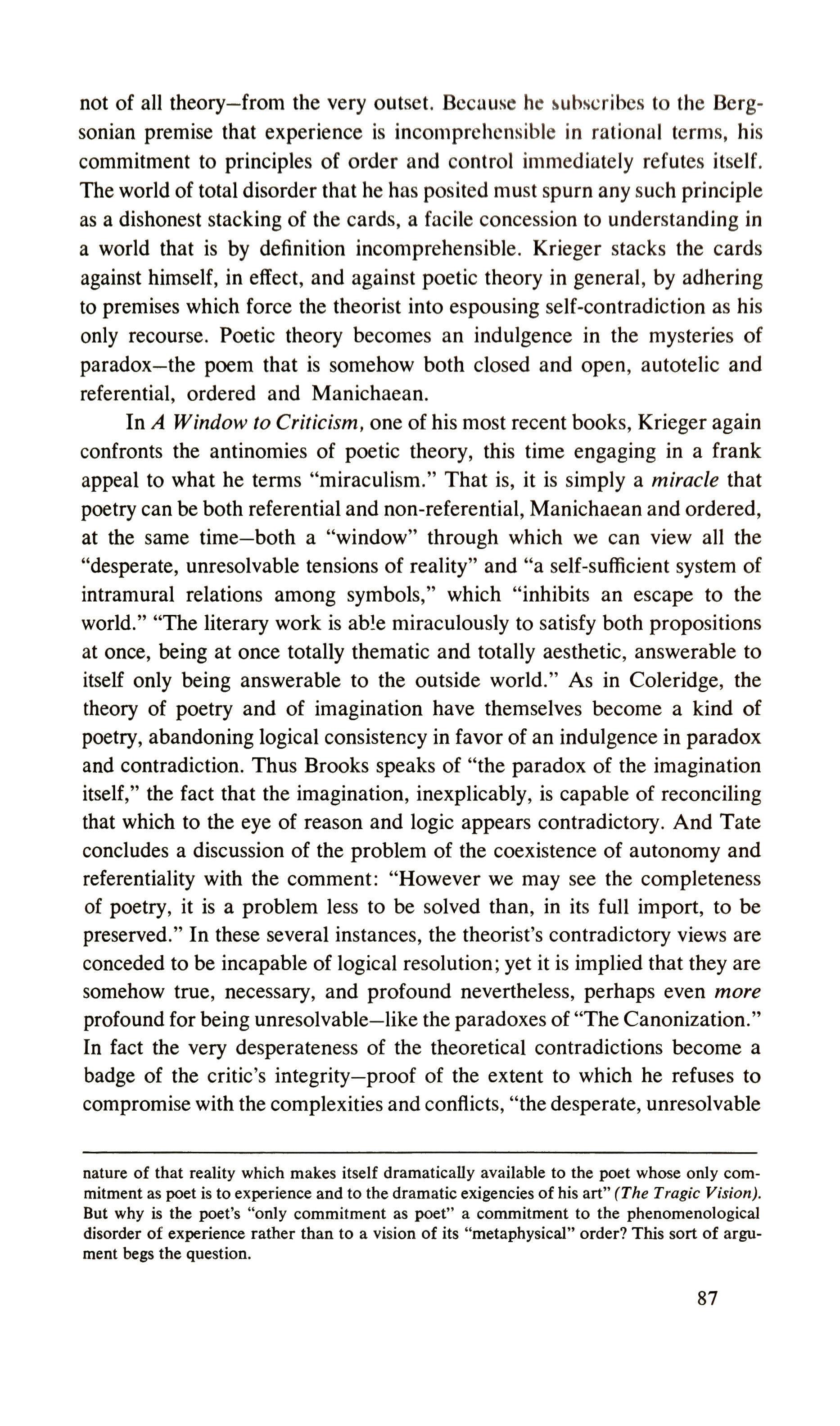
not of all theory from the very outset. Because he subscribes to the Bergsonian premise that experience is incomprehensible in rational terms, his commitment to principles of order and control immediately refutes itself. The world of total disorder that he has posited must spurn any such principle as a dishonest stacking of the cards, a facile concession to understanding in a world that is by definition incomprehensible. Krieger stacks the cards against himself, in effect, and against poetic theory in general, by adhering to premises which force the theorist into espousing self-contradiction as his only recourse. Poetic theory becomes an indulgence in the mysteries of paradox the poem that is somehow both closed and open, autotelic and referential, ordered and Manichaean.
In A Window to Criticism, one of his most recent books, Krieger again confronts the antinomies of poetic theory, this time engaging in a frank appeal to what he terms "miraculism." That is, it is simply a miracle that poetry can be both referential and non-referential, Manichaean and ordered, at the same time both a "window" through which we can view all the "desperate, unresolvable tensions of reality" and "a self-sufficient system of intramural relations among symbols," which "inhibits an escape to the world." "The literary work is able miraculously to satisfy both propositions at once, being at once totally thematic and totally aesthetic, answerable to itself only being answerable to the outside world." As in Coleridge, the theory of poetry and of imagination have themselves become a kind of poetry, abandoning logical consistency in favor of an indulgence in paradox and contradiction. Thus Brooks speaks of "the paradox of the imagination itself," the fact that the imagination, inexplicably, is capable of reconciling that which to the eye of reason and logic appears contradictory. And Tate concludes a discussion of the problem of the coexistence of autonomy and referentiality with the comment: "However we may see the completeness of poetry, it is a problem less to be solved than, in its full import, to be preserved." In these several instances, the theorist's contradictory views are conceded to be incapable of logical resolution; yet it is implied that they are somehow true, necessary, and profound nevertheless, perhaps even more profound for being unresolvable like the paradoxes of "The Canonization." In fact the very desperateness of the theoretical contradictions become a badge of the critic's integrity proof of the extent to which he refuses to compromise with the complexities and conflicts, "the desperate, unresolvable
nature of that reality which makes itself dramatically available to the poet whose only commitment as poet is to experience and to the dramatic exigencies of his art" (The Tragic Vision). But why is the poet's "only commitment as poet" a commitment to the phenomenological disorder of experience rather than to a vision of its "metaphysical" order? This sort of argument begs the question.
87
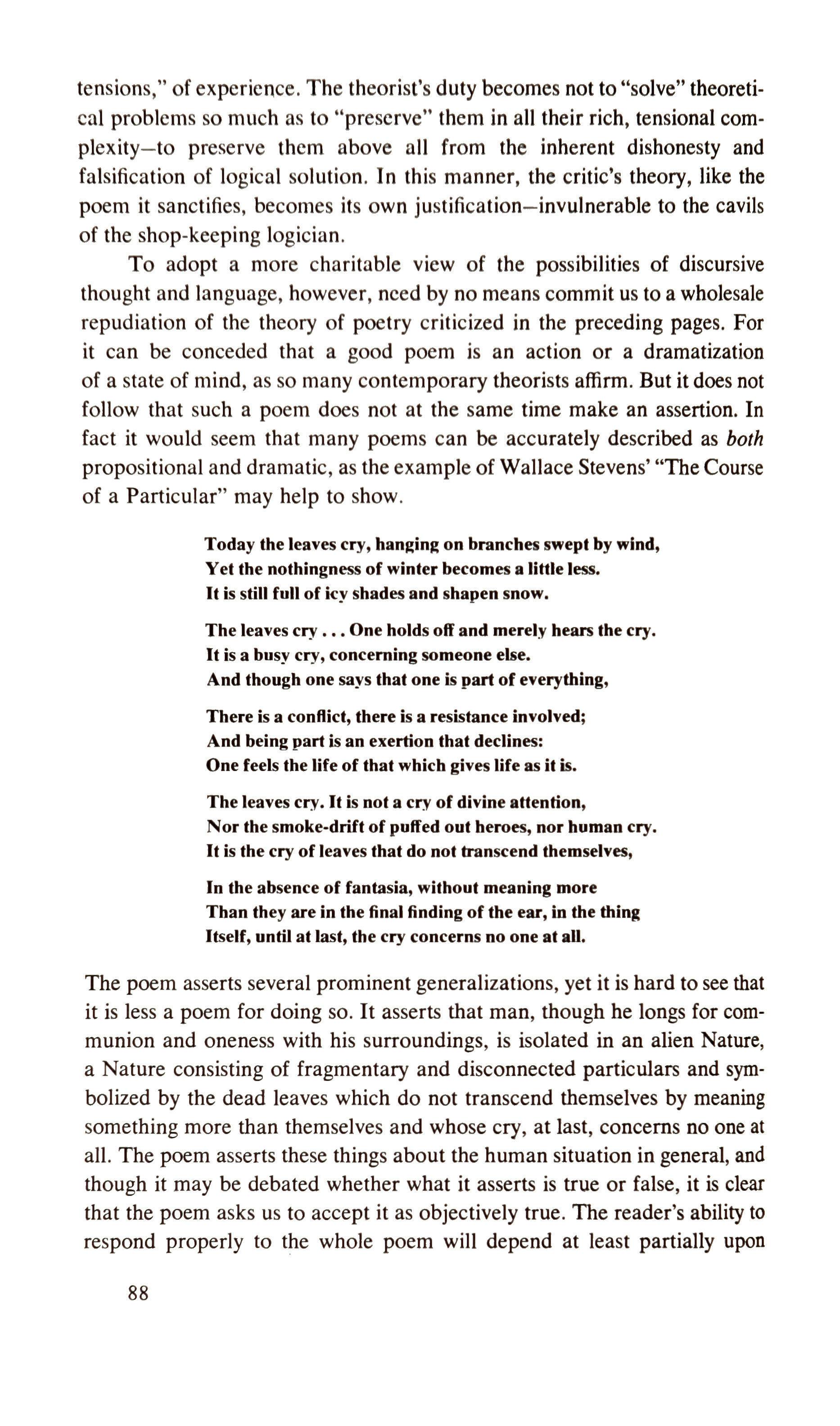
tensions," of experience. The theorist's duty becomes not to "solve" theoretical problems so much as to "preserve" them in all their rich, tensional complexity to preserve them above all from the inherent dishonesty and falsification of logical solution. In this manner, the critic's theory, like the poem it sanctifies, becomes its own justification invulnerable to the cavils of the shop-keeping logician.
To adopt a more charitable view of the possibilities of discursive thought and language, however, need by no means commit us to a wholesale repudiation of the theory of poetry criticized in the preceding pages. For it can be conceded that a good poem is an action or a dramatization of a state of mind, as so many contemporary theorists affirm, But it does not follow that such a poem does not at the same time make an assertion. In fact it would seem that many poems can be accurately described as both propositional and dramatic, as the example of Wallace Stevens' "The Course of a Particular" may help to show.
Today the leaves cry, han2in2 on branches swept by wind, Yet the nothingness of winter becomes a little less. It is still full of icy shades and shapen snow.
The leaves cry One holds off and merely hears the cry. It is a busy cry, concerning someone else.
And though one says that one is part of everything,
There is a conflict, there is a resistance involved; And being part is an exertion that declines: One feels the life of that which gives life as it is.
The leaves cry. It is not a cry of divine attention, Nor the smoke-drift of puffed out heroes, nor human cry. It is the cry of leaves that do not transcend themselves,
In the absence of fantasia, without meaning more Than they are in the final finding of the ear, in the thing Itself, until at last, the cry concerns no one at all.
The poem asserts several prominent generalizations, yet it is hard to see that it is less a poem for doing so. It asserts that man, though he longs for communion and oneness with his surroundings, is isolated in an alien Nature, a Nature consisting of fragmentary and disconnected particulars and symbolized by the dead leaves which do not transcend themselves by meaning something more than themselves and whose cry, at last, concerns no one at all. The poem asserts these things about the human situation in general, and though it may be debated whether what it asserts is true or false, it is clear that the poem asks us to accept it as objectively true. The reader's ability to respond properly to the whole poem will depend at least partially upon
88
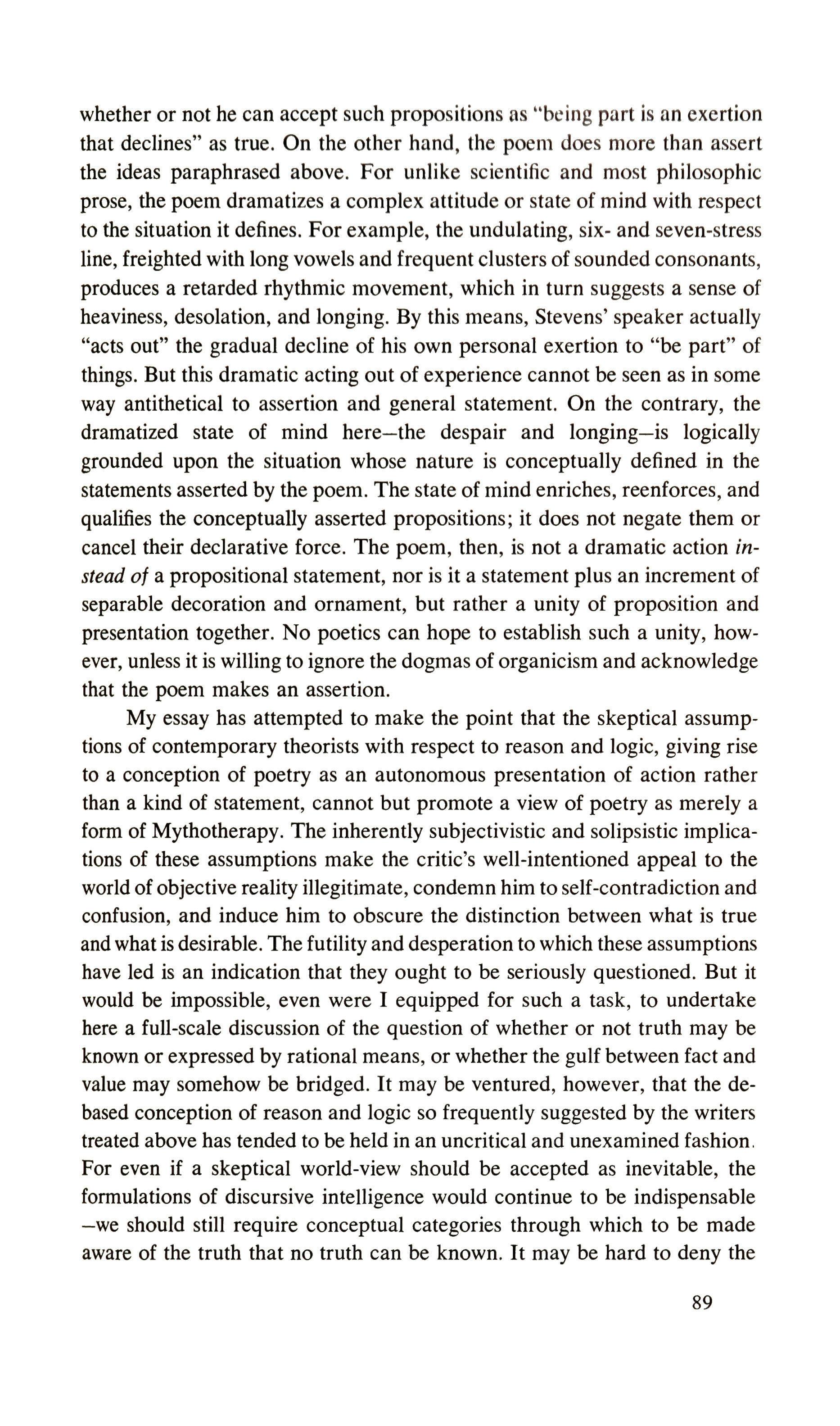
whether or not he can accept such propositions as "being part is an exertion that declines" as true. On the other hand, the poem does more than assert the ideas paraphrased above. For unlike scientific and most philosophic prose, the poem dramatizes a complex attitude or state of mind with respect to the situation it defines. For example, the undulating, six- and seven-stress line, freighted with long vowels and frequent clusters of sounded consonants, produces a retarded rhythmic movement, which in turn suggests a sense of heaviness, desolation, and longing. By this means, Stevens' speaker actually "acts out" the gradual decline of his own personal exertion to "be part" of things. But this dramatic acting out of experience cannot be seen as in some way antithetical to assertion and general statement. On the contrary, the dramatized state of mind here the despair and longing is logically grounded upon the situation whose nature is conceptually defined in the statements asserted by the poem. The state of mind enriches, reenforces, and qualifies the conceptually asserted propositions; it does not negate them or cancel their declarative force. The poem, then, is not a dramatic action instead of a propositional statement, nor is it a statement plus an increment of separable decoration and ornament, but rather a unity of proposition and presentation together. No poetics can hope to establish such a unity, however, unless it is willing to ignore the dogmas of organicism and acknowledge that the poem makes an assertion.
My essay has attempted to make the point that the skeptical assumptions of contemporary theorists with respect to reason and logic, giving rise to a conception of poetry as an autonomous presentation of action rather than a kind of statement, cannot but promote a view of poetry as merely a form of Mythotherapy. The inherently subjectivistic and solipsistic implications of these assumptions make the critic's well-intentioned appeal to the world of objective reality illegitimate, condemn him to self-contradiction and confusion, and induce him to obscure the distinction between what is true and what is desirable. The futility and desperation to which these assumptions have led is an indication that they ought to be seriously questioned. But it would be impossible, even were I equipped for such a task, to undertake here a full-scale discussion of the question of whether or not truth may be known or expressed by rational means, or whether the gulf between fact and value may somehow be bridged. It may be ventured, however, that the debased conception of reason and logic so frequently suggested by the writers treated above has tended to be held in an uncritical and unexamined fashion. For even if a skeptical world-view should be accepted as inevitable, the formulations of discursive intelligence would continue to be indispensable -we should still require conceptual categories through which to be made aware of the truth that no truth can be known. It may be hard to deny the
89
force of the view that in our age no objective world-view is possible, but to hold this view is to be committed to a world-view in spite of oneself, and to be committed to it as objectively true. Even if we chose to adhere to that fundamental postulate of modern thought that "each man is locked in the prison of his consciousness" and cannot escape we ought to admit that even this view purports to give an objective account of our situation as human beings. Similarly, it is world observing that when we say that experience is "irrational" or that a poem or other work of literature depicts a chaotic and irrational world we presuppose the acceptance of a standard of rationality against which experience can be measured. All hypotheses about the chaotic irrationality of things, however justifiable, are finally dependent upon the rational standards which they attempt to overthrow. Reason, it seems, is an indispensable means of dealing with the fact of unreason. In short, it is necessary to reconsider our assumptions about rational methods and standards. Only if we do so can we expect to achieve a poetics which transcends the exclusions and antitheses of current theory and makes of poetry something more than a form of Mythotherapy.
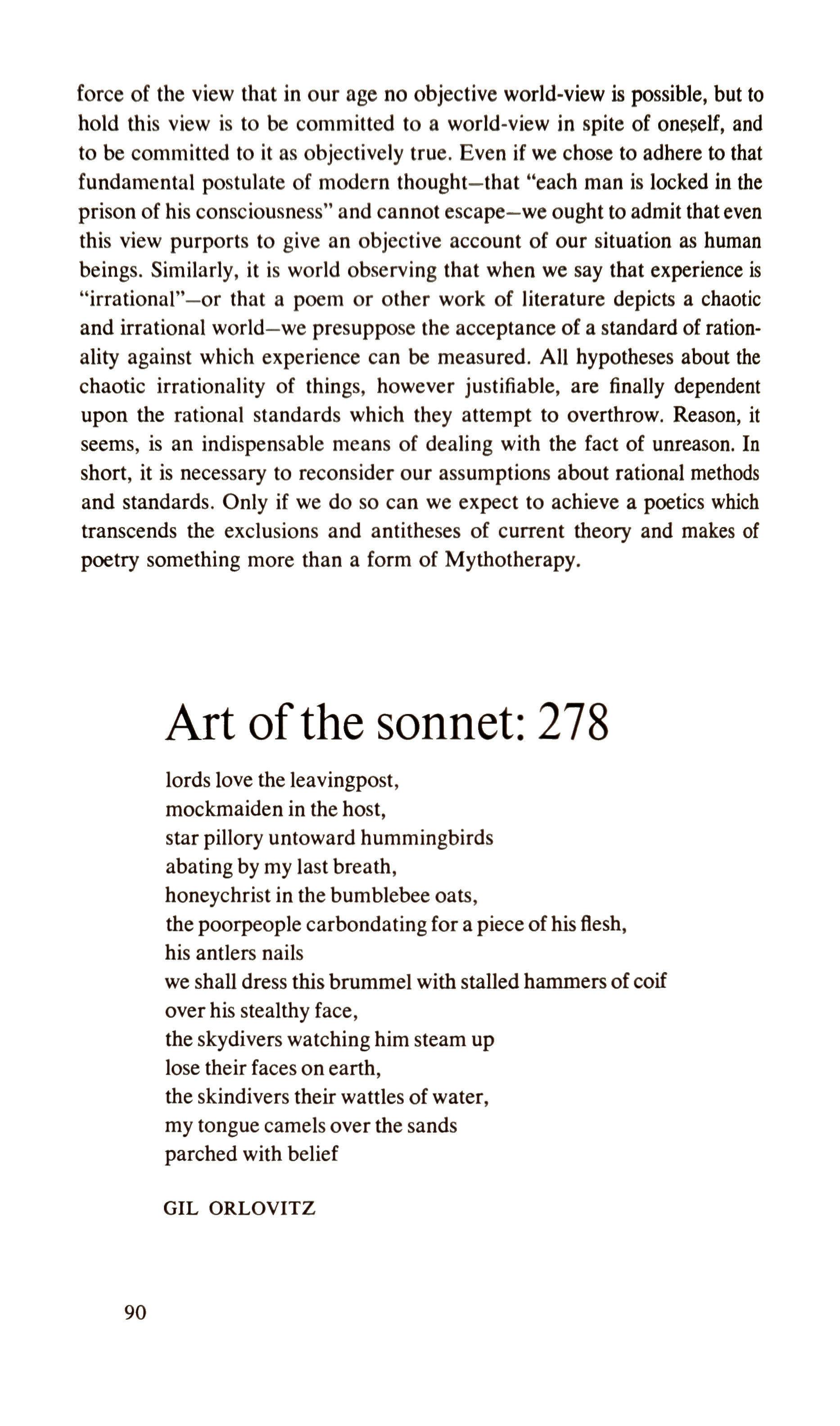
e sonne:
lords love the leavingpost, mockmaiden in the host, star pillory untoward hummingbirds abating by my last breath, honeychrist in the bumblebee oats, the poorpeople carbondating for a piece of his flesh, his antlers nails we shall dress this brummel with stalled hammers of coif over his stealthy face, the skydivers watching him steam up lose their faces on earth, the skindivers their wattles of water, my tongue camels over the sands parched with belief
GIL ORLOVITZ
90
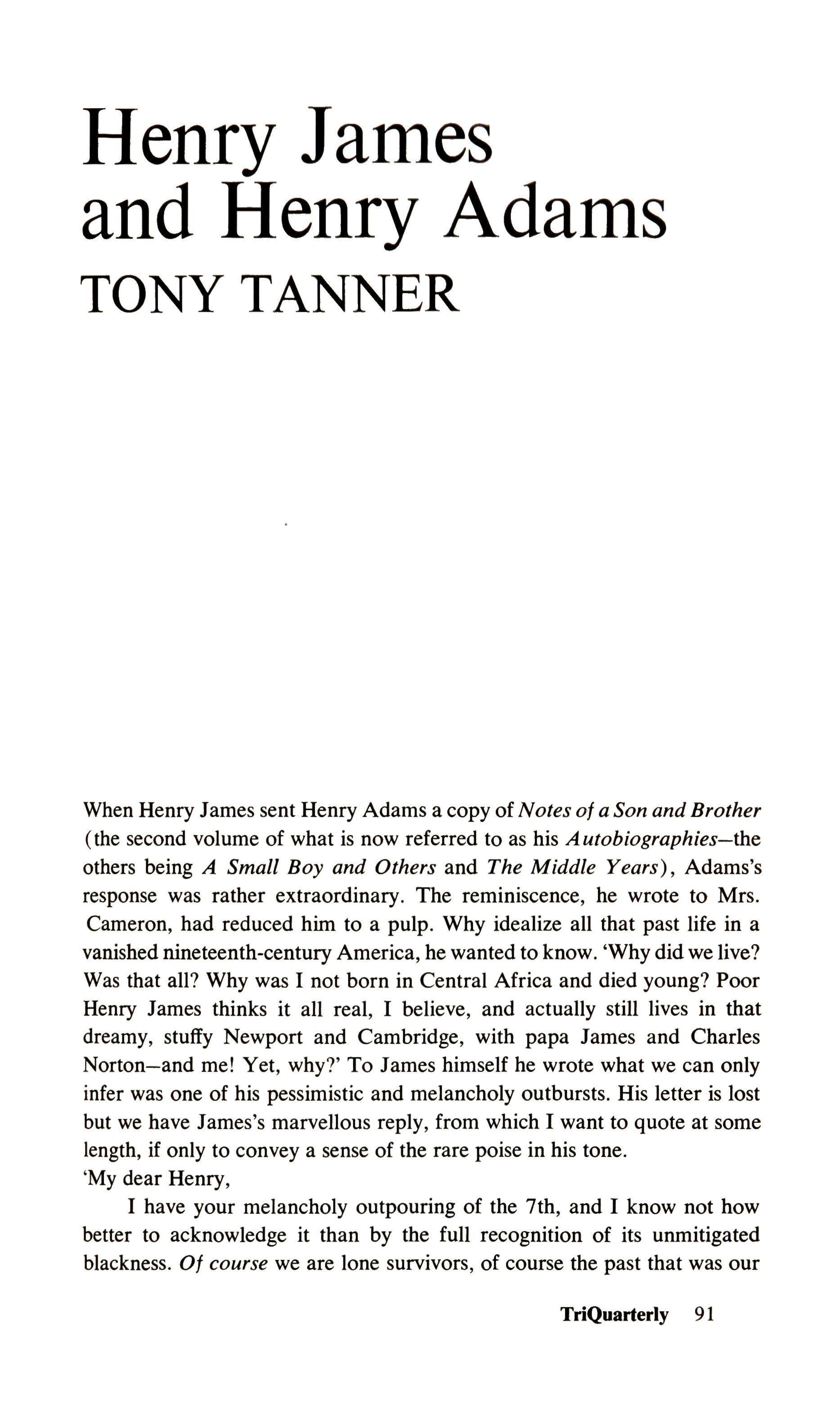
When Henry James sent Henry Adams a copy of Notes of a Son and Brother (the second volume of what is now referred to as his A utobiographies the others being A Small Boy and Others and The Middle Years), Adams's response was rather extraordinary. The reminiscence, he wrote to Mrs. Cameron, had reduced him to a pulp. Why idealize all that past life in a vanished nineteenth-century America, he wanted to know. 'Why did we live? Was that all? Why was I not born in Central Africa and died young? Poor Henry James thinks it all real, I believe, and actually still lives in that dreamy, stuffy Newport and Cambridge, with papa James and Charles Norton and me! Yet, why?' To James himself he wrote what we can only infer was one of his pessimistic and melancholy outbursts. His letter is lost but we have James's marvellous reply, from which I want to quote at some length, if only to convey a sense of the rare poise in his tone.
'My dear Henry,
I have your melancholy outpouring of the 7th, and I know not how better to acknowledge it than by the full recognition of its unmitigated blackness. Of course we are lone survivors, of course the past that was our TriQuarterly 91
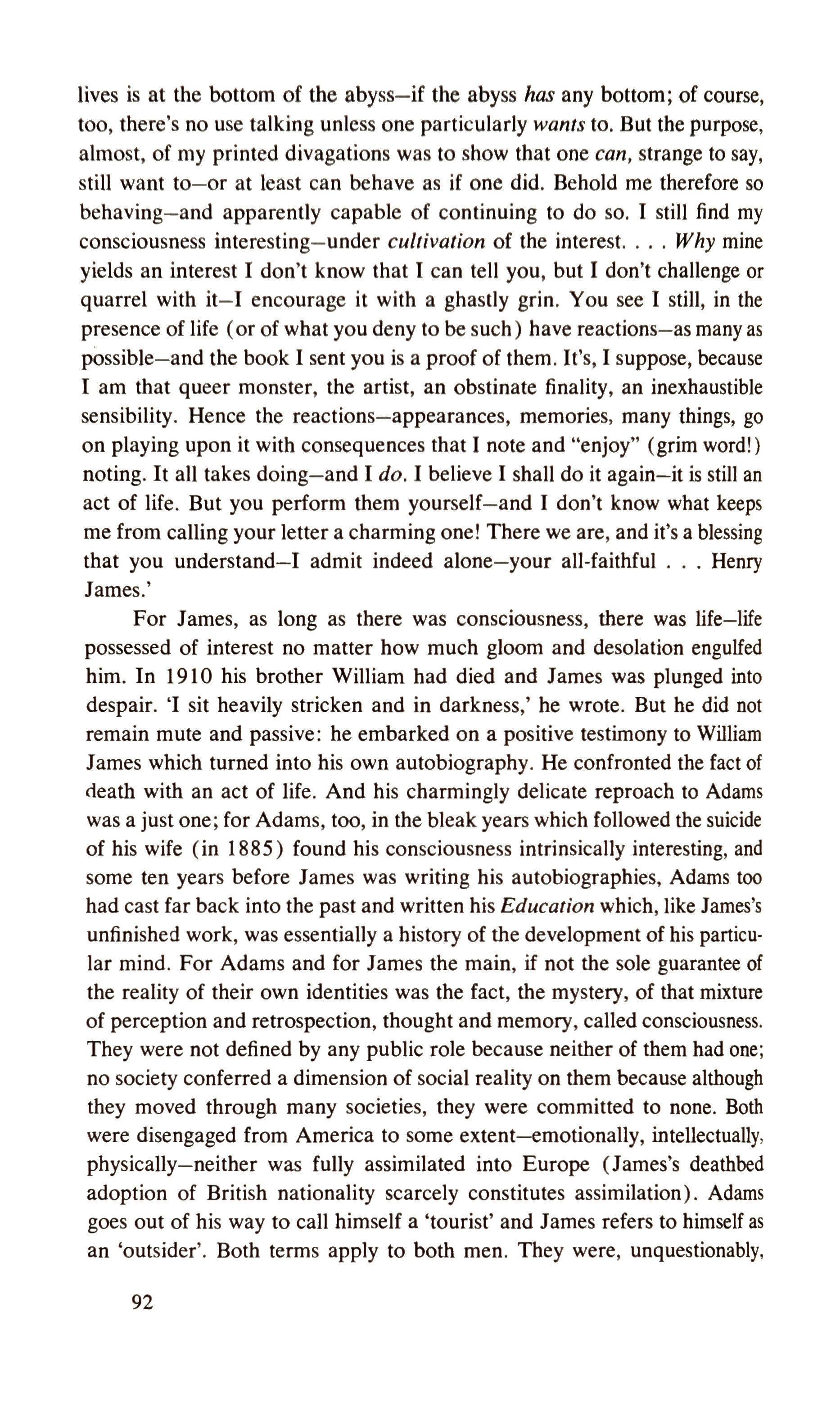
lives is at the bottom of the abyss if the abyss has any bottom; of course, too, there's no use talking unless one particularly wants to. But the purpose, almost, of my printed divagations was to show that one can, strange to say, still want to or at least can behave as if one did. Behold me therefore so behaving and apparently capable of continuing to do so. I still find my consciousness interesting under cultivation of the interest Why mine yields an interest I don't know that I can tell you, but I don't challenge or quarrel with it I encourage it with a ghastly grin. You see I still, in the presence of life (or of what you deny to be such) have reactions as many as possible and the book I sent you is a proof of them. It's, I suppose, because I am that queer monster, the artist, an obstinate finality, an inexhaustible sensibility. Hence the reactions appearances, memories, many things, go on playing upon it with consequences that I note and "enjoy" (grim word!) noting. It all takes doing and I do. I believe I shall do it again it is still an act of life. But you perform them yourself and I don't know what keeps me from calling your letter a charming one! There we are, and it's a blessing that you understand I admit indeed alone your all-faithful Henry James.'
For James, as long as there was consciousness, there was life-life possessed of interest no matter how much gloom and desolation engulfed him. In 1910 his brother William had died and James was plunged into despair. 'I sit heavily stricken and in darkness,' he wrote. But he did not remain mute and passive: he embarked on a positive testimony to William James which turned into his own autobiography. He confronted the fact of death with an act of life. And his charmingly delicate reproach to Adams was a just one; for Adams, too, in the bleak years which followed the suicide of his wife (in 1885) found his consciousness intrinsically interesting, and some ten years before James was writing his autobiographies, Adams too had cast far back into the past and written his Education which, like James's unfinished work, was essentially a history of the development of his particular mind. For Adams and for James the main, if not the sole guarantee of the reality of their own identities was the fact, the mystery, of that mixture of perception and retrospection, thought and memory, called consciousness. They were not defined by any public role because neither of them had one; no society conferred a dimension of social reality on them because although they moved through many societies, they were committed to none. Both were disengaged from America to some extent emotionally, intellectually, physically neither was fully assimilated into Europe (James's deathbed adoption of British nationality scarcely constitutes assimilation). Adams goes out of his way to call himself a 'tourist' and James refers to himself as an 'outsider'. Both terms apply to both men. They were, unquestionably,
92
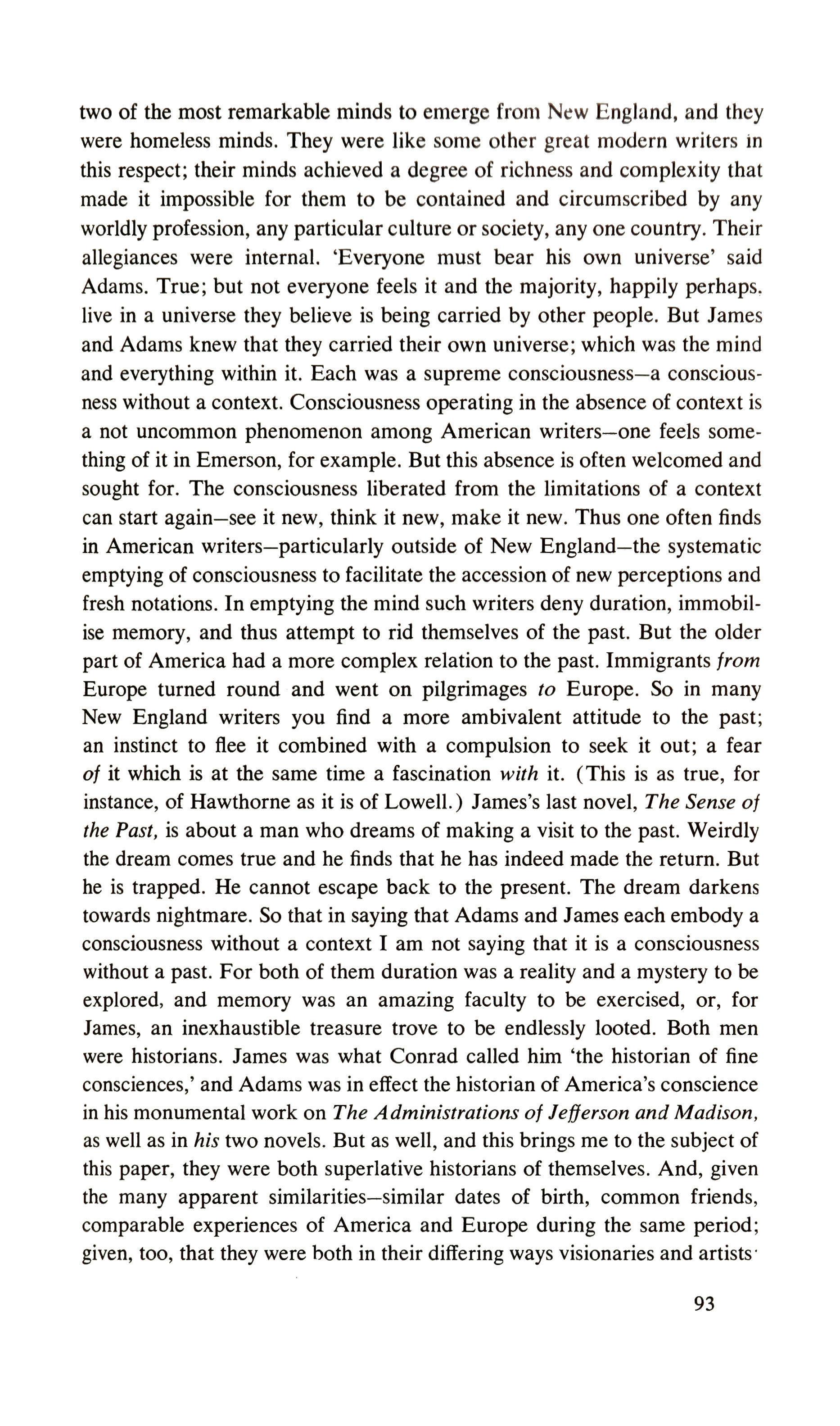
two of the most remarkable minds to emerge from New England, and they were homeless minds. They were like some other great modern writers in this respect; their minds achieved a degree of richness and complexity that made it impossible for them to be contained and circumscribed by any worldly profession, any particular culture or society, anyone country. Their allegiances were internal. 'Everyone must bear his own universe' said Adams. True; but not everyone feels it and the majority, happily perhaps, live in a universe they believe is being carried by other people. But James and Adams knew that they carried their own universe; which was the mind and everything within it. Each was a supreme consciousness a consciousness without a context. Consciousness operating in the absence of context is a not uncommon phenomenon among American writers one feels something of it in Emerson, for example. But this absence is often welcomed and sought for. The consciousness liberated from the limitations of a context can start again see it new, think it new, make it new. Thus one often finds in American writers particularly outside of New England the systematic emptying of consciousness to facilitate the accession of new perceptions and fresh notations. In emptying the mind such writers deny duration, immobilise memory, and thus attempt to rid themselves of the past. But the older part of America had a more complex relation to the past. Immigrants from Europe turned round and went on pilgrimages to Europe. So in many New England writers you find a more ambivalent attitude to the past; an instinct to flee it combined with a compulsion to seek it out; a fear of it which is at the same time a fascination with it. (This is as true, for instance, of Hawthorne as it is of Lowell.) James's last novel, The Sense of the Past, is about a man who dreams of making a visit to the past. Weirdly the dream comes true and he finds that he has indeed made the return. But he is trapped. He cannot escape back to the present. The dream darkens towards nightmare. So that in saying that Adams and James each embody a consciousness without a context I am not saying that it is a consciousness without a past. For both of them duration was a reality and a mystery to be explored, and memory was an amazing faculty to be exercised, or, for James, an inexhaustible treasure trove to be endlessly looted. Both men were historians. James was what Conrad called him 'the historian of fine consciences,' and Adams was in effect the historian of America's conscience in his monumental work on The Administrations of Jefferson and Madison, as well as in his two novels. But as well, and this brings me to the subject of this paper, they were both superlative historians of themselves. And, given the many apparent similarities similar dates of birth, common friends, comparable experiences of America and Europe during the same period; given, too, that they were both in their differing ways visionaries and artists'
93
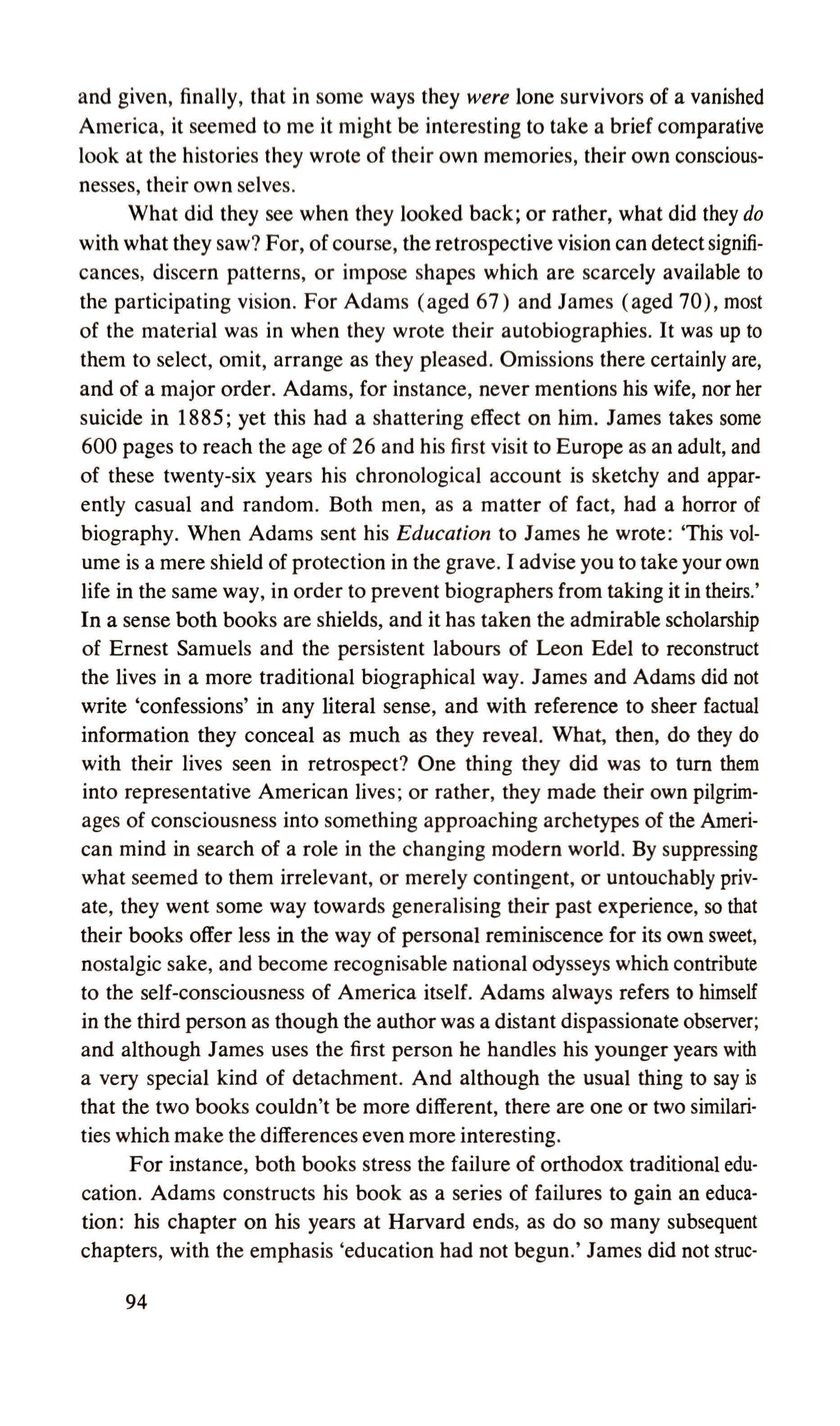
and given, finally, that in some ways they were lone survivors of a vanished America, it seemed to me it might be interesting to take a brief comparative look at the histories they wrote of their own memories, their own consciousnesses, their own selves.
What did they see when they looked back; or rather, what did they do with what they saw? For, of course, the retrospective vision can detect significances, discern patterns, or impose shapes which are scarcely available to the participating vision. For Adams (aged 67) and James (aged 70), most of the material was in when they wrote their autobiographies. It was up to them to select, omit, arrange as they pleased. Omissions there certainly are, and of a major order. Adams, for instance, never mentions his wife, nor her suicide in 1885; yet this had a shattering effect on him. James takes some 600 pages to reach the age of 26 and his first visit to Europe as an adult, and of these twenty-six years his chronological account is sketchy and apparently casual and random. Both men, as a matter of fact, had a horror of biography. When Adams sent his Education to James he wrote: 'This volume is a mere shield of protection in the grave. I advise you to take your own life in the same way, in order to prevent biographers from taking it in theirs.' In a sense both books are shields, and it has taken the admirable scholarship of Ernest Samuels and the persistent labours of Leon Edel to reconstruct the lives in a more traditional biographical way. James and Adams did not write 'confessions' in any literal sense, and with reference to sheer factual information they conceal as much as they reveal. What, then, do they do with their lives seen in retrospect? One thing they did was to tum them into representative American lives; or rather, they made their own pilgrimages of consciousness into something approaching archetypes of the American mind in search of a role in the changing modern world. By suppressing what seemed to them irrelevant, or merely contingent, or untouchably private, they went some way towards generalising their past experience, so that their books offer less in the way of personal reminiscence for its own sweet, nostalgic sake, and become recognisable national odysseys which contribute to the self-consciousness of America itself. Adams always refers to himself in the third person as though the author was a distant dispassionate observer; and although James uses the first person he handles his younger years with a very special kind of detachment. And although the usual thing to say is that the two books couldn't be more different, there are one or two similarities which make the differences even more interesting. For instance, both books stress the failure of orthodox traditional education. Adams constructs his book as a series of failures to gain an education: his chapter on his years at Harvard ends, as do so many subsequent chapters, with the emphasis 'education had not begun.' James did not strue-
94
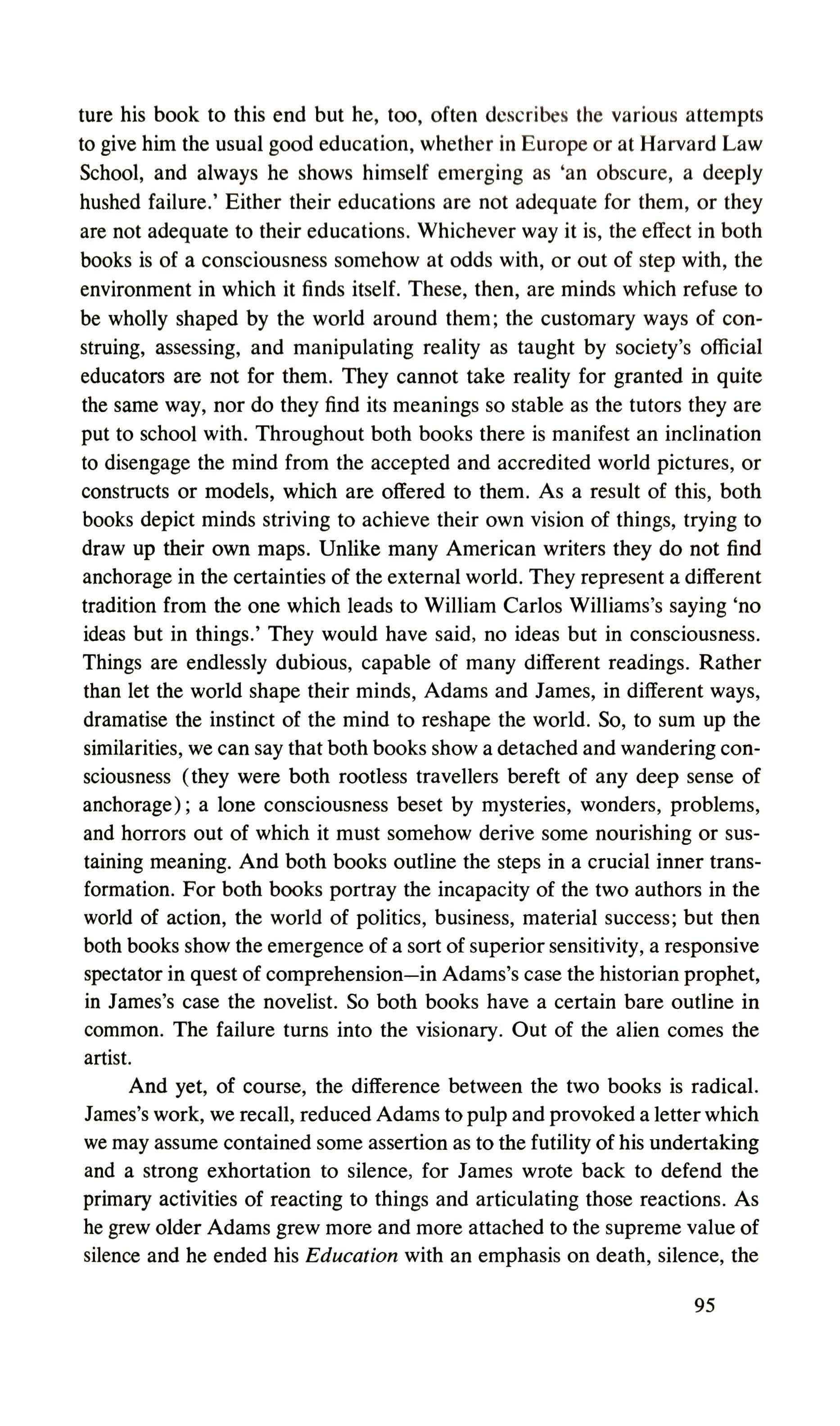
ture his book to this end but he, too, often describes the various attempts to give him the usual good education, whether in Europe or at Harvard Law School, and always he shows himself emerging as 'an obscure, a deeply hushed failure.' Either their educations are not adequate for them, or they are not adequate to their educations. Whichever way it is, the effect in both books is of a consciousness somehow at odds with, or out of step with, the environment in which it finds itself. These, then, are minds which refuse to be wholly shaped by the world around them; the customary ways of construing, assessing, and manipulating reality as taught by society's official educators are not for them. They cannot take reality for granted in quite the same way, nor do they find its meanings so stable as the tutors they are put to school with. Throughout both books there is manifest an inclination to disengage the mind from the accepted and accredited world pictures, or constructs or models, which are offered to them. As a result of this, both books depict minds striving to achieve their own vision of things, trying to draw up their own maps. Unlike many American writers they do not find anchorage in the certainties of the external world. They represent a different tradition from the one which leads to William Carlos Williams's saying 'no ideas but in things.' They would have said, no ideas but in consciousness. Things are endlessly dubious, capable of many different readings. Rather than let the world shape their minds, Adams and James, in different ways, dramatise the instinct of the mind to reshape the world. So, to sum up the similarities, we can say that both books show a detached and wandering consciousness (they were both rootless travellers bereft of any deep sense of anchorage); a lone consciousness beset by mysteries, wonders, problems, and horrors out of which it must somehow derive some nourishing or sustaining meaning. And both books outline the steps in a crucial inner transformation. For both books portray the incapacity of the two authors in the world of action, the world of politics, business, material success; but then both books show the emergence of a sort of superiorsensitivity, a responsive spectator in quest of comprehension in Adams's case the historian prophet, in James's case the novelist. So both books have a certain bare outline in common. The failure turns into the visionary. Out of the alien comes the artist.
And yet, of course, the difference between the two books is radical. James's work, we recall, reduced Adams to pulp and provoked a letter which we may assume contained some assertion as to the futility of his undertaking and a strong exhortation to silence, for James wrote back to defend the primary activities of reacting to things and articulating those reactions. As he grew older Adams grew more and more attached to the supreme value of silence and he ended his Education with an emphasis on death, silence, the
95
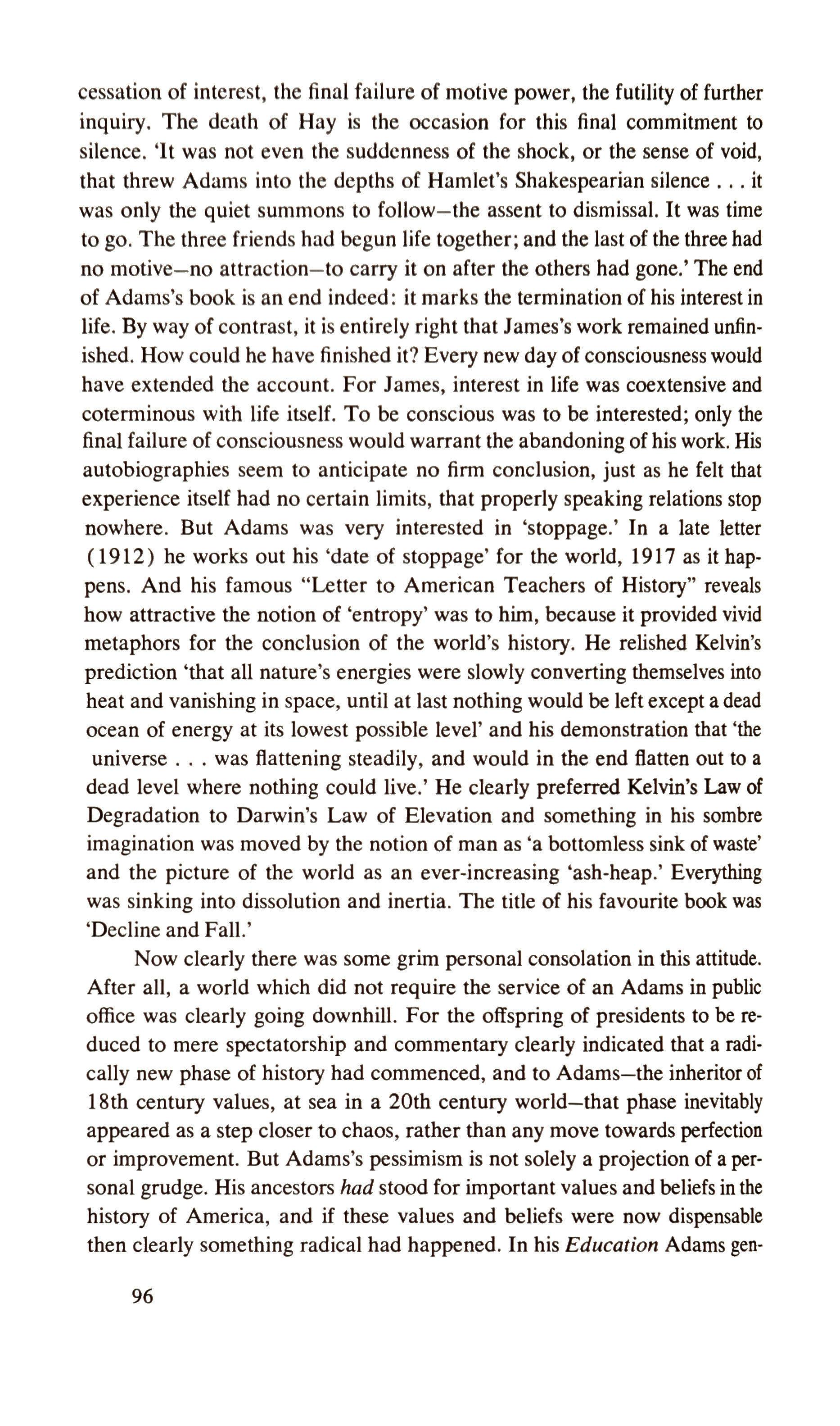
cessation of interest, the final failure of motive power, the futility of further inquiry. The death of Hay is the occasion for this final commitment to silence. 'It was not even the suddenness of the shock, or the sense of void, that threw Adams into the depths of Hamlet's Shakespearian silence it was only the quiet summons to follow the assent to dismissal. It was time to go. The three friends had begun life together; and the last of the three had no motive no attraction to carry it on after the others had gone.' The end of Adams's book is an end indeed: it marks the termination of his interest in life. By way of contrast, it is entirely right that James's work remained unfinished. How could he have finished it? Every new day of consciousness would have extended the account. For James, interest in life was coextensive and coterminous with life itself. To be conscious was to be interested; only the final failure of consciousness would warrant the abandoning of his work. His autobiographies seem to anticipate no firm conclusion, just as he felt that experience itself had no certain limits, that properly speaking relations stop nowhere. But Adams was very interested in 'stoppage.' In a late letter ( 1912) he works out his 'date of stoppage' for the world, 1917 as it happens. And his famous "Letter to American Teachers of History" reveals how attractive the notion of 'entropy' was to him, because it provided vivid metaphors for the conclusion of the world's history. He relished Kelvin's prediction 'that all nature's energies were slowly converting themselves into heat and vanishing in space, until at last nothing would be left except a dead ocean of energy at its lowest possible level' and his demonstration that 'the universe was flattening steadily, and would in the end flatten out to a dead level where nothing could live.' He clearly preferred Kelvin's Law of Degradation to Darwin's Law of Elevation and something in his sombre imagination was moved by the notion of man as 'a bottomless sink of waste' and the picture of the world as an ever-increasing 'ash-heap.' Eve g was sinking into dissolution and inertia. The title of his favourite book was 'Decline and Fall.'
Now clearly there was some grim personal consolation in this attitude. After all, a world which did not require the service of an Adams in public office was clearly going downhill. For the offspring of presidents to be reduced to mere spectatorship and commentary clearly indicated that a radically new phase of history had commenced, and to Adams the inheritor of 18th century values, at sea in a 20th century world that phase inevitably appeared as a step closer to chaos, rather than any move towards perfection or improvement. But Adams's pessimism is not solely a projection of a personal grudge. His ancestors had stood for important values and beliefs in the history of America, and if these values and beliefs were now dispensable then clearly something radical had happened. In his Education Adams gen-
96

eralises himself into a mind brought up on older values trying and failing to comprehend the world that was coming into being. He starts by recalling the 'perfect poise' of Charles Francis Adams, a poise not incompatible with public leadership. But by the end of the book the only poise available to the modern Adams is an achieved and maintained private indifference. Adams's comic yet bitter image for the American author tells us something of the personal disappointment underlying the mask of indifference. 'My favourite figure of the American author is that of a man who breeds a favourite dog, which he throws into the Mississippi River for the pleasure of making a splash. The river does not splash, but it drowns the dog.' Ja mes, too, no doubt felt that he had thrown in some dogs who had been drowned without splashing. But for James the answer was never to commit himself to silence and indifference and forewarnings of a general stoppage. And it was presumably James's imperturbable persistence in his writing, through no matter what personal isolation and public disorder, that left Adams so aghast. Now whether Adams was correct in his pessimistic predictions it is not my immediate aim to discuss: 1917 has come and gone, but onlyjust. I want rather to try to suggest the kind of mind Adams had and in what it differed so radically from James's.
Turning to the Education we notice that Adams recasts his life as an unremitting search for abstract meaning. He starts with a number of vivid childhood impressions but by the end he is desperately in quest of a law, a theory, some comprehensive intellectual system which will give coherence to the welter of his experience. 'From cradle to grave this problem of running order through chaos, direction through space, discipline through freedom, unity through multiplicity, has always been, and must always be, the task of education And what he demonstrates is that the task cannot be accomplished. 'In plain words, chaos was the law of nature; order was the dream of man.' Now in this quest for some law which could be intellectually formulated Adams dismisses a whole range of impressions which James himself found endlessly nourishing. Adams can recall all the random vivid sights and smells of boyhood summers. He clearly responded to the unkempt nature of the South, and the 'passionate depravity that marked the Maryland May' stirred him to the writing of a deeply sensuous passage (at the start of Chapter Eighteen) which T. S. Eliot found worthy of incorporating into his poetry almost unchanged. But such memories of sense impressions are excluded as soon as mentioned, because they did not mean anything. Similarly, when he is recalling the various places where he attempted to gain some education we find mere impressions are dismissed. For instance, Antwerp moved him at first: 'the taste of the town was thick, rich, ripe, like a sweet wine' a Jamesian response; but Adams adds 'but he might as well have
97

drunk out his excitement in old Malmsey, for all the education he got from it.' Again when he first really responds to Beethoven in Germany 'a new sense burst out like a flower in his life,' but again the retraction follows 'he could not credit it, and watched it as something apart, accidental, and not to be trusted.' Note the word accidental, there. It recurs when Adams describes his reactions to Italy and Rome. Adams recalls being very moved: 'life had no richer impression to give,' but he dwells no longer on these impressions because he cannot see 'what they teach.' So Italy too is dismissed as 'a piece of accidental education.' Rome provokes him to all sorts of questions 'Why! Why!! Why!!!' but no one and nothing can tell him what it all 'means.' So he concludes; 'In spite of swarming impressions he knew no more when he left Rome than he did when he entered it.' Here is a crucial point. Impressions did not constitute knowledge for Adams; the exfoliation of the flowers of the senses was not to be trusted because it did not lead towards abstract formulations of meaning. But for James, impressions were the basis and perhaps the sum of knowledge. He preferred Europe to America mainly because it provided a richer, denser range of impressions. James cultivated and tended the very flowers that Adams distrusted. Those areas of experience which Adams rejected as accidental James embraced as essential.
If Adams disregarded mere impressions, what then did he concentrate on? In a word, the foredoomed failure of the human mind to comprehend a universe of power. 'Power' or what Adams also calls 'the eternal mystery of force' is a key concept in the book. A force like the Virgin of Chartres he can understand; it was a unifying force, a source of form. But as he said in an essay ("The Tendency of History") 'the old idea of form' has now been adapted to incorporate 'the idea of Energy'. Just so, in the Education he starts in the ordered and intelligible world of Quincy and ends in the unintelligible formlessness of modern New York. 'The outline of the city became frantic in its effort to explain something that defied meaning. Power seemed to have outgrown its servitude and to have asserted its freedom After the intelligible Virgin, the unintelligible dynamo, which he makes into a symbol of all the new impersonal generators of undreamt-of powers which were bursting on the world. It is this bewilderment in the face of new powers which leads him to seek for some 'law of acceleration', some 'dynamic theory of history' which will at least reduce to intellectual order the rate at which new powers are discovered and released in the world. But such is the rate of new inventions that the mind cannot keep pace with the forces appearing all around it. As he says succinctly in a letter, 'our power is always running ahead of our mind'. His valiance is in his attempt to keep up in this race for comprehension. His
98

dread was that humans were inherently unstable and yet 'at the rate of progress since 1800, every American who lived into the year 2000 would know how to control unlimited power.' This is a dread we can all share: human unreason with unreasonable power at its fingertips. And Adams's pessimism went further, for in a strange anticipation of Freud's idea of the death-wish in Beyond the Pleasure Principle he projects the idea of some universal urge to death running through all nature. 'As Nature developed her hidden energies they tended to become destructive'; and, 'Nature has educated herself to a singular sympathy for death.' Indeed his most profound experience was of nature as an 'insanity of force.' While watching his sister die in great agony, tortured by a freakish illness after a trivial fall, he says, 'the human mind felt itself stripped naked, vibrating in a void of shapeless energies, with resistless mass, colliding, crushing, wasting, and destroying what these same energies had created and labored from eternity to perfect.' In a universe reduced to a jungle of hostile energies and an accelerating wastage of things there is little education to be had, and Adams approaches his conclusion with the minimal discovery: 'he had learned his ignorance.' It is, of course, a moot point whether the greatest mind can learn more, and Adams was certainly a great mind. As the late R. P. Blackmur said of him: 'the greatness of the mind of Adams himself is in the imaginative reach of the effort to solve the problem of the meaning, the use, or the value of its own energy. The greatness is in the effort itself, in the variety of response deliberately made to every possible level of experience. It is in the acceptance, with all piety, of ignorance as the humbled fOI'In of knowledge As it is a condition of life to die, it is a condition of thought, in the end, to fail.' The silence which Adams preached is only an anticipation of that silence to which all energy of mind must eventually succumb.
But in all Adams's apocalyptic foreboding we must notice the very high degree of contrivance and schematisation in the Education. Adams minimises the successes and deprecates the satisfactions of his own life to make the final emergence of the pessimistic visionary-philosopher more graphic. As Professor Samuels says, and demonstrates so well, 'each experience, appraised in terlns of the philosophic calculus of 1905, is manipulated to demonstrate failure, mistake, misconception, ignorance, and futility.' Adams admits that 'he inherited dogma and a priori thought' and one becomes aware of a good deal of brilliant but inflexible a priori arrangement, juxtaposition, and conceptual opposition in The Education. Artistic license, we may say, and so it is. But the feeling of verdict preceding evidence, of experience being subtly deformed by dogma, is sometimes very strong. From the start one is aware of a strong disposition towards pattern-
99
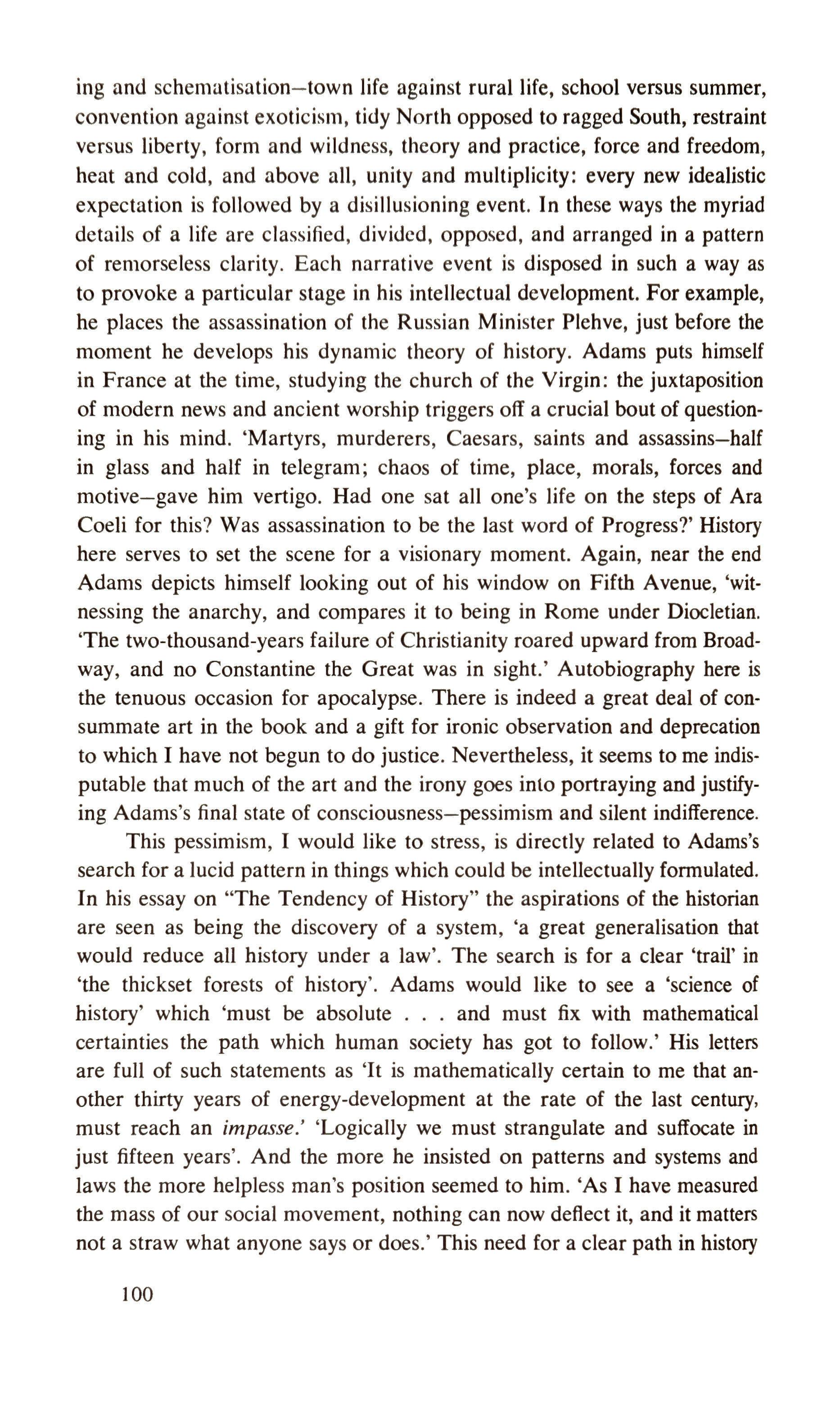
ing and schematisation town life against rural life, school versus summer, convention against exoticism, tidy North opposed to ragged South, restraint versus liberty, form and wildness, theory and practice, force and freedom, heat and cold, and above all, unity and multiplicity: every new idealistic expectation is followed by a disillusioning event. In these ways the myriad details of a life are classified, divided, opposed, and arranged in a pattern of remorseless clarity. Each narrative event is disposed in such a way as to provoke a particular stage in his intellectual development. For example, he places the assassination of the Russian Minister Plehve, just before the moment he develops his dynamic theory of history. Adams puts himself in France at the time, studying the church of the Virgin: the juxtaposition of modern news and ancient worship triggers off a crucial bout of questioning in his mind. 'Martyrs, murderers, Caesars, saints and assassins half in glass and half in telegram; chaos of time, place, morals, forces and motive gave him vertigo. Had one sat all one's life on the steps of Ara Coeli for this? Was assassination to be the last word of Progress?' History here serves to set the scene for a visionary moment. Again, near the end Adams depicts himself looking out of his window on Fifth Avenue, 'witnessing the anarchy, and compares it to being in Rome under Diocletian. 'The two-thousand-years failure of Christianity roared upward from Broadway, and no Constantine the Great was in sight.' Autobiography here is the tenuous occasion for apocalypse. There is indeed a great deal of consummate art in the book and a gift for ironic observation and deprecation to which I have not begun to do justice. Nevertheless, it seems to me indisputable that much of the art and the irony goes into portraying and justifying Adams's final state of consciousness pessimism and silent indifference. This pessimism, I would like to stress, is directly related to Adams's search for a lucid pattern in things which could be intellectually formulated. In his essay on "The Tendency of History" the aspirations of the historian are seen as being the discovery of a system, 'a great generalisation that would reduce all history under a law'. The search is for a clear 'trail' in 'the thickset forests of history'. Adams would like to see a 'science of history' which 'must be absolute and must fix with mathematical certainties the path which human society has got to follow.' His letters are full of such statements as 'It is mathematically certain to me that another thirty years of energy-development at the rate of the last century, must reach an impasse.' 'Logically we must strangulate and suffocate in just fifteen years'. And the more he insisted on patterns and systems and laws the more helpless man's position seemed to him. 'As I have measured the mass of our social movement, nothing can now deflect it, and it matters not a straw what anyone says or does.' This need for a clear path in history
100
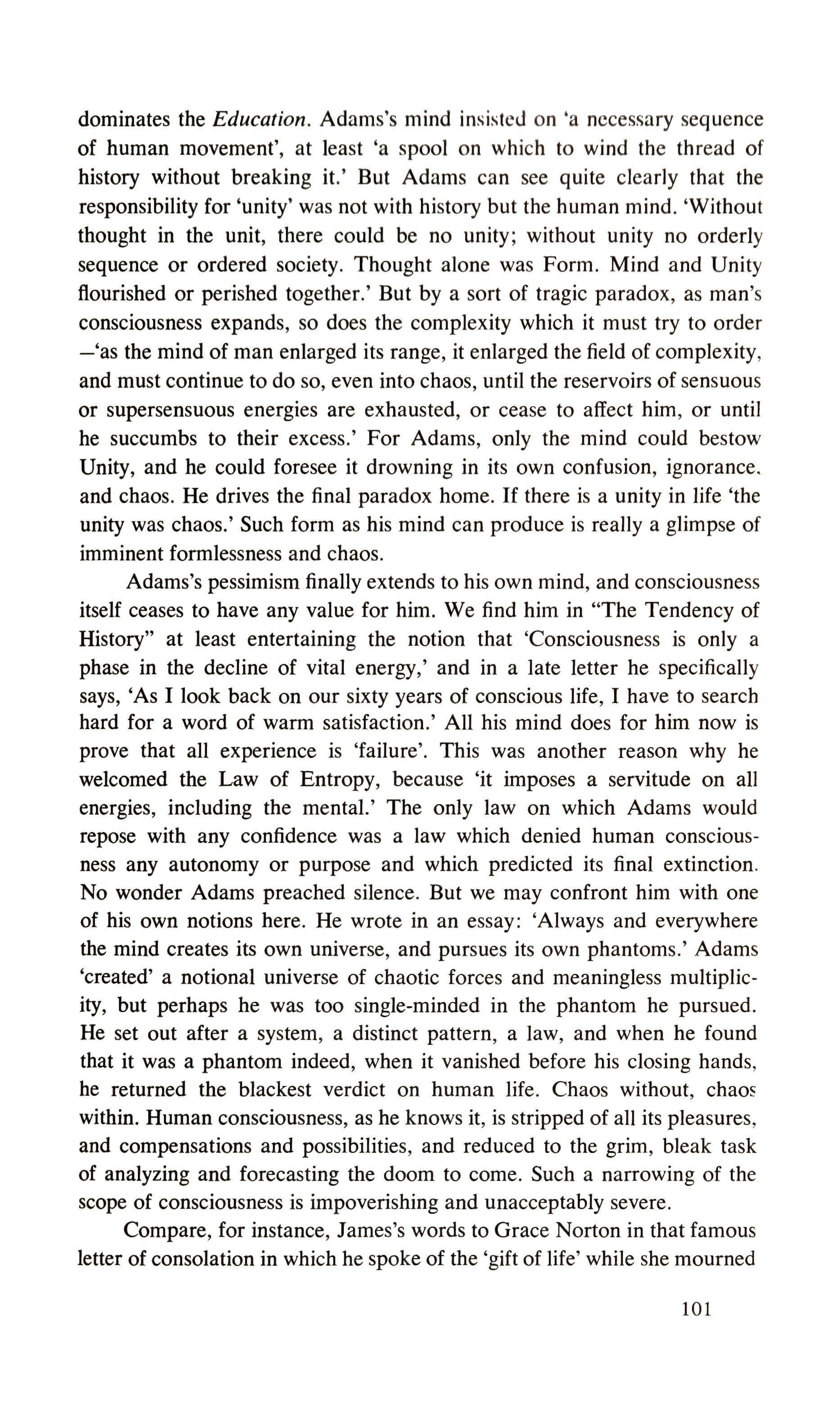
dominates the Education. Adams's mind insisted on 'a necessary sequence of human movement', at least 'a spool on which to wind the thread of history without breaking it.' But Adams can see quite clearly that the responsibility for 'unity' was not with history but the human mind. 'Without thought in the unit, there could be no unity; without unity no orderly sequence or ordered society. Thought alone was Form. Mind and Unity flourished or perished together.' But by a sort of tragic paradox, as man's consciousness expands, so does the complexity which it must try to order -'as the mind of man enlarged its range, it enlarged the field of complexity, and must continue to do so, even into chaos, until the reservoirs of sensuous or supersensuous energies are exhausted, or cease to affect him, or until he succumbs to their excess.' For Adams, only the mind could bestow Unity, and he could foresee it drowning in its own confusion, ignorance. and chaos. He drives the final paradox home. If there is a unity in life 'the unity was chaos.' Such form as his mind can produce is really a glimpse of imminent formlessness and chaos.
Adams's pessimism finally extends to his own mind, and consciousness itself ceases to have any value for him. We find him in "The Tendency of History" at least entertaining the notion that 'Consciousness is only a phase in the decline of vital energy,' and in a late letter he specifically says, 'As I look back on our sixty years of conscious life, I have to search hard for a word of waIIIl satisfaction.' All his mind does for him now is prove that all experience is 'failure'. This was another reason why he welcomed the Law of Entropy, because 'it imposes a servitude on all energies, including the mental.' The only law on which Adams would repose with any confidence was a law which denied human consciousness any autonomy or purpose and which predicted its final extinction. No wonder Adams preached silence. But we may confront him with one of his own notions here. He wrote in an essay: 'Always and everywhere the mind creates its own universe, and pursues its own phantoms.' Adams 'created' a notional universe of chaotic forces and meaningless multiplicity, but perhaps he was too single-minded in the phantom he pursued. He set out after a system, a distinct pattern, a law, and when he found that it was a phantom indeed, when it vanished before his closing hands, he returned the blackest verdict on human life. Chaos without, chaos within. Human consciousness, as he knows it, is stripped of all its pleasures, and compensations and possibilities, and reduced to the grim, bleak task of analyzing and forecasting the doom to come. Such a narrowing of the scope of consciousness is impoverishing and unacceptably severe.
Compare, for instance, James's words to Grace Norton in that famous letter of consolation in which he spoke of the 'gift of life' while she mourned
101

in the shadow of death. 'Life is the most valuable thing we know anything about, and it is therefore a great mistake to surrender it while there is any yet left in the cup. In other words consciousness is an illimitable power, and though at times it may seem to be all consciousness of misery, yet in the way it propagates itself from wave to wave, so that we never cease to feel, and though at moments we appear to, try to, pray to, there is something that holds one in one's place, makes it a standpoint in the universe which it is probably good not to forsake.' My main point simply being that although James was also capable of many pessimistic perceptions of the world (he spoke of 'the Medusa face of life') yet he never lost a sense of what he calls 'the wonder of consciousness in everything', meaning simply the wonder of his being conscious of the world. This phrase may serve as a fitting introduction to a few remarks about the distinguishing qualities of James's Autobiographies. For while he shows himself in many ways quite as confused in the world as Adams, he does not push on so remorselessly to the narrowest pessimistic conclusions. He held onto one value at least. 'I lived and wriggled, floundered and failed, lost the clue of everything but a general lucid consciousness which I clutched with a sense of its value.' When James looked back he reconstructed his past very differently from Adams. On first reading, one has the impression that James's work is much less patterned than Adams's; indeed it seems to flout the very notion of arrangement. But I do not think this is senescent laziness on James's part. His intention was different. Adams set out to combine two histories: the history of his own efforts to comprehend the world, and the history of the human race up to the present and into the future. But James confines himself almost entirely to the history of the development of his own consciousness its confusions and gratitudes, its bewilderments and wonders, its experience of the strangeness of life and its intimations of the grace of art. He does not seek for any containing system of ideas; he does not try to draw up a theory which will unify the history of the world. Adams, we noted, organized a lot of his material around symbolic opposites, the most important being multiplicity and unity. There is nothing so schematic in James. And this is not simply because he was less well equipped to handle abstract ideas than Adams, His whole sense of how consciousness and memory worked was different, and it is this which makes his account of his 'education' so different from Adams's. Let me run together some of the ways he refers to his relationship to the past. 'Remembrance steals on me I woo it all back I tum round again to where I left myself gasping Let me hurry, however, to catch again that thread I scare know why, nor do I much, I confess, distinguish occasions but I see what I see I lose myself under the whole
102
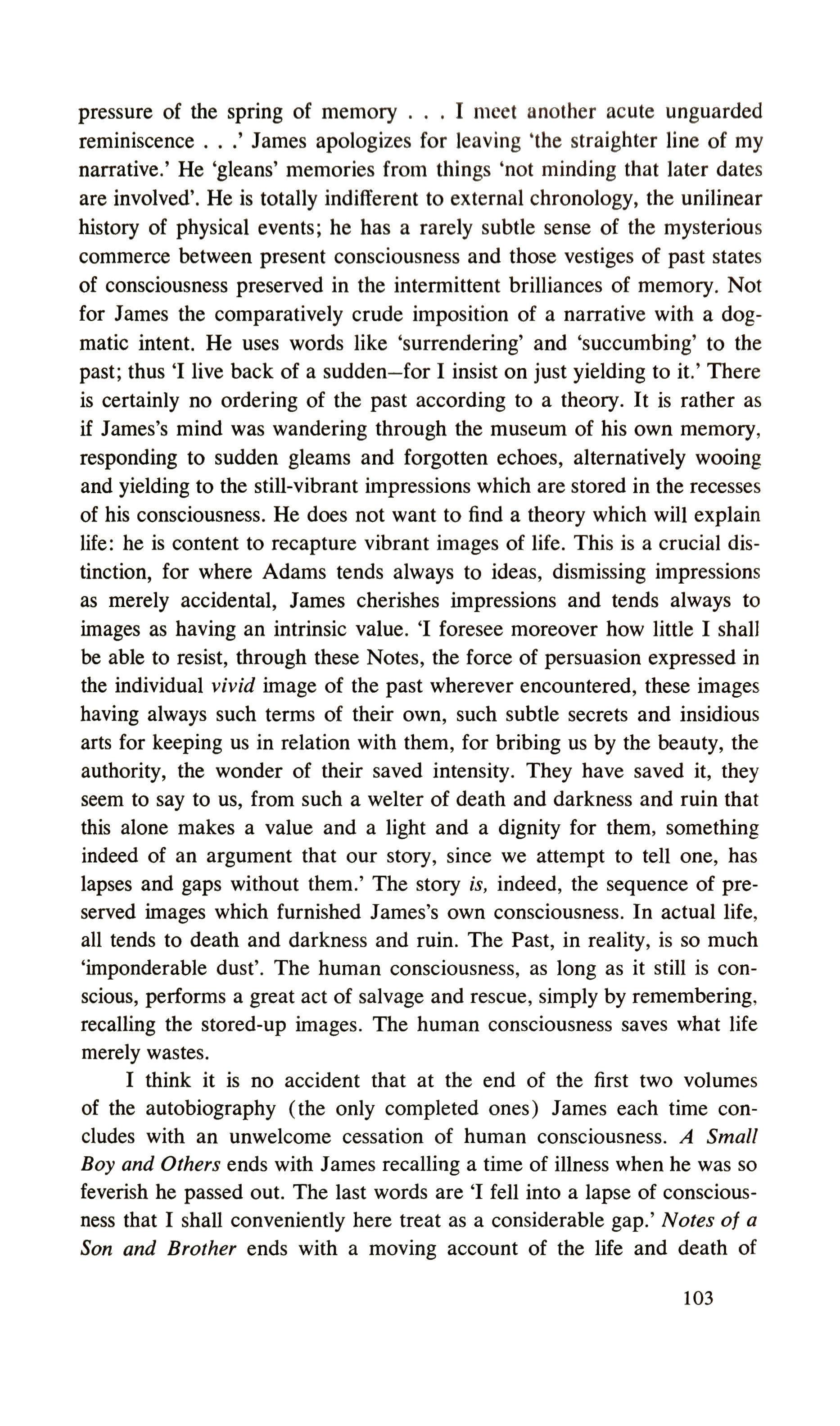
pressure of the spring of memory I meet another acute unguarded reminiscence, James apologizes for leaving 'the straighter line of my narrative.' He 'gleans' memories from things 'not minding that later dates are involved', He is totally indifferent to external chronology, the unilinear history of physical events; he has a rarely subtle sense of the mysterious commerce between present consciousness and those vestiges of past states of consciousness preserved in the intermittent brilliances of memory. Not for James the comparatively crude imposition of a narrative with a dogmatic intent. He uses words like 'surrendering' and 'succumbing' to the past; thus 'I live back of a sudden for I insist on just yielding to it.' There is certainly no ordering of the past according to a theory. It is rather as if James's mind was wandering through the museum of his own memory, responding to sudden gleams and forgotten echoes, alternatively wooing and yielding to the still-vibrant impressions which are stored in the recesses of his consciousness. He does not want to find a theory which will explain life: he is content to recapture vibrant images of life. This is a crucial distinction, for where Adams tends always to ideas, dismissing impressions as merely accidental, James cherishes impressions and tends always to images as having an intrinsic value. 'I foresee moreover how little I shall be able to resist, through these Notes, the force of persuasion expressed in the individual vivid image of the past wherever encountered, these images having always such terms of their own, such subtle secrets and insidious arts for keeping us in relation with them, for bribing us by the beauty, the authority, the wonder of their saved intensity. They have saved it, they seem to say to us, from such a welter of death and darkness and ruin that this alone makes a value and a light and a dignity for them, something indeed of an argument that our story, since we attempt to tell one, has lapses and gaps without them.' The story is, indeed, the sequence of preserved images which furnished James's own consciousness. In actual life, all tends to death and darkness and ruin. The Past, in reality, is so much 'imponderable dust'. The human consciousness, as long as it still is conscious, performs a great act of salvage and rescue, simply by remembering, recalling the stored-up images. The human consciousness saves what life merely wastes.
I think it is no accident that at the end of the first two volumes of the autobiography (the only completed ones) James each time concludes with an unwelcome cessation of human consciousness. A Small Boy and Others ends with James recalling a time of illness when he was so feverish he passed out. The last words are 'I fell into a lapse of consciousness that I shall conveniently here treat as a considerable gap.' Notes of a Son and Brother ends with a moving account of the life and death of
103
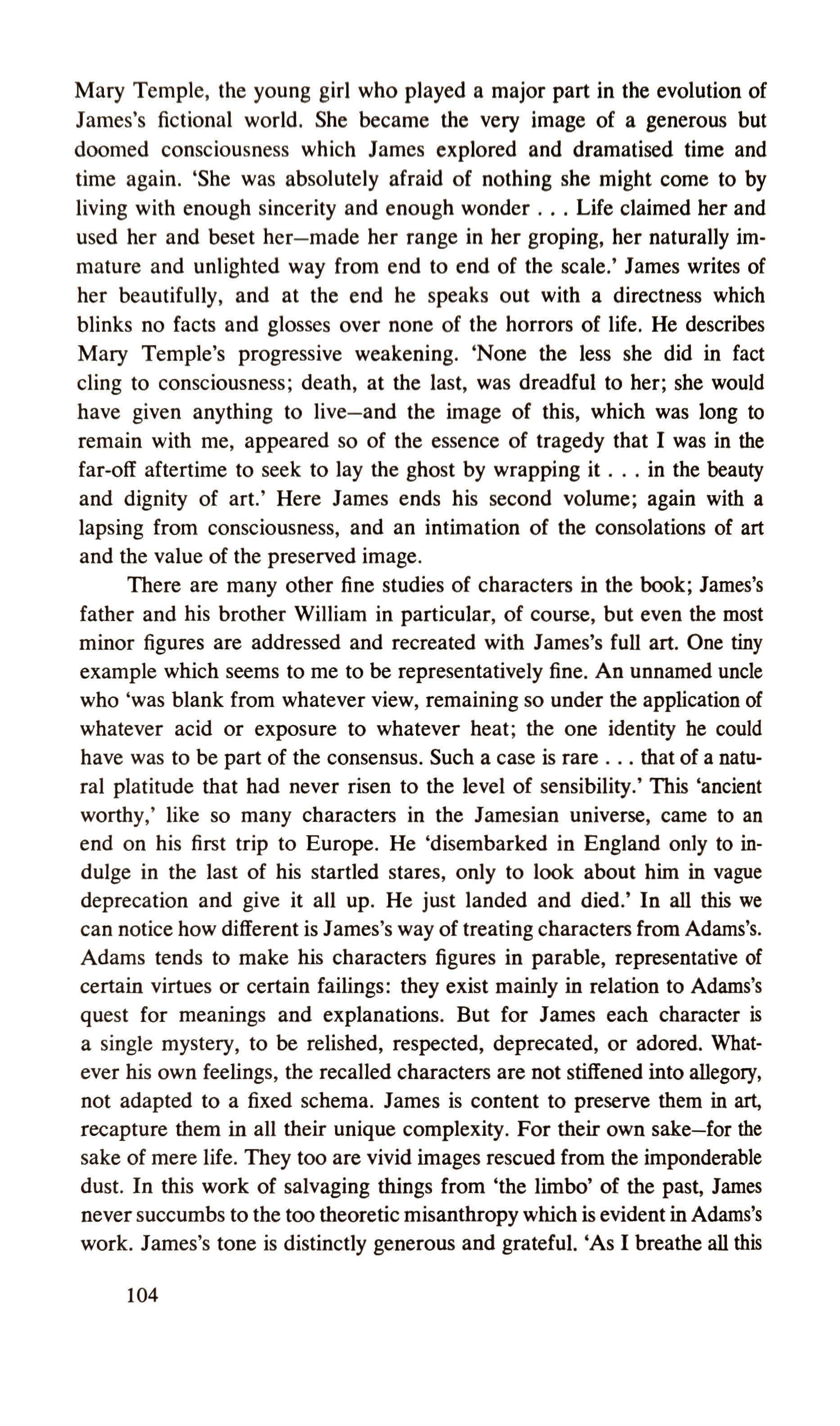
Mary Temple, the young girl who played a major part in the evolution of James's fictional world. She became the very image of a generous but doomed consciousness which James explored and dramatised time and time again. 'She was absolutely afraid of nothing she might come to by living with enough sincerity and enough wonder Life claimed her and used her and beset her made her range in her groping, her naturally immature and unlighted way from end to end of the scale.' James writes of her beautifully, and at the end he speaks out with a directness which blinks no facts and glosses over none of the horrors of life. He describes Mary Temple's progressive weakening. 'None the less she did in fact cling to consciousness; death, at the last, was dreadful to her; she would have given anything to live and the image of this, which was long to remain with me, appeared so of the essence of tragedy that I was in the far-off aftertime to seek to lay the ghost by wrapping it in the beauty and dignity of art.' Here James ends his second volume; again with a lapsing from consciousness, and an intimation of the consolations of art and the value of the preserved image.
There are many other fine studies of characters in the book; James's father and his brother William in particular, of course, but even the most minor figures are addressed and recreated with James's full art. One tiny example which seems to me to be representatively fine. An unnamed uncle who 'was blank from whatever view, remaining so under the application of whatever acid or exposure to whatever heat; the one identity he could have was to be part of the consensus. Such a case is rare that of a natural platitude that had never risen to the level of sensibility.' This 'ancient worthy,' like so many characters in the Jamesian universe, came to an end on his first trip to Europe. He 'disembarked in England only to indulge in the last of his startled stares, only to look about him in vague deprecation and give it all up. He just landed and died.' In all this we can notice how different is James's way of treating characters from Adams's. Adams tends to make his characters figures in parable, representative of certain virtues or certain failings: they exist mainly in relation to Adams's quest for meanings and explanations. But for James each character is a single mystery, to be relished, respected, deprecated, or adored. Whatever his own feelings, the recalled characters are not stiffened into allegory, not adapted to a fixed schema. James is content to preserve them in art, recapture them in all their unique complexity. For their own sake for the sake of mere life. They too are vivid images rescued from the imponderable dust. In this work of salvaging things from 'the limbo' of the past, James never succumbs to the too theoretic misanthropy which is evident in Adams's work. James's tone is distinctly generous and grateful. 'As I breathe all this
104

hushed air again even the more broken things give out touching human values and faint sweet scents of character, flushes of old beauty and good-will.
The main difference between the two men is that although James felt quite as much an outsider, an alien, 'a visiting consciousness' as Adams; although he was as uncertain as to ultimate meanings, James yet felt there was an intrinsic value in the recovered images of life, just as it was. His consciousness was prepared simply to appreciate these images, while Adams wanted to interpret, classify, systematise. That is why James refers so often to the 'recoverable picture'. He had the instinct of the artist, while Adams developed the drive of the philosopher. That is why consciousness was for James a consolation, whereas for Adams it became a torment. You never find James complaining of multiplicity or yearning for unity. On the contrary he delights in the multiple details he can recapture. He loves to evoke what he calls the 'tiny particles of history'; that is why he will spend pages recapturing a room, someone's clothes, a facial appearance, a sudden tremor of delight or fear; as he beautifully puts it, 'the passion, that may reside in a single pulse of time.' The myriad details which he draws into his net do not worry him by their unrelated scatteredness as they would Adams. On the contrary he refers even to the merest scrap of recollected detail as 'gold dust'. Such fragments did not need to be knit together into an intellectually coherent unity before they yielded a value. These images were valuable in themselves, and he allows them to come together and recongregate in involuntary constellations. Unity for Adams was, had to be, a matter of linear cause and effect. But for James the unity of the mind was a more subtle and mysterious thing like a web, in which every caught particle (of 'gold dust') was related to every other particle through the infinite complexity of the tremulous filaments of consciousness. This is why he has such a degree of reverence for the apparently chance configurations of memory. As he says on the first page: 'To recover anything like the full treasure of scattered, wasted circumstance was at the same time to live over the spent experience itself, so deep and rich and rare, with whatever sadder and sorer intensities and the effect of this in turn was to find discrimination among the parts of my subject again and again difficult so inseparably and beautifully they seemed to hang together and the comprehensive case to decline mutilation or refuse to be treated otherwise than handsomely.' The mood is very remote from that of Adams's Education. It is much nearer the mood of that great autobiography which Proust knew by heart, Ruskin's Praeterita, in which Ruskin, at the end, reflects so movingly: 'How things bind and blend themselves together' and concludes with that marvellous picture of the fireflies fitfully glowing in
105
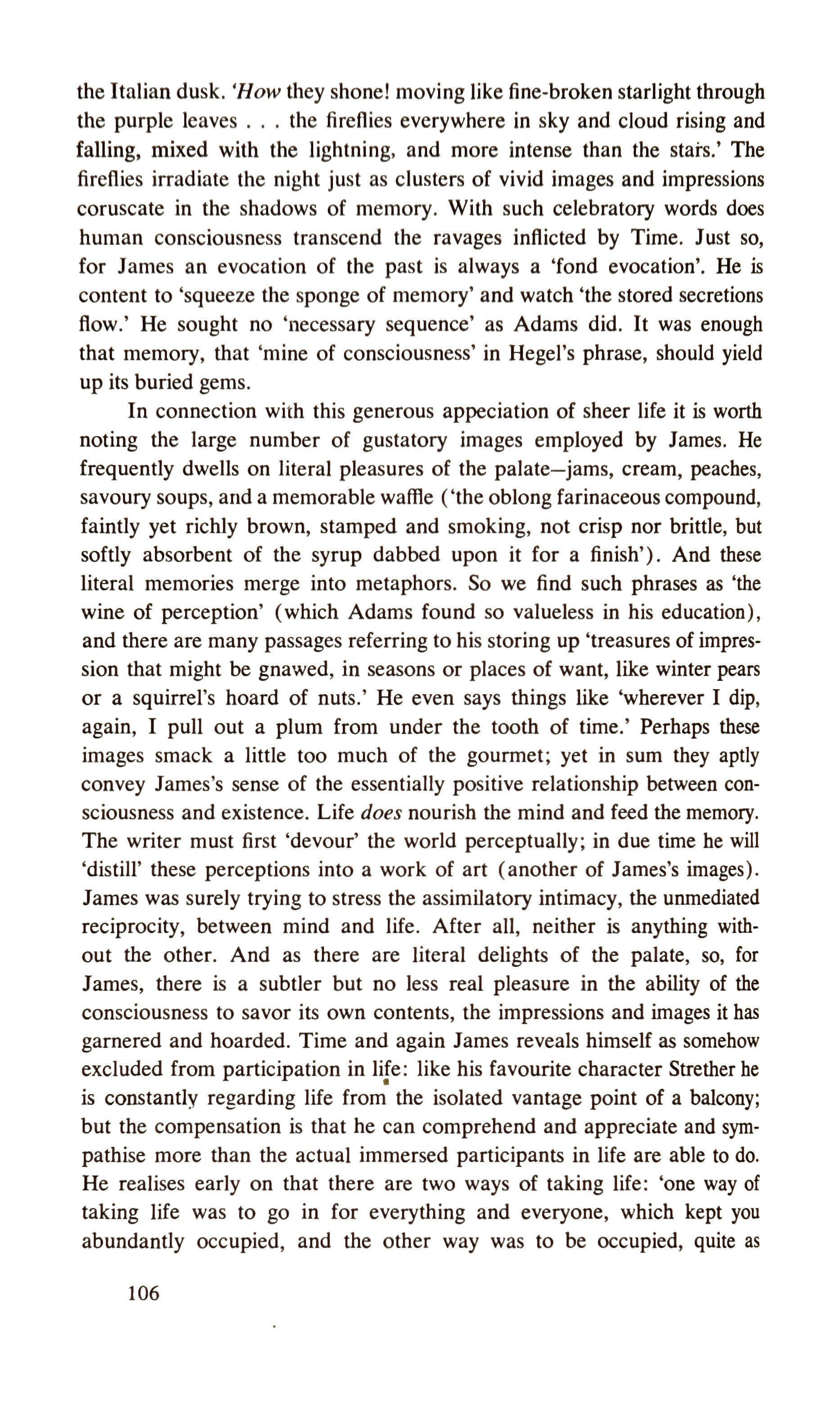
the Italian dusk. 'How they shone! moving like fine-broken starlight through the purple leaves the fireflies everywhere in sky and cloud rising and falling. mixed with the lightning. and more intense than the stars.' The fireflies irradiate the night just as clusters of vivid images and impressions coruscate in the shadows of memory. With such celebratory words does human consciousness transcend the ravages inflicted by Time. Just so, for James an evocation of the past is always a 'fond evocation'. He is content to 'squeeze the sponge of memory' and watch 'the stored secretions flow.' He sought no 'necessary sequence' as Adams did. It was enough that memory. that 'mine of consciousness' in Hegel's phrase, should yield up its buried gems.
In connection with this generous appeciation of sheer life it is worth noting the large number of gustatory images employed by James. He frequently dwells on literal pleasures of the palate jams, cream, peaches, savoury soups, arid a memorable waffle ('the oblong farinaceous compound, faintly yet richly brown, stamped and smoking, not crisp nor brittle, but softly absorbent of the syrup dabbed upon it for a finish'). And these literal memories merge into metaphors. 50 we find such phrases as 'the wine of perception' (which Adams found so valueless in his education), and there are many passages referring to his storing up 'treasures of impression that might be gnawed, in seasons or places of want, like winter pears or a squirrel's hoard of nuts.' He even says things like 'wherever I dip, again, I pullout a plum from under the tooth of time.' Perhaps these images smack a little too much of the gourmet; yet in sum they aptly convey James's sense of the essentially positive relationship between consciousness and existence. Life does nourish the mind and feed the memory. The writer must first 'devour' the world perceptually; in due time he will 'distill' these perceptions into a work of art (another of James's images). James was surely trying to stress the assimilatory intimacy, the unmediated reciprocity, between mind and life. After all, neither is anything without the other. And as there are literal delights of the palate, so, for James, there is a subtler but no less real pleasure in the ability of the consciousness to savor its own contents, the impressions and images it has garnered and hoarded. Time and again James reveals himself as somehow excluded from participation in life: like his favourite character Strether he • is constantly regarding life from the isolated vantage point of a balcony; but the compensation is that he can comprehend and appreciate and sympathise more than the actual immersed participants in life are able to do. He realises early on that there are two ways of taking life: 'one way of taking life was to go in for everything and everyone, which kept you abundantly occupied, and the other way was to be occupied, quite as
106
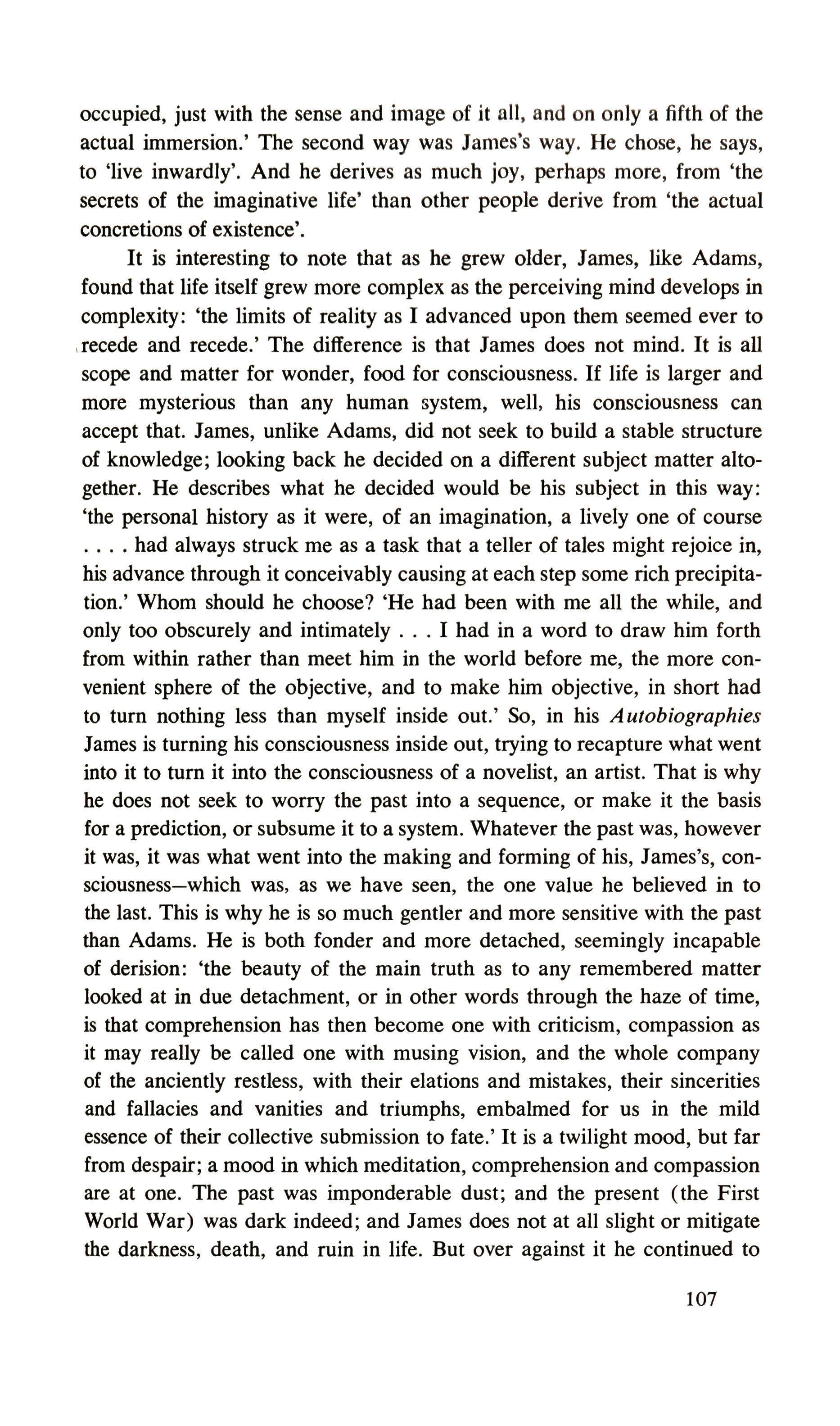
occupied, just with the sense and image of it all, and on only a fifth of the actual immersion.' The second way was James's way. He chose, he says, to 'live inwardly'. And he derives as much joy, perhaps more, from 'the secrets of the imaginative life' than other people derive from 'the actual concretions of existence'.
It is interesting to note that as he grew older, James, like Adams, found that life itself grew more complex as the perceiving mind develops in complexity: 'the limits of reality as I advanced upon them seemed ever to .recede and recede.' The difference is that James does not mind. It is all scope and matter for wonder, food for consciousness. If life is larger and more mysterious than any human system, well, his consciousness can accept that. James, unlike Adams, did not seek to build a stable structure of knowledge; looking back he decided on a different subject matter altogether. He describes what he decided would be his subject in this way: 'the personal history as it were, of an imagination, a lively one of course had always struck me as a task that a teller of tales might rejoice in, his advance through it conceivably causing at each step some rich precipitation.' Whom should he choose? 'He had been with me all the while, and only too obscurely and intimately I had in a word to draw him forth from within rather than meet him in the world before me, the more convenient sphere of the objective, and to make him objective, in short had to turn nothing less than myself inside out.' So, in his Autobiographies James is turning his consciousness inside out, trying to recapture what went into it to turn it into the consciousness of a novelist, an artist. That is why he does not seek to worry the past into a sequence, or make it the basis for a prediction, or subsume it to a system. Whatever the past was, however it was, it was what went into the making and forming of his, James's, consciousness which was, as we have seen, the one value he believed in to the last. This is why he is so much gentler and more sensitive with the past than Adams. He is both fonder and more detached, seemingly incapable of derision: 'the beauty of the main truth as to any remembered matter looked at in due detachment, or in other words through the haze of time, is that comprehension has then become one with criticism, compassion as it may really be called one with musing vision, and the whole company of the anciently restless, with their elations and mistakes, their sincerities and fallacies and vanities and triumphs, embalmed for us in the mild essence of their collective submission to fate.' It is a twilight mood, but far from despair; a mood in which meditation, comprehension and compassion are at one. The past was imponderable dust; and the present (the First World War) was dark indeed; and James does not at all slight or mitigate the darkness, death, and ruin in life. But over against it he continued to
107
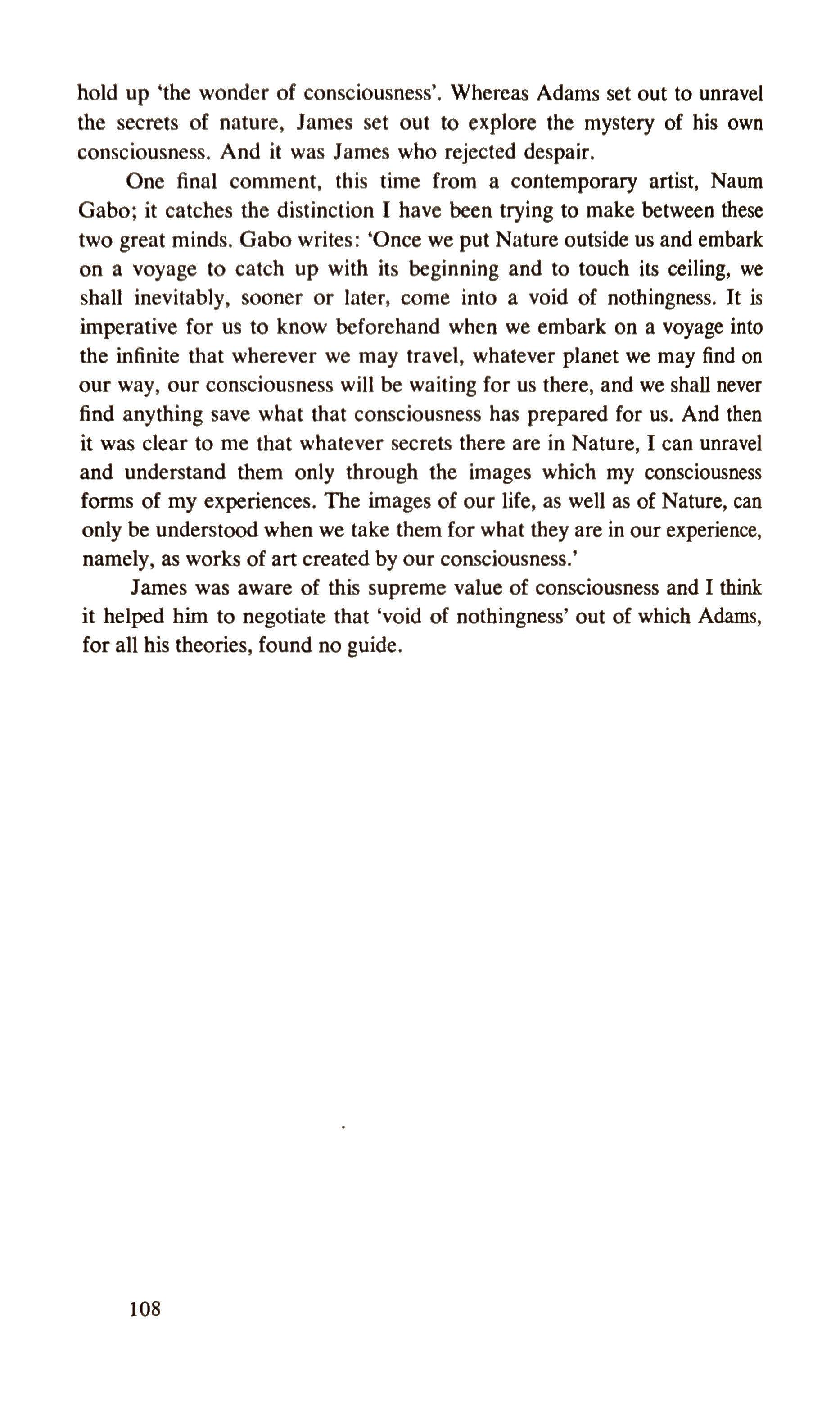
hold up 'the wonder of consciousness'. Whereas Adams set out to unravel the secrets of nature, James set out to explore the mystery of his own consciousness. And it was James who rejected despair.
One final comment, this time from a contemporary artist, Naum Gabo; it catches the distinction I have been trying to make between these two great minds. Gabo writes: 'Once we put Nature outside us and embark on a voyage to catch up with its beginning and to touch its ceiling, we shall inevitably, sooner or later, come into a void of nothingness. It is imperative for us to know beforehand when we embark on a voyage into the infinite that wherever we may travel, whatever planet we may find on our way, our consciousness will be waiting for us there, and we shall never find anything save what that consciousness has prepared for us. And then it was clear to me that whatever secrets there are in Nature, I can unravel and understand them only through the images which my consciousness forms of my experiences. The images of our life, as well as of Nature, can only be understood when we take them for what they are in our experience, namely, as works of art created by our consciousness.'
James was aware of this supreme value of consciousness and I think it helped him to negotiate that 'void of nothingness' out of which Adams, for all his theories, found no guide
108
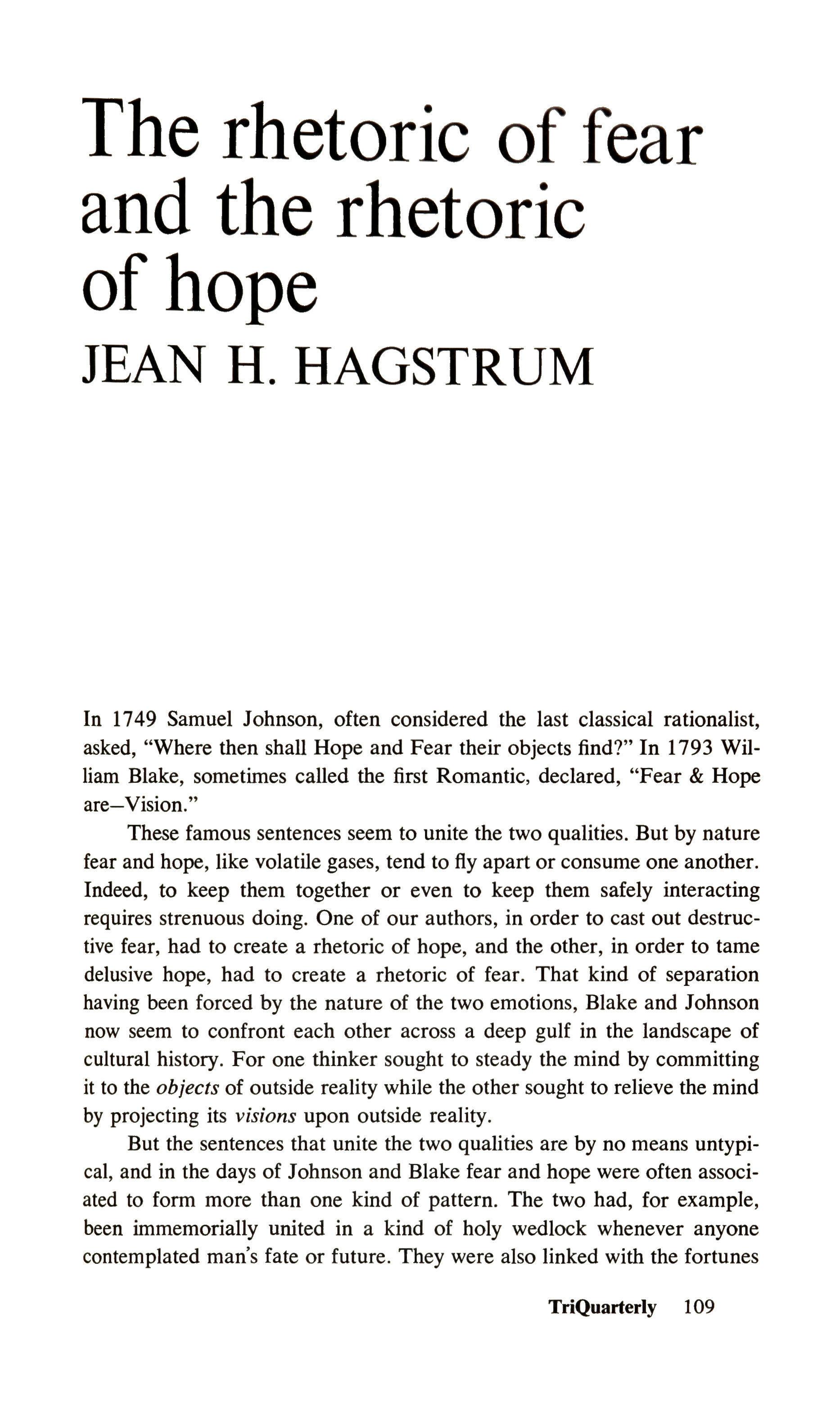
In 1749 Samuel Johnson, often considered the last classical rationalist, asked, "Where then shall Hope and Fear their objects find?" In 1793 William Blake, sometimes called the first Romantic, declared, "Fear & Hope are Vision."
These famous sentences seem to unite the two qualities. But by nature fear and hope, like volatile gases, tend to fly apart or consume one another. Indeed, to keep them together or even to keep them safely interacting requires strenuous doing. One of our authors, in order to cast out destructive fear, had to create a rhetoric of hope, and the other, in order to tame delusive hope, had to create a rhetoric of fear. That kind of separation having been forced by the nature of the two emotions, Blake and Johnson now seem to confront each other across a deep gulf in the landscape of cultural history. For one thinker sought to steady the mind by committing it to the objects of outside reality while the other sought to relieve the mind by projecting its visions upon outside reality.
But the sentences that unite the two qualities are by no means untypical, and in the days of Johnson and Blake fear and hope were often associated to form more than one kind of pattern. The two had, for example, been immemorially united in a kind of holy wedlock whenever anyone contemplated man's fate or future. They were also linked with the fortunes
TriQuarterly 109
•
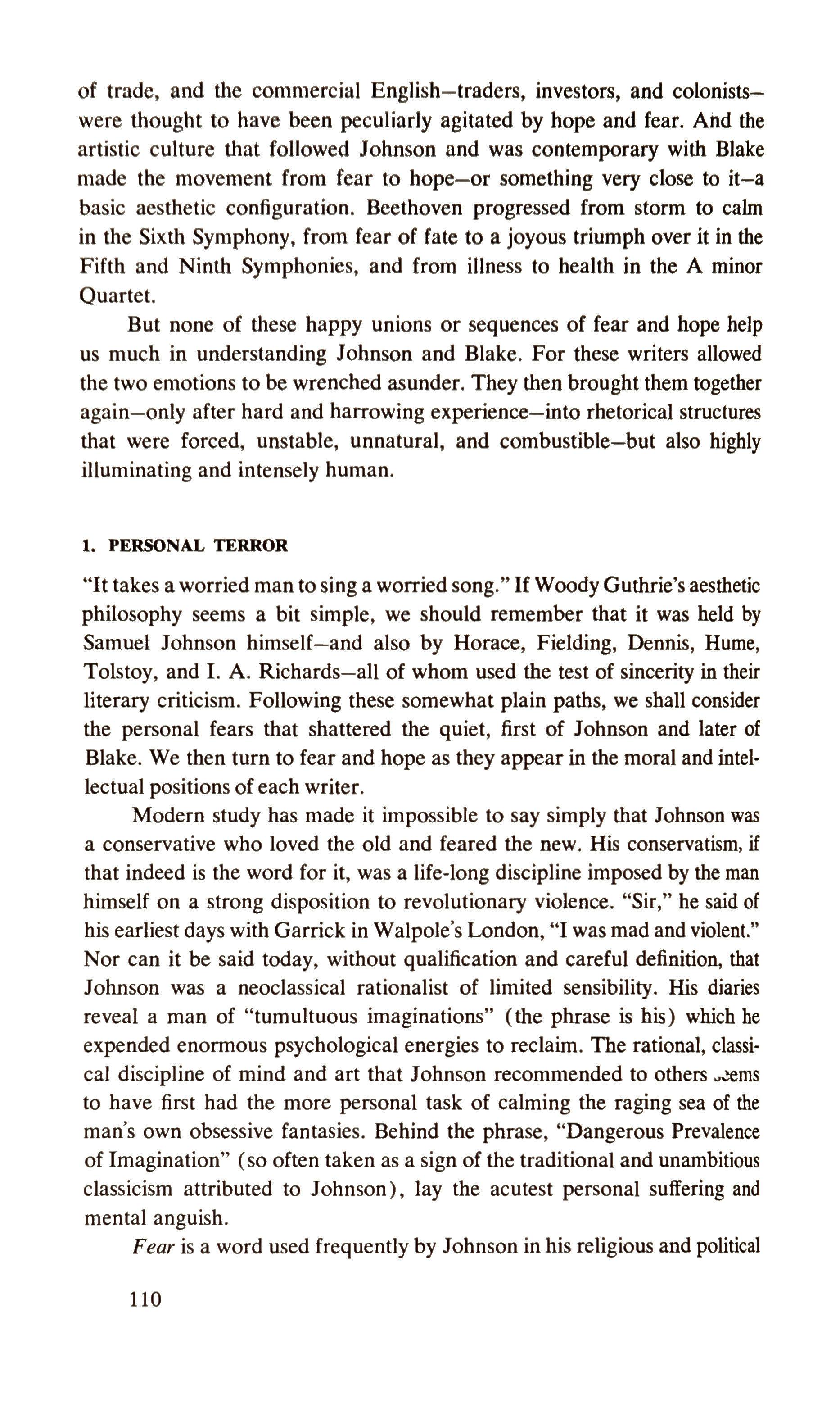
of trade, and the commercial English traders, investors, and colonistswere thought to have been peculiarly agitated by hope and fear. And the artistic culture that followed Johnson and was contemporary with Blake made the movement from fear to hope or something very close to it-a basic aesthetic configuration. Beethoven progressed from storm to caJm in the Sixth Symphony, from fear of fate to a joyous triumph over it in the Fifth and Ninth Symphonies, and from illness to health in the A minor Quartet.
But none of these happy unions or sequences of fear and hope help us much in understanding Johnson and Blake. For these writers allowed the two emotions to be wrenched asunder. They then brought them together again only after hard and harrowing experience into rhetorical structures that were forced, unstable, unnatural, and combustible but also highly illuminating and intensely human.
1. PERSONAL TERROR
"It takes a worried man to sing a worried song." If Woody Guthrie's aesthetic philosophy seems a bit simple, we should remember that it was held by Samuel Johnson himself and also by Horace, Fielding, Dennis, Hume, Tolstoy, and I. A. Richards all of whom used the test of sincerity in their literary criticism. Following these somewhat plain paths, we shall consider the personal fears that shattered the quiet, first of Johnson and later of Blake. We then turn to fear and hope as they appear in the moral and intellectual positions of each writer.
Modern study has made it impossible to say simply that Johnson was a conservative who loved the old and feared the new. His conservatism, if that indeed is the word for it, was a life-long discipline imposed by the man himself on a strong disposition to revolutionary violence. "Sir," he said of his earliest days with Garrick in Walpole's London, "I was mad and violent." Nor can it be said today, without qualification and careful definition, that Johnson was a neoclassical rationalist of limited sensibility. His diaries reveal a man of "tumultuous imaginations" (the phrase is his) which he expended enormous psychological energies to reclaim. The rational, classical discipline of mind and art that Johnson recommended to others ...!ems to have first had the more personal task of calming the raging sea of the man's own obsessive fantasies. Behind the phrase, "Dangerous Prevalence of Imagination" (so often taken as a sign of the traditional and unambitious classicism attributed to Johnson), lay the acutest personal suffering and mental anguish.
Fear is a word used frequently by Johnson in his religious and political
110
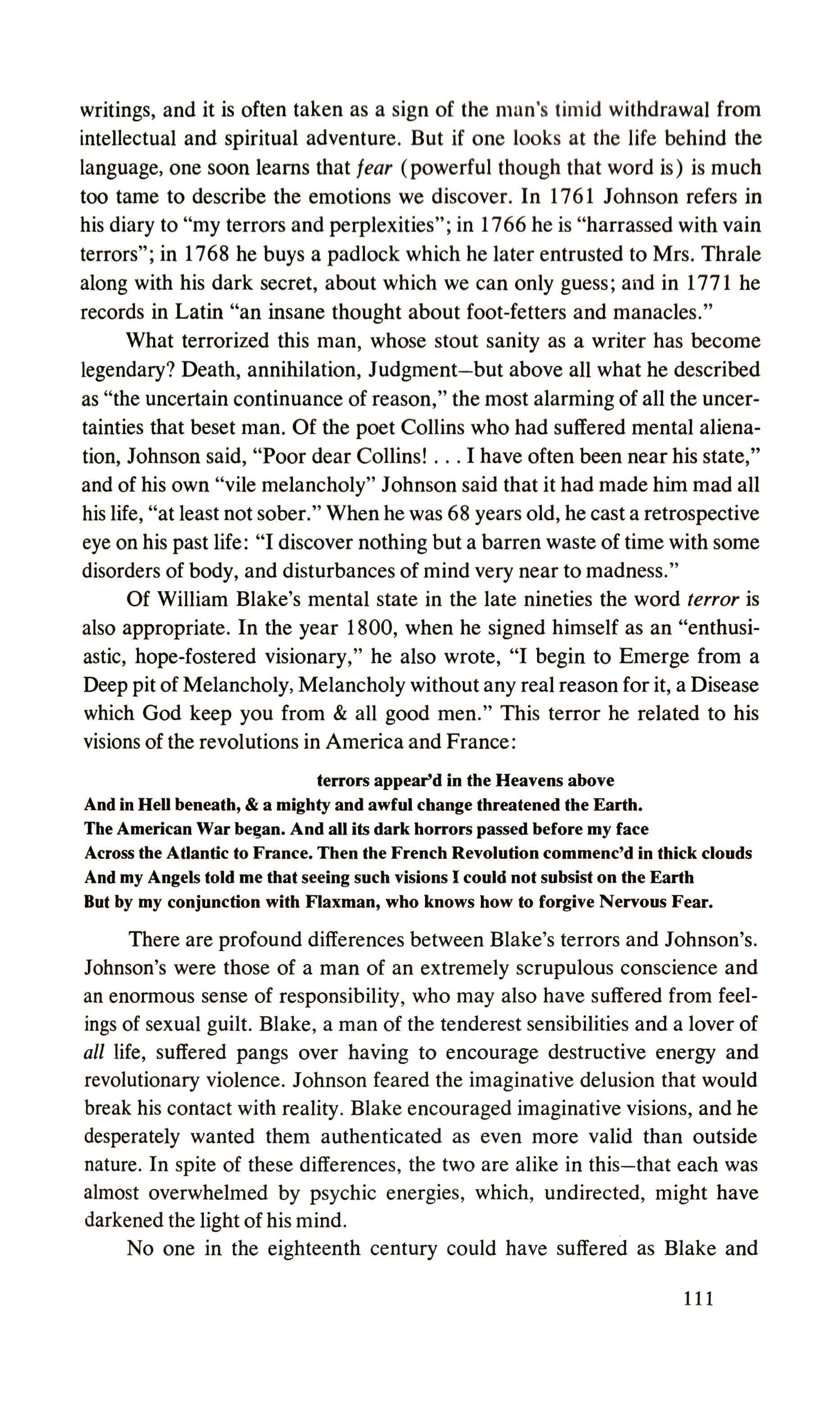
writings, and it is often taken as a sign of the mun's timid withdrawal from intellectual and spiritual adventure. But if one looks at the life behind the language, one soon learns that fear (powerful though that word is) is much too tame to describe the emotions we discover. In 1761 Johnson refers in his diary to "my terrors and perplexities"; in 1766 he is "harrassed with vain terrors"; in 1768 he buys a padlock which he later entrusted to Mrs. Thrale along with his dark secret, about which we can only guess; and in 1771 he records in Latin "an insane thought about foot-fetters and manacles."
What terrorized this man, whose stout sanity as a writer has become legendary? Death, annihilation, Judgment but above all what he described as "the uncertain continuance of reason," the most alarming of all the uncertainties that beset man. Of the poet Collins who had suffered mental alienation, Johnson said, "Poor dear Collins! I have often been near his state," and of his own "vile melancholy" Johnson said that it had made him mad all his life, "at least not sober." When he was 68 years old, he cast a retrospective eye on his past life: "I discover nothing but a barren waste of time with some disorders of body, and disturbances of mind very near to madness."
Of William Blake's mental state in the late nineties the word terror is also appropriate. In the year 1800, when he signed himself as an "enthusiastic, hope-fostered visionary," he also wrote, "I begin to Emerge from a Deep pit of Melancholy, Melancholy without any real reason for it, a Disease which God keep you from & all good men." This terror he related to his visions of the revolutions in America and France:
terrors appear'd in the Heavens above And in HeD beneath, & a mighty and awful change threatened the Earth. The American War began. And aU its dark horrors passed before my face Across the Atlantic to France. Then the French Revolution commenc'd in thick clouds And my Angels told me that seeing such visions I could not subsist on the Earth But by my conjunction with Flaxman, who knows how to forgive Nervous Fear.
There are profound differences between Blake's terrors and Johnson's. Johnson's were those of a man of an extremely scrupulous conscience and an enormous sense of responsibility, who may also have suffered from feelings of sexual guilt. Blake, a man of the tenderest sensibilities and a lover of all life, suffered pangs over having to encourage destructive energy and revolutionary violence. Johnson feared the imaginative delusion that would break his contact with reality. Blake encouraged imaginative visions, and he desperately wanted them authenticated as even more valid than outside nature. In spite of these differences, the two are alike in this that each was almost overwhelmed by psychic energies, which, undirected, might have darkened the light of his mind.
No one in the eighteenth century could have suffered as Blake and 111
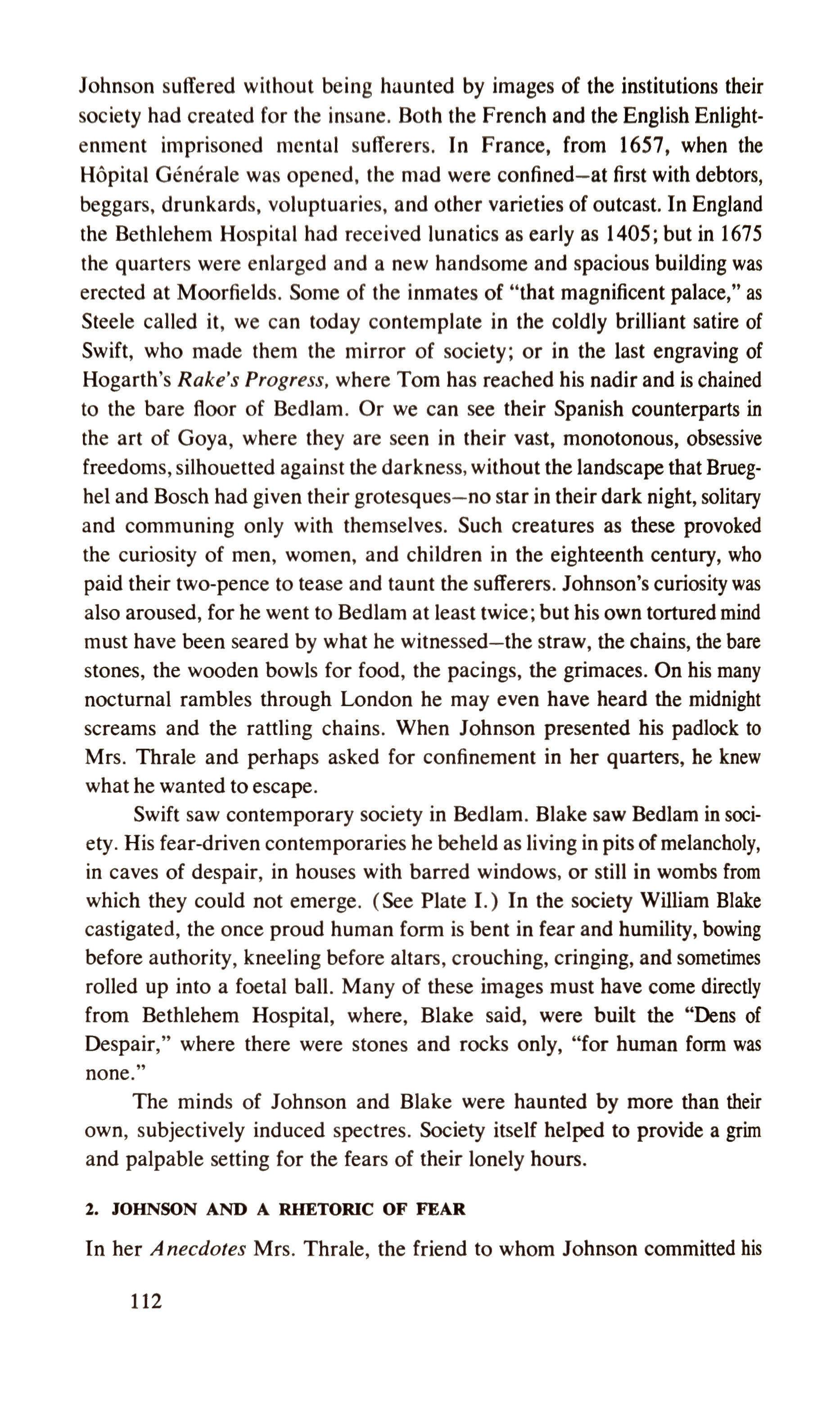
Johnson suffered without being haunted by images of the institutions their society had created for the insane. Both the French and the English Enlightenment imprisoned mental sufferers. In France, from 1657, when the Hopital Generale was opened, the mad were confined at first with debtors, beggars, drunkards, voluptuaries, and other varieties of outcast. In England the Bethlehem Hospital had received lunatics as early as 1405; but in 1675 the quarters were enlarged and a new handsome and spacious building was erected at Moorfields. Some of the inmates of "that magnificent palace," as Steele called it, we can today contemplate in the coldly brilliant satire of Swift, who made them the mirror of society; or in the last engraving of Hogarth's Rake's Progress, where Tom has reached his nadir and is chained to the bare floor of Bedlam. Or we can see their Spanish counterparts in the art of Goya, where they are seen in their vast, monotonous, obsessive freedoms, silhouetted against the darkness, without the landscape that Brueghel and Bosch had given their grotesques no star in their dark night, solitary and communing only with themselves. Such creatures as these provoked the curiosity of men, women, and children in the eighteenth century, who paid their two-pence to tease and taunt the sufferers. Johnson's curiosity was also aroused, for he went to Bedlam at least twice; but his own tortured mind must have been seared by what he witnessed the straw, the chains, the bare stones, the wooden bowls for food, the pacings, the grimaces. On his many nocturnal rambles through London he may even have heard the midnight screalns and the rattling chains. When Johnson presented his padlock to Mrs. Thrale and perhaps asked for confinement in her quarters, he knew what he wanted to escape.
Swift saw contemporary society in Bedlam. Blake saw Bedlam in society. His fear-driven contemporaries he beheld as living in pits of melancholy, in caves of despair, in houses with barred windows, or still in wombs from which they could not emerge. (See Plate I.) In the society William Blake castigated, the once proud human fOIIIl is bent in fear and humility, bowing before authority, kneeling before altars, crouching, cringing, and sometimes rolled up into a foetal ball. Many of these images must have come directly from Bethlehem Hospital, where, Blake said, were built the "Dens of Despair," where there were stones and rocks only, "for human form was none."
The minds of Johnson and Blake were haunted by more than their own, subjectively induced spectres. Society itself helped to provide a grim and palpable setting for the fears of their lonely hours.
2. JOHNSON AND A RHETORIC OF FEAR
In her Anecdotes Mrs. Thrale, the friend to whom Johnson committed his
112
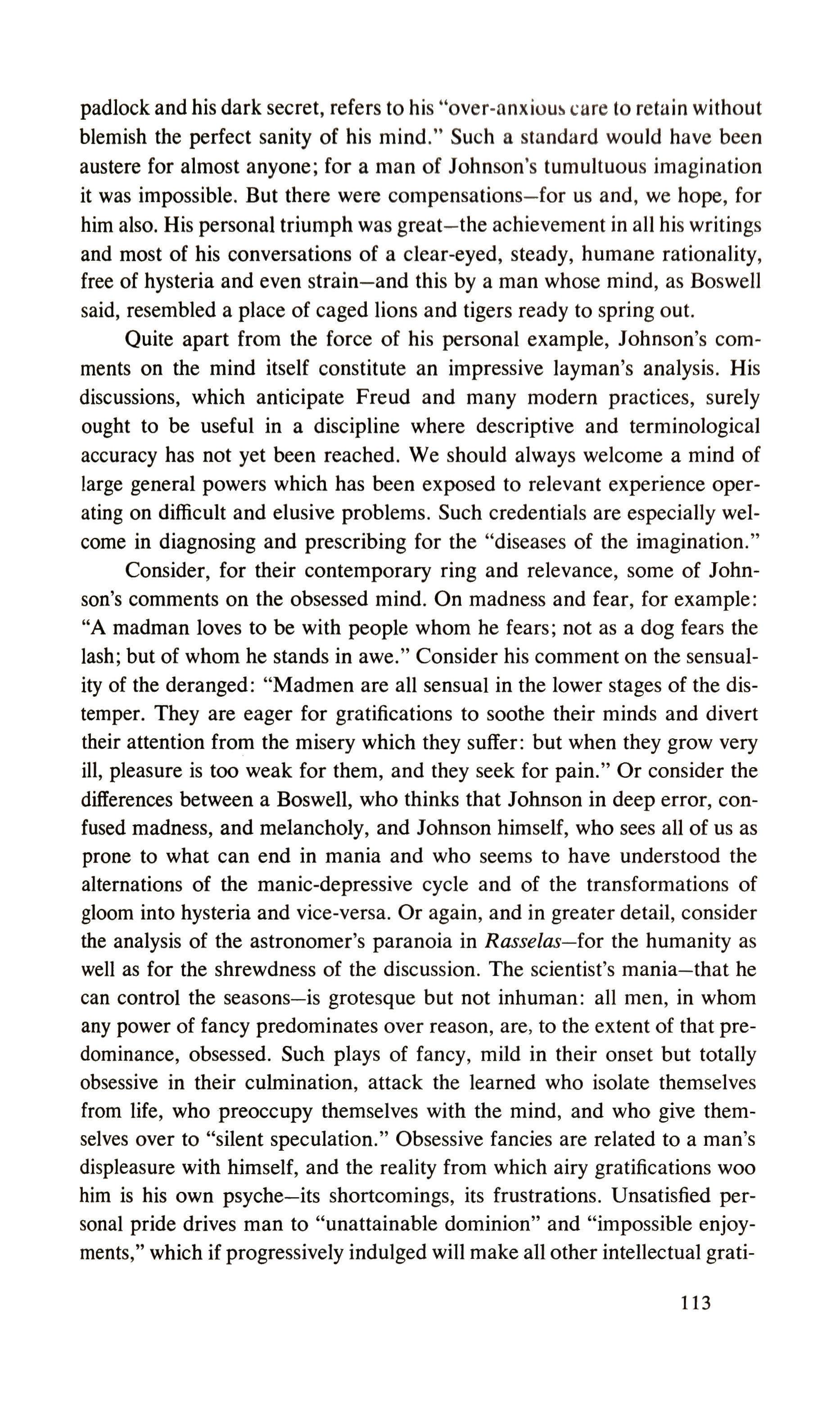
padlock and his dark secret, refers to his "over-anxious care to retain without blemish the perfect sanity of his mind." Such a standard would have been austere for almost anyone; for a man of Johnson's tumultuous imagination it was impossible. But there were compensations for us and, we hope, for him also. His personal triumph was great the achievement in all his writings and most of his conversations of a clear-eyed, steady, humane rationality, free of hysteria and even strain and this by a man whose mind, as Boswell said, resembled a place of caged lions and tigers ready to spring out. Quite apart from the force of his personal example, Johnson's comments on the mind itself constitute an impressive layman's analysis. His discussions, which anticipate Freud and many modern practices, surely ought to be useful in a discipline where descriptive and terminological accuracy has not yet been reached. We should always welcome a mind of large general powers which has been exposed to relevant experience operating on difficult and elusive problems. Such credentials are especially welcome in diagnosing and prescribing for the "diseases of the imagination." Consider, for their contemporary ring and relevance, some of Johnson's comments on the obsessed mind. On madness and fear, for example: "A madman loves to be with people whom he fears; not as a dog fears the lash; but of whom he stands in awe." Consider his comment on the sensuality of the deranged: "Madmen are all sensual in the lower stages of the distemper. They are eager for gratifications to soothe their minds and divert their attention from the misery which they suffer: but when they grow very ill, pleasure is too weak for them, and they seek for pain." Or consider the differences between a Boswell, who thinks that Johnson in deep error, confused madness, and melancholy, and Johnson himself, who sees all of us as prone to what can end in mania and who seems to have understood the alternations of the manic-depressive cycle and of the transformations of gloom into hysteria and vice-versa. Or again, and in greater detail, consider the analysis of the astronomer's paranoia in Rasselas for the humanity as well as for the shrewdness of the discussion. The scientist's mania that he can control the seasons is grotesque but not inhuman: all men, in whom any power of fancy predominates over reason, are, to the extent of that predominance, obsessed. Such plays of fancy, mild in their onset but totally obsessive in their culmination, attack the learned who isolate themselves from life, who preoccupy themselves with the mind, and who give themselves over to "silent speculation." Obsessive fancies are related to a man's displeasure with himself, and the reality from which airy gratifications woo him is his own psyche its shortcomings, its frustrations. Unsatisfied personal pride drives man to "unattainable dominion" and "impossible enjoyments," which if progressively indulged will make all other intellectual grati-
113
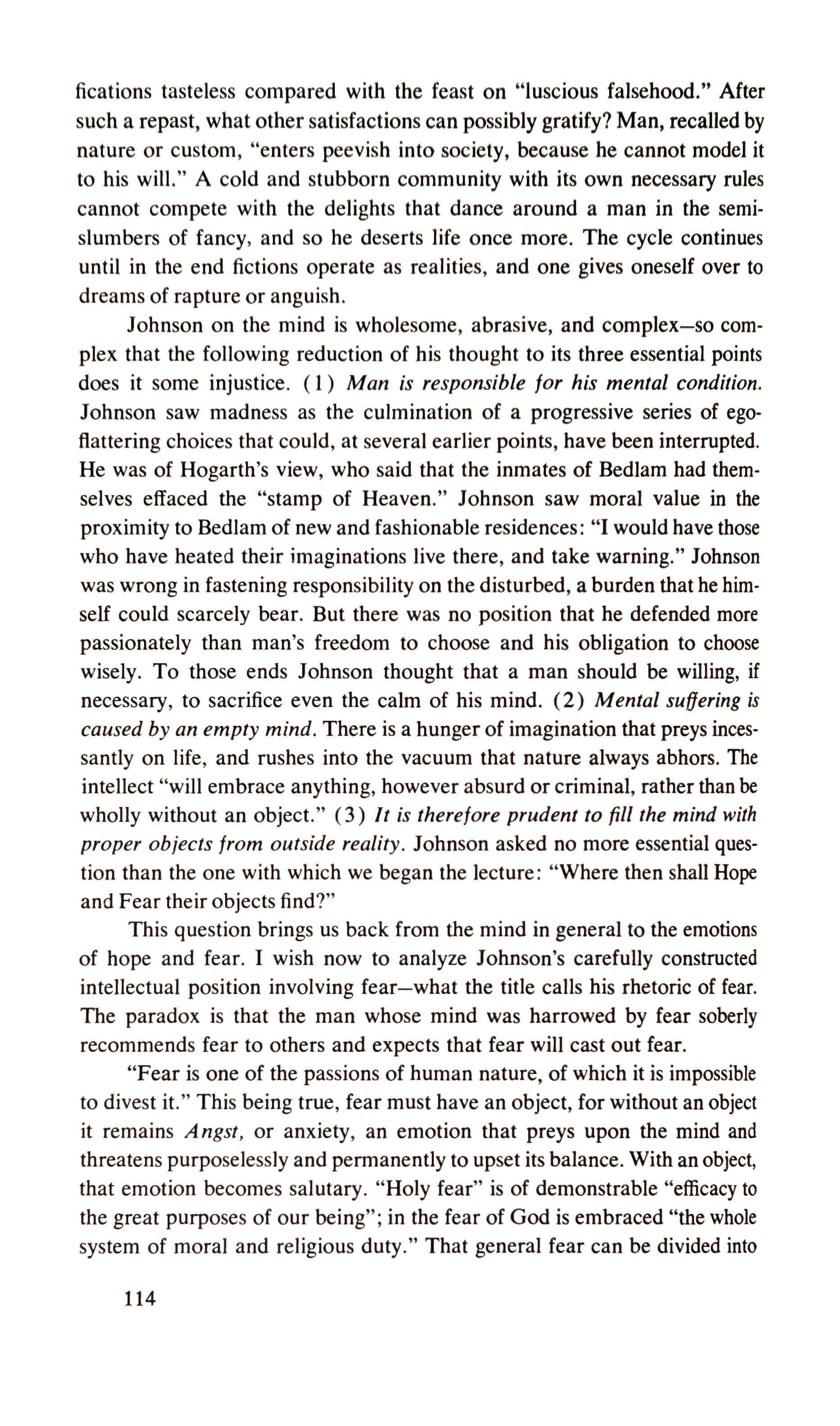
fications tasteless compared with the feast on "luscious falsehood." After such a repast, what other satisfactions can possibly gratify? Man, recalled by nature or custom, "enters peevish into society, because he cannot model it to his will." A cold and stubborn community with its own necessary rules cannot compete with the delights that dance around a man in the semislumbers of fancy, and so he deserts life once more. The cycle continues until in the end fictions operate as realities, and one gives oneself over to dreams of rapture or anguish.
Johnson on the mind is wholesome, abrasive, and complex so complex that the following reduction of his thought to its three essential points does it some injustice. (1) Man is responsible for his mental condition. Johnson saw madness as the culmination of a progressive series of egoflattering choices that could, at several earlier points, have been interrupted. He was of Hogarth's view, who said that the inmates of Bedlam had themselves effaced the "stamp of Heaven." Johnson saw moral value in the proximity to Bedlam of new and fashionable residences: "J would have those who have heated their imaginations live there, and take warning." Johnson was wrong in fastening responsibility on the disturbed, a burden that he himself could scarcely bear. But there was no position that he defended more passionately than man's freedom to choose and his obligation to choose wisely. To those ends Johnson thought that a man should be willing, if necessary, to sacrifice even the calm of his mind. (2) Mental suffering is caused by an empty mind. There is a hunger of imagination that preys incessantly on life, and rushes into the vacuum that nature always abhors. The intellect "will embrace anything, however absurd or criminal, rather than be wholly without an object." (3) It is therefore prudent to fill the mind with proper objects from outside reality. Johnson asked no more essential question than the one with which we began the lecture: "Where then shall Hope and Fear their objects find?"
This question brings us back from the mind in general to the emotions of hope and fear. I wish now to analyze Johnson's carefully constructed intellectual position involving fear what the title calls his rhetoric of fear. The paradox is that the man whose mind was harrowed by fear soberly recommends fear to others and expects that fear will cast out fear. "Fear is one of the passions of human nature, of which it is impossible to divest it." This being true, fear must have an object, for without an object it remains Angst, or anxiety, an emotion that preys upon the mind and threatens purposelessly and permanently to upset its balance. With an object, that emotion becomes salutary. "Holy fear" is of demonstrable "efficacy to the great purposes of our being"; in the fear of God is embraced "the whole system of moral and religious duty." That general fear can be divided into
114
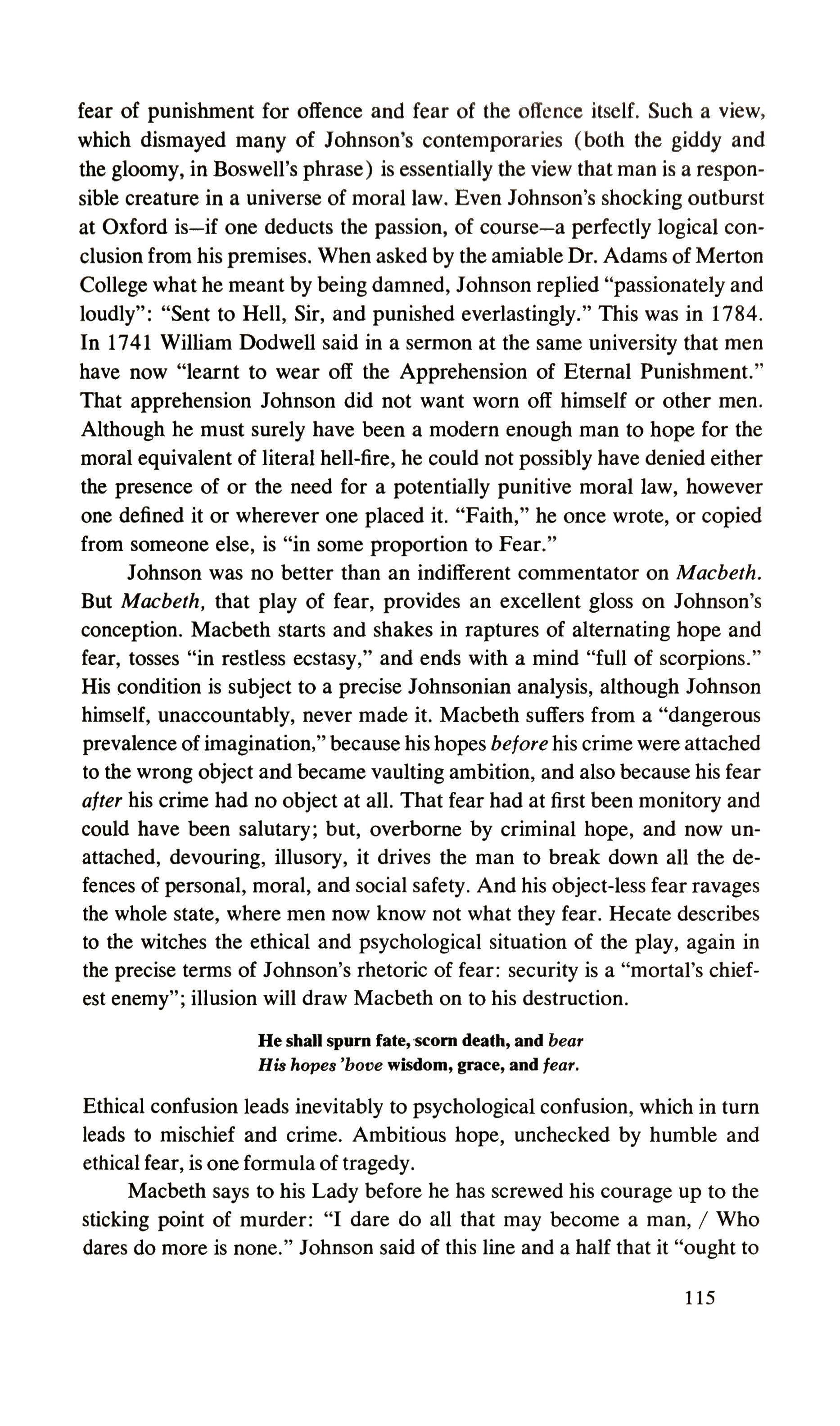
fear of punishment for offence and fear of the offence itself. Such a view, which dismayed many of Johnson's contemporaries (both the giddy and the gloomy, in Boswell's phrase) is essentially the view that man is a responsible creature in a universe of moral law. Even Johnson's shocking outburst at Oxford is if one deducts the passion, of course a perfectly logical conclusion from his premises. When asked by the amiable Dr. Adams of Merton College what he meant by being damned, Johnson replied "passionately and loudly": "Sent to Hell, Sir, and punished everlastingly." This was in 1784. In 1741 William Dodwell said in a sermon at the same university that men have now "learnt to wear off the Apprehension of Eternal Punishment." That apprehension Johnson did not want worn off himself or other men. Although he must surely have been a modern enough man to hope for the moral equivalent of literal hell-fire, he could not possibly have denied either the presence of or the need for a potentially punitive moral law, however one defined it or wherever one placed it. "Faith," he once wrote, or copied from someone else, is "in some proportion to Fear."
Johnson was no better than an indifferent commentator on Macbeth. But Macbeth, that play of fear, provides an excellent gloss on Johnson's conception. Macbeth starts and shakes in raptures of alternating hope and fear, tosses "in restless ecstasy," and ends with a mind "full of scorpions." His condition is subject to a precise Johnsonian analysis, although Johnson himself, unaccountably, never made it. Macbeth suffers from a "dangerous prevalence of imagination," because his hopes before his crime were attached to the wrong object and became vaulting ambition, and also because his fear after his crime had no object at all. That fear had at first been monitory and could have been salutary; but, overborne by criminal hope, and now unattached, devouring, illusory, it drives the man to break down all the defences of personal, moral, and social safety. And his object-less fear ravages the whole state, where men now know not what they fear. Hecate describes to the witches the ethical and psychological situation of the play, again in the precise terms of Johnson's rhetoric of fear: security is a "mortal's chiefest enemy"; illusion will draw Macbeth on to his destruction.
He shall spurn fate, 'scorn death, and hear His hopes 'hove wisdom, grace, and fear.
Ethical confusion leads inevitably to psychological confusion, which in turn leads to mischief and crime. Ambitious hope, unchecked by humble and ethical fear, is one formula of tragedy.
Macbeth says to his Lady before he has screwed his courage up to the sticking point of murder: "I dare do all that may become a man, / Who dares do more is none." Johnson said of this line and a half that it "ought to
115

bestow immortality on the author, though all his other productions had been lost." Such praise seems excessive until we realize that Shakespeare has epitomized in memorable, aphoristic language what Johnson regarded as man's central task: transforming vague and destructive Angst into useful and ethical fear and making it serve the purposes of life. Salutary fear is essentially the fear of transcending the limits placed by reality on our nature and on our powers. Let no man dare to be more than man!
Johnson's rhetoric of fear, which in this manner enforced respect for the facts, the laws, and the limitations that nature imposes on us, had enormous consequences in his practical criticism of life, literature, and manners. Johnsonian fear deflated the hero, discouraged hero-worship, and scorned the heroic in history. Remembering that Alexander the Great knew himself a mere man only because of his need for sleep, Johnson adds dryly, "the body which required such frequency of renovation gave but faint promises of immortality." Johnsonian fear led to a distrust of every social, political, and personal nostrum his age provided, and Johnson damned with wit or indignation the inevitable law of progress, the inevitable law of regress, the noble savage, the healing power of outdoor nature. His fear of the vaguely awesome made him discourage religious poetry religion was a subject too awful for the wings of wit and it made him scorn most religious philosophy as impiously and foolishly ambitious. His fear made hil11 distrust the whole system-building penchant of cosmological and metaphysical man: "To such, meditations humanity is unequal!" It led him to satirize every metaphor imposed upon physical reality the great chain of being, for example and every proposed organization of psychic life the law of association, the rule of a dominant passion. In refuting Berkeley he kicked a stone and rebounded from it, as if to show the power as well as the presence of hard, irrefutable, inescapable material reality.
Thus Johnson's deflationary laughter, born of a basic fear of the pretentious, the ambitious, and the illusory, rests on his unwavering respect for nature. Outside reality always including both the natural and the humanwas for him not only a healing and healthful restraint but an intellectual challenge; and it is on this property, so narrow in one sense, so spacious in another, that Johnson erected his house of hope. Here and only herecan man "invigorate himself by reason and reflection." This is so because reason and nature were almost synonymous, because reason and virtue were also almost synonymous, and because therefore virtue and nature, being equal to the same thing (reason), are also equal to each other. Confronting nature, man becomes truly free to create and free to hope. Acting to increase the "hereditary aggregate of knowledge and happiness," he witnesses his irrational fears depart, and he achieves the dignity of a truly reasonable
116
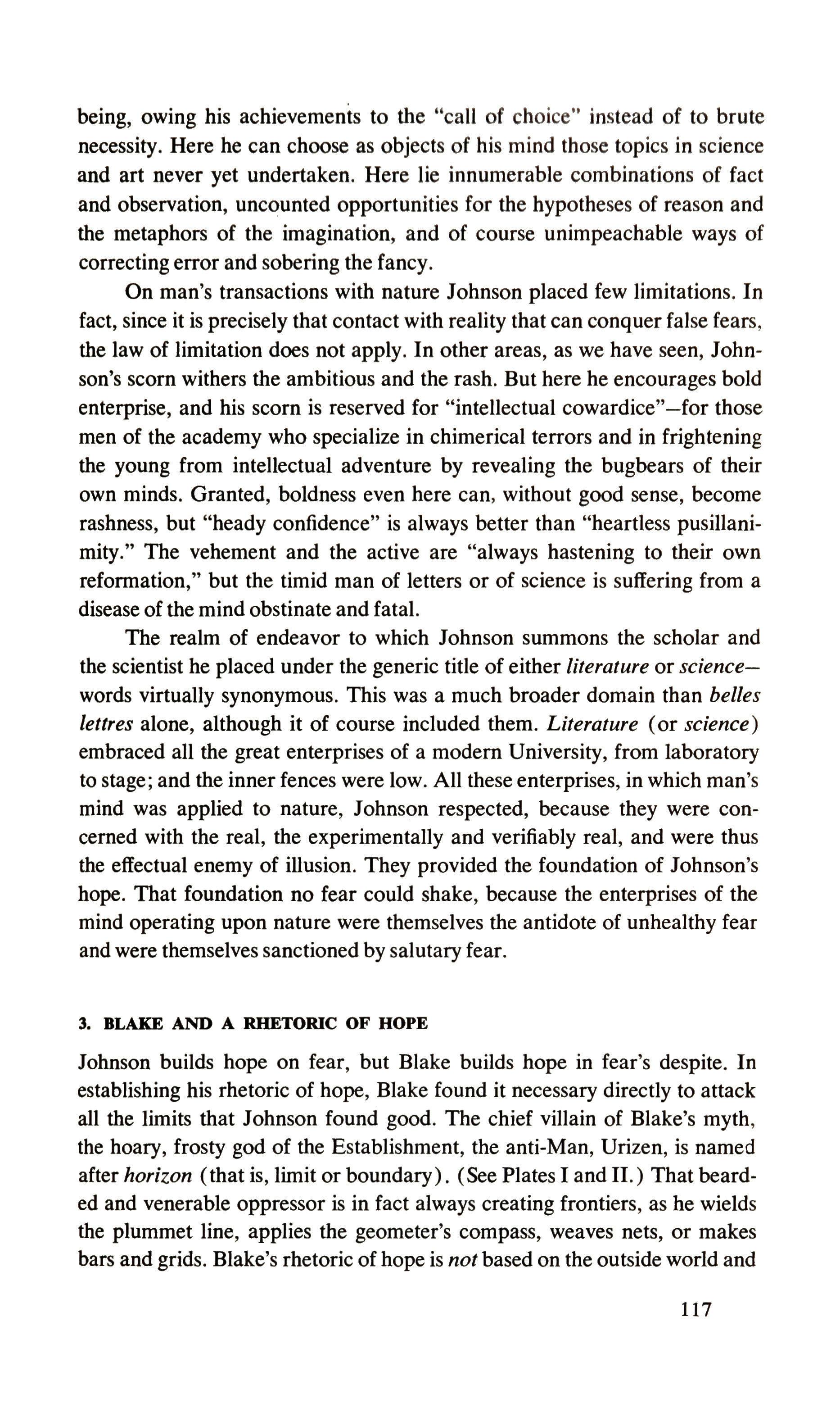
being, owing his achievements to the "call of choice" instead of to brute necessity. Here he can choose as objects of his mind those topics in science and art never yet undertaken. Here lie innumerable combinations of fact and observation, uncounted opportunities for the hypotheses of reason and the metaphors of the imagination, and of course unimpeachable ways of correcting error and sobering the fancy.
On man's transactions with nature Johnson placed few limitations. In fact, since it is precisely that contact with reality that can conquer false fears, the law of limitation does not apply. In other areas, as we have seen, Johnson's scorn withers the ambitious and the rash. But here he encourages bold enterprise, and his scorn is reserved for "intellectual cowardice" for those men of the academy who specialize in chimerical terrors and in frightening the young from intellectual adventure by revealing the bugbears of their own minds. Granted, boldness even here can, without good sense, become rashness, but "heady confidence" is always better than "heartless pusillanimity." The vehement and the active are "always hastening to their own ref01 marion," but the timid man of letters or of science is suffering from a disease of the mind obstinate and fatal.
The realm of endeavor to which Johnson summons the scholar and the scientist he placed under the generic title of either literature or sciencewords virtually synonymous. This was a much broader domain than belles lettres alone, although it of course included them. Literature (or science) embraced all the great enterprises of a modem University, from laboratory to stage; and the inner fences were low. All these enterprises, in which man's mind was applied to nature, Johnson respected, because they were concerned with the real, the experimentally and verifiably real, and were thus the effectual enemy of illusion. They provided the foundation of Johnson's hope. That foundation no fear could shake, because the enterprises of the mind operating upon nature were themselves the antidote of unhealthy fear and were themselves sanctioned by salutary fear.
3. BLAKE AND A RHETORIC OF HOPE
Johnson builds hope on fear, but Blake builds hope in fear's despite. In establishing his rhetoric of hope, Blake found it necessary directly to attack all the limits that Johnson found good. The chief villain of Blake's myth, the hoary, frosty god of the Establishment, the anti-Man, Urizen, is named after horizon (that is, limit or boundary). (See Plates I and II.) That bearded and venerable oppressor is in fact always creating frontiers, as he wields the plummet line, applies the geometer's compass, weaves nets, or makes bars and grids. Blake's rhetoric of hope is not based on the outside world and
117
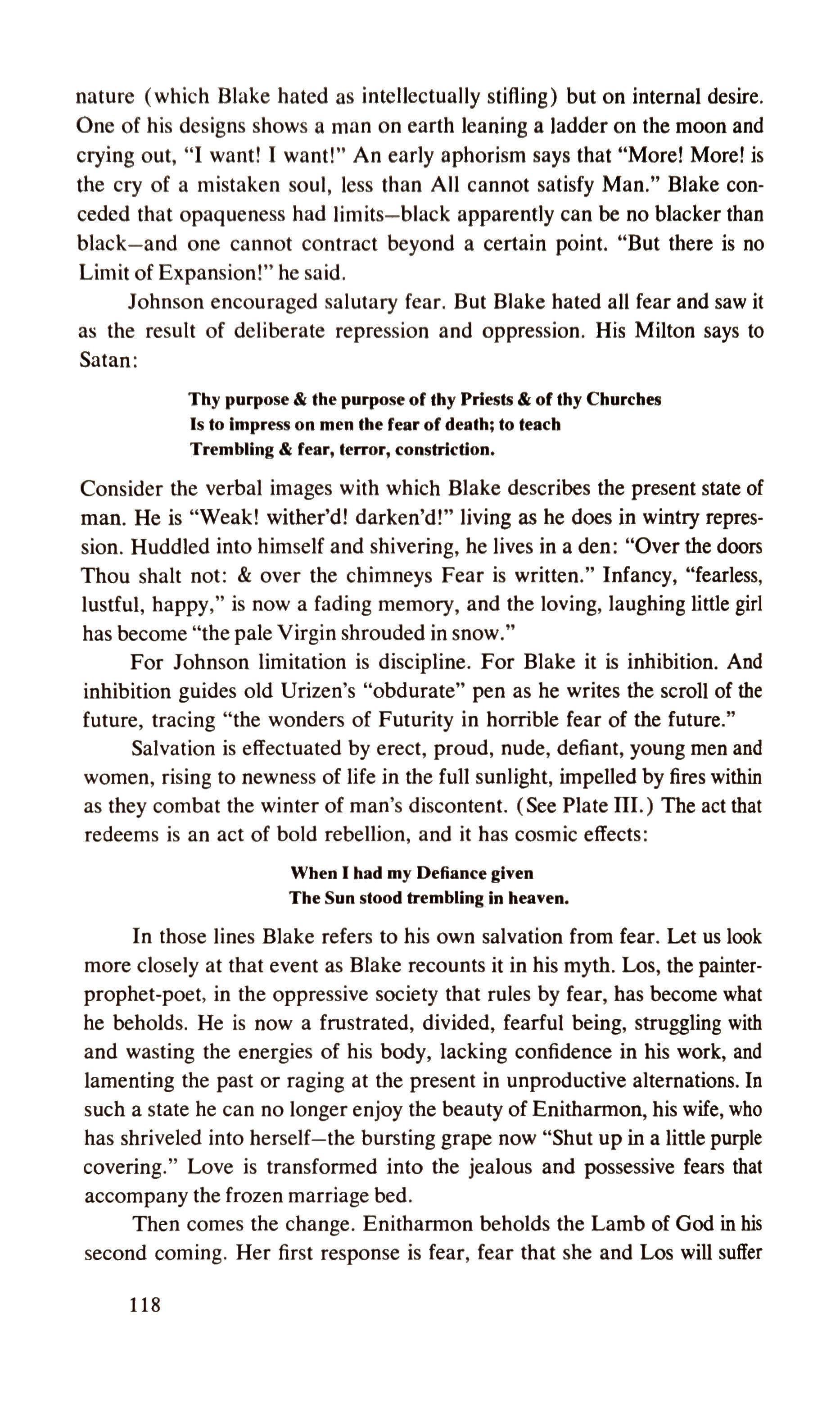
nature (which Blake hated as intellectually stifling) but on internal desire. One of his designs shows a man on earth leaning a ladder on the moon and crying out, "I want! 1 want!" An early aphorism says that "More! More! is the cry of a mistaken soul, less than All cannot satisfy Man." Blake conceded that opaqueness had limits black apparently can be no blacker than black and one cannot contract beyond a certain point. "But there is no Limit of Expansion!" he said.
Johnson encouraged salutary fear. But Blake hated all fear and saw it as the result of deliberate repression and oppression. His Milton says to Satan:
Thy purpose & the purpose of thy Priests & of thy Churches Is to impress on men the fear of death; to teach Trembling & fear, terror, constriction.
Consider the verbal images with which Blake describes the present state of man. He is "Weak! wither'd! darken'd!" living as he does in wintry repression. Huddled into himself and shivering, he lives in a den: "Over the doors Thou shalt not: & over the chimneys Fear is written." Infancy, "fearless, lustful, happy," is now a fading memory, and the loving, laughing little girl has become "the pale Virgin shrouded in snow."
For Johnson limitation is discipline. For Blake it is inhibition. And inhibition guides old Urizen's "obdurate" pen as he writes the scroll of the future, tracing "the wonders of Futurity in horrible fear of the future."
Salvation is effectuated by erect, proud, nude, defiant, young men and women, rising to newness of life in the full sunlight, impelled by fires within as they combat the winter of man's discontent. (See Plate III.) The act that redeems is an act of bold rebellion, and it has cosmic effects:
When I had my Defiance given The Sun stood trembling in heaven.
In those lines Blake refers to his own salvation from fear. Let us look more closely at that event as Blake recounts it in his myth. Los, the painterprophet-poet, in the oppressive society that rules by fear, has become what he beholds. He is now a frustrated, divided, fearful being, struggling with and wasting the energies of his body, lacking confidence in his work, and lamenting the past or raging at the present in unproductive alternations. In such a state he can no longer enjoy the beauty of Enitharmon, his wife, who has shriveled into herself the bursting grape now "Shut up in a little purple covering." Love is transformed into the jealous and possessive fears that accompany the frozen marriage bed.
Then comes the change. Enitharmon beholds the Lamb of God in his second coming. Her first response is fear, fear that she and Los will suffer
118
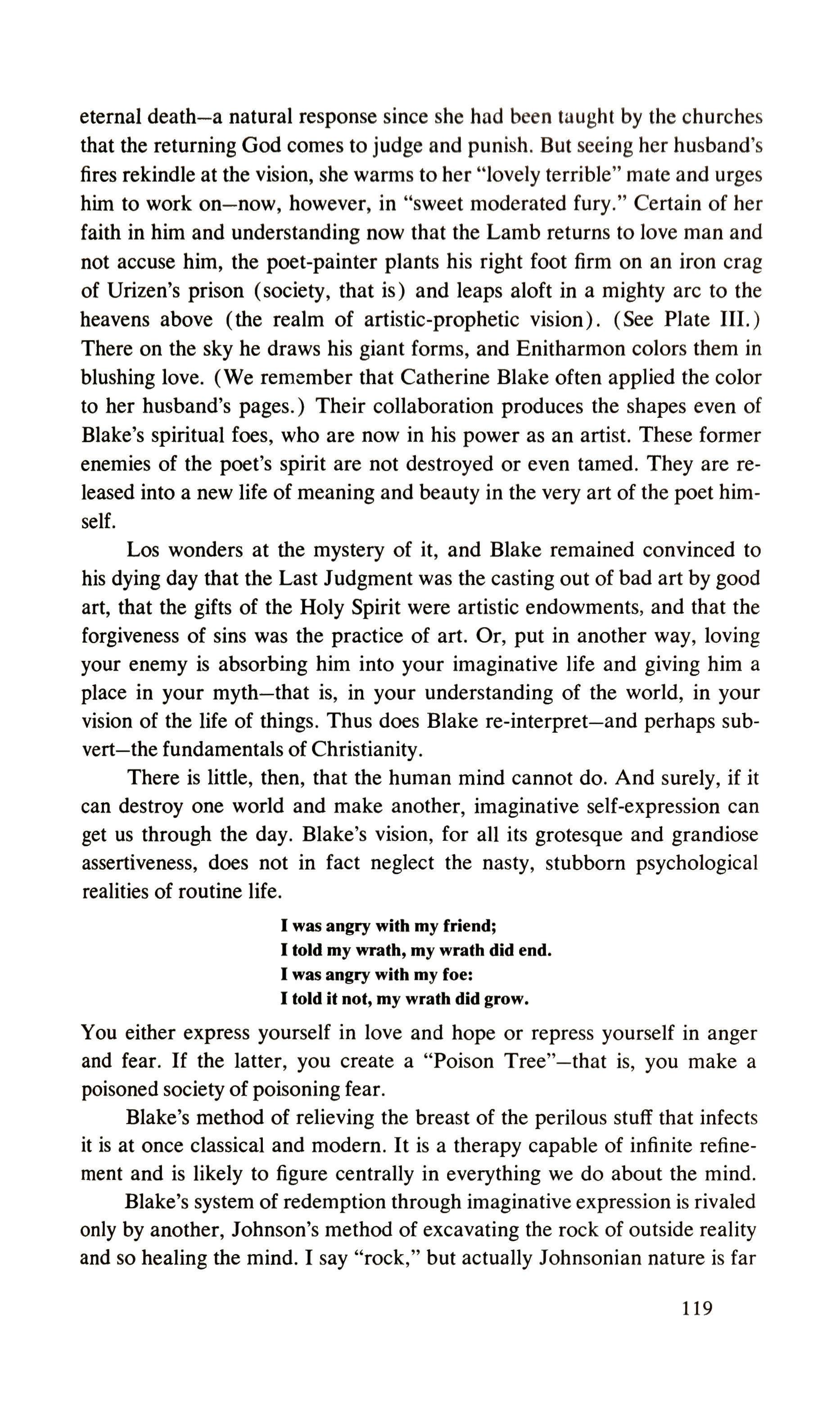
eternal death a natural response since she had been taught by the churches that the returning God comes to judge and punish. But seeing her husband's fires rekindle at the vision, she warms to her "lovely terrible" mate and urges him to work on now, however, in "sweet moderated fury." Certain of her faith in him and understanding now that the Lamb returns to love man and not accuse him, the poet-painter plants his right foot firm on an iron crag of Urizen's prison (society, that is) and leaps aloft in a mighty arc to the heavens above (the realm of artistic-prophetic vision). (See Plate III.) There on the sky he draws his giant forms, and Enitharmon colors them in blushing love. (We remember that Catherine Blake often applied the color to her husband's pages.) Their collaboration produces the shapes even of Blake's spiritual foes, who are now in his power as an artist. These former enemies of the poet's spirit are not destroyed or even tamed. They are released into a new life of meaning and beauty in the very art of the poet himself.
Los wonders at the mystery of it, and Blake remained convinced to his dying day that the Last Judgment was the casting out of bad art by good art, that the gifts of the Holy Spirit were artistic endowments, and that the forgiveness of sins was the practice of art. Or, put in another way, loving your enemy is absorbing him into your imaginative life and giving him a place in your myth that is, in your understanding of the world, in your vision of the life of things. Thus does Blake re-interpret and perhaps subvert the fundamentals of Christianity.
There is little, then, that the human mind cannot do. And surely, if it can destroy one world and make another, imaginative self-expression can get us through the day. Blake's vision, for all its grotesque and grandiose assertiveness, does not in fact neglect the nasty, stubborn psychological realities of routine life.
I was angry with my friend; I told my wrath, my wrath did end. I was angry with my foe: I told it not, my wrath did grow.
You either express yourself in love and hope or repress yourself in anger and fear. If the latter, you create a "Poison Tree" that is, you make a poisoned society of poisoning fear.
Blake's method of relieving the breast of the perilous stuff that infects it is at once classical and modern. It is a therapy capable of infinite refinement and is likely to figure centrally in everything we do about the mind. Blake's system of redemption through imaginative expression is rivaled only by another, Johnson's method of excavating the rock of outside reality and so healing the mind. I say "rock," but actually Johnsonian nature is far
119

from being a soil ungrateful to the tiller's care. Its productiveness should not be estimated by Johnson's crops alone, but even these are not inconsiderable. His quick adaptation to his own literary criticism of the new doctrine of the sublime; his practice of the empirically oriented psychological criticism whose domain he extended; his destruction of the paralyzing and perennial analysis of literary works by genres; his own observations of the mind at work; his naturalization into the English language of the new vocabulary of physical science; his countless social, political, aesthetic, moral definitions inside and outside his dictionary; his distillation into proverb and epigram of so much human experience all these achievements arose from encounters with nature and reality, of almost literal struggles between man's reason and external nature.
It would be easy much too easy to say that we must have both the Johnsonian nature that slowly creates a usable heritage and Blakean mind that burns up one universe and breathes another into being. But I cannot let the contrasts stand in balance, see-saw, teeter-totter. For truth is sometimes best served by the reconcilement, not merely the retention, of opposites. I wish you would therefore consider in conclusion what will have to remain a paradox only, since I am not wise enough to transform it into an insight.
If we do not let the sapphire-studded glories of Blake's New Ierusalem blind us, we can discern the outlines of Iohnsonian law. Remember the psychological chaos of present life, as Blake saw it: "grief and fear and love and desire: And now I hate & now I love." What replaces those emotions and their destructive alternations and cycles? Blake calls it "Intellect," or "mental pleasures and energies," or "fitness and order." Within the new man an unmistakable hierarchy of faculties and appetites keeps the sexual desires in their proper place, the loins, from whence they no longer invade the mind and heart. Looking back from order upon chaos and its cause, Blake says, recalling Shakespeare and Johnson, "Attempting to be more than Man / We become less." Is it possible that Blakean imagination and Iohnsonian nature turn on the same pivot?
W. H. Auden has written that Blake
even as a child could pet
The tigers Voltajre never met.
Voltaire may never have met them, but Iohnson had. Both he and Blake knew tigers of wrath and serpents of fear. It was no easy path that led each to the repose of intellectual order. To that realm of stable form each of our writers applied the word science, not in its modern restricted sense but in the older meaning that included all the activities of the mind, discursive and
120
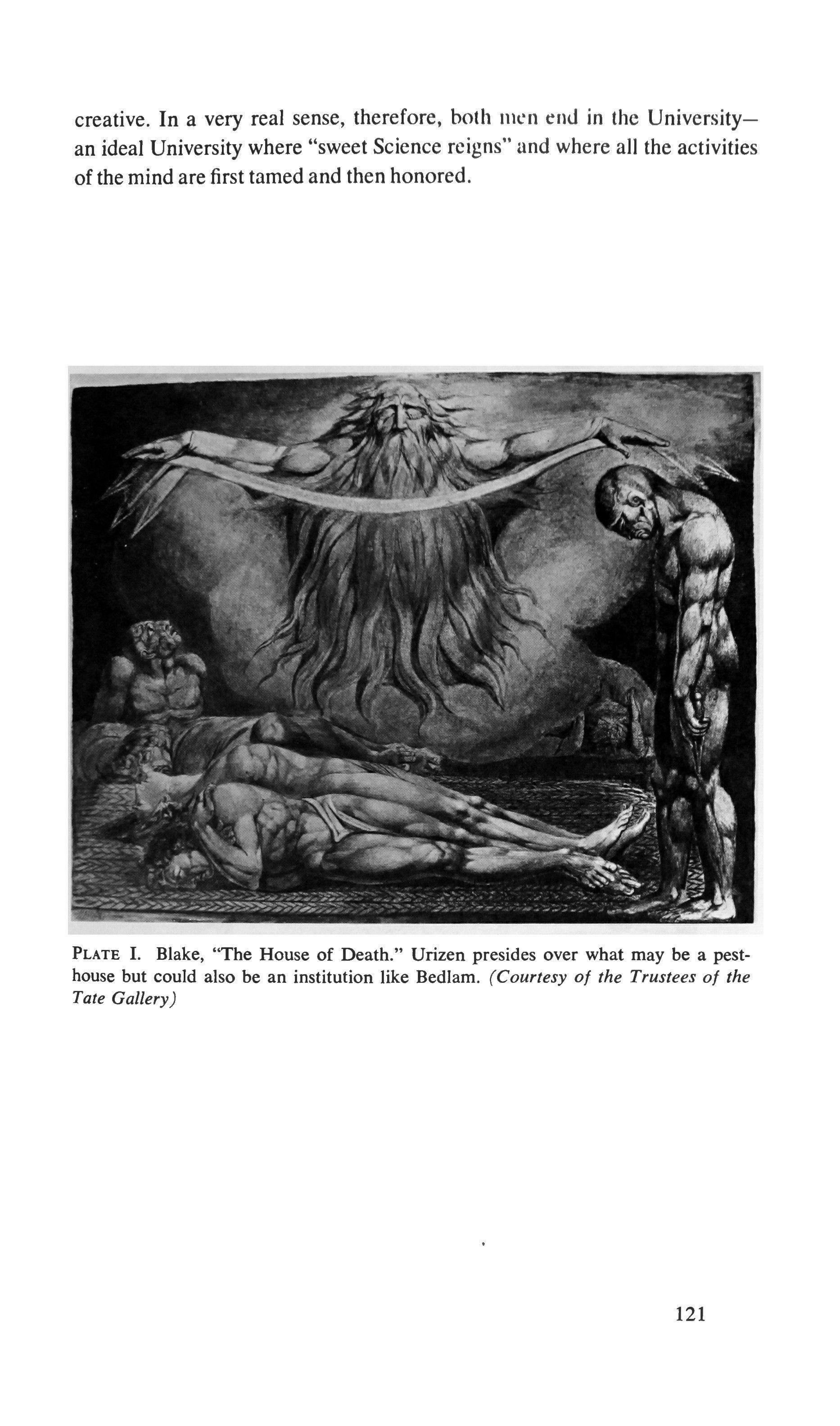
creative. In a very real sense, therefore, both 111�ll end in the Universityan ideal University where "sweet Science reigns" and where all the activities of the mind are first tamed and then honored.
121
PLATE I. Blake, "The House of Death." Urizen presides over what may be a pesthouse but could also be an institution like Bedlam. (Courtesy of the Trustees of the Tate Gallery)

PLATE II. Blake, The Book oj Urizen, Title Page. Urizen, a creator of human institutions, sits on a mystical book and writes tablets of law and commandment. (Rosenwald Collection, Library oj Congress)
r I

a new imaginative, intellectual, and social order. (Collection of
97' I
PLATE III. Blake, Jerusalem, Plate 97. Los, Blake's poet-prophet, rises to a vision of
Mr. and Mrs. Paul Mellon)
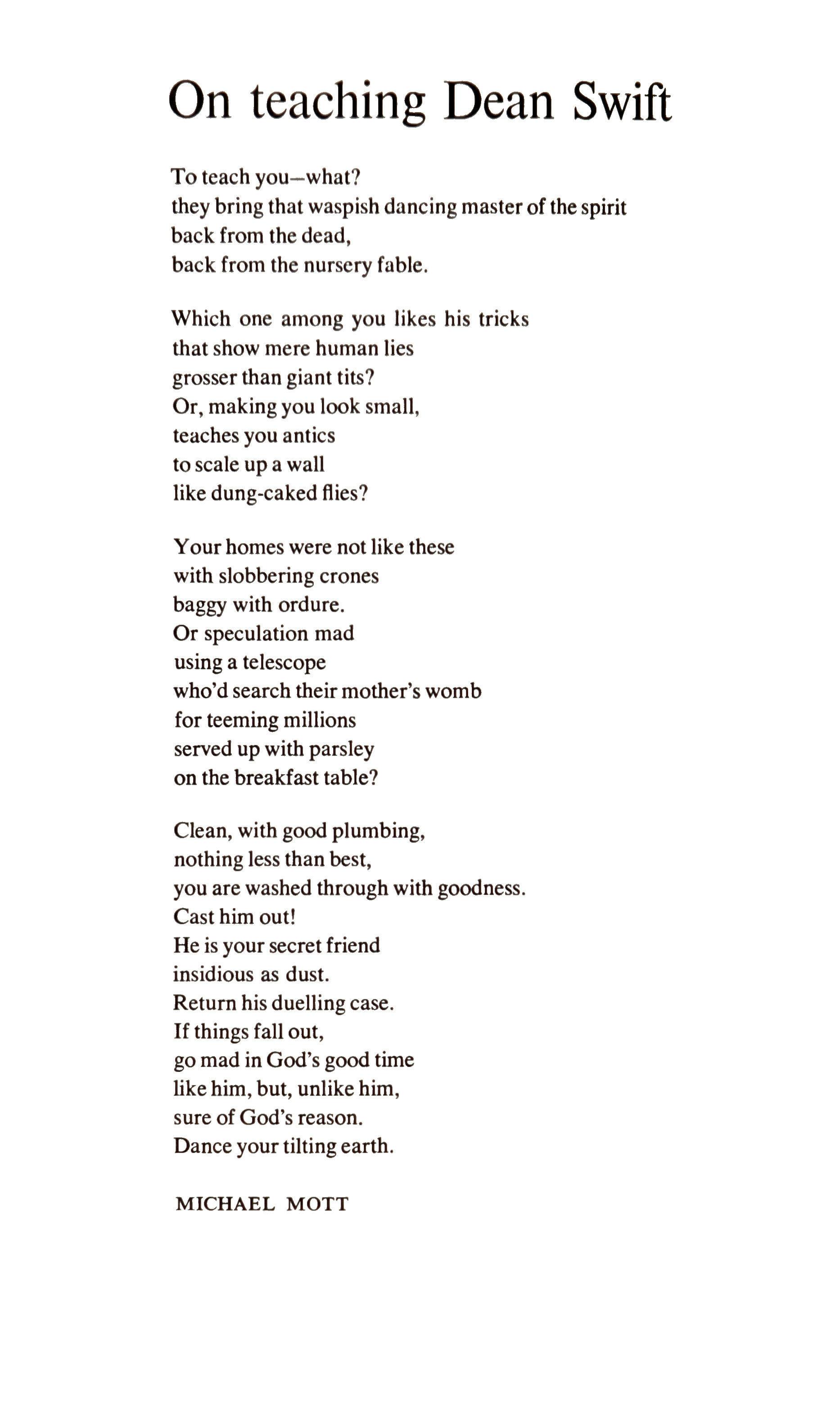
To teach you what? theybring that waspishdancing master of the spirit back from the dead, back from the nursery fable.
Which one among you likes his tricks that show mere human lies grosser than giant tits? Or, making you look small, teaches you antics to scale up a wall like dung-caked flies?
Your homes were not like these with slobbering crones baggy with ordure. Or speculation mad using a telescope who'd search their mother's womb for teeming millions served up with parsley on the breakfast table?
Clean, with good plumbing, nothing less than best, you are washed through with goodness. Cast him out!
He is your secret friend insidious as dust. Return his duelling case. If things fallout, go mad in God's good time like him, but, unlike him, sure of God's reason. Dance your tilting earth.
MICHAEL MOTT
ean
1
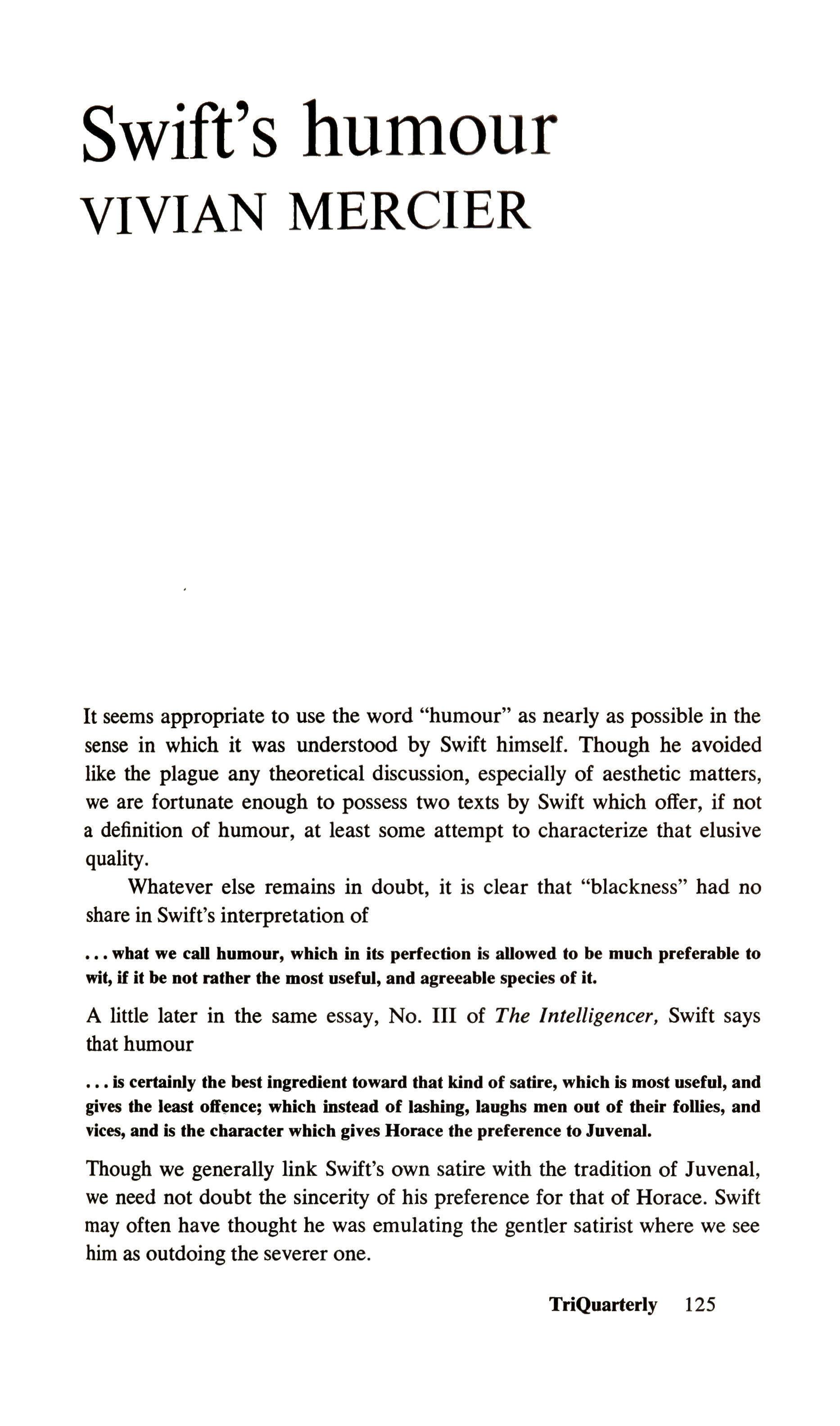
It seems appropriate to use the word "humour" as nearly as possible in the sense in which it was understood by Swift himself. Though he avoided like the plague any theoretical discussion, especially of aesthetic matters, we are fortunate enough to possess two texts by Swift which offer, if not a definition of humour, at least some attempt to characterize that elusive quality.
Whatever else remains in doubt, it is clear that "blackness" had no share in Swift's interpretation of what we call humour, which in its perfection is allowed to be much preferable to wit, if it be not rather the most useful, and agreeable species of it.
A little later in the same essay, No. III of The Intelligencer, Swift says that humour is certainly the best ingredient toward that kind of satire, which is most useful, and gives the least oftence; which instead of lashing, laughs men out of their follies, and vices, and is the character which gives Horace the preference to Juvenal.
Though we generally link Swift's own satire with the tradition of Juvenal, we need not doubt the sincerity of his preference for that of Horace. Swift may often have thought he was emulating the gentler satirist where we see him as outdoing the severer one. TrlQuarterly
125
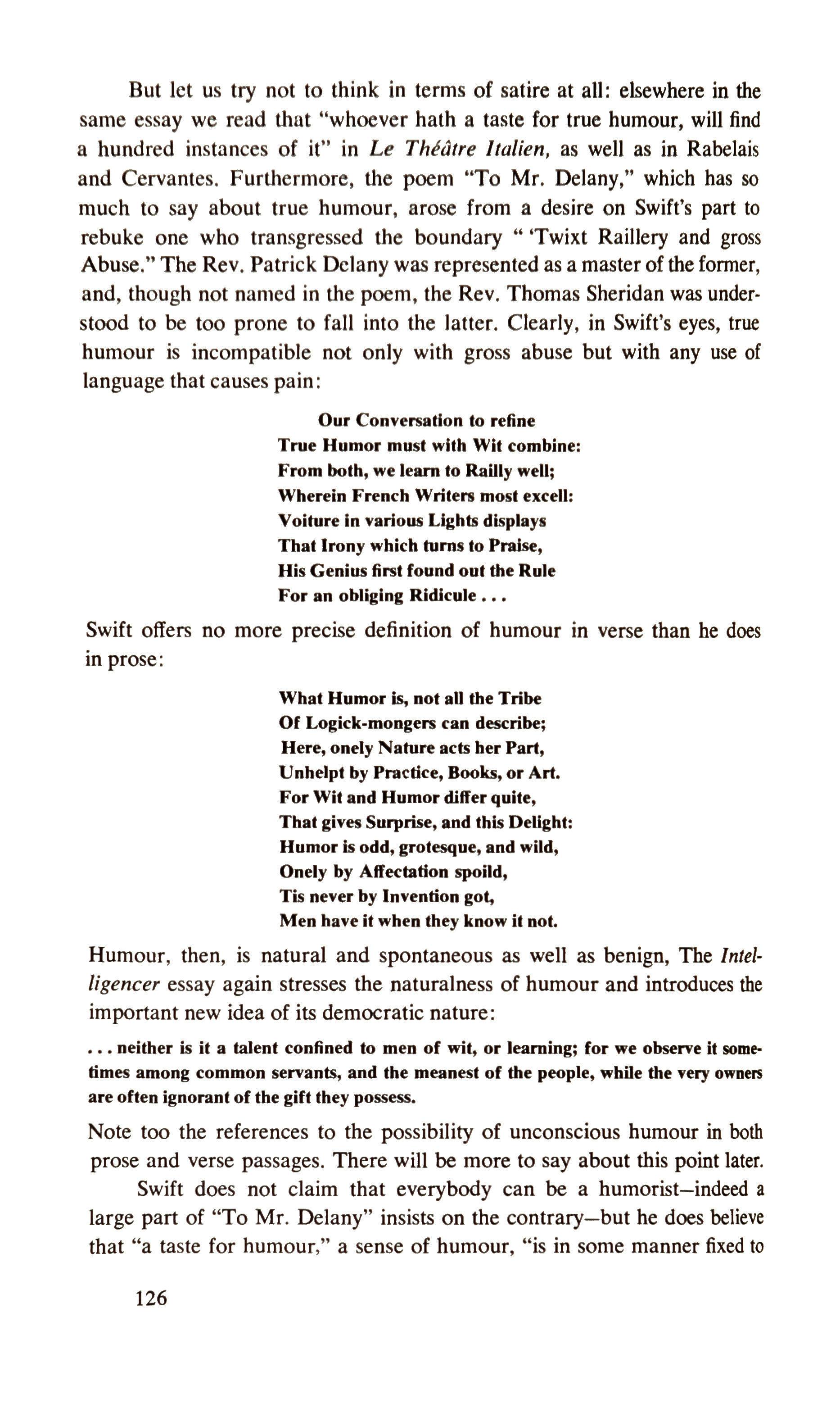
But let us try not to think in terms of satire at all: elsewhere in the same essay we read that "whoever hath a taste for true humour, will find a hundred instances of it" in Le Theatre Italien, as well as in Rabelais and Cervantes. Furthermore, the poem "To Mr. Delany," which has so much to say about true humour, arose from a desire on Swift's part to rebuke one who transgressed the boundary 'Twixt Raillery and gross Abuse." The Rev. Patrick Delany was represented as a master of the former, and, though not named in the poem, the Rev. Thomas Sheridan was understood to be too prone to fall into the latter. Clearly, in Swift's eyes, true humour is incompatible not only with gross abuse but with any use of language that causes pain:
Our Conversation to refine True Humor must with Wit combine: From both, we learn to Rauly well; Wherein French Writers most exeell:
Voiture In various Lights displays That Irony which turns to Praise, His Genius first found out the Rule For an obliging Ridicule
Swift offers no more precise definition of humour in verse than he does In prose:
What Humor is, not aU the Tribe Of Logick-mongers can describe; Here, onely Nature acts her Part, Unhelpt by Practice, Books, or Art. For Wit and Humor differ quite, That gives Surprise, and this Delight: Humor is odd, grotesque, and wild, Onely by Affectation spoild, Tis never by Invention got, Men have it when they know it not.
Humour, then, is natural and spontaneous as well as benign, The Intelligencer essay again stresses the naturalness of humour and introduces the important new idea of its democratic nature: neither is it a talent confined to men of wit, or leal ning; for we observe it sometimes among common servants, and the meanest of the people, while the very owners are often ignorant of the gift they possess.
Note too the references to the possibility of unconscious humour in both prose and verse passages. There will be more to say about this point later. Swift does not claim that everybody can be a humorist indeed a large part of "To Mr. Delany" insists on the contrary but he does believe that "a taste for humour," a sense of humour, "is in some manner fixed to
126

the very nature of man, and generally obvious to tile vulgar, except upon subjects too refined, and superior to their understanding." A student of mine, Patricia Woodward, to whom I owe some other hints for this article, suggests that Gulliver's Travels owes its universal appeal for children as much to its humour as to its fairy-tale wonders. She and I have so far failed to unearth any study of the publishing history of Gulliver's Travels as a children's classic. One glance, however, at the British Museum General Catalogue of Printed Books will show the ample materials available for such a study. The first abridged edition appeared in 1727, just one year after the first publication of the Travels, but it may have been aimed at semi-literate adults. The first chapbook edition in the British Museum is tentatively dated 1750, and there may have been earlier editions in this perishable format, The first abridgement recorded as specifically for children formed a part of Ross's Juvenile Library in 1814. An illustrated edition specified as "for the rising generation" occurs in 1874, but, even before that, in 1867, we find an illustrated edition of the whole work "carefully edited by a Clergyman." After 1900 the children's editions seem to outnumber the adult ones. Of course, most children's abridgements lay stress on the wonderful and contain only the voyage to Lilliput or the first two voyages, but the less drastic abridgements of even these episodes must surely draw much of their appeal from the humorous discomforts of being too big or too small. We should remember Oscar Wilde's shrewd remark in a letter to Robert Ross (3 December 1898):
Ordinary critics always think that children are sentimental about literature: they are not: tbey have humour instead.
We tend to take such an earnest, gloomy view of the Travels nowadays and to harp upon the Yahoos as though we were in the habit of beginning the book at the end and reading backwards, that it is salutary to look at some of the immediate reactions recorded in Swift's Correspondence. The poet John Gay is explicit about the book's appeal for children: "From the highest to the lowest it is universally read, from the Cabinet-council to the Nursery." Later on in the same letter (17 November, 1726) he says that "the whole town, men, women, and children are quite full of it." Dr. John Arbuthnot had already written (5 November, 1726): "Gulliver is a happy man that at his age can write such a merry work."
In discussing the popular appeal of Swift's humour, it is not irrelevant to mention Swift folklore, which has been surveyed recently by Professor Mackie L. Jarrell in the Journal of American Folklore (April-June, 1964). Professor Jarrell concludes:
It is clear that the Swift of Irish oral tradition is very different from the Swift of the biographers. Of aU the familiar anecdotes which pyramided from Mrs. Pilkington,
127

Orrery, Deluny, Deane Swift, and SIIerldan to Scott, and which have always formed a sizable portion of the bioKrupllles, oot one Is found In the IFC [Irish Folklore Commlsslen] collection Vet It II worth ootlnl that even the jestbook anecdotes which, early and lute, became attached to hi. name can be attached only to a great name and one renowned for wit.
And for humour, I would add, in the light of several humorous but far from witty anecdotes included in Professor Jarrell's comprehensive article. From these reflections on the universality of humour let us now turn back to the implications of Swift's belief that humorous people "are often ignorant of the gift they possess." The Elizabethan view of humour as a mental and temperamental bias, familiar to us from the comedies of Ben Jonson, died hard in the Eighteenth Century. According to Louis Cazamian, it was not until 1744, the year before Swift's death, that Corbyn Morris clearly distinguished between the "Man of Humour" and the "Humourist." Even then, as Cazamian points out, Morris's terminology did not win acceptance, though his fundamental distinction between the two character types ultimately did. What Morris called a "Man of Humour" is now termed a "humorist," whereas his " 'Humourist' is what [Ben] Jonson, and a whole century after him, called 'a humour.' If I interpret Swift's hints about unconscious humour correctly, he fused the two types, believing that the exponent of true humour himself, in fact had to be at one and the same time a humorist and a humour, a jester and a butt, a sane observer and an eccentric, rather like Shakespeare's Jaques or even Falstaff. Quite apart from this historical background, my title is of course ambiguous, even according to contemporary usage, and I cannot resist the temptation to exploit that ambiguity a little by saying a word or two about Swift's humour in the other sense: his temperament, his personality. Because of the excesses of biographically oriented literary criticism in the recent past, we try very hard nowadays to separate the Life from the Work; yet few critics could honestly say that they are any more fascinated by Swift's art than by the personality which alternately reveals and conceals itself therein.
I am not going to generalize about that personality here, but we must constantly bear in mind that the choice of Swift's humour as a topic, rather than his satire or his irony, imposes a bias on this paper. I am obliged to seek out what Lester M. Beattie, in an ingratiating essay, has called "The Lighter Side of Swift" "lighter" as opposed to "darker" rather than "lighter" as opposed to "heavier." In doing so, I find myself in step with the present march of Swift studies. Two students of Swift as different in their bias as Professor Denis Johnston and Professor Irvin Ehrenpreis agree on
128
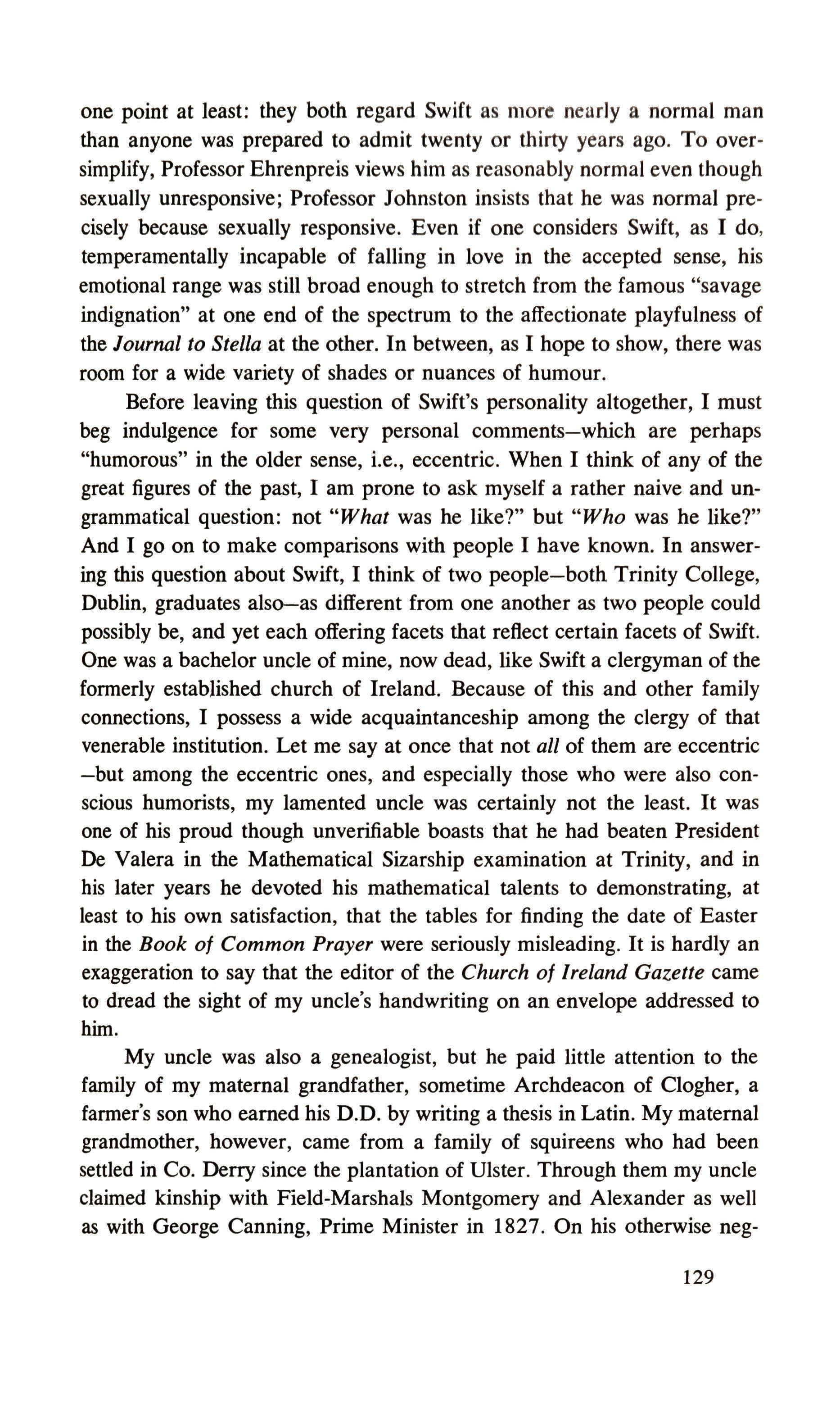
one point at least: they both regard Swift as more nearly a normal man than anyone was prepared to admit twenty or thirty years ago. To oversimplify, Professor Ehrenpreis views him as reasonably normal even though sexually unresponsive; Professor Johnston insists that he was normal precisely because sexually responsive. Even if one considers Swift, as I do, temperamentally incapable of falling in love in the accepted sense, his emotional range was still broad enough to stretch from the famous "savage indignation" at one end of the spectrum to the affectionate playfulness of the Journal to Stella at the other. In between, as I hope to show, there was room for a wide variety of shades or nuances of humour.
Before leaving this question of Swift's personality altogether, I must beg indulgence for some very personal comments which are perhaps "humorous" in the older sense, i.e., eccentric. When I think of any of the great figures of the past, I am prone to ask myself a rather naive and ungrammatical question: not "What was he like?" but "Who was he like?" And I go on to make comparisons with people I have known. In answering this question about Swift, I think of two people both Trinity College, Dublin, graduates also-as different from one another as two people could possibly be, and yet each offering facets that reflect certain facets of Swift. One was a bachelor uncle of mine, now dead, like Swift a clergyman of the formerly established church of Ireland. Because of this and other family connections, I possess a wide acquaintanceship among the clergy of that venerable institution. Let me say at once that not all of them are eccentric -but among the eccentric ones, and especially those who were also conscious humorists, my lamented uncle was certainly not the least. It was one of his proud though unverifiable boasts that he had beaten President De Valera in the Mathematical Sizarship examination at Trinity, and in his later years he devoted his mathematical talents to demonstrating, at least to his own satisfaction, that the tables for finding the date of Easter in the Book of Common Prayer were seriously misleading. It is hardly an exaggeration to say that the editor of the Church of Ireland Gazette came to dread the sight of my uncle's handwriting on an envelope addressed to him.
My uncle was also a genealogist, but he paid little attention to the family of my maternal grandfather, sometime Archdeacon of Clogher, a farmer's son who earned his D.D. by writing a thesis in Latin. My maternal grandmother, however, came from a family of squireens who had been settled in Co. Derry since the plantation of Ulster. Through them my uncle claimed kinship with Field-Marshals Montgomery and Alexander as well as with George Canning, Prime Minister in 1827. On his otherwise neg-
129

lected father's side, he thought himself connected by marriage with a future Prime Minister, Anthony Eden, whose elevation to the highest office he did not live to see.
My uncle was never, to his great regret, able to prove a relationship with Winston Churchill, but when taken ill during the preaching of a sermon, he was happy to describe his misadventure as a "church-ill.' He always had a fresh supply of puns and riddles, besides being known as "a great tease." His family noted with some slight trepidation that he teased with most relish when his victims were teen-aged girls. In the characteristics just mentioned he certainly bore a resemblance to Swift; I have often fancied a physical resemblance between the two as well. It's curious that people usually picture Swift as lean and lantern-jawed. Actually, the 1708 portrait of him by Charles Jervais that now hangs in the National Portrait Gallery, Dublin, shows a plump, clean-shaven face and a bald head not unlike my uncle's. Although his parish was in Co. Derry and his traditional sympathies were Orange, my uncle was always delighted by the number of salutes he received from total strangers in the South of Ireland, being fully aware that he looked indistinguishable from many a celibate priest of the rival persuasion; perhaps the popular Dean of St. Patrick's did too.
The other, and very different, person associated in my mind with Swift is the only authentic genius to whom I have been closely exposed for long periods of time; he and I roomed together in Trinity for two hectic years. Conor Cruise O'Brien has since gone on to win something approaching world-wide fame-or should I say notoriety? in politics and literature. He has made both friends and enemies by his wit, but it is his humour, "odd, grotesque and wild," in Swift's words, that fOIIlIS the substance of some of my favourite anecdotes. Our rooms were in Number Four, Trinity College, overlooking both Grafton Street and College Green. Sometimes in the small hours my irrepressible roommate ("wife" in Trinity parlance) would throw up a window and declaim, "People of Dublin, this is Mercier speaking to you!" Then would follow some pronouncement little calculated to appeal to the people of Dublin, if in fact any were still within earshot: "To hell with the Pope!" perhaps, or "God is dead!" or "Long live Karl Marx!" It never got farther than one or two such wild cries, because after that I would wrestle him away from the window. Besides these sudden, unpredictable practical jokes of a mental rather than physical bent, he was fond, like Swift, of literary hoaxes. Not all of those that he perpetrated in the undergraduate weekly, T. C. D., amused me equally, but there was one that I found excruciatingly funny, even though it involved me in some slight physical danger.
130
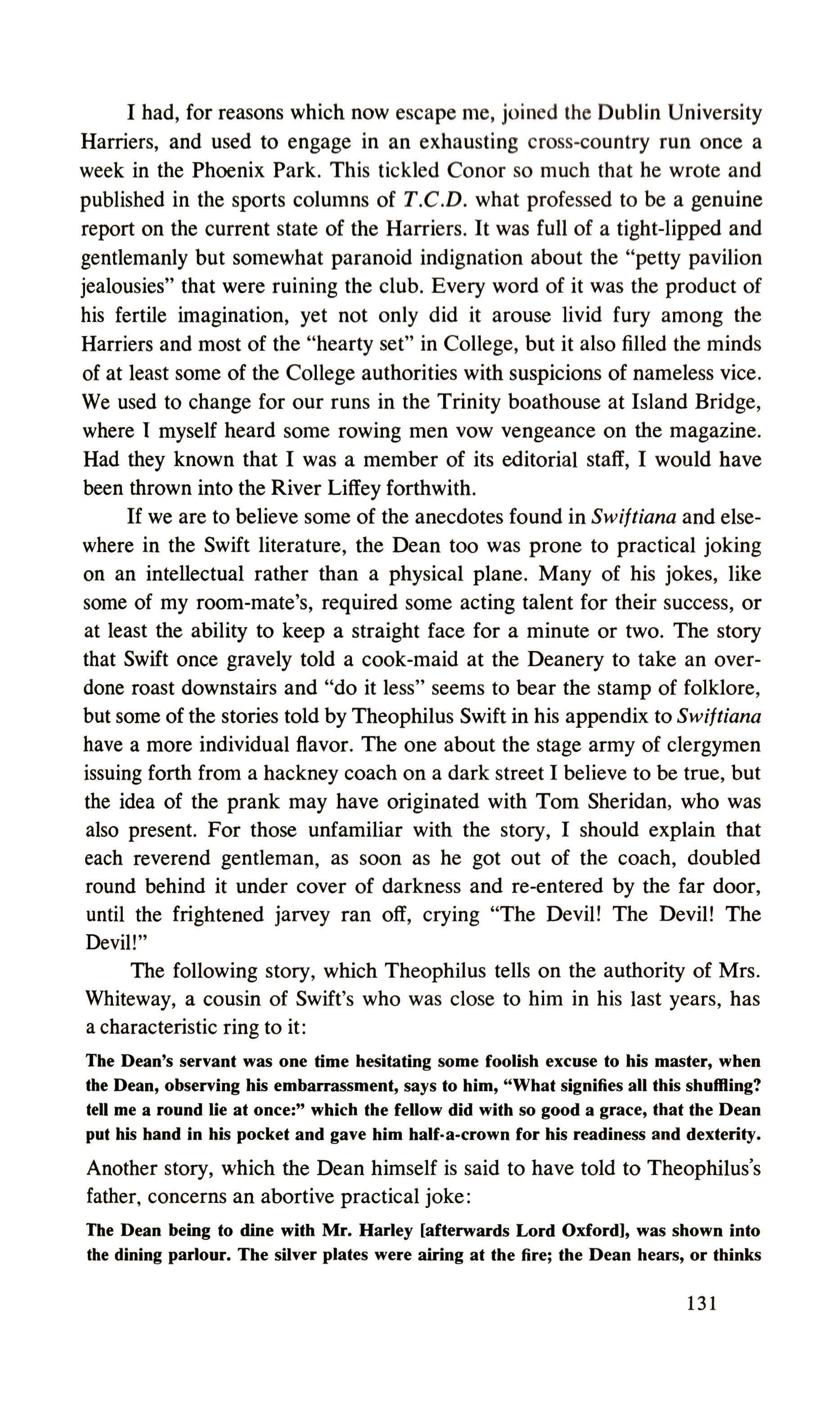
I had, for reasons which now escape me, joined the Dublin University Harriers, and used to engage in an exhausting cross-country run once a week in the Phoenix Park. This tickled Conor so much that he wrote and published in the sports columns of T.e.D. what professed to be a genuine report on the current state of the Harriers. It was full of a tight-lipped and gentlemanly but somewhat paranoid indignation about the "petty pavilion jealousies" that were ruining the club. Every word of it was the product of his fertile imagination, yet not only did it arouse livid fury among the Harriers and most of the "hearty set" in College, but it also filled the minds of at least some of the College authorities with suspicions of nameless vice. We used to change for our runs in the Trinity boathouse at Island Bridge, where I myself heard some rowing men vow vengeance on the magazine. Had they known that I was a member of its editorial staff, I would have been thrown into the River Liffey forthwith.
If we are to believe some of the anecdotes found in Swijtiana and elsewhere in the Swift literature, the Dean too was prone to practical joking on an intellectual rather than a physical plane. Many of his jokes, like some of my room-mate's, required some acting talent for their success, or at least the ability to keep a straight face for a minute or two. The story that Swift once gravely told a cook-maid at the Deanery to take an overdone roast downstairs and "do it less" seems to bear the stamp of folklore, but some of the stories told by Theophilus Swift in his appendix to Swijtiana have a more individual flavor. The one about the stage army of clergymen issuing forth from a hackney coach on a dark street I believe to be true, but the idea of the prank may have originated with Tom Sheridan, who was also present. For those unfamiliar with the story, I should explain that each reverend gentleman, as soon as he got out of the coach, doubled round behind it under cover of darkness and re-entered by the far door, until the frightened jarvey ran off, crying "The Devil! The Devil! The Devil!"
The following story, which Theophilus tells on the authority of Mrs. Whiteway, a cousin of Swift's who was close to him in his last years, has a characteristic ring to it:
The Dean's servant was one time hesitating some foolish excuse to his master, when the Dean, observing his embarrassment, says to him, "What signifies all this shuming? tell me a round lie at once:" which the feUow did with so good a grace, that the Dean put his band in his pocket and gave him half·a-crown for his readiness and dexterity. Another story, which the Dean himself is said to have told to Theophilus's father, concerns an abortive practical joke:
The Dean being to dine with Mr. Harley [afterwards Lord Oxford), was shown into the dining parlour. The silver plates were airing at the fire; the Dean hears, or thinks
131

he hears, Mr. Harley's voice, and ImaKlnea h. Is comlnl Into the room 81 the door opens. At that moment he alfech to s.eal one of the silver plates, and pretends to hide It under his cassock, that Harley ml&ht percelv. him In the act of secreting It. But what was his surprise, when a perfect stranger enten the room! What be affected to do openly, he Is now In lood earnest forced to do covertly; and he continues In torture till Mr. Harley enters; he then unbosom. his the't, and Is forced to make an awkward apology for his folly. He declared to my father, that he never sulfered so mucb anxiety In his life, lest, by any accident, a corner of the plate should discover Itself to the stranger.
A man who could tell a rather humiliating story like that against himself must have possessed a genuine sense of humour.
Of all Swift's literary hoaxes literary in the sense that they employed the written or printed word the most humorous is that of The Bickerstaff Papers. All Swift's most famous prose works, A Tale 0/ a Tub, The Drapier's Letters, Gulliver's Travels, A Modest Proposal, are hoaxes to the extent that they pretend to be something other than the satires that they are. The Bickerstaff Papers too is a satire, but an extremely light-hearted one; Swift cannot regard the abuse that he is satirizing, popular astrology, as a serious intellectual threat. Its pretentions are so specious that a really searching attack on it would give it more dignity than it deserves.
Having predicted in the first of the Papers, under the pseudonym of Isaac Bickerstaff, Esq., that Partridge the almanack maker "will infallibly die upon the 29th of March next, about eleven at night, of a raging fever," Swift goes on in the third paper to give a circumstantial account of Partridge's death, showing "that Mr. Bickerstaff was mistaken almost four hours in his calculation." The series reaches its peak in the fifth paper, which purports to be an account by Partridge himself of the embarrassments caused him by the report of his death. First, the passing-bell tolls, then the undertaker arrives, and then Ned the sexton, who is indignant at Partridge's presuming to be still alive:
Why, it is strange, sir, says he, you should make such a secret of your death to us that are your neighbours; it looks as if you had a design to defraud the chwch of its dues.
Partridge goes on:
I could not stir out of doors for the space of fbi ee months after "Iis, but presendy ODe comes up to me in the street, Mr. Partridge, that coffin you was last buried in I have not yet been paid for: Doctor, cries another dog, how do you think people can live by .IIaking of graves for nothing? next time you die, you may even toO out the beD yourseH
A tombstone would have been erected to him, says Pal tridge, "if I had not used my utmost interest with the vestry;" that body decided by a bare
132
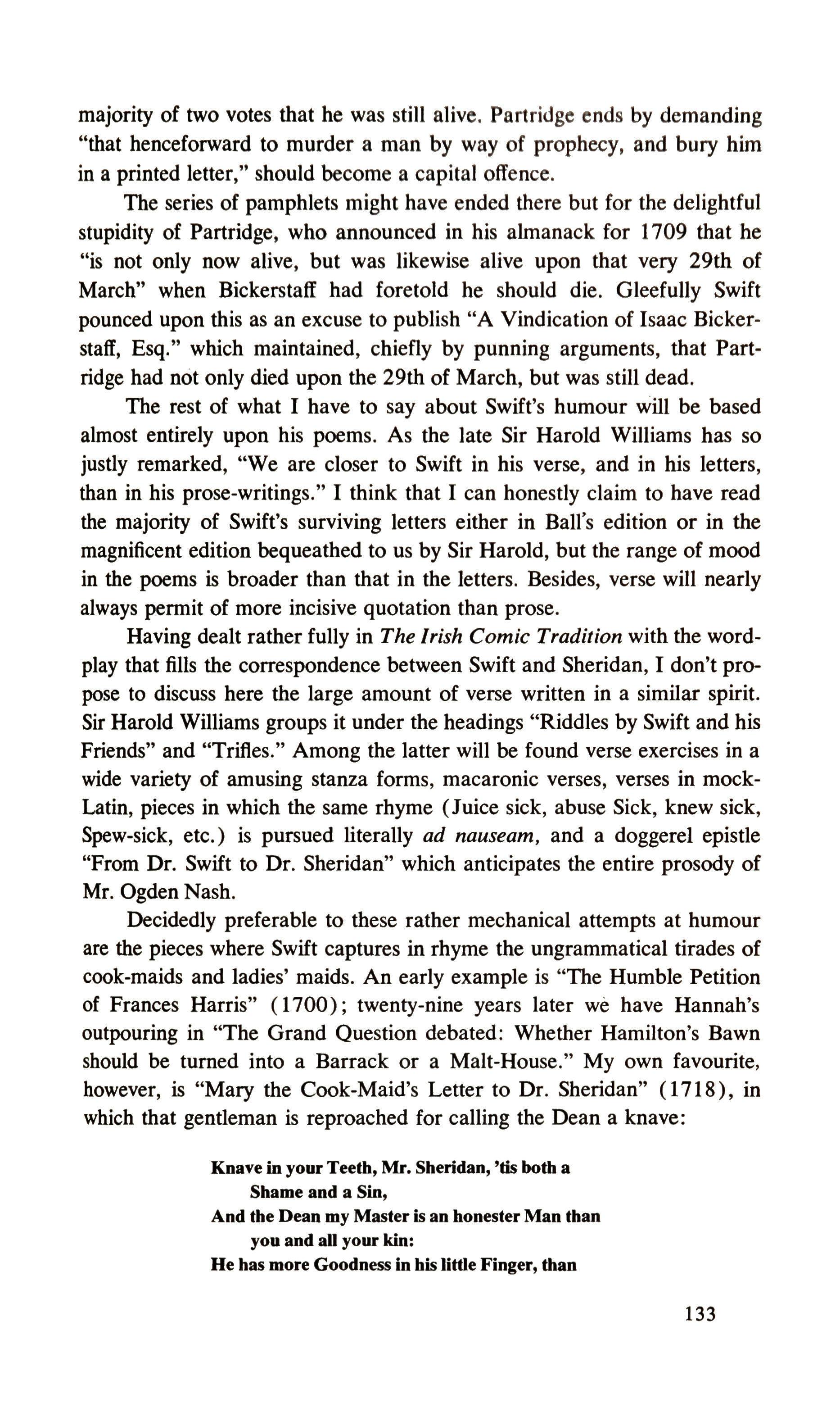
majority of two votes that he was still alive. Partridge ends by demanding "that henceforward to murder a man by way of prophecy, and bury him in a printed letter," should become a capital offence.
The series of pamphlets might have ended there but for the delightful stupidity of Partridge, who announced in his almanack for 1709 that he "is not only now alive, but was likewise alive upon that very 29th of March" when Bickerstaff had foretold he should die. Gleefully Swift pounced upon this as an excuse to publish "A Vindication of Isaac Bickerstaff, Esq." which maintained, chiefly by punning arguments, that Partridge had not only died upon the 29th of March, but was still dead.
The rest of what I have to say about Swift's humour will be based almost entirely upon his poems. As the late Sir Harold Williams has so justly remarked, "We are closer to Swift in his verse, and in his letters, than in his prose-writings." I think that I can honestly claim to have read the majority of Swift's surviving letters either in Ball's edition or in the magnificent edition bequeathed to us by Sir Harold, but the range of mood in the poems is broader than that in the letters. Besides, verse will nearly always perinit of more incisive quotation than prose.
Having dealt rather fully in The Irish Comic Tradition with the wordplay that fills the correspondence between Swift and Sheridan, I don't propose to discuss here the large amount of verse written in a similar spirit. Sir Harold Williams groups it under the headings "Riddles by Swift and his Friends" and "Trifles." Among the latter will be found verse exercises in a wide variety of amusing stanza forms, macaronic verses, verses in mockLatin, pieces in which the same rhyme (Juice sick, abuse Sick, knew sick, Spew-sick, etc.) is pursued literally ad nauseam, and a doggerel epistle "From Dr. Swift to Dr. Sheridan" which anticipates the entire prosody of Mr. Ogden Nash.
Decidedly preferable to these rather mechanical attempts at humour are the pieces where Swift captures in rhyme the ungrammatical tirades of cook-maids and ladies' maids. An early example is "The Humble Petition of Frances Harris" (1700); twenty-nine years later we have Hannah's outpouring in "The Grand Question debated: Whether Hamilton's Bawn should be turned into a Barrack or a Malt-House." My own favourite, however, is "Mary the Cook-Maid's Letter to Dr. Sheridan" (1718), in which that gentleman is reproached for calling the Dean a knave:
Knave in your Teetb, Mr. Sberidan, 'tis botb a Sbame and a Sin, And tbe Dean my Master is an bonester Man tban you and all your kin:
He bas more Goodness in bis little Finger, tban
133

you have In your whole Body, My Muster Is a pursonul,le Mun, and not a spindlesllullk'd hoddy doddy.
And now whereby I find you would fuln make an Excuse, Because nly Master one Day In anger calI'd you Goose. Which, and I am sure I have been his Sefl'ant four Years since October, And he never call'd me worse than Sweet-heart drunk or sober:
Not that I know his Reverence was ever concern'd to my knowledge, Tho' you and your Come-rogues keep him out so late In your Colledge.
For the moment we are convinced that we are listening to Mary herself instead of her employer.
Related to these triumphs of colloquial realism are those poems which bring the Latin classics up to date. "Baucis and Philemon," from Ovid's Metamorphoses, is set in the English Eighteenth Century, so that the cottage of the hospitable old couple is metamorphosed into an Anglican parish church instead of a temple. The speech of Baucis and Philemon, while more grammatical than Mary's, shows the same colloquial ease. The two well-known companion pieces, "A Description of the Morning" and "A Description of a City Shower," rely for their humour on a mockheroic or burlesque contrast between a highly literary "pastoral" style and a sordidly realistic urban content. "A Pastoral Dialogue," which dramatizes the love of Dermot and Sheelah, burlesques in broad style the Eclogues of Virgil. In a rather similar vein is "Apollo Outwitted," a finely turned compliment to Ann Finch, later Countess of Winchilsea, whose poetry Wordsworth justly admired. Apollo attempts to seduce "Ardelia" by bribing her with the gift of poetry.
HE in the old Celestial Cant, Confest bis Flame, and swore by Styx, What e're she would desire, to Grant, But Wise Ardelia knew bis Tricks.
OVID bad walll'd her to beware, Of Stroling God's, wbose usual Trade is, Under pretence of Taking Air, To pick up Sublunary Ladies.
The god is humorously belittled by the comparison with a tinker implicit in "cant" and "stroling" and is then demolished by the use of "to pick up" in exactly its twentieth-century colloquial sense. Like Cassandra, Ardelia obtains her divine gift without returning a quid pro quo, but Apollo in turn
134
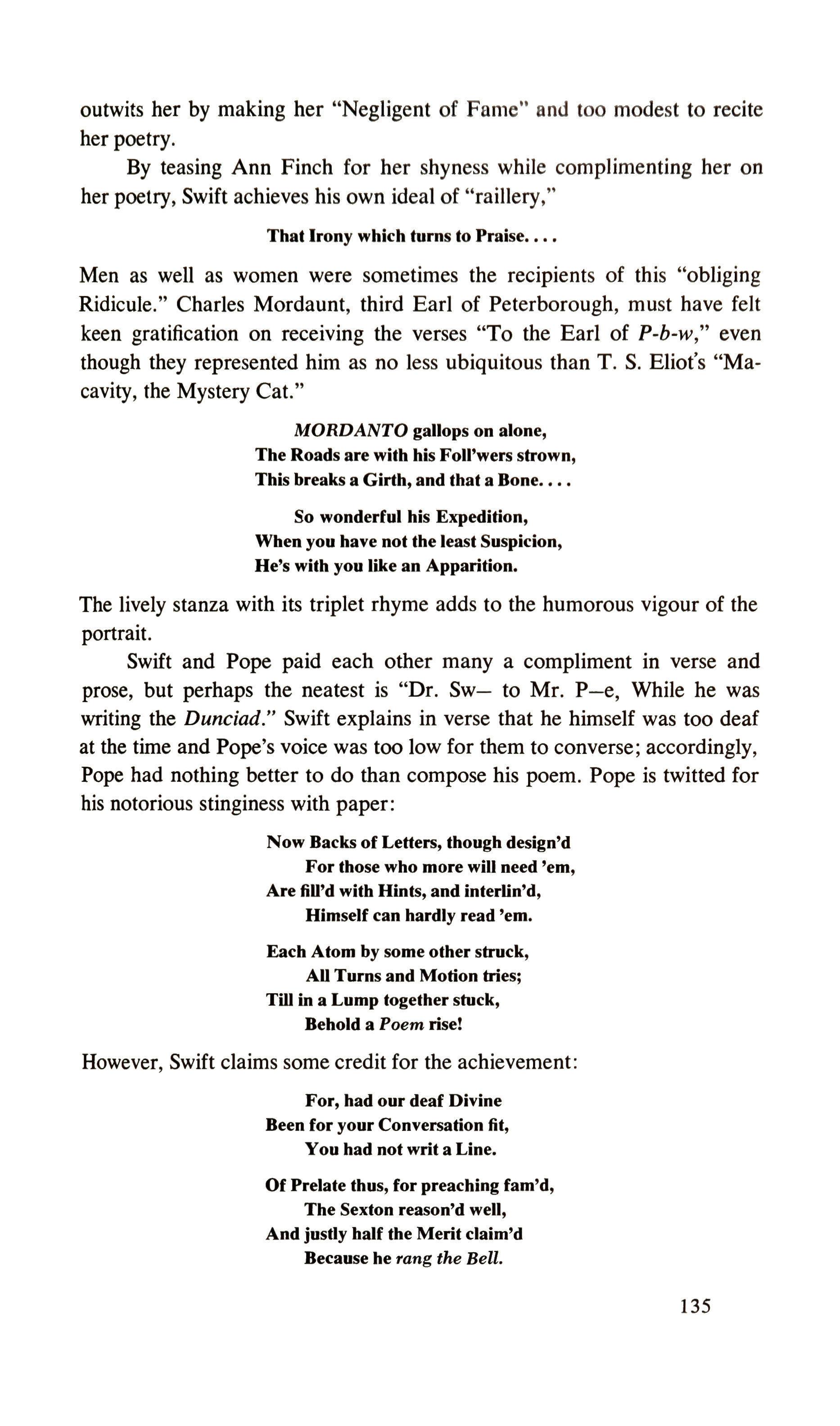
outwits her by making her "Negligent of Fame" and too modest to recite her poetry.
By teasing Ann Finch for her shyness while complimenting her on her poetry, Swift achieves his own ideal of "raillery,"
That Irony which turns to Praise
Men as well as women were sometimes the recipients of this "obliging Ridicule." Charles Mordaunt, third Earl of Peterborough, must have felt keen gratification on receiving the verses "To the Earl of P-b-w," even though they represented him as no less ubiquitous than T. S. Eliot's "Macavity, the Mystery Cat."
MORDANTO gallops on alone, The Roads are with his Foll'wers strown, This breaks a Girth, and that a Bone.•••
So wonderful his Expedition, When you have not the least Suspicion, He's with you like an Apparition.
The lively stanza with its triplet rhyme adds to the humorous vigour of the portrait.
Swift and Pope paid each other many a compliment in verse and prose, but perhaps the neatest is "Dr. Sw to Mr. P e, While he was writing the Dunciad." Swift explains in verse that he himself was too deaf at the time and Pope's voice was too low for them to converse; accordingly, Pope had nothing better to do than compose his poem. Pope is twitted for his notorious stinginess with paper:
Now Backs of Letters, though design'd For those who more will need 'em, Are fiU'd with Hints, and interlin'd, Himself can hardly read 'em.
Each Atom by some other struck, AU Turns and Motion tries; Till in a Lump together stuck, Behold a Poem rise!
However, Swift claims some credit for the achievement:
For, had our deaf Divine
Been for your Conversation fit, You had not writ a Line.
Of Prelate thus, for preaching fam'd, The Sexton reason'd well, And justly half the Merit claim'd Because he rang the Bell.
135
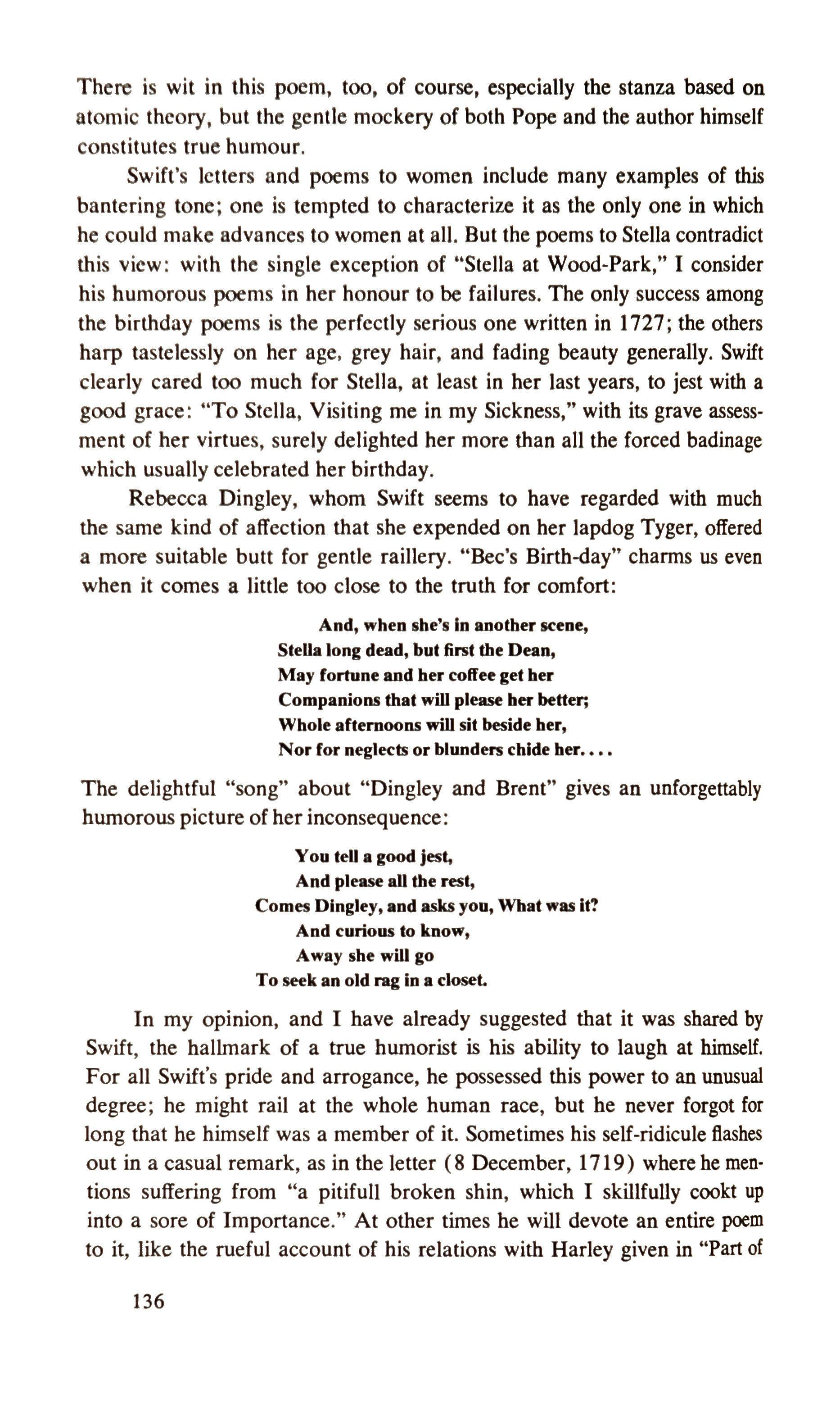
There is wit in this poem, too, of course, especially the stanza based on atomic theory, but the gentle mockery of both Pope and the author himself constitutes true humour.
Swift's letters and poems to women include many examples of this bantering tone; one is tempted to characterize it as the only one in which he could make advances to women at all. But the poems to Stella contradict this view: with the single exception of "Stella at Wood-Park," I consider his humorous poems in her honour to be failures. The only success among the birthday poems is the perfectly serious one written in 1727; the others harp tastelessly on her age, grey hair, and fading beauty generally. Swift clearly cared too much for Stella, at least in her last years, to jest with a good grace: "To Stella, Visiting me in my Sickness," with its grave assessment of her virtues, surely delighted her more than all the forced badinage which usually celebrated her birthday.
Rebecca Dingley, whom Swift seems to have regarded with much the same kind of affection that she expended on her lapdog Tyger, offered a more suitable butt for gentle raillery. "Bee's Birth-day" charms us even when it comes a little too close to the truth for comfort:
And, when she's In another scene, SteDa long dead, but first the Dean, May fo. tune and her coffee get her Companions that will please her better; Whole afternoons will sit beside her, Nor for neglects or blunders chide her
The delightful "song" about "Dingley and Brent" gives an unforgettably humorous picture of her inconsequence:
You teD a good jest, And please all the lest, Comes Dingley, and asks you, What was it? And curious to know, Away she will go
To seek an old rag In a closet,
In my opinion, and I have already suggested that it was shared by Swift, the hallmark of a true humorist is his ability to laugh at himself. For all Swift's pride and arrogance, he possessed this power to an unusual degree; he might rail at the whole human race, but he never forgot for long that he himself was a member of it. Sometimes his self-ridicule flashes out in a casual remark, as in the letter (8 December, 1719) where he mentions suffering from "a pitifull broken shin, which I skillfully cookt up into a sore of Importance." At other times he will devote an entire poem to it, like the rueful account of his relations with Harley given in "Part of
136
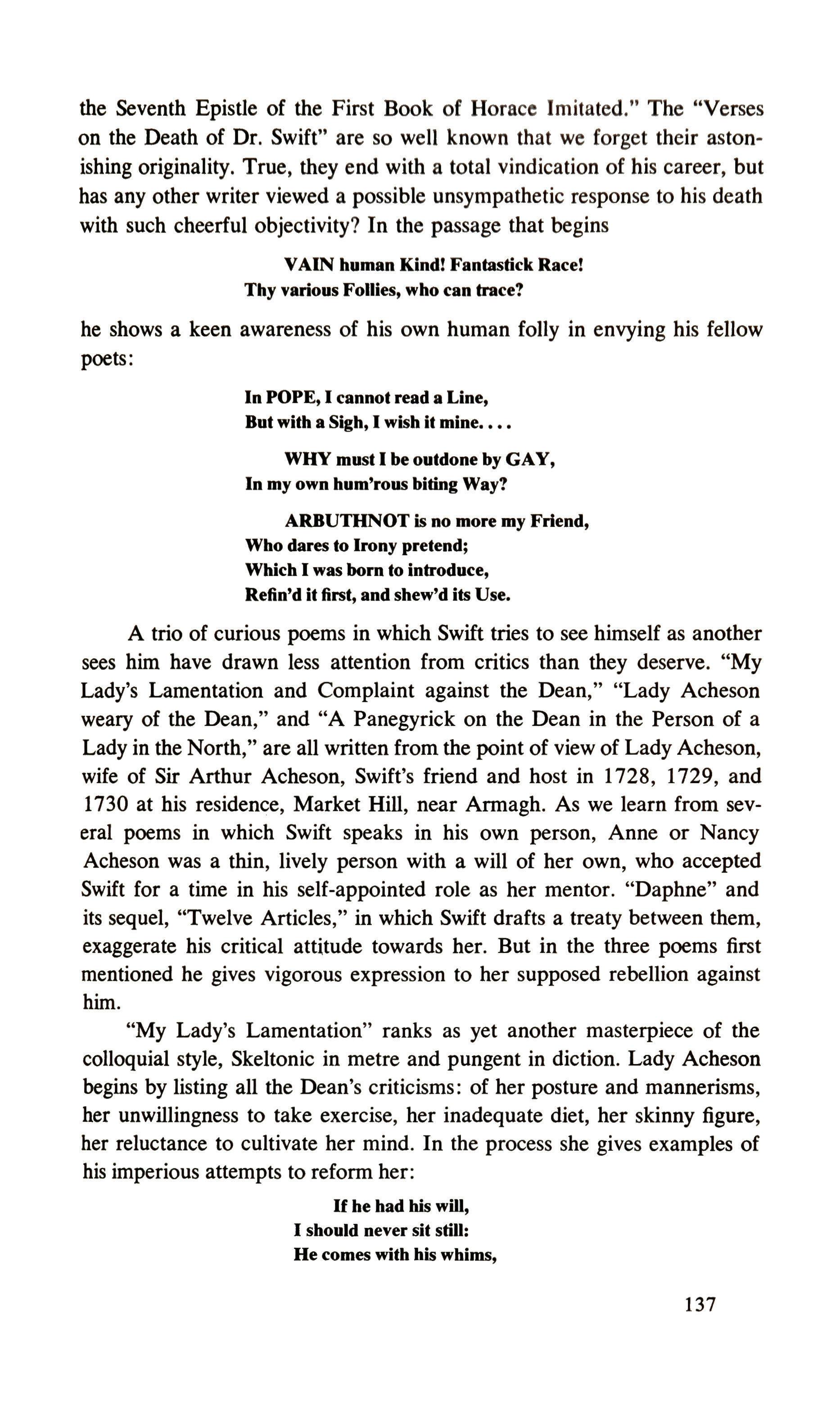
the Seventh Epistle of the First Book of Horace Imitated." The "Verses on the Death of Dr. Swift" are so well known that we forget their astonishing originality. True, they end with a total vindication of his career, but has any other writer viewed a possible unsympathetic response to his death with such cheerful objectivity? In the passage that begins
VAIN human Kind! Fantastick Race! Thy various Follies, who can trace?
he shows a keen awareness of his own human folly in envying his fellow poets:
In POPE, I cannot read a Line, But with a Sigh, I wish it mine
WHY must I be outdone by GAY, In my own hum'rous biting Way?
ARBUTHNOT is no more my Friend, Who dares to Irony pretend; Which I was bom to introduce, Refin'd it first, and shew'd its Use.
A trio of curious poems in which Swift tries to see himself as another sees him have drawn less attention from critics than they deserve. "My Lady's Lamentation and Complaint against the Dean," "Lady Acheson weary of the Dean," and "A Panegyrick on the Dean in the Person of a Lady in the North," are all written from the point of view of Lady Acheson, wife of Sir Arthur Acheson, Swift's friend and host in 1728, 1729, and 1730 at his residence, Market Hill, near Armagh, As we learn from several poems in which Swift speaks in his own person, Anne or Nancy Acheson was a thin, lively person with a will of her own, who accepted Swift for a time in his self-appointed role as her mentor. "Daphne" and its sequel, "Twelve Articles," in which Swift drafts a treaty between them, exaggerate his critical attitude towards her. But in the three poems first mentioned he gives vigorous expression to her supposed rebellion against him.
"My Lady's Lamentation" ranks as yet another masterpiece of the colloquial style, Skeltonic in metre and pungent in diction. Lady Acheson begins by listing all the Dean's criticisms: of her posture and mannerisms, her unwillingness to take exercise, her inadequate diet, her skinny figure, her reluctance to cultivate her mind. In the process she gives examples of his imperious attempts to reform her:
If he had his will, I should never sit still: He comes with his whims,
137

I must move my limbs
By the worst of all Squires Thro' bogs and thro' brien, Where a cow would be Itortled, I'm In spite of my heart led: And, say what I will, Houl'd up every hili; 'TIll, doggled and tatter'd, My spirit's quite shatter'd, I return home at night, And fast out of spite: For I'd rather be dead, Than It e'er should be said I was better for him, In stomach or 11mb.
But when she has been browbeaten into studying Milton, what is the Dean up to?
He's all the day saunt'ring, With labourers bant'ring, Among his colleagues, A parcel of Teagues Hail fellow, well met, AU di. ty and wet: Find out, if you can, Whose master, whose man; Who makes the best fig"re, The Dean or the digger; And which is the best At cracking a jest. How proudly he talks Of zigzacks and walks; And all the day raves Of cradles and caves A fine occupation For one of his station! A hole where a rabbit Would scorn to inhabit, Dug out in an hour, He calls it a bow'r.
In "Lady Acheson weary of the Dean," she suggests that Swift more or less invited himself to Market Hill, arrived three days before he was expected, and refuses to budge:
After a Week, a Month, a Quarter, And Day succeeding after Day, Says not a Word of his Departure Tho' not a Soul would have him stay.
138
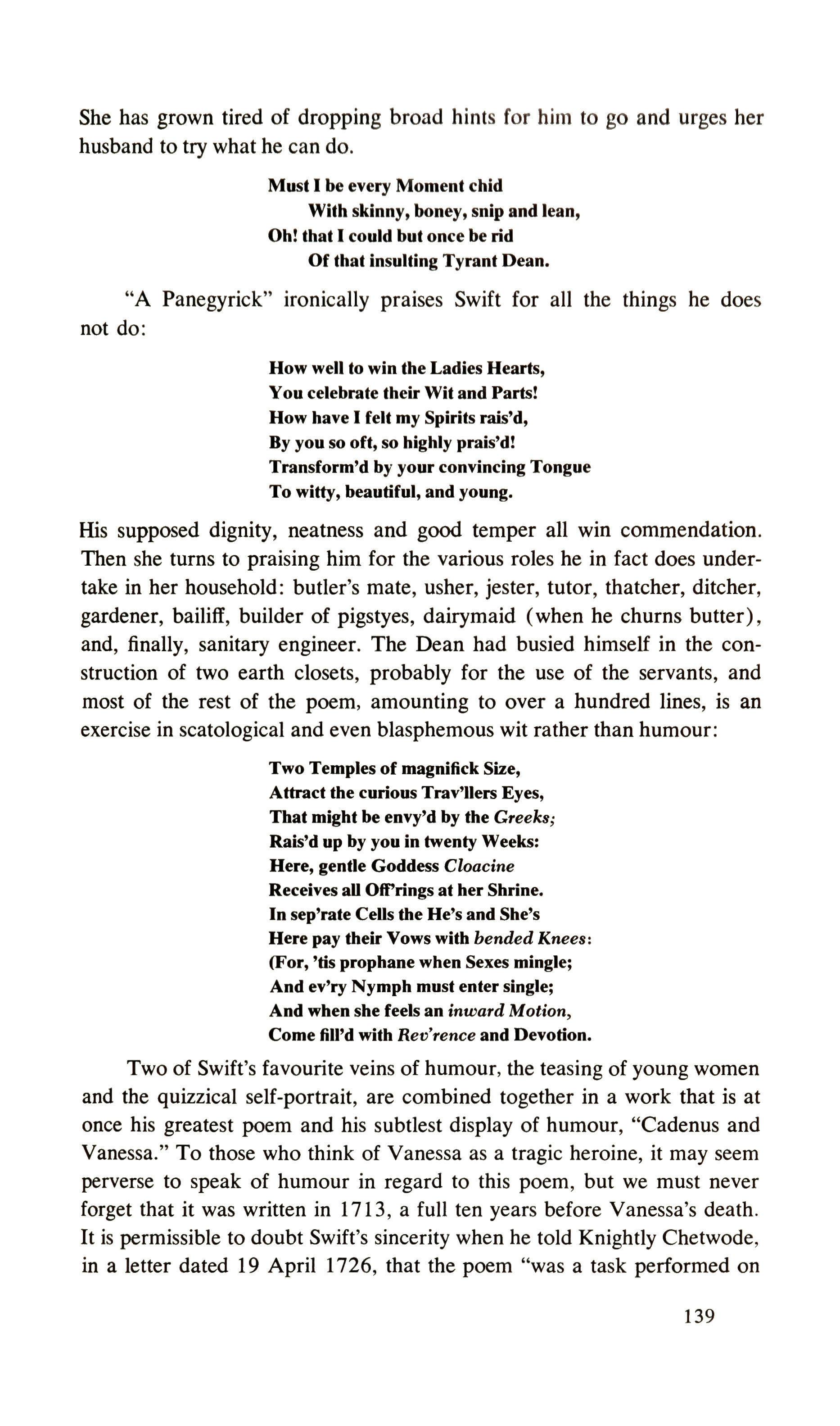
She has grown tired of dropping broad hints for him to go and urges her husband to try what he can do.
Must I be every Moment chid
With skinny, boney, snip and lean, Oh! that I could but once be rid Of that insulting Tyrant Dean.
"A Panegyrick" ironically praises Swift for all the things he does not do:
How well to win the Ladies Hearts, You celebrate their Wit and Parts!
How have I felt my Spirits rais'd, By you so oft, so highly prais'd! Transform'd by your convincing Tongue To witty, beautiful, and young.
His supposed dignity, neatness and good temper all win commendation. Then she turns to praising him for the various roles he in fact does undertake in her household: butler's mate, usher, jester, tutor, thatcher, ditcher, gardener, bailiff, builder of pigstyes, dairymaid (when he churns butter), and, finally, sanitary engineer. The Dean had busied himself in the construction of two earth closets, probably for the use of the servants, and most of the rest of the poem, amounting to over a hundred lines, is an exercise in scatological and even blasphemous wit rather than humour:
Two Temples of magnifick Size, Attract the curious Trav'llers Eyes, That might be envy'd by the Creeks; Rais'd up by you in twenty Weeks: Here, gentle Goddess Cloacine Receives all Off'rings at her Shrine. In sep'rate CeUs the He's and She's Here pay their Vows with bended Knees: (For, 'tis prophane when Sexes mingle; And ev'ry Nymph must enter single; And when she feels an inward Motion, Come fill'd with Rev'rence and Devotion.
Two of Swift's favourite veins of humour, the teasing of young women and the quizzical self-portrait, are combined together in a work that is at once his greatest poem and his subtlest display of humour, "Cadenus and Vanessa." To those who think of Vanessa as a tragic heroine, it may seem perverse to speak of humour in regard to this poem, but we must never forget that it was written in 1713, a full ten years before Vanessa's death. It is permissible to doubt Swift's sincerity when he told Knightly Chetwode, in a letter dated 19 April 1726, that the poem "was a task performed on
139

a frolic among some ladies" or described it in the same letter as "a private humorsome thing." ("Humorsome" presumably means "whimsical" rather than "humorous.") What cannot be doubted is the evidence offered by the poem itself. We can distinguish three separate tones in "Cadenus and Vanessa": the satirical, the complimentary, the humorous.
All the material dealing with the trial presided over by Venus at the beginning and end of the poem (11. 1·125 and 828·889 in Williams's edition) is of course satirical in a very general way; the satire becomes more realistic and particular, in the vein of The Rape of the Lock, when the "fashionable Fops" and "glitt'ring Dames" come to make Vanessa's acquaintance (11. 316·443).
A tone of elaborate compliment permeates the account of Vanessa's birth, of the gifts bestowed upon her, and of the doom pronounced by Pallas, who has been hoodwinked into thinking her a boy (11. 126·315).
The entire remainder of the poem (11. 444-827), beginning with Cupid's first abortive attempts on Vanessa's heart, is predominantly humorous in tone. If it were presented as drama rather than through a narrative that occasionally uses dramatic technique, we should at once recognize it as a charming scene of not quite sentimental comedy. For the basic situation is comic: a young, attractive girl avows her love for a man old enough to be her father. Othello to the contrary notwithstanding, the common-sense normative view traditional in comedy must consider this to be as ludicrously inappropriate as the commoner situation in which the old man confesses his love for the young girl. A further comic twist is added by the man's Joseph-like unwillingness to accept his unparalleled good fortune.
Swift surely perceived the absurdity of the situation as clearly as do we his readers. In fact, I suspect that the whole purpose of this part of the poem, and perhaps of "Cadenus and Vanessa" as a whole, was to open Vanessa's eyes gently but firmly to the absurdity and impossibility of the situation. We can't, of course, be sure that everything happened exactly as the poem says it did. Vanessa may not have reached the point of putting her feeling for Swift into words; he may have been over-dramatizing the situation in order to prevent her from taking an irrevocable step. Certainly he exaggerates his own infirmity, though not his age, with a view to heightening the ludicrous aspect of things:
VaneB8a, not in Years a Score, Dreams of a Gown of forty-four; Imaginary Charnls can find, In Eyes with Reading almost blind; Cadenus now no more appears
140
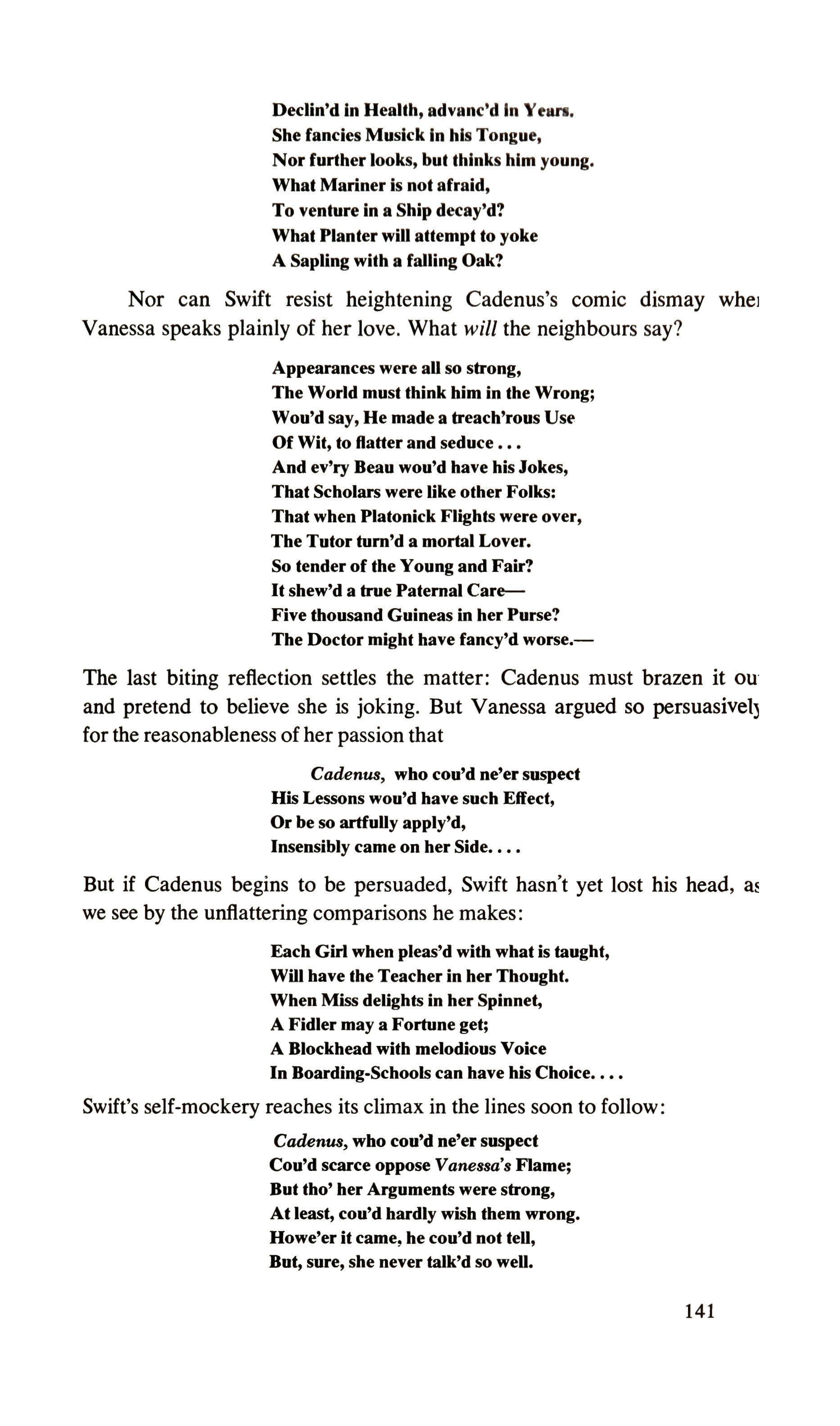
Dec:lin'd In Health, advanc'd In l'tlU'l. She fancies Musick In his Tongue, Nor further looks, but thinks him young. What Mariner is not afraid, To venture in a Ship decay'd? What Planter wiD attempt to yoke A Sapling with a falling Oak?
Nor can Swift resist heightening Cadenus's comic dismay whei Vanessa speaks plainly of her love. What will the neighbours say?
Appearances were aD so strong, The World must think him in the Wrong; Wou'd say, He made a treach'rous Use Of Wit, to flatter and seduce
And ev'ry Beau wou'd have his Jokes, That Scholars were like other Folks:
That when Platonick Flights were over, The Tutor turn'd a mortal Lover. So tender of the Young and Fair? It shew'd a true Paternal Care-« Five thousand Guineas in her Purse? The Doctor might have fancy'd worse.,-
The last biting reflection settles the matter: Cadenus must brazen it ou and pretend to believe she is joking. But Vanessa argued so persuasivelj for the reasonableness of her passion that
Cadenus, who cou'd ne'er suspect His Lessons wou'd have such Effect, Or be so artfuDy apply'd, Insensibly came on her Side
But if Cadenus begins to be persuaded, Swift hasn't yet lost his head, as we see by the unflattering comparisons he makes:
Each Girl when pleas'd with what is taught, Will have the Teacher in her Thought. When Miss delights in her Spinnet, A Fidler maya Fortune get; A Blockhead with melodious Voice In Boarding-Schools can have his Choice
Swift's self-mockery reaches its climax in the lines soon to follow:
Cadenus, who cou'd ne'er suspect Cou'd scarce oppose Vanessa's Flame; But tho' her Arguments were strong, At least, cou'd hardly wish them wrong. Howe'er it came, he cou'd not teD, But, sure, she never talk'd so weD.
141

Ills Pride began to Interpose, Preferr'd befnre a Crowd of Beaux, So brlgllt a Nynlph to come unsought, Such Wonder by his Merit wrought; 'Tis Merit must with her prel'all, He never knew her Judgment fail
Although he refuses love, he promises her instead "Gratitude, Respect, Esteem." Vanessa, however, dismisses all this loftiness as romantic rubbish. Their roles are now reversed: she will become the tutor and he the pupil; the lesson. presumably, is that of love:
Wherein his Genius was below The Skill of el"ry common Beau; Who, tho' he cannot spell, Is wise Enough to read a Lady's Eyes; And will each accidental Glance Interpret for a kind Advance, Swift had first joked about "Beau-spelling (tru tel deth)" in "Verses Wrote in a Lady's Ivory Table-Book" back in 1698. What a humiliation it must have been to find an area of experience in which he was the Beau's inferior! The little comedy ends with ten lines (818-827) which are no ending at all, since Swift refuses to tell us whether Cadenus won Vanessa over to his platonic view, or whether she won him over to a more serious passion. Accordingly, the poem returns to the Court of Venus, where the goddess gives her verdict for the women against the men, and goes on to make a speech which leaves us in no doubt of the outcome between Cadenus and Vanessa:
"She was at Lord knows what Expence, "To fOIII. a Nymph of Wit and Sense; "A Model for her Sex design'd, "Who never cou'd one Lol'er find. "She saw her Favour was misplac'd; "The Fellows had a wretched Taste
Cadenus, for all his supposed wisdom, is lumped with the rest of the fellows, "senseless, stupid Race." Thus the demands of satire, compliment and humour are satisfied at once in a brilliant ending. Men are satirized for being unworthy of Vanessa, while she is complimented for being superior to them; meanwhile the ruefully humorous truth that she can never find happiness with Cadenus is once again being underlined. And yet, and yet the gentleman doth protest too much, methinks. "Cadenus and Vanessa" is, after all, the longest and most artful indeed, the most artistic of Swift's poems. Can we not detect in it the humorous
142
self-knowledge that Vanessa's feeling has fluttered Swift too much for hir to be willing or able to let her go? Out of this comedy came her tragedy. This brief examination of Swift's humour will perhaps enable us t put a new construction on that oft-quoted letter to Pope (29 Septembei 1725). Swift says, you remember, "I have ever hated all Nations prefer sions and Communityes and all my love is towards individualls Nov while it cannot be denied that individuals often felt the lash of his satire we must admit that nations, professions and communities were by far il most frequent victims. His humour, on the other hand, was addressed t individuals whom he loved, admired, or, at the very least, liked. He offere them an invitation to laugh with him, either at themselves or at himselfor, most often, at both simultaneously. This implied his possession of a insight into himself that might seem a positive handicap to the Juvenalia satirist, for it is surely much easier to wax indignant with others if on ignores one's own faults. Swift's humour, by and large, shows him obeyin Christ's admonition to "first cast out the beam out of thine own eye." H may have been not only a gentler humorist than is popularly supposec but also a better Christian.
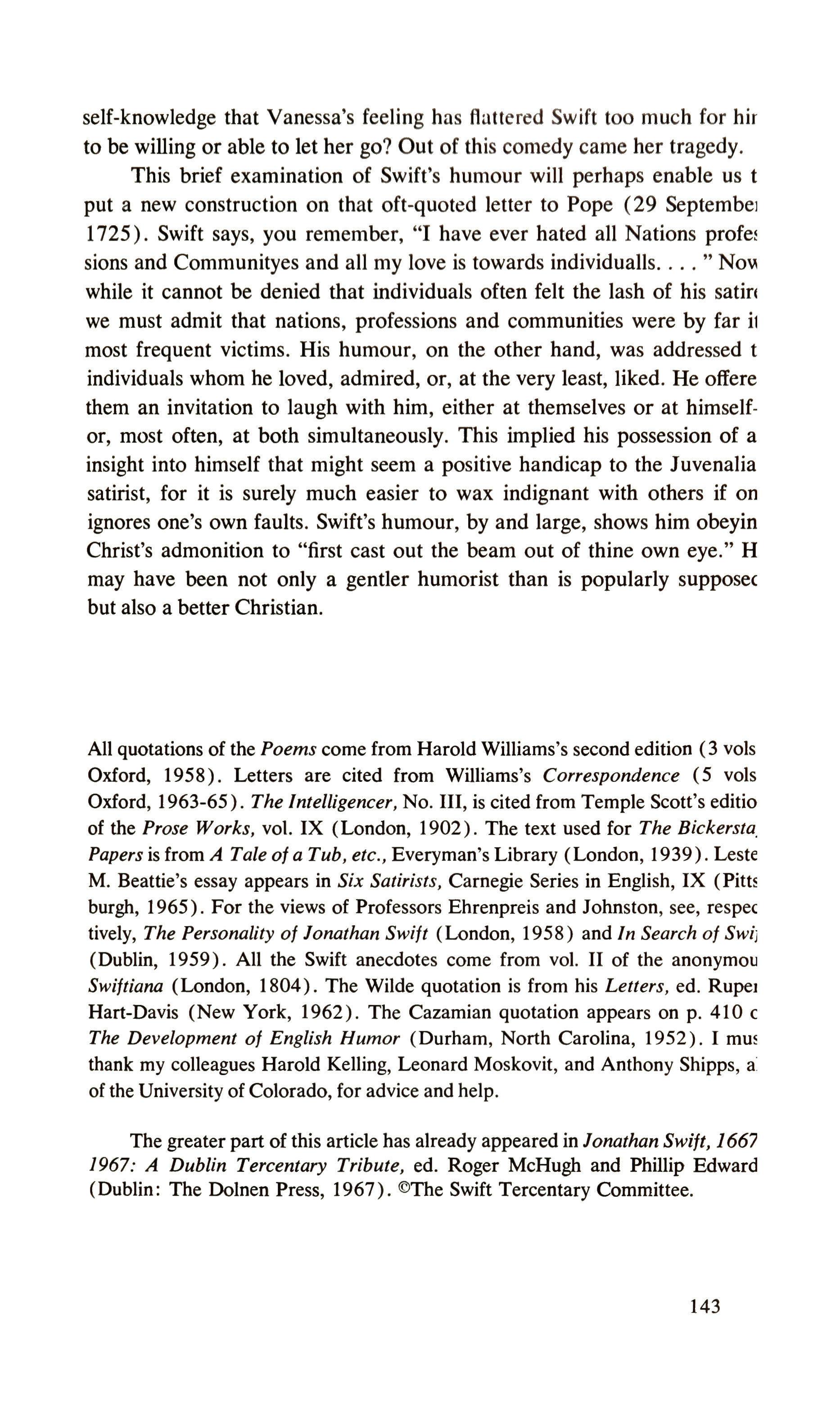
All quotations of the Poems come from Harold Williams's second edition (3 vols Oxford, 1958). Letters are cited from Williams's Correspondence (5 vols Oxford, 1963-65). The Intelligencer, No. III, is cited from Temple Scott's editio of the Prose Works, vol. IX (London, 1902). The text used for The Bickersta Papers is from A Tale of a Tub, etc., Everyman's Library (London, 1939). Leste M. Beattie's essay appears in Six Satirists, Carnegie Series in English, IX (Pitts burgh, 1965). For the views of Professors Ehrenpreis and Johnston, see, respec tively, The Personality of Jonathan Swift (London, 1958) and In Search of Swi; (Dublin, 1959). All the Swift anecdotes come from vol. II of the anonymou Swiitiana (London, 1804). The Wilde quotation is from his Letters, ed. Rupei Hart-Davis (New York, 1962). The Cazamian quotation appears on p. 410 c The Development of English Humor (Durham, North Carolina, 1952). I mU5 thank my colleagues Harold Kelling, Leonard Moskovit, and Anthony Shipps, a of the University of Colorado, for advice and help.
The greater part of this article has already appeared in Jonathan Swift, 1667 1967: A Dublin Tercentary Tribute, ed. Roger McHugh and Phillip Edward (Dublin: The Dolnen Press, 1967). ©The Swift Tercentary Committee.
143
_OSlO
Driving East, and I begin to lose the string quartet put out by University Radio WSUI; those grave clear notes, making a Lithuania of these black Mid-Western fields, must now compete with blurred upswelling of sound, tumorous commercial heavings, as saws
sobbing into the trunks of trees, women swaying packed with tobacco, creaming
all the sparkling parks their world offers. The beams the tall transmitter spits
so strongly out near home begin to falter now, cowards of distance, and the rich
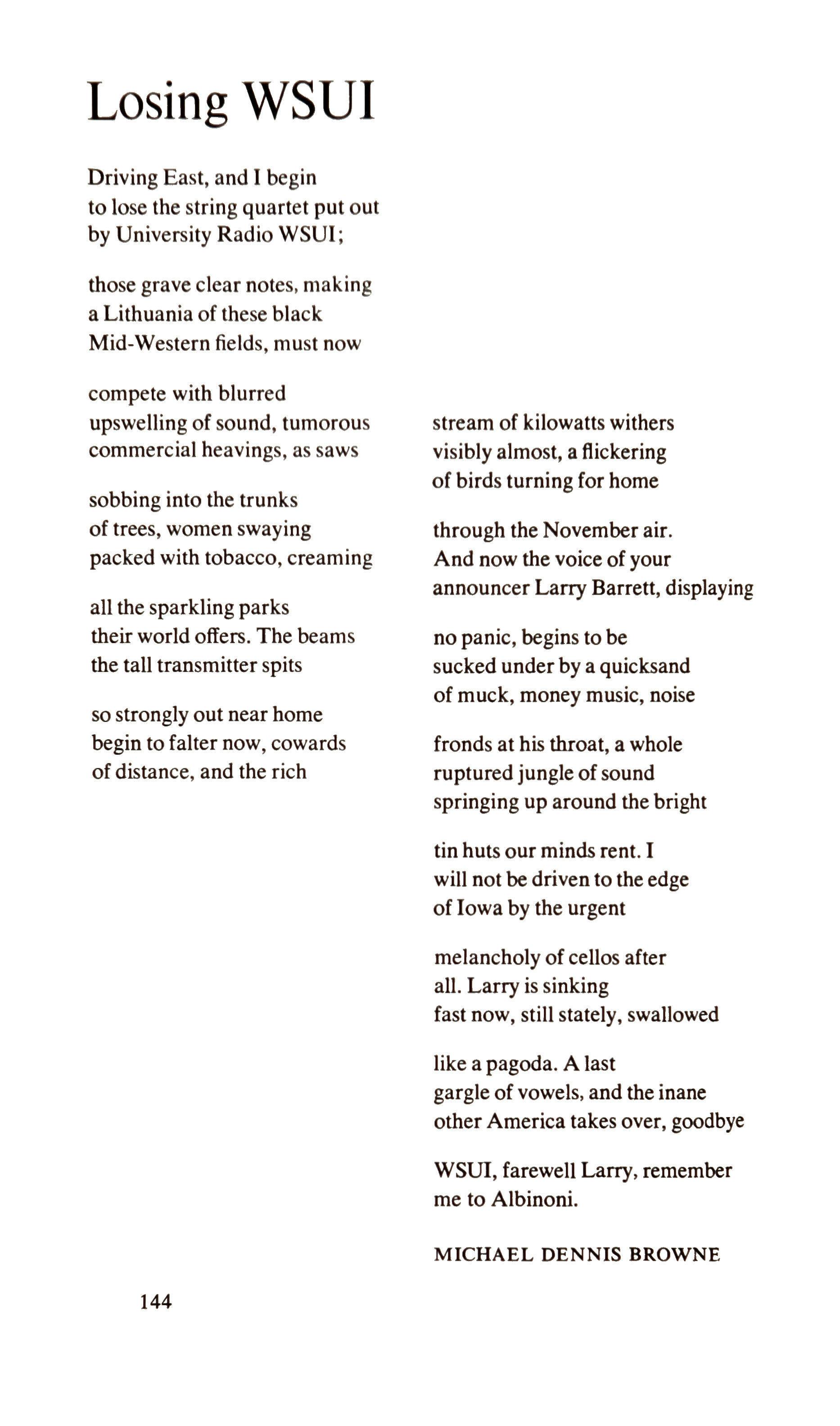
stream of kilowatts withers visibly almost, a flickering of birds turning for home
through the November air. And now the voice of your announcer Larry Barrett, displaying
no panic, begins to be sucked under by a quicksand of muck, money music, noise fronds at his throat, a whole rupturedjungle of sound springing up around the bright tin huts our minds rent. I will not be driven to the edge of Iowa by the urgent melancholy of cellos after all. Larry is sinking fast now, still stately, swallowed like a pagoda. A last gargle of vowels, and the inane other America takes over, goodbye
WSUI,farewellLarry,reDleDlber me to Albinoni.
MICHAEL DENNIS BROWNE
144

The series of marked men who appear before us as the heroes of Kafka's fictions have one significant feature in common: they engage in struggles whose meaning they are convinced they understand but the terms of which they wholly mistake. The problem of each of the narratives, then, and what makes them distinctively modern, is the necessity to define a form for the confrontations which take place; and it is the structure of these attempts at form, the rules, as it were, that emerge, which must be taken to constitute their ideological basis.
What makes the game interesting is that the marked man demands Justice. Kafka has not created the parable of the modern state; rather he has encountered one of its dilemmas. Sophocles, in his final play, dealt with the same theme; but he could still have a protagonist of the greatness of Oedipus, and he could still believe that there was a value in suffering. Kafka, with, if nothing else, Shakespeare and the ambiguous city of Prague standing between himself and Sophocles, could no longer assume the greatness of man or even the dignity of pain. Joseph K. denouncing the Court is a new and frighteningly ironic paradigm.
K. is destroyed because he will not settle for less than Justice. But Kafka has treated this as high comedy. Kafka's heroes generally are guilty. The crime of Joseph K. in The Trial is that he is vain, exploitive, petty, ill-
TriQuarterly 14:;
•
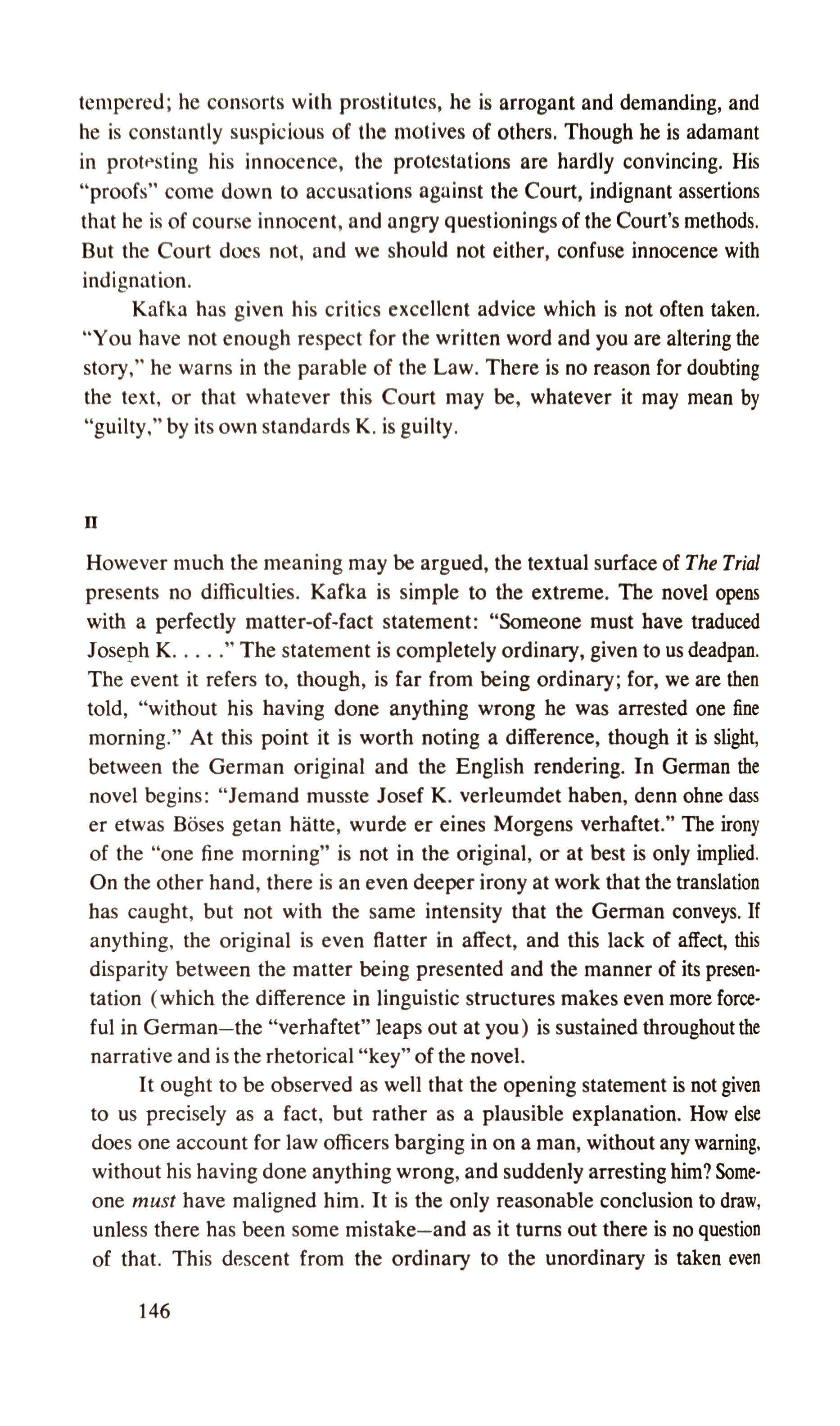
tempered; he consorts with prostitutes, he is arrogant and demanding, and he is constantly suspicious of tile motives of others. Though he is adamant in prot-sting his innocence, the protestations are hardly convincing. His "proofs" come down to accusations against the Court, indignant assertions that he is of course innocent, and angry questionings of the Court's methods. But the Court does not, and we should not either, confuse innocence with indignation.
Kafka has given his critics excellent advice which is not often taken. "You have not enough respect for the written word and you are altering the story," he warns in the parable of the Law. There is no reason for doubting the text, or that whatever this Court may be, whatever it may mean by "guilty," by its own standards K. is guilty. n
However much the meaning may be argued, the textual surface of The Trial presents no difficulties. Kafka is simple to the extreme. The novel opens with a perfectly matter-of-fact statement: "Someone must have traduced Joseph K The statement is completely ordinary, given to us deadpan. The event it refers to, though, is far from being ordinary; for, we are then told, "without his having done anything wrong he was arrested one fine morning." At this point it is worth noting a difference, though it is slight, between the German original and the English rendering. In German the novel begins: "Jemand musste Josef K. verleumdet haben, denn ohne dass er etwas Boses getan hatte, wurde er eines Morgens verhaftet." The irony of the "one fine morning" is not in the original, or at best is only implied, On the other hand, there is an even deeper irony at work that the translation has caught, but not with the same intensity that the German conveys. If anything, the original is even flatter in affect, and this lack of affect, this disparity between the matter being presented and the manner of its presentation (which the difference in linguistic structures makes even more forceful in German the "verhaftet" leaps out at you) is sustained throughout the narrative and is the rhetorical "key" of the novel. It ought to be observed as well that the opening statement is not given to us precisely as a fact, but rather as a plausible explanation. How else does one account for law officers barging in on a man, without any warning. without his having done anything wrong, and suddenly arresting him? Someone must have maligned him. It is the only reasonable conclusion to draw, unless there has been some mistake and as it turns out there is no question of that. This descent from the ordinary to the unordinary is taken even
146

further. K. is under arrest, and yet what happens to him after all? He is prevented from having his breakfast in bed and the food is eaten by one of the warders. Despite the ceremonial formality of the arrest, K.'s freedom is hardly impinged upon. It is assumed, in fact, that he will go to work and continue his normal life. Arrest is one thing, freedom (or lack of it) something else; as the fact that K. is guilty has nothing to do with the commission of crimes. Allowing him breakfast is out of the question, but arrest is merely arrest a procedure, a formality, something that he must be duly notified of in a proper official way.
The plunge into mystery is tinged with comedy because it never loses its quality of the commonplace. Tremendous significance is attached to the minutest trivia, giving to the incidents depicted a compulsive and ritualistic aspect that plays up the disparity between what they are and what is being made of them. Actions become absurd, obsessive; everything must be observed and reported.
"He says Anna is to bring him his breakfast." A short guffaw from the next room came in answer; and it rather sounded as if several people had joined in. Although the strange man could not have Ieamed anything from it that he did not know already, he now said to K., as if passing on a statement: "It can't be done." "This is news indeed," cried K., springing out of bed (Modern Library edition, p, 4).
This picture of a man caught in bed while agents of the law parade officiously about is comic enough in itself. And K. does not yet know that he has been arrested, though we the readers do. At this point the narrative style, the warder's deportment, the details of his dress tend to prevent us from taking the matter too seriously, and the gap between what we know and what K. knows is more ludicrous than anything else. But Kafka does not prolong this easy effect. K. is quickly dressed, and the comedy descends into a lower key.
"I must see what people these are next door, and how Frau Grubach can account to me for such behavior." Yet it occurred to him at once that he should not have said this aloud and that by doing so he had in a way admitted the stranger's right to superintend his actions; still, that did not seem important to him at the moment. The stranger, however, took his words in some such sense, for he asked: "Hadn't you better stay here?" (4-5).
The absurdity preserves the comicality of the scene, but another note has been sounded. K. somehow divines that his protests are in a way damning, and are undercutting the detached superiority that he has felt. This perfectly ordinary response is implicating him in some very much deeper way. And the warder himself seems to pick this up. The action has taken on a significance far beyond what had appeared externally. Immediately, though, we
147
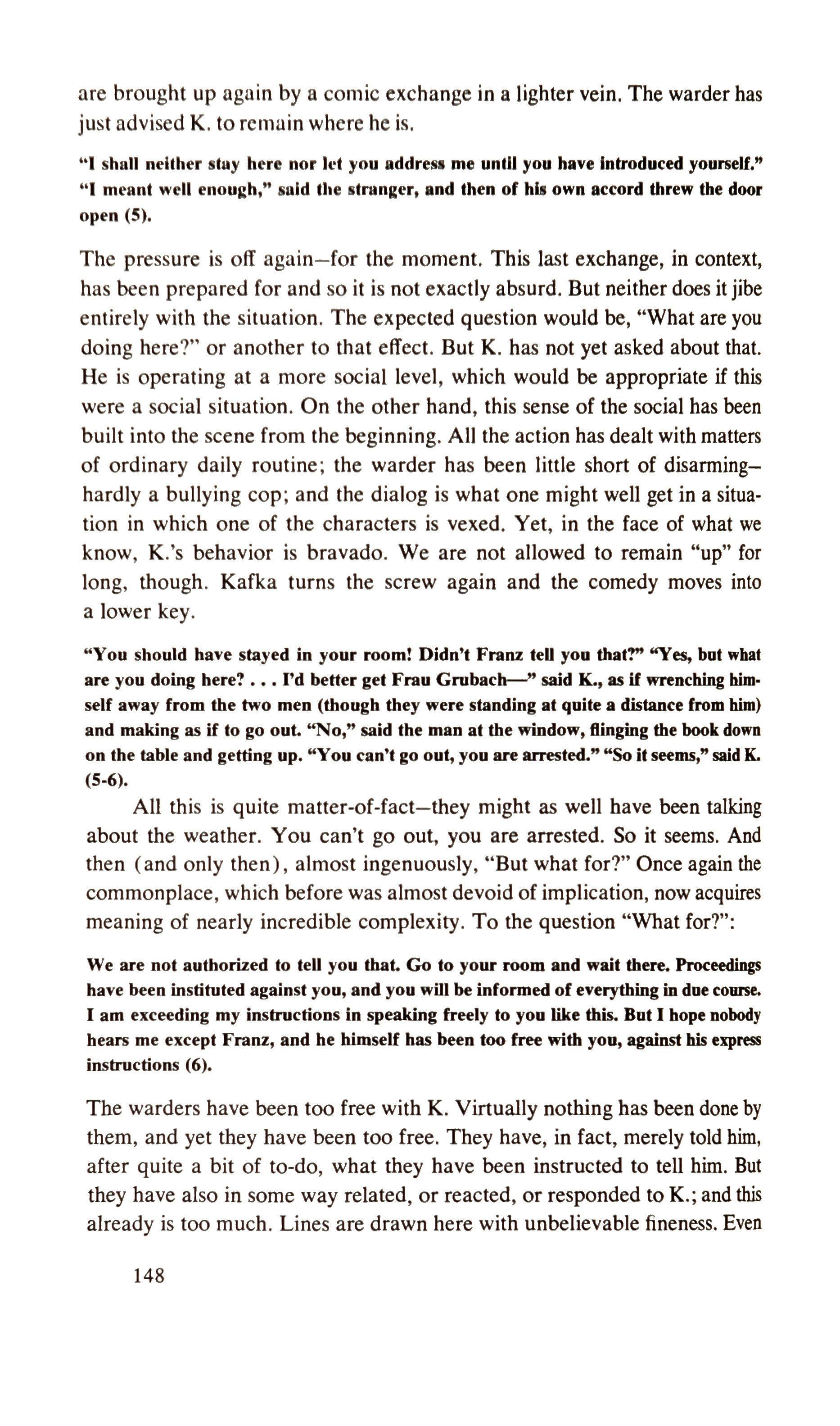
are brought up again by a comic exchange in a lighter vein. The warder has just advised K. to remain where he is.
"I shall neither sCay here nor let you address me uncil you have Introduced yourself." "I meant well enough," sold tile stranger, and then of his own accord threw the door open (5).
The pressure is off again for the moment. This last exchange, in context, has been prepared for and so it is not exactly absurd. But neither does it jibe entirely with the situation. The expected question would be, "What are you doing here?" or another to that effect. But K. has not yet asked about that. He is operating at a more social level, which would be appropriate if this were a social situation. On the other hand, this sense of the social has been built into the scene from the beginning. All the action has dealt with matters of ordinary daily routine; the warder has been little short of disarIIlinghardly a bullying cop; and the dialog is what one might well get in a situation in which one of the characters is vexed. Yet, in the face of what we know, K.'s behavior is bravado. We are not allowed to remain "up" for long, though. Kafka turns the screw again and the comedy moves into a lower key.
"You should bave stayed in your room! Didn't Franz teU you that?" "Yes, bot whaC are you doing here? I'd better get Frau Grubacb-" said K., as if wrenching himself away from the two men (though they were standing at quite a distance from him) and making as if to go out. "No," said the man at the window, ftioging the book down on the table and getting up. "You can't go out, you are arrested." "So it seems," said K. (5-6).
All this is quite matter-of-fact they might as well have been talking about the weather. You can't go out, you are arrested. So it seems. And then (and only then), almost ingenuously, "But what for?" Once again the commonplace, which before was almost devoid of implication, now acquires meaning of nearly incredible complexity. To the question "What for?":
We are not authorized to tell you that. Go to your room and wait there. Proceedings have been instituted against you, and you will be infor med of everything in due course. I am exceeding my instructions in speaking freely to you like this. But I bope nobody bears me except Franz, and be bimseH bas been too free with you, his express instructions (6).
The warders have been too free with K. Virtually nothing has been done by them, and yet they have been too free. They have, in fact, merely told him, after quite a bit of to-do, what they have been instructed to tell him. But they have also in some way related, or reacted, or responded to K.; and this already is too much. Lines are drawn here with unbelievable fineness. Even
148
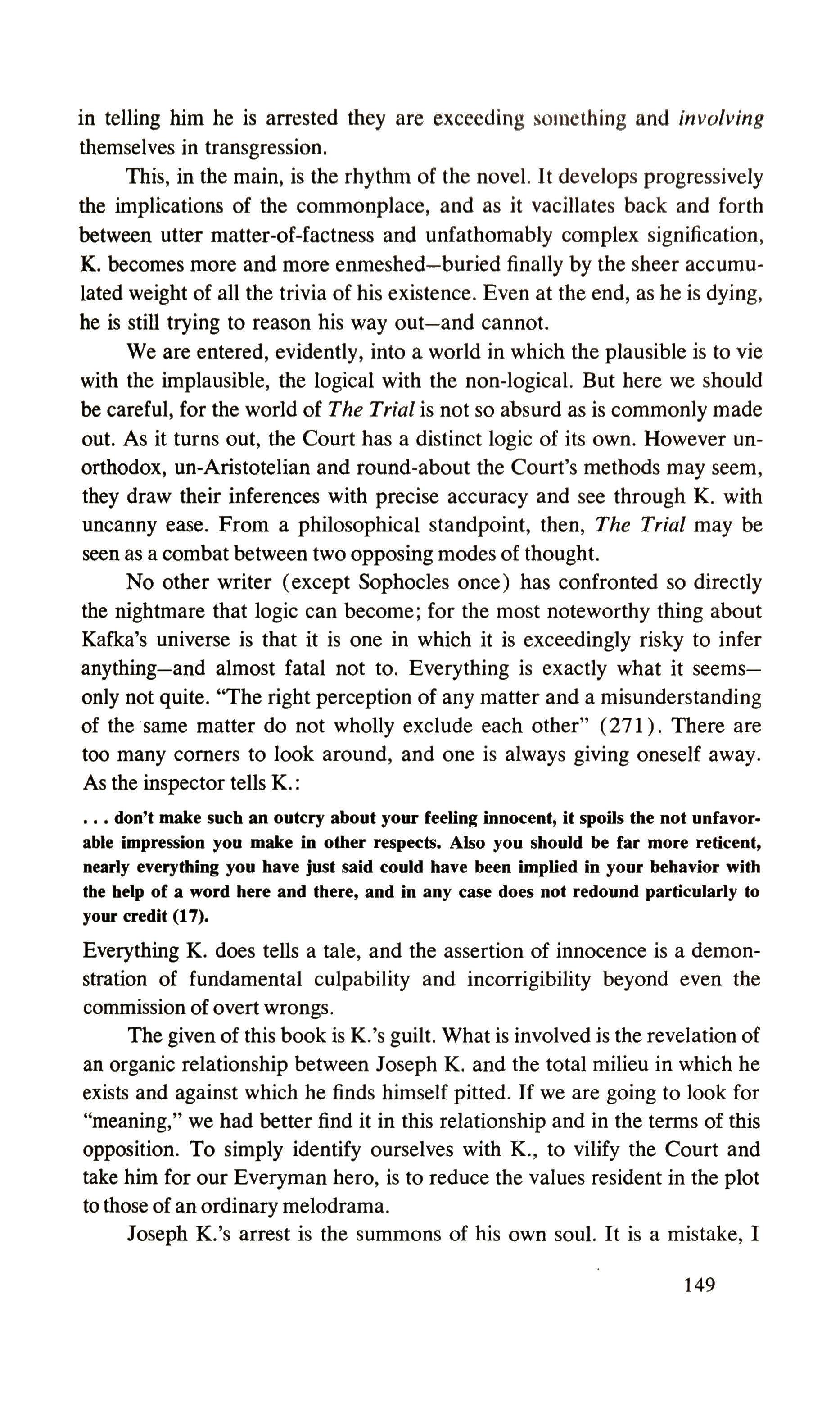
in telling him he is arrested they are exceeding something and involving themselves in transgression.
This, in the main, is the rhythm of the novel. It develops progressively the implications of the commonplace, and as it vacillates back and forth between utter matter-of-factness and unfathomably complex signification, K. becomes more and more enmeshed buried finally by the sheer accumulated weight of all the trivia of his existence. Even at the end, as he is dying, he is still trying to reason his way out and cannot.
We are entered, evidently, into a world in which the plausible is to vie with the implausible, the logical with the non-logical. But here we should be careful, for the world of The Trial is not so absurd as is commonly made out. As it turns out, the Court has a distinct logic of its own. However unorthodox, un-Aristotelian and round-about the Court's methods may seem, they draw their inferences with precise accuracy and see through K. with uncanny ease. From a philosophical standpoint, then, The Trial may be seen as a combat between two opposing modes of thought.
No other writer (except Sophocles once) has confronted so directly the nightmare that logic can become; for the most noteworthy thing about Kafka's universe is that it is one in which it is exceedingly risky to infer anything and almost fatal not to. Everything is exactly what it seemsonly not quite. "The right perception of any matter and a misunderstanding of the same matter do not wholly exclude each other" (271). There are too many corners to look around, and one is always giving oneself away. As the inspector tells K. : don't make such an outcry about your feeling innocent, it spoils the not unfavorable impression you make in other respects. Also you should be far more reticent, nearly everything you have just said could have been implied in your behavior with the help of a word here and there, and in any case does not redound particularly to your credit (17).
Everything K. does tells a tale, and the assertion of innocence is a demonstration of fundamental culpability and incorrigibility beyond even the commission of overt wrongs.
The given of this book is K.'s guilt. What is involved is the revelation of an organic relationship between Joseph K. and the total milieu in which he exists and against which he finds himself pitted. If we are going to look for "meaning," we had better find it in this relationship and in the terms of this opposition. To simply identify ourselves with K., to vilify the Court and take him for our Everyman hero, is to reduce the values resident in the plot to those of an ordinary melodrama.
Joseph K.'s arrest is the summons of his own soul. It is a mistake, I
149
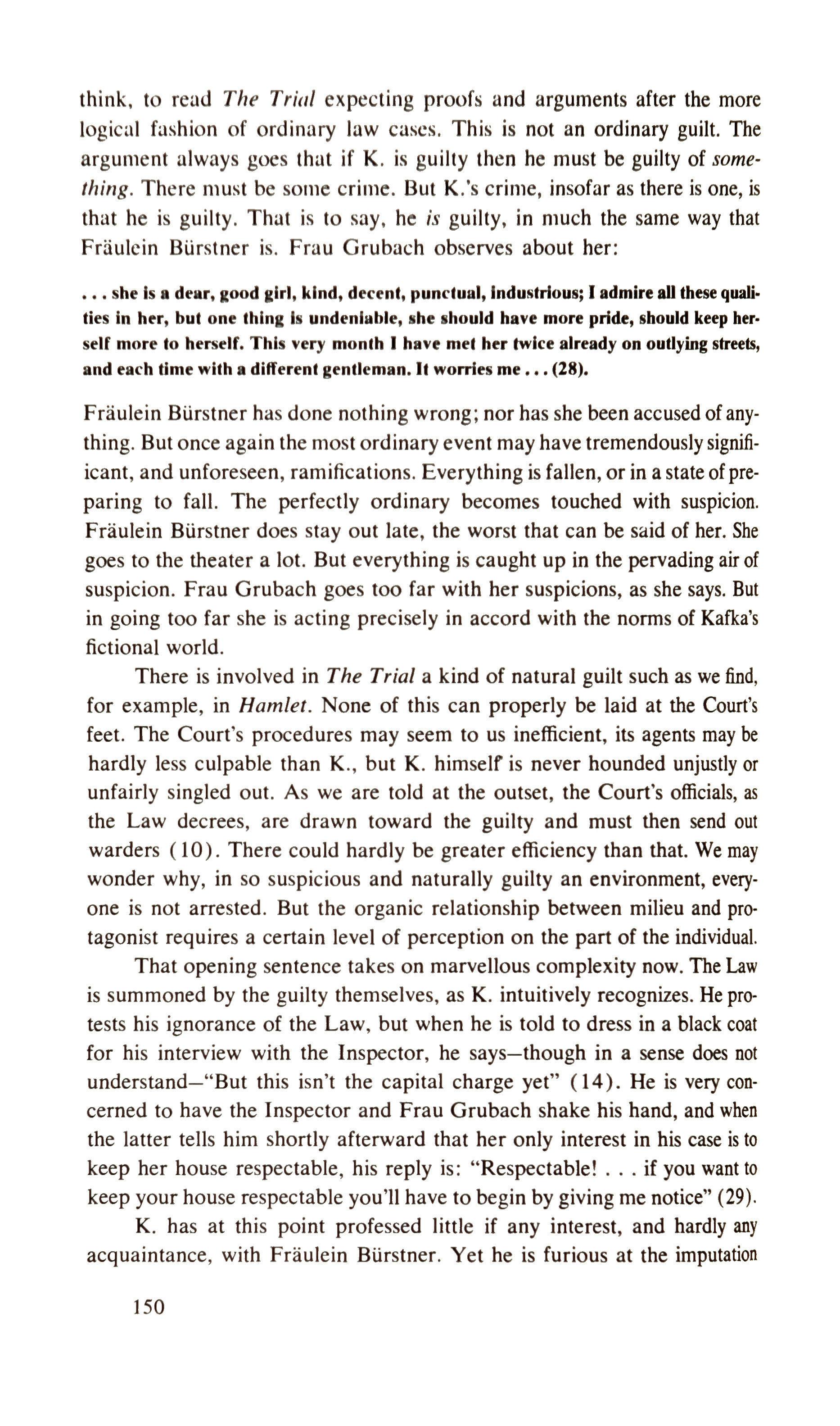
think. to read The Trial expecting proofs and arguments after the more logical fashion of ordinary law cases. This is not an ordinary guilt. The argument always goes that if K. is guilty then he must be guilty of something. There must be some crime, But Kv's crime, insofar as there is one, is that he is guilty. That is to say. he is guilty, in much the same way that Fraulein Burstner is. Frau Grubach observes about her:
she Is a dear, lood Ilrl, kind, decent, puncfual, Industrious; I admire all these qualifies In her, but one thlng Is undeniable, .he shoald have more pride, should keep herself more to herself. This very month I have met her twice already on ouflying skeets, and each time with a different gentleman. It worries me (28).
Fraulein Biirstner has done nothing wrong; nor has she been accused of anything. But once again the most ordinary event may have tremendouslysignifiicant, and unforeseen, ramifications. Everything is fallen, or in a state ofpreparing to fall. The perfectly ordinary becomes touched with suspicion. Fraulein Burstner does stay out late, the worst that can be said of her. She goes to the theater a lot. But everything is caught up in the pervading air of suspicion. Frau Grubach goes too far with her suspicions, as she says. But in going too far she is acting precisely in accord with the norms of Kafka's fictional world.
There is involved in The Trial a kind of natural guilt such as we find, for example, in Hamlet. None of this can properly be laid at the Court's feet. The Court's procedures may seem to us inefficient, its agents may be hardly less culpable than K., but K. himself is never hounded unjustly or unfairly singled out. As we are told at the outset, the Court's officials, as the Law decrees, are drawn toward the guilty and must then send out warders (10). There could hardly be greater efficiency than that. We may wonder why, in so suspicious and naturally guilty an environment, everyone is not arrested. But the organic relationship between milieu and protagonist requires a certain level of perception on the part of the individual. That opening sentence takes on marvellous complexity now. The Law is summoned by the guilty themselves, as K. intuitively recognizes. He protests his ignorance of the Law, but when he is told to dress in a black coat for his interview with the Inspector, he says though in a sense does not understand "But this isn't the capital charge yet" (14). He is very concerned to have the Inspector and Frau Grubach shake his hand, and when the latter tells him shortly afterward that her only interest in his case is to keep her house respectable, his reply is: "Respectable! if you want to keep your house respectable you'll have to begin by giving me notice" (29).
K. has at this point professed little if any interest, and hardly any acquaintance, with Fraulein Burstner. Yet he is furious at the imputation
150
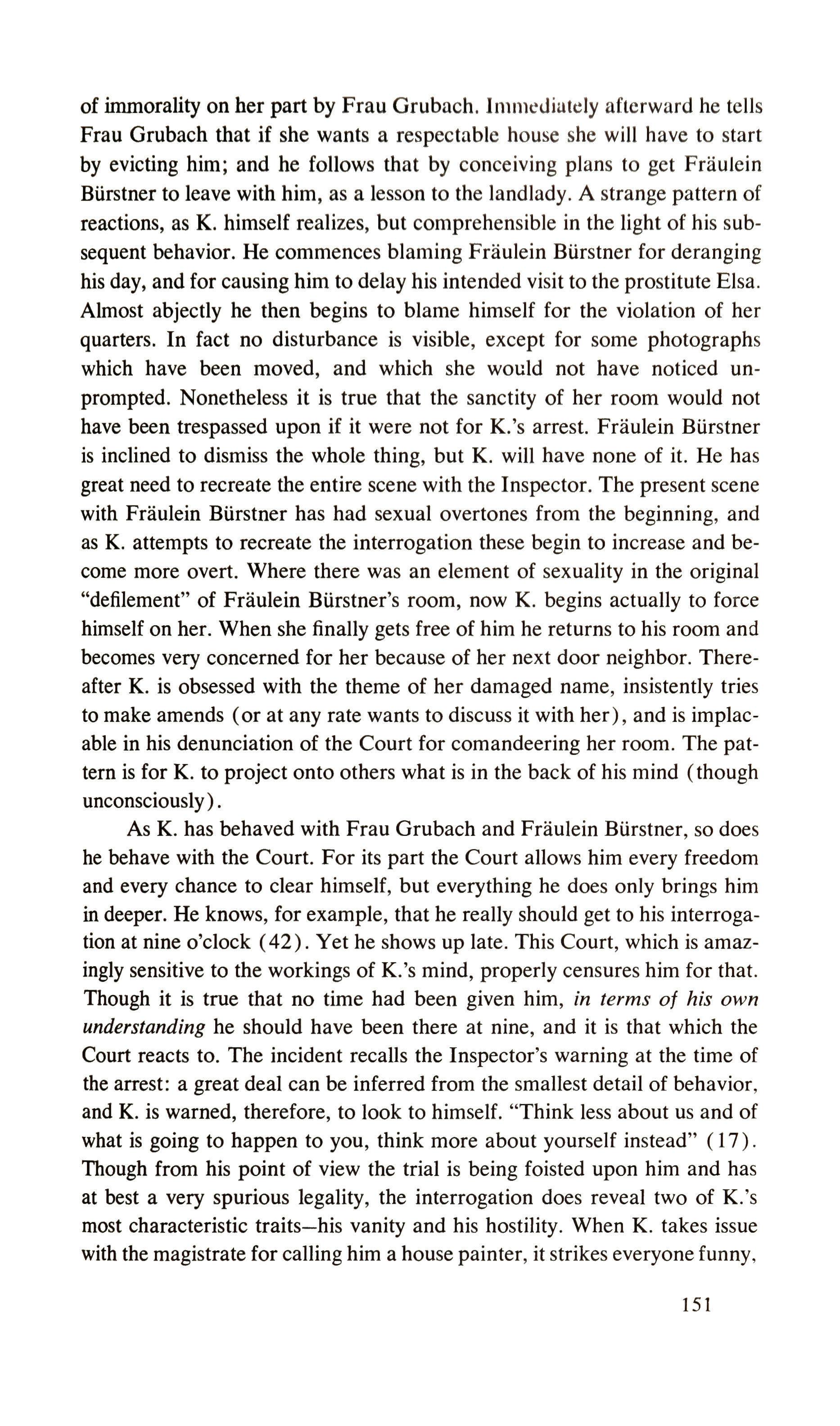
of immorality on her part by Frau Grubach. Immediately afterward he tells Frau Grubach that if she wants a respectable house she will have to start by evicting him; and he follows that by conceiving plans to get Fraulein Blirstner to leave with him, as a lesson to the landlady. A strange pattern of reactions, as K. himself realizes, but comprehensible in the light of his subsequent behavior. He commences blaming Fraulein Blirstner for deranging his day, and for causing him to delay his intended visit to the prostitute Elsa. Almost abjectly he then begins to blame himself for the violation of her quarters. In fact no disturbance is visible, except for some photographs which have been moved, and which she would not have noticed unprompted. Nonetheless it is true that the sanctity of her room would not have been trespassed upon if it were not for K.'s arrest. Fraulein Blirstner is inclined to dismiss the whole thing, but K. will have none of it. He has great need to recreate the entire scene with the Inspector. The present scene with Fraulein Blirstner has had sexual overtones from the beginning, and as K. attempts to recreate the interrogation these begin to increase and become more overt. Where there was an element of sexuality in the original "defilement" of Fraulein Blirstner's room, now K. begins actually to force himself on her. When she finally gets free of him he returns to his room and becomes very concerned for her because of her next door neighbor. Thereafter K. is obsessed with the theme of her damaged name, insistently tries to make amends (or at any rate wants to discuss it with her), and is implacable in his denunciation of the Court for comandeering her room. The pattern is for K. to project onto others what is in the back of his mind (though unconsciously)
As K. has behaved with Frau Grubach and Fraulein Blirstner, so does he behave with the Court. For its part the Court allows him every freedom and every chance to clear himself, but everything he does only brings him in deeper. He knows, for example, that he really should get to his interrogation at nine o'clock (42). Yet he shows up late. This Court, which is amazingly sensitive to the workings of K.'s mind, properly censures him for that. Though it is true that no time had been given him, in terms of his own understanding he should have been there at nine, and it is that which the Court reacts to. The incident recalls the Inspector's warning at the time of the arrest: a great deal can be inferred from the smallest detail of behavior, and K. is warned, therefore, to look to himself. "Think less about us and of what is going to happen to you, think more about yourself instead" (17). Though from his point of view the trial is being foisted upon him and has at best a very spurious legality, the interrogation does reveal two of K.'s most characteristic traits his vanity and his hostility. When K. takes issue with the magistrate for calling him a house painter, it strikes everyone funny,
151
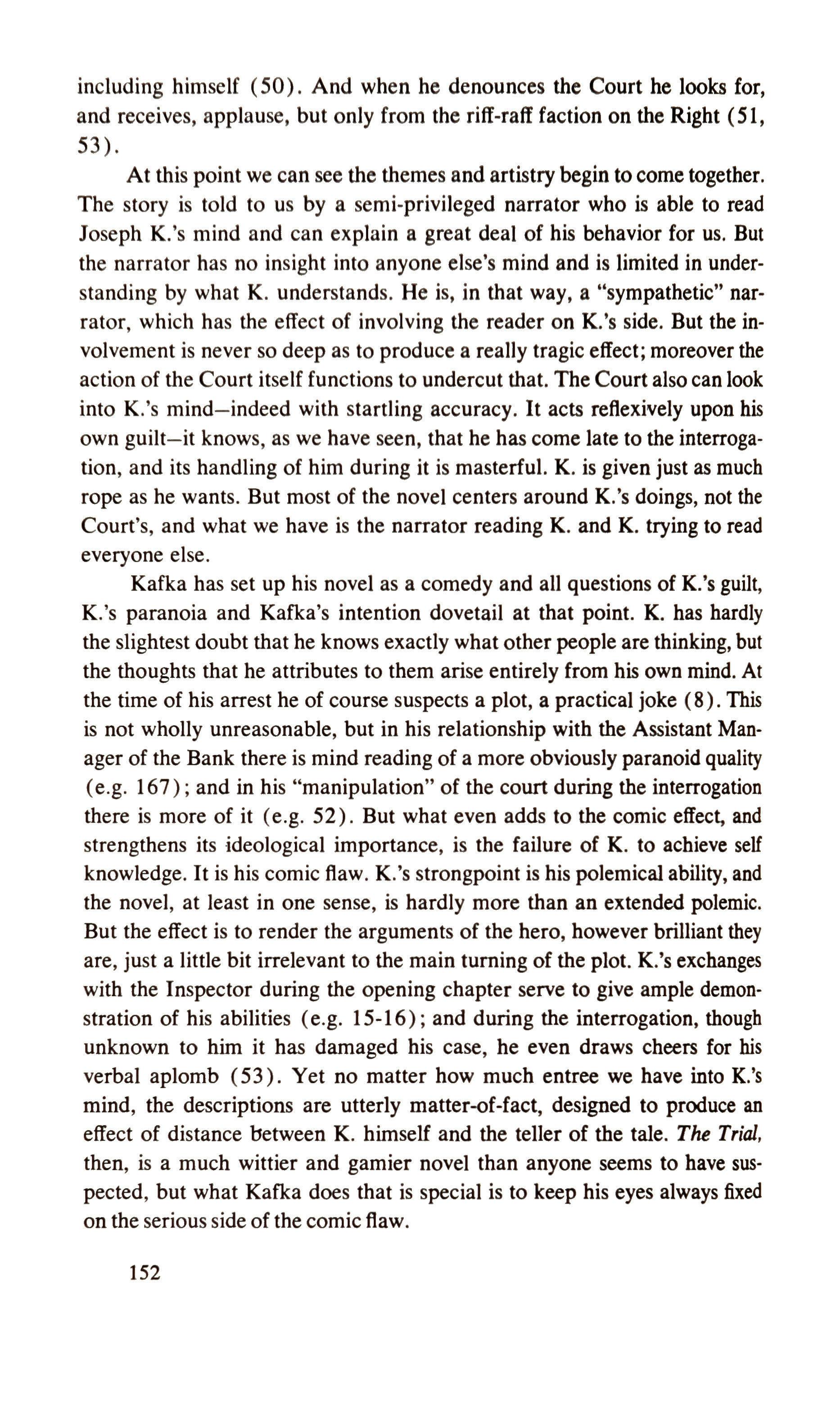
including himself (50). And when he denounces the Court he looks for, and receives, applause, but only from the riff-raff faction on the Right (51, 53)
At this point we can see the themes and artistrybegin to come together. The story is told to us by a semi-privileged narrator who is able to read Joseph K.'s mind and can explain a great deal of his behavior for us. But the narrator has no insight into anyone else's mind and is limited in understanding by what K. understands. He is, in that way, a "sympathetic" narrator, which has the effect of involving the reader on K's side. But the involvement is never so deep as to produce a really tragic effect; moreover the action of the Court itself functions to undercut that. The Court also can look into K.'s mind indeed with startling accuracy. It acts reflexively upon his own guilt it knows, as we have seen, that he has come late to the interrogation, and its handling of him during it is masterful. K. is given just as much rope as he wants. But most of the novel centers around K.'s doings, not the Court's, and what we have is the narrator reading K. and K. trying to read everyone else.
Kafka has set up his novel as a comedy and all questions of K.'s guilt, K.'s paranoia and Kafka's intention dovetail at that point. K. has hardly the slightest doubt that he knows exactly what other people are thinking, but the thoughts that he attributes to them arise entirely from his own mind. At the time of his arrest he of course suspects a plot, a practical joke (8). 'I'his is not wholly unreasonable, but in his relationship with the Assistant Manager of the Bank there is mind reading of a more obviously paranoid quality (e.g. 167); and in his "manipulation" of the court during the interrogation there is more of it (e.g. 52). But what even adds to the comic effect, and strengthens its ideological importance, is the failure of K. to achieve sell knowledge. It is his comic flaw. K.'s strongpoint is his polemical ability, and the novel, at least in one sense, is hardly more than an extended polemic. But the effect is to render the arguments of the hero, however brilliant they are, just a little bit irrelevant to the main turning of the plot. K.'s exchanges with the Inspector during the opening chapter serve to give ample demonstration of his abilities (e.g. 15-16); and during the interrogation, though unknown to hilll it has damaged his case, he even draws cheers for his verbal aplomb (53). Yet no matter how much entree we have into K.'s mind, the descriptions are utterly matter-of-fact, designed to produce an effect of distance between K. himself and the teller of the tale. The Trial, then, is a much wittier and gamier novel than anyone seems to have suspected, but what Kafka does that is special is to keep his eyes always fixed on the serious side of the comic flaw.
152
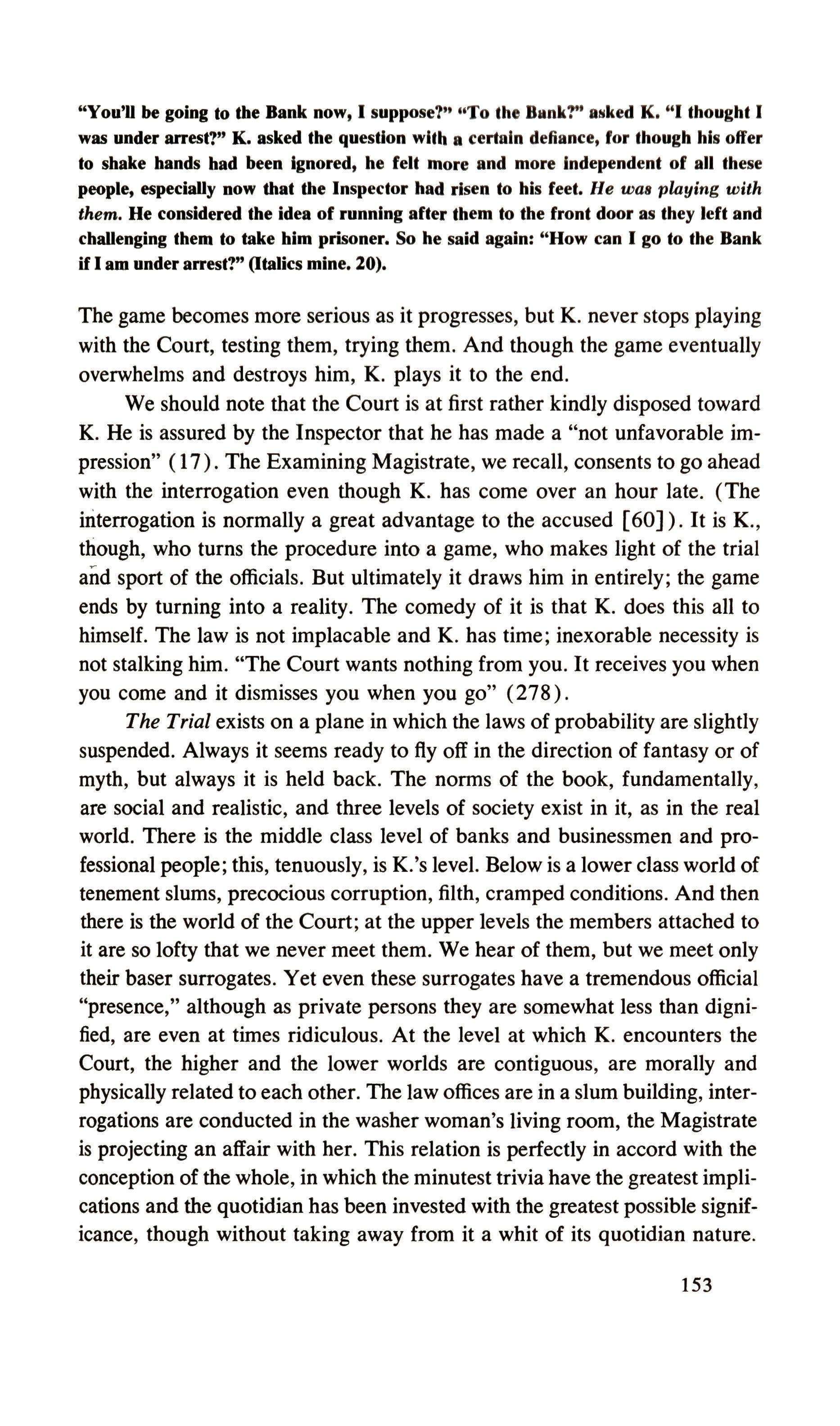
"You'D be going to the Bank now, I suppose?" "To the Bank?" Bsked K. "I thought I was under arrest?" K. Bsked the question with a certain defiance, for though his offer to shake hands had been Ignored, he felt more and more Independent of all these people, especiaUy now that the Inspector had risen to his feet. He was playing with them. He considered the idea of running after them to the front door as they left and chaUenging them to take him prisoner. So he said again: "How can I go to the Bank if I am under arrest?" (Italics mine. 20).
The game becomes more serious as it progresses, but K. never stops playing with the Court, testing them, trying them. And though the game eventually overwhelms and destroys him, K. plays it to the end.
We should note that the Court is at first rather kindly disposed toward K. He is assured by the Inspector that he has made a "not unfavorable impression" (17). The Examining Magistrate, we recall, consents to go ahead with the interrogation even though K. has come over an hour late. (The interrogation is normally a great advantage to the accused [60]). It is K., though, who turns the procedure into a game, who makes light of the trial and sport of the officials. But ultimately it draws him in entirely; the game ends by turning into a reality. The comedy of it is that K. does this all to himself. The law is not implacable and K. has time; inexorable necessity is not stalking him. "The Court wants nothing from you. It receives you when you come and it dismisses you when you go" (278).
The Trial exists on a plane in which the laws of probability are slightly suspended. Always it seems ready to fly off in the direction of fantasy or of myth, but always it is held back. The norms of the book, fundamentally, are social and realistic, and three levels of society exist in it, as in the real world. There is the middle class level of banks and businessmen and professional people; this, tenuously, is K.'s level. Below is a lower class world of tenement slums, precocious corruption, filth, cramped conditions. And then there is the world of the Court; at the upper levels the members attached to it are so lofty that we never meet them. We hear of them, but we meet only their baser surrogates. Yet even these surrogates have a tremendous official "presence," although as private persons they are somewhat less than dignified, are even at times ridiculous. At the level at which K. encounters the Court, the higher and the lower worlds are contiguous, are morally and physically related to each other. The law offices are in a slum building, interrogations are conducted in the washer woman's living room, the Magistrate is projecting an affair with her. This relation is perfectly in accord with the conception of the whole, in which the minutest trivia have the greatest implications and the quotidian has been invested with the greatest possible significance, though without taking away from it a whit of its quotidian nature.
153

The Fall is always imminent. Though this is the real world, it is the real world intensified, slightly hallucinated and distorted. The air of social, historical and psychological reality that the whole conveys is unmistakable and authentic. In its effects of clutter and congestion, it is very much like the world of a Max Beckmann painting, not a true allegory. This is an instance of Expressionist art. It is only allegoristic, allegory-like.
Much has been made of K.'s name, or lack of it, as a support for the numberless allegorical readings that have been put forth. The reasoning goes that K. is a cipher, therefore an abstraction, therefore an Everyman. I see no therefore about it. Granted a shadowiness in the identification, still this fits the overall conception of the novel, including, as we have seen, the technique of presentation. There is no justification for reading the novel allegorically if we mean by allegory what is usually meant. The landscape here is far too real. The world in which K. moves is given to us entirely in its social, that is in its surface, aspect. The narrator has no special insight here and this is of crucial importance. On the other hand, K. is developed for us almost exclusively through inside views, for the narrator reads his thoughts. Given this, given his present questionable status, and K.'s social self his name - is properly not more than an initial. K.'s reality in the novel is essentially an interior one, a personal one; in the context of the society of the novel he is not entirely, or not satisfactorily, integrated. He is tainted and is about to be expunged from society.
Apart from his name, and his presently tenuous social standing, K. is very real. He is given to us as not precisely young, though not old either. He has just become thirty when the novel opens. It is not without interest that K. is the age that Hamlet is. In a sense K. has just reached the age of responsibility, the age when an accounting of oneself might be called for: the time of youth is ended and the final tally has come in. K. is rather like Hamlet in many ways. This is not because he is an Everyman, but rather because he is a fully realized, and realizing, fictional human being. We know too much about how his mind works to take him in the abstract, and though he is surely "human, all too human," he is no more universal, no more Everyman, than any great character or real human being. It is clearly significant that the people at the Bank tend to overrate his knowledge of art. What makes hitn a possibly heroic figure and not a Willy Low man is his comic function, the manner in which identity and role, his position at the Bank, become for him interchangeable.
K. is exceedingly vain about his position in society. At the time of his arrest, when the Inspector warns him that he is starting off on the wrong foot, he stares at the man which gesture the narrator interprets for us: "Was he to be taught lessons by a man probably younger than himself' (17)?
154
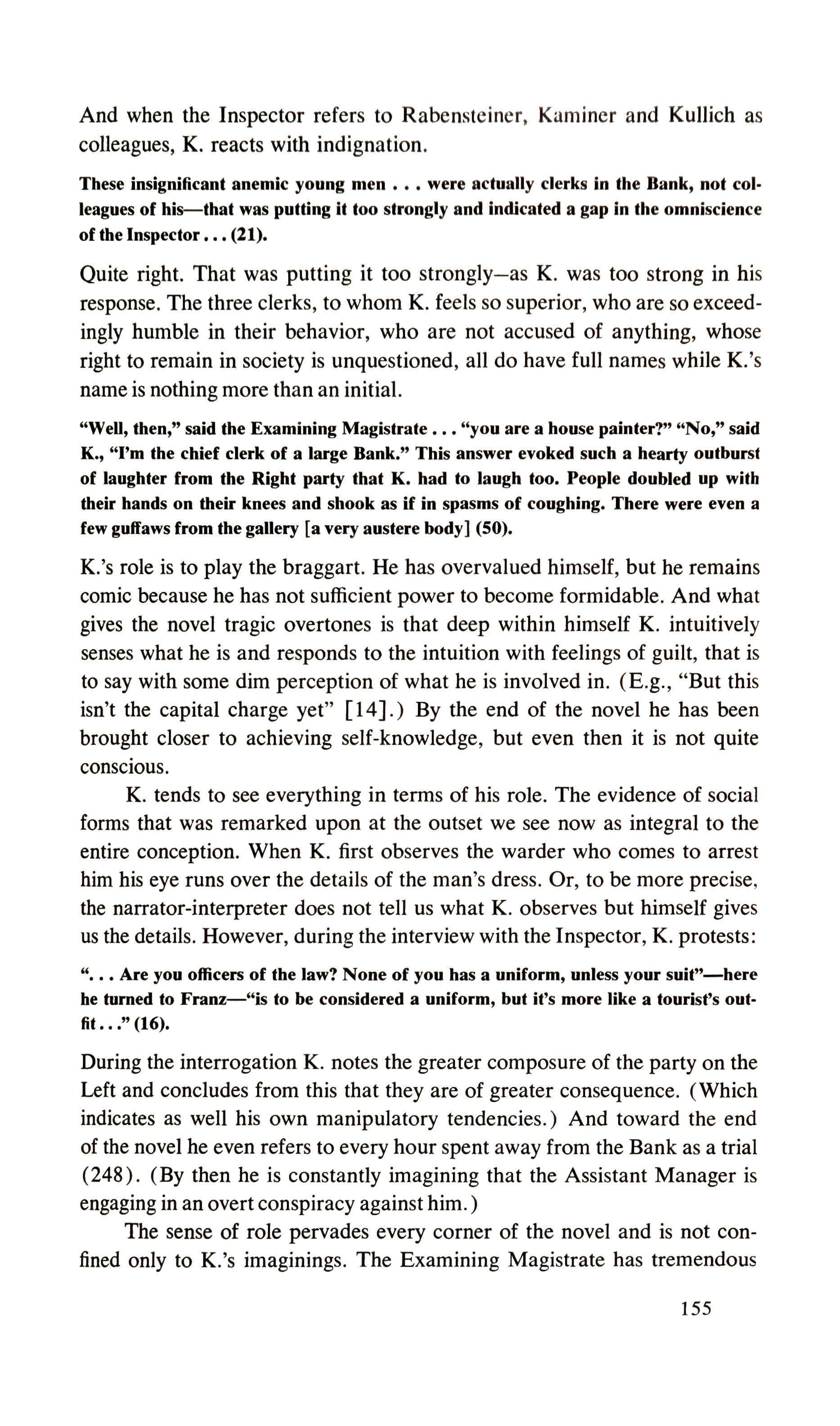
And when the Inspector refers to Rabensteiner, Kaminer and Kullich as colleagues, K. reacts with indignation.
These insignificant anemic young men were actually clerks in the Bank, not colleagues of his that was putting it too strongly and indicated a gap in the omniscience of the Inspector (21).
Quite right. That was putting it too strongly as K. was too strong in his response. The three clerks, to whom K. feels so superior, who are so exceedingly humble in their behavior, who are not accused of anything, whose right to remain in society is unquestioned, all do have full names while K.'s name is nothing more than an initial.
"Well, then," said the Examining Magistrate "you are a house painter?" "No," said K., "I'm the chief clerk of a large Bank." This answer evoked such a hearty outburst of laughter from the Right party that K. had to laugh too. People doubled up with their hands on their knees and shook as if in spasms of coughing. There were even a few guffaws from the gallery [a very austere body] (SO).
K.'s role is to play the braggart. He has overvalued himself, but he remains comic because he has not sufficient power to become formidable. And what gives the novel tragic overtones is that deep within himself K. intuitively senses what he is and responds to the intuition with feelings of guilt, that is to say with some dim perception of what he is involved in. (E.g., "But this isn't the capital charge yet" [14].) By the end of the novel he has been brought closer to achieving self-knowledge, but even then it is not quite conSCIOUS.
K. tends to see everything in terms of his role. The evidence of social forms that was remarked upon at the outset we see now as integral to the entire conception. When K. first observes the warder who comes to arrest him his eye runs over the details of the man's dress. Or, to be more precise, the narrator-interpreter does not tell us what K. observes but himself gives us the details. However, during the interview with the Inspector, K. protests:
Are you officers of the law? None of you has a uniform, unless your suit" here he turned to Franz "is to be considered a uniform, but it's more like a tourist's outfit (16).
During the interrogation K. notes the greater composure of the party on the Left and concludes from this that they are of greater consequence. (Which indicates as well his own manipulatory tendencies.) And toward the end of the novel he even refers to every hour spent away from the Bank as a trial (248). (By then he is constantly imagining that the Assistant Manager is engaging in an overt conspiracy against him. )
The sense of role pervades every corner of the novel and is not confined only to K.'s imaginings. The Examining Magistrate has tremendous
155

official dignity, complete with bushy eyebrows. Off the job, however, he is somewhat foolish in his pursuit of the washer-woman. In the Cathedral scene the priest, who is a singularly impressive and awesome figure, says to K., "I had to speak to you from a distance. Otherwise I am too easily influenced and tend to forget my duty" (266-67). And the lawyer Huld, who has been sick and can hardly receive visitors, revives at once upon hearing that K. and his uncle have come on business (127). This constant merging of personality with role is necessary. The Court itself puts a great deal of emphasis on the fact of having reputable people vouch for the accused. The great advantage of retaining a lawyer such as Huld is that he has personal friendships with members of the court. The case, in fact, is not argued in the courtroom, but in the living room, in restaurants as part of ordinary social discourse and activity.
If the conventional love interest of comedies is absent from The Trial, the biological aspect is very present. There is a great deal of sexuality; on every occasion when a man and a women come together in a room something sexual occurs. K. begins with Fraulein Biirstner by having to confess his "guilt" to her, and ends with backing her into a comer and making unmistakable advances (31-8). During the height of K.'s oration before the Court he is interrupted by a shriek and looks up to see the washer-woman being ravished by a law student. And the gallery spectators, it seems, are delighted that he should be brought up short in this manner (58). Later on, when he meets the washer-woman alone, she offers herself to him and he sees no reason why he should not accept the present (70). Virtually every time he meets Leni, of course, there is sexual by-play of some sort (e.g. 132-3); and even with Frau Grubach there is sexuality of a kind involved, as when he observes her hands and thinks: "Women's hands al'e quietly effective" (25). (This seems to have a clear erotic appeal for K., for he always notices women's hands.) And finally, as we ale told, it is K.'s habit once a week to pay a visit to the prostitute Elsa (23). But this sexuality is not confined solely to K. The law student can barely control himself, and off duty the Examining Magistrate is no less erotically possessed than K. Sexuality insinuates itself everywhere and constantly threatens to disrupt the otherwise orderly social relationships. However much sexuality brings society to the edge of chaos, though, the representation of it is comic. On K.'s part the erotic inclination takes the form of schemes and overtures, followed by mental exhaustion and then physical weariness. At times, as during the interrogation, it raises the action to great heights of comedy. K. has hardly known Fraulein Biirstner, has hardly had any interest in her, has recently all but assaulted her; and now, quite carried away by the force of his own impassioned rhetoric, bitterly denounces the court for doing sym-
156
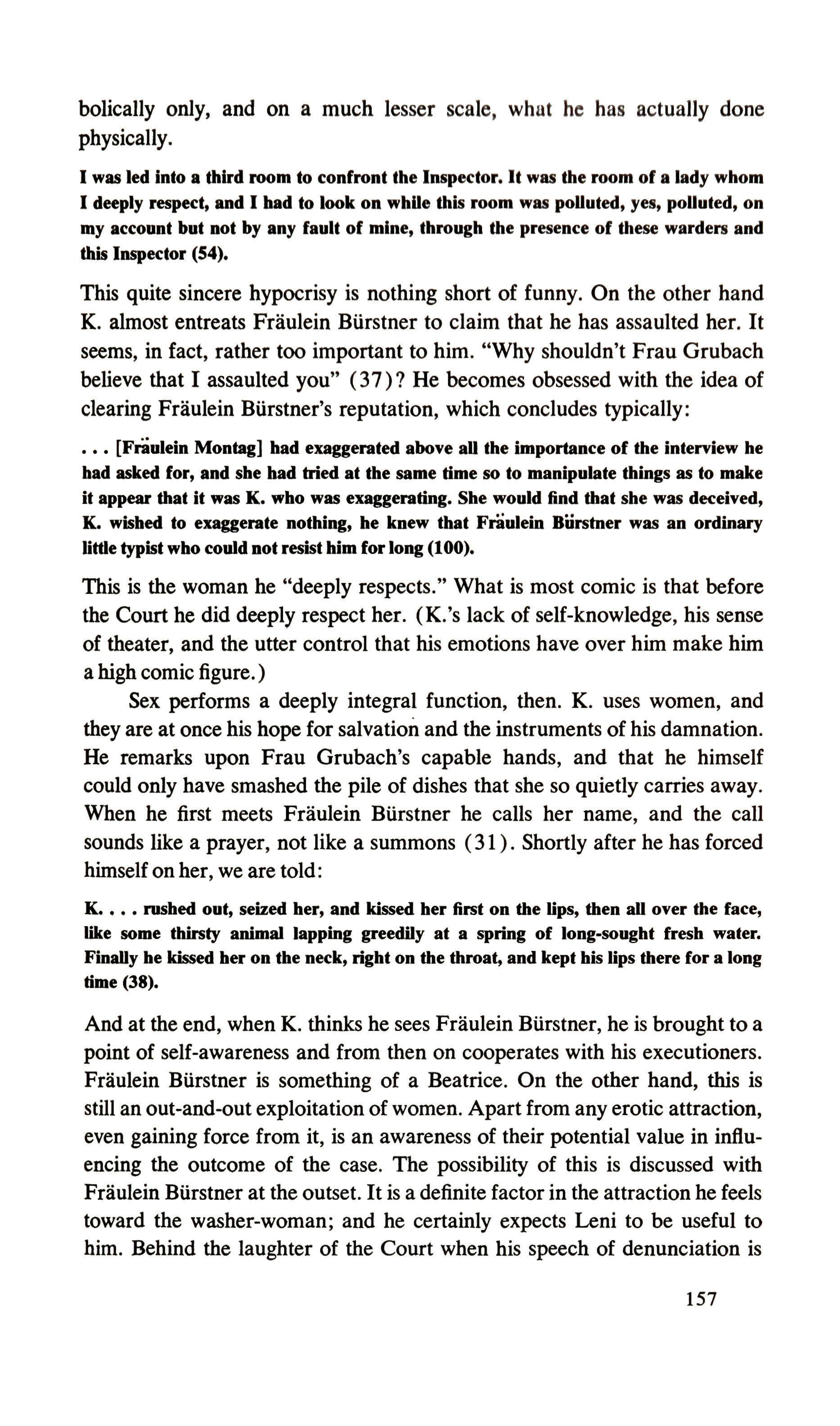
bolically only, and on a much lesser scale, what he has actually done physically.
I was led into a third room to confront the Inspector. It was the room of a lady whom I deeply lespect, and I had to look on whUe this room was poUuted, yes, poUuted, on my account but not by any fault of mine, through the presence of these warders and this Inspector (54).
This quite sincere hypocrisy is nothing short of funny. On the other hand K. almost entreats Fraulein Burstner to claim that he has assaulted her. It seems, in fact, rather too important to him. "Why shouldn't Frau Grubach believe that I assaulted you" (37)? He becomes obsessed with the idea of clearing Fraulein Burstner's reputation, which concludes typically:
[Fraulein Montag] had exaggerated above aU the importance of the interview he had asked for, and she had tried at the same time so to manipUlate things as to make it appear that it was K. who was exaggerating. She would find that she was deceived, K. wished to exaggerate nothing, he knew that Fraulein Biirstner was an ordinary Uttle typist who could uot resist him for long (100).
This is the woman he "deeply respects." What is most comic is that before the Court he did deeply respect her. (K.'s lack of self-knowledge, his sense of theater, and the utter control that his emotions have over him make him a high comic figure.)
Sex performs a deeply integral function, then. K. uses women, and they are at once his hope for salvation and the instruments of his damnation. He remarks upon Frau Grubach's capable hands, and that he himself could only have smashed the pile of dishes that she so quietly carries away. When he first meets Fraulein Biirstner he calls her name, and the call sounds like a prayer, not like a SUInlDOnS (31). Shortly after he has forced himself on her, we are told:
K. rushed out, seized her, and kissed her first on the Ups, then aU over the face, like some thirsty animal lapping greedily at a spring of long-sought fresh water. FinaUy he kissed her on the neck, right on the throat, and kept his lips there for a long time (38).
And at the end, when K. thinks he sees Fraulein Burstner, he is brought to a point of self-awareness and from then on cooperates with his executioners. Fraulein Btirstner is something of a Beatrice. On the other hand, this is still an out-and-out exploitation of women. Apart from any erotic attraction, even gaining force from it, is an awareness of their potential value in influencing the outcome of the case. The possibility of this is discussed with Fraulein Btirstner at the outset. It is a definite factor in the attraction he feels toward the washer-woman; and he certainly expects Leni to be useful to him. Behind the laughter of the Court when his speech of denunciation is
157
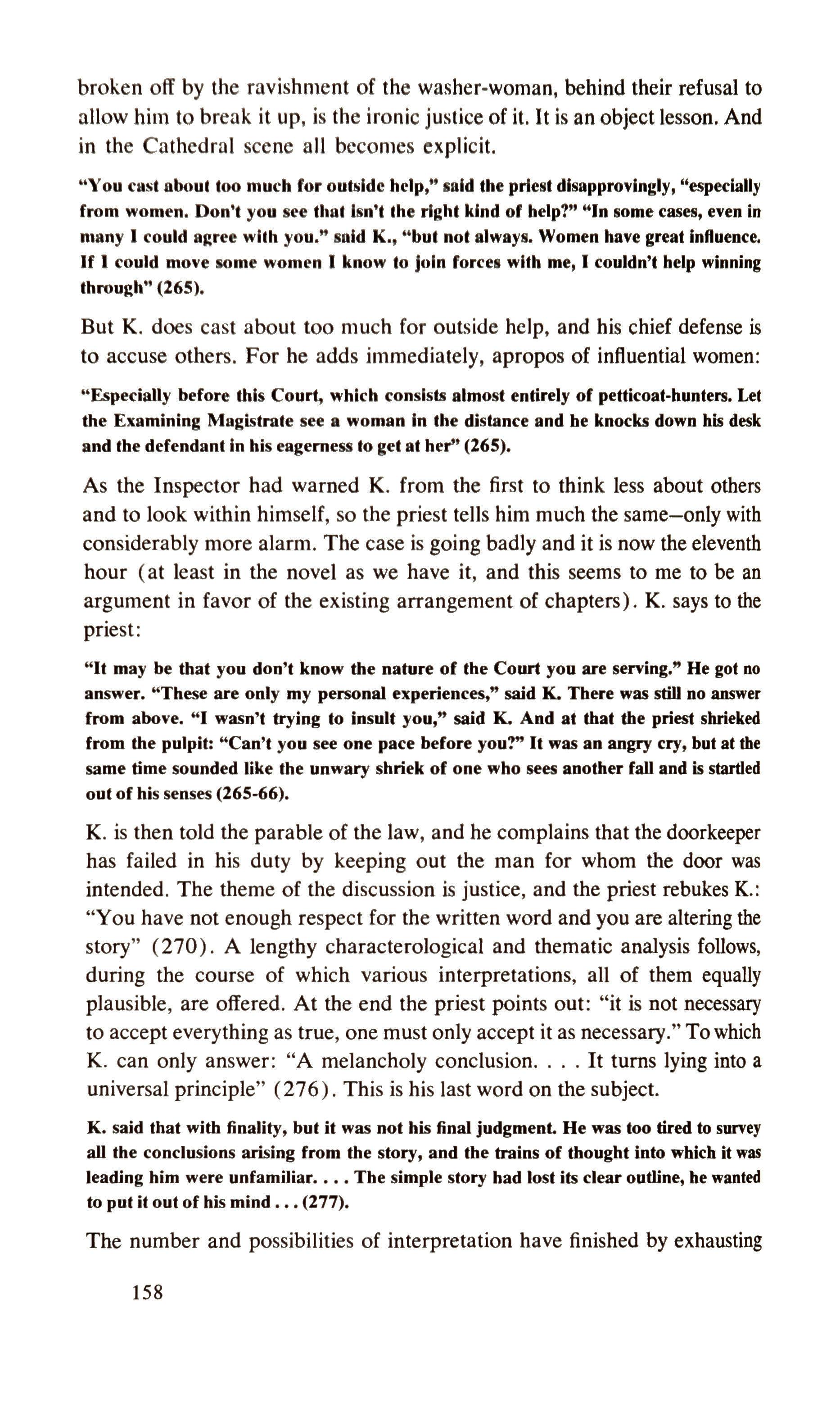
broken off by the ravishment of the washer-woman, behind their refusal to allow him to break it up, is the ironic justice of it. It is an object lesson. And in the Cathedral scene all becomes explicit.
"You cast about too much for outside help," said the priest disapprovingly, "especially from women. Don't you see that Isn't tile right kind of help?" "In some cases, even in nlany I could agree with you." said K., "but not always. Women have great influence. If I could move some women I know to Join forcea with me, I couldn't help winning through" (165).
But K. does cast about too much for outside help, and his chief defense is to accuse others. For he adds immediately, apropos of influential women:
"Especially before this Court, which consists almost entirely of petticoat-hunters. Let the Examining Magistrate see a woman In the distance and he knocks down his desk and the defendant in his eagerness to get at her" (265).
As the Inspector had warned K. from the first to think less about others and to look within himself, so the priest tells him much the same only with considerably more alarm. The case is going badly and it is now the eleventh hour (at least in the novel as we have it, and this seems to me to be an argument in favor of the existing arrangement of chapters). K. says to the priest:
"It may be that you don't know the nature of the Court you are serving." He got no answer. "These are only my personal experiences," said K. There was still no answer from above. "I wasn't trying to insult you," said K. And at that the priest shrieked from the pUlpit: "Can't you see one pace before you?" It was an angry cry, but at the same time sounded like the unwary shriek of one who sees another faU and is startled out of his senses (265-66).
K. is then told the parable of the law, and he complains that the doorkeeper has failed in his duty by keeping out the man for whom the door was intended. The theme of the discussion is justice, and the priest rebukes K.: "You have not enough respect for the written word and you are altering the story" (270). A lengthy characterological and thematic analysis follows, during the course of which various interpretations, all of them equally plausible, are offered. At the end the priest points out: "it is not necessary to accept everything as true, one must only accept it as necessary." To which K. can only answer: "A melancholy conclusion It turns lying into a universal principle" (276). This is his last word on the subject.
K. said that with finality, but it was not his final judgment. He was too tired to survey aU the conclusions arising from the story, and the trains of thought into which it was leading him were unfamiliar The simple story had lost its clear outline, he wanted to put it out of his mind (277).
The number and possibilities of interpretation have finished by exhausting
158
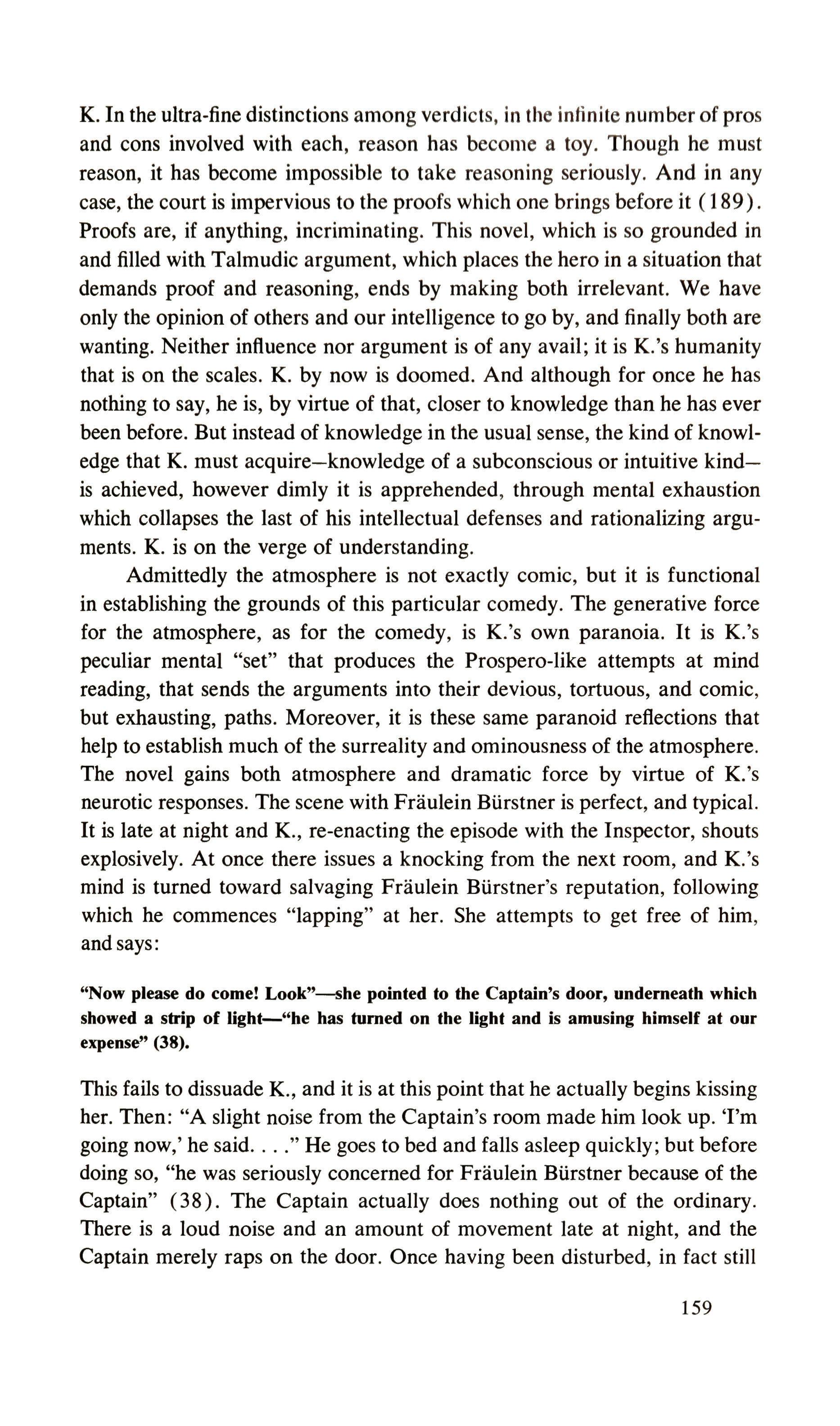
K. In the ultra-fine distinctions among verdicts, in the infinite number of pros and cons involved with each, reason has become a toy. Though he must reason, it has become impossible to take reasoning seriously. And in any case, the court is impervious to the proofs which one brings before it (189). Proofs are, if anything, incriminating. This novel, which is so grounded in and filled with Talmudic argument, which places the hero in a situation that demands proof and reasoning, ends by making both irrelevant. We have only the opinion of others and our intelligence to go by, and finally both are wanting. Neither influence nor argument is of any avail; it is K.'s humanity that is on the scales. K. by now is doomed. And although for once he has nothing to say, he is, by virtue of that, closer to knowledge than he has ever been before. But instead of knowledge in the usual sense, the kind of knowledge that K. must acquire knowledge of a subconscious or intuitive kindis achieved, however dimly it is apprehended, through mental exhaustion which collapses the last of his intellectual defenses and rationalizing arguments. K. is on the verge of understanding.
Admittedly the atmosphere is not exactly comic, but it is functional in establishing the grounds of this particular comedy. The generative force for the atmosphere, as for the comedy, is K.'s own paranoia. It is K.'s peculiar mental "set" that produces the Prospero-like attempts at mind reading, that sends the arguments into their devious, tortuous, and comic, but exhausting, paths. Moreover, it is these same paranoid reflections that help to establish much of the surreality and ominousness of the atmosphere. The novel gains both atmosphere and dramatic force by virtue of K.'s neurotic responses. The scene with Fraulein Btirstner is perfect, and typical. It is late at night and K., re-enacting the episode with the Inspector, shouts explosively. At once there issues a knocking from the next room, and K.'s mind is turned toward salvaging Fraulein Btirstner's reputation, following which he commences "lapping" at her. She attempts to get free of him, and says:
"Now please do come! Look" she pointed to the Captain's door, underneath which showed a strip of light "he has turned on the light and is amusing himself at our expense" (38).
This fails to dissuade K., and it is at this point that he actually begins kissing her. Then: "A slight noise from the Captain's room made him look up. 'I'm going now,' he said He goes to bed and falls asleep quickly; but before doing so, "he was seriously concerned for Fraulein Btirstner because of the Captain" (38). The Captain actually does nothing out of the ordinary. There is a loud noise and an amount of movement late at night, and the Captain merely raps on the door. Once having been disturbed, in fact still
159
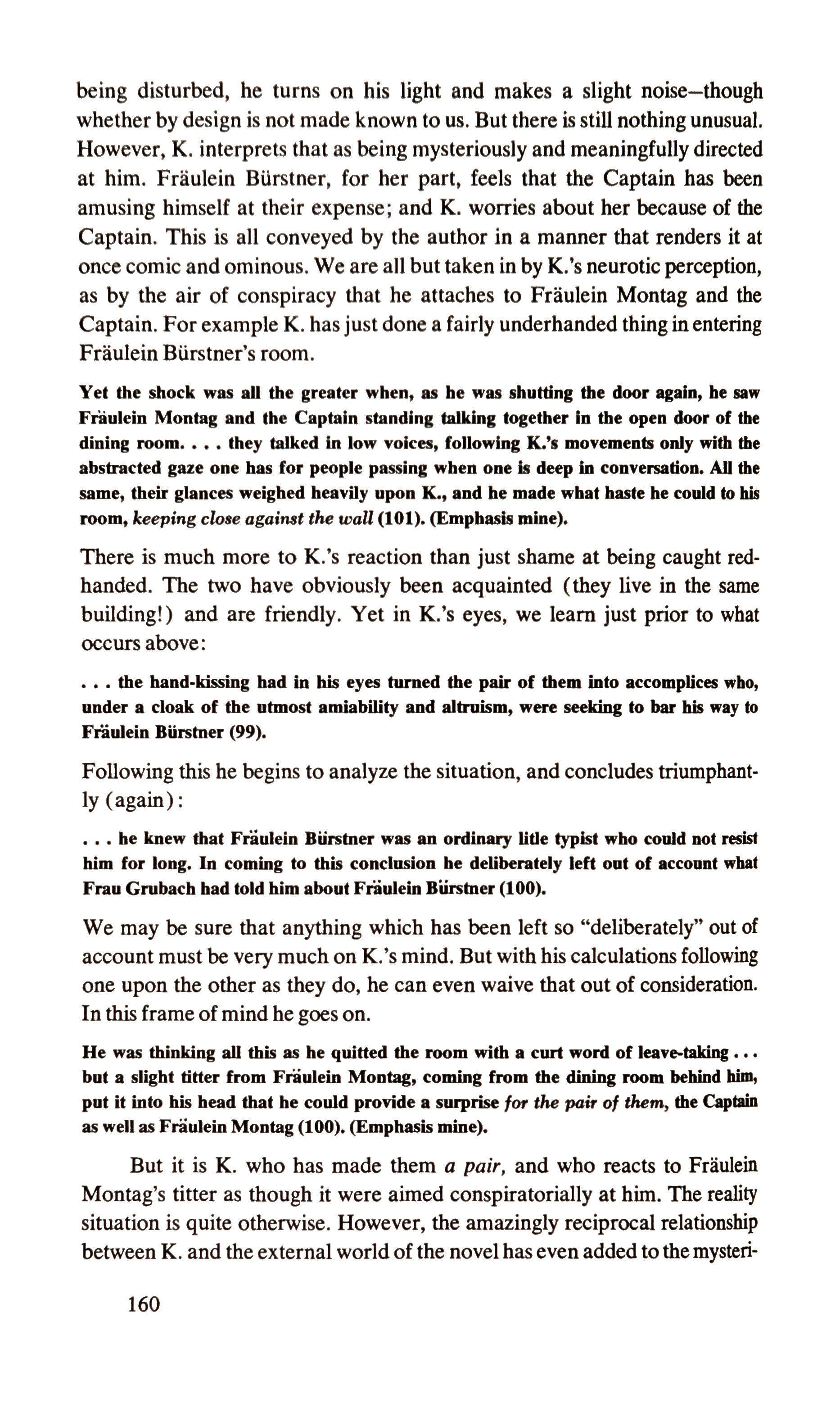
being disturbed, he turns on his light and makes a slight noise though whether by design is not made known to us. But there is still nothing unusual. However, K. interprets that as being mysteriously and meaningfully directed at him. Fraulein BUrstner, for her part, feels that the Captain has been amusing himself at their expense; and K. worries about her because of the Captain. This is all conveyed by the author in a manner that renders it at once comic and ominous. We are all but taken in by K's neurotic perception, as by the air of conspiracy that he attaches to Fraulein Montag and the Captain. For example K. has just done a fairly underhanded thing in entering Fraulein BUrstner's room.
Yet the shock was aU the greater when, as he was shutting the door again, he saw Fraulein Montag and the Captain standing talking together In the open door of the dining room they talked In low voices, following J{.'. movements only with the abstracted gaze one has for people passing when one Is deep In conversation. AD the same, their glances weighed heavUy upon K., and he made what haste he could to his room, keeping c108e againBt the waU (101). (Emphasis mine).
There is much more to K.'s reaction than just shame at being caught redhanded. The two have obviously been acquainted (they live in the same building!) and are friendly. Yet in K.'s eyes, we learn just prior to what OCCIll s above:
the hand-kissing had in his eyes hll ned the pair of them into accomplices who, under a cloak of the utmost amiability and altruism, weie seeking to bar his way to Fraulein Biirstner (99).
Following this he begins to analyze the situation, and concludes triumphantly (again):
he knew that Fraulein Biirstner was an 0 lide typist who could not resist him for long. In coming to this conclusion he deliberately left out of account what Frau Grubach had told him about Friulein Biirstner (100).
We may be sure that anything which has been left so "deliberately" out of account must be very much on K.'s mind. But with his calculations following one upon the other as they do, he can even waive that out of consideration. In this frame of mind he goes on.
He was thinking aU this as he quitted the room with a curt word of leave-taking but a slight titter from Fraulein Montag, cOllling from the dining room behind him, put it into his head that he could provide a surprise for the pair of them, the Capfain as well as Fraulein Montag (100). (Emphasis Illine).
But it is K. who has made them a pair, and who reacts to Fraulein Montag's titter as though it were aimed conspiratorially at him. The reality situation is quite otherwise. However, the amazingly reciprocal relationship between K. and the external world of the novel has even added to the mysteri-
160
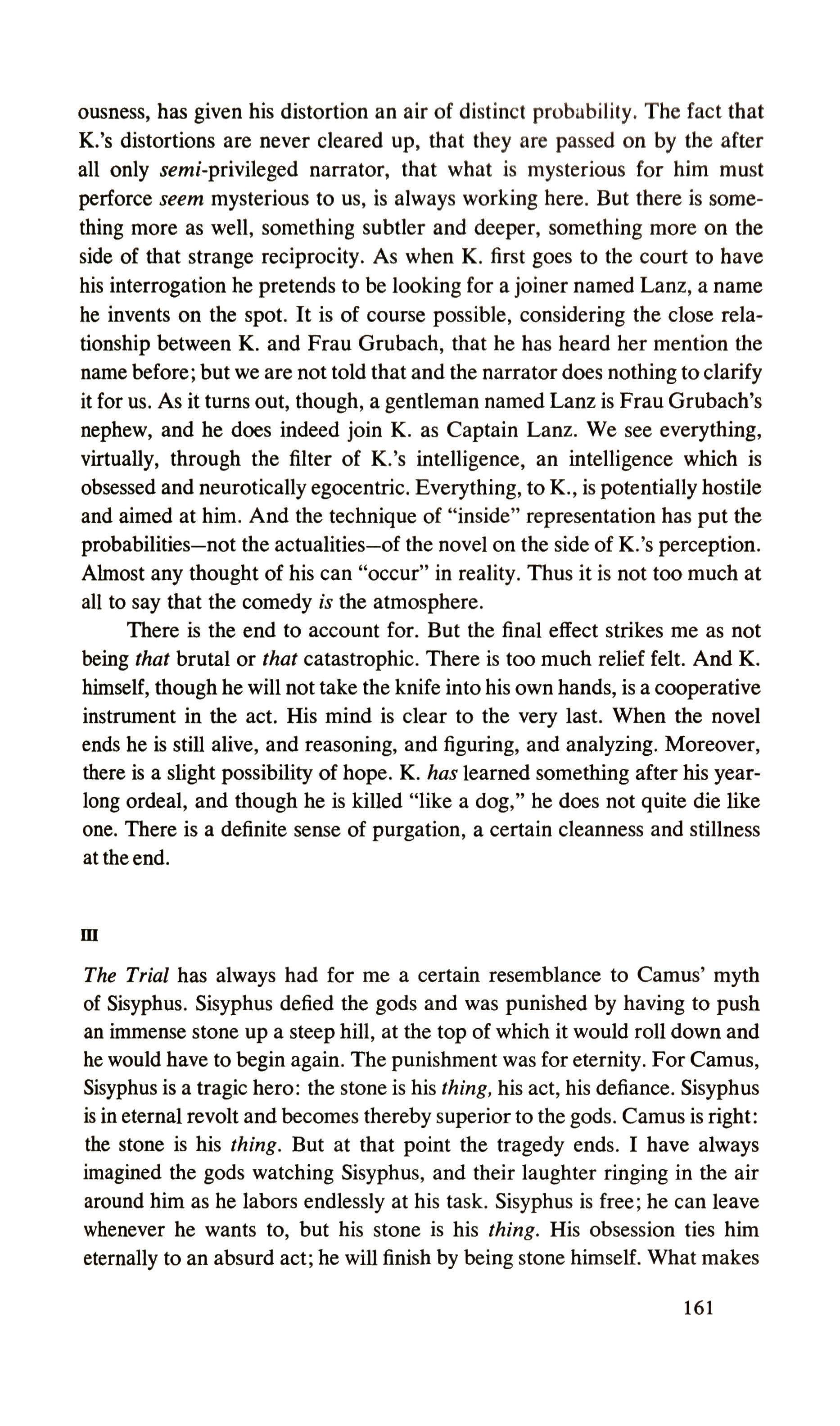
ousness, has given his distortion an air of distinct probability. The fact that K.'s distortions are never cleared up, that they are passed on by the after all only semi-privileged narrator, that what is mysterious for him must perforce seem mysterious to us, is always working here. But there is something more as well, something subtler and deeper, something more on the side of that strange reciprocity. As when K. first goes to the court to have his interrogation he pretends to be looking for a joiner named Lanz, a name he invents on the spot. It is of course possible, considering the close relationship between K. and Frau Grubach, that he has heard her mention the name before; but we are not told that and the narrator does nothing to clarify it for us. As it turns out, though, a gentleman named Lanz is Frau Grubach's nephew, and he does indeed join K. as Captain Lanz. We see everything, virtually, through the filter of K.'s intelligence, an intelligence which is obsessed and neurotically egocentric. Everything, to K., is potentially hostile and aimed at him. And the technique of "inside" representation has put the probabilities not the actualities of the novel on the side of K.'s perception. Almost any thought of his can "occur" in reality. Thus it is not too much at all to say that the comedy is the atmosphere. There is the end to account for. But the final effect strikes me as not being that brutal or that catastrophic. There is too much relief felt. And K. himself, though he will not take the knife into his own hands, is a cooperative instrument in the act. His mind is clear to the very last. When the novel ends he is still alive, and reasoning, and figuring, and analyzing. Moreover, there is a slight possibility of hope. K. has learned something after his yearlong ordeal, and though he is killed "like a dog," he does not quite die like one. There is a definite sense of purgation, a certain cleanness and stillness at the end.
m
The Trial has always had for me a certain resemblance to Camus' myth of Sisyphus. Sisyphus defied the gods and was punished by having to push an immense stone up a steep hill, at the top of which it would roll down and he would have to begin again. The punishment was for eternity. For Camus, Sisyphus is a tragic hero: the stone is his thing, his act, his defiance. Sisyphus is in eternal revolt and becomes thereby superior to the gods. Camus is right: the stone is his thing. But at that point the tragedy ends. I have always imagined the gods watching Sisyphus, and their laughter ringing in the air around him as he labors endlessly at his task. Sisyphus is free; he can leave whenever he wants to, but his stone is his thing. His obsession ties him eternally to an absurd act; he will finish by being stone himself. What makes
161
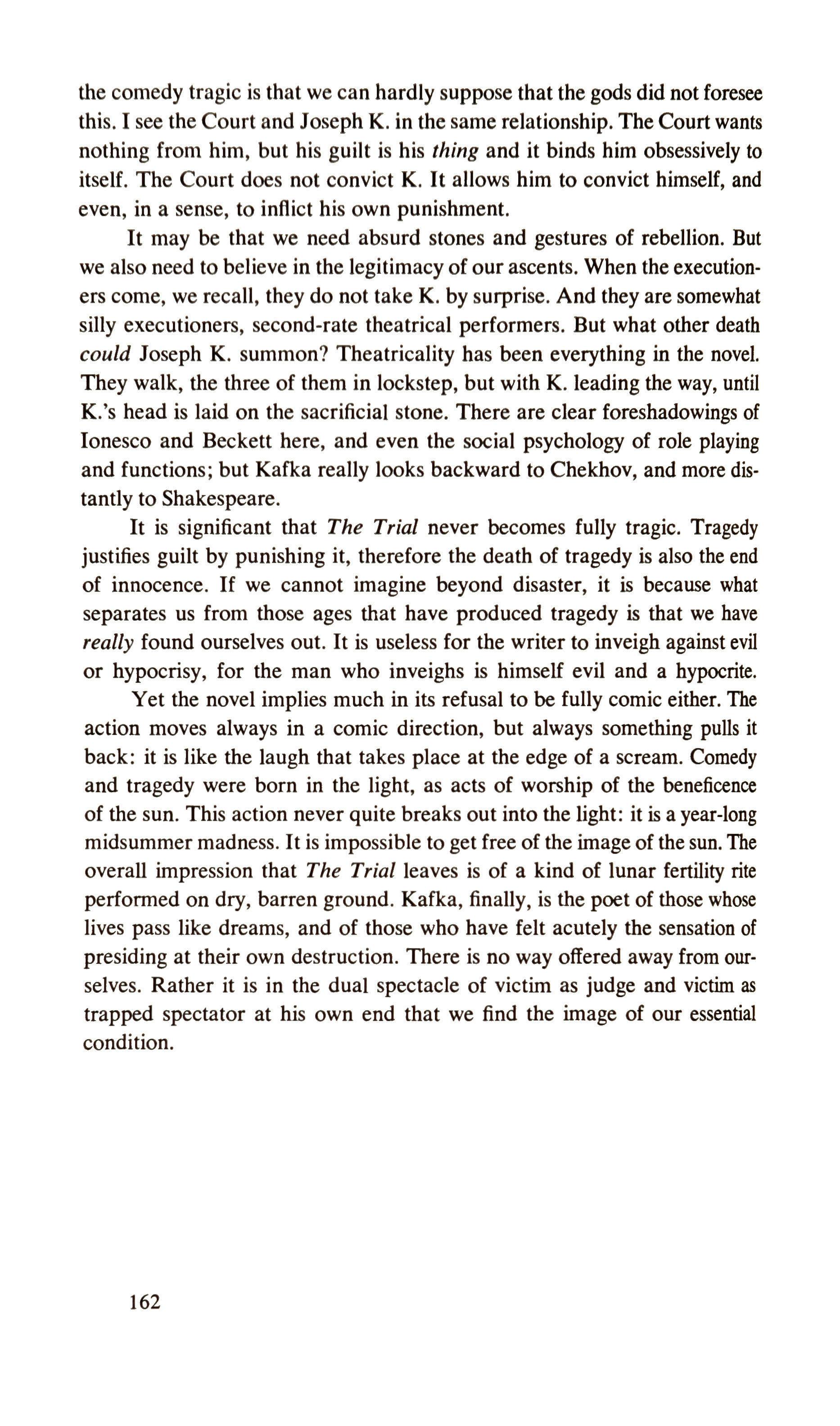
the comedy tragic is that we can hardly suppose that the gods did not foresee this. I see the Court and Joseph K. in the same relationship. The Court wants nothing from him, but his guilt is his thing and it binds him obsessively to itself. The Court does not convict K. It allows him to convict himself, and even, in a sense, to inflict his own punishment.
It may be that we need absurd stones and gestures of rebellion. But we also need to believe in the legitimacy of our ascents. When the executioners come, we recall, they do not take K. by surprise. And they are somewhat silly executioners, second-rate theatrical performers. But what other death could Joseph K. summon? Theatricality has been everything in the novel. They walk, the three of them in lockstep, but with K. leading the way, until K.'s head is laid on the sacrificial stone. There are clear foreshadowings of Ionesco and Beckett here, and even the social psychology of role playing and functions; but Kafka really looks backward to Chekhov, and more distantly to Shakespeare.
It is significant that The Trial never becomes fully tragic. Tragedy justifies guilt by punishing it, therefore the death of tragedy is also the end of innocence. If we cannot imagine beyond disaster, it is because what separates us from those ages that have produced tragedy is that we have really found ourselves out. It is useless for the writer to inveigh against evil or hypocrisy, for the man who inveighs is himself evil and a hypocrite.
Yet the novel implies much in its refusal to be fully comic either. The action moves always in a comic direction, but always something pulls it back: it is like the laugh that takes place at the edge of a scream. Comedy and tragedy were born in the light, as acts of worship of the beneficence of the sun. This action never quite breaks out into the light: it is a year-long midsummer madness. It is impossible to get free of the image of the sun. The overall impression that The Trial leaves is of a kind of lunar fertility rite performed on dry, barren ground. Kafka, finally, is the poet of those whose lives pass like dreams, and of those who have felt acutely the sensation of presiding at their own destruction. There is no way offered away from ourselves. Rather it is in the dual spectacle of victim as judge and victim as trapped spectator at his own end that we find the image of our essential condition.
162
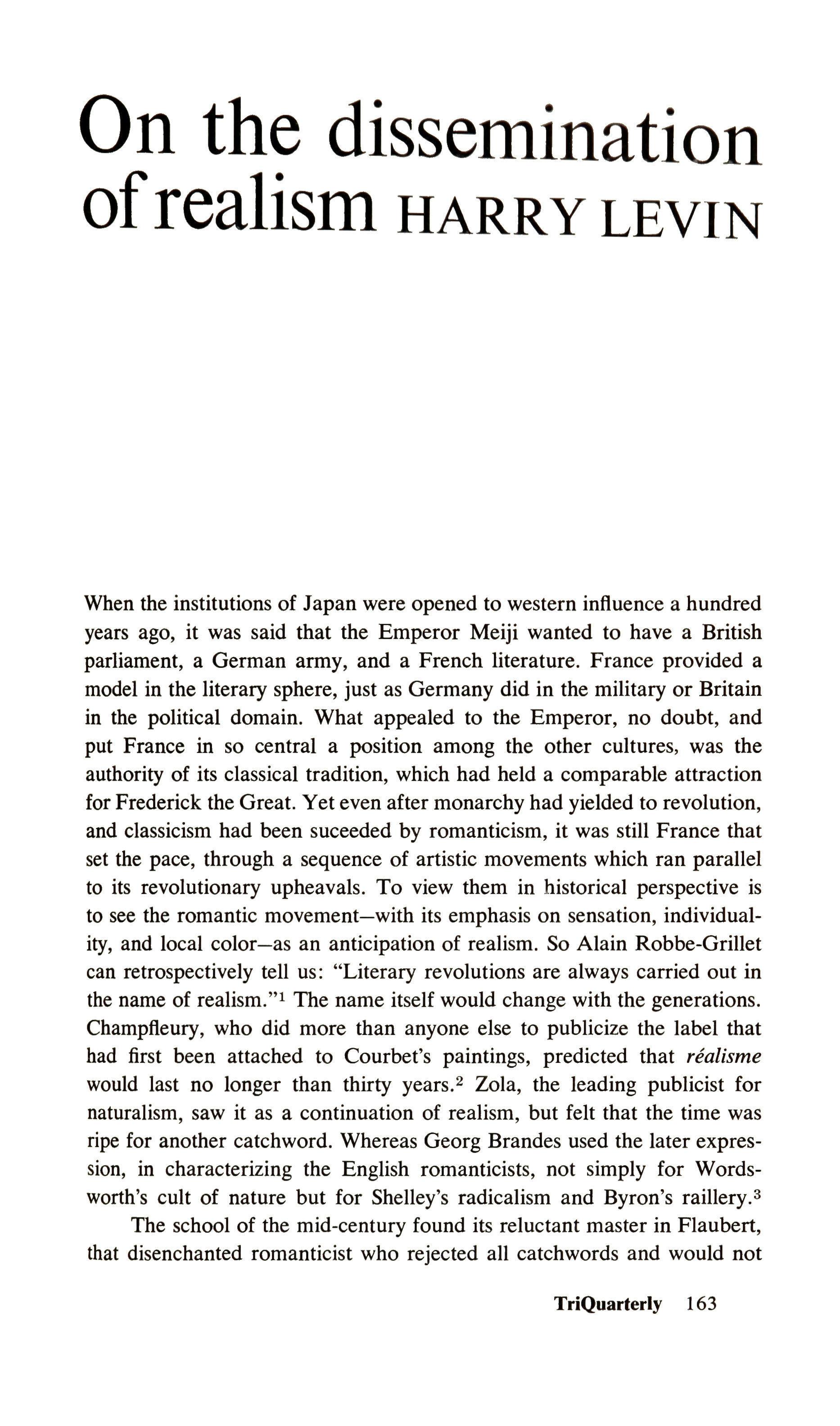
When the institutions of Japan were opened to western influence a hundred years ago, it was said that the Emperor Meiji wanted to have a British parliament, a German army, and a French literature. France provided a model in the literary sphere, just as Germany did in the military or Britain in the political domain. What appealed to the Emperor, no doubt, and put France in so central a position among the other cultures, was the authority of its classical tradition, which had held a comparable attraction for Frederick the Great. Yet even after monarchy had yielded to revolution, and classicism had been suceeded by romanticism, it was still France that set the pace, through a sequence of artistic movements which ran parallel to its revolutionary upheavals. To view them in historical perspective is to see the romantic movement with its emphasis on sensation, individuality, and local color as an anticipation of realism. So Alain Robbe-Grillet can retrospectively tell us: "Literary revolutions are always carried out in the name of realism."! The name itself would change with the generations. Champfleury, who did more than anyone else to publicize the label that had first been attached to Courbet's paintings, predicted that realisme would last no longer than thirty years.s Zola, the leading publicist for naturalism, saw it as a continuation of realism, but felt that the time was ripe for another catchword. Whereas Georg Brandes used the later expression, in characterizing the English romanticists, not simply for Wordsworth's cult of nature but for Shelley's radicalism and Byron's raillery." The school of the mid-century found its reluctant master in Flaubert, that disenchanted romanticist who rejected all catchwords and would not
TriQuarterly 163
• •
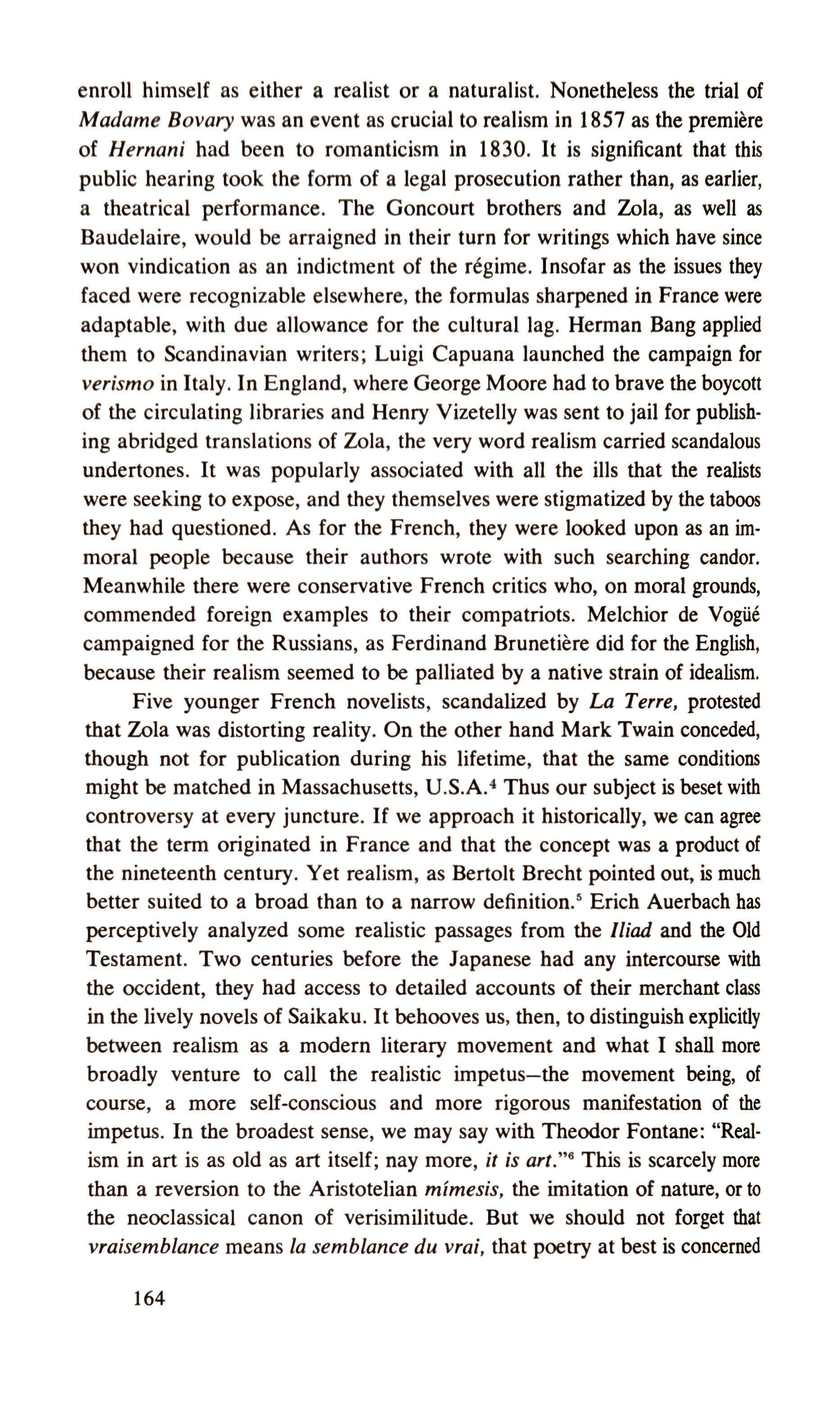
enroll himself as either a realist or a naturalist. Nonetheless the trial of Madame Bovary was an event as crucial to realism in 1857 as the premiere of Hernan; had been to romanticism in 1830. It is significant that this public hearing took the form of a legal prosecution rather than, as earlier, a theatrical performance. The Goncourt brothers and Zola, as well as Baudelaire, would be arraigned in their turn for writings which have since won vindication as an indictment of the regime. Insofar as the issues they faced were recognizable elsewhere, the formulas sharpened in France were adaptable, with due allowance for the cultural lag. Herman Bang applied them to Scandinavian writers; Luigi Capuana launched the campaign for verismo in Italy. In England, where George Moore had to brave the boycott of the circulating libraries and Henry Vizetelly was sent to jail for publishing abridged translations of Zola, the very word realism carried scandalous undertones. It was popularly associated with all the ills that the realists were seeking to expose, and they themselves were stigmatized by the taboos they had questioned. As for the French, they were looked upon as an immoral people because their authors wrote with such searching candor. Meanwhile there were conservative French critics who, on moral grounds, commended foreign examples to their compatriots. Melchior de VogUe campaigned for the Russians, as Ferdinand Brunetiere did for the English, because their realism seemed to be palliated by a native strain of idealism. Five younger French novelists, scandalized by La Terre, protested that Zola was distorting reality. On the other hand Mark Twain conceded, though not for publication during his lifetime, that the same conditions might be matched in Massachusetts, U.S.A." Thus our subject is beset with controversy at every juncture. If we approach it historically, we can agree that the term originated in France and that the concept was a product of the nineteenth century. Yet realism, as Bertolt Brecht pointed out, is much better suited to a broad than to a nar row definition." Erich Auerbach has perceptively analyzed some realistic passages from the Iliad and the Old Testament. Two centuries before the Japanese had any intercourse with the occident, they had access to detailed accounts of their merchant class in the lively novels of Saikaku. It behooves us, then, to distinguish explicitly between realism as a modern literary movement and what I shall more broadly venture to call the realistic impetus the movement being, of course, a more self-conscious and more rigorous manifestation of the impetus. In the broadest sense, we may say with Theodor Fontane: "Realism in art is as old as art itself; nay more, it is art?" This is scarcely more than a reversion to the Aristotelian mimesis, the imitation of nature, or to the neoclassical canon of verisimilitude. But we should not forget that vraisemblance means la semblance du vrai, that poetry at best is concerned
164
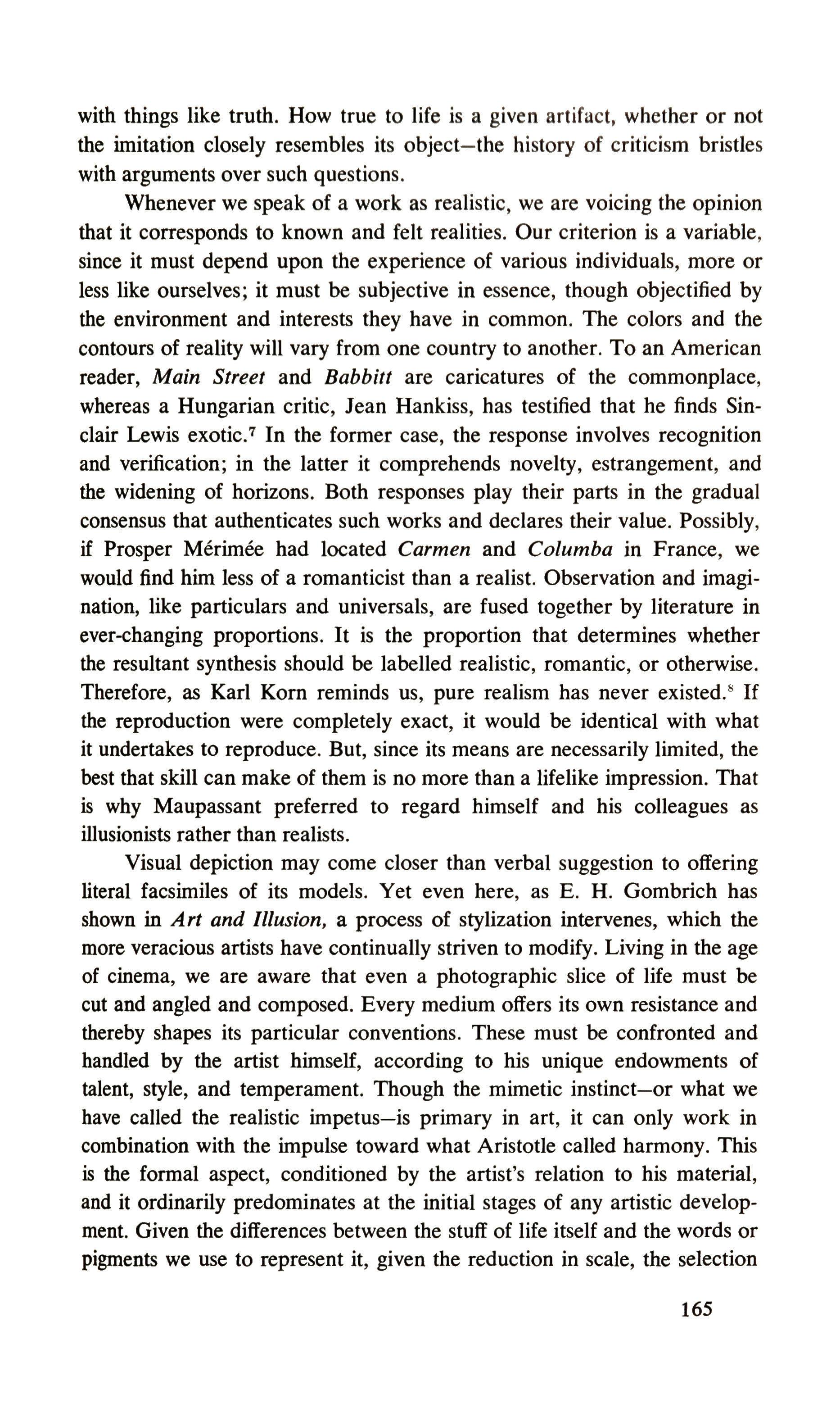
with things like truth. How true to life is a given artifact, whether or not the imitation closely resembles its object the history of criticism bristles with arguments over such questions. Whenever we speak of a work as realistic, we are voicing the opinion that it corresponds to known and felt realities. Our criterion is a variable, since it must depend upon the experience of various individuals, more or less like ourselves; it must be subjective in essence, though objectified by the environment and interests they have in common. The colors and the contours of reality will vary from one country to another. To an American reader, Main Street and Babbitt are caricatures of the commonplace, whereas a Hungarian critic, Jean Hankiss, has testified that he finds Sinclair Lewis exotic." In the former case, the response involves recognition and verification; in the latter it comprehends novelty, estrangement, and the widening of horizons. Both responses play their parts in the gradual consensus that authenticates such works and declares their value. Possibly, if Prosper Merimee had located Carmen and Columba in France, we would find him less of a romanticist than a realist. Observation and imagination, like particulars and universals, are fused together by literature in ever-changing proportions. It is the proportion that determines whether the resultant synthesis should be labelled realistic, romantic, or otherwise. Therefore, as Karl Kom reminds us, pure realism has never existed." If the reproduction were completely exact, it would be identical with what it undertakes to reproduce. But, since its means are necessarily limited, the best that skill can make of them is no more than a lifelike impression. That is why Maupassant preferred to regard himself and his colleagues as illusionists rather than realists.
Visual depiction may come closer than verbal suggestion to offering literal facsimiles of its models. Yet even here, as E. H. Gombrich has shown in Art and Illusion, a process of stylization intervenes, which the more veracious artists have continually striven to modify. Living in the age of cinema, we are aware that even a photographic slice of life must be cut and angled and composed. Every medium offers its own resistance and thereby shapes its particular conventions. These must be confronted and handled by the artist himself, according to his unique endowments of talent, style, and temperament. Though the mimetic instinct or what we have called the realistic impetus is primary in art, it can only work in combination with the impulse toward what Aristotle called harmony. This is the formal aspect, conditioned by the artist's relation to his material, and it ordinarily predominates at the initial stages of any artistic development. Given the differences between the stuff of life itself and the words or pigments we use to represent it, given the reduction in scale, the selection
165
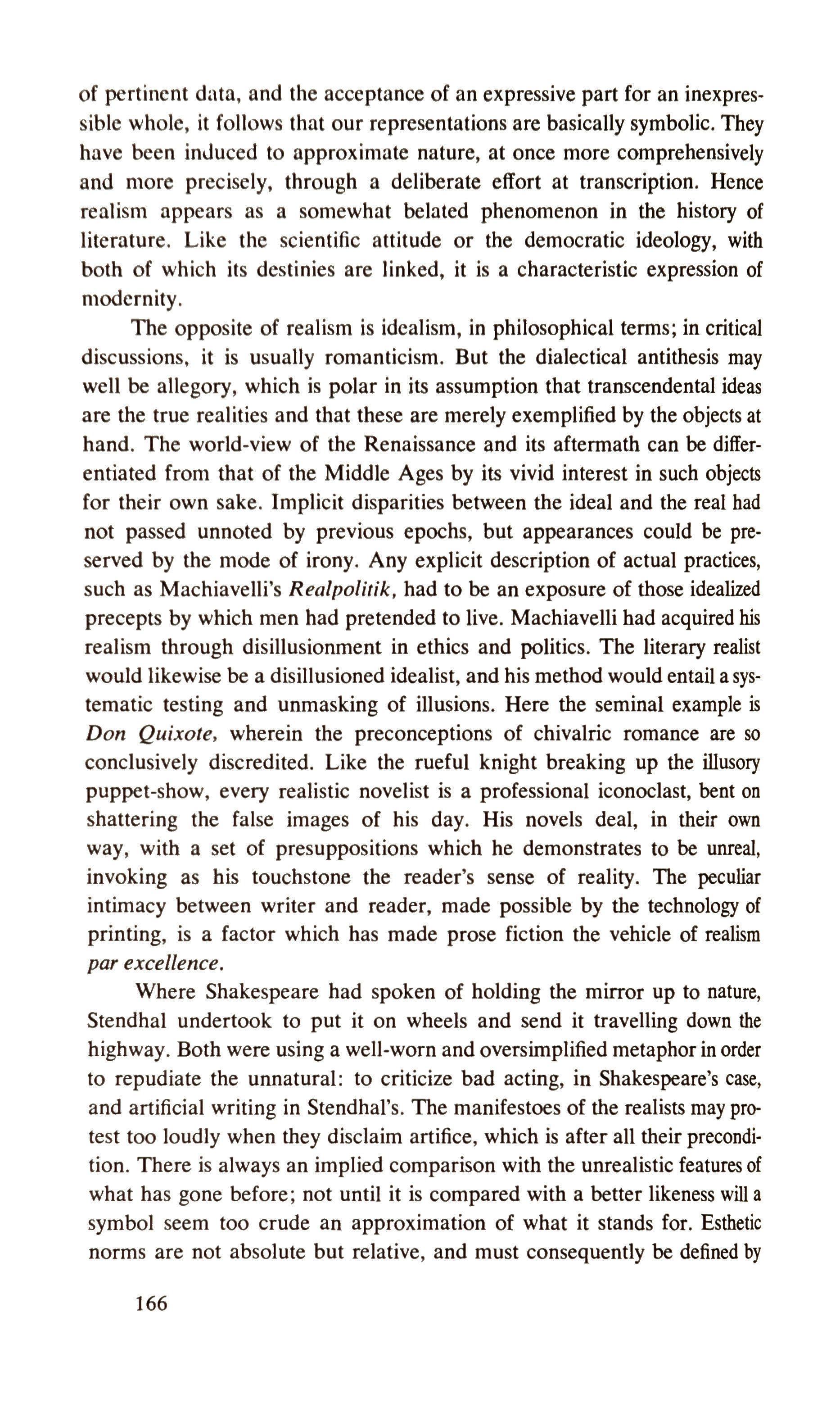
of pertinent data, and the acceptance of an expressive part for an inexpressible whole, it follows that our representations are basically symbolic. They have been induced to approximate nature, at once more comprehensively and more precisely, through a deliberate effort at transcription. Hence realism appears as a somewhat belated phenomenon in the history of literature. Like the scientific attitude or the democratic ideology, with both of which its destinies are linked, it is a characteristic expression of modernity,
The opposite of realism is idealism, in philosophical terms; in critical discussions, it is usually romanticism. But the dialectical antithesis may well be allegory, which is polar in its assumption that transcendental ideas are the true realities and that these are merely exemplified by the objects at hand. The world-view of the Renaissance and its aftermath can be differentiated from that of the Middle Ages by its vivid interest in such objects for their own sake. Implicit disparities between the ideal and the real had not passed unnoted by previous epochs, but appearances could be preserved by the mode of irony. Any explicit description of actual practices, such as Machiavelli's Realpolitik, had to be an exposure of those idealized precepts by which men had pretended to live. Machiavelli had acquired his realism through disillusionment in ethics and politics. The literary realist would likewise be a disillusioned idealist, and his method would entail a systematic testing and unmasking of illusions. Here the seminal example is Don Quixote, wherein the preconceptions of chivalric romance are so conclusively discredited. Like the rueful knight breaking up the illusory puppet-show, every realistic novelist is a professional iconoclast, bent on shattering the false images of his day. His novels deal, in their own way, with a set of presuppositions which he demonstrates to be unreal, invoking as his touchstone the reader's sense of reality. The peculiar intimacy between writer and reader, made possible by the technology of printing, is a factor which has made prose fiction the vehicle of realism par excellence.
Where Shakespeare had spoken of holding the mirror up to nature, Stendhal undertook to put it on wheels and send it travelling down the highway. Both were using a well-worn and oversimplified metaphor in order to repudiate the unnatural: to criticize bad acting, in Shakespeare's case, and artificial writing in Stendhal's. The manifestoes of the realists may protest too loudly when they disclaim artifice, which is after all their precondition. There is always an implied comparison with the unrealistic features of what has gone before; not until it is compared with a better likeness will a symbol seem too crude an approximation of what it stands for. Esthetic norms are not absolute but relative, and must consequently be defined by
166
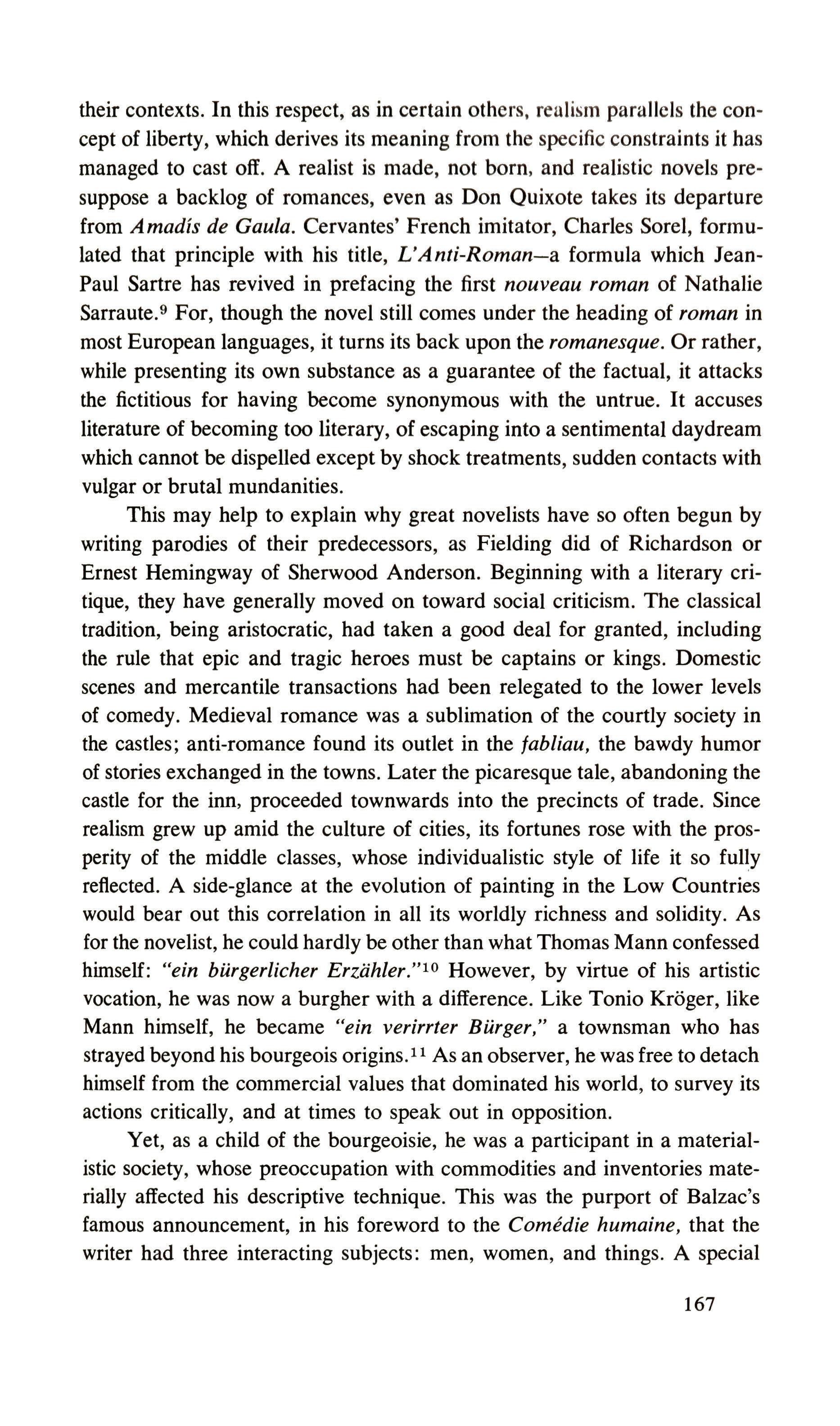
their contexts. In this respect, as in certain others. realism parallels the concept of liberty, which derives its meaning from the specific constraints it has managed to cast off. A realist is made, not born. and realistic novels presuppose a backlog of romances, even as Don Quixote takes its departure from Amadis de Gaula. Cervantes' French imitator, Charles Sorel, formulated that principle with his title, L'Anti-Roman a formula which JeanPaul Sartre has revived in prefacing the first nouveau roman of Nathalie Sarraute.? For, though the novel still comes under the heading of roman in most European languages, it turns its back upon the romanesque. Or rather, while presenting its own substance as a guarantee of the factual, it attacks the fictitious for having become synonymous with the untrue. It accuses literature of becoming too literary, of escaping into a sentimental daydream which cannot be dispelled except by shock treatments, sudden contacts with vulgar or brutal mundanities.
This may help to explain why great novelists have so often begun by writing parodies of their predecessors, as Fielding did of Richardson or Ernest Hemingway of Sherwood Anderson. Beginning with a literary critique, they have generally moved on toward social criticism. The classical tradition, being aristocratic, had taken a good deal for granted, including the rule that epic and tragic heroes must be captains or kings. Domestic scenes and mercantile transactions had been relegated to the lower levels of comedy. Medieval romance was a sublimation of the courtly society in the castles; anti-romance found its outlet in the fabliau, the bawdy humor of stories exchanged in the towns. Later the picaresque tale, abandoning the castle for the inn, proceeded townwards into the precincts of trade. Since realism grew up amid the culture of cities, its fortunes rose with the prosperity of the middle classes, whose individualistic style of life it so fully reflected. A side-glance at the evolution of painting in the Low Countries would bear out this correlation in all its worldly richness and solidity. As for the novelist, he could hardly be other than what Thomas Mann confessed himself: "ein biirgerlicher Erzahlerrt» However, by virtue of his artistic vocation, he was now a burgher with a difference. Like Tonio Kroger, like Mann himself, he became "ein verirrter Burger," a townsman who has strayed beyond his bourgeois origins."! As an observer, he was free to detach himself from the commercial values that dominated his world, to survey its actions critically, and at times to speak out in opposition.
Yet, as a child of the bourgeoisie, he was a participant in a materialistic society, whose preoccupation with commodities and inventories materially affected his descriptive technique. This was the purport of Balzac's famous announcement, in his foreword to the Comedie humaine, that the writer had three interacting subjects: men, women, and things. A special
167
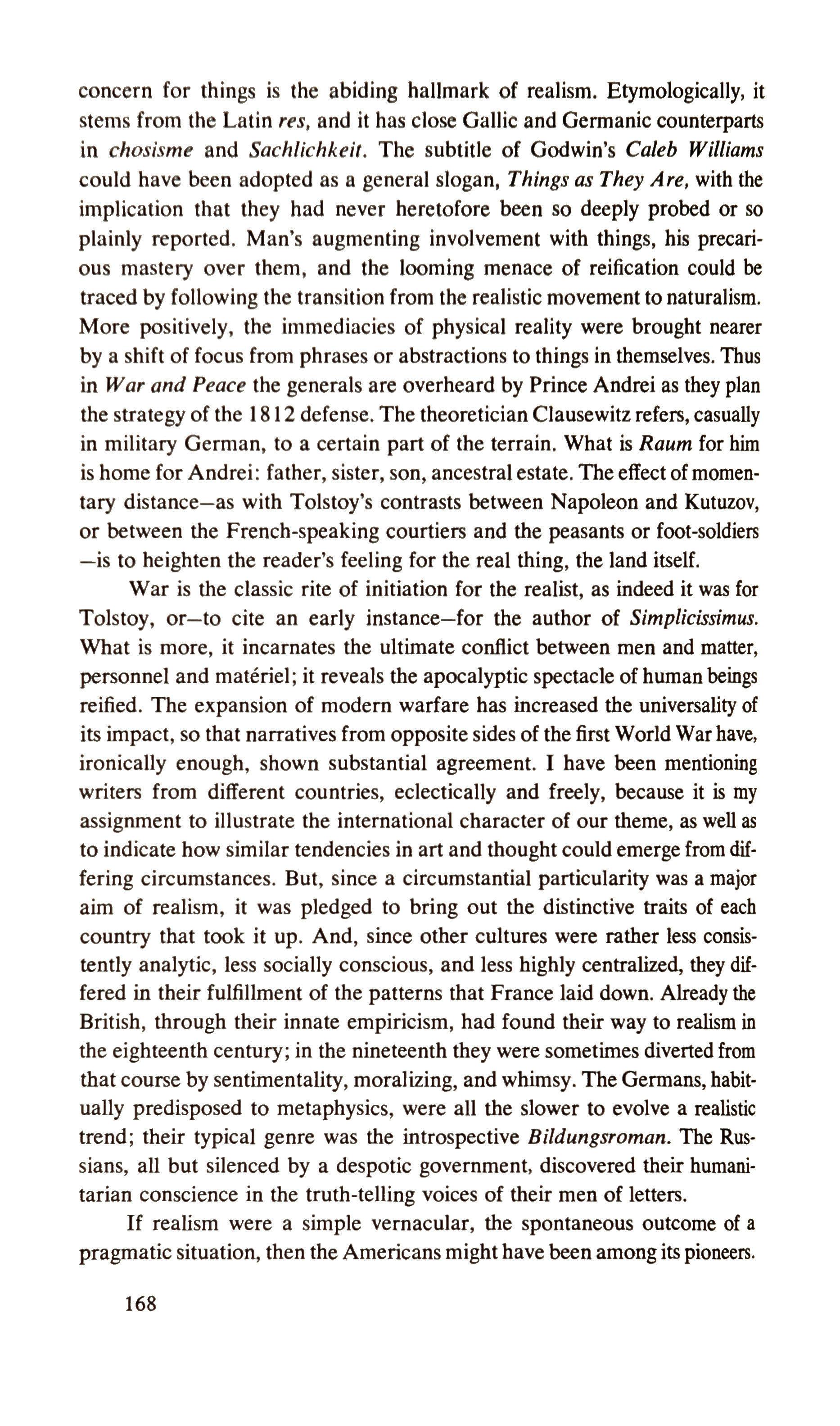
concern for things is the abiding hallmark of realism. Etymologically, it stems from the Latin res, and it has close Gallic and Germanic counterparts in chosisme and Sachlichkeit, The subtitle of Godwin's Caleb Williams could have been adopted as a general slogan, Things as They Are, with the implication that they had never heretofore been so deeply probed or so plainly reported. Man's augmenting involvement with things, his precarious mastery over them, and the looming menace of reification could be traced by following the transition from the realistic movement to naturalism. More positively, the immediacies of physical reality were brought nearer by a shift of focus from phrases or abstractions to things in themselves. Thus in War and Peace the generals are overheard by Prince Andrei as they plan the strategy of the 1812 defense. The theoretician Clausewitz refers, casually in military German, to a certain part of the terrain. What is Raum for him is home for Andrei: father, sister, son, ancestral estate. The effect of momentary distance as with Tolstoy'S contrasts between Napoleon and Kutuzov, or between the French-speaking courtiers and the peasants or foot-soldiers -is to heighten the reader's feeling for the real thing, the land itself. War is the classic rite of initiation for the realist, as indeed it was for Tolstoy, or to cite an early instance for the author of Simplicissimus. What is more, it incarnates the ultimate conflict between men and matter, personnel and materiel; it reveals the apocalyptic spectacle of human beings reified. The expansion of modem warfare has increased the universality of its impact, so that narratives from opposite sides of the first World War have, ironically enough, shown substantial agreement. I have been mentioning writers from different countries, eclectically and freely, because it is my assignment to illustrate the international character of our theme, as well as to indicate how similar tendencies in art and thought could emerge from differing circumstances. But, since a circumstantial particularity was a major aim of realism, it was pledged to bring out the distinctive traits of each country that took it up. And, since other cultures were rather less consistently analytic, less socially conscious, and less highly centralized, they differed in their fulfillment of the patterns that France laid down. Already the British, through their innate empiricism, had found their way to realism in the eighteenth century; in the nineteenth they were sometimes diverted from that course by sentimentality, moralizing, and whimsy, The Germans, habitually predisposed to metaphysics, were all the slower to evolve a realistic trend; their typical genre was the introspective Bildungsroman. The Russians, all but silenced by a despotic government, discovered their humanitarian conscience in the truth-telling voices of their men of letters. If realism were a simple vernacular, the spontaneous outcome of a pragmatic situation, then the Americans might have been a Inong its pioneers.
168
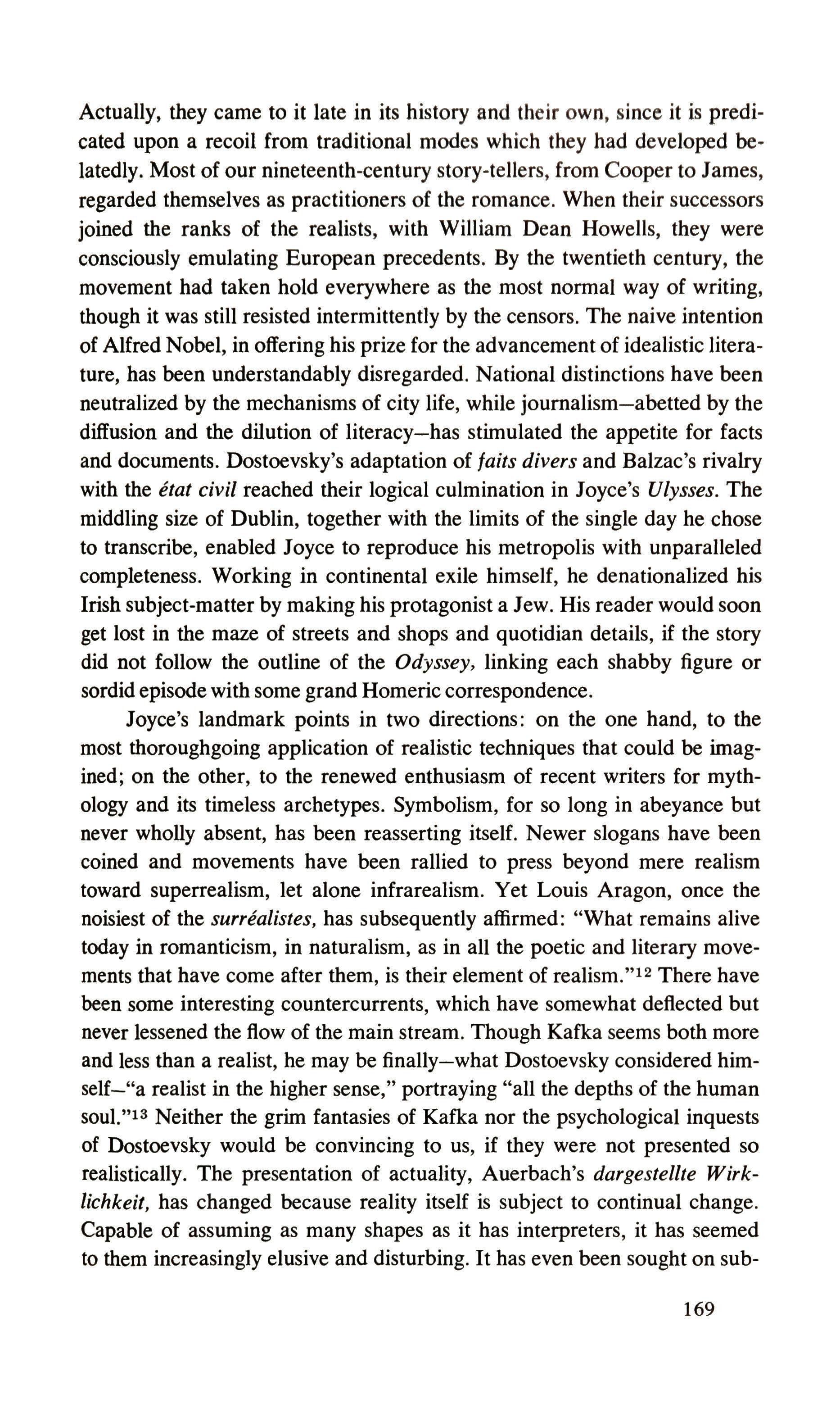
Actually, they came to it late in its history and their own, since it is predicated upon a recoil from traditional modes which they had developed belatedly. Most of our nineteenth-century story-tellers, from Cooper to James, regarded themselves as practitioners of the romance. When their successors joined the ranks of the realists, with William Dean Howells, they were consciously emulating European precedents. By the twentieth century, the movement had taken hold everywhere as the most normal way of writing, though it was still resisted intermittently by the censors. The naive intention of Alfred Nobel, in offering his prize for the advancement of idealistic literature, has been understandably disregarded. National distinctions have been neutralized by the mechanisms of city life, while journalism abetted by the diffusion and the dilution of literacy has stimulated the appetite for facts and documents. Dostoevsky's adaptation of faits divers and Balzac's rivalry with the etat civil reached their logical culmination in Joyce's Ulysses. The middling size of Dublin, together with the limits of the single day he chose to transcribe, enabled Joyce to reproduce his metropolis with unparalleled completeness. Working in continental exile himself, he denationalized his Irish subject-matter by making his protagonist a Jew. His reader would soon get lost in the maze of streets and shops and quotidian details, if the story did not follow the outline of the Odyssey, linking each shabby figure or sordid episode with some grand Homeric correspondence. Joyce's landmark points in two directions: on the one hand, to the most thoroughgoing application of realistic techniques that could be imagined; on the other, to the renewed enthusiasm of recent writers for mythology and its timeless archetypes. Symbolism, for so long in abeyance but never wholly absent, has been reasserting itself. Newer slogans have been coined and movements have been rallied to press beyond mere realism toward superrealism, let alone infrarealism. Yet Louis Aragon, once the noisiest of the surrealistes, has subsequently affirmed: "What remains alive today in romanticism, in naturalism, as in all the poetic and literary movements that have come after them, is their element of realism."12 There have been some interesting countercurrents, which have somewhat deflected but never lessened the flow of the main stream. Though Kafka seems both more and less than a realist, he may be finally what Dostoevsky considered himself "a realist in the higher sense," portraying "all the depths of the human sOUl."13 Neither the grim fantasies of Kafka nor the psychological inquests of Dostoevsky would be convincing to us, if they were not presented so realistically. The presentation of actuality, Auerbach's dargestellte Wirklichkeit, has changed because reality itself is subject to continual change. Capable of assuming as many shapes as it has interpreters, it has seemed to them increasingly elusive and disturbing. It has even been sought on sub-
169
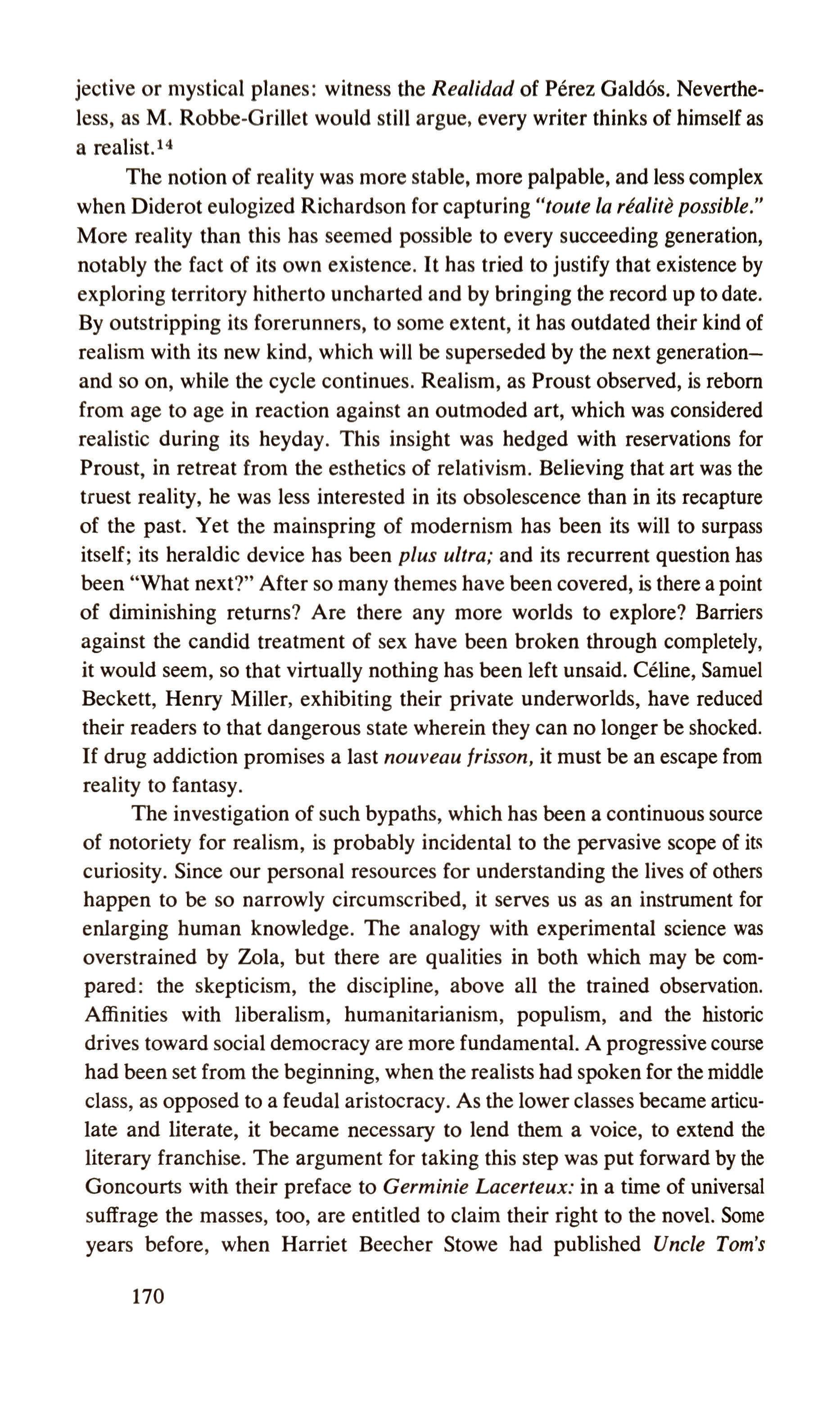
jective or mystical planes: witness the Realidad of Perez Gald6s. Nevertheless, as M. Robbe-Grillet would still argue, every writer thinks of himself as a realist.ts
The notion of reality was more stable, more palpable, and less complex when Diderot eulogized Richardson for capturing "toute la realite possible." More reality than this has seemed possible to every succeeding generation, notably the fact of its own existence. It has tried to justify that existence by exploring territory hitherto uncharted and by bringing the record up to date. By outstripping its forerunners, to some extent, it has outdated their kind of realism with its new kind, which will be superseded by the next generationand so on, while the cycle continues. Realism, as Proust observed, is reborn from age to age in reaction against an outmoded art, which was considered realistic during its heyday. This insight was hedged with reservations for Proust, in retreat from the esthetics of relativism. Believing that art was the truest reality, he was less interested in its obsolescence than in its recapture of the past. Yet the mainspring of modernism has been its will to surpass itself; its heraldic device has been plus ultra,' and its recurrent question has been "What next?" After so many themes have been covered, is there a point of diminishing returns? Are there any more worlds to explore? Barriers against the candid treatment of sex have been broken through completely, it would seem, so that virtually nothing has been left unsaid. Celine, Samuel Beckett, Henry Miller, exhibiting their private underworlds, have reduced their readers to that dangerous state wherein they can no longer be shocked. If drug addiction promises a last nouveau irlsson, it must be an escape from reality to fantasy.
The investigation of such bypaths, which has been a continuous source of notoriety for realism, is probably incidental to the pervasive scope of its curiosity. Since our personal resources for understanding the lives of others happen to be so narrowly circumscribed, it serves us as an instrument for enlarging human knowledge. The analogy with experimental science was overstrained by Zola, but there are qualities in both which may be compared: the skepticism, the discipline, above all the trained observation. Affinities with liberalism, humanitarianism, populism, and the historic drives toward social democracy are more fundamental. A progressive course had been set from the beginning, when the realists had spoken for the middle class, as opposed to a feudal aristocracy. As the lower classes became articulate and literate, it became necessary to lend them a voice, to extend the literary franchise. The argument for taking this step was put forward by the Goncourts with their preface to Germinie Lacerteux.· in a time of universal suffrage the masses, too, are entitled to claim their right to the novel. Some years before, when Harriet Beecher Stowe had published Uncle Tom's
170
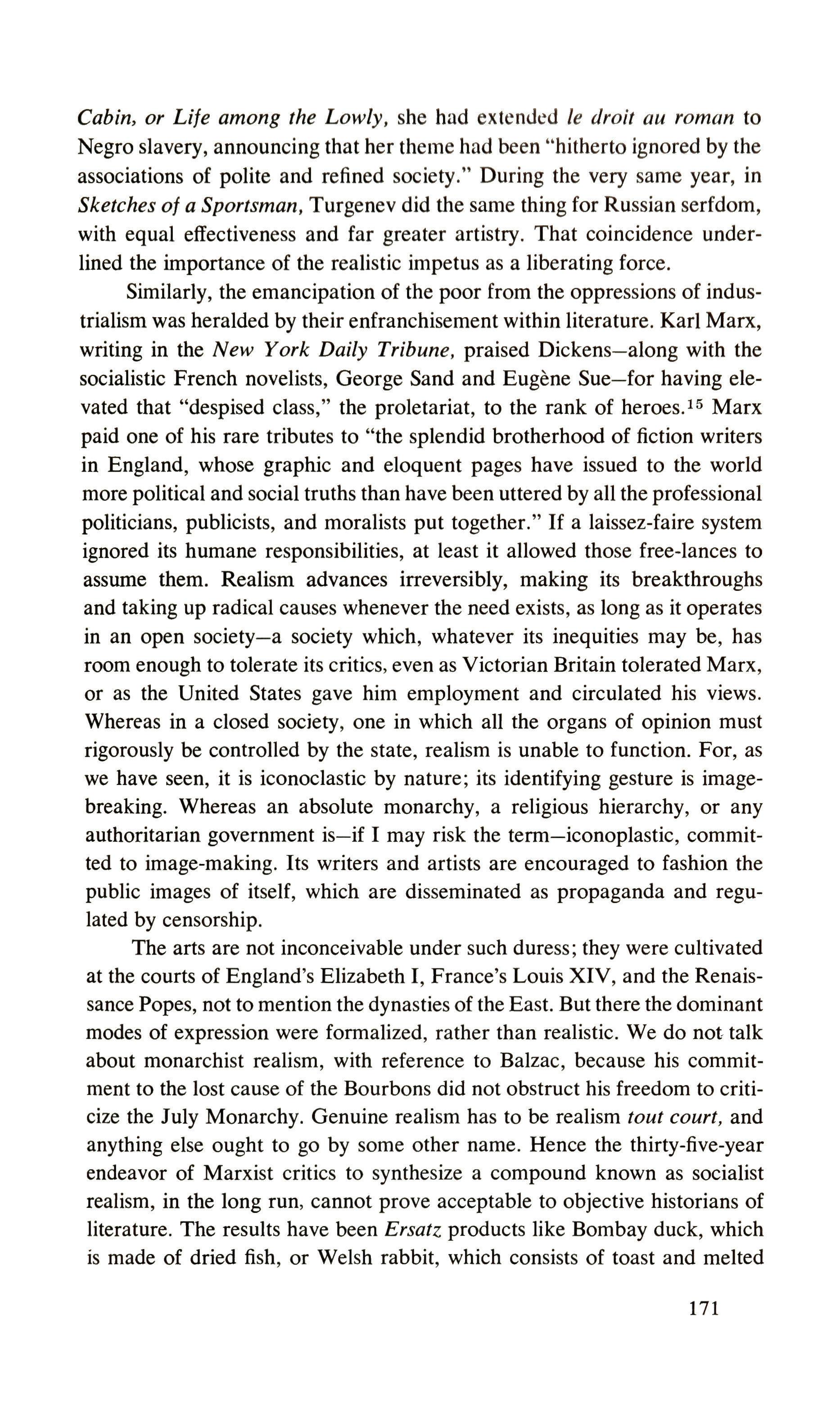
Cabin, or Life among the Lowly, she had extended Ie droit au roman to Negro slavery, announcing that her theine had been "hitherto ignored by the associations of polite and refined society." During the very same year, in Sketches of a Sportsman, Turgenev did the same thing for Russian serfdom, with equal effectiveness and far greater artistry. That coincidence underlined the importance of the realistic impetus as a liberating force.
Similarly, the emancipation of the poor from the oppressions of industrialism was heralded by their enfranchisement within literature. Karl Marx, writing in the New York Daily Tribune, praised Dickens along with the socialistic French novelists, George Sand and Eugene Sue for having elevated that "despised class," the proletariat, to the rank of heroes.P Marx paid one of his rare tributes to "the splendid brotherhood of fiction writers in England, whose graphic and eloquent pages have issued to the world more political and social truths than have been uttered by all the professional politicians, publicists, and moralists put together." If a laissez-faire system ignored its humane responsibilities, at least it allowed those free-lances to assume them. Realism advances irreversibly, making its breakthroughs and taking up radical causes whenever the need exists, as long as it operates in an open society a society which, whatever its inequities may be, has room enough to tolerate its critics, even as Victorian Britain tolerated Marx, or as the United States gave him employment and circulated his views. Whereas in a closed society, one in which all the organs of opinion must rigorously be controlled by the state, realism is unable to function. For, as we have seen, it is iconoclastic by nature; its identifying gesture is imagebreaking. Whereas an absolute monarchy, a religious hierarchy, or any authoritarian government is if I may risk the term iconoplastic, committed to image-making. Its writers and artists are encouraged to fashion the public images of itself, which are disseminated as propaganda and regulated by censorship.
The arts are not inconceivable under such duress; they were cultivated at the courts of England's Elizabeth I, France's Louis XIV, and the Renaissance Popes, not to mention the dynasties of the East. But there the dominant modes of expression were formalized, rather than realistic. We do not talk about monarchist realism, with reference to Balzac, because his commitment to the lost cause of the Bourbons did not obstruct his freedom to criticize the July Monarchy. Genuine realism has to be realism tout court, and anything else ought to go by some other name. Hence the thirty-five-year endeavor of Marxist critics to synthesize a compound known as socialist realism, in the long run, cannot prove acceptable to objective historians of literature. The results have been Ersatz products like Bombay duck, which is made of dried fish, or Welsh rabbit, which consists of toast and melted
171
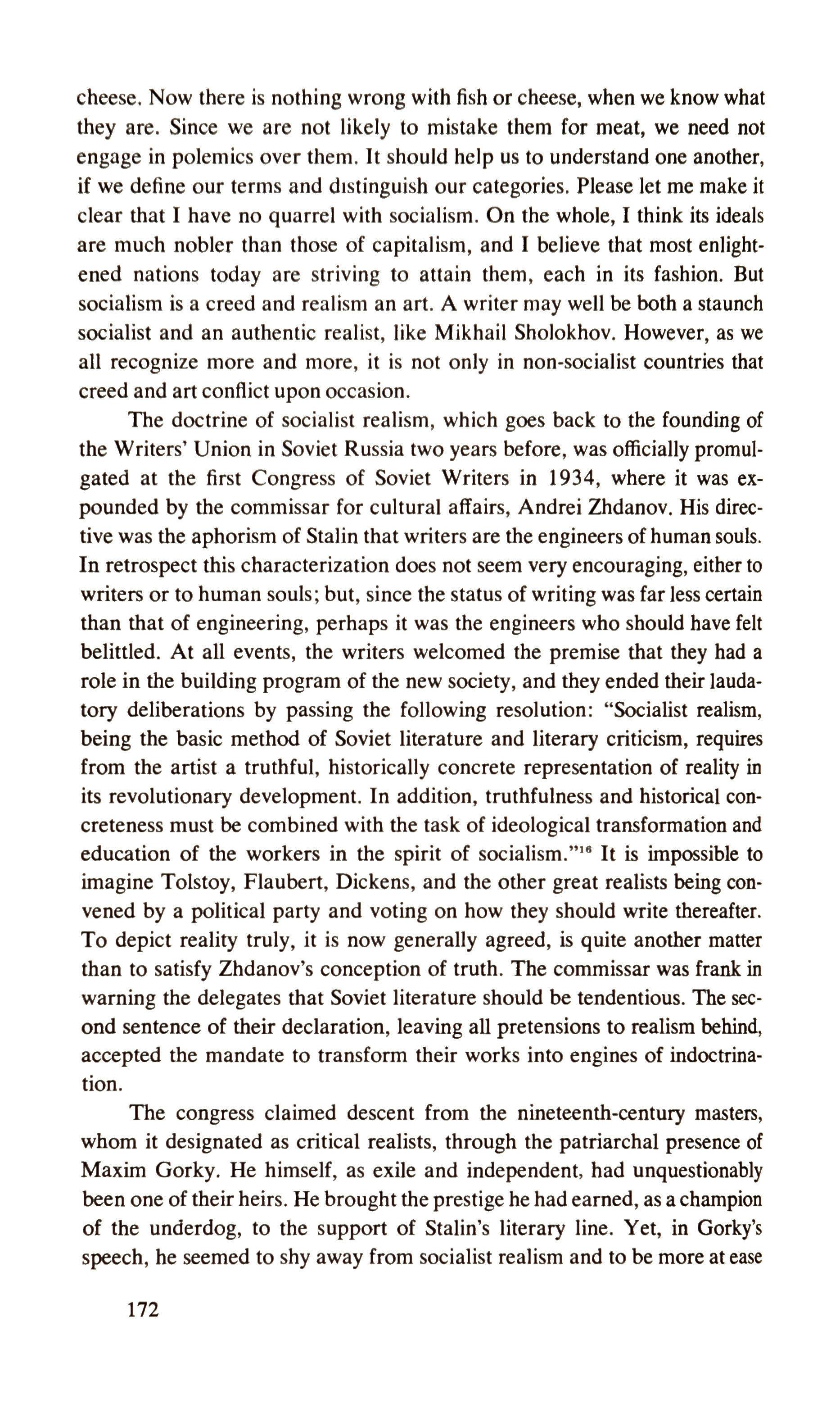
cheese. Now there is nothing wrong with fish or cheese, when we know what they are. Since we are not likely to mistake them for meat, we need not engage in polemics over them. It should help us to understand one another, if we define our terms and distinguish our categories. Please let me make it clear that I have no quarrel with socialism. On the whole, I think its ideals are much nobler than those of capitalism, and I believe that most enlightened nations today are striving to attain them, each in its fashion. But socialism is a creed and realism an art. A writer may well be both a staunch socialist and an authentic realist, like Mikhail Sholokhov. However, as we all recognize more and more, it is not only in non-socialist countries that creed and art conflict upon occasion.
The doctrine of socialist realism, which goes back to the founding of the Writers' Union in Soviet Russia two years before, was officially promulgated at the first Congress of Soviet Writers in 1934, where it was expounded by the commissar for cultural affairs, Andrei Zhdanov. His directive was the aphorism of Stalin that writers are the engineers of human souls. In retrospect this characterization does not seem very encouraging, either to writers or to human souls; but, since the status of writing was far less certain than that of engineering, perhaps it was the engineers who should have felt belittled. At all events, the writers welcomed the premise that they had a role in the building program of the new society, and they ended their laudatory deliberations by passing the following resolution: "Socialist realism, being the basic method of Soviet literature and literary criticism, requires from the artist a truthful, historically concrete representation of reality in its revolutionary development. In addition, truthfulness and historical concreteness must be combined with the task of ideological transformation and education of the workers in the spirit of socialism. "18 It is impossible to imagine Tolstoy, Flaubert, Dickens, and the other great realists being convened by a political party and voting on how they should write thereafter. To depict reality truly, it is now generally agreed, is quite another matter than to satisfy Zhdanov's conception of truth. The commissar was frank in warning the delegates that Soviet literature should be tendentious. The second sentence of their declaration, leaving all pretensions to realism behind, accepted the mandate to transform their works into engines of indoctrination.
The congress claimed descent from the nineteenth-century masters, whom it designated as critical realists, through the patriarchal presence of Maxim Gorky. He himself, as exile and independent, had unquestionably been one of their heirs. He brought the prestige he had earned, as a champion of the underdog, to the support of Stalin's literary line. Yet, in Gorky's speech, he seemed to shy away from socialist realism and to be more at ease
172

with the alternative slogan of revolutionary romanticism. His emphasis on myth and wish-fulfillment throws light back upon his own proletarian fictions, as well as upon the transition that he was sponsoring. Much earlier, in a letter to Chekhov, he had exclaimed, "To hell with realism!"!" He had gone on to adumbrate his later position: "Present-day literature must definitely begin to color our life and, as soon as it does, life itself will acquire color." This is the optative mood that would produce an overwhelming number of travel-poster novels, realistic in the reportage of industrial and agrarian detail, romantic in their projection of a collective wish-dream. Their exemplar was not Tolstoy, who refused to acknowledge any hero but truth; it was the ideologue Chernyshevsky, who had exhibited a wooden model for their positive heroes in his didactic novel, What Is to Be Done? What indeed? Chto delat"! The answer would be a blueprint of the utopian future, the compulsory optimism of a happy ending, a heroic idealization of daily labor. Appropriately, the Soviet Encyclopedia connects the epic with socialist realism. Andrei Sinyavsky has suggested that socialist classicism would be a more accurate phrase." Myths have been propagated, under whatever name.
Yet the realistic impetus, flowing deeply underground, was ready to re-emerge with the thaw of de-Stalinization. The second Congress of Soviet Writers, held twenty years after the first, rather than three as originally planned, was permitted to approve a more flexible set of statutes. The second sentence, the ideological proviso, was dropped from the official definition of socialist realism. Though the adjective was still the rubber stamp of bureaucratic approval, at a vociferous conference of the Gorky Institute in 1957, a cautious interest was taken in what the unqualified noun has meant to the rest of the world. 19 Dr. Zhivago's question, "Where is reality in Russia today?," could not have been asked directly in Pasternak's homeland. But younger writers, like Alexander Solzhenitsyn, were soon to raise questions of their own in the penetrating vein of the older realists. Sinyavsky is now in prison for having published abroad, together with his brave and sharp brochure On Socialist Realism, certain satirical ventures into what he terms fantastic realism, under the pseudonym of Abram Tertz. His public trial in 1966, with Yuli Daniel, marked a crisis might we hope a turning point? A picture looks somewhat brighter when its darkest aspects are exposed to the light. It must be ruefully added that, even while socialist realism has been relaxing its coercion in Russia, it has been pushed to fanatical extremes in Communist China, where Mao Tse-tung adopted it as a device for regulating the intellectuals. Some of them, by their dissent, have been living up to the more liberal traditions of critical realism.s?
I echo this last phrase by way of retreating to the common ground that
173
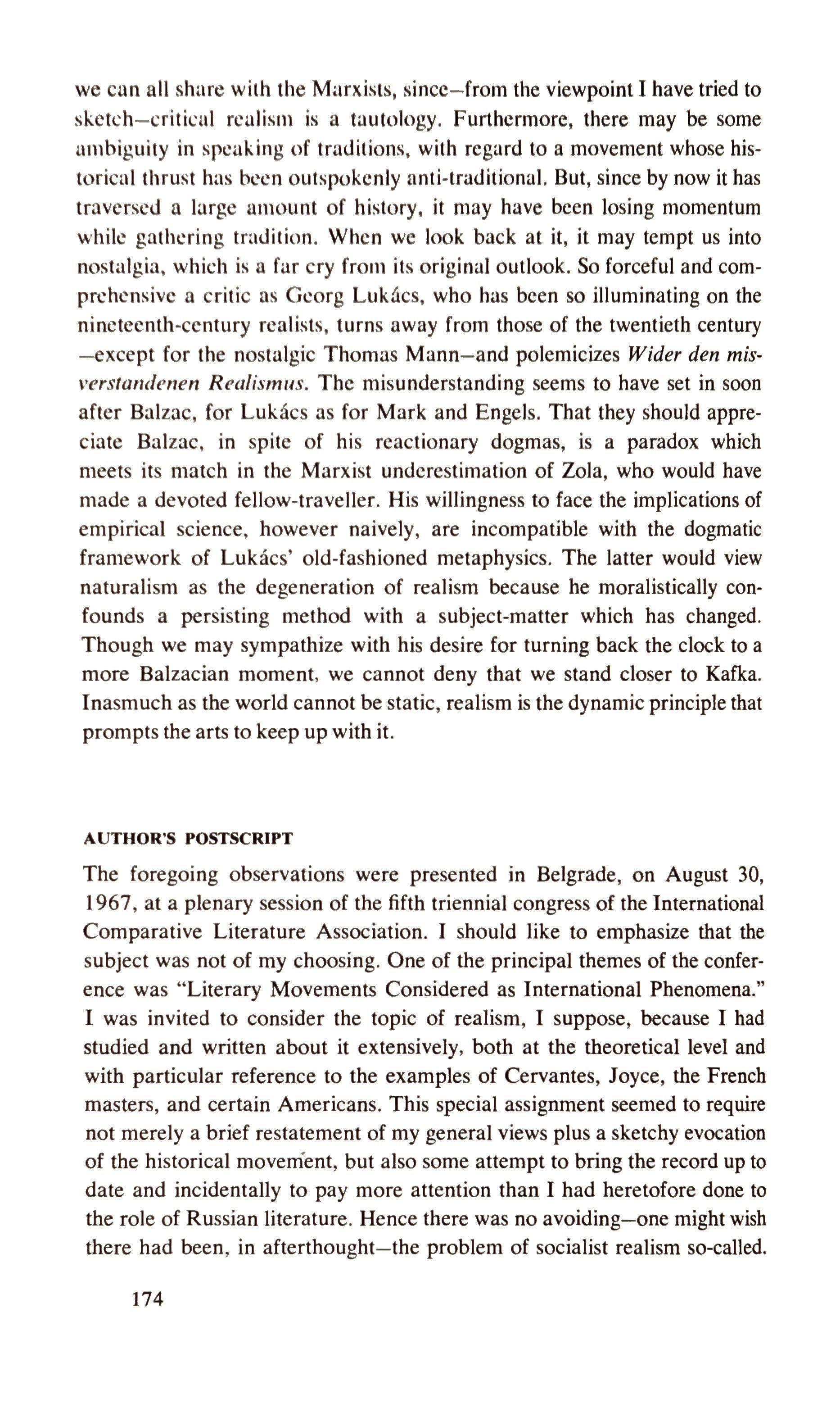
we can all share with the Marxists, since-from the viewpoint I have tried to sketch critical realism is a tautology, Furthermore, there may be some ambiguity in speaking of traditions, with regard to a movement whose historical thrust has been outspokenly anti-traditional. But, since by now it has traversed a large amount of history, it may have been losing momentum while gathering tradition. When we look back at it, it may tempt us into nostalgia, which is a far cry from its original outlook. So forceful and comprehensive a critic as Georg Lukacs, who has been so illuminating on the nineteenth-century realists, turns away from those of the twentieth century =except for the nostalgic Thomas Mann-and polemicizes Wider den misverstandenen Realismus. The misunderstanding seems to have set in soon after Balzac, for Lukacs as for Mark and Engels. That they should appreciate Balzac, in spite of his reactionary dogmas, is a paradox which meets its match in the Marxist underestimation of Zola, who would have made a devoted fellow-traveller. His willingness to face the implications of empirical science, however naively, are incompatible with the dogmatic framework of Lukacs' old-fashioned metaphysics. The latter would view naturalism as the degeneration of realism because he moralistically confounds a persisting method with a subject-matter which has changed. Though we may sympathize with his desire for turning back the clock to a more Balzacian moment, we cannot deny that we stand closer to Kafka. Inasmuch as the world cannot be static, realism is the dynamic principle that prompts the arts to keep up with it.
AUTHOR'S POSTSCRIPT
The foregoing observations were presented in Belgrade, on August 30, 1967, at a plenary session of the fifth triennial congress of the International Comparative Literature Association. I should like to emphasize that the subject was not of my choosing. One of the principal themes of the conference was "Literary Movements Considered as International Phenomena." I was invited to consider the topic of realism, I suppose, because I had studied and written about it extensively, both at the theoretical level and with particular reference to the examples of Cervantes, Joyce, the French masters, and certain Americans. This special assignment seemed to require not merely a brief restatement of my general views plus a sketchy evocation of the historical movement, but also some attempt to bring the record up to date and incidentally to pay more attention than I had heretofore done to the role of Russian literature. Hence there was no avoiding one might wish there had been, in afterthought the problem of socialist realism so-called.
174
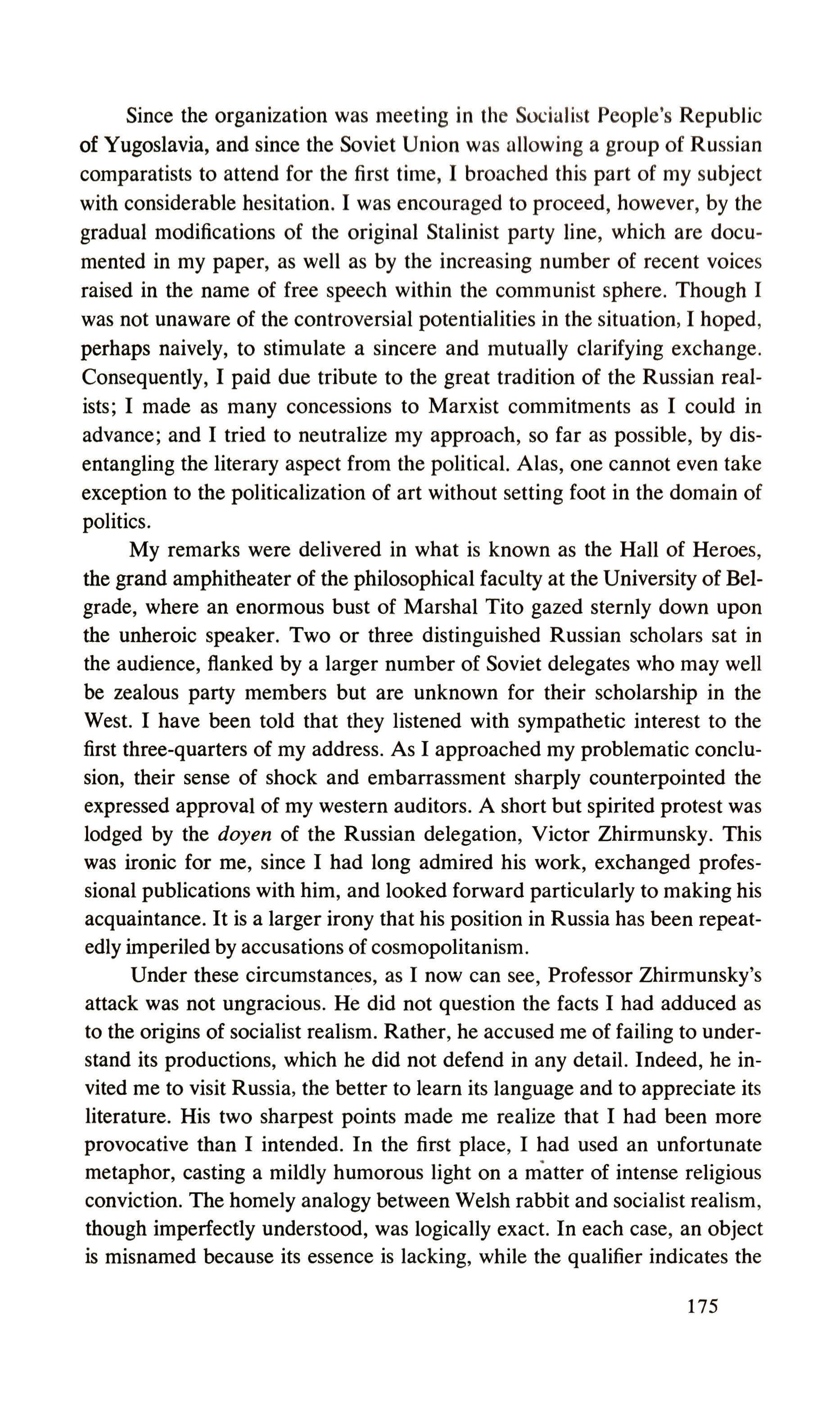
Since the organization was meeting in the Socialist People's Republic of Yugoslavia, and since the Soviet Union was allowing a group of Russian comparatists to attend for the first time, I broached this part of my subject with considerable hesitation. I was encouraged to proceed, however, by the gradual modifications of the original Stalinist party line, which are documented in my paper, as well as by the increasing number of recent voices raised in the name of free speech within the communist sphere. Though I was not unaware of the controversial potentialities in the situation, I hoped, perhaps naively, to stimulate a sincere and mutually clarifying exchange. Consequently, I paid due tribute to the great tradition of the Russian realists; I made as many concessions to Marxist commitments as I could in advance; and I tried to neutralize my approach, so far as possible, by disentangling the literary aspect from the political. Alas, one cannot even take exception to the politicalization of art without setting foot in the domain of politics.
My remarks were delivered in what is known as the Hall of Heroes, the grand amphitheater of the philosophical faculty at the University of Belgrade, where an enormous bust of Marshal Tito gazed sternly down upon the unheroic speaker. Two or three distinguished Russian scholars sat in the audience, flanked by a larger number of Soviet delegates who may well be zealous party members but are unknown for their scholarship in the West. I have been told that they listened with sympathetic interest to the first three-quarters of my address. As I approached my problematic conclusion, their sense of shock and embarrassment sharply counterpointed the expressed approval of my western auditors. A short but spirited protest was lodged by the doyen of the Russian delegation, Victor Zhirmunsky. This was ironic for me, since I had long admired his work, exchanged professional publications with him, and looked forward particularly to making his acquaintance. It is a larger irony that his position in Russia has been repeatedly imperiled by accusations of cosmopolitanism. Under these circumstances, as I now can see, Professor Zhirmunsky's attack was not ungracious. He did not question the facts I had adduced as to the origins of socialist realism. Rather, he accused me of failing to understand its productions, which he did not defend in any detail. Indeed, he invited me to visit Russia, the better to learn its language and to appreciate its literature. His two sharpest points made me realize that I had been more provocative than I intended. In the first place, I had used an unfortunate metaphor, casting a mildly humorous light on a matter of intense religious conviction. The homely analogy between Welsh rabbit and socialist realism, though imperfectly understood, was logically exact. In each case, an object is misnamed because its essence is lacking, while the qualifier indicates the
175

nature of the substitution. Realism, by my definition, is nothing if not critical. When the writer's task is not social criticism but the glorification of a regulative society, it is something else again.
My second and more serious challenge, which was more widely deplored, was my mention of Andrei Sinyavsky. Professor Zhirmunsky took the view that the case was purely political, inasmuch as Sinyavsky had committed the crime of publishing his writings abroad without permission from his government. This is a curious judgment, in view of the fact that writers like Voltaire and Victor Hugo could become heroes of literature for doing the very same thing, mutatis mutandis. I was accused of gratuitously dragging politics into an innocuous cultural discussion. My accuser failed to recognize the relevance of the allusion, since he had no way of knowing the brilliant pamphlet on socialist realism, which was the principal document that led to Sinyavsky's condemnation. Thus we, in our comparative ignorance, have access to sources of knowledge which have been withheld from Russian men of learning. If the Soviet Union has been chary in permitting them to travel, is it not precisely because their encounters with foreign colleagues may put them into contact with such knowledge?
Does this mean that, in order to secure the participation of our Marxist colleagues at international meetings, we should voluntarily subject ourselves to the constraints that have compromised their objectivity? When a gifted writer is imprisoned for his devotion to literature, I asked in my reply to Professor Zhirmunsky, should a body of literary historians and critics simply look the other way? Some of my fellow officers in the International Comparative Literature Association, who had worked hard for the laudable purpose of obtaining Russian cooperation, felt that their efforts had been jeopardized by my tactlessness. One or two of the French representatives linked it with the current blunders of American diplomacy, But, though there was a certain polarization toward the ideological extremes, the middle ground did not give way under our feet, and the dialogue ended with promises to continue. Most striking, to an inexperienced bystander who suddenly found himself at the center of a stOI'111, was the disparity between what had to be publicly professed and what might be privately believed. I suspect that there was less disagreement than officially appeared, but that the eastern Europeans are not used to speaking frankly at open sessions. A delegate from a socialist republic, which I shall not name because I do not want to get him into trouble, whispered to me in an elevator that none of his compatriots believed in socialist realism. One of our many Yugoslavian hosts confided that socialist realism was a dead horse, although there was still a suspicion that it might kick. I was asked for copies of my article with an eye toward translation and publication, not to mention official
176
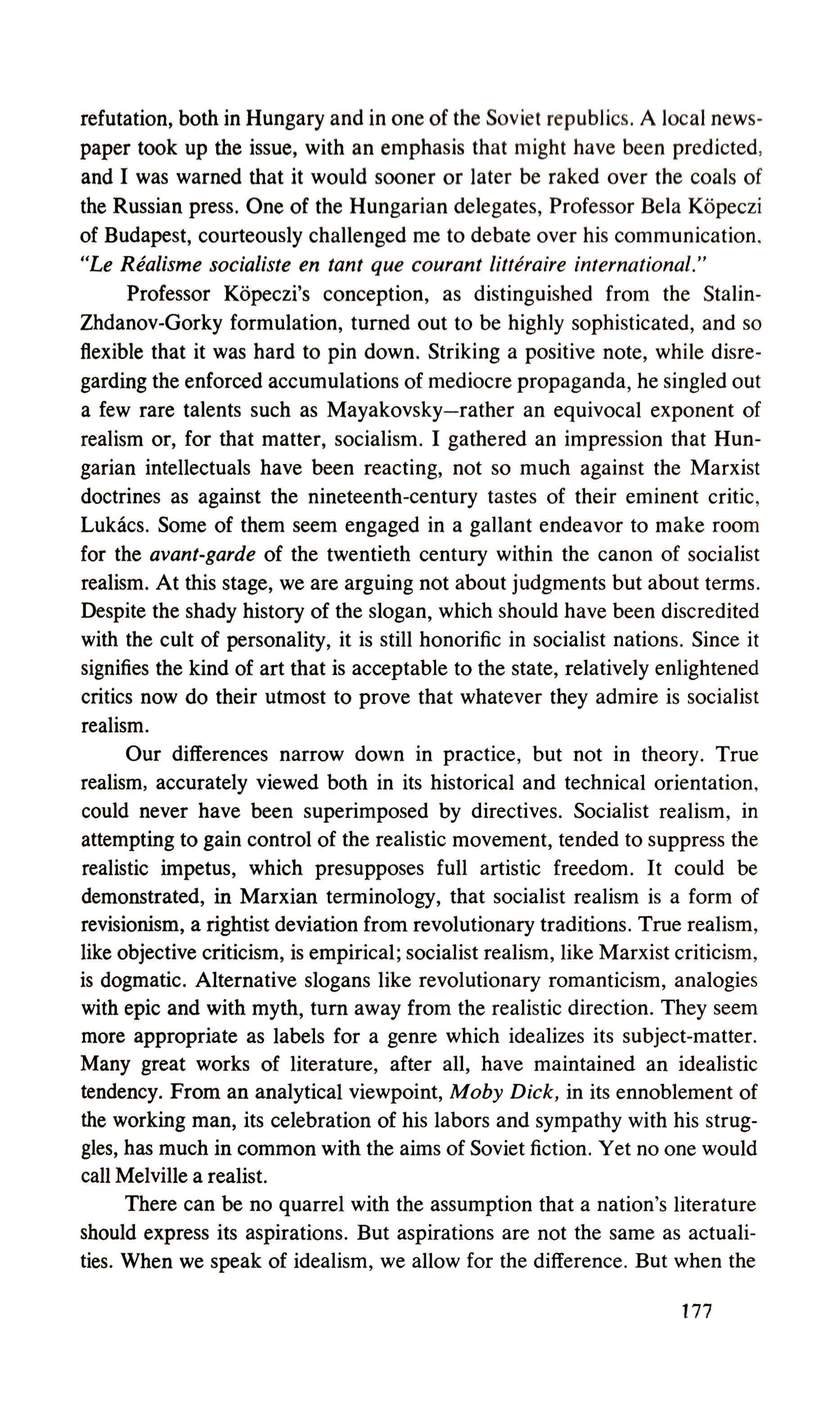
refutation, both in Hungary and in one of the Soviet republics. A local newspaper took up the issue, with an emphasis that might have been predicted, and I was warned that it would sooner or later be raked over the coals of the Russian press. One of the Hungarian delegates, Professor Bela Kopeczi of Budapest, courteously challenged me to debate over his communication, "Le Realisme socialiste en tant que courant litteraire international."
Professor Kopeczi's conception, as distinguished from the StalinZhdanov-Gorky formulation, turned out to be highly sophisticated, and so flexible that it was hard to pin down. Striking a positive note, while disregarding the enforced accumulations of mediocre propaganda, he singled out a few rare talents such as Mayakovsky rather an equivocal exponent of realism or, for that matter, socialism. I gathered an impression that Hungarian intellectuals have been reacting, not so much against the Marxist doctrines as against the nineteenth-century tastes of their eminent critic, Lukacs. Some of them seem engaged in a gallant endeavor to make room for the avant-garde of the twentieth century within the canon of socialist realism. At this stage, we are arguing not about judgments but about terms. Despite the shady history of the slogan, which should have been discredited with the cult of personality, it is still honorific in socialist nations. Since it signifies the kind of art that is acceptable to the state, relatively enlightened critics now do their utmost to prove that whatever they admire is socialist realism.
Our differences narrow down in practice, but not in theory. True realism, accurately viewed both in its historical and technical orientation, could never have been superimposed by directives. Socialist realism, in attempting to gain control of the realistic movement, tended to suppress the realistic impetus, which presupposes full artistic freedom. It could be demonstrated, in Marxian terminology, that socialist realism is a form of revisionism, a rightist deviation from revolutionary traditions. True realism, like objective criticism, is empirical; socialist realism, like Marxist criticism, is dogmatic. Alternative slogans like revolutionary romanticism, analogies with epic and with myth, turn away from the realistic direction. They seem more appropriate as labels for a genre which idealizes its subject-matter. Many great works of literature, after all, have maintained an idealistic tendency. From an analytical viewpoint, Moby Dick, in its ennoblement of the working man, its celebration of his labors and sympathy with his struggles, has much in common with the aims of Soviet fiction. Yet no one would call Melville a realist.
There can be no quarrel with the assumption that a nation's literature should express its aspirations. But aspirations are not the same as actualities. When we speak of idealism, we allow for the difference. But when the
177

term realism is applied to a work which presents a falsely harmonious picture of a difficult social reality, then readers are being wilfully led astray. Those writers who conformed to Stalin's mandate colluded with him in glossing over the bitter truths since revealed. It is to be hoped that socialist art will find a more auspicious formula, rather than persist with one which has caused such dire confusion. At all events, we must remember that critical catchwords, at best, are no more than pedagogical generalizations. Coined for our convenience, they should not get in the way of our understanding. Realism will have taught us nothing, if it does not teach us how to tell the living realities from the verbal abstractions. We ought not to become the prisoners of our own categories much less the categories of other men, who are quite as fallible as we are.
NOTES
1. Alain Robbe-Grillet, Pour un nouveau roman (Paris, 1963), p. 162.
2. Documentation for references not otherwise specified can be found in my book, The Gates 01 Horn: A Study 01 Five French Realists (New York and London, 1963).
3. Georg Brandes, Hovedstremninger i det 19. Aarhundredes Lltteratur: V, Naturalismen i England (Copenhagen, 1875).
4. Mark Twain, Letters from the Earth, ed. Bernard DeVoto (New York, 1964), p. 173.
5. Bertolt Brecht, Versuche Ll 13 (Berlin, 1954),p.l06.
6. Theodor Fontane, Schrijten zur Literatur, ed. H. H. Reuter (Berlin, 1960), p. 4.
7. Jean Hankiss, La Litterature et la vie: problematique de la creation litteraire (Sao Paulo, 1951), p. 163.
8. Karl Korn, "Le Realisme dans la litterature;" Documents. XI, 7 (July 1956), p. 732.
9. Nathalie Sarraute, Portrait d'un inconnu (Paris, 1948), p. 7.
10. Thomas Mann, Lubeck als gelstige Lebensform (Lubeck, 1926), p. 54.
11. Thomas Mann, Novellen (Berlin. 1925), II, 86.
12. Louis Aragon, Pour un realisms socialiste (Paris, 1935), p. 73.
13. See E. J. Simmons, Introduction to Russian Realism (Bloomington, Indiana, 1965), p. 104.
14. Robbe-Grillet, op. cit p. 171.
15. Quoted by Peter Demetz, Marx. Engels. and the Poets (Chicago, 1967), p. 45.
16. Pervyi vesesoiuznyi s'ezd sovetskikh pisateli: stenograficheskil otchet (Moscow, 1934). p. 716.
17. See R. W. Mathewson, Jr.• The Positive Hero in Russian Literature (New York, 1958). p. 225.
18. Abram Tertz, On Socialist Realism (New York, 1960). p. 77. Cf. On Trial: The Soviet State versus "Abram Tertz' and "Nikolai Arzhak;" ed, Max Hayward (New York, 1966)
19. Probleme des Realismus in der Weltliteratur, ed. I. Anissimov and J. Elsberg (Berlin, 1962).
20. See Merle Goldman. Literary Dissent in Communist China (Cambridge, Massachusetts, 1967).
178

How whole and perfect is the cup on my work-table with its dirty crack and dried coffee scum.
How perfect is the embossed paper napkin with circles pressed into it by the cup's bottom.
And how perfect and holy is the surface of the table with its holes to catch my penpoint.
Holy is the pain in my neck I woke up with this morning, but why doesn't it go away when I bless it?
And my past (dare I admit it at last?'), yes, that I lovelike this wall with its cracks, tackholes, and plasterpatches: It is my life, a life, and as it should be, rotten and unbearable and dear.
Everything is perfect as it is and will be perfect when it changes, as it will.
The floor is dirty, and I wash it or admire it, it's all the same.
One word is as good as another, basketball, say, or crotch-itch, or bell.
For the universe is figured over like a paisley shawl and on its surface everything we write is right.
It is a writing that's not quite pictures, not quite words, nearly music, in movement almost dance, but no more beautiful than the pain in my neck this morning when I turn my head nor more of a prayer than the word Shit I automatically say.
EDWARD FIELD
ecu
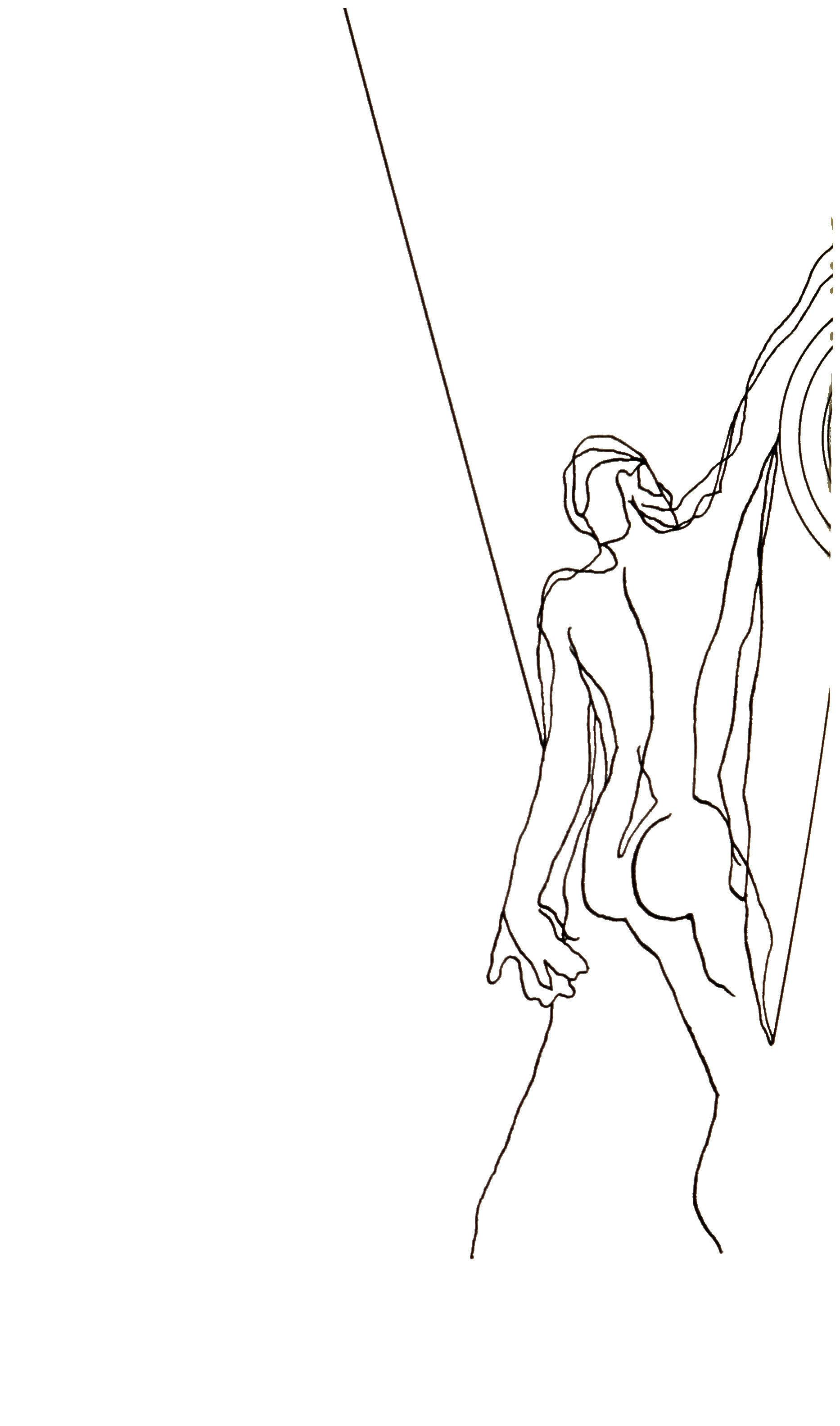
\ • I

\ \ \ \
USIC
Now Christ is risen in his freudian hat
And Nature's gussicd up with palms of gilt
And I myself have risen, and all that, I stand in Paradise and will not wilt, And praise your atheism to the skies. I drive my Jesus homeward to the hilt And nail you to the cross until He dies. And you, belov'd Teresa of my soul, Carry me to the brink with iron cries, Mother my masterpiece until I'm whole And sail me into Palestinian bliss
While I lie glowing like a fading coal. Scholar: no need of your analysis: Love's the life-cycle of a lifer's kiss.
KARL SHAPIRO

Like the bright Ladies of the Sonneteers Who only became real inside a poem, You stop existing during all those years Between the Jubilees when we're at home In bed, at work, or play (depending on Love's season.) What you do out there byday Is literary;walking to the john Or getting up to shut the window's gay Romantic fiction. Truth and circumstance Are here and now, upon this mattress, where (Uncross your legs while I pull down your pants) Fabric of vision yields to skin and hair. Nature is what we're doing; it takes art
To dream a life of which this act's a part.
JOHN HOLLANDER
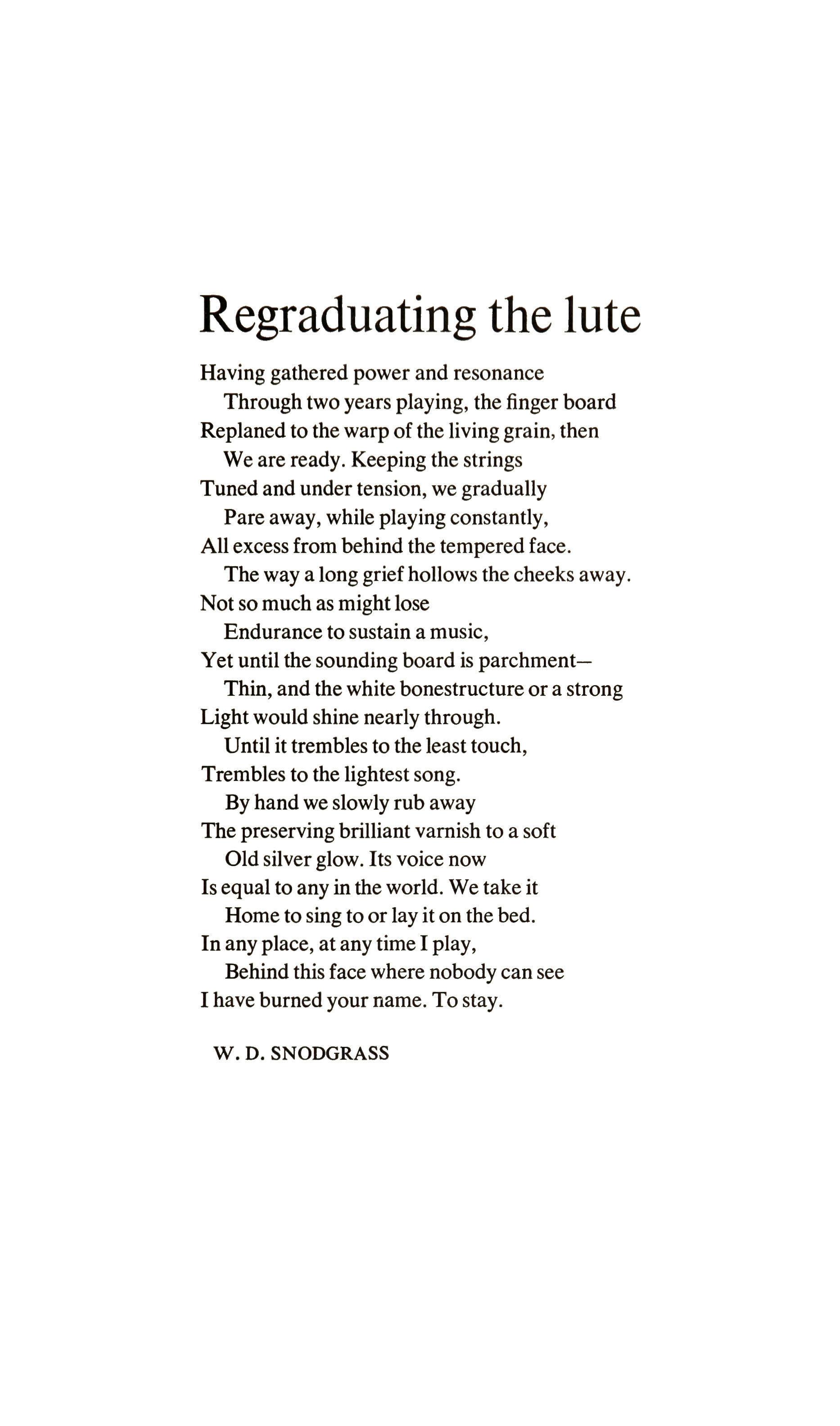
Having gathered power and resonance Through two years playing, the finger board Replaned to the warp of the livinggrain, then We are ready. Keeping the strings Tuned and under tension, we gradually Pare away, while playing constantly, All excess from behind the tempered face. The way a long grief hollows the cheeks away. Not so much as might lose Endurance to sustain a music, Yet until the sounding board is parchmentThin, and the white bonestructure or a strong Light would shine nearly through. Until it trembles to the least touch, Trembles to the lightest song. By hand we slowly rub away The preserving brilliant varnish to a soft Old silver glow. Its voice now Is equal to any in the world. We take it Home to sing to or lay it on the bed. In any place, at any time I play, Behind this face where nobody can see I have burned your name. To stay.
W. D. SNODGRASS
I have swallowed my nearest and dearest and my stomach has grown huge
Bless me I carry a child and its mother and all mothers
Lord such a grand gut I've hired twelve whining boys as porters When we board a bus Paul Bunyan screws the Lincoln Tunnel
One day children I will unzip Heads and arms will tumble forth and run like a tide down Broadway I'll fill the saggingbag with ash
purse my fleshy lips and give slices for nickels on the great white way
ROBERT HERSHON
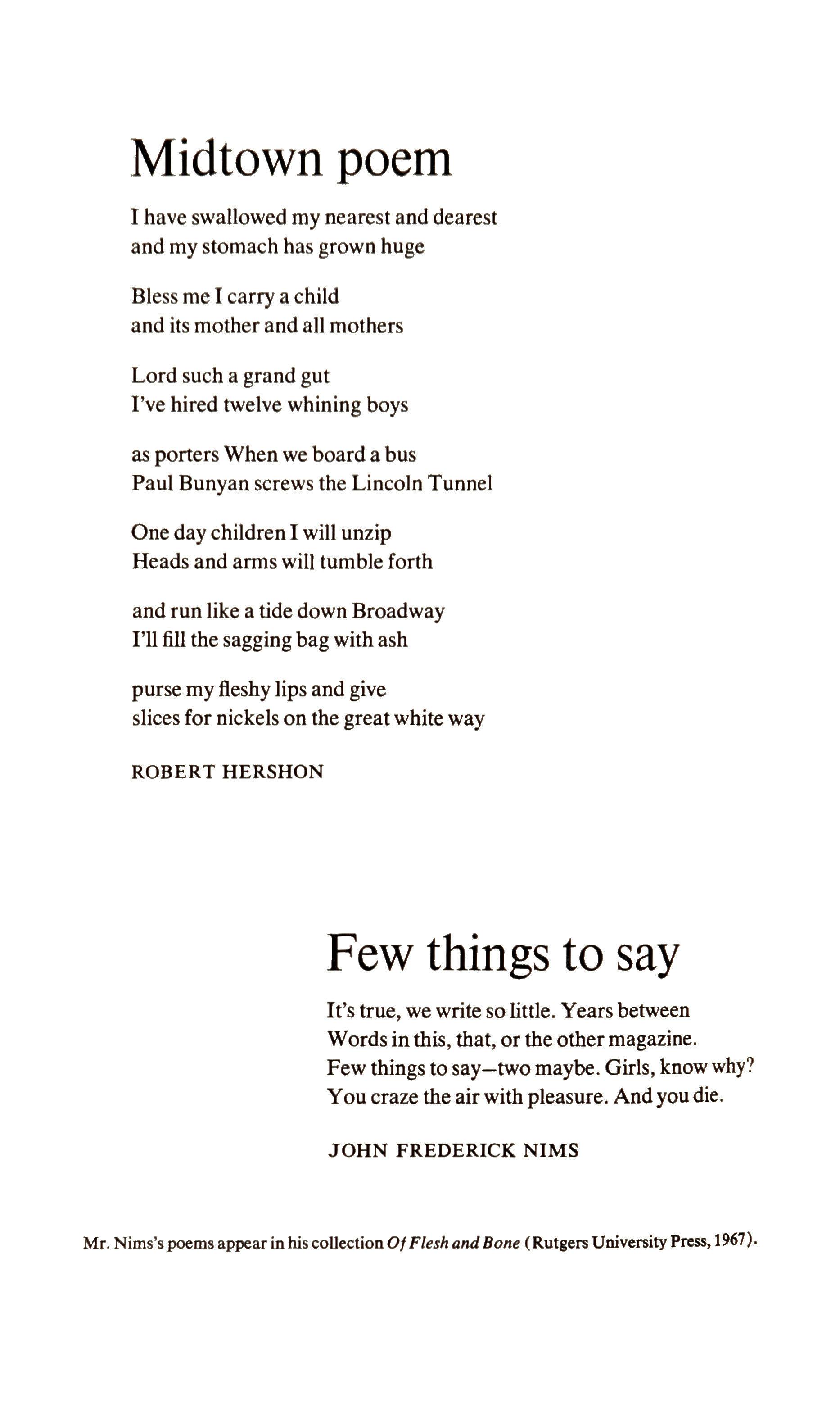
It's true, we write so little. Years between Words in this, that, or the other magazine. Few things to say two maybe. Girls, know why? You craze the air with pleasure. Andyou die.
JOHN FREDERICK NIMS
Mr. Nims's poems appear in his collection OfFlesh andBone (Rutgers UniversityPress,1967).
1

Native to valleys, crossed by the sun as the sun comes up, I wake to a mirror of hardwood, facing myself in the shape of familiar hills. They tier to my eye ridge beyond ridge: each plotted farm a map of my morning limits, wrinkled to cowpath and furrow; each skyline tree and high pasture horizons ofmy own nature. And you, still shadowed by sleep:
I watch you wake in the sharp relief of descending light, the fog burned off those rivers that dreamt you seaward, your ears happy with trains. Our waking, far downriver and up,
faces the grain of the land: a river empty of trestles, streams and gullies steep as eroded drumlins. We grope for clothes and coffee, our selves woken by waking beside each other: who climb back down from separate sleep and are, bymorning, married.
PHILIP BOOTH
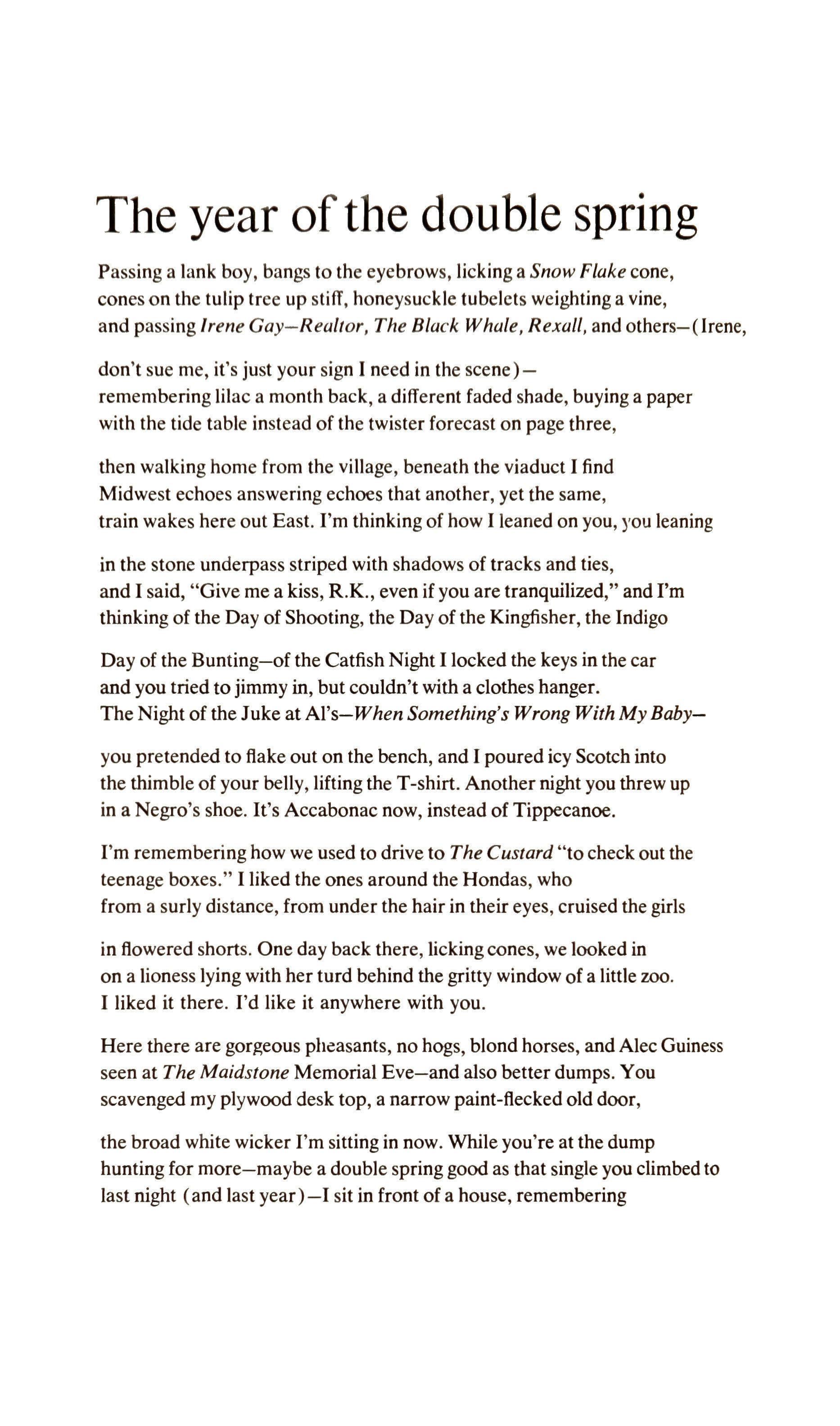
ear 0
Passing a lank boy, bangs to the eyebrows, licking a Snow Flake cone, cones on the tulip tree up stitT, honeysuckle tubelets weighting a vine, and passing Irene Gay-Realtor, The Black Whale, Rexall, and others-(Irene, don't sue me, it's just your sign I need in the scene)remembering lilac a month back, a different faded shade, buying a paper with the tide table instead of the twister forecast on page three, then walking home from the village, beneath the viaduct I find Midwest echoes answering echoes that another, yet the same, train wakes here out East. I'm thinking of how I leaned on you, )'OU leaning in the stone underpass striped with shadows of tracks and ties, and I said, "Give me a kiss, R.K., even if you are tranquilized," and I'm thinking of the Day of Shooting, the Day of the Kingfisher, the Indigo Day of the Bunting-of the Catfish Night I locked the keys in the car and you tried to jimmy in, but couldn't with a clothes hanger. The Night of the Juke at AI's When Something's Wrong With MyBabyyou pretended to flake out on the bench, and I poured icy Scotch into the thimble of your belly, lifting the T-shirt. Another night you threw up in a Negro's shoe. It's Accabonac now, instead of Tippecanoe.
I'm remembering how we used to drive to The Custard "to check out the teenage boxes." I liked the ones around the Hondas, who from a surly distance, from under the hair in their eyes, cruised the girls in flowered shorts. One day back there, licking cones, we looked in on a lioness lying with her turd behind the gritty window of a little zoo. I liked it there. I'd like it anywhere with you.
Here there are gorgeous pheasants, no hogs, blond horses, and Alec Guiness seen at The Maidstone Memorial Eve-and also better dumps. You scavenged my plywood desk top, a narrow paint-flecked old door, the broad white wicker I'm sitting in now. While you're at the dump hunting for more-maybe a double spring good as that single you climbed to last night (and last year) - I sit in front of a house, remembering
a house back there, thinking of a house-where? when?-by spring next year? I notice the immature oak leaves, vivid as redbud almost, and shaped like the spore of the weasel I once saw by the Wabash.
Instead of "to the Readmore" riffling Playboy, I found you yesterday in that Newtown Lane newspaper store I don't yet know the name of. Stay with me, R.K. Don't blow. Scout out that bed. Go find tennis instead of squash mates, surfboarders, volley ball boys to play with. I know you will, before long- maybe among the lifeguardsbig, cool-coned, straight-hipped, stander-on-one-finger, strong.
MAY SWENSON
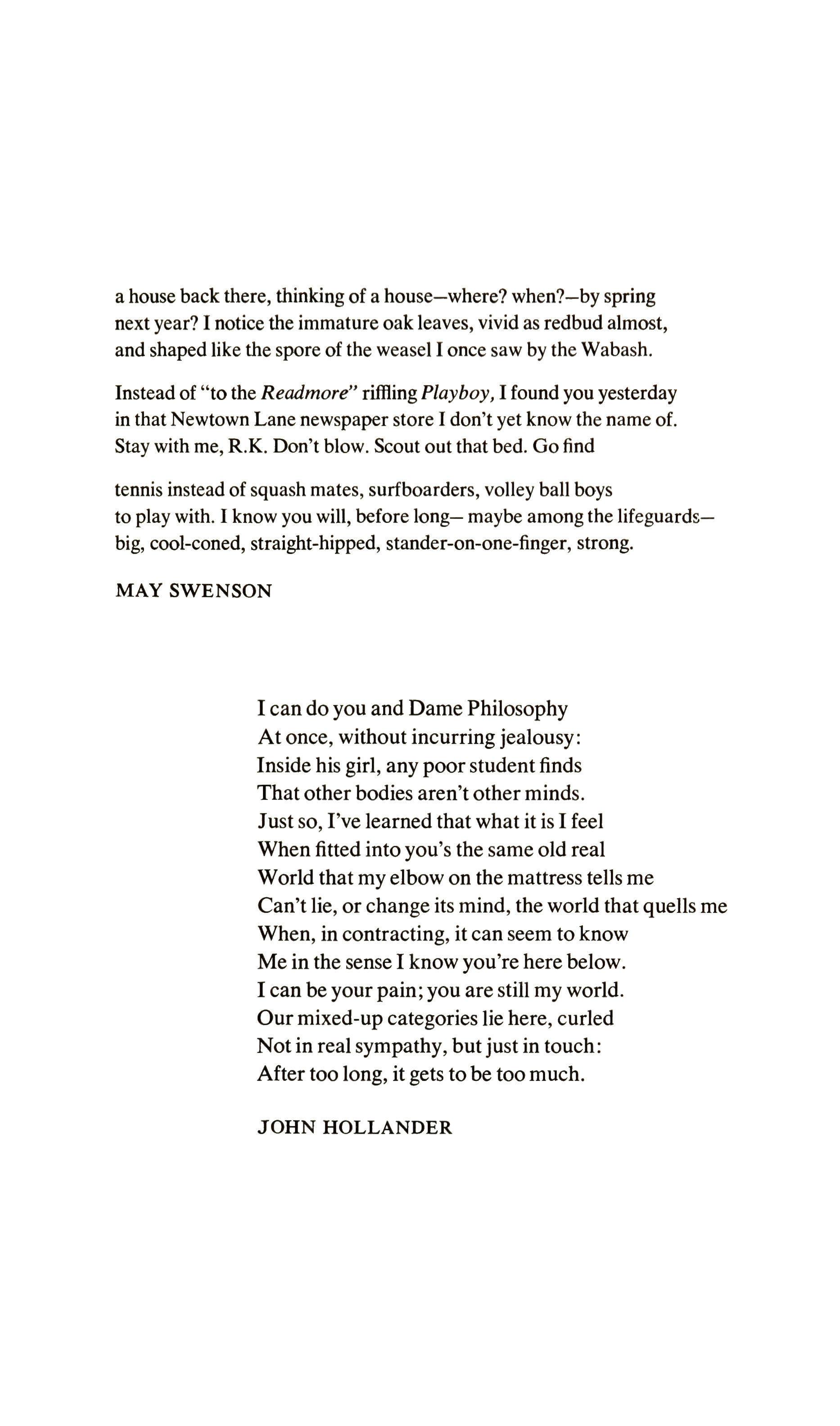
I can do you and Dame Philosophy At once, without incurring jealousy: Inside his girl, any poor student finds That other bodies aren't other minds. Just so, I've learned that what it is I feel When fitted into you's the same old real World that my elbow on the mattress tells me Can't lie, or change its mind, the world that quells me When, in contracting, it can seem to know Me in the sense I know you're here below. I can be your pain; you are still my world. Our mixed-up categories lie here, curled Not in real sympathy, but just in touch: After too long, it gets to be too much.
JOHN HOLLANDER
Why so drawn, so worn, My dearest; Should this sun-drenched morn
Find you so burned out and so pale? Until now I've had no fear lest You'd be quick to fail.
Just last night, your glowing Cheek and breast Entranced me, overflowing With their young love, warm and strong. Not to freely give your best, Dear you'd think that wrong.
Then rise; shine; let your laughter Fill the air.
When I do need looking after And there's so much to be done, Dear, it surely isn't fair So to hand on everyone.
Or don't you care?
W. D. SNODGRASS
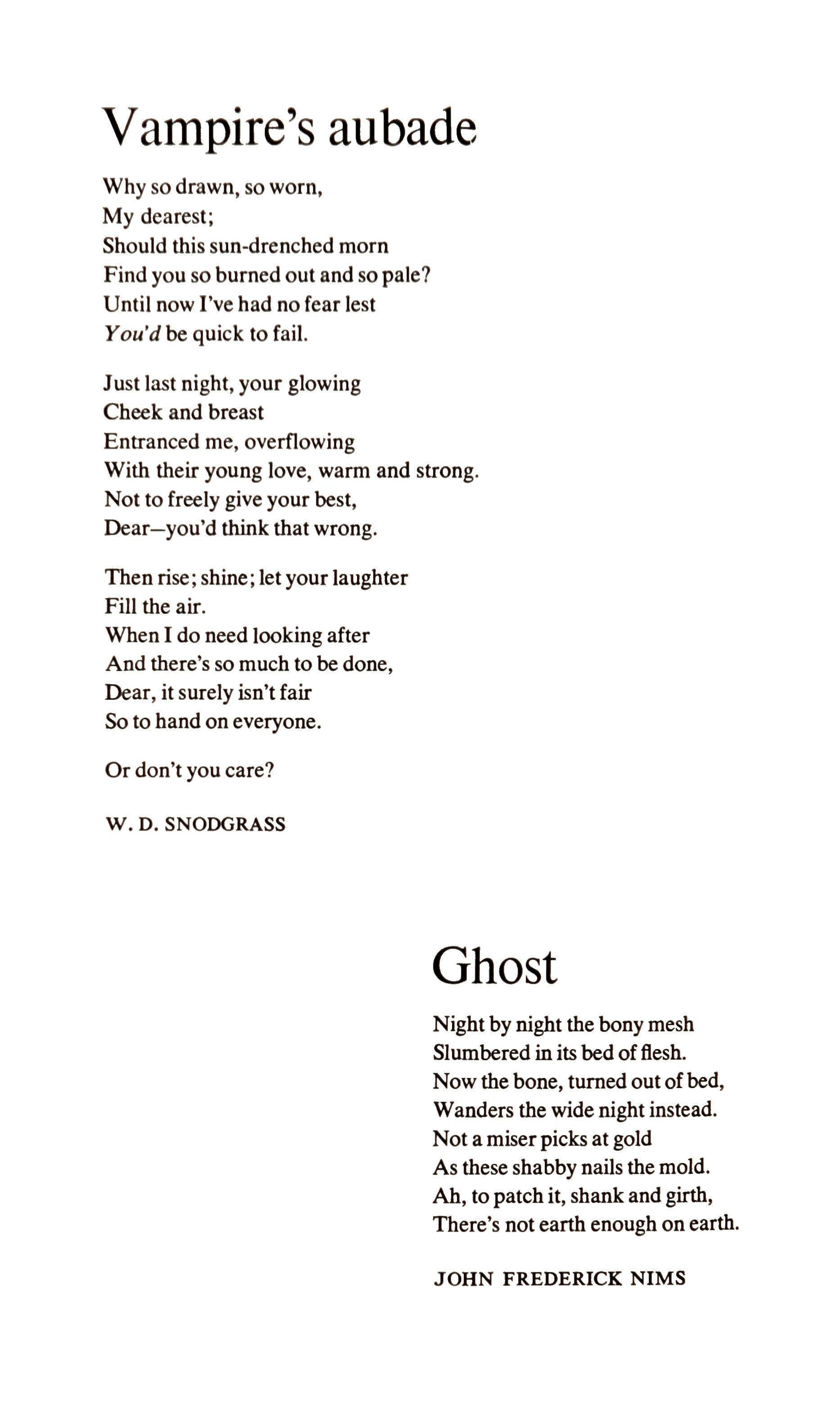
Nightbynight the bony mesh Slumbered in its bed offlesh. Now the bone, turned out ofbed, Wanders the wide night instead. Not a miser picks at gold As these shabby nails the mold. Ah, to patch it, shank and girth, There's not earth enough on earth.
JOHN FREDERICK NIMS

ave
It mounts at sea, a concave wall Down-ribbed with shine, And pushes forward, building tall Its steep incline. Then from their hiding rise to sight Black shapes on boards Bearing before the fringe of white It mottles towards.
Their pale feet curl, they poise their weight With a learned skill. It is the wave they imitate Keeps them so still.
The marbling bodies have become Half wave, half men, Grafted it seems by feet of foam Some seconds, then,
Late as they can, they slice the face In timed procession: Balance is triumph in this place, Triumphpossession.
The mindless heave of which they rode A fluid shelf
Breaks as they leave it, falls and, slowed, Loses itself.
Clear, the sheathed bodies slick as seals Loosen and tingle; And by the board the bare foot feels The suck of shingle.
Theypaddle in the shallows still; Two splash each other; Then all swim out to wait until The right waves gather.
THOM GUNN
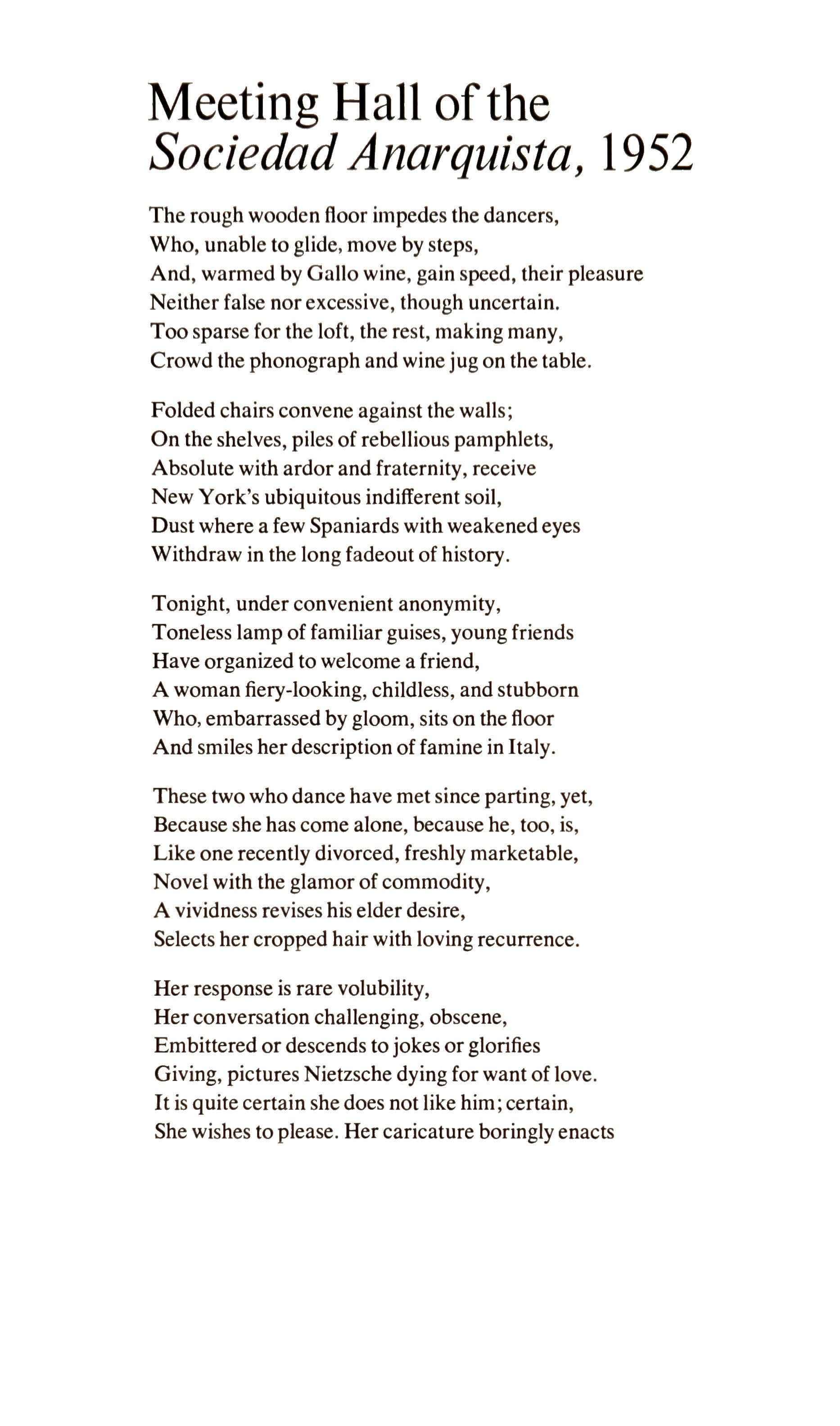
The rough wooden floor impedes the dancers, Who, unable to glide, move by steps, And, warmed by Gallo wine, gain speed, their pleasure Neither false nor excessive, though uncertain. Too sparse for the loft, the rest, making many, Crowd the phonograph and wine jug on the table.
Folded chairs convene against the walls; On the shelves, piles of rebellious pamphlets, Absolute with ardor and fraternity, receive New York's ubiquitous indifferent soil, Dust where a few Spaniards with weakened eyes Withdraw in the long fadeout of history.
Tonight, under convenient anonymity, Toneless lamp of familiar guises, young friends Have organized to welcome a friend, A woman fiery-looking, childless, and stubborn Who, embarrassed by gloom, sits on the floor And smiles her description of famine in Italy.
These two who dance have met since parting, yet, Because she has come alone, because he, too, is, Like one recently divorced, freshly marketable, Novel with the glamor of commodity, A vividness revises his elder desire, Selects her cropped hair with loving recurrence.
Her response is rare volubility, Her conversation challenging, obscene, Embittered or descends to jokes or glorifies Giving, pictures Nietzsche dying for want of love. It is quite certain she does not like him; certain, She wishes to please. Her caricature boringly enacts
A passion genuine and chaotic. Wearing red, At twenty-four having desired, having failed To be reborn a negro, Israeli, gypsy; Devastated by freedom, her uncompleted soul Retains its contact with psychosis, and with The incredible softness of a woman.
Her manic vehemence drops. Dances off, gazes, And says he looks sad, and to restore his spirits Offers the nursery of this body she Exhibits and detests; her pity and her guilt, Like children deprivation has misled, Hold hands tenderly, without affection.
Before nightends, forgotten at two by a mad Mother, dragged along by her father, lodged With orphans, she jumps, denuded, gleaming, Nervous, from the bed, and producing Her repertoire of wifeliness, Asks would he like a book to read.
IRVING FELDMAN
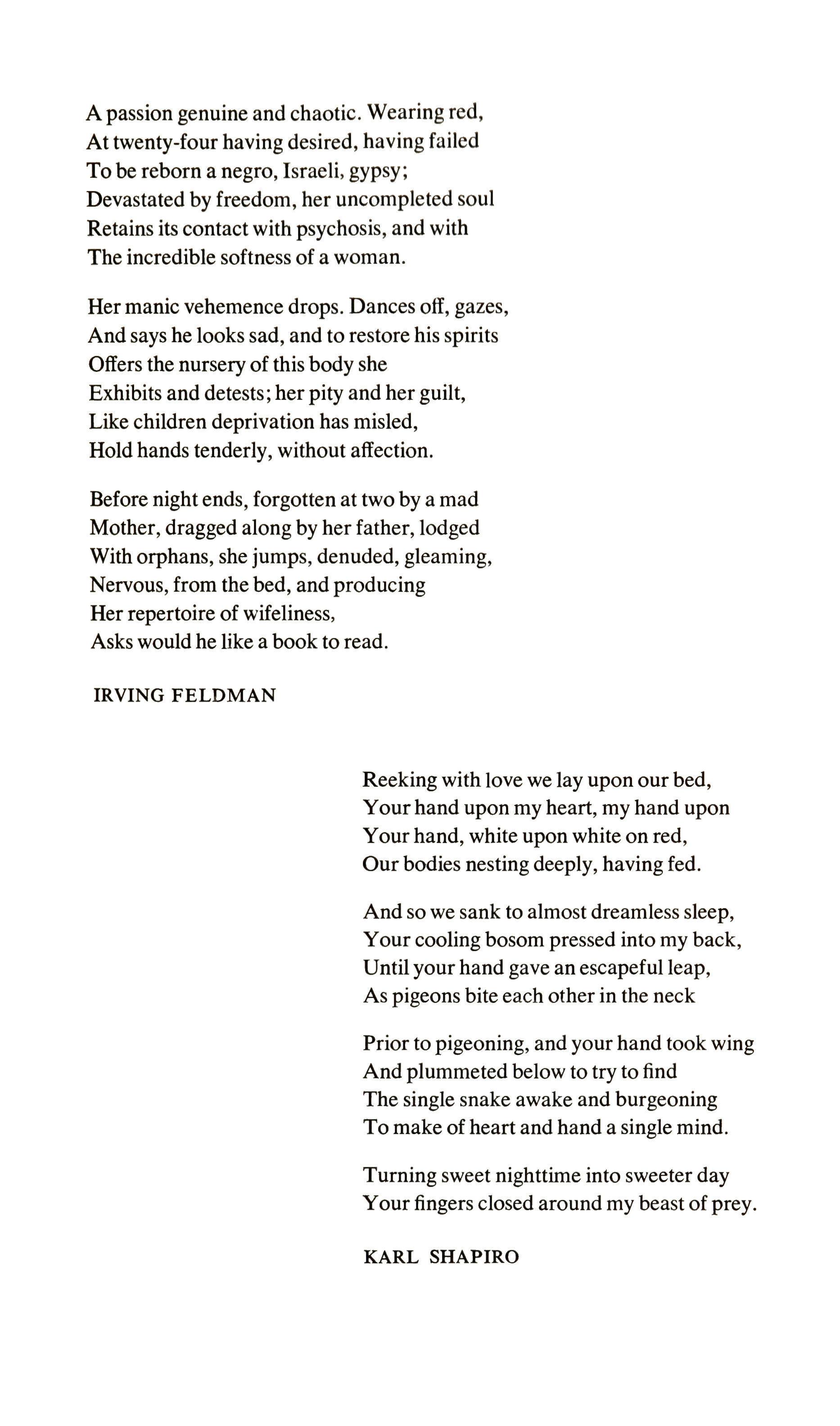
Reeking with love we lay upon our bed, Your hand upon my heart, my hand upon Your hand, white upon white on red, Our bodies nesting deeply, having fed.
And so we sank to almost dreamless sleep, Your cooling bosom pressed into my back, Until your hand gave an escapefulleap, As pigeons bite each other in the neck
Prior to pigeoning, and your hand took wing And plummeted below to try to find The single snake awake and burgeoning To make of heart and hand a single mind.
Turning sweet nighttime into sweeter day Your fingers closed around my beast of prey.
KARL SHAPIRO
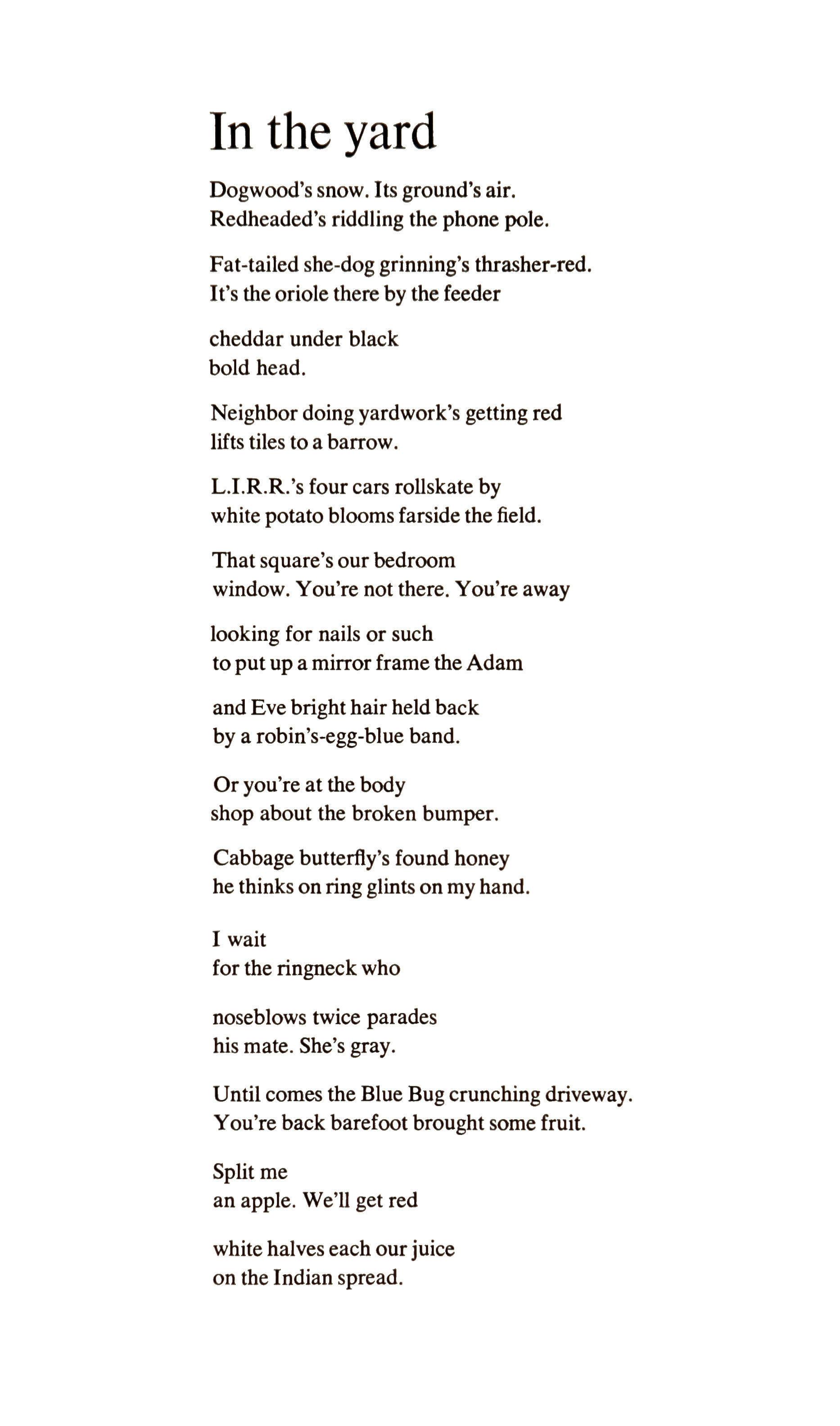
Dogwood's snow. Its ground's air. Redheaded's riddling the phone pole.
Fat-tailed she-doggrinning's thrasher-red. It's the oriole there by the feeder cheddar under black bold head.
Neighbor doing yardwork's getting red lifts tiles to a barrow.
L.I.R.R.'s four cars rollskate by white potato blooms farside the field.
That square's our bedroom window. You're not there. You're away looking for nails or such to put up a mirror frame the Adam and Eve bright hair held back by a robin's-egg-blue band.
Or you're at the body shop about the broken bumper.
Cabbage butterfly's found honey he thinks on ring glints on my hand.
I wait for the ringneck who noseblows twice parades his mate. She's gray.
Until comes the Blue Bug crunching driveway. You're back barefoot brought some fruit.
Split me an apple. We'll get red white halves each our juice on the Indian spread.
Since bed's the only world of pure idea That history has left us; and our forms, Glowing invisibly in darkness here, Alone transcend the black, galactic storms, The last two universals; to conclude That you're unreal except when both my hands Are clapped around your ass and lassitude In a mad world of shadows shows us lands That lie below Atlantis, just this side Of sleep, is no Platonic sloppiness: Not come to bed yet, after having died, You're only human, and I'm somewhat less; Until this sheet, with both of us upon it, Tosses us essences into a sonnet.
JOHN HOLLANDER

May your flesh and its pleasantassemblydelight The many by day, but one only at night. "One only, my only, if only that one Would not look so broad by the girl-flushing sun." Claypigeons! I test me on every fine mark, The better to find you, my dove, in the dark. "The better to lose me. Loose shooter, take heed. My pleasantassembly a bull's-eye indeed!"
JOHN FREDERICK NIMS
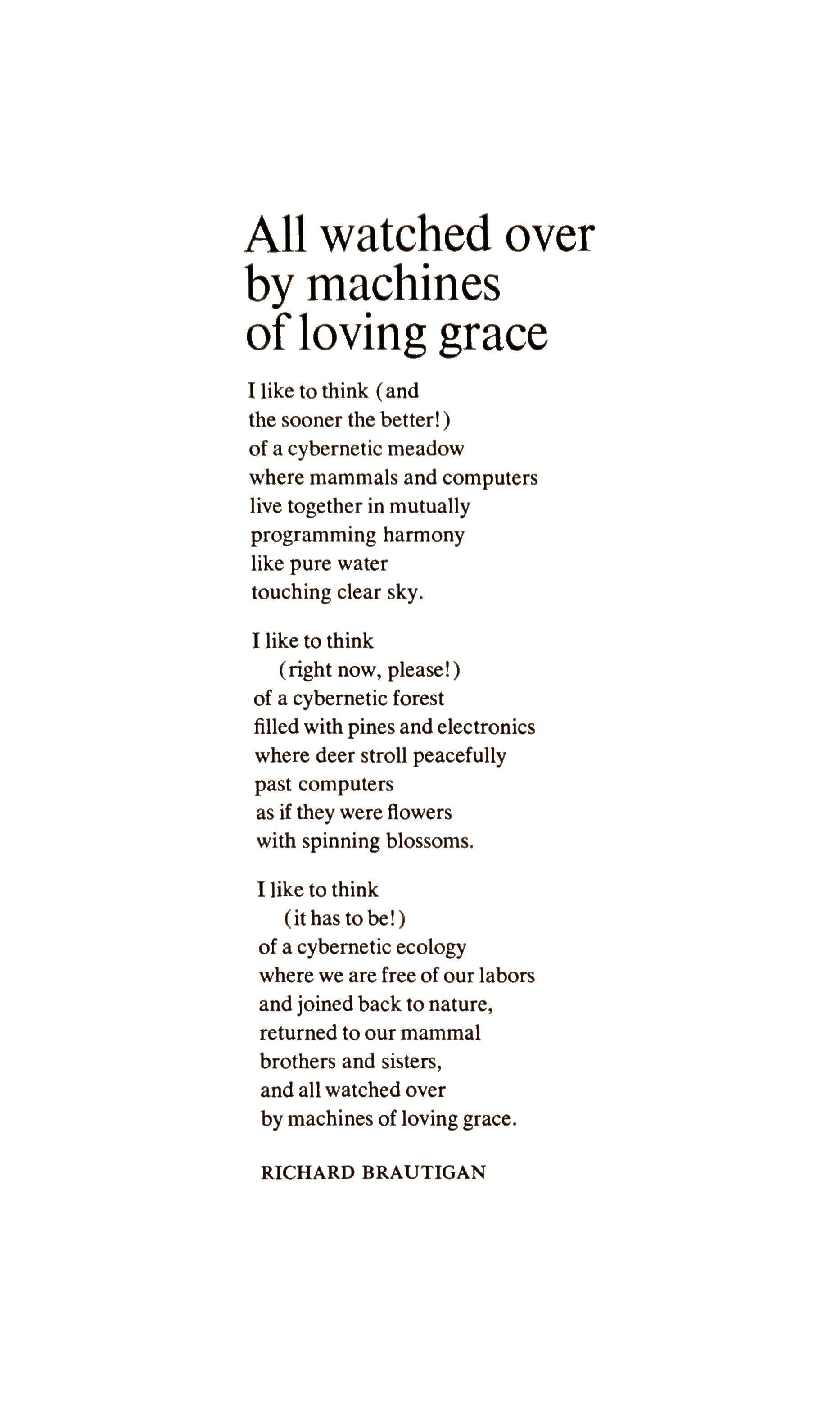
I like to think (and the sooner the better! ) of a cybernetic meadow where mammals and computers live together in mutually programming harmony like pure water touching clear sky.
I like to think (right now, please!) of a cybernetic forest filled with pines and electronics where deer stroll peacefully past computers as if they were flowers with spinning blossoms.
I like to think (it has to be!) of a cybernetic ecology where we are free of our labors and joined back to nature, returned to our mammal brothers and sisters, and all watched over by machines of loving grace.
RICHARD BRAUTIGAN
over
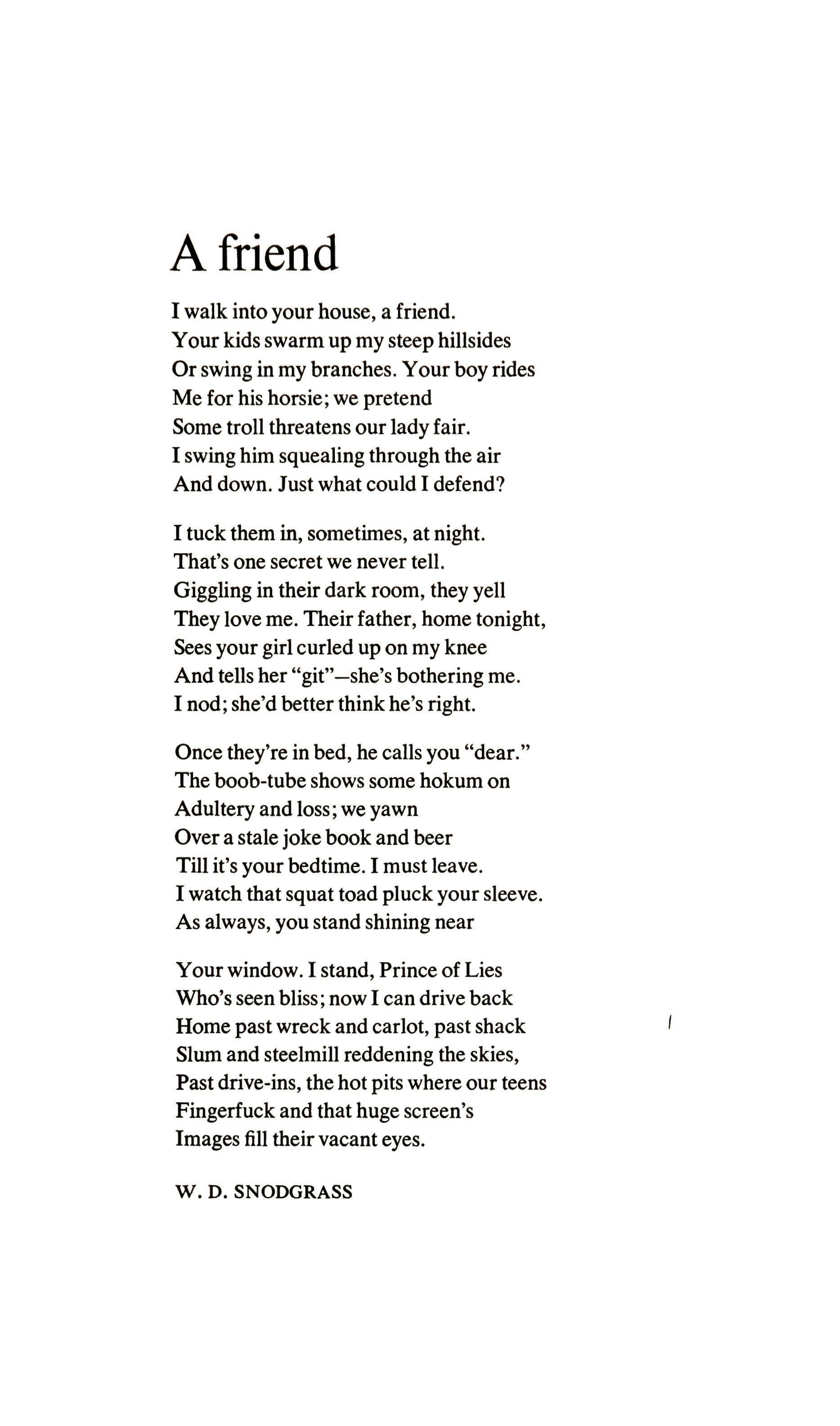
nen
I walk into your house, a friend. Your kids swarm up my steep hillsides Or swing in my branches. Your boy rides Me for his horsie; we pretend Some troll threatens our lady fair. I swing him squealing through the air And down. Just what could I defend?
I tuck them in, sometimes, at night. That's one secret we never tell.
Giggling in their dark room, they yell They love me. Their father, home tonight, Sees your girl curled up on my knee And tells her "git" she's bothering me. I nod; she'd better think he's right.
Once they're in bed, he calls you "dear."
The boob-tube shows some hokum on
Adultery and loss; we yawn Over a stale joke book and beer
Till it's your bedtime. I must leave. I watch that squat toad pluck your sleeve. As always, you stand shining near Your window. I stand, Prince of Lies
Who's seen bliss; now I can drive back
Home past wreck and carlot, past shack
Slum and steelmill reddening the skies, Past drive-ins, the hot pits where our teens
Fingerfuck and that huge screen's Images fill their vacant eyes. I
w. D. SNODGRASS
July the Fourth, bombs bursting in air
Over the golf course and your patio; 1 am reduced to cinders by your glare, While outside populations ah! and oh!
"I can't even remember what that fight Was all about. You drove around with him Under the bloom of rockets' bursting lightAlimony, I think, or somethinggrim."
The wiles of loftyLiberty are droll. Sweet brazen Liberty that makes our laws And sets up freedom's rosy, golden pole. Her hand of fire is first to quench the cause:
Fierce Liberty that lights us on our way, March us with torches to our wedding day!
KARL SHAPIRO
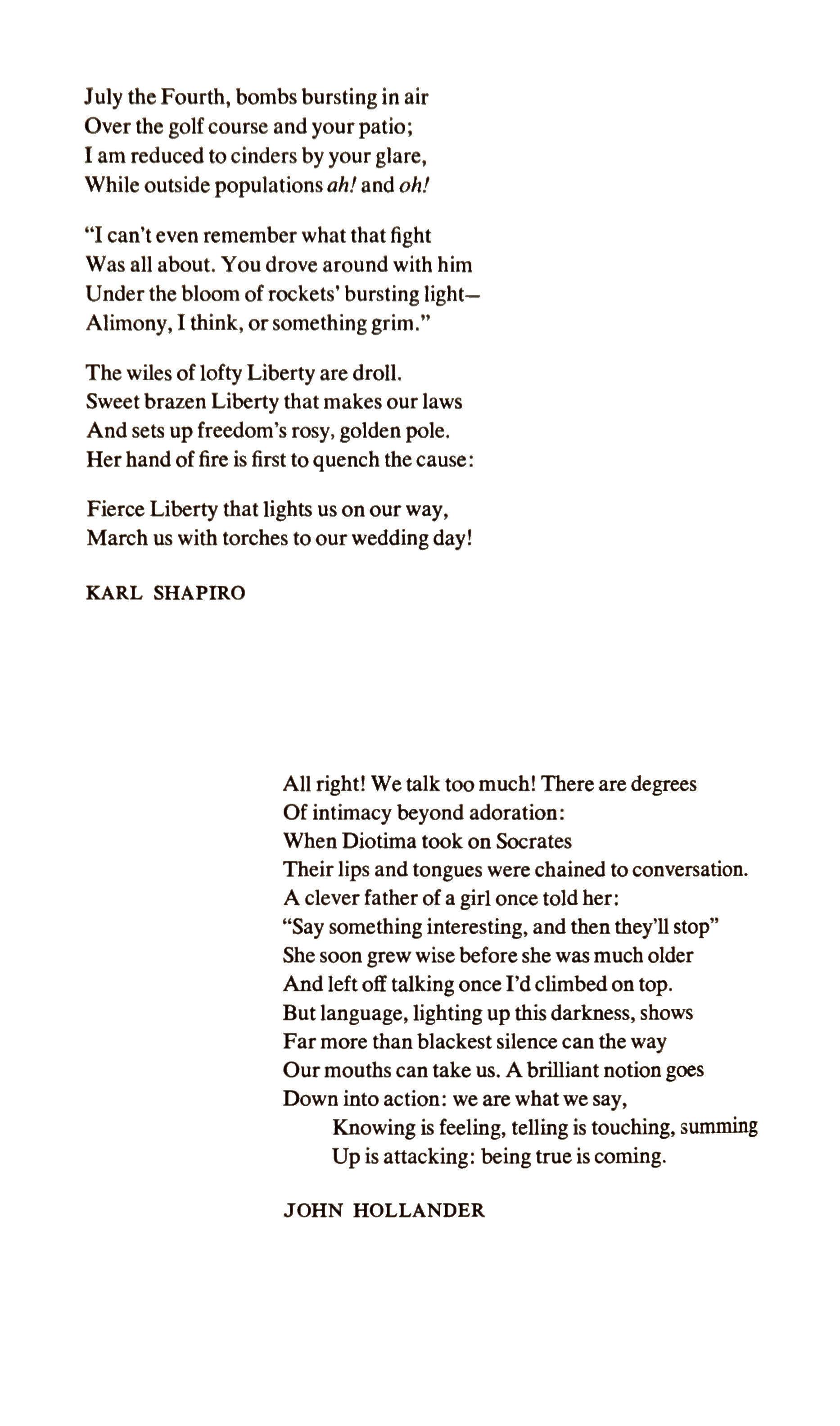
All right! We talk too much! There are degrees Of intimacy beyond adoration: When Diotima took on Socrates Their lips and tongues were chained to conversation. A clever father of a girl once told her: "Say something interesting, and then they'll stop" She soon grew wise before she was much older And left off talking once I'd climbed on top. But language, lighting up this darkness, shows Far more than blackest silence can the way Our mouths can take us. A brilliant notion goes Down into action: we are what we say, Knowing is feeling, telling is touching, S\1111111ing Up is attacking: being true is COIning.
JOHN HOLLANDER
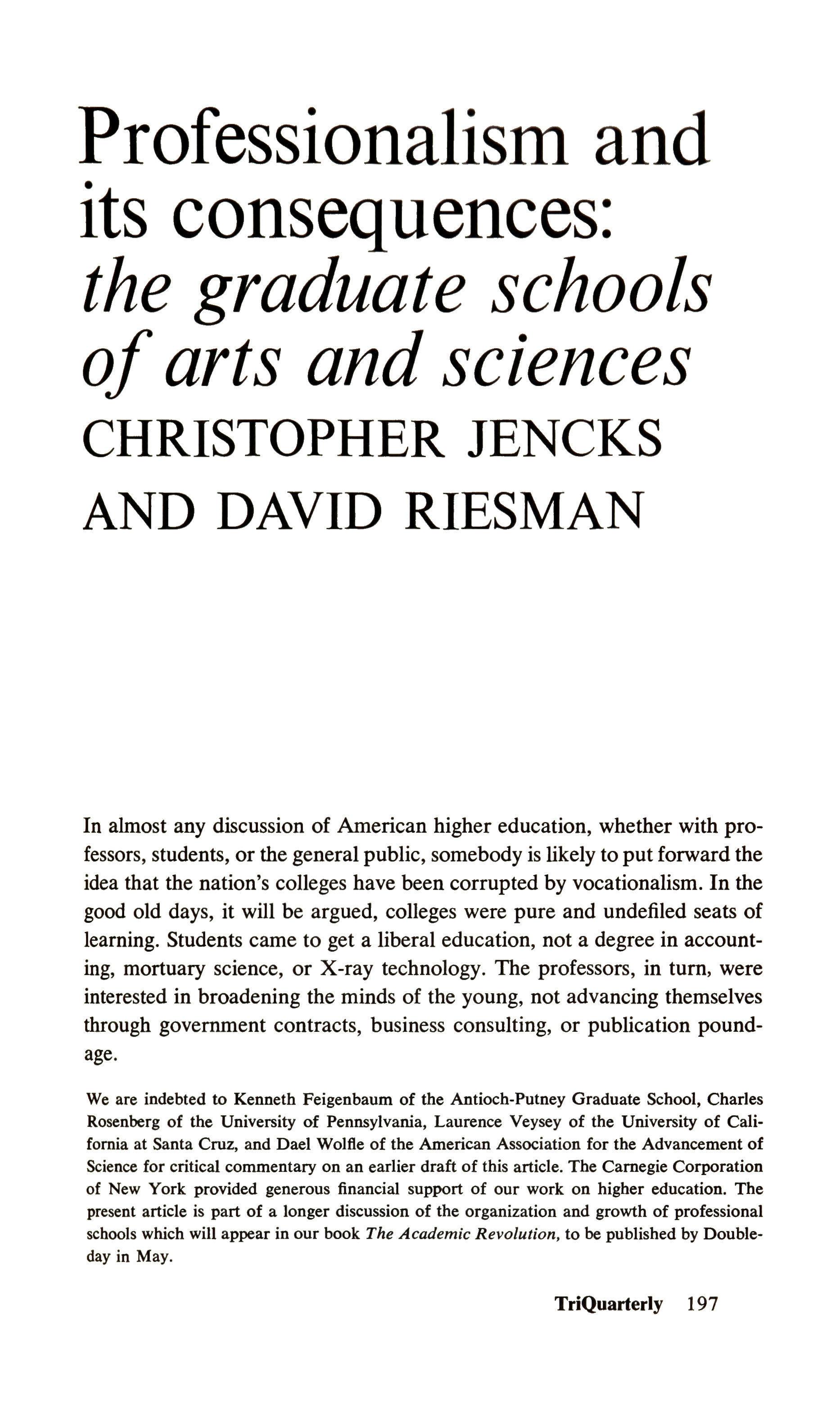
In almost any discussion of American higher education, whether with professors, students, or the general public, somebody is likely to put forward the idea that the nation's colleges have been corrupted by vocationalism. In the good old days, it will be argued, colleges were pure and undefiled seats of learning. Students came to get a liberal education, not a degree in accounting, mortuary science, or X-ray technology. The professors, in tum, were interested in broadening the minds of the young, not advancing themselves through government contracts, business consulting, or publication poundage.
We are indebted to Kenneth Feigenbaum of the Antioch-Putney Graduate School, Charles Rosenberg of the University of Pennsylvania, Laurence Veysey of the University of California at Santa Cruz, and Dael Wolfle of the American Association for the Advancement of Science for critical commentary on an earlier draft of this article. The Carnegie Corporation of New York provided generous financial support of our work on higher education. The present article is part of a longer discussion of the organization and growth of professional schools which will appear in our book The Academic Revolution, to be published by Doubleday in May.
• •
197
TriQuarterly

Like other pastoral idylls, this myth serves all sorts of polemical purposes, good and bad. But it is a myth nonetheless. There was no "golden age" in American higher education. Young men of college age worried about their future careers in the colonial era just as they do today, and this affected both the kind of men who came to college and the kind of things they did once they arrived. During the colonial era people usually went to college because they hoped to become clergymen; today they go because they hope to become doctors, lawyers, teachers, business executives, and the like. While this is an important change, and has affected the character of higher education, it does not imply,either a rise or a decline in vocationalism. The same is true of the faculty. In colonial colleges the younger instructors were often aspiring ministers waiting for a promising pulpit to come their way; today they are more often aspiring scholars, teaching because this is a good way to finance their professional training. In colonial colleges the older teachers were sometimes failed clergymen; today they are sometimes failed scholars and scientists. This does not mean that nothing has changed in higher education since the seventeenth century. But it does mean that purity of motive and single-mindedness of purpose have never been characteristic of American colleges, and that the question has always been how an institution mixed the academic with the vocational, not whether it did so.
One reason for so many liberal arts professors' nostalgia for some hypothetical prevocational era is that they have lost their monopoly on undergraduate instruction. Substantial numbers of undergraduates are today enrolled in avowedly professional schools. They are studying subjects they and their professors hope will be useful to them in their work after graduating. This makes some liberal arts professors feel that their influence over the young has declined. But this is almost certainly wrong. Relatively few of the students enrolled in undergraduate professional schools today would have enrolled in liberal arts programs a generation or two ago. They would have gone directly from high school to work. The fact that they now come to the college campus and yet shun the liberal arts may make liberal arts professors more aware that they have a limited following, since it puts them physically closer to their potential critics. Yet these young people's parents, most of whom did not go to college at all, were almost all even more indifferent or hostile to the liberal arts than their children are.
The point can be made statistically too. The proportion of all undergraduates studying the liberal arts and "pure" sciences has declined over the past hundred years though it has not declined much since World War II. But because so many more people are going to college, the proportion of the whole age grade taking degrees in the liberal arts has risen steadily over
198
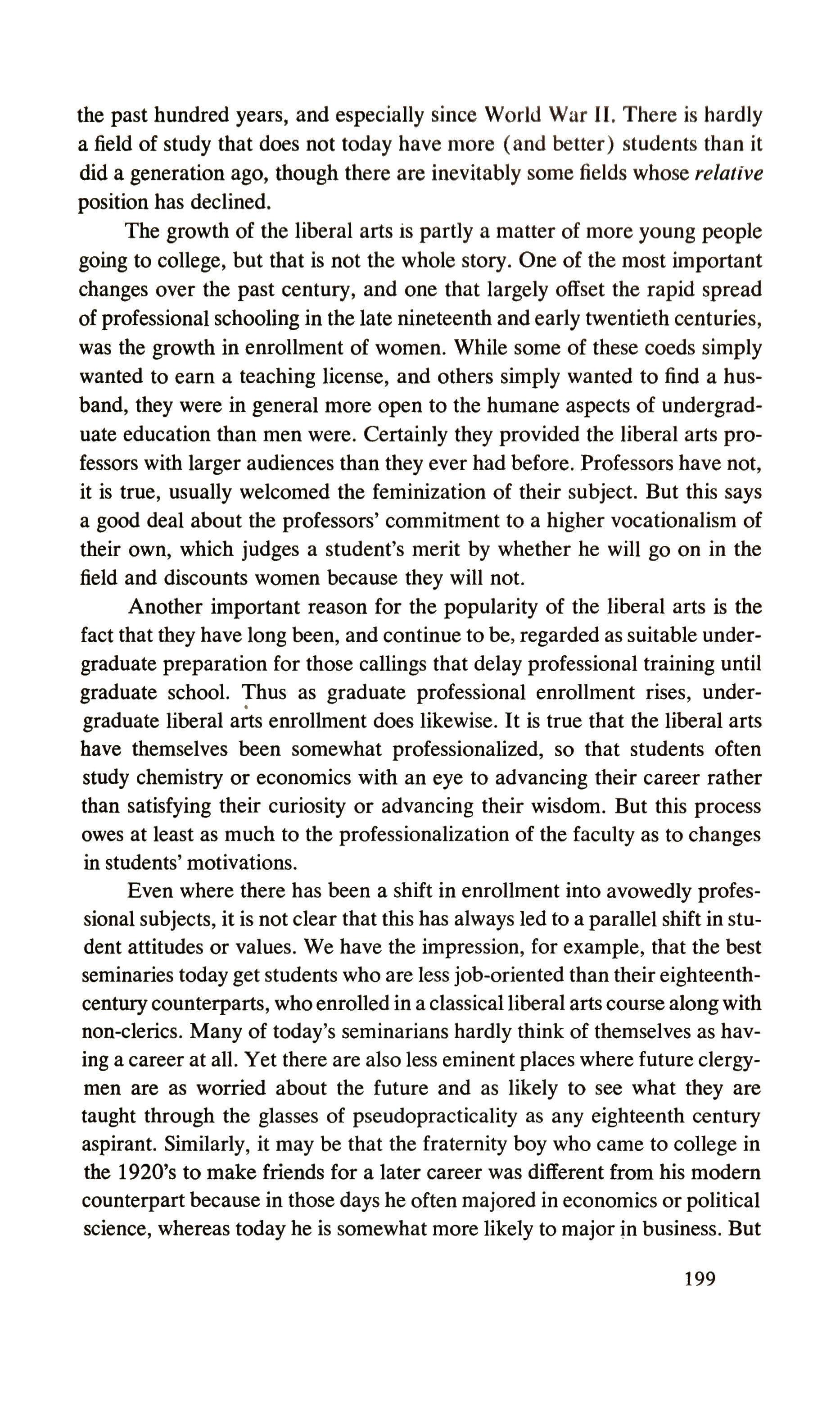
the past hundred years, and especially since World War II. There is hardly a field of study that does not today have more (and better) students than it did a generation ago, though there are inevitably some fields whose relative position has declined.
The growth of the liberal arts is partly a matter of more young people going to college, but that is not the whole story. One of the most important changes over the past century, and one that largely offset the rapid spread of professional schooling in the late nineteenth and early twentieth centuries, was the growth in enrollment of women. While some of these coeds simply wanted to earn a teaching license, and others simply wanted to find a husband, they were in general more open to the humane aspects of undergraduate education than men were. Certainly they provided the liberal arts professors with larger audiences than they ever had before. Professors have not, it is true, usually welcomed the feminization of their subject. But this says a good deal about the professors' commitment to a higher vocationalism of their own, which judges a student's merit by whether he will go on in the field and discounts women because they will not.
Another important reason for the popularity of the liberal arts is the fact that they have long been, and continue to be, regarded as suitable undergraduate preparation for those callings that delay professional training until graduate school. Thus as graduate professional enrollment rises, undergraduate liberal arts enrollment does likewise. It is true that the liberal arts have themselves been somewhat professionalized, so that students often study chemistry or economics with an eye to advancing their career rather than satisfying their curiosity or advancing their wisdom. But this process owes at least as much to the professionalization of the faculty as to changes in students' motivations.
Even where there has been a shift in enrollment into avowedly professional subjects, it is not clear that this has always led to a parallel shift in student attitudes or values. We have the impression, for example, that the best seminaries today get students who are less job-oriented than their eighteenthcenturycounterparts, who enrolled in a classical liberal arts course along with non-clerics. Many of today's seminarians hardly think of themselves as having a career at all. Yet there are also less eminent places where future clergymen are as worried about the future and as likely to see what they are taught through the glasses of pseudopracticality as any eighteenth century aspirant. Similarly, it may be that the fraternity boy who came to college in the 1920's to make friends for a later career was different from his modem counterpart because in those days he often majored in economics or political science, whereas today he is somewhat more likely to major in business. But
199
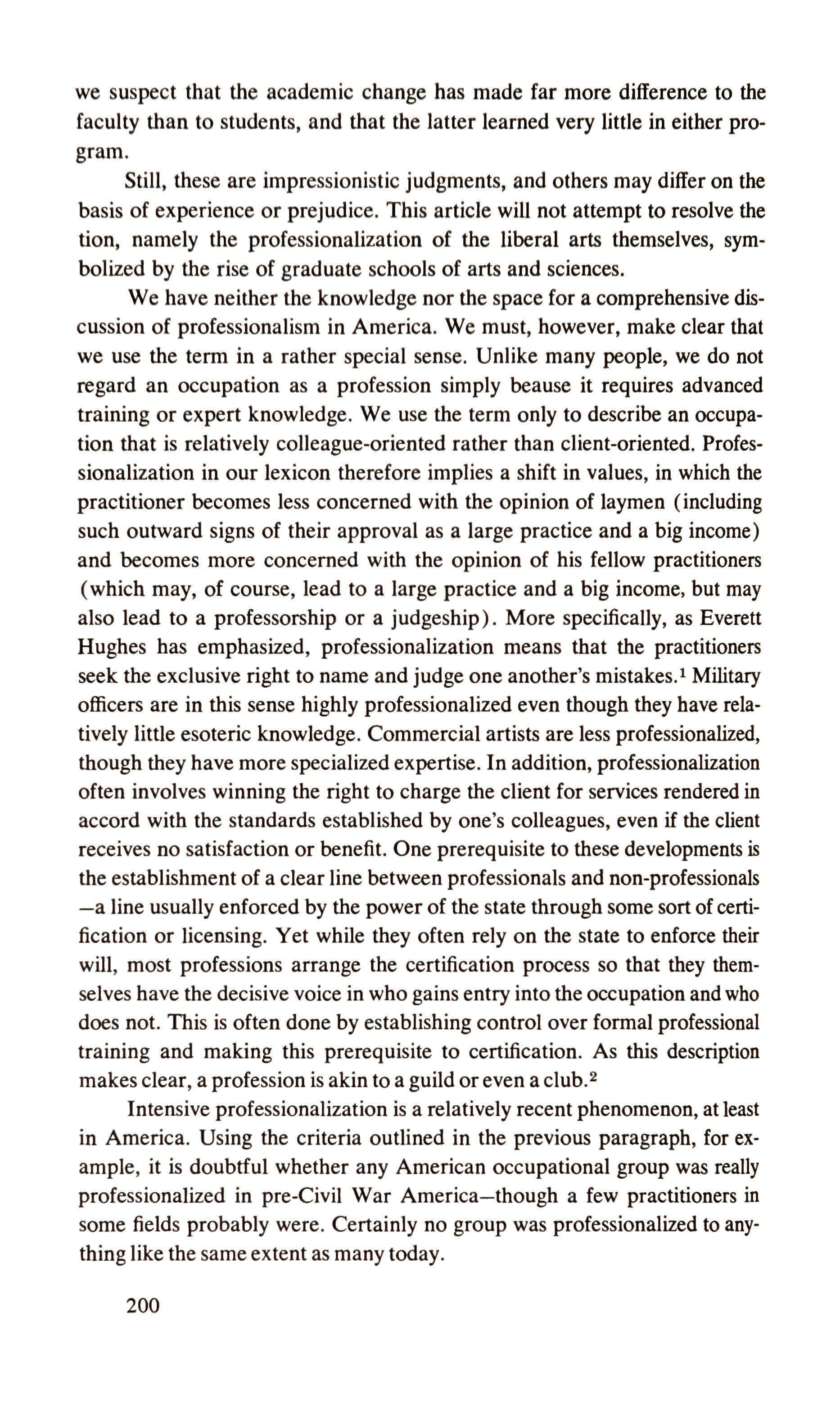
we suspect that the academic change has made far more difference to the faculty than to students, and that the latter learned very little in either program.
Still, these are impressionistic judgments, and others may differ on the basis of experience or prejudice. This article will not attempt to resolve the tion, namely the professionalization of the liberal arts themselves, symbolized by the rise of graduate schools of arts and sciences.
We have neither the knowledge nor the space for a comprehensive discussion of professionalism in America. We must, however, make clear that we use the term in a rather special sense. Unlike many people, we do not regard an occupation as a profession simply beause it requires advanced training or expert knowledge. We use the term only to describe an occupation that is relatively colleague-oriented rather than client-oriented. Professionalization in our lexicon therefore implies a shift in values, in which the practitioner becomes less concerned with the opinion of laymen (including such outward signs of their approval as a large practice and a big income) and becomes more concerned with the opinion of his fellow practitioners (which may, of course, lead to a large practice and a big income, but may also lead to a professorship or a judgeship). More specifically, as Everett Hughes has emphasized, professionalization means that the practitioners seek the exclusive right to name and judge one another's mistakes.' Military officers are in this sense highly professionalized even though they have relatively little esoteric knowledge. Commercial artists are less professionalized, though they have more specialized expertise. In addition, professionalization often involves winning the right to charge the client for services rendered in accord with the standards established by one's colleagues, even if the client receives no satisfaction or benefit. One prerequisite to these developments is the establishment of a clear line between professionals and non-professionals -a line usually enforced by the power of the state through some sort of certification or licensing. Yet while they often rely on the state to enforce their will, most professions arrange the certification process so that they themselves have the decisive voice in who gains entry into the occupation and who does not. This is often done by establishing control over formal professional training and making this prerequisite to certification. As this description makes clear, a profession is akin to a guild or even a club.2
Intensive professionalization is a relatively recent phenomenon, at least in America. Using the criteria outlined in the previous paragraph, for example, it is doubtful whether any American occupational group was really professionalized in pre-Civil War America though a few practitioners in some fields probably were. Certainly no group was professionalized to anything like the same extent as many today.
200
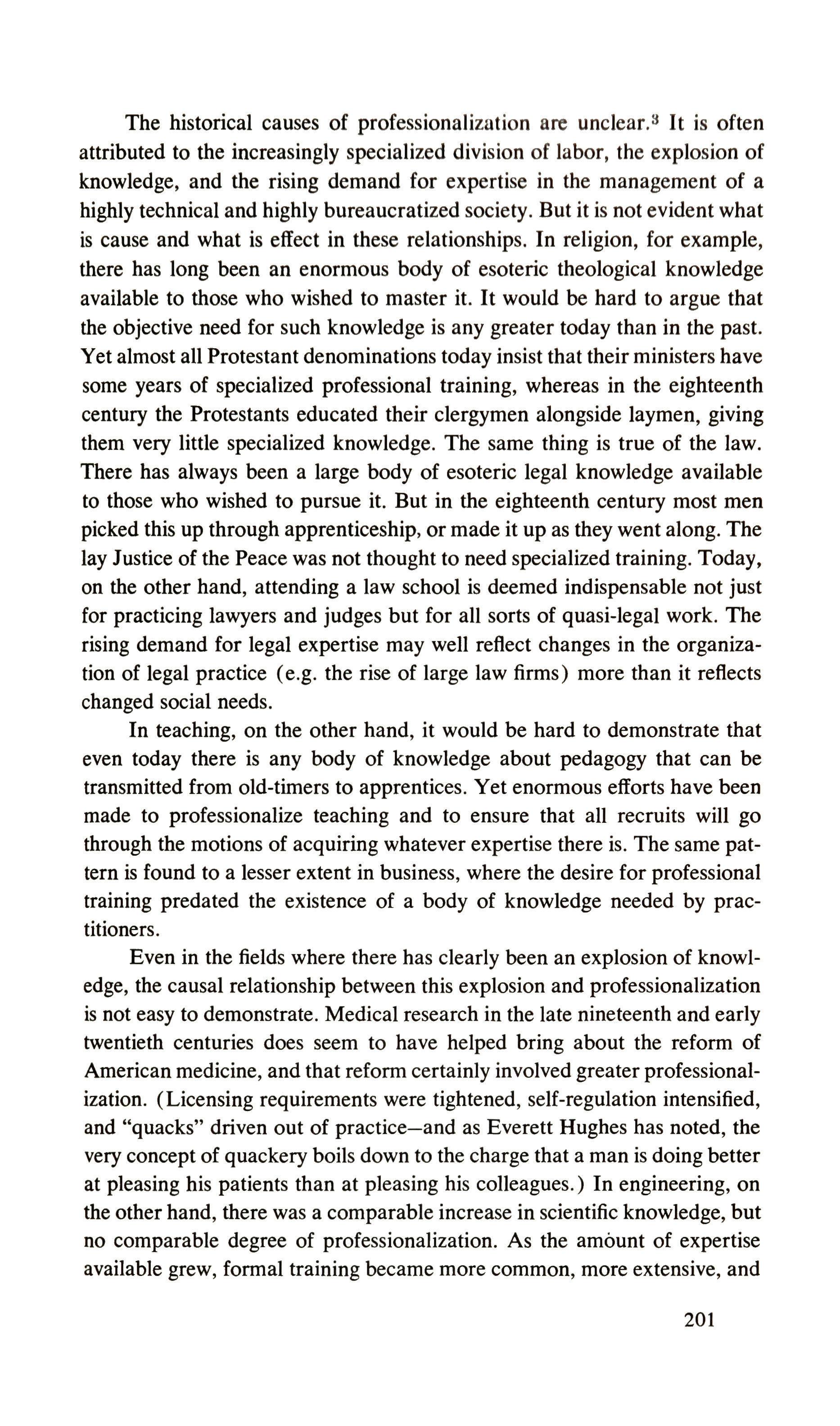
The historical causes of professionalization are unclear." It is often attributed to the increasingly specialized division of labor, the explosion of knowledge, and the rising demand for expertise in the management of a highly technical and highly bureaucratized society. But it is not evident what is cause and what is effect in these relationships. In religion, for example, there has long been an enormous body of esoteric theological knowledge available to those who wished to master it. It would be hard to argue that the objective need for such knowledge is any greater today than in the past. Yet almost all Protestant denominations today insist that their ministers have some years of specialized professional training, whereas in the eighteenth century the Protestants educated their clergymen alongside laymen, giving them very little specialized knowledge. The same thing is true of the law. There has always been a large body of esoteric legal knowledge available to those who wished to pursue it. But in the eighteenth century most men picked this up through apprenticeship, or made it up as they went along. The lay Justice of the Peace was not thought to need specialized training. Today, on the other hand, attending a law school is deemed indispensable not just for practicing lawyers and judges but for all sorts of quasi-legal work. The rising demand for legal expertise may well reflect changes in the organization of legal practice (e.g. the rise of large law firms) more than it reflects changed social needs.
In teaching, on the other hand, it would be hard to demonstrate that even today there is any body of knowledge about pedagogy that can be transmitted from old-timers to apprentices. Yet enormous efforts have been made to professionalize teaching and to ensure that all recruits will go through the motions of acquiring whatever expertise there is. The same pattern is found to a lesser extent in business, where the desire for professional training predated the existence of a body of knowledge needed by practitioners.
Even in the fields where there has clearly been an explosion of knowledge, the causal relationship between this explosion and professionalization is not easy to demonstrate. Medical research in the late nineteenth and early twentieth centuries does seem to have helped bring about the reform of American medicine, and that reform certainly involved greater professionalization. (Licensing requirements were tightened, self-regulation intensified, and "quacks" driven out of practice and as Everett Hughes has noted, the very concept of quackery boils down to the charge that a man is doing better at pleasing his patients than at pleasing his colleagues.) In engineering, on the other hand, there was a comparable increase in scientific knowledge, but no comparable degree of professionalization. As the amount of expertise available grew, formal training became more common, more extensive, and
201
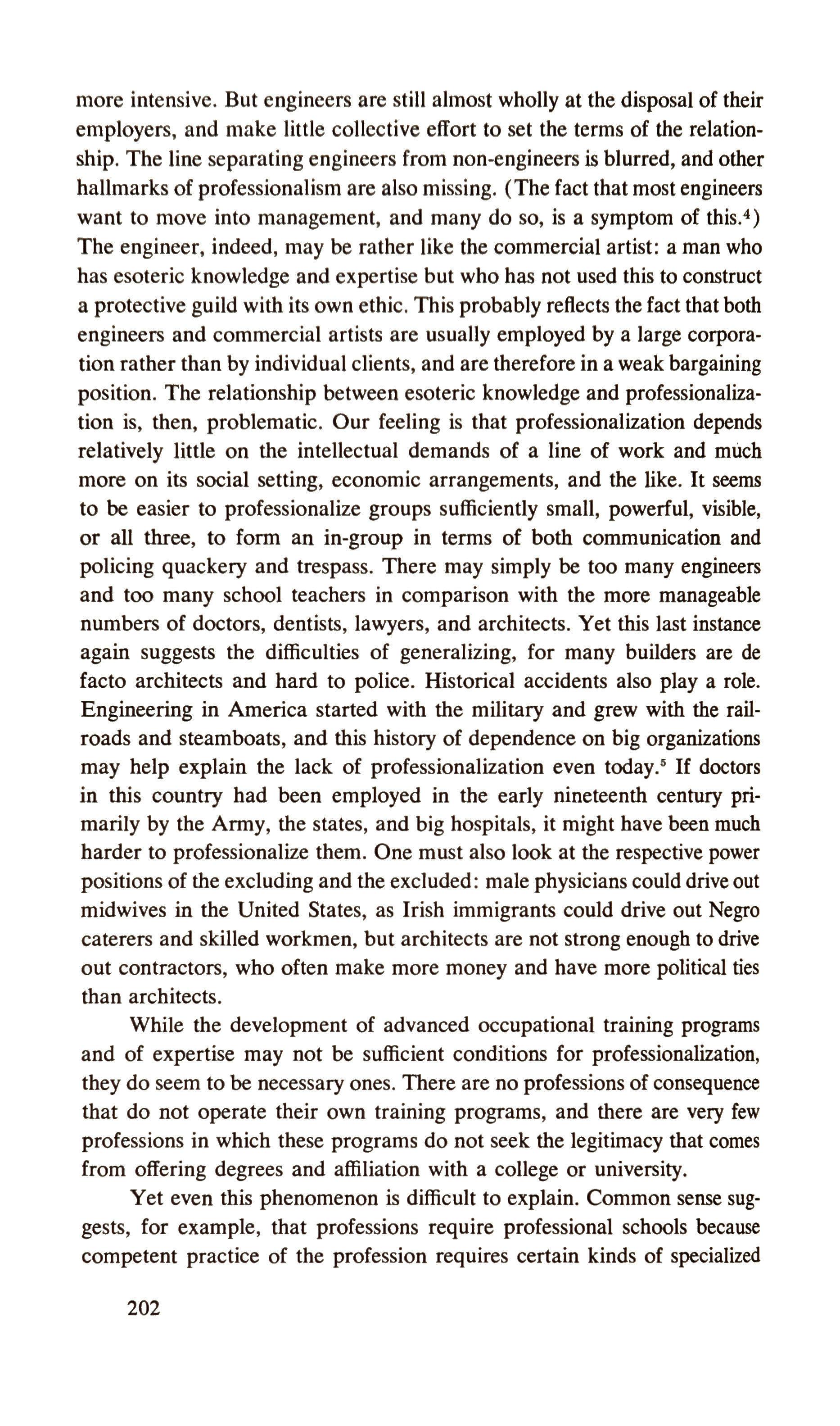
more intensive. But engineers are still almost wholly at the disposal of their employers, and make little collective effort to set the terms of the relationship. The line separating engineers from non-engineers is blurred, and other hallmarks of professionalism are also missing. (The fact that most engineers want to move into management, and many do so, is a symptom of this.") The engineer, indeed, may be rather like the commercial artist: a man who has esoteric knowledge and expertise but who has not used this to construct a protective guild with its own ethic. This probably reflects the fact that both engineers and commercial artists are usually employed by a large corporation rather than by individual clients, and are therefore in a weak bargaining position. The relationship between esoteric knowledge and professionalization is, then, problematic. Our feeling is that professionalization depends relatively little on the intellectual demands of a line of work and much more on its social setting, economic arrangements, and the like. It seems to be easier to professionalize groups sufficiently small, powerful, visible, or all three, to form an in-group in terrns of both communication and policing quackery and trespass. There may simply be too many engineers and too many school teachers in comparison with the more manageable numbers of doctors, dentists, lawyers, and architects. Yet this last instance again suggests the difficulties of generalizing, for many builders are de facto architects and hard to police. Historical accidents also play a role. Engineering in America started with the military and grew with the railroads and steamboats, and this history of dependence on big organizations may help explain the lack of professionalization even today. Ii If doctors in this country had been employed in the early nineteenth century primarily by the Army, the states, and big hospitals, it might have been much harder to professionalize them. One must also look at the respective power positions of the excluding and the excluded: male physicians could drive out midwives in the United States, as Irish immigrants could drive out Negro caterers and skilled workmen, but architects are not strong enough to drive out contractors, who often make more money and have more political ties than architects.
While the development of advanced occupational training programs and of expertise may not be sufficient conditions for professionalization, they do seem to be necessary ones. There are no professions of consequence that do not operate their own training programs, and there are very few professions in which these programs do not seek the legitimacy that comes from offering degrees and affiliation with a college or university. Yet even this phenomenon is difficult to explain. Common sense suggests, for example, that professions require professional schools because competent practice of the profession requires certain kinds of specialized
202
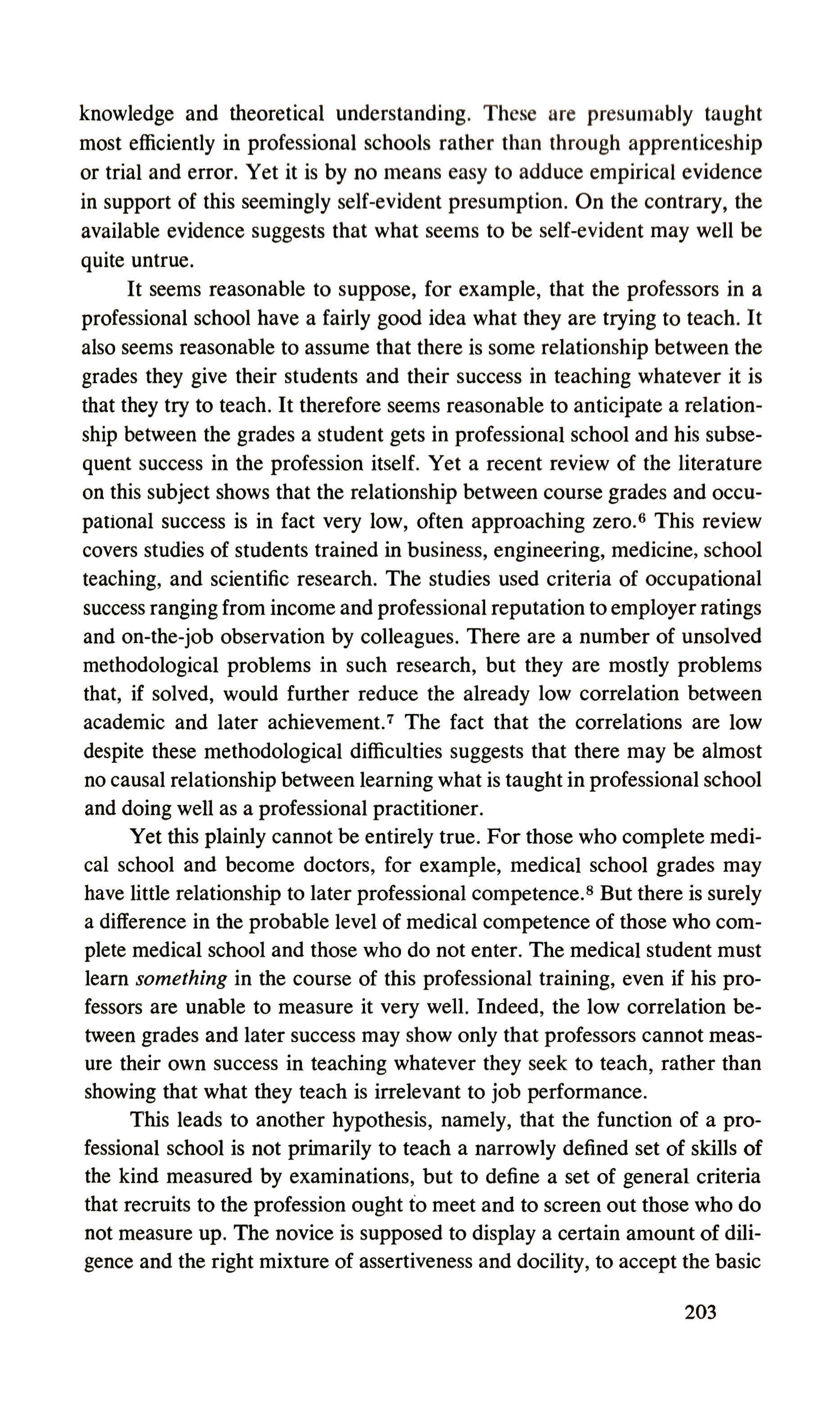
knowledge and theoretical understanding. These are presumably taught most efficiently in professional schools rather than through apprenticeship or trial and error. Yet it is by no means easy to adduce empirical evidence in support of this seemingly self-evident presumption. On the contrary, the available evidence suggests that what seems to be self-evident may well be quite untrue.
It seems reasonable to suppose, for example, that the professors in a professional school have a fairly good idea what they are trying to teach. It also seems reasonable to assume that there is some relationship between the grades they give their students and their success in teaching whatever it is that they try to teach. It therefore seems reasonable to anticipate a relationship between the grades a student gets in professional school and his subsequent success in the profession itself. Yet a recent review of the literature on this subject shows that the relationship between course grades and occupational success is in fact very low, often approaching zero." This review covers studies of students trained in business, engineering, medicine, school teaching, and scientific research. The studies used criteria of occupational success ranging from income and professional reputation to employerratings and on-the-job observation by colleagues. There are a number of unsolved methodological problems in such research, but they are mostly problems that, if solved, would further reduce the already low correlation between academic and later achievement." The fact that the correlations are low despite these methodological difficulties suggests that there may be almost no causal relationship between learning what is taught in professional school and doing well as a professional practitioner.
Yet this plainly cannot be entirely true. For those who complete medical school and become doctors, for example, medical school grades may have little relationship to later professional competence.s But there is surely a difference in the probable level of medical competence of those who complete medical school and those who do not enter. The medical student must learn something in the course of this professional training, even if his professors are unable to measure it very well. Indeed, the low correlation between grades and later success may show only that professors cannot measure their own success in teaching whatever they seek to teach, rather than showing that what they teach is irrelevant to job performance.
This leads to another hypothesis, namely, that the function of a professional school is not primarily to teach a narrowly defined set of skills of the kind measured by examinations, but to define a set of general criteria that recruits to the profession ought to meet and to screen out those who do not measure up. The novice is supposed to display a certain amount of diligence and the right mixture of assertiveness and docility, to accept the basic
203

values and assumptions of the professional subculture, and to master the rudiments of the professional vocabulary. If he does this he gets through the course of study; otherwise he does not. Whether he actually learns the details of anatomy. court procedure. or sewer design may indeed be irrelevant, or nearly so, since if he gains entry to the profession he can fill in the gaps in his technical knowledge later. The primary role of the professional school may thus be socialization. not training. n
Although scholars popped up from time to time in pre-Civil War America, they never constituted a distinct profession. A man with a passion for research in the natural sciences or history could not make his living from such work, and unless he inherited or married money he had to pursue a career of some other sort. A would-be scientist, for example, was likely to become a doctor, or perhaps a government surveyor. A would-be historian was likely to become a clergyman, a writer and lecturer, or perhaps a college teacher. If he became a teacher, however, his scholarly talents and interests would have to remain a part-time avocation, just as they would if he became a preacher. His primary responsibilities would be pedagogic and disciplinary, and it would be for competence in these activities (especially discipline) that he would be hired, paid, and retained. Competence in scholarshipmight even be a liability, first because it would suggest that he was not devoting his full energies to the students for whose education he was responsible, and second because it might lead him into conflict with received ideas about the substance or worse yet the fOIIn-of the curriculum.
There were a number of early efforts to change this situation by establishing universities that would hire scholars and try to advance knowledge as well as transmitting it. Thomas Jefferson's plans for the University of Virginia embodied this kind of thinking, and a decade later the plans for New York University did the same. But neither scheme bore the intended fruit. Reformers within established institutions, like the classicist George Ticknor at Harvard in the 1820's and President Henry Tappan at Michigan in the 1850's, were also frustrated. At the outbreak of the Civil War America had very few productive scholars anywhere, and only a minority of these was probably employed in colleges. Virtually none, either in a college or anywhere else, was employed primarily as a scholar or scientist. A generation later all this had changed. Beginning slowly in the 1870's and then gathering force during the 1880's and 1890's, institutions began to develop that were universities in practice as well as nomenclature.t These
204
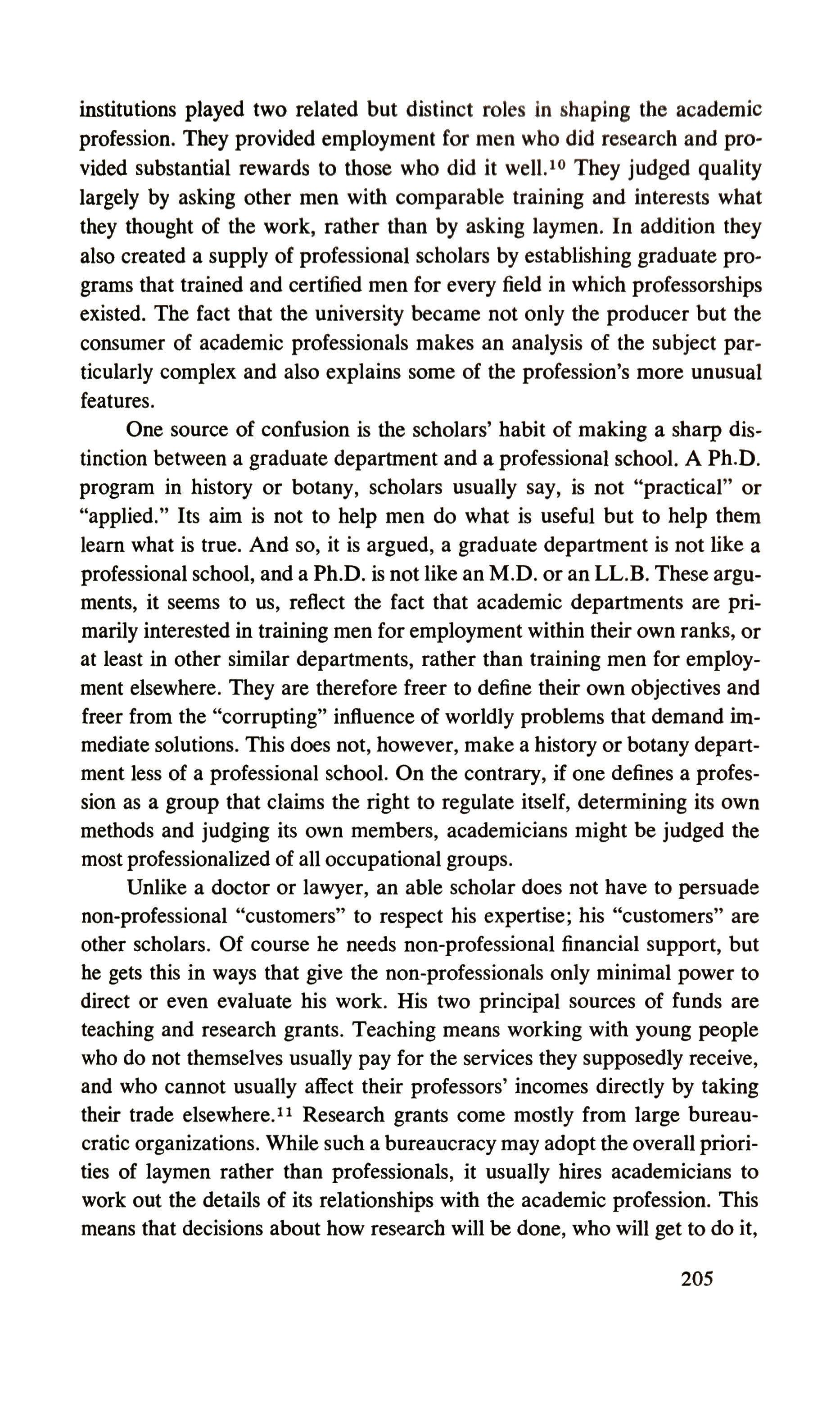
institutions played two related but distinct roles in shaping the academic profession. They provided employment for men who did research and provided substantial rewards to those who did it well.!? They judged quality largely by asking other men with comparable training and interests what they thought of the work, rather than by asking laymen. In addition they also created a supply of professional scholars by establishing graduate prograins that trained and certified men for every field in which professorships existed. The fact that the university became not only the producer but the consumer of academic professionals makes an analysis of the subject particularly complex and also explains some of the profession's more unusual features.
One source of confusion is the scholars' habit of making a sharp distinction between a graduate department and a professional school. A Ph.D. program in history or botany, scholars usually say, is not "practical" or "applied." Its aim is not to help men do what is useful but to help them learn what is true. And so, it is argued, a graduate department is not like a professional school, and a Ph.D. is not like an M.D. or an LL.B. These arguments, it seems to us, reflect the fact that academic departments are primarily interested in training men for employment within their own ranks, or at least in other similar departments, rather than training men for employment elsewhere. They are therefore freer to define their own objectives and freer from the "corrupting" influence of worldly problems that demand immediate solutions. This does not, however, make a history or botany department less of a professional school. On the contrary, if one defines a profession as a group that claims the right to regulate itself, determining its own methods and judging its own members, academicians might be judged the most professionalized of all occupational groups.
Unlike a doctor or lawyer, an able scholar does not have to persuade non-professional "customers" to respect his expertise; his "customers" are other scholars. Of course he needs non-professional financial support, but he gets this in ways that give the non-professionals only minimal power to direct or even evaluate his work. His two principal sources of funds are teaching and research grants. Teaching means working with young people who do not themselves usually pay for the services they supposedly receive, and who cannot usually affect their professors' incomes directly by taking their trade elsewhere.P Research grants come mostly from large bureaucratic organizations. While such a bureaucracy may adopt the overall priorities of laymen rather than professionals, it usually hires academicians to work out the details of its relationships with the academic profession. This means that decisions about how research will be done, who will get to do it,
205

and even (on a de facto basis) what the research will really be about, are made by members of the guild though not always by those with the highest professional status in the guild.
For all these reasons we regard graduate departments in the sciences and humanities as professional schools. Having said this, however, we must immediately add that the character of these professional schools is in many ways ambiguous. The most important and frequently discussed of these ambiguities is whether Ph.D. programs are intended to train men to teach or to do research. The answer, of course, is that they are intended to do both. But they combine these objectives in a paradoxical way. The training offered in a graduate department is almost exclusively for research; yet the certification they provide, in the form of a Ph.D., is often more important if one plans to teach than if one plans to do research.
The typical graduate student is taught the frame of reference and vocabulary of those who do research in his discipline. This, it is hoped, will enable him to read and understand their scholarly work. His ability to do this is measured in papers and examinations and recorded in grades. He is then told to go out and do similar work himself in the fOIIIl of a dissertation, and is given a Ph.D. if he does a moderately competent job. A man who wants to do academic research usually benefits from such training, and he certainly finds it easier to land a research job if he has had it. But it is important to remember that, unlike most other professions, scholarship does not require its practitioners to have had formal training or to meet certification requirements. Many research organizations hire men without Ph.D.'s or even M.A.'s in any relevant field. If such men do good work they can usually advance within the organization without being seriously handicapped by their lack of credentials. Certainly few argue in principle that research jobs should be open only to Ph.D.'s as they argue that medicine should only be open to M.D.'s or law to LL.B.'so The test, at least in theory, is competence rather than certification. An untrained researcher can also publish his findings. A scholarly reviewer may say petulantly that "this book should never have been published," but few would support legislation designed to prevent non-Ph.D.'s from getting their ideas into print, or even legislation requiring that books in given fields be approved by Ph.D.'s in that field before publication, "so as to prevent the spread of misinformation." The closest the academic disciplines come to this is to referee publications in some journals and by some university presses. This is hardly a major step toward monopoly, since other publications are open to those who are rejected by the professional journals and university presses. Scholarship, then, is not a "closed" profession in the sense that medicine or law is. The rewards of openness have been evident in the contributions made by men who have
206
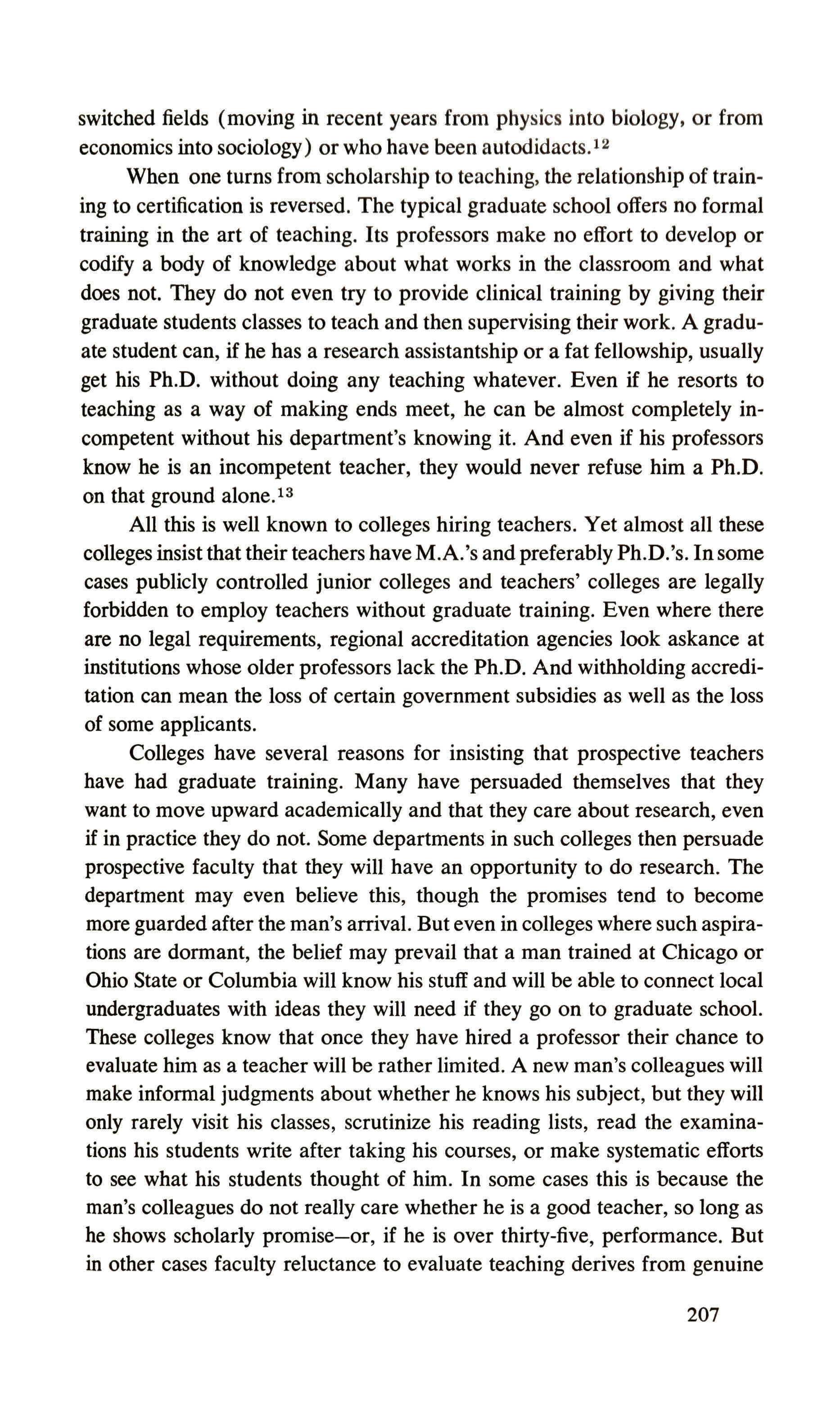
switched fields (moving in recent years from physics into biology, or from economics into sociology) or who have been autcdidacts.P
When one turns from scholarship to teaching, the relationship of training to certification is reversed. The typical graduate school offers no formal training in the art of teaching. Its professors make no effort to develop or codify a body of knowledge about what works in the classroom and what does not. They do not even try to provide clinical training by giving their graduate students classes to teach and then supervising their work. A graduate student can, if he has a research assistantship or a fat fellowship, usually get his Ph.D. without doing any teaching whatever. Even if he resorts to teaching as a way of making ends meet, he can be almost completely incompetent without his department's knowing it. And even if his professors know he is an incompetent teacher, they would never refuse him a Ph.D. on that ground alone.P
All this is well known to colleges hiring teachers. Yet almost all these colleges insist that their teachers have M.A.'s and preferably Ph.D.'so In some cases publicly controlled junior colleges and teachers' colleges are legally forbidden to employ teachers without graduate training. Even where there are no legal requirements, regional accreditation agencies look askance at institutions whose older professors lack the Ph.D. And withholding accreditation can mean the loss of certain government subsidies as well as the loss of some applicants.
Colleges have several reasons for insisting that prospective teachers have had graduate training. Many have persuaded themselves that they want to move upward academically and that they care about research, even if in practice they do not. Some departments in such colleges then persuade prospective faculty that they will have an opportunity to do research. The department may even believe this, though the promises tend to become more guarded after the man's arrival. But even in colleges where such aspirations are dormant, the belief may prevail that a man trained at Chicago or Ohio State or Columbia will know his stuff and will be able to connect local undergraduates with ideas they will need if they go on to graduate school. These colleges know that once they have hired a professor their chance to evaluate him as a teacher will be rather limited. A new man's colleagues will make informal judgments about whether he knows his subject, but they will only rarely visit his classes, scrutinize his reading lists, read the examinations his students write after taking his courses, or make systematic efforts to see what his students thought of him. In some cases this is because the man's colleagues do not really care whether he is a good teacher, so long as he shows scholarly promise or, if he is over thirty-five, performance. But in other cases faculty reluctance to evaluate teaching derives from genuine
207
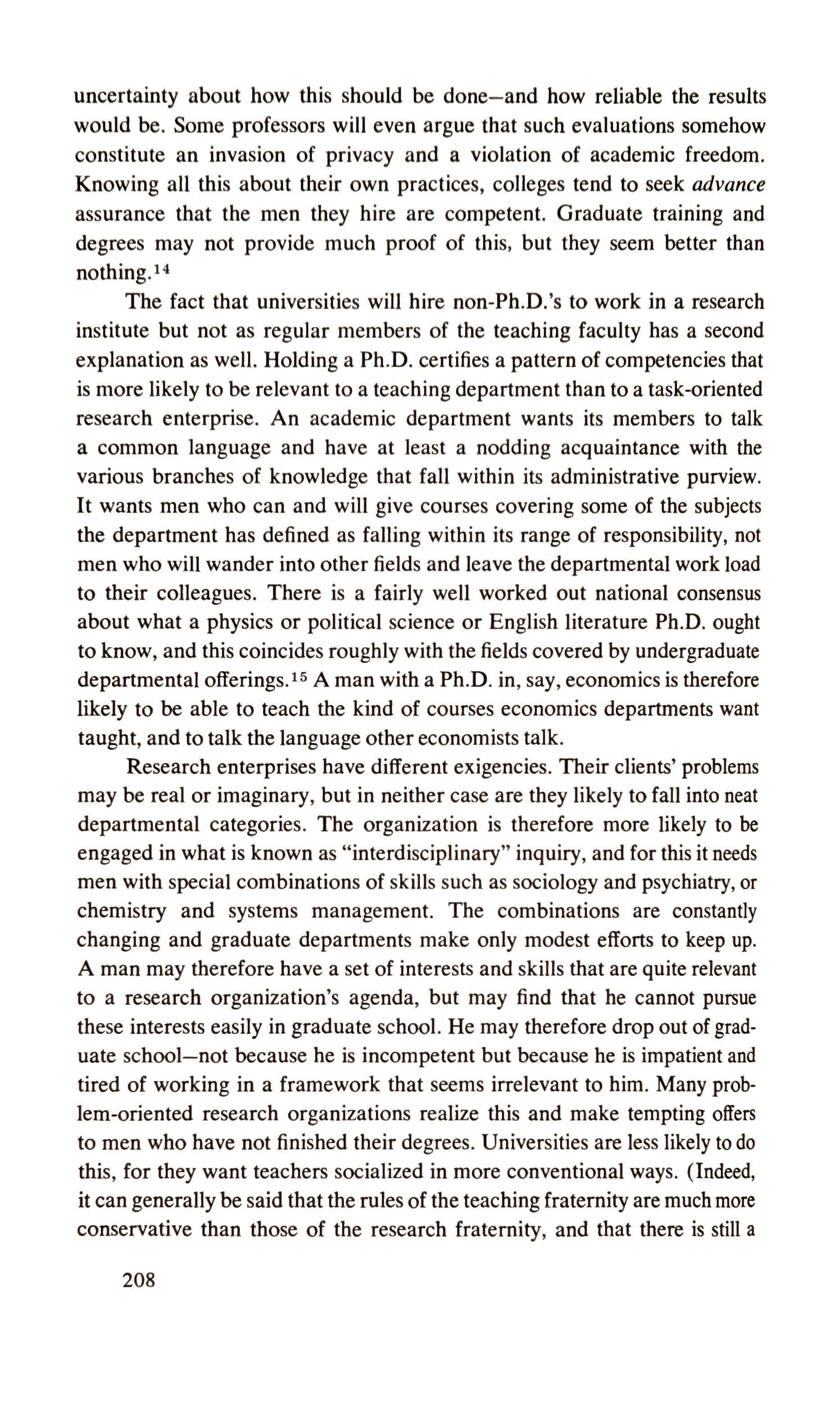
uncertainty about how this should be done and how reliable the results would be. Some professors will even argue that such evaluations somehow constitute an invasion of privacy and a violation of academic freedom. Knowing all this about their own practices, colleges tend to seek advance assurance that the men they hire are competent. Graduate training and degrees may not provide much proof of this, but they seem better than nothing. 14
The fact that universities will hire non-Ph.D.'s to work in a research institute but not as regular members of the teaching faculty has a second explanation as well. Holding a Ph.D. certifies a pattern of competencies that is more likely to be relevant to a teaching department than to a task-oriented research enterprise. An academic department wants its members to talk a common language and have at least a nodding acquaintance with the various branches of knowledge that fall within its administrative purview. It wants men who can and will give courses covering some of the subjects the department has defined as falling within its range of responsibility, not men who will wander into other fields and leave the departmental work load to their colleagues. There is a fairly well worked out national consensus about what a physics or political science or English literature Ph.D. ought to know, and this coincides roughly with the fields covered by undergraduate departmental offerings.t" A man with a Ph.D. in, say, economics is therefore likely to be able to teach the kind of courses economics departments want taught, and to talk the language other economists talk. Research enterprises have different exigencies. Their clients' problems may be real or imaginary, but in neither case are they likely to fall into neat departmental categories. The organization is therefore more likely to be engaged in what is known as "interdisciplinary" inquiry, and for this it needs men with special combinations of skills such as sociology and psychiatry, or chemistry and systems management. The combinations are constantly changing and graduate departments make only modest efforts to keep up. A man may therefore have a set of interests and skills that are quite relevant to a research organization's agenda, but may find that he cannot pursue these interests easily in graduate school. He may therefore drop out of graduate school not because he is incompetent but because he is impatient and tired of working in a framework that seems irrelevant to him. Many problem-oriented research organizations realize this and make tempting offers to men who have not finished their degrees. Universities are less likely to do this, for they want teachers socialized in more conventional ways. (Indeed, it can generally be said that the rules of the teaching fraternity are much more conservative than those of the research fraternity, and that there is still a
208
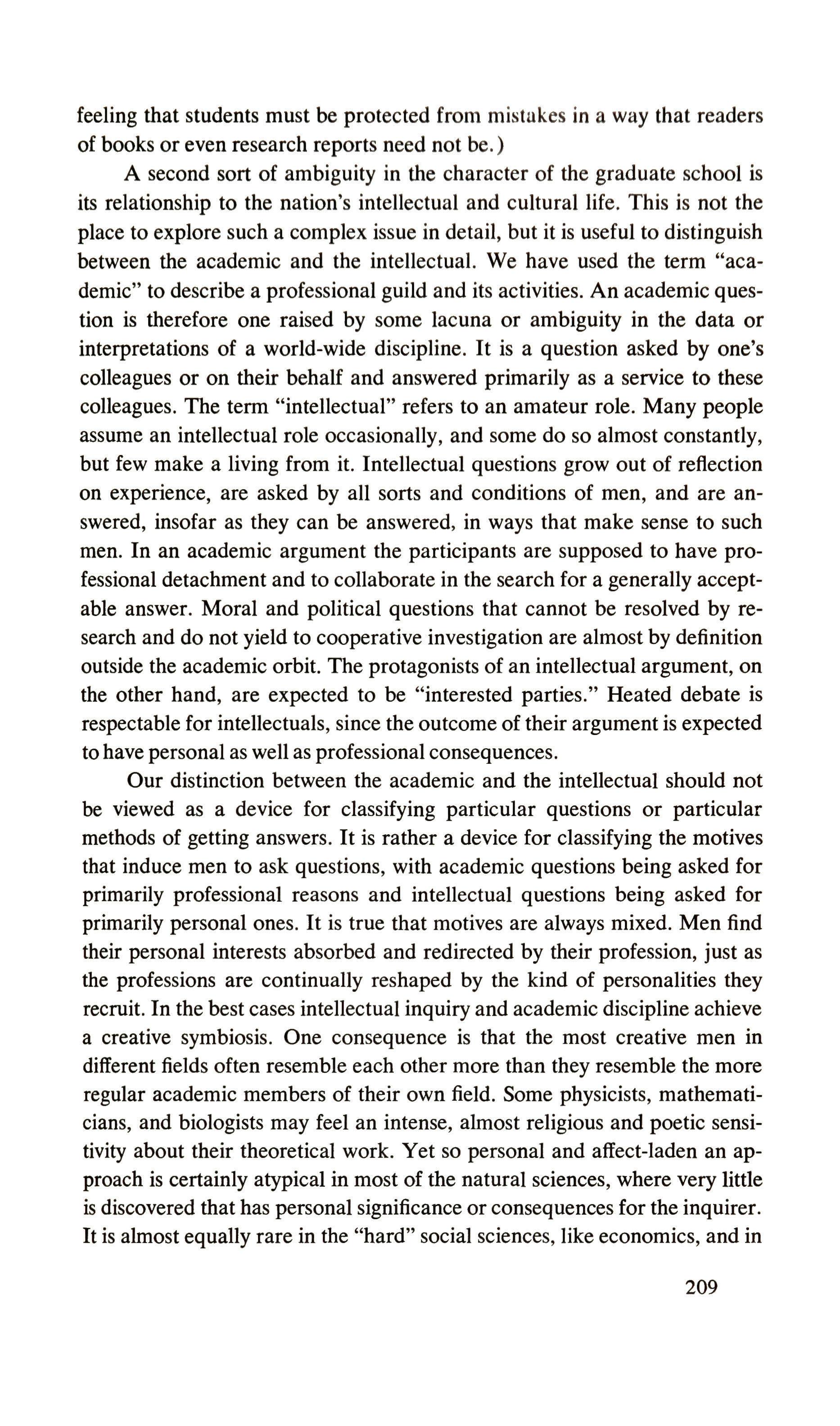
feeling that students must be protected from mistakes in a way that readers of books or even research reports need not be.)
A second sort of ambiguity in the character of the graduate school is its relationship to the nation's intellectual and cultural life. This is not the place to explore such a complex issue in detail, but it is useful to distinguish between the academic and the intellectual. We have used the term "academic" to describe a professional guild and its activities. An academic question is therefore one raised by some lacuna or ambiguity in the data or interpretations of a world-wide discipline. It is a question asked by one's colleagues or on their behalf and answered primarily as a service to these colleagues. The term "intellectual" refers to an amateur role. Many people assume an intellectual role occasionally, and some do so almost constantly, but few make a living from it. Intellectual questions grow out of reflection on experience, are asked by all sorts and conditions of men, and are answered, insofar as they can be answered, in ways that make sense to such men. In an academic argument the participants are supposed to have professional detachment and to collaborate in the search for a generally acceptable answer. Moral and political questions that cannot be resolved by research and do not yield to cooperative investigation are almost by definition outside the academic orbit. The protagonists of an intellectual argument, on the other hand, are expected to be "interested parties." Heated debate is respectable for intellectuals, since the outcome of their argument is expected to have personal as well as professional consequences.
Our distinction between the academic and the intellectual should not be viewed as a device for classifying particular questions or particular methods of getting answers. It is rather a device for classifying the motives that induce men to ask questions, with academic questions being asked for primarily professional reasons and intellectual questions being asked for primarily personal ones. It is true that motives are always mixed. Men find their personal interests absorbed and redirected by their profession, just as the professions are continually reshaped by the kind of personalities they recruit. In the best cases intellectual inquiry and academic discipline achieve a creative symbiosis. One consequence is that the most creative men in different fields often resemble each other more than they resemble the more regular academic members of their own field. Some physicists, mathematicians, and biologists may feel an intense, almost religious and poetic sensitivity about their theoretical work. Yet so personal and affect-laden an approach is certainly atypical in most of the natural sciences, where very little is discovered that has personal significance or consequences for the inquirer. It is almost equally rare in the "hard" social sciences, like economics, and in
209
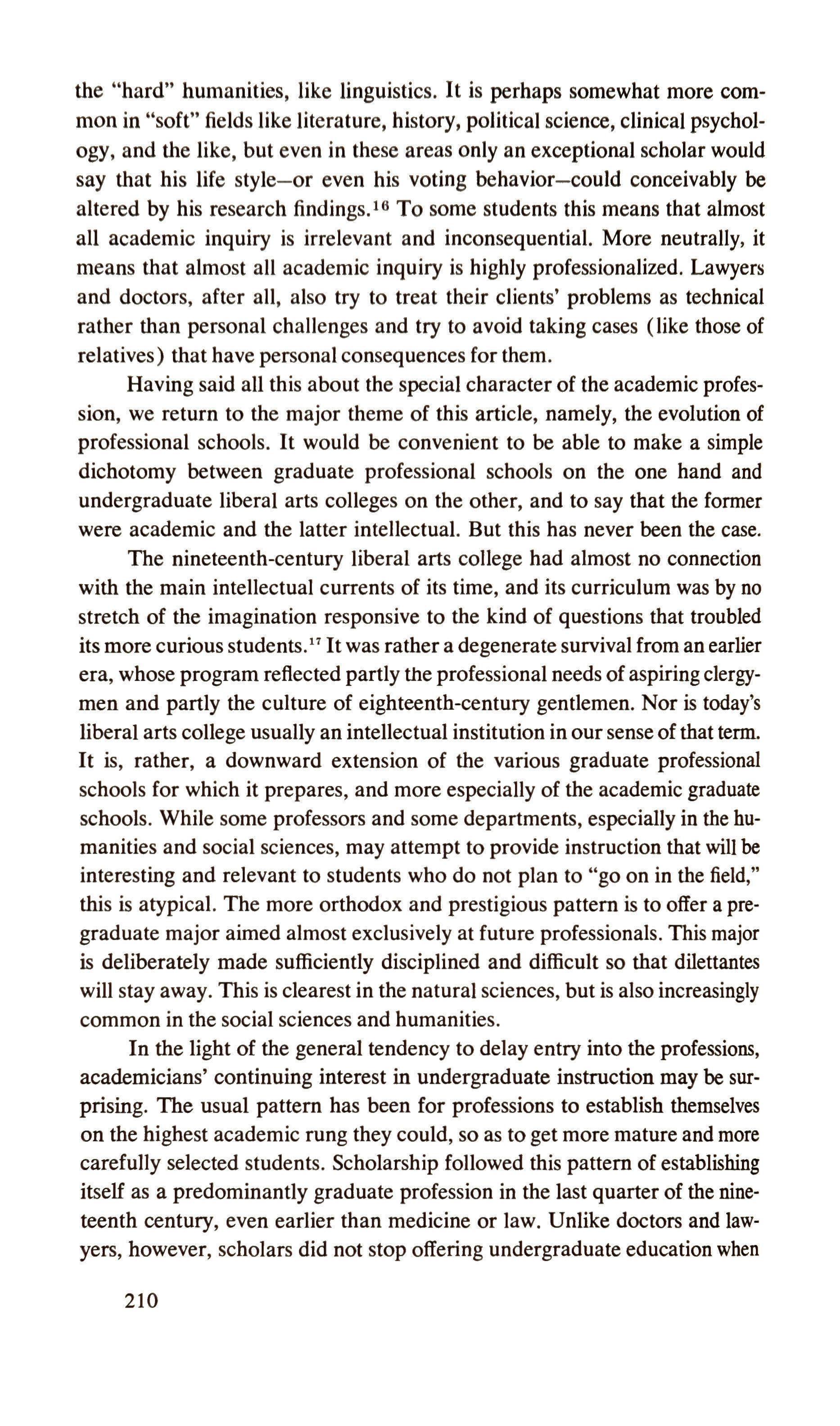
the "hard" humanities, like linguistics. It is perhaps somewhat more common in "soft" fields like literature, history, political science, clinical psychology, and the like, but even in these areas only an exceptional scholar would say that his life style or even his voting behavior could conceivably be altered by his research findings.w To some students this means that almost all academic inquiry is irrelevant and inconsequential. More neutrally, it means that almost all academic inquiry is highly professionalized. Lawyers and doctors, after all, also try to treat their clients' problems as technical rather than personal challenges and try to avoid taking cases (like those of relatives) that have personal consequences for them.
Having said all this about the special character of the academic profession, we return to the major theme of this article, namely, the evolution of professional schools. It would be convenient to be able to make a simple dichotomy between graduate professional schools on the one hand and undergraduate liberal arts colleges on the other, and to say that the former were academic and the latter intellectual. But this has never been the case.
The nineteenth-century liberal arts college had almost no connection with the main intellectual currents of its time, and its curriculum was by no stretch of the imagination responsive to the kind of questions that troubled its more curious students. 17 It was rather a degenerate survival from an earlier era, whose program reflected partly the professional needs of aspiringclergymen and partly the culture of eighteenth-century gentlemen. Nor is today's liberal arts college usually an intellectual institution in our sense ofthat term, It is, rather, a downward extension of the various graduate professional schools for which it prepares, and more especially of the academic graduate schools. While some professors and some departments, especially in the humanities and social sciences, may attempt to provide instruction that will be interesting and relevant to students who do not plan to "go on in the field," this is atypical. The more orthodox and prestigious pattern is to offer a pregraduate major aimed almost exclusively at future professionals. 'Ibis major is deliberately made sufficiently disciplined and difficult so that dilettantes will stay away. This is clearest in the natural sciences, but is also increasingly common in the social sciences and humanities.
In the light of the general tendency to delay entry into the professions, academicians' continuing interest in undergraduate instruction may be surprising. The usual pattern has been for professions to establish themselves on the highest academic rung they could, so as to get more mature and more carefully selected students. Scholarship followed this pattern of establishing itself as a predominantly graduate profession in the last quarter of the nineteenth century, even earlier than medicine or law. Unlike doctors and lawyers, however, scholars did not stop offering undergraduate education when 210
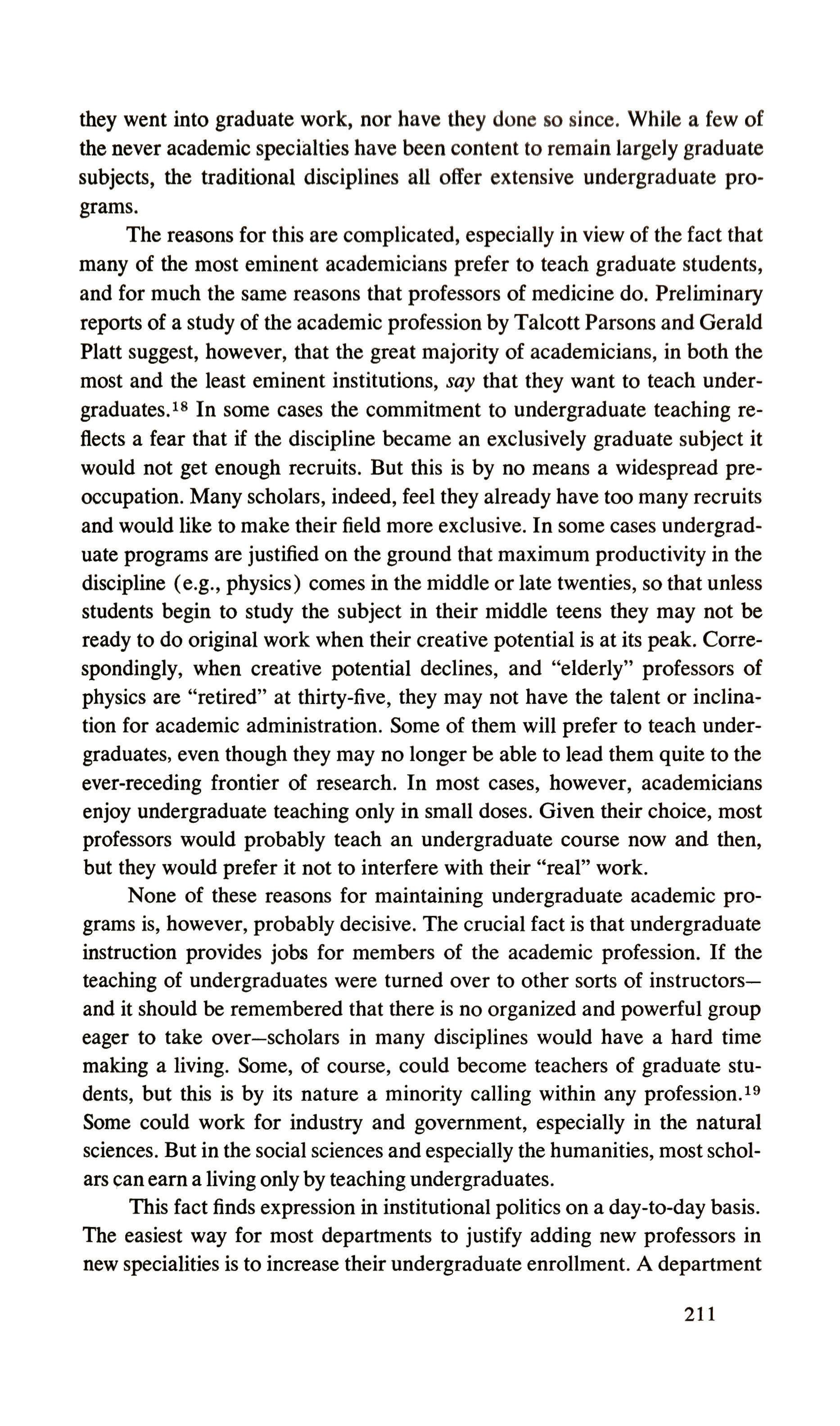
they went into graduate work, nor have they done so since. While a few of the never academic specialties have been content to remain largely graduate subjects, the traditional disciplines all offer extensive undergraduate programs.
The reasons for this are complicated, especially in view of the fact that many of the most eminent academicians prefer to teach graduate students, and for much the same reasons that professors of medicine do. Preliminary reports of a study of the academic profession by Talcott Parsons and Gerald Platt suggest, however, that the great majority of academicians, in both the most and the least eminent institutions, say that they want to teach undergraduates.w In some cases the commitment to undergraduate teaching reflects a fear that if the discipline became an exclusively graduate subject it would not get enough recruits. But this is by no means a widespread preoccupation. Many scholars, indeed, feel they already have too many recruits and would like to make their field more exclusive. In some cases undergraduate programs are justified on the ground that maximum productivity in the discipline (e.g., physics) comes in the middle or late twenties, so that unless students begin to study the subject in their middle teens they may not be ready to do original work when their creative potential is at its peak. Correspondingly, when creative potential declines, and "elderly" professors of physics are "retired" at thirty-five, they may not have the talent or inclination for academic administration. Some of them will prefer to teach undergraduates, even though they may no longer be able to lead them quite to the ever-receding frontier of research. In most cases, however, academicians enjoy undergraduate teaching only in small doses. Given their choice, most professors would probably teach an undergraduate course now and then, but they would prefer it not to interfere with their "real" work.
None of these reasons for maintaining undergraduate academic programs is, however, probably decisive. The crucial fact is that undergraduate instruction provides jobs for members of the academic profession. If the teaching of undergraduates were turned over to other sorts of instructorsand it should be remembered that there is no organized and powerful group eager to take over scholars in many disciplines would have a hard time making a living. Some, of course, could become teachers of graduate students, but this is by its nature a minority calling within any profession.t? Some could work for industry and government, especially in the natural sciences. But in the social sciences and especially the humanities, most scholars can earn a living onlybyteachingundergraduates. This fact finds expression in institutional politics on a day-to-day basis. The easiest way for most departments to justify adding new professors in new specialities is to increase their undergraduate enrollment. A department
211

could afford to abandon its undergraduate program only if it had ample grants, contracts, or endowments to support its professors. Very few departments are in this position, though most would like to be. To the extent that they are, their professors tend to withdraw from undergraduate teaching. As the resources available to support academic research grow, this withdrawal becomes more common and its organizational implications more obvious. Over the next generation it seems likely that many more academic specialists with outside research grants will regroup themselves in exclusively graduate departments or in university-based research institutes, leaving the bulk of undergraduate education to professors in less affluent specialities. Yet we make such a prediction with considerable hesitation, for while it seems both economically and professionally logical, history is replete with similar prophecies that came to nothing. The men who organized professional academic training at the graduate level in the last quarter of the nineteenth century were in many if not most cases convinced that it should be quite separate from undergraduate education. The early plans for Johns Hopkins University, Clark University, and Catholic University all called for exclusively graduate instruction. Other institutions, such as Chicago and Columbia, sought to maintain an undergraduate college but also to have a separate graduate school with its own faculty. Yet all such efforts to erect a wall of separation between graduate academic training and undergraduate liberal arts training have failed. The exclusively graduate universities have admitted undergraduates, and the bifurcated universities have for the most part moved toward a unification of graduate and undergraduate faculties. This unification is partly a result of the graduate faculty's positive desire to teach undergraduates, partly of its aversion to letting non-academicians do so. The idea that undergraduate teaching jobs are going to nonprofessionals seems to be ideologically offensive to graduate faculty, and they will even take on the irksome task themselves to avoid this outcome. There is a certain protectiveness in this attitude, which has its well-meaning as well as tariff-like aspects. The academic equivalent of senatorial courtesy forces professors to tolerate the heterodoxy and even the destructiveness vis-a-vis students of those with scholarly credentials, but the line can be held against those who, lacking these credentials, may "spoil" students for further work in the field. There is also a desire to have students committed early to a discipline, not only out of a missionary impulse to spread enlightenment but also out of a feeling that the early committers may have higher ability than the late committers, for whom the field may be a second-choice calling. (Whether this is actually so is doubtful. It depends very much on the particular field and perhaps on the particularinstitution.)
212
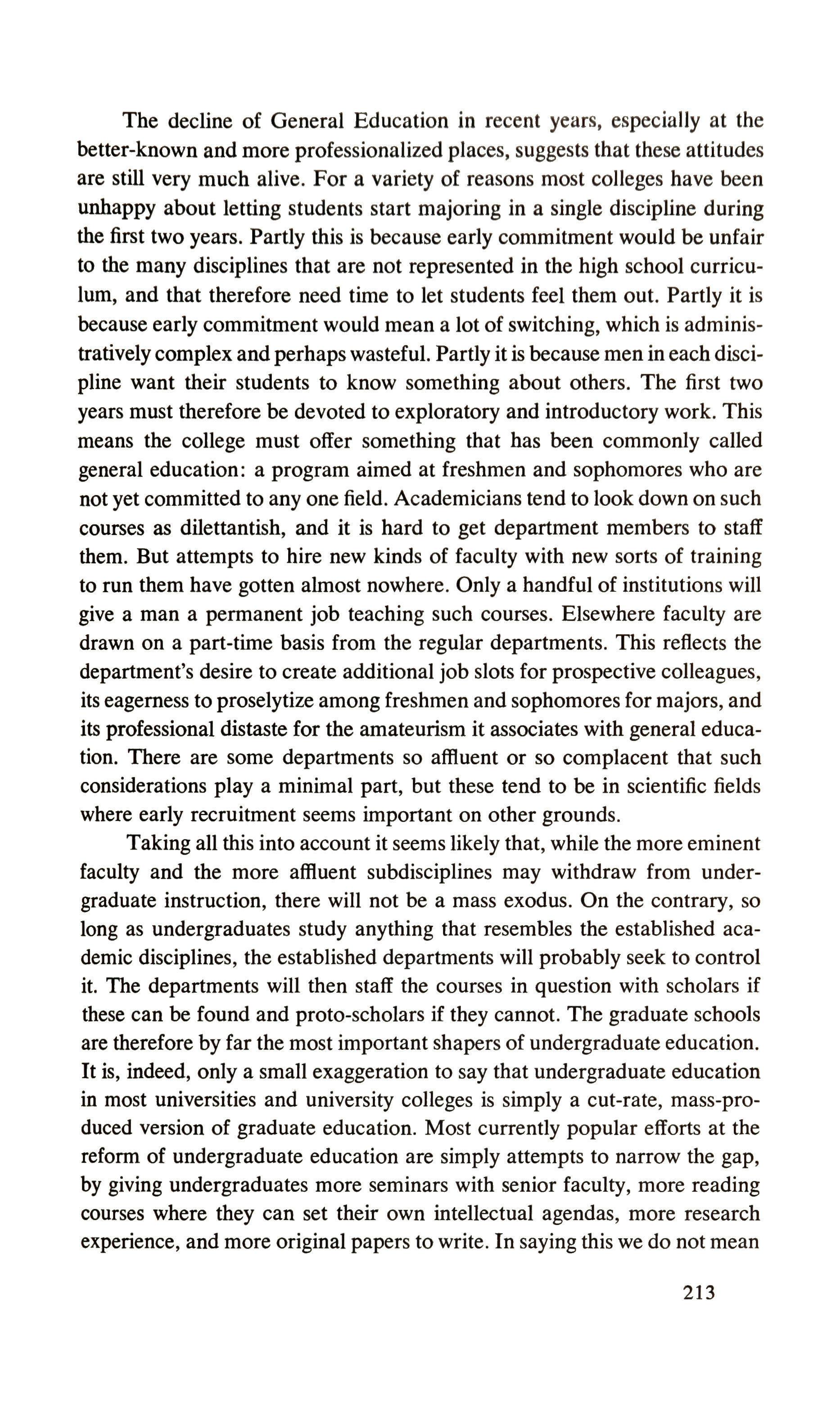
The decline of General Education in recent years, especially at the better-known and more professionalized places, suggests that these attitudes are still very much alive. For a variety of reasons most colleges have been unhappy about letting students start majoring in a single discipline during the first two years. Partly this is because early commitment would be unfair to the many disciplines that are not represented in the high school curriculum, and that therefore need time to let students feel them out. Partly it is because early commitment would mean a lot of switching, which is administrativelycomplex and perhaps wasteful. Partly it is because men in each discipline want their students to know something about others. The first two years must therefore be devoted to exploratory and introductory work. This means the college must offer something that has been commonly called general education: a program aimed at freshmen and sophomores who are not yet committed to anyone field. Academicians tend to look down on such courses as dilettantish, and it is hard to get department members to staff them. But attempts to hire new kinds of faculty with new sorts of training to run them have gotten almost nowhere. Only a handful of institutions will give a man a permanent job teaching such courses. Elsewhere faculty are drawn on a part-time basis from the regular departments. This reflects the department's desire to create additional job slots for prospective colleagues, its eagerness to proselytize among freshmen and sophomores for majors, and its professional distaste for the amateurism it associates with general education. There are some departments so affluent or so complacent that such considerations playa minimal part, but these tend to be in scientific fields where early recruitment seems important on other grounds.
Taking all this into account it seems likely that, while the more eminent faculty and the more affluent subdisciplines may withdraw from undergraduate instruction, there will not be a mass exodus. On the contrary, so long as undergraduates study anything that resembles the established academic disciplines, the established departments will probably seek to control it. The departments will then staff the courses in question with scholars if these can be found and proto-scholars if they cannot. The graduate schools are therefore by far the most important shapers of undergraduate education. It is, indeed, only a small exaggeration to say that undergraduate education in most universities and university colleges is simply a cut-rate, mass-produced version of graduate education. Most currently popular efforts at the refOlin of undergraduate education are simply attempts to narrow the gap, by giving undergraduates more seminars with senior faculty, more reading courses where they can set their own intellectual agendas, more research experience, and more original papers to write. In saying this we do not mean
213
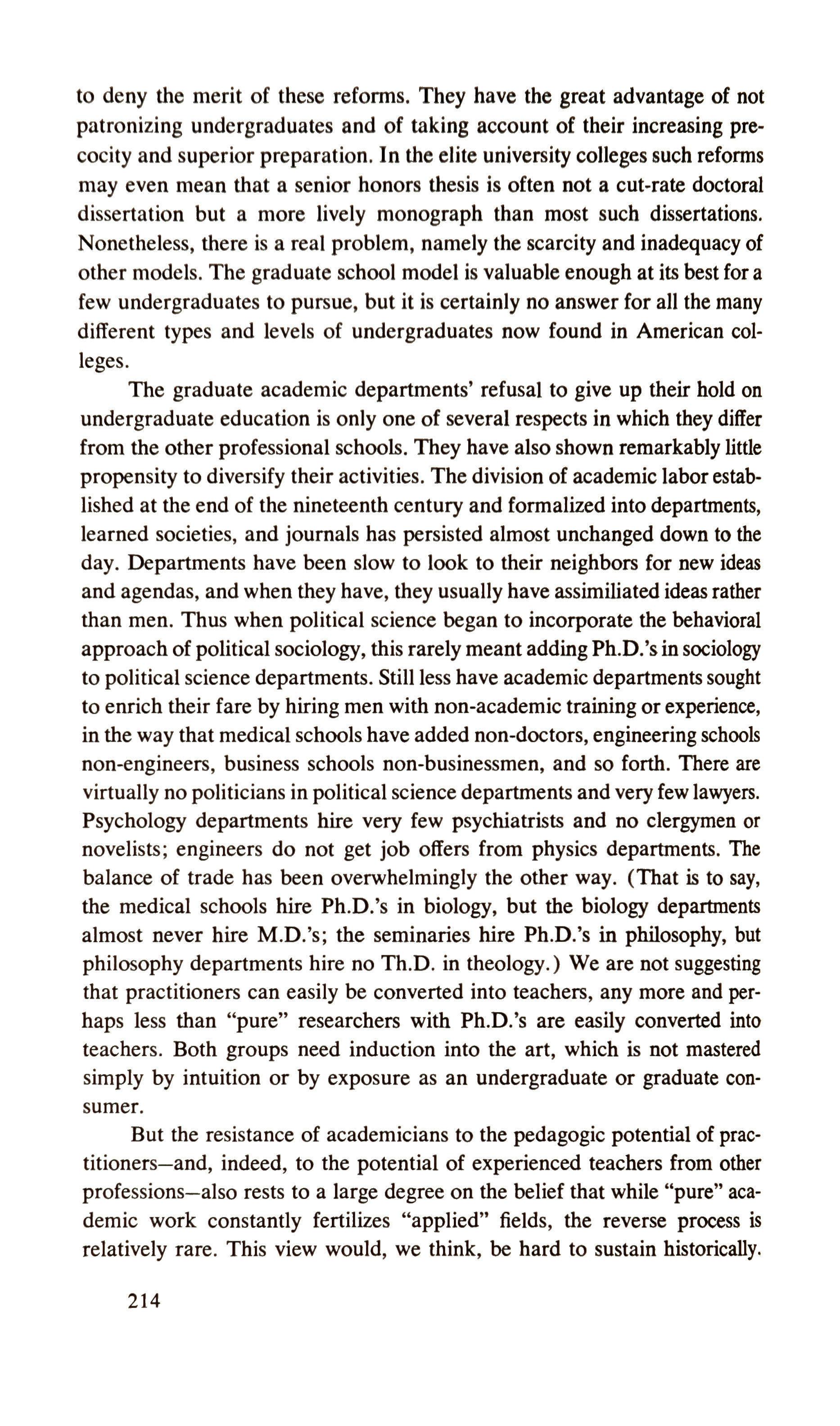
to deny the merit of these reforms, They have the great advantage of not patronizing undergraduates and of taking account of their increasing precocity and superior preparation. In the elite university colleges such reforms may even mean that a senior honors thesis is often not a cut-rate doctoral dissertation but a more lively monograph than most such dissertations. Nonetheless, there is a real problem, namely the scarcity and inadequacy of other models. The graduate school model is valuable enough at its best for a few undergraduates to pursue, but it is certainly no answer for all the many different types and levels of undergraduates now found in American colleges.
The graduate academic departments' refusal to give up their hold on undergraduate education is only one of several respects in which they differ from the other professional schools. They have also shown remarkably little propensity to diversify their activities. The division of academic labor established at the end of the nineteenth century and formalized into departments, learned societies, and journals has persisted almost unchanged down to the day. Departments have been slow to look to their neighbors for new ideas and agendas, and when they have, they usually have assimiliated ideas rather than men. Thus when political science began to incorporate the behavioral approach of political sociology, this rarely meant adding Ph.D.'s in sociology to political science departments. Still less have academic departments sought to enrich their fare by hiring men with non-academic training or experience, in the way that medical schools have added non-doctors, engineering schools non-engineers, business schools non-businessmen, and so forth. There are virtually no politicians in political science departments and very few lawyers. Psychology departments hire very few psychiatrists and no clergymen or novelists; engineers do not get job offers from physics departments, The balance of trade has been overwhelmingly the other way. (That is to say, the medical schools hire Ph.D.'s in biology, but the biology departments almost never hire M.D.'s; the seminaries hire Ph.D.'s in philosophy, but philosophy departments hire no Th.D. in theology.) We are not suggesting that practitioners can easily be converted into teachers, any more and perhaps less than "pure" researchers with Ph.D.'s are easily converted into teachers. Both groups need induction into the art, which is not mastered simply by intuition or by exposure as an undergraduate or graduate consumer.
But the resistance of academicians to the pedagogic potential of practitioners and, indeed, to the potential of experienced teachers from other professions also rests to a large degree on the belief that while "pure" academic work constantly fertilizes "applied" fields, the reverse process is relatively rare. This view would, we think, be hard to sustain historically.
214
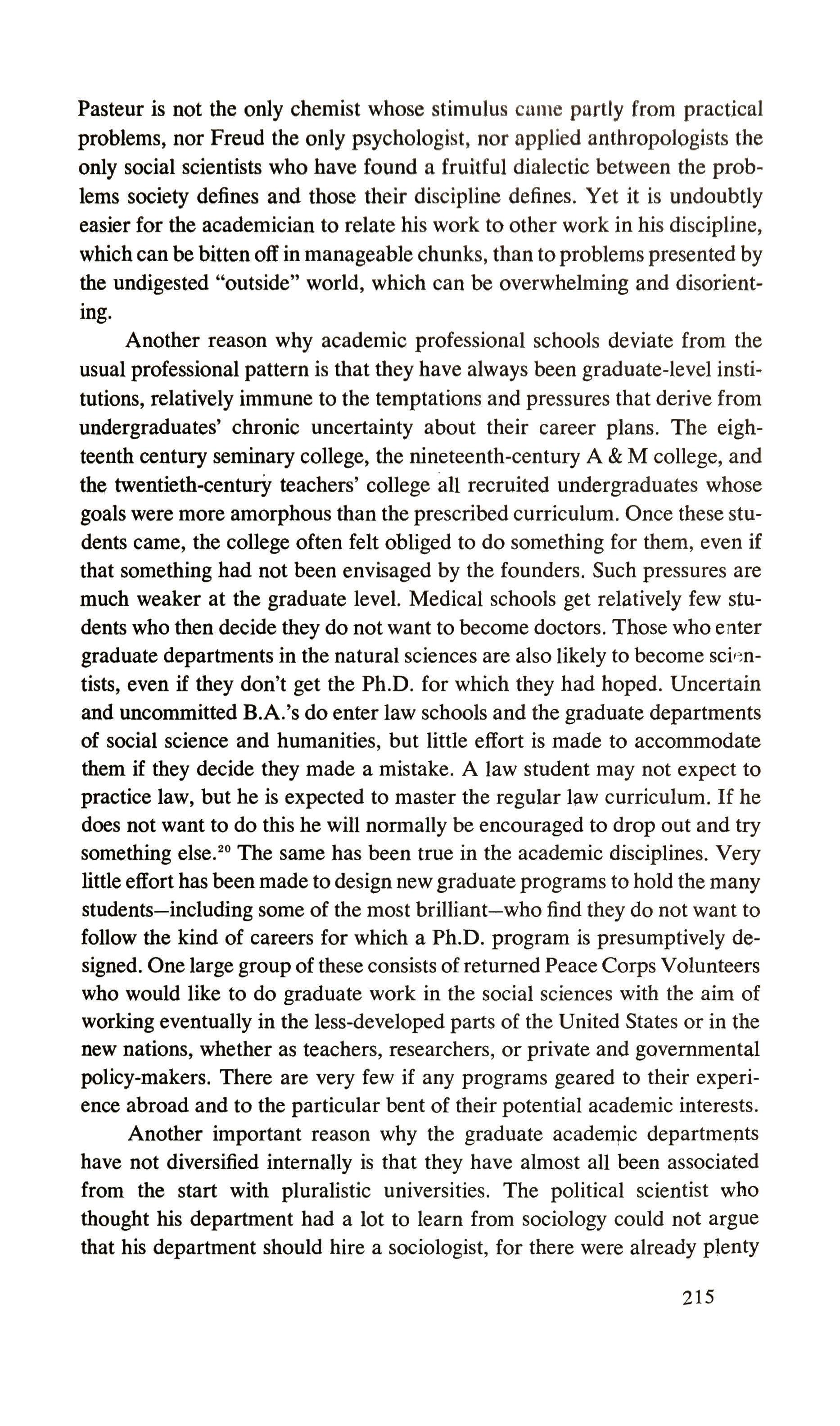
Pasteur is not the only chemist whose stimulus cume partly from practical problems, nor Freud the only psychologist, nor applied anthropologists the only social scientists who have found a fruitful dialectic between the problems society defines and those their discipline defines. Yet it is undoubtly easier for the academician to relate his work to other work in his discipline, which can be bitten off in manageable chunks, than to problems presented by the undigested "outside" world, which can be overwhelming and disorientmg.
Another reason why academic professional schools deviate from the usual professional pattern is that they have always been graduate-level institutions, relatively immune to the temptations and pressures that derive from undergraduates' chronic uncertainty about their career plans. The eighteenth century seminary college, the nineteenth-century A & M college, and the twentieth-century teachers' college all recruited undergraduates whose goals were more amorphous than the prescribed curriculum. Once these students came, the college often felt obliged to do something for them, even if that something had not been envisaged by the founders. Such pressures are much weaker at the graduate level. Medical schools get relatively few students who then decide they do not want to become doctors. Those who enter graduate departments in the natural sciences are also likely to become scientists, even if they don't get the Ph.D. for which they had hoped. Uncertain and uncommitted B.A.'s do enter law schools and the graduate departments of social science and humanities, but little effort is made to accommodate them if they decide they made a mistake. A law student may not expect to practice law, but he is expected to master the regular law curriculum. If he does not want to do this he will normally be encouraged to drop out and try something else." The same has been true in the academic disciplines. Very little effort has been made to design new graduate programs to hold the many students including some of the most brilliant who find they do not want to follow the kind of careers for which a Ph.D. program is presumptively designed. One large group of these consists of returned Peace Corps Volunteers who would like to do graduate work in the social sciences with the aim of working eventually in the less-developed parts of the United States or in the new nations, whether as teachers, researchers, or private and governmental policy-makers. There are very few if any programs geared to their experience abroad and to the particular bent of their potential academic interests. Another important reason why the graduate academic departments have not diversified internally is that they have almost all been associated from the start with pluralistic universities. The political scientist who thought his department had a lot to learn from sociology could not argue that his department should hire a sociologist, for there were already plenty
215
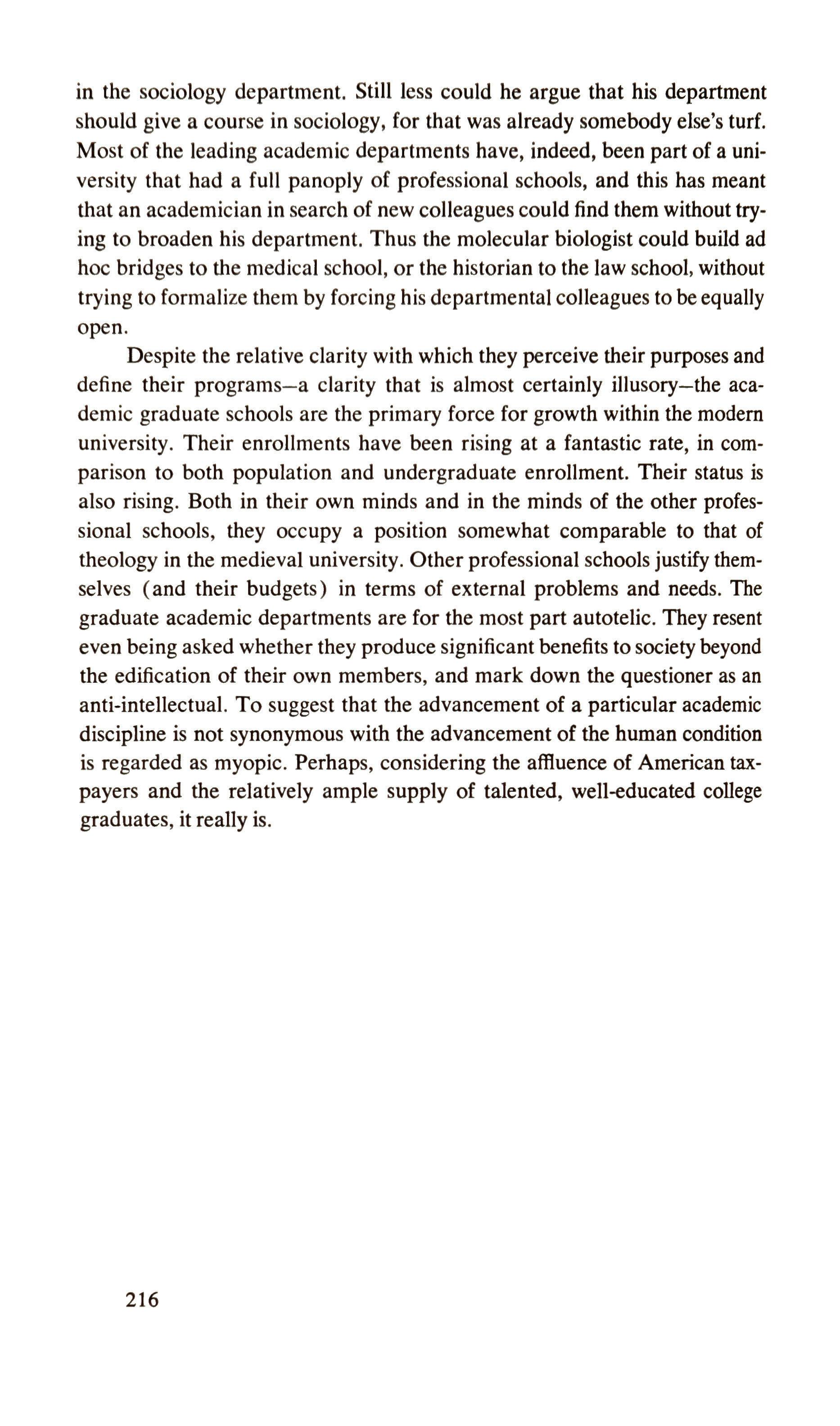
in the sociology department. Still less could he argue that his department should give a course in sociology, for that was already somebody else's turf. Most of the leading academic departments have, indeed, been part of a university that had a full panoply of professional schools, and this has meant that an academician in search of new colleagues could find them without trying to broaden his department. Thus the molecular biologist could build ad hoc bridges to the medical school, or the historian to the law school, without trying to formalize them by forcing his departmental colleagues to be equally open.
Despite the relative clarity with which they perceive their purposes and define their programs a clarity that is almost certainly illusory the academic graduate schools are the primary force for growth within the modem university. Their enrollments have been rising at a fantastic rate, in comparison to both population and undergraduate enrollment. Their status is also rising. Both in their own minds and in the minds of the other professional schools, they occupy a position somewhat comparable to that of theology in the medieval university. Other professional schools justify themselves (and their budgets) in terms of external problems and needs. The graduate academic departments are for the most part autotelic. They resent even being asked whether they produce significant benefits to societybeyond the edification of their own members, and mark down the questioner as an anti-intellectual. To suggest that the advancement of a particular academic discipline is not synonymous with the advancement of the human condition is regarded as myopic. Perhaps, considering the affluence of American taxpayers and the relatively ample supply of talented, well-educated college graduates, it really is.
216
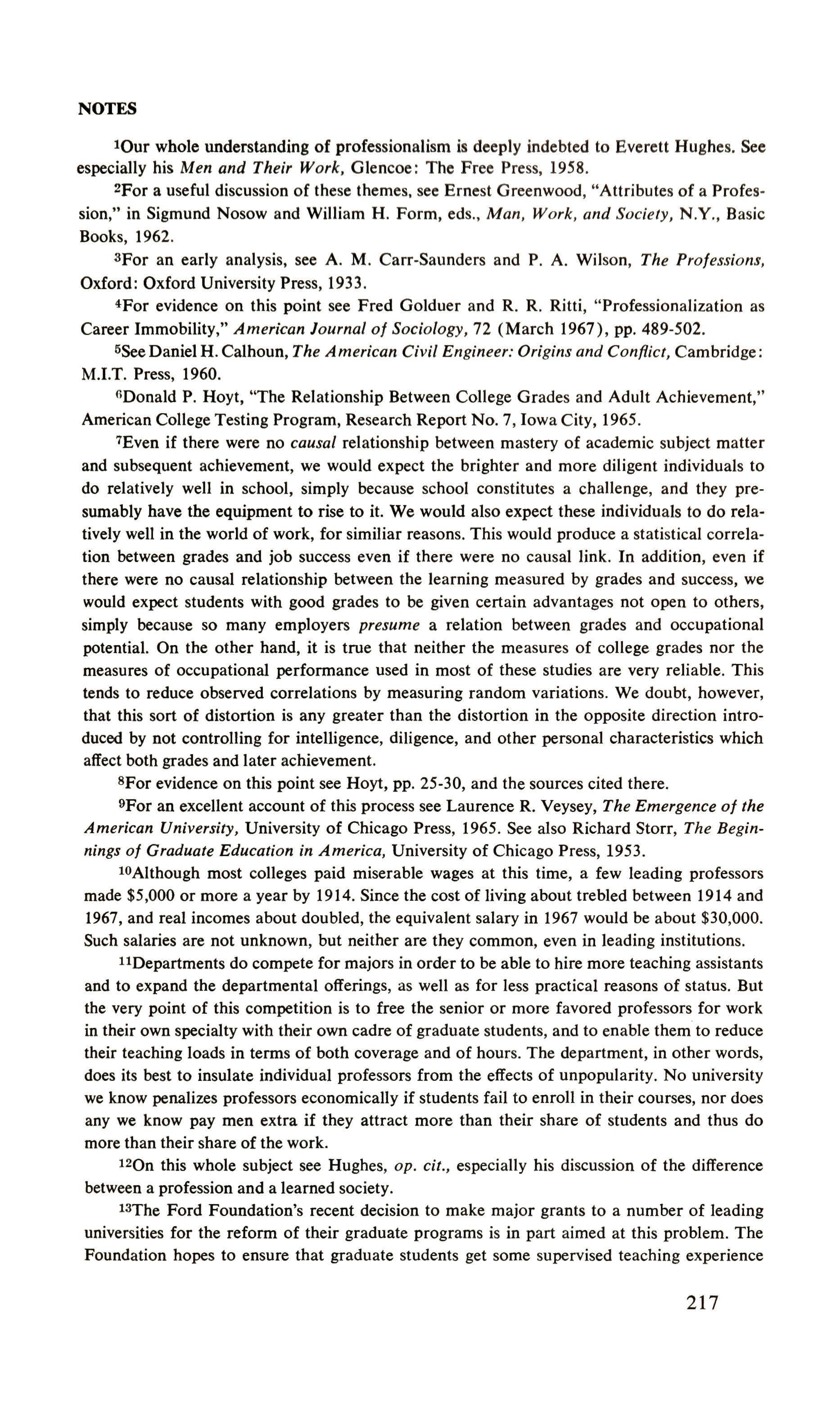
NOTES
lOur whole understanding of professionalism is deeply indebted to Everett Hughes. See especially his Men and Their Work, Glencoe: The Free Press, 1958.
2For a useful discussion of these themes, see Ernest Greenwood, "Attributes of a Profession," in Sigmund Nosow and William H. Form, eds., Man, Work, and Society, N.Y., Basic Books, 1962.
3For an early analysis, see A. M. Carr-Saunders and P. A. Wilson, The Professions, Oxford: Oxford University Press, 1933.
4For evidence on this point see Fred Golduer and R. R. Ritti, "Professionalization as Career Immobility," American Journal of Sociology, 72 (March 1967), pp. 489-502.
5See Daniel H. Calhoun, The American Civil Engineer: Origins and Conflict, Cambridge: M.I.T. Press, 1960.
6Donald P. Hoyt, "The Relationship Between College Grades and Adult Achievement," American College Testing Program, Research Report No.7, Iowa City, 1965.
7Even if there were no causal relationship between mastery of academic subject matter and subsequent achievement, we would expect the brighter and more diligent individuals to do relatively well in school, simply because school constitutes a challenge, and they presumably have the equipment to rise to it. We would also expect these individuals to do relatively well in the world of work, for similiar reasons. This would produce a statistical correlation between grades and job success even if there were no causal link. In addition, even if there were no causal relationship between the learning measured by grades and success, we would expect students with good grades to be given certain advantages not open to others, simply because so many employers presume a relation between grades and occupational potential. On the other hand, it is true that neither the measures of college grades nor the measures of occupational perf01 mance used in most of these studies are very reliable. This tends to reduce observed correlations by measuring random variations. We doubt, however, that this sort of distortion is any greater than the distortion in the opposite direction introduced by not controlling for intelligence, diligence, and other personal characteristics which affect both grades and later achievement.
8For evidence on this point see Hoyt, pp. 25-30, and the sources cited there.
9For an excellent account of this process see Laurence R. Veysey, The Emergence of the American University, University of Chicago Press, 1965. See also Richard Storr, The Beginnings of Graduate Education in America, University of Chicago Press, 1953.
10Although most colleges paid miserable wages at this time, a few leading professors made $5,000 or more a year by 1914. Since the cost of living about trebled between 1914 and 1967, and real incomes about doubled, the equivalent salary in 1967 would be about $30,000. Such salaries are not unknown, but neither are they common, even in leading institutions.
IlDepartments do compete for majors in order to be able to hire more teaching assistants and to expand the departmental offerings, as well as for less practical reasons of status. But the very point of this competition is to free the senior or more favored professors for work in their own specialty with their own cadre of graduate students, and to enable them to reduce their teaching loads in terms of both coverage and of hours. The department, in other words, does its best to insulate individual professors from the effects of unpopularity. No university we know penalizes professors economically if students fail to enroll in their courses, nor does any we know pay men extra if they attract more than their share of students and thus do more than their share of the work.
120n this whole subject see Hughes, op. cit., especially his discussion of the difference between a profession and a learned society.
13The Ford Foundation's recent decision to make major grants to a number of leading universities for the reform of their graduate programs is in part aimed at this problem. The Foundation hopes to ensure that graduate students get some supervised teaching experience
217
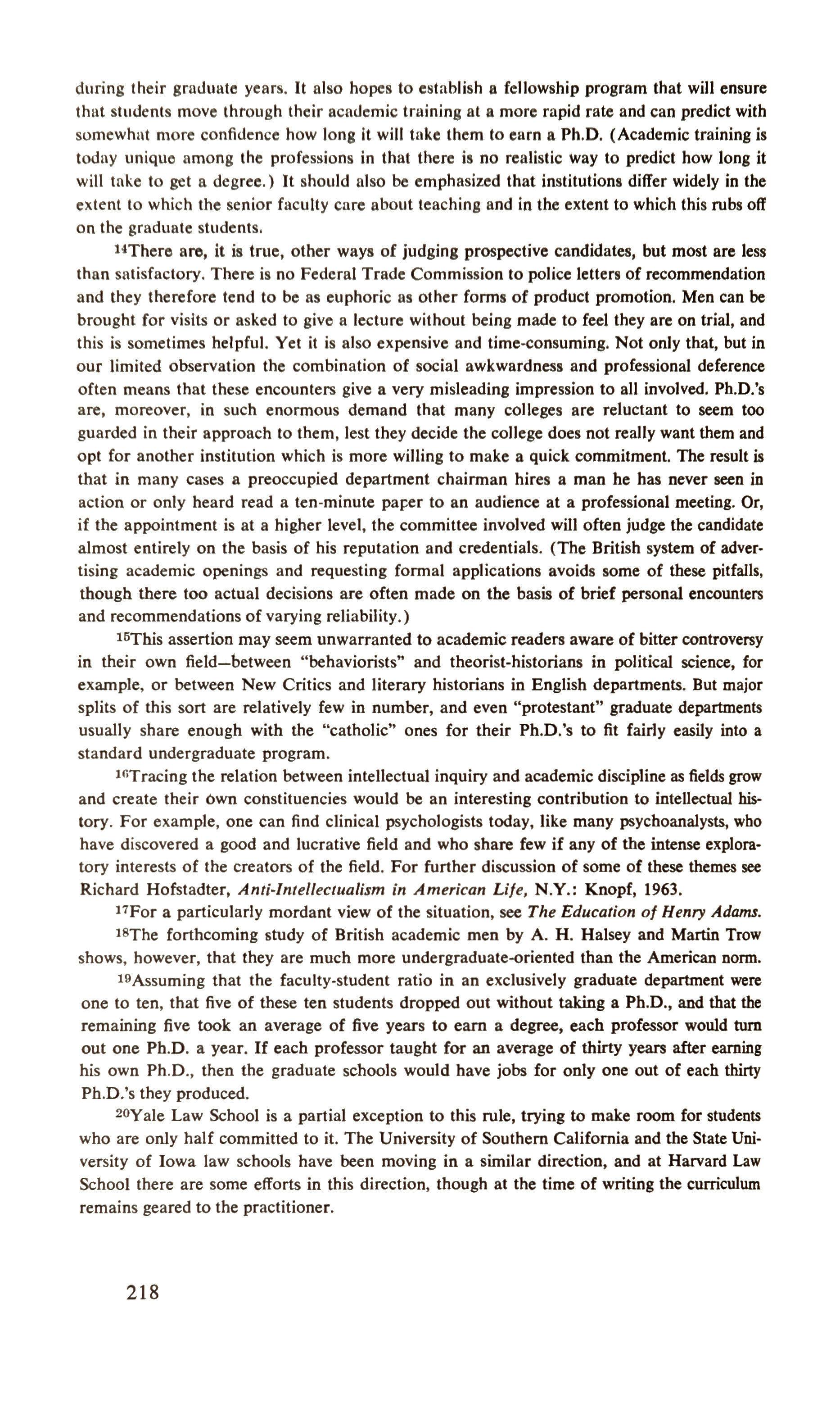
during their graduate years. It also hopes to establish a fellowship program that will ensure that students move through their academic training at a more rapid rate and can predict with somewhat more confidence how long it will take them to earn a Ph.D. (Academic training is today unique among the professions in that there is no realistic way to predict how long it will take to get a degree.) It should also be emphasized that institutions differ widely in the extent to which the senior faculty care about teaching and in the extent to which this rubs off on the graduate students.
14There are, it is true, other ways of judging prospective candidates, but most are less than satisfactory. There is no Federal Trade Commission to police letters of recommendation and they therefore tend to be as euphoric as other forms of product promotion. Men can be brought for visits or asked to give a lecture without being made to feel they are on trial, and this is sometimes helpful. Yet it is also expensive and time-consuming. Not only that, but in our limited observation the combination of social awkwardness and professional deference often means that these encounters give a very misleading impression to all involved. Ph.D.'s are, moreover, in such enormous demand that many colleges are reluctant to seem too guarded in their approach to them, lest they decide the college does not really want them and opt for another institution which is more willing to make a quick commitment. The result is that in many cases a preoccupied department chairman hires a man he has never seen in action or only heard read a ten-minute paper to an audience at a professional meeting. Or, if the appointment is at a higher level, the committee involved will often judge the candidate almost entirely on the basis of his reputation and credentials. (The British system of advertising academic openings and requesting formal applications avoids some of these pitfalls, though there too actual decisions are often made on the basis of brief personal encounters and recommendations of varying reliability.)
15This assertion may seem unwarranted to academic readers aware of bitter controversy in their own field-between "behaviorists" and theorist-historians in political science, for example, or between New Critics and literary historians in English departments. But major splits of this sort are relatively few in number, and even "protestant" graduate departments usually share enough with the "catholic" ones for their Ph.D.'s to fit fairly easily into a standard undergraduate program.
IGTracing the relation between intellectual inquiry and academic discipline as fields grow and create their own constituencies would be an interesting contribution to intellectual history. For example, one can find clinical psychologists today, like many psychoanalysts, who have discovered a good and lucrative field and who share few if any of the intense exploratory interests of the creators of the field. For further discussion of some of these themes see Richard Hofstadter, Anti-Intellectualism in American Life, N.Y.: Knopf, 1963.
17For a particularly mordant view of the situation, see The Education of Henry Adams.
18The forthcoming study of British academic men by A. H. Halsey and Martin Trow shows, however, that they are much more undergraduate-oriented than the American norm.
19Assuming that the faculty-student ratio in an exclusively graduate department were one to ten, that five of these ten students dropped out without taking a Ph.D., and that the remaining five took an average of five years to earn a degree, each professor would turn out one Ph.D. a year. If each professor taught for an average of thirty years after earning his own Ph.D., then the graduate schools would have jobs for only one out of each thirty Ph.D.'s they produced.
20Yaie Law School is a partial exception to this rule, trying to make room for students who are only half committed to it. The University of Southern California and the State University of Iowa law schools have been moving in a similar direction, and at Harvard Law School there are some efforts in this direction, though at the time of writing the curriculum remains geared to the practitioner.
218
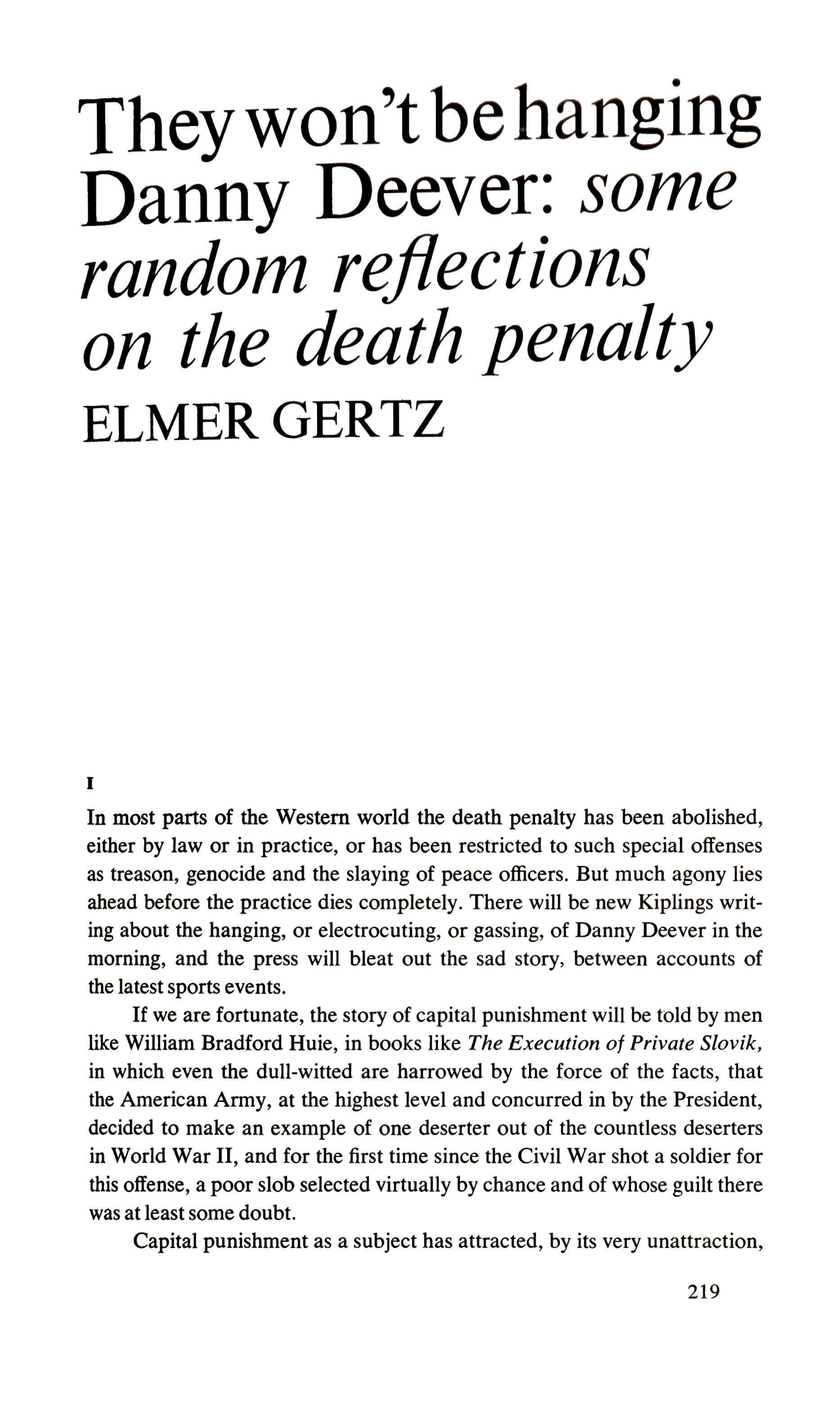
In most palls of the Western world the death penalty has been abolished, either by law or in practice, or has been restricted to such special offenses as treason, genocide and the slaying of peace officers. But much agony lies ahead before the practice dies completely. There will be new Kiplings writing about the hanging, or electrocuting, or gassing, of Danny Deever in the morning, and the press will bleat out the sad story, between accounts of the latest sports events.
If we are fortunate, the story of capital punishment will be told by men like William Bradford Huie, in books like The Execution of Private Slovik, in which even the dull-witted are harrowed by the force of the facts, that the American AI'Iny, at the highest level and concurred in by the President, decided to make an example of one deserter out of the countless deserters in World War II, and for the first time since the Civil War shot a soldier for this offense, a poor slob selected virtually by chance and of whose guilt there was at least some doubt.
Capital punishment as a subject has attracted, by its very unattraction,
• • I
219
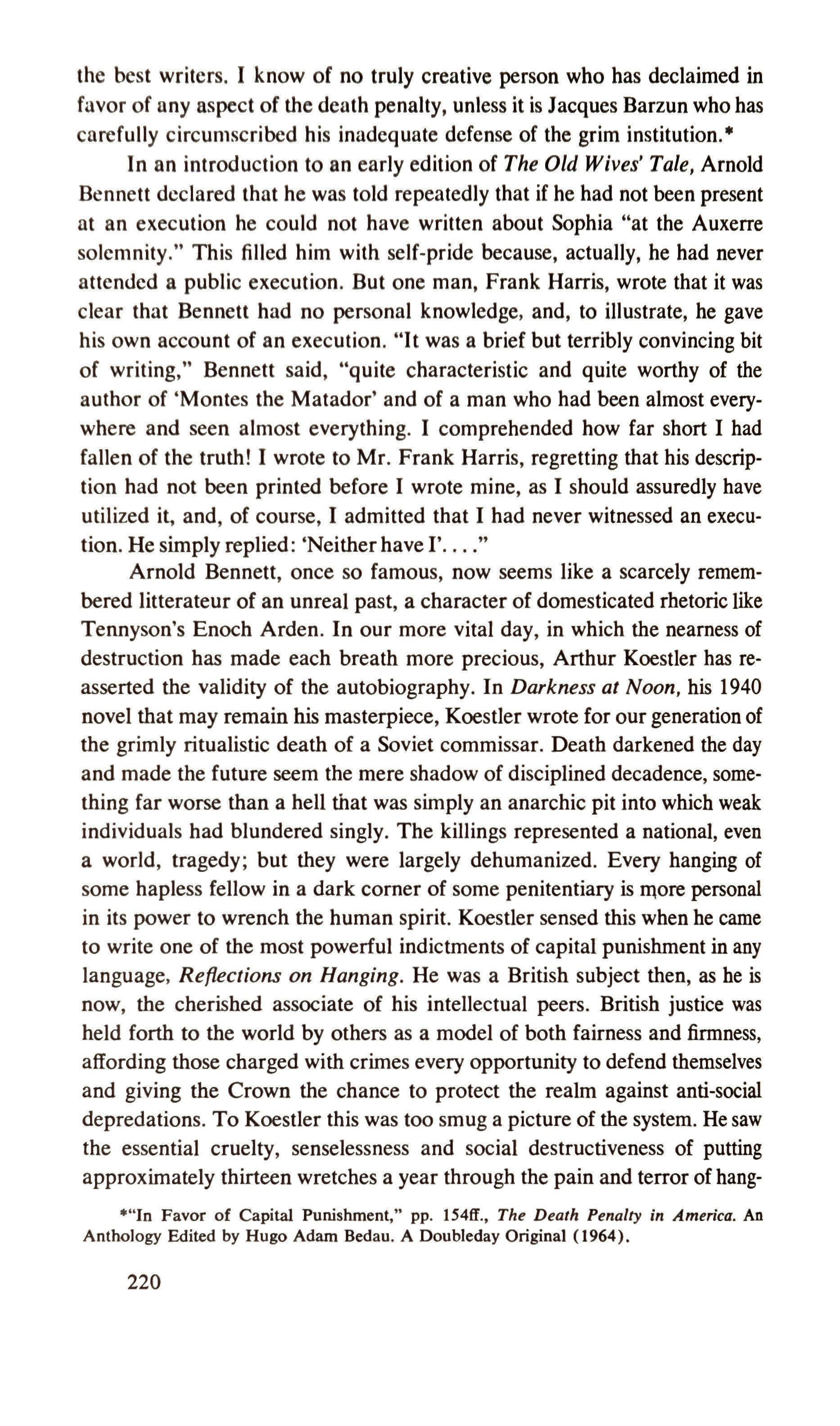
the best writers, I know of no truly creative person who has declaimed in favor of any aspect of the death penalty, unless it is Jacques Barzun who has carefully circumscribed his inadequate defense of the grim institution, *
In an introduction to an early edition of The Old Wives' Tale, Arnold Bennett declared that he was told repeatedly that if he had not been present at an execution he could not have written about Sophia "at the Auxerre solemnity," This filled him with self-pride because, actually, he had never attended a public execution, But one man, Frank Harris, wrote that it was clear that Bennett had no personal knowledge, and, to illustrate, he gave his own account of an execution, "It was a brief but terribly convincing bit of writing," Bennett said, "quite characteristic and quite worthy of the author of 'Montes the Matador' and of a man who had been almost everywhere and seen almost everything. I comprehended how far short I had fallen of the truth! I wrote to Mr. Frank Harris, regretting that his description had not been printed before I wrote mine, as I should assuredly have utilized it, and, of course, I admitted that I had never witnessed an execution. He simply replied: 'Neither have I', ,"
Arnold Bennett, once so famous, now seems like a scarcely remembered litterateur of an unreal past, a character of domesticated rhetoric like Tennyson's Enoch Arden. In our more vital day, in which the nearness of destruction has made each breath more precious, Arthur Koestler has reasserted the validity of the autobiography. In Darkness at Noon, his 1940 novel that may remain his masterpiece, Koestler wrote for our generation of the grimly ritualistic death of a Soviet commissar. Death darkened the day and made the future seem the mere shadow of disciplined decadence, something far worse than a hell that was simply an anarchic pit into which weak individuals had blundered singly. The killings represented a national, even a world, tragedy; but they were largely dehumanized. Every hanging of some hapless fellow in a dark corner of some penitentiary is 1I\0re personal in its power to wrench the human spirit. Koestler sensed this when he came to write one of the most powerful indictments of capital punishment in any language, Reflections on Hanging. He was a British subject then, as he is now, the cherished associate of his intellectual peers. British justice was held forth to the world by others as a model of both fairness and firmness, affording those charged with crimes every opportunity to defend themselves and giving the Crown the chance to protect the realm against anti-social depredations. To Koestler this was too smug a picture of the system. He saw the essential cruelty, senselessness and social destructiveness of putting approximately thirteen wretches a year through the pain and terror of hang-
·"In Favor of Capital Punishment," pp. lS4ff., The Death Penalty in America. An Anthology Edited by Hugo Adam Bedau. A Doubleday Original (1964).
220
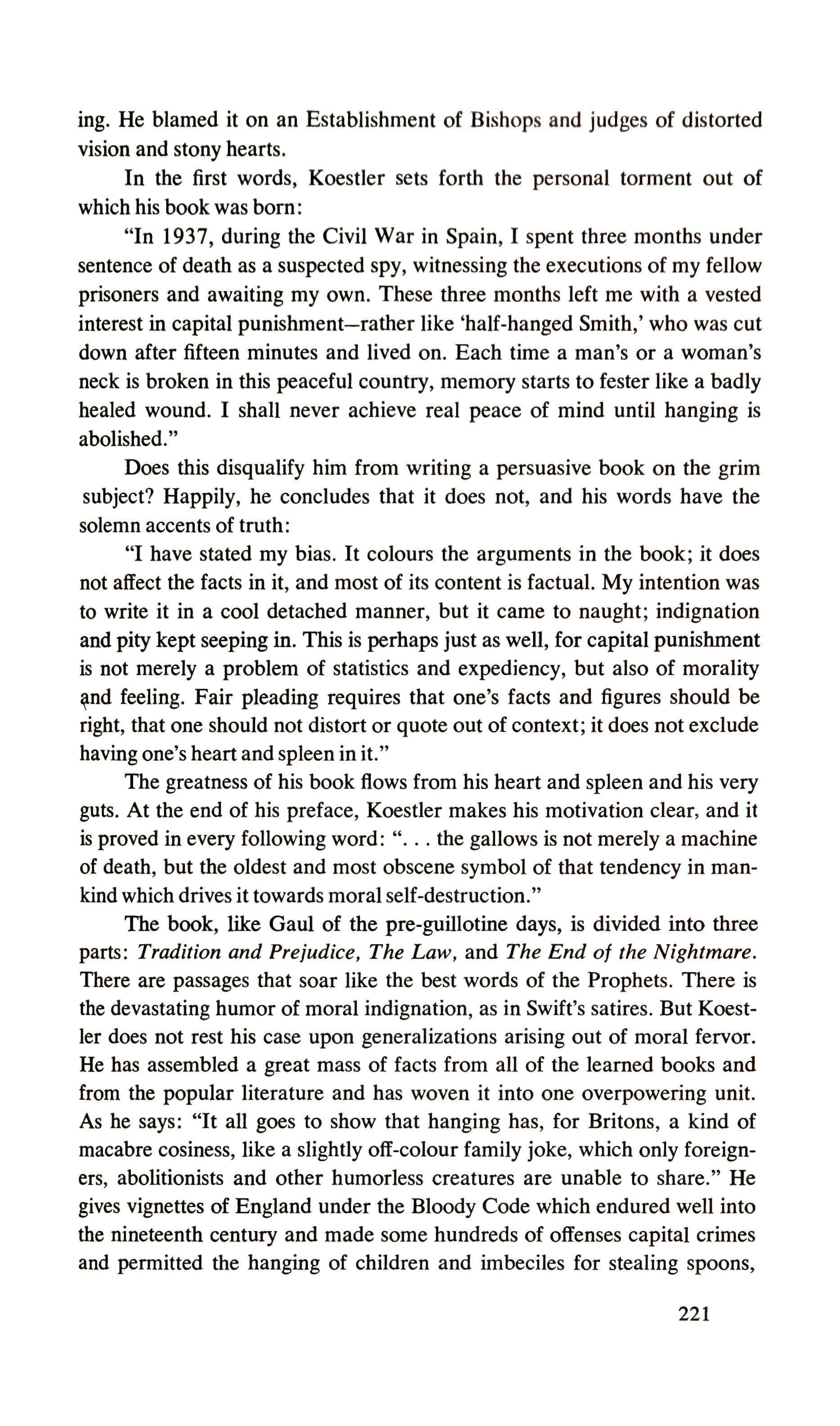
ing. He blamed it on an Establishment of Bishops and judges of distorted vision and stony hearts.
In the first words, Koestler sets forth the personal torment out of which his book was born:
"In 1937, during the Civil War in Spain, I spent three months under sentence of death as a suspected spy, witnessing the executions of my fellow prisoners and awaiting my own. These three months left me with a vested interest in capital punishment rather like 'half-hanged Smith,' who was cut down after fifteen minutes and lived on. Each time a man's or a woman's neck is broken in this peaceful country, memory starts to fester like a badly healed wound. I shall never achieve real peace of mind until hanging is abolished. "
Does this disqualify him from writing a persuasive book on the grim subject? Happily, he concludes that it does not, and his words have the solemn accents of truth:
"I have stated my bias. It colours the arguments in the book; it does not affect the facts in it, and most of its content is factual. My intention was to write it in a cool detached manner, but it came to naught; indignation and pity kept seeping in. This is perhaps just as well, for capital punishment is not merely a problem of statistics and expediency, but also of morality and feeling. Fair pleading requires that one's facts and figures should be right, that one should not distort or quote out of context; it does not exclude having one's heart and spleen in it."
The greatness of his book flows from his heart and spleen and his very guts. At the end of his preface, Koestler makes his motivation clear, and it is proved in every following word: the gallows is not merely a machine of death, but the oldest and most obscene symbol of that tendency in mankind which drives it towards moral self-destruction."
The book, like Gaul of the pre-guillotine days, is divided into three parts: Tradition and Prejudice, The Law, and The End of the Nightmare. There are passages that soar like the best words of the Prophets. There is the devastating humor of moral indignation, as in Swift's satires. But Koestler does not rest his case upon generalizations arising out of moral fervor. He has assembled a great mass of facts from all of the learned books and from the popular literature and has woven it into one overpowering unit. As he says: "It all goes to show that hanging has, for Britons, a kind of macabre cosiness, like a slightly off-colour family joke, which only foreigners, abolitionists and other humorless creatures are unable to share." He gives vignettes of England under the Bloody Code which endured well into the nineteenth century and made some hundreds of offenses capital crimes and permitted the hanging of children and imbeciles for stealing spoons,
221
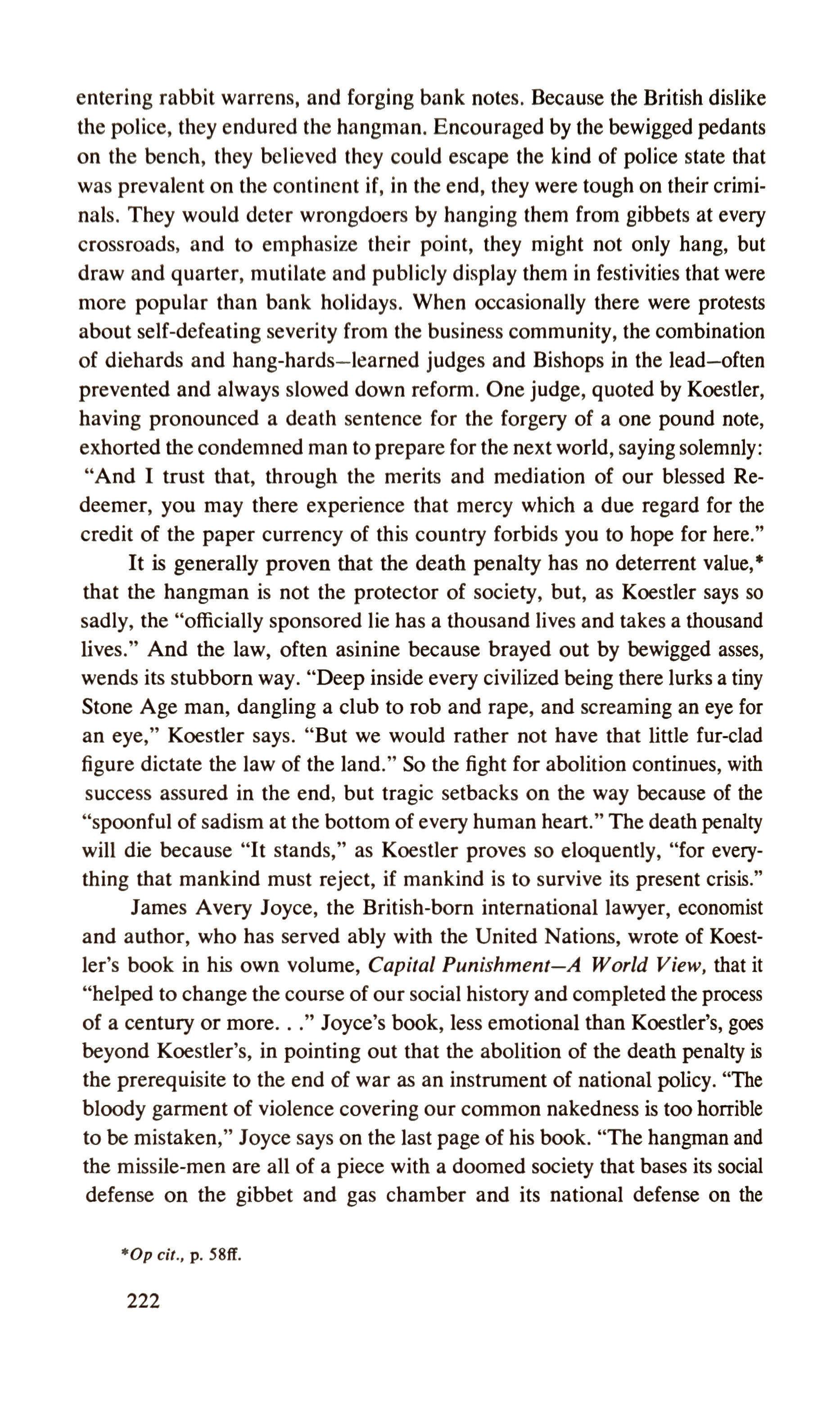
entering rabbit warrens, and forging bank notes. Because the British dislike the police, they endured the hangman. Encouraged by the bewigged pedants on the bench, they believed they could escape the kind of police state that was prevalent on the continent if, in the end, they were tough on their criminals. They would deter wrongdoers by hanging them from gibbets at every crossroads, and to emphasize their point, they might not only hang, but draw and quarter, mutilate and publicly display them in festivities that were more popular than bank holidays. When occasionally there were protests about self-defeating severity from the business community, the combination of diehards and hang-hards learned judges and Bishops in the lead often prevented and always slowed down refOI'III. One judge, quoted by Koestler, having pronounced a death sentence for the forgery of a one pound note, exhorted the condemned man to prepare for the next world, sayingsolemnly: "And I trust that, through the merits and mediation of our blessed Redeemer, you may there experience that mercy which a due regard for the credit of the paper currency of this country forbids you to hope for here." It is generally proven that the death penalty has no deterrent value," that the hangman is not the protector of society, but, as Koestler says so sadly, the "officially sponsored lie has a thousand lives and takes a thousand lives." And the law, often asinine because brayed out by bewigged asses, wends its stubborn way. "Deep inside every civilized being there lurks a tiny Stone Age man, dangling a club to rob and rape, and screaming an eye for an eye," Koestler says. "But we would rather not have that little fur-clad figure dictate the law of the land." So the fight for abolition continues, with success assured in the end, but tragic setbacks on the way because of the "spoonful of sadism at the bottom of every human heart." The death penalty will die because "It stands," as Koestler proves so eloquently, "for everything that mankind must reject, if mankind is to survive its present crisis."
James Avery Joyce, the British-born international lawyer, economist and author, who has served ably with the United Nations, wrote of Koestler's book in his own volume, Capital Punishment A World View, that it "helped to change the course of our social history and completed the process of a century or more Joyce's book, less emotional than Koestler's, goes beyond Koestler's, in pointing out that the abolition of the death penalty is the prerequisite to the end of war as an instrument of national policy. "The bloody garment of violence covering our common nakedness is too horrible to be mistaken," Joyce says on the last page of his book. "The hangman and the missile-men are all of a piece with a doomed society that bases its social defense on the gibbet and gas chamber and its national defense on the
*Op cit., p. 58ff.
222
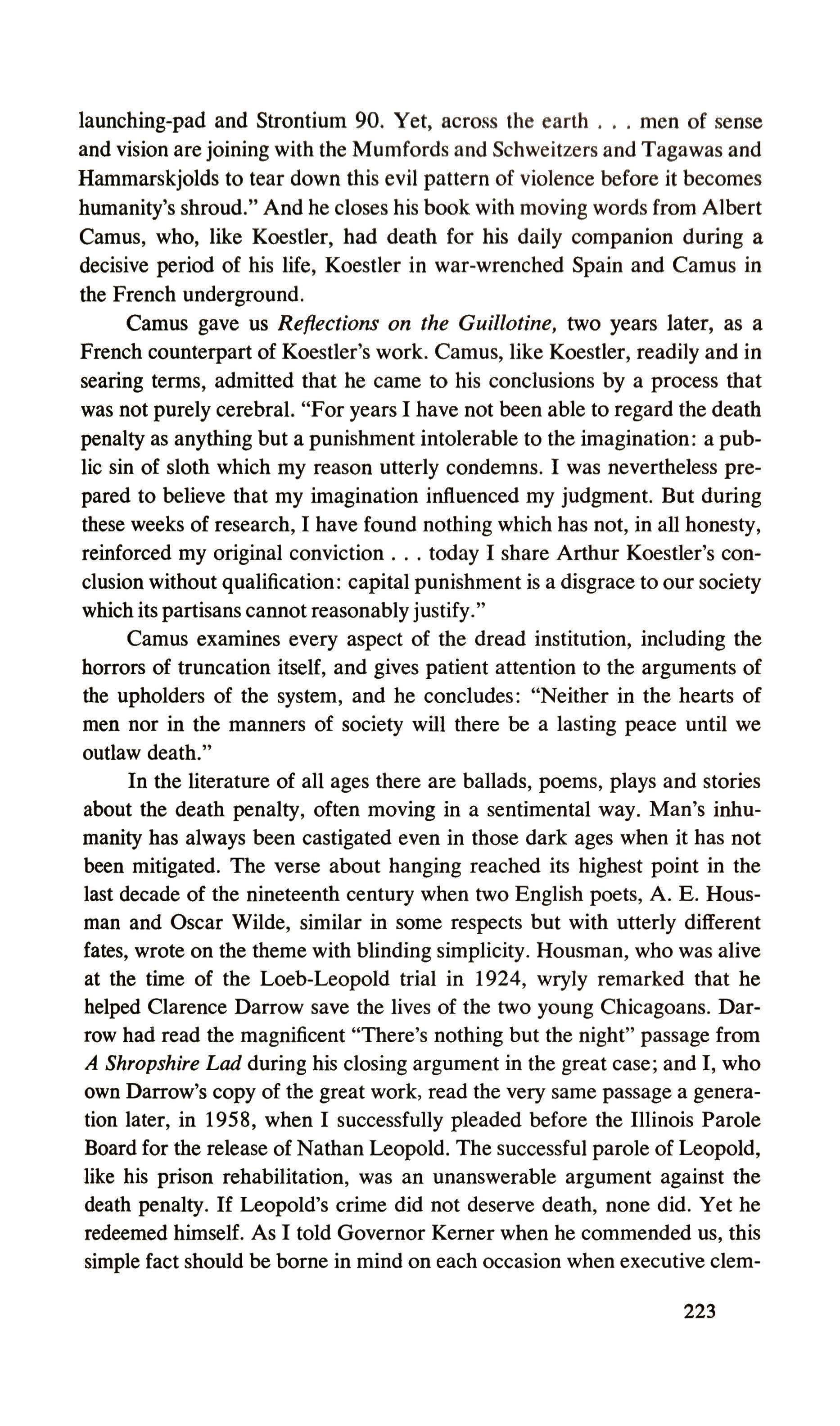
launching-pad and Strontium 90. Yet, across the earth men of sense and vision are joining with the Mumfords and Schweitzers and Tagawas and Hammarskjolds to tear down this evil pattern of violence before it becomes humanity's shroud." And he closes his book with moving words from Albert Camus, who, like Koestler, had death for his daily companion during a decisive period of his life, Koestler in war-wrenched Spain and Camus in the French underground.
Camus gave us Reflections on the Guillotine, two years later, as a French counterpart of Koestler's work. Camus, like Koestler, readily and in searing terms, admitted that he came to his conclusions by a process that was not purely cerebral. "For years I have not been able to regard the death penalty as anything but a punishment intolerable to the imagination: a public sin of sloth which my reason utterly condemns. I was nevertheless prepared to believe that my imagination influenced my judgment. But during these weeks of research, I have found nothing which has not, in all honesty, reinforced my original conviction today I share Arthur Koestler's conclusion without qualification: capital punishment is a disgrace to our society which its partisans cannot reasonablyjustify."
Camus examines every aspect of the dread institution, including the horrors of truncation itself, and gives patient attention to the arguments of the upholders of the system, and he concludes: "Neither in the hearts of men nor in the manners of society will there be a lasting peace until we outlaw death."
In the literature of all ages there are ballads, poems, plays and stories about the death penalty, often moving in a sentimental way. Man's inhumanity has always been castigated even in those dark ages when it has not been mitigated. The verse about hanging reached its highest point in the last decade of the nineteenth century when two English poets, A. E. Housman and Oscar Wilde, similar in some respects but with utterly different fates, wrote on the theme with blinding simplicity. Housman, who was alive at the time of the Loeb-Leopold trial in 1924, wryly remarked that he helped Clarence Darrow save the lives of the two young Chicagoans. Darrow had read the magnificent "There's nothing but the night" passage from A Shropshire Lad during his closing argument in the great case; and I, who own Darrow's copy of the great work, read the very same passage a generation later, in 1958, when I successfully pleaded before the Illinois Parole Board for the release of Nathan Leopold. The successful parole of Leopold, like his prison rehabilitation, was an unanswerable argument against the death penalty. If Leopold's crime did not deserve death, none did. Yet he redeemed himself. As I told Governor Kerner when he commended us, this simple fact should be borne in mind on each occasion when executive clem-
223
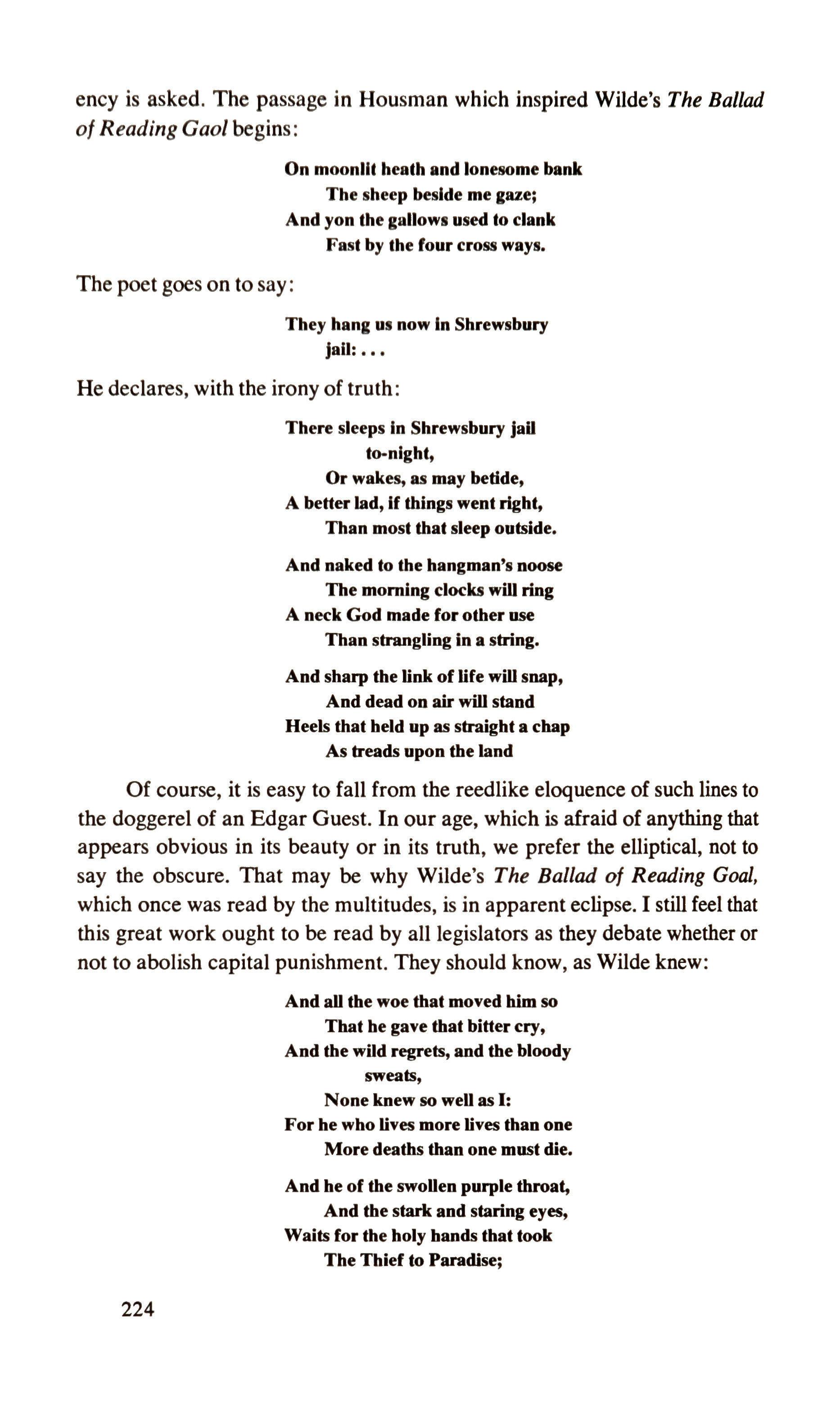
ency is asked. The passage in Housman which inspired Wilde's The Ballad ofReading Gaol begins:
On moonlit heath and lonesome bank
The sheep beside me gaze; And yon the gaiiowl used to clank Fast by the lour cross ways.
The poet goes on to say:
They hang us now In Shrewsbury jail:
He declares, with the irony of truth:
There sleeps In Shrewsbury jaU to-night, Or wakes, as may betide, A better lad, If things went right, Than most that sleep outside.
And naked to the hangman's noose
The morning clocks will ring A neck God made for other nse Than strangling in a string.
And sharp the link of life will snap, And dead on air will stand Heels that held up as sbalgbt a chap As treads upon the land
Of course, it is easy to fall from the reedlike eloquence of such lines to the doggerel of an Edgar Guest. In our age, which is afraid of an g that appears obvious in its beauty or in its truth, we prefer the elliptical, not to say the obscure. That may be why Wilde's The Ballad of Reading Goal, which once was read by the multitudes, is in apparent eclipse. I still feel that this great work ought to be read by all legislators as they debate whether or not to abolish capital punishment. They should know, as Wilde knew:
And aU the woe that moved him so
That he gave that bitter cry, And the wild regrets, and the bloody sweats, None knew so weD as I:
For he who lives more lives than one More deaths than one must die.
And he of the swoDen purple threet, And the stalk and staring eyes, Waits for the holy bands that took The Thief to Paradise;
224

And a broken and a contrite heart The Lord win not despise.
More to our taste today is a grisly masterpiece of the stage, The Quare Fellow, by Brendan Behan, the Borstal boy who, like Jean Genet, knew prisons from personal experience and had an interior view of how close each of us is to tragedy. Perhaps, that is why Behan drank so hard, fought so desperately, and wrote with a boisterousness that scarcely concealed the anguish of his soul. A quare fellow is the Irish vernacular for a man awaiting execution, in a city prison in Ireland, the setting for Behan's play. The characters are all prisoners and warders. The conversation relates, directly or indirectly, to two condemned men. One of the two is reprieved, and the comedy-drama then centers on the preparations for the forced demise of the other fellow who had bashed a person to death and butchered the corpse. He would not seem to be an object to arouse pity as in a Greek tragedy. It it the genius of Behan that he succeeds in destroying with a quip, or gibe, the mere banter of everyday speech, the pretentions surrounding the penal system and its chief adornment, the gallows. In our disgust and disquietude over the work of the hangman, we are ready to agree with the prisoner who steals the dead man's last letters in order to sell them to the press, and declares: "For what's a crook, only a businessman without a shop."
n
I have given only a sampling of the literature about the ultimate punishment. It would be well now to tum from literature to life and look at those murderers I have known in the course of my professional career of defending those men, popular or unpopular, who have stood in most need of the services of a lawyer and friend. As men face a dread future, they often transcend their sins. They go beyond themselves, as in the historical cases of Sacco and Vanzetti and in the instance of the meanest and most ignorant killer.
"What does he want?"
Meyer Levin whined when Nathan Leopold sued him in connection with the novel and moving picture, named Compulsion. "To be paid a royalty for the creativity of murder?" That was a peculiar sort of remark for Levin to make in view of his often proclaimed view that Leopold was so rehabilitated that he ought to be released from prison. If Leopold's "was the crime of the century," Levin had said, his release "would be an example of the correction of the century. This man who became the symbol of crime can be the symbol of correction."
I have represented six murderers in recent years, partly by choice and partly by happenstance, and I am startled by their similarities as well as by
225
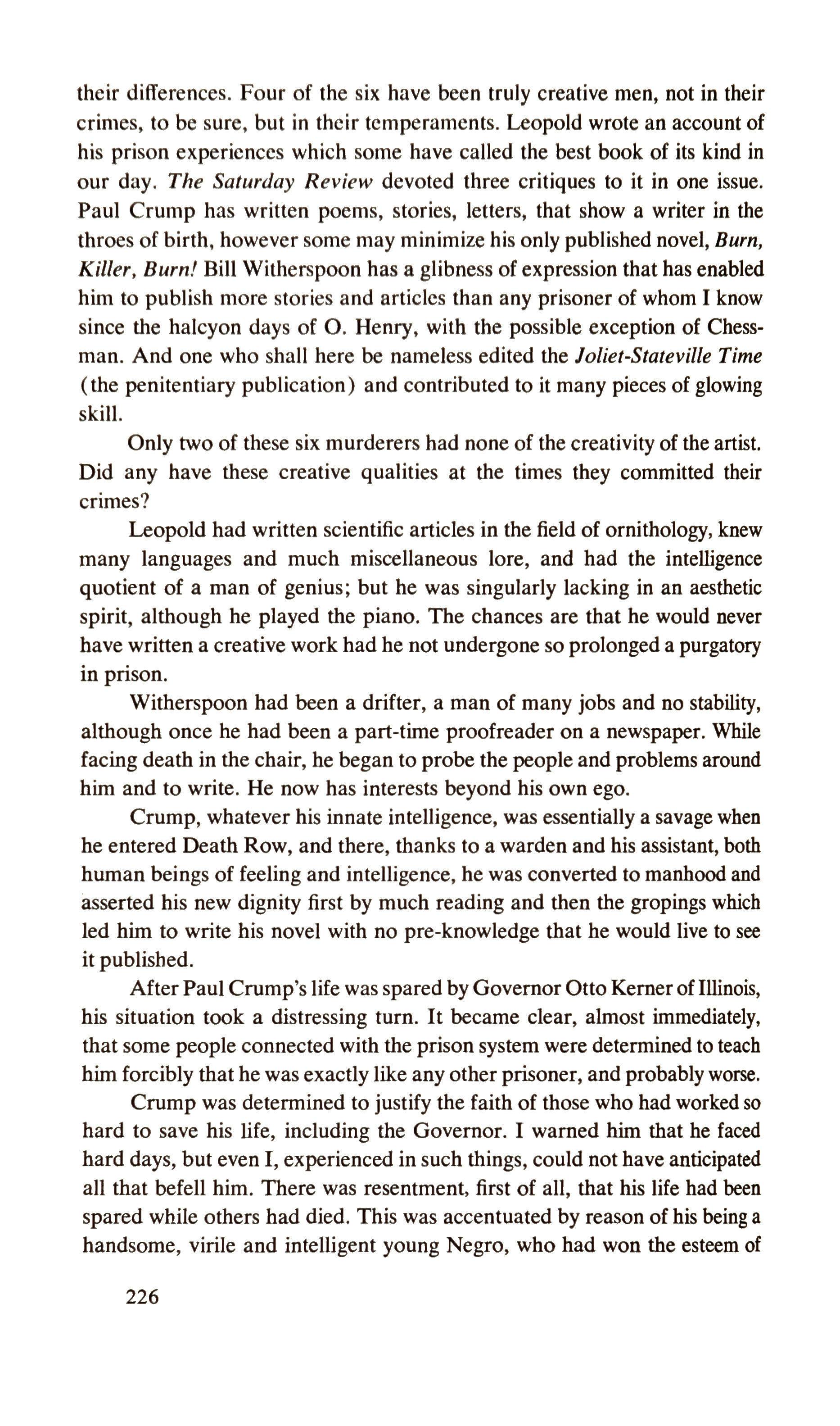
their differences. Four of the six have been truly creative men, not in their crimes, to be sure, but in their temperaments. Leopold wrote an account of his prison experiences which some have called the best book of its kind in our day. The Saturday Review devoted three critiques to it in one issue. Paul Crump has written poems, stories, letters, that show a writer in the throes of birth, however some may minimize his only published novel, Burn, Killer, Burn! Bill Witherspoon has a glibness of expression that has enabled him to publish more stories and articles than any prisoner of whom I know since the halcyon days of O. Henry, with the possible exception of Chessman. And one who shall here be nameless edited the Ioliet-Stateville Time (the penitentiary publication) and contributed to it many pieces of glowing skill.
Only two of these six murderers had none of the creativity of the artist. Did any have these creative qualities at the times they committed their crimes?
Leopold had written scientific articles in the field of ornithology, knew many languages and much miscellaneous lore, and had the intelligence quotient of a man of genius; but he was singularly lacking in an aesthetic spirit, although he played the piano. The chances are that he would never have written a creative work had he not undergone so prolonged a purgatory In pnson, Witherspoon had been a drifter, a man of many jobs and no stability, although once he had been a part-time proofreader on a newspaper. While facing death in the chair, he began to probe the people and problems around him and to write. He now has interests beyond his own ego.
Crump, whatever his innate intelligence, was essentially a savage when he entered Death Row, and there, thanks to a warden and his assistant, both human beings of feeling and intelligence, he was converted to manhood and asserted his new dignity first by much reading and then the gropings which led him to write his novel with no pre-knowledge that he would live to see it published.
After Paul Crump's life was spared by Governor Otto Kerner ofIllinois, his situation took a distressing turn. It became clear, almost immediately, that some people connected with the prison system were determined to teach him forcibly that he was exactly like any other prisoner, and probably worse. Crump was determined to justify the faith of those who had worked so hard to save his life, including the Governor. I warned hiIn that he faced hard days, but even I, experienced in such things, could not have anticipated all that befell him. There was resentment, first of all, that his life had been spared while others had died. This was accentuated by reason of his being a handsome, virile and intelligent young Negro, who had won the esteem of 226
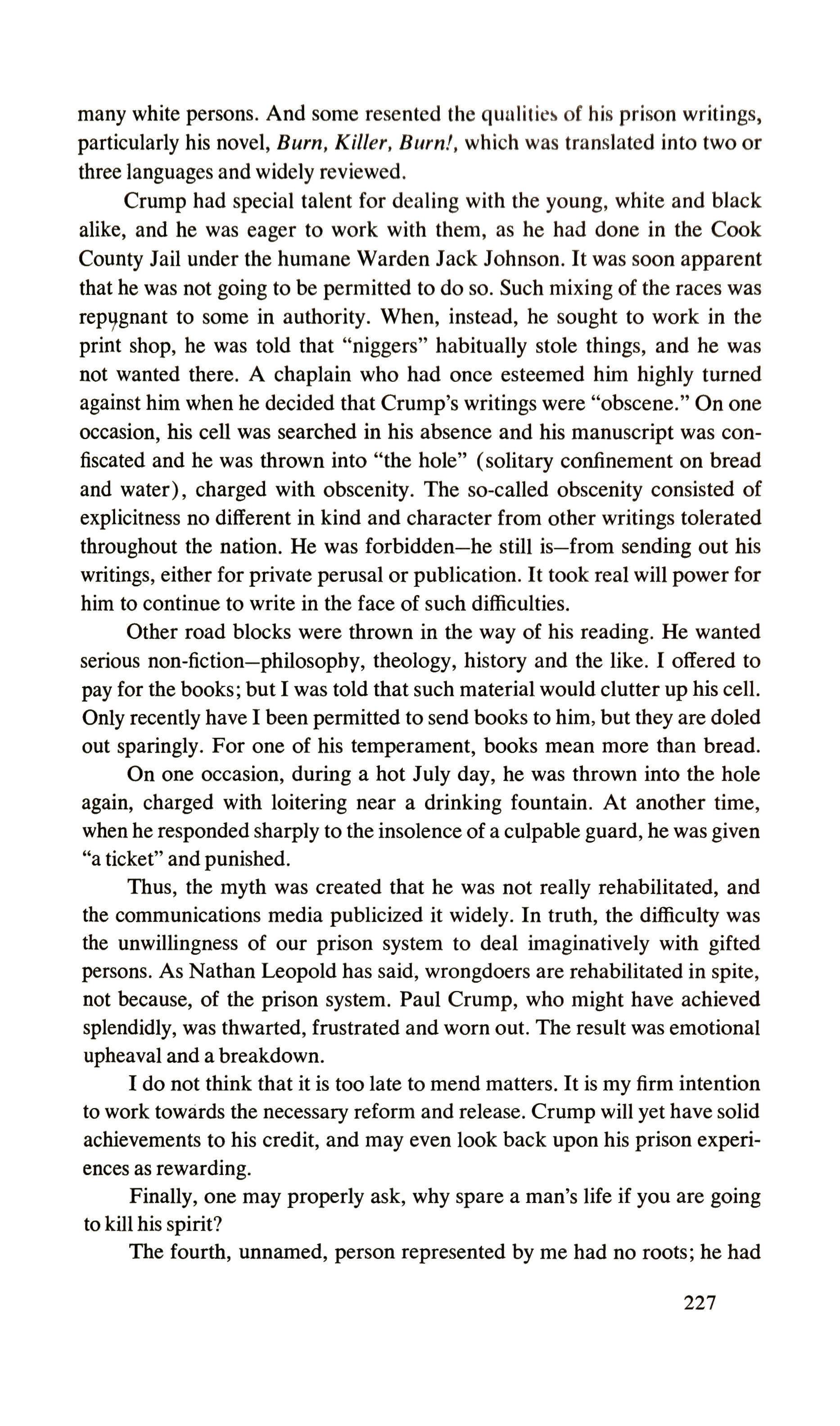
many white persons. And some resented the qualities of his prison writings, particularly his novel, Burn, Killer, Burnl, which was translated into two or three languages and widely reviewed.
Crump had special talent for dealing with the young, white and black alike, and he was eager to work with them, as he had done in the Cook County Jail under the humane Warden Jack Johnson. It was soon apparent that he was not going to be permitted to do so. Such mixing of the races was repl}gnant to some in authority. When, instead, he sought to work in the print shop, he was told that "niggers" habitually stole things, and he was not wanted there. A chaplain who had once esteemed him highly turned against him when he decided that Crump's writings were "obscene." On one occasion, his cell was searched in his absence and his manuscript was confiscated and he was thrown into "the hole" (solitary confinement on bread and water), charged with obscenity. The so-called obscenity consisted of explicitness no different in kind and character from other writings tolerated throughout the nation. He was forbidden he still is from sending out his writings, either for private perusal or publication. It took real will power for him to continue to write in the face of such difficulties.
Other road blocks were thrown in the way of his reading. He wanted serious non-fiction philosophy, theology, history and the like. I offered to pay for the books; but I was told that such material would clutter up his cell. Only recently have I been permitted to send books to him, but they are doled out sparingly. For one of his temperament, books mean more than bread.
On one occasion, during a hot July day, he was thrown into the hole again, charged with loitering near a drinking fountain. At another time, when he responded sharply to the insolence of a culpable guard, he was given "a ticket" and punished.
Thus, the myth was created that he was not really rehabilitated, and the communications media publicized it widely. In truth, the difficulty was the unwillingness of our prison system to deal imaginatively with gifted persons. As Nathan Leopold has said, wrongdoers are rehabilitated in spite, not because, of the prison system. Paul Crump, who might have achieved splendidly, was thwarted, frustrated and worn out. The result was emotional upheaval and a breakdown.
I do not think that it is too late to mend matters. It is my firm intention to work towards the necessary reform and release. Crump will yet have solid achievements to his credit, and may even look back upon his prison experiences as rewarding.
Finally, one may properly ask, why spare a man's life if you are going to kill his spirit?
The fourth, unna IIIed, person represented by me had no roots; he had
227
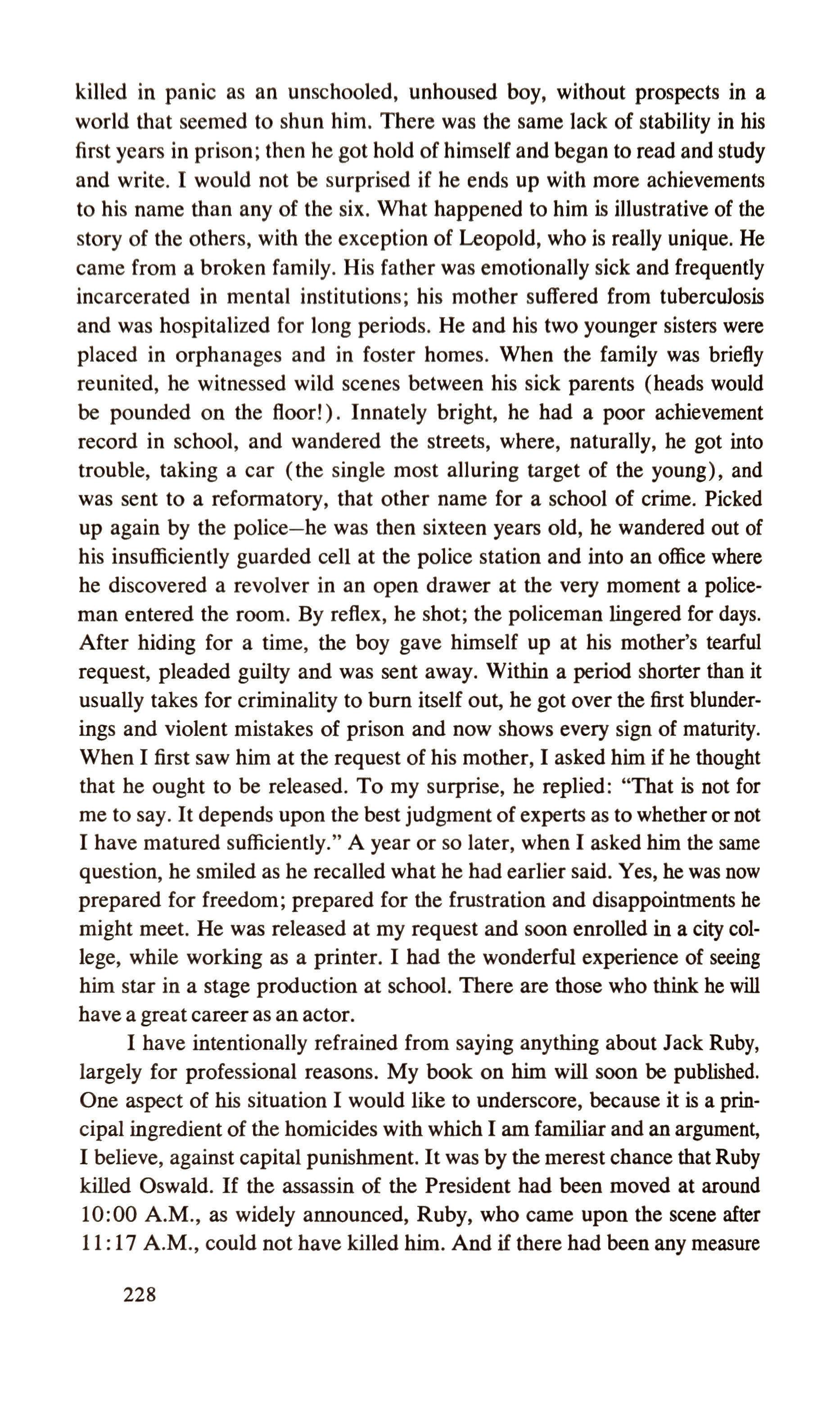
killed in panic as an unschooled, unhoused boy, without prospects in a world that seemed to shun him. There was the same lack of stability in his first years in prison; then he got hold of himself and began to read and study and write. I would not be surprised if he ends up with more achievements to his name than any of the six. What happened to him is illustrative of the story of the others, with the exception of Leopold, who is really unique. He came from a broken family. His father was emotionally sick and frequently incarcerated in mental institutions; his mother suffered from tuberculosis and was hospitalized for long periods. He and his two younger sisters were placed in orphanages and in foster homes. When the family was briefly reunited, he witnessed wild scenes between his sick parents (heads would be pounded on the floor!). Innately bright, he had a poor achievement record in school, and wandered the streets, where, naturally, he got into trouble, taking a car (the single most alluring target of the young), and was sent to a reformatory, that other name for a school of crime. Picked up again by the police he was then sixteen years old, he wandered out of his insufficiently guarded cell at the police station and into an office where he discovered a revolver in an open drawer at the very moment a policeman entered the room. By reflex, he shot; the policeman lingered for days. After hiding for a time, the boy gave himself up at his mother's tearful request, pleaded guilty and was sent away. Within a period shorter than it usually takes for criminality to bum itself out, he got over the first blunderings and violent mistakes of prison and now shows every sign of maturity. When I first saw him at the request of his mother, I asked him if he thought that he ought to be released. To my surprise, he replied: "That is not for me to say. It depends upon the best judgment of experts as to whether or not I have matured sufficiently." A year or so later, when I asked hill! the same question, he smiled as he recalled what he had earlier said. Yes, he was now prepared for freedom; prepared for the frustration and disappointments he might meet. He was released at my request and soon enrolled in a city college, while working as a printer. I had the wonderful experience of seeing him star in a stage production at school. There are those who think he will have a great career as an actor.
I have intentionally refrained from saying anything about Jack Ruby, largely for professional reasons. My book on hill) will soon be published. One aspect of his situation I would like to underscore, because it is a principal ingredient of the homicides with which I al11 familiar and an argument, I believe, against capital punishment. It was by the merest chance that Ruby killed Oswald. If the assassin of the President had been moved at around 10:00 A.M., as widely announced, Ruby, who callIe upon the scene after 11: 17 A.M., could not have killed him, And if there had been any measure
228
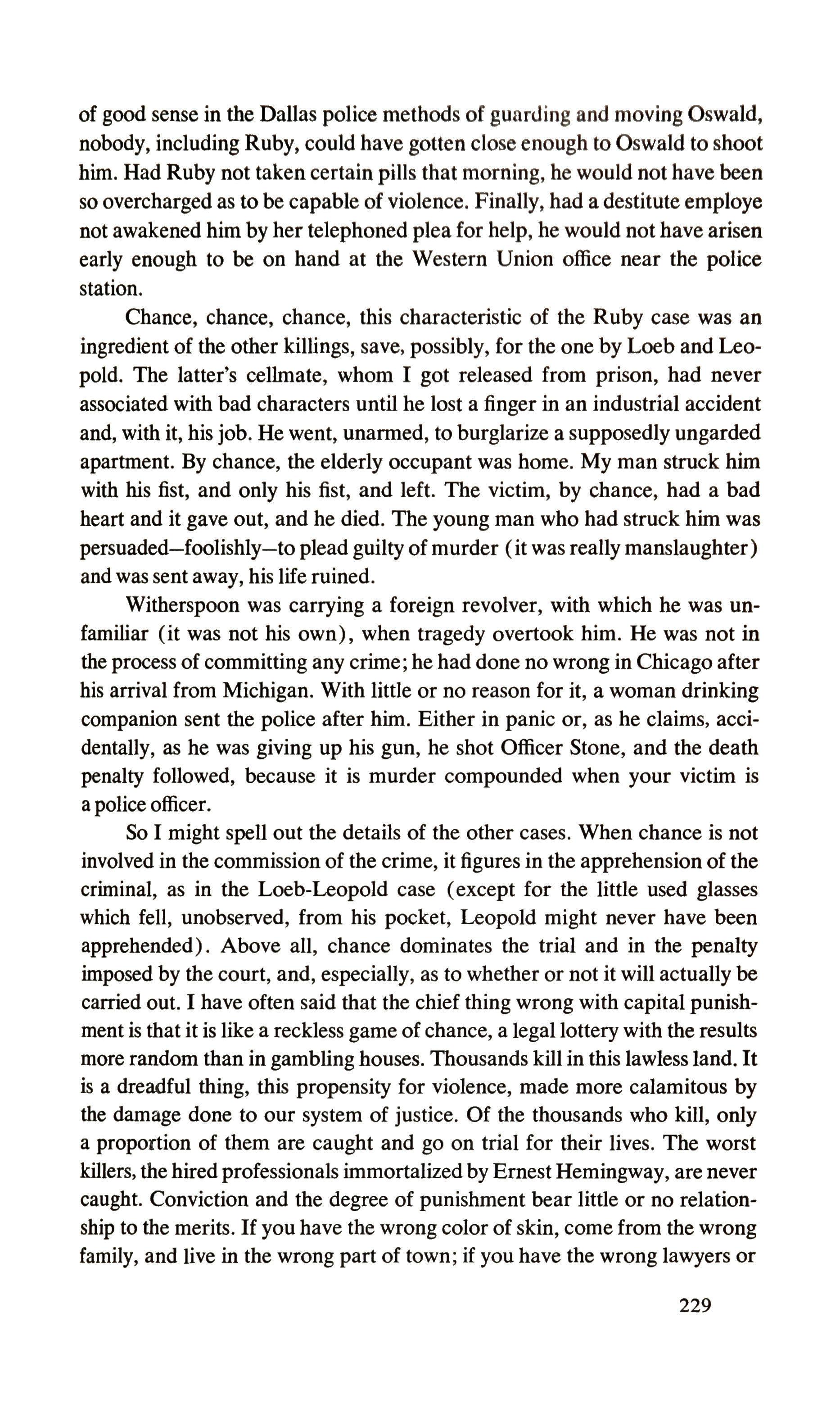
of good sense in the Dallas police methods of guarding and moving Oswald, nobody, including Ruby, could have gotten close enough to Oswald to shoot him. Had Ruby not taken certain pills that morning, he would not have been so overcharged as to be capable of violence. Finally, had a destitute employe not awakened him by her telephoned plea for help, he would not have arisen early enough to be on hand at the Western Union office near the police station.
Chance, chance, chance, this characteristic of the Ruby case was an ingredient of the other killings, save, possibly, for the one by Loeb and Leopold. The latter's cellmate, whom I got released from prison, had never associated with bad characters until he lost a finger in an industrial accident and, with it, his job. He went, unarmed, to burglarize a supposedly ungarded apartment. By chance, the elderly occupant was home. My man struck hiln with his fist, and only his fist, and left. The victim, by chance, had a bad heart and it gave out, and he died. The young man who had struck him was persuaded foolishly to plead guilty of murder (it was reallymanslaughter) and was sent away, his life ruined.
Witherspoon was carrying a foreign revolver, with which he was unfamiliar (it was not his own), when tragedy overtook him. He was not in the process of committing any crime; he had done no wrong in Chicago after his arrival from Michigan. With little or no reason for it, a woman drinking companion sent the police after him. Either in panic or, as he claims, accidentally, as he was giving up his gun, he shot Officer Stone, and the death penalty followed, because it is murder compounded when your victim is a police officer.
So I might spell out the details of the other cases. When chance is not involved in the commission of the crime, it figures in the apprehension of the criminal, as in the Loeb-Leopold case (except for the little used glasses which fell, unobserved, from his pocket, Leopold might never have been apprehended). Above all, chance dominates the trial and in the penalty imposed by the court, and, especially, as to whether or not it will actually be carried out. I have often said that the chief thing wrong with capital punishment is that it is like a reckless game of chance, a legal lottery with the results more random than in gambling houses. Thousands kill in this lawless land. It is a dreadful thing, this propensity for violence, made more calamitous by the damage done to our system of justice. Of the thousands who kill, only a proportion of them are caught and go on trial for their lives. The worst killers, the hired professionals immortalized by Ernest Hemingway, are never caught. Conviction and the degree of punishment bear little or no relationship to the merits. If you have the wrong color of skin, come from the wrong family, and live in the wrong part of town; if you have the wrong lawyers or
229
judge or jury; if you have killed the "wrong" person (police lives are more sacred than those of infants or women) ; if you don't make the right deal with the State's Attorney; if he is trying to climb to higher office on your corpse; if any of a dozen fortuitous circumstances are there, or lacking, the result will be different. Only a small proportion of the total get the judgment of death; many of these sentences are overturned because there is error in the record (a wrongful search, a faulty confession, prejudicial conduct by the State); others survive by reason of executive clemency. In the end, some few are executed in the entire nation, there were fifteen of them two years ago (five of them from Texas); only one the following year. In Illinois, only three men in the last dozen years have died in the electric chair. Some states have had no executions for many years; a growing number are abolition states. The answer is not to set the clock back by demanding more executions; for it is patent that the public conscience is against this. Even in Texas, which legally kills more men than any other state, over 60% of those people with opinions are against capital punishment. Nationally, the majority oppose the archaic institution."
It is morally wrong to maintain this roulette wheel type of injustice, and it is constitutionally wrong, too. When I first suggested that capital punishment is always a civil liberties issue, because its fortuitousness negates due process, many of my colleagues disagreed with me. But now the American Civil Liberties Union, at the behest of the Illinois Division, has gone on record in making abolition of the death penalty an article of constitutional faith and the United States Department of Justice has issued for the first time, what may well be an historical pronouncement against capital punishment. Cases are pending in the highest courts to declare the death penalty unconstitutional as "cruel and unusual punishment." I am involved in one of these cases.
When the last death instrument has been demolished, and jaundiced judges may no longer destroy men, gifted writers who capture the spirit of an age in their works, men like Koestler and Camus, will perhaps be tempted to compose parables about the small people who tried to make themselves into giants by being the arbitrary bestowers of life or death. They will be shown to be moral pygmies in all their deeds. As their last act, they will look in the mirror, see horrible images of themselves, and, in shock, kill what is before them. The murderers will be murdered by themselves, not by others.
*The Dallas Morning News, p. 9A, July 8, 1965, "The Texas Poll-Majority Favors End of Electric Chair." See, also, editorials in same newspaper, July 10, 1965. See also, The Death Penalty in America. Supra., Ch. 5, "What Do Americans Think of the Death Penalty?", pp. 231ff.
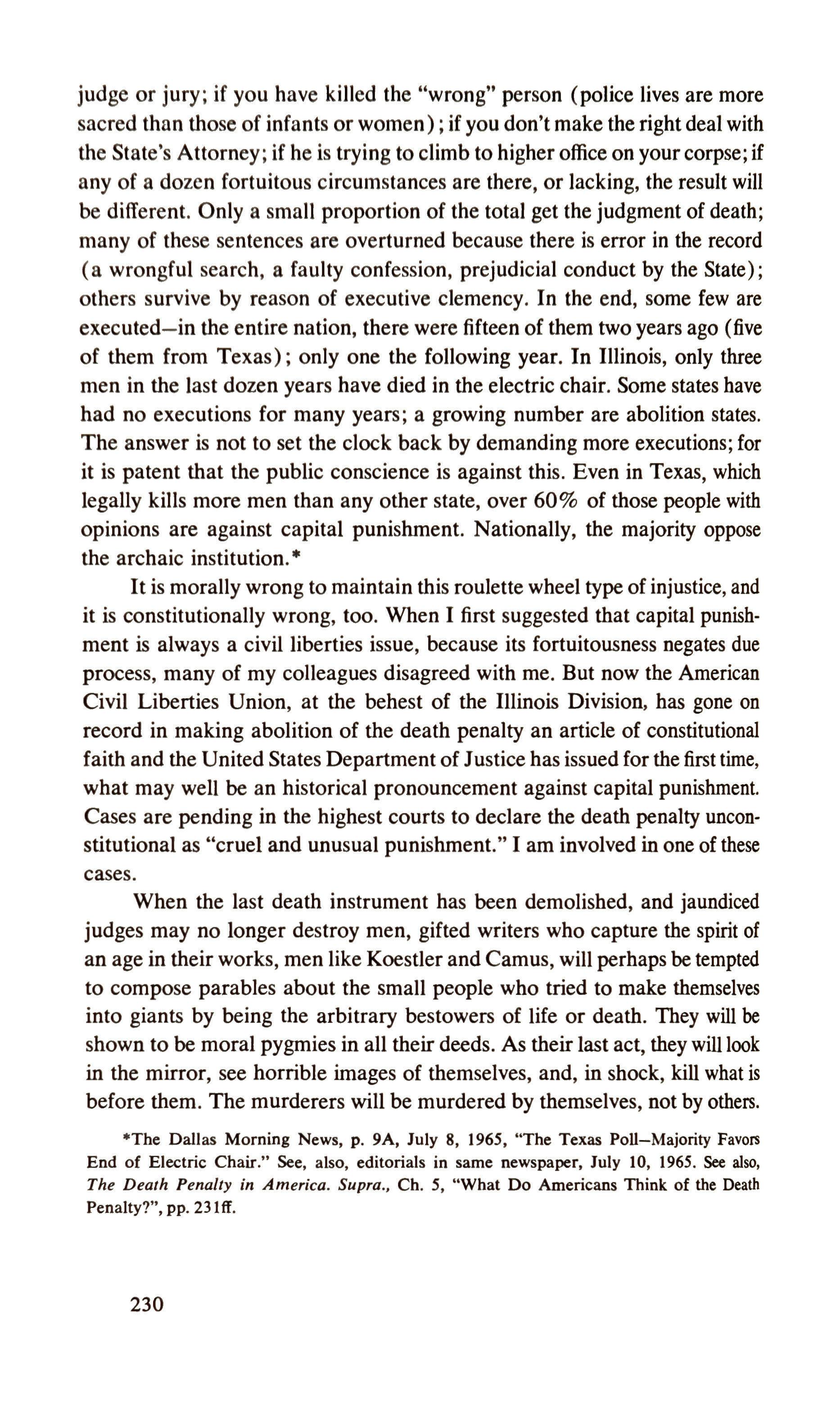
230

As various poets and critics have been remarking over the past few years, both the mood and the means of much of the important new American poetry has been noticeably changing. While it is difficult in the midst of such movement to predict with anything like accuracy the final course of contemporary poetry's drift and flow, there are certain characteristics which have become rather evident. In a recent essay, "Dead Horses and Live Issues," (The Nation, April 24, 1967), the poet Louis Simpson discusses some of them and also indicates the kind of poetry which is currently being rejected. "There is," he says, "an accelerating movement away from rationalistic verse toward poetry that releases the unconscious, the irrational, or, if your mind runs that way, magic. Surrealism was buried by the critics of the thirties and forties as somehow irrelevant; today it is one of the most commonly used techniques of verse." Simpson goes on to specify some of the likely influences to come into play under these circumstances and the dangers of particular sorts of Surrealism, especially the dogmatic irrationalism of Andre Breton. Then he adds, affirmatively: "Contrary to Breton, poetry represents not unreason but the total mind, including both reason and unreason Poetic creation has been described by some poetsPoems 1957-1967, by James Dickey. Wesleyan University Press. 229 pp. $6.95.
TriQuarterly 231
• ,
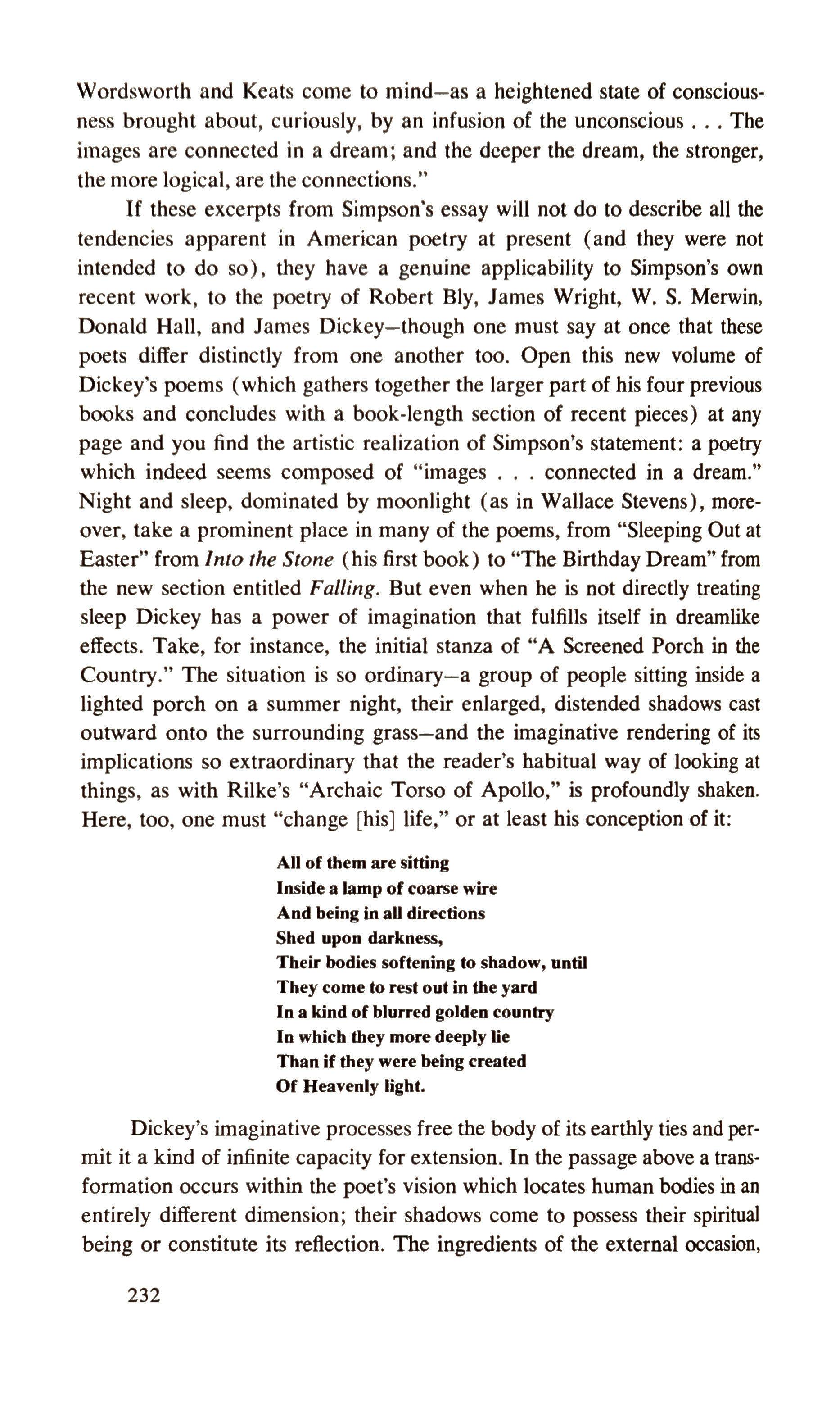
Wordsworth and Keats come to mind as a heightened state of consciousness brought about. curiously. by an infusion of the unconscious The images are connected in a dream; and the deeper the dream. the stronger, the more logical. are the connections."
If these excerpts from Simpson's essay will not do to describe all the tendencies apparent in American poetry at present (and they were not intended to do so), they have a genuine applicability to Simpson's own recent work, to the poetry of Robert Bly, James Wright, W. S. Merwin, Donald Hall, and James Dickey though one must say at once that these poets differ distinctly from one another too. Open this new volume of Dickey's poems (which gathers together the larger part of his four previous books and concludes with a book-length section of recent pieces) at any page and you find the artistic realization of Simpson's statement: a poetry which indeed seems composed of "images connected in a dream." Night and sleep, dominated by moonlight (as in Wallace Stevens), moreover, take a prominent place in many of the poems, from "Sleeping Out at Easter" from Into the Stone (his first book) to "The Birthday Dream" from the new section entitled Falling. But even when he is not directly treating sleep Dickey has a power of imagination that fulfills itself in dreamlike effects. Take, for instance, the initial stanza of "A Screened Porch in the Country." The situation is so ordinary a group of people sitting inside a lighted porch on a summer night, their enlarged, distended shadows cast outward onto the surrounding grass and the imaginative rendering of its implications so extraordinary that the reader's habitual way of looking at things, as with Rilke's "Archaic Torso of Apollo," is profoundly shaken. Here, too, one must "change [his] life," or at least his conception of it:
All of them are sitting Inside a lamp of coarse wire And being in aU directions Shed upon darkness, Their bodies softening to shadow, until They come to rest out in the yard In a kind of blureed golden country In which they more deeply lie Than if they were being created Of Heavenly light.
Dickey's imaginative processes free the body of its earthly ties and permit it a kind of infinite capacity for extension. In the passage above a traosformation occurs within the poet's vision which locates human bodies in an entirely different dimension; their shadows come to possess their spiritual being or constitute its reflection. The ingredients of the external occasion,
232
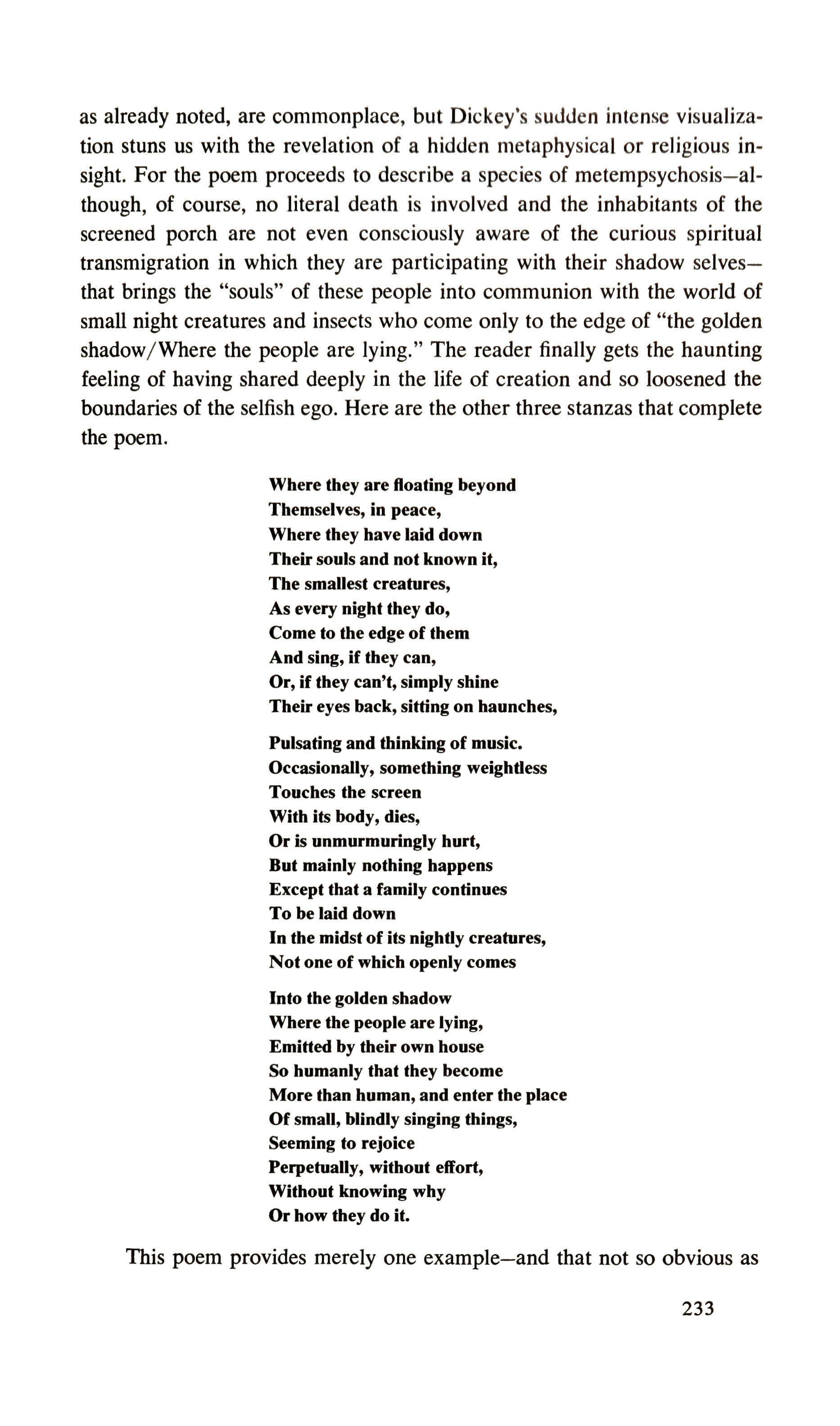
as already noted, are commonplace, but Dickey's sudden intense visualization stuns us with the revelation of a hidden metaphysical or religious insight. For the poem proceeds to describe a species of metempsychosis although, of course, no literal death is involved and the inhabitants of the screened porch are not even consciously aware of the curious spiritual transmigration in which they are participating with their shadow selvesthat brings the "souls" of these people into communion with the world of small night creatures and insects who come only to the edge of "the golden shadow/Where the people are lying." The reader finally gets the haunting feeling of having shared deeply in the life of creation and so loosened the boundaries of the selfish ego. Here are the other three stanzas that complete the poem.
Where they are floating beyond Themselves, in peace, Where they have laid down Their souls and not known it, The smallest creatures, As every night they do, Come to the edge of them And sing, if they can, Or, if they can't, simply shine Their eyes back, sitting on haunches,
Pulsating and thinking of music. Occasionally, something weightless Touches the screen With its body, dies, Or is unmurmuringly hurt, But mainly nothing happens Except that a family continues To be laid down
In the midst of its nightly creatures, Not one of which openly comes
Into the golden shadow
Where the people are lying, Emitted by their own house So humanly that they become More than human, and enter the place Of small, blindly singing things, Seeming to rejoice Perpetually, without effort, Without knowing why Or how they do it.
This poem provides merely one example and that not so obvious as 233
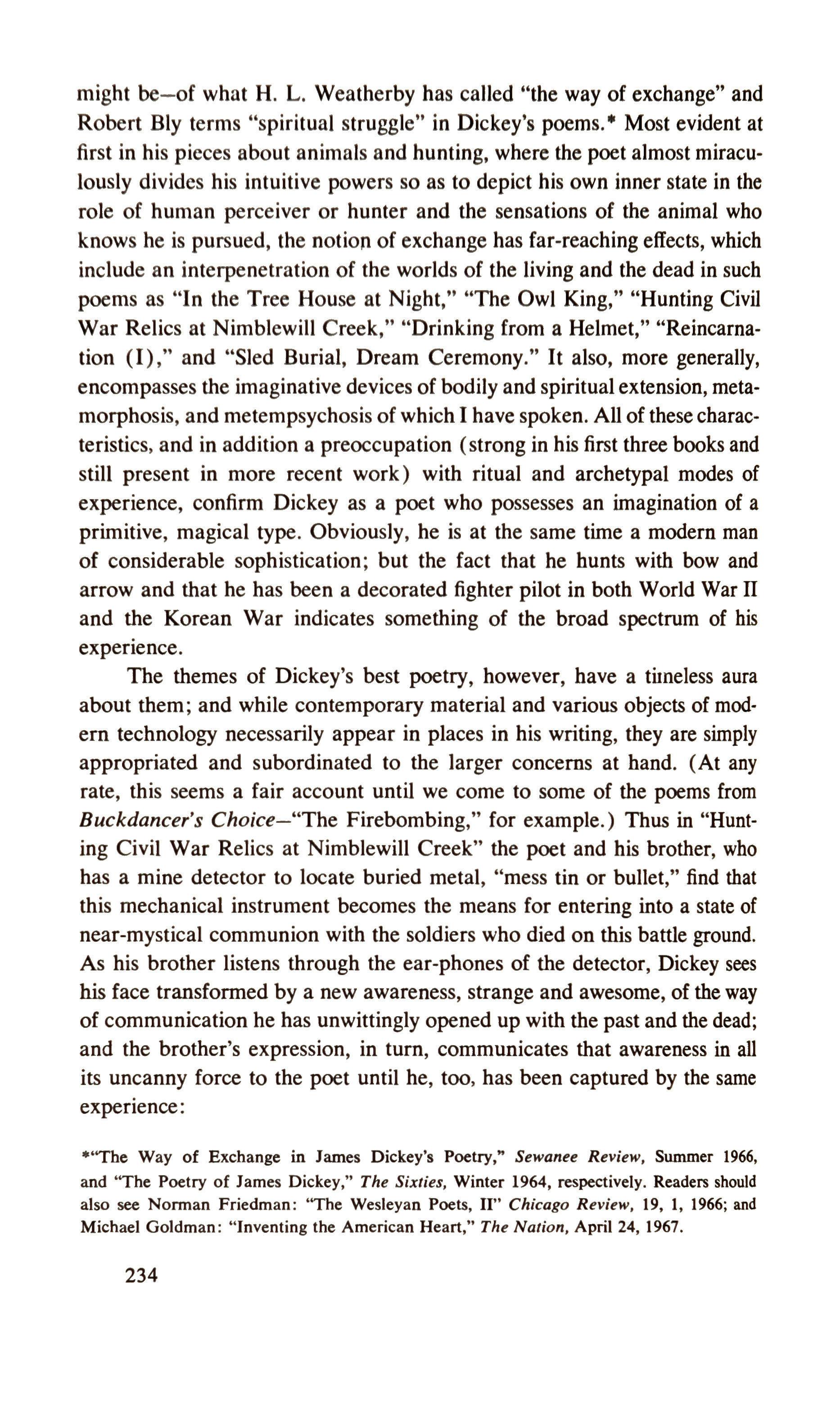
might be of what H. L. Weatherby has called "the way of exchange" and Robert Bly terms "spiritual struggle" in Dickey's poems." Most evident at first in his pieces about animals and hunting. where the poet almost miraculously divides his intuitive powers so as to depict his own inner state in the role of human perceiver or hunter and the sensations of the animal who knows he is pursued, the notion of exchange has far-reaching effects, which include an interpenetration of the worlds of the living and the dead in such poems as "In the Tree House at Night," "The Owl King," "Hunting Civil War Relics at Nimblewill Creek," "Drinking from a Helmet," "Reincarnation (I)," and "Sled Burial, Dream Ceremony." It also, more generally, encompasses the imaginative devices of bodily and spiritual extension, metamorphosis, and metempsychosis of which I have spoken. All of these characteristics, and in addition a preoccupation (strong in his first three books and still present in more recent work) with ritual and archetypal modes of experience, confirm Dickey as a poet who possesses an imagination of a primitive, magical type. Obviously, he is at the same time a modem man of considerable sophistication; but the fact that he hunts with bow and arrow and that he has been a decorated fighter pilot in both World War IT and the Korean War indicates something of the broad spectrum of his experience.
The themes of Dickey's best poetry, however, have a tuneless aura about them; and while contemporary material and various objects of modem technology necessarily appear in places in his writing, they are simply appropriated and subordinated to the larger concerns at hand. (At any rate, this seems a fair account until we come to some of the poems from Buckdancer's Choice "The Firebombing," for example.) Thus in "Hunting Civil War Relics at Nimblewill Creek" the poet and his brother, who has a mine detector to locate buried metal, "mess tin or bullet," find that this mechanical instrument becomes the means for entering into a state of near-mystical communion with the soldiers who died on this battle ground. As his brother listens through the ear-phones of the detector, Dickey sees his face transformed by a new awareness, strange and awesome, of the way of communication he has unwittingly opened up with the past and the dead; and the brother's expression, in turn, communicates that awareness in all its uncanny force to the poet until he, too, has been captured by the same experience:
·''The Way of Exchange in James Dickey's Poetry," Sewanee Review, Summer 1966, and ''The Poetry of James Dickey," The Sixties, Winter 1964, respectively. Readers should also see Norman Friedman: ''The Wesleyan Poets, Il' Chicago Review, 19, 1, 1966; and Michael Goldman: "Inventing the American Heart," The Nation, April 24, 1967.
234

We climb the bank; A faint light glows On my brother's mouth. I listen, as two birds fight For a single voice, but he Must be hearing the grave, In pieces, aU singing To his clamped head, For he smiles as if He rose from the dead within Green Nimblewill And stood in his grandson's shape.
Here we are close to the idea of exchange between the dead and the living or a transmigration of souls, though it is viewed in this instance not as a literal fact but an unforgettable moment of perception among the living -the poet and his brother. The end of the poem finds Dickey arrived at the threshold of a profoundly moving recovery of his (and our) human ancestry:
I choke the handle Of the pick, and fall to my knees To dig wherever he points, To bring up mess tin or bullet, To go underground Still singing, myself, Without a sound, Like a man who renounces war, Or one who shall lift up the past, Not breathing "Father," At Nimblewill, But saying, "Fathers! Fathers!"
The details of this passage are enormously evocative. His kneeling posture and his careful excavation of relics imply a reverential attitude towards the dead, who are resurrected, as it were, in the poet's inwardness, in feeling and imagination, to enlarge his own humanity so that it knows no limits but flows outward to merge with the being of every creature and thing, and, beyond them, to touch at times the realm of the supernatural. The act of digging, as the stanza discloses, takes on the aspect of a descent into the kingdom of the dead, and the poet returns with his new knowledge upon him: the revelation which becomes his poem. In his well-known study The Poetic Image C. Day Lewis notes that a whole poem may be an image composed of smaller contributing images; and of that larger image he offers a general definition which is surely applicable to the poem we have been
235
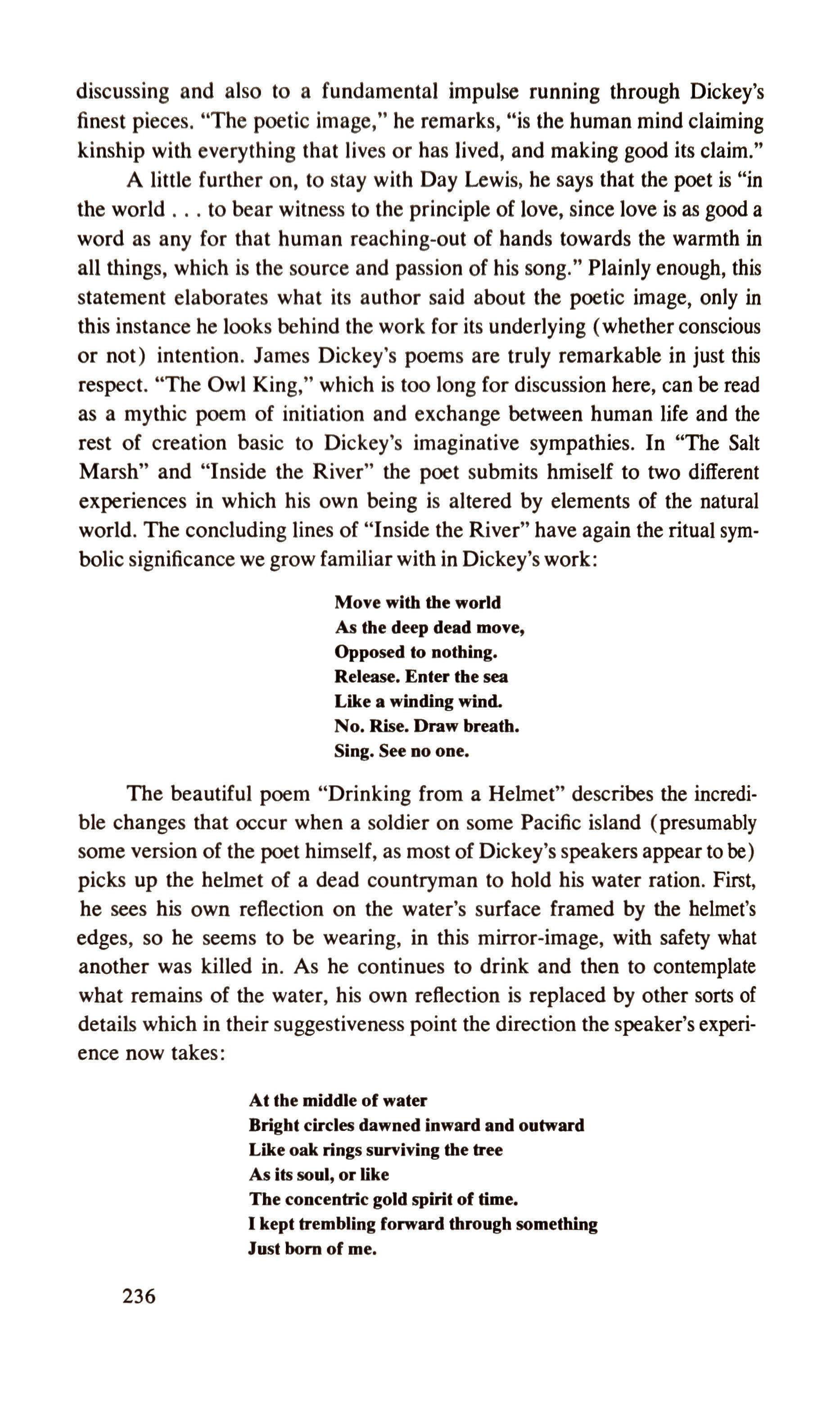
discussing and also to a fundamental impulse running through Dickey's finest pieces. "The poetic image," he remarks, "is the human mind claiming kinship with everything that lives or has lived, and making good its claim."
A little further on, to stay with Day Lewis, he says that the poet is "in the world to bear witness to the principle of love, since love is as good a word as any for that human reaching-out of hands towards the warmth in all things, which is the source and passion of his song." Plainly enough, this statement elaborates what its author said about the poetic image, only in this instance he looks behind the work for its underlying (whether conscious or not) intention. James Dickey's poems are truly remarkable in just this respect. "The Owl King," which is too long for discussion here, can be read as a mythic poem of initiation and exchange between human life and the rest of creation basic to Dickey's imaginative sympathies. In "The Salt Marsh" and "Inside the River" the poet submits hmiself to two different experiences in which his own being is altered by elements of the natural world. The concluding lines of "Inside the River" have again the ritual symbolic significance we grow familiar with in Dickey's work:
Move with the world
As the deep dead move, Opposed to nothing. Release. Enter the sea
Like a winding wind. No. Rise. Draw breath. Sing. See no one.
The beautiful poem "Drinking from a Helmet" describes the incredible changes that occur when a soldier on some Pacific island (presumably some version of the poet himself, as most of Dickey's speakers appear to be) picks up the helmet of a dead countryman to hold his water ration. First, he sees his own reflection on the water's surface framed by the helmet's edges, so he seems to be wearing, in this mirror-image, with safety what another was killed in. As he continues to drink and then to contemplate what remains of the water, his own reflection is replaced by other sorts of details which in their suggestiveness point the direction the speaker's experience now takes:
At tbe middle of water
Brigbt circles dawned inward and outward
Like oak rings surviving the tree
As its soul, or like
The concentric gold spirit of time. I kept trembling fOI ward througb sometbing
Just born of me.
236
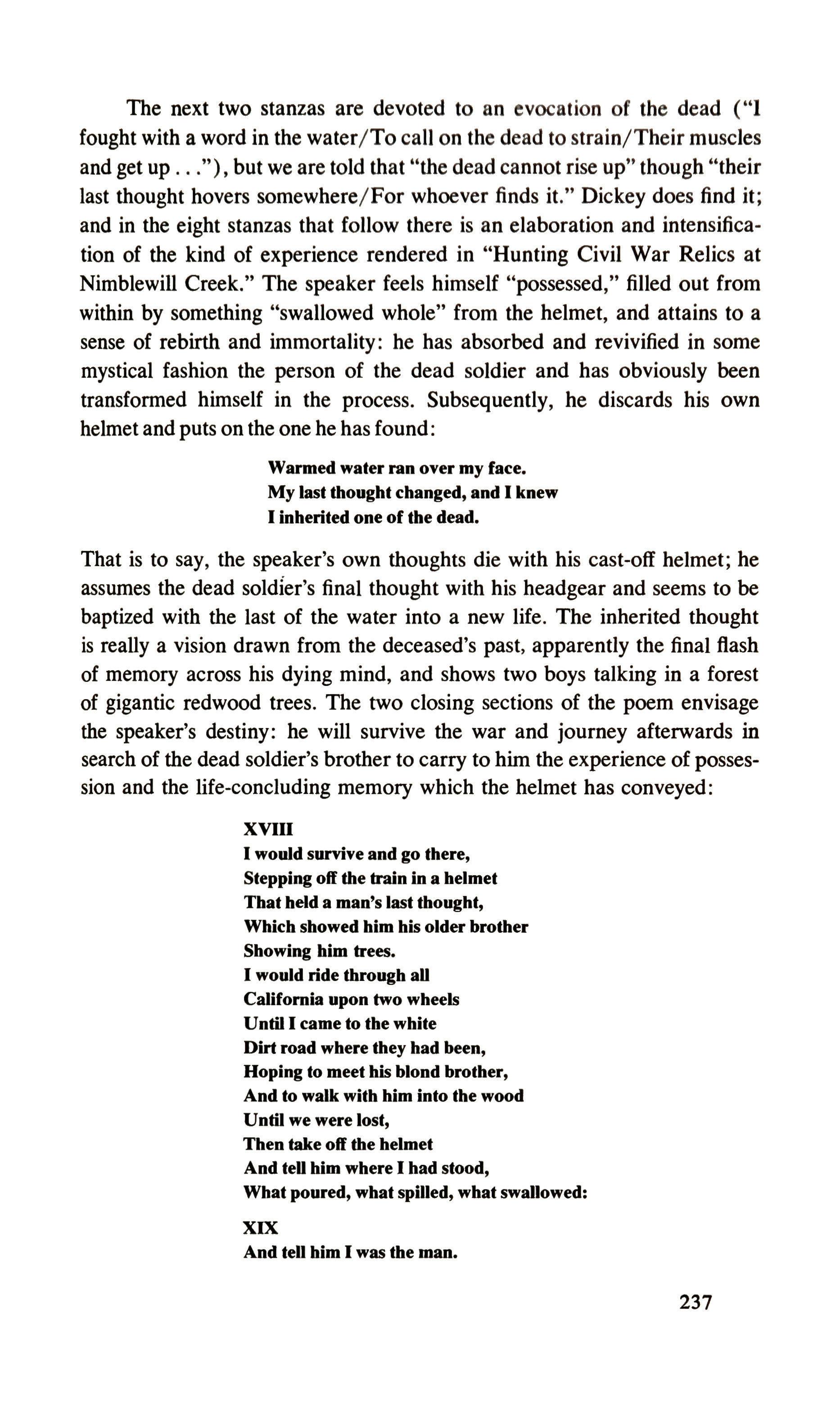
The next two stanzas are devoted to an evocation of the dead ("I fought with a word in the water/To calion the dead to strain/Their muscles and get up "), but we are told that "the dead cannot rise up" though "their last thought hovers somewhere/For whoever finds it." Dickey does find it; and in the eight stanzas that follow there is an elaboration and intensification of the kind of experience rendered in "Hunting Civil War Relics at Nimblewill Creek." The speaker feels himself "possessed," filled out from within by something "swallowed whole" from the helmet, and attains to a sense of rebirth and immortality: he has absorbed and revivified in some mystical fashion the person of the dead soldier and has obviously been transformed himself in the process. Subsequently, he discards his own helmet and puts on the one he has found:
Warmed water ran over my face. My last thought changed, and I knew I inherited one of the dead.
That is to say, the speaker's own thoughts die with his cast-off helmet; he assumes the dead soldier's final thought with his headgear and seems to be baptized with the last of the water into a new life. The inherited thought is really a vision drawn from the deceased's past, apparently the final flash of memory across his dying mind, and shows two boys talking in a forest of gigantic redwood trees. The two closing sections of the poem envisage the speaker's destiny: he will survive the war and journey afterwards in search of the dead soldier's brother to carry to him the experience of possession and the life-concluding memory which the helmet has conveyed:
XVIII
I would survive and go there, Stepping off the bain in a helmet That held a man's last thought, Which showed him his older brother Showing him trees.
I would ride through aU California upon two wheels
Until I came to the white Dirt road where they had been, Hoping to meet his blond brother, And to walk with him into the wood
Until we were lost, Then take off the helmet
And teU him where I had stood, What poured, what spilled, what swaUowed: XIX
And tell him I was the man.
237
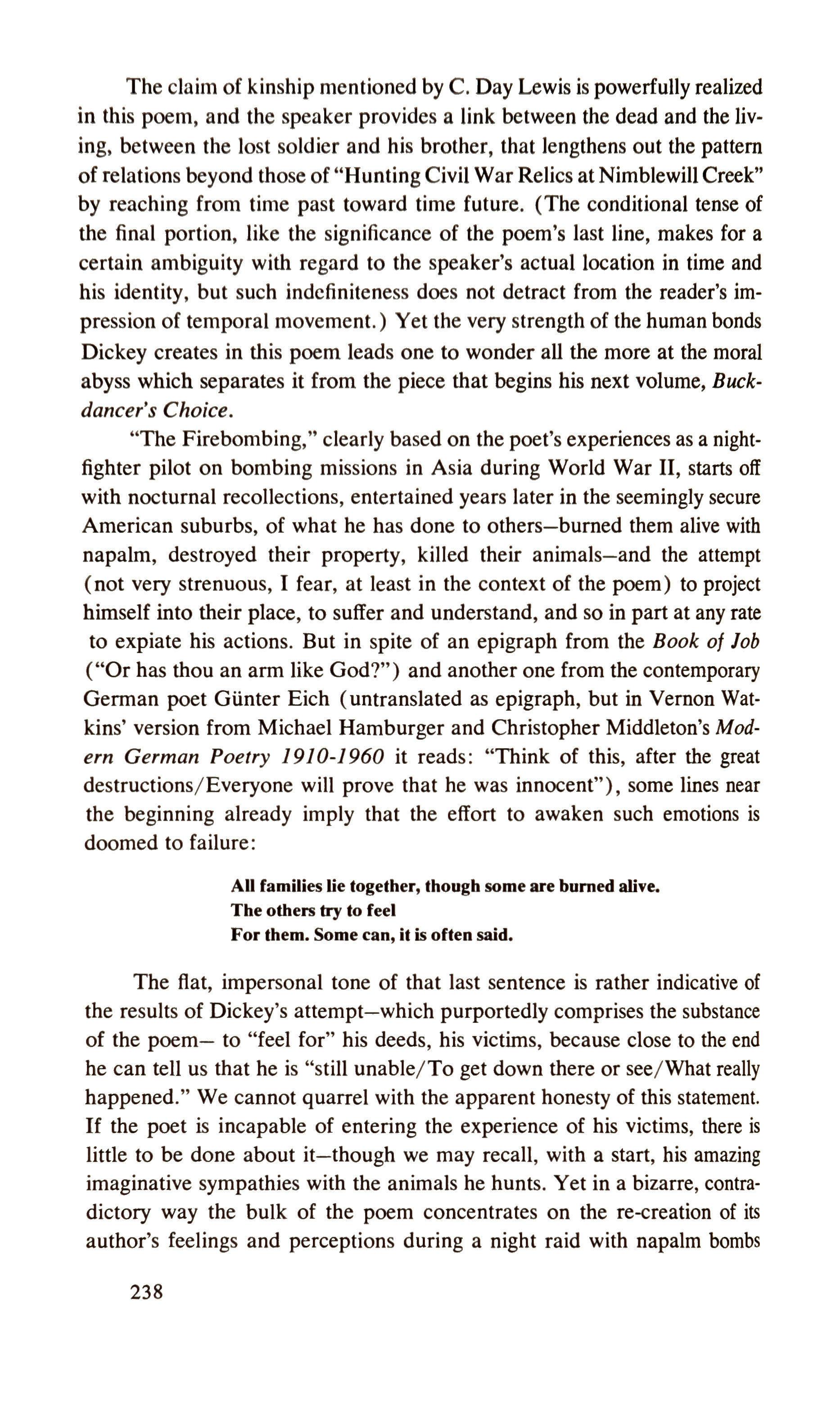
The claim of kinship mentioned by C. Day Lewis is powerfully realized in this poem, and the speaker provides a link between the dead and the living, between the lost soldier and his brother, that lengthens out the pattern of relations beyond those of "Hunting Civil War Relics at Nimblewill Creek" by reaching from time past toward time future. (The conditional tense of the final portion, like the significance of the poem's last line, makes for a certain ambiguity with regard to the speaker's actual location in time and his identity, but such indefiniteness does not detract from the reader's impression of temporal movement.) Yet the very strength of the human bonds Dickey creates in this poem leads one to wonder all the more at the moral abyss which separates it from the piece that begins his next volume, Buckdancer's Choice.
"The Firebombing," clearly based on the poet's experiences as a nightfighter pilot on bombing missions in Asia during World War II, starts off with nocturnal recollections, entertained years later in the seemingly secure American suburbs, of what he has done to others burned them alive with napalm, destroyed their property, killed their animals and the attempt (not very strenuous, I fear, at least in the context of the poem) to project himself into their place, to suffer and understand, and so in part at any rate to expiate his actions. But in spite of an epigraph from the Book of lob ("Or has thou an arm like God?") and another one from the contemporary German poet GUnter Eich (untranslated as epigraph, but in Vernon Watkins' version from Michael Hamburger and Christopher Middleton's Modern German Poetry 1910-1960 it reads: "Think of this, after the great destructions/Everyone will prove that he was innocent"), some lines near the beginning already imply that the effort to awaken such emotions is doomed to failure:
AU families lie together, though some are burned alive.
The others try to feel
For them. Some can, it is often said.
The fiat, impersonal tone of that last sentence is rather indicative of the results of Dickey's attempt which purportedly comprises the substance of the poem to "feel for" his deeds, his victims, because close to the end he can tell us that he is "still unable/To get down there or see/What really happened." We cannot quarrel with the apparent honesty of this statement. If the poet is incapable of entering the experience of his victims, there is little to be done about it though we may recall, with a start, his amazing imaginative sympathies with the animals he hunts. Yet in a bizarre, contradictory way the bulk of the poem concentrates on the re-creation of its author's feelings and perceptions during a night raid with napalm bombs 238
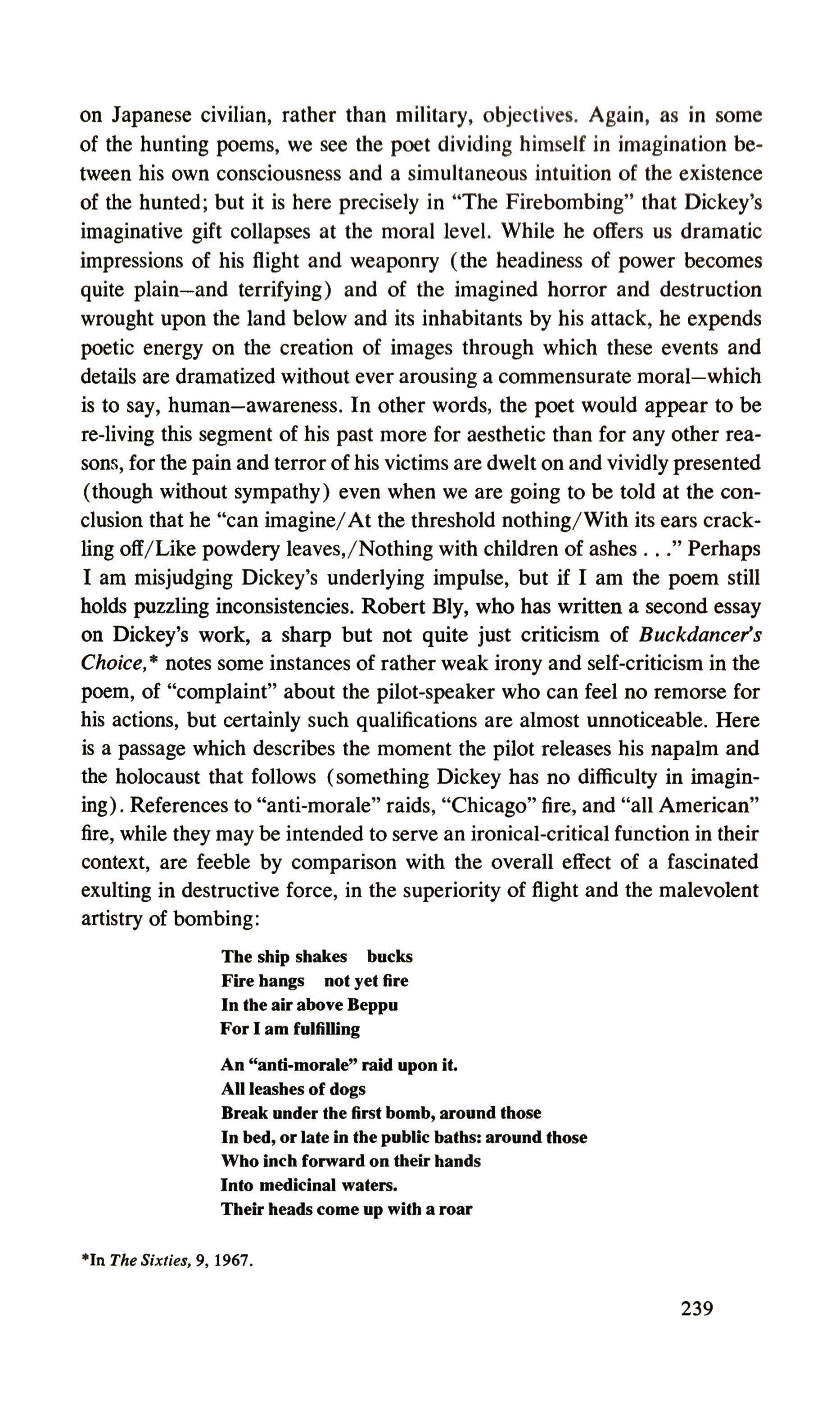
on Japanese civilian, rather than military, objectives. Again, as in some of the hunting poems, we see the poet dividing himself in imagination between his own consciousness and a simultaneous intuition of the existence of the hunted; but it is here precisely in "The Firebombing" that Dickey's imaginative gift collapses at the moral level. While he offers us dramatic impressions of his flight and weaponry (the headiness of power becomes quite plain and terrifying) and of the imagined horror and destruction wrought upon the land below and its inhabitants by his attack, he expends poetic energy on the creation of images through which these events and details are dramatized without ever arousing a commensurate moral which is to say, human awareness. In other words, the poet would appear to be re-living this segment of his past more for aesthetic than for any other reasons, for the pain and terror of his victims are dwelt on and vividly presented (though without sympathy) even when we are going to be told at the conclusion that he "can imagine/At the threshold nothing/With its ears crackling off/Like powdery leaves,/Nothing with children of ashes " Perhaps I am misjudging Dickey's underlying impulse, but if I am the poem still holds puzzling inconsistencies. Robert Bly, who has written a second essay on Dickey's work, a sharp but not quite just criticism of Buckdancer's Choice, * notes some instances of rather weak irony and self-criticism in the poem, of "complaint" about the pilot-speaker who can feel no remorse for his actions, but certainly such qualifications are almost unnoticeable. Here is a passage which describes the moment the pilot releases his napalm and the holocaust that follows (something Dickey has no difficulty in imagining). References to "anti-morale" raids, "Chicago" fire, and "all American" fire, while they may be intended to serve an ironical-critical function in their context, are feeble by comparison with the overall effect of a fascinated exulting in destructive force, in the superiority of flight and the malevolent artistry of bombing:
The ship shakes bucks Fire hangs not yet fire
In the air above Beppu
For I am fulfilling
An "anti-morale" raid upon it.
All leashes of dogs
Break under the first bomb, around those In bed, or late in the public baths: around those Who inch forward on their hands Into medicinal waters. Their heads come up with a roar
*In The Sixties, 9,1967.
239
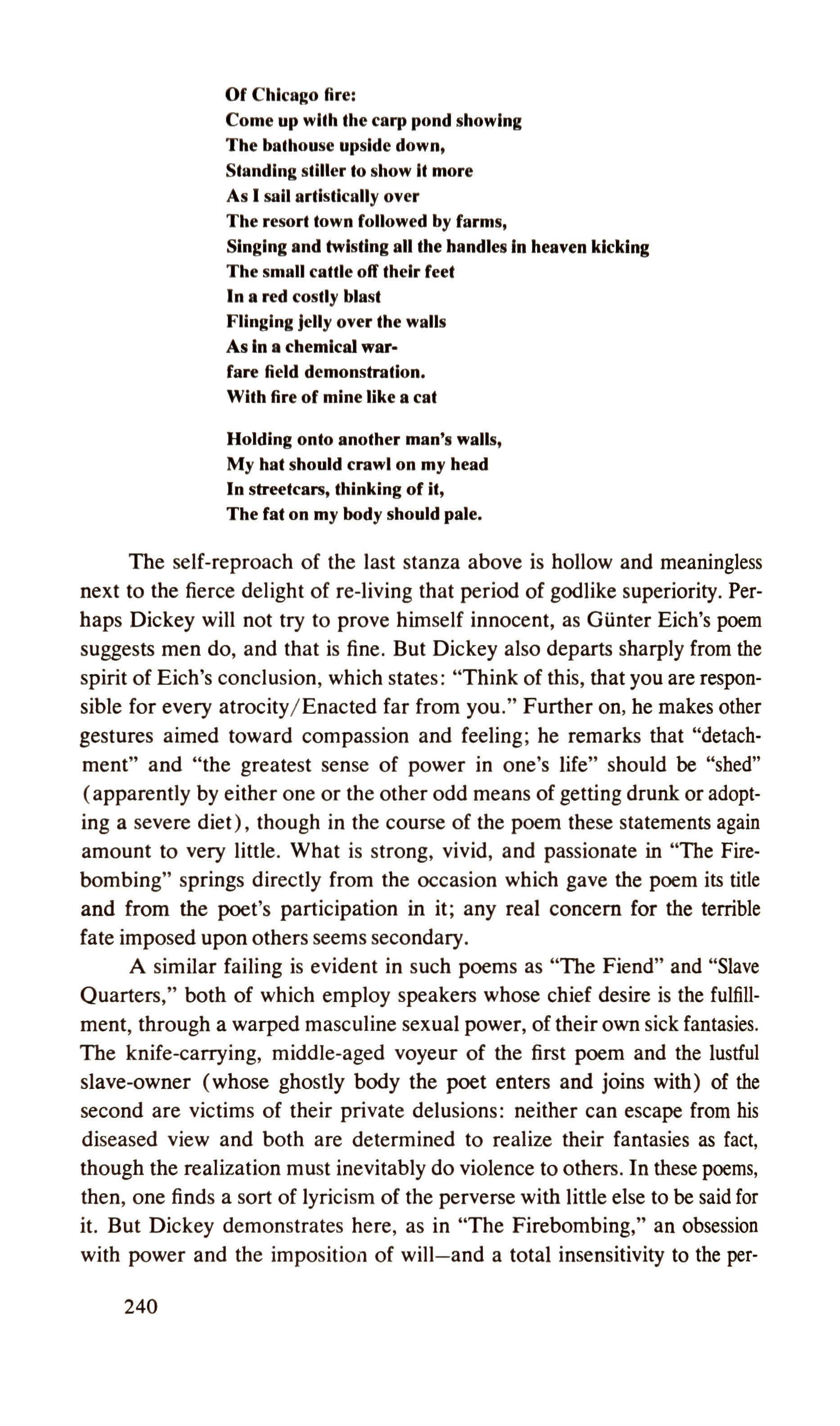
Of Chicago fire:
Come up with the carp pond showing The bathouse upside down,
Standing stiller to show It more
As I sail artistically over
The resort town followed by farms, Singing and twisting all the handles In heaven kicking
The small cattle oft' their feet
In a red costly blast
Flinging jelly over the walls
As In a chemical warfare field demonstration. With fire of mine like a cat
Holding onto another man's walls, My hat should crawl on my head
In streetcars, thinking of it, The fat on my body should pale.
The self-reproach of the last stanza above is hollow and meaningless next to the fierce delight of re-living that period of godlike superiority. Perhaps Dickey will not try to prove himself innocent, as GUnter Eich's poem suggests men do, and that is fine. But Dickey also departs sharply from the spirit of Eich's conclusion, which states: "Think of this, that you are responsible for every atrocity/Enacted far from you." Further on, he makes other gestures aimed toward compassion and feeling; he remarks that "detachment" and "the greatest sense of power in one's life" should be "shed" (apparently by either one or the other odd means of getting drunk or adopting a severe diet), though in the course of the poem these statements again amount to very little. What is strong, vivid, and passionate in "The Firebombing" springs directly from the occasion which gave the poem its title and from the poet's participation in it; any real concern for the terrible fate imposed upon others seems secondary.
A similar failing is evident in such poems as "The Fiend" and "Slave Quarters," both of which employ speakers whose chief desire is the fulfillment, through a warped masculine sexual power, of their own sick fantasies. The knife-carrying, middle-aged voyeur of the first poem and the lustful slave-owner (whose ghostly body the poet enters and joins with) of the second are victims of their private delusions: neither can escape from his diseased view and both are determined to realize their fantasies as fact, though the realization must inevitably do violence to others. In these poems, then, one finds a sort of lyricism of the perverse with little else to be said for it. But Dickey demonstrates here, as in "The Firebombing," an obsession with power and the imposition of will and a total insensitivity to the per-
240
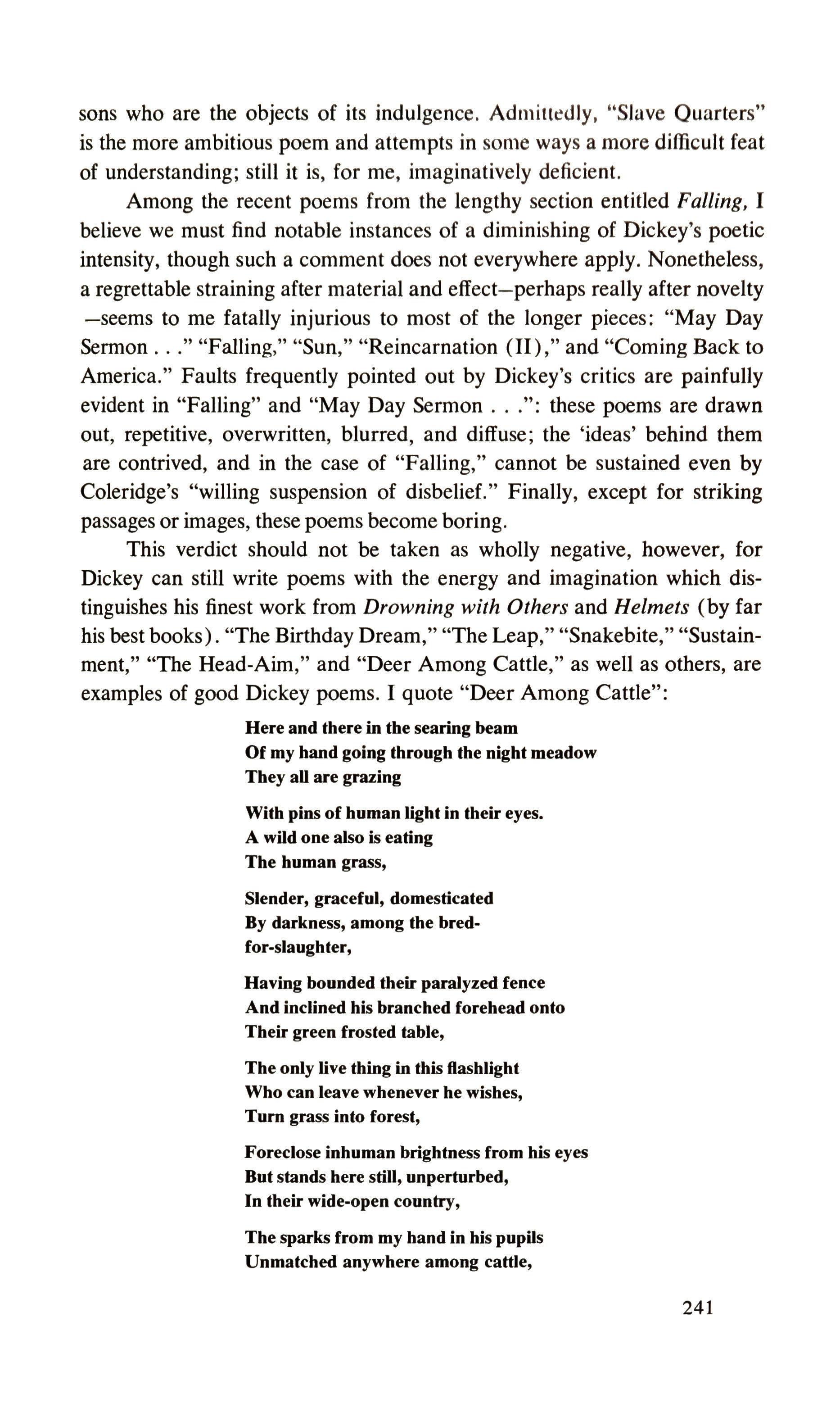
sons who are the objects of its indulgence. Admittedly, "Slave Quarters" is the more ambitious poem and attempts in some ways a more difficult feat of understanding; still it is, for me, imaginatively deficient.
Among the recent poems from the lengthy section entitled Falling, I believe we must find notable instances of a diminishing of Dickey's poetic intensity, though such a comment does not everywhere apply. Nonetheless, a regrettable straining after material and effect perhaps really after novelty -seems to me fatally injurious to most of the longer pieces: "May Day Sermon "Falling," "Sun," "Reincarnation (II)," and "Coming Back to America." Faults frequently pointed out by Dickey'S critics are painfully evident in "Falling" and "May Day Sermon ": these poems are drawn out, repetitive, overwritten, blurred, and diffuse; the 'ideas' behind them are contrived, and in the case of "Falling," cannot be sustained even by Coleridge's "willing suspension of disbelief." Finally, except for striking passages or images, these poems become boring.
This verdict should not be taken as wholly negative, however, for Dickey can still write poems with the energy and imagination which distinguishes his finest work from Drowning with Others and Helmets (by far his best books). "The Birthday Dream," "The Leap," "Snakebite," "Sustainment," "The Head-Aim," and "Deer Among Cattle," as well as others, are examples of good Dickey poems. I quote "Deer Among Cattle":
Here and there in the searing beam
Of my hand going through the night meadow
They aU are grazing
With pins of human light in their eyes.
A wild one also is eating
The human grass,
Slender, graceful, domesticated
By darkness, among the bredfor-slaughter,
Having bounded their paralyzed fence
And inclined his branched forehead onto Their green frosted table,
The only live thing in this flashlight
Who can leave whenever he wishes,
Tum gl ass into forest,
Foreclose inhuman brightness from his eyes
But stands here stiU, unperturbed,
In their wide-open country,
The sparks from my hand in his pupils
Unmatched anywhere among cattle,
241
Grazing with them the night of the hammer
As one of their own who shall rise.
At the top of his form Dickey does reveal a large capacity for feeling, for steeping his spirit in the being of others and in the very life of creation; and we think of the poets with whom his most authentic poems have their affinity: Whitman, Lawrence, Roethke; and among the younger: James Wright, Jon Silkin, Robert Bly, Donald Hall, W. S. Merwin; perhaps some European poets as well. But these affinities are broken in the poems which are morally insensate.
Dickey is a prolific writer, to judge from the size of a decade's production, and he has won sudden fame and publicity. Large reputations we know it as a commonplace can be exceedingly dangerous in the pressures they bring always to be new and inventive (the blight of the contemporary painter and sculptor) in order to maintain one's laurels, especially in a culture dedicated to the modish and to consumer consumption of artistic goods; and a poet of Dickey'S strengths can be damaged as easily as can a lesser one. I hope that will not happen, for he is, defects aside, a very gifted, truly imaginative poet who has already given us excellent pieces. No doubt his work must alter and grow toward full maturity," but its developments need to derive from inner necessity and not in answer to the external demands of reputation or public role. In any event, this collection of Dickey's poetry is an important book; it merits attentive reading and its readers will be far from unrewarded.
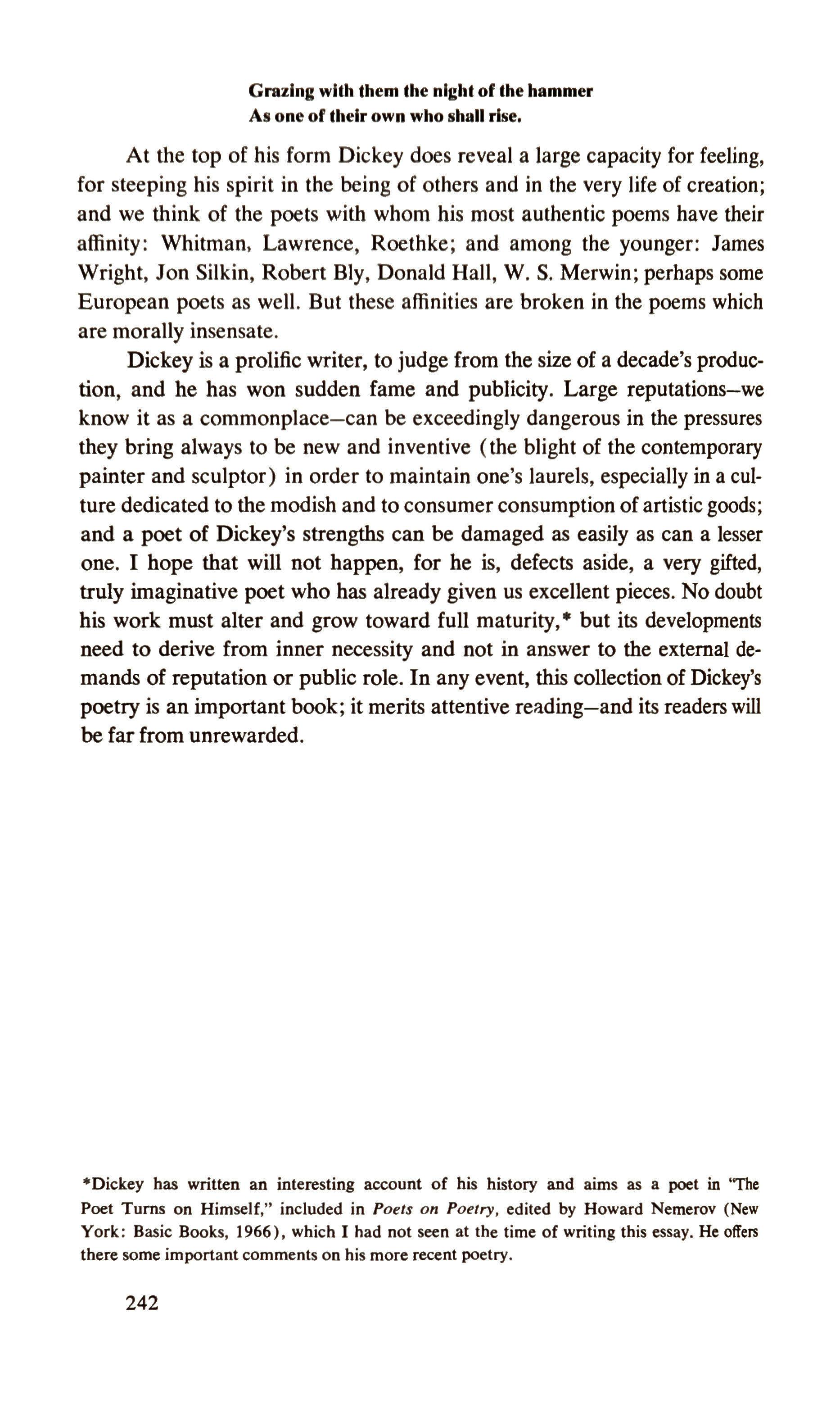
*Dickey has written an interesting account of his history and aims as a poet in "The Poet Turns on Himself," included in Poets on Poetry, edited by Howard Nemerov (New York: Basic Books, 1966), which I had not seen at the time of writing this essay. He offers there some important comments on his more recent poetry.
242
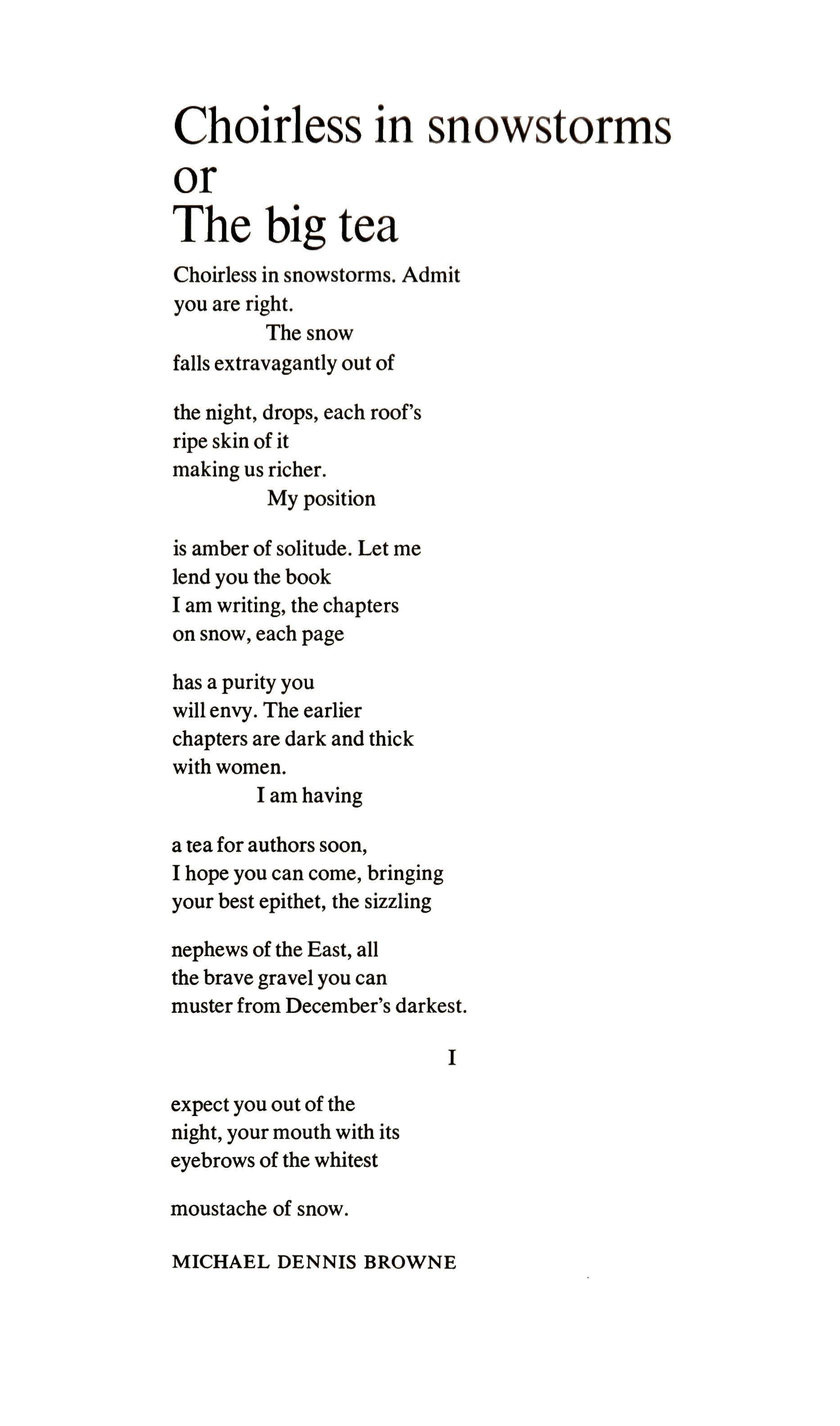
orr ess In sno
Of I
Choirless in snowstorms, Admit you are right. The snow falls extravagantly out of the night, drops, each roof's ripe skin of it making us richer.
My position is amber of solitude. Let me lend you the book I am writing, the chapters on snow, each page has a purity you will envy. The earlier chapters are dark and thick with women.
I am having a tea for authors soon, I hope you can come, bringing your best epithet, the sizzling nephews of the East, all the brave gravel you can muster from December's darkest.
I expect you out of the night, your mouth with its eyebrows of the whitest moustache of snow.
MICHAEL DENNIS BROWNE
 lor R�, &. Naomi Pollack
lor R�, &. Naomi Pollack
Agatha shrieked as she opened the ninth door of the deal dresser; violet mice had been at the pooballs,
And the leaves of the ailing sycamore murmured in the wind. For supper that night there were to have been pooballs, but the death of the cook necessitated a change of plan, And we all went to Ridgely's. Jane behaved badly there, and the fringe of pooballs on her dress trembled
As she danced, scarcely glancing at the pianoplayer; in between sets he talked to the girl with pineappleeyebrows
Who plied him with pooballs. It was a bad day all day, And everything I did was flounder-colored. Inventions! Visions! It was not that you said "Why look! You've painted Pooballs", but that the plums of sunset were unripe;night
After night I have tried to write you, for there were strange kelps to discuss and a table of green sea
To consider, but I alII ill, hearingalways the indefatigable click of pooballs.
But the morning yawned and expanded over the blinding water, searing all our mild SUImises, for morning
Is a serious business. And if the remembrance of something so selfcontained, so very like a pooball
That it rolled gurgling through the dark chasms, remained; If resemblances to the places down which the rollinghappened still lay in the shadows of driftwood, There was little else for evasions to save. After the unseen waves, after the wailing of starlightfades, one still hears; night adheres to
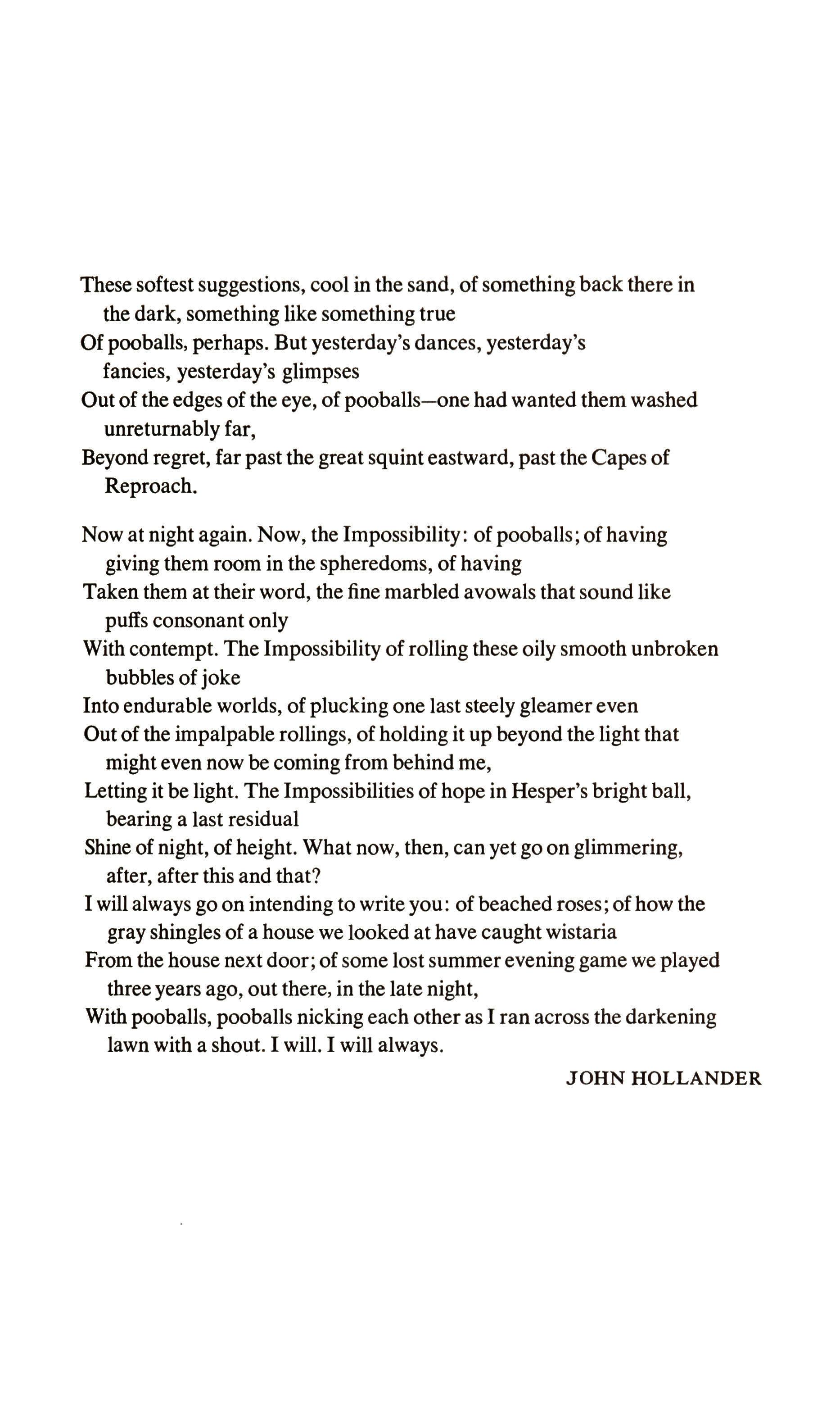
These softest suggestions, cool in the sand, of something back there in the dark, something like something true
Of pooballs, perhaps. But yesterday's dances, yesterday's fancies, yesterday's glimpses
Out of the edges of the eye, ofpooballs one had wanted them washed unretumablyfar, Beyond regret, far past the great squinteastward, past the Capes of Reproach.
Now at night again. Now, the Impossibility: of pooballs; ofhaving giving them room in the spheredoms, of having Taken them at their word, the fine marbled avowals that sound like puffs consonant only
With contempt. The Impossibility of rolling these oily smooth unbroken bubbles ofjoke
Into endurable worlds, of plucking one last steely gleamer even Out of the impalpable rollings, of holding it up beyond the light that might even now be coming from behind me, Letting it be light. The Impossibilities of hope in Hesper's bright ball, bearing a last residual Shine of night, of height. What now, then, can yet go on glimmering, after, after this and that?
I will always go on intending to write you: of beached roses; ofhow the gray shingles of a house we looked at have caught wistaria
From the house next door; of some lost summer evening game we played three years ago, out there, in the late night, With pooballs, pooballs nicking each other as I ran across the darkening lawn with a shout. I will. I will always.
JOHN HOLLANDER
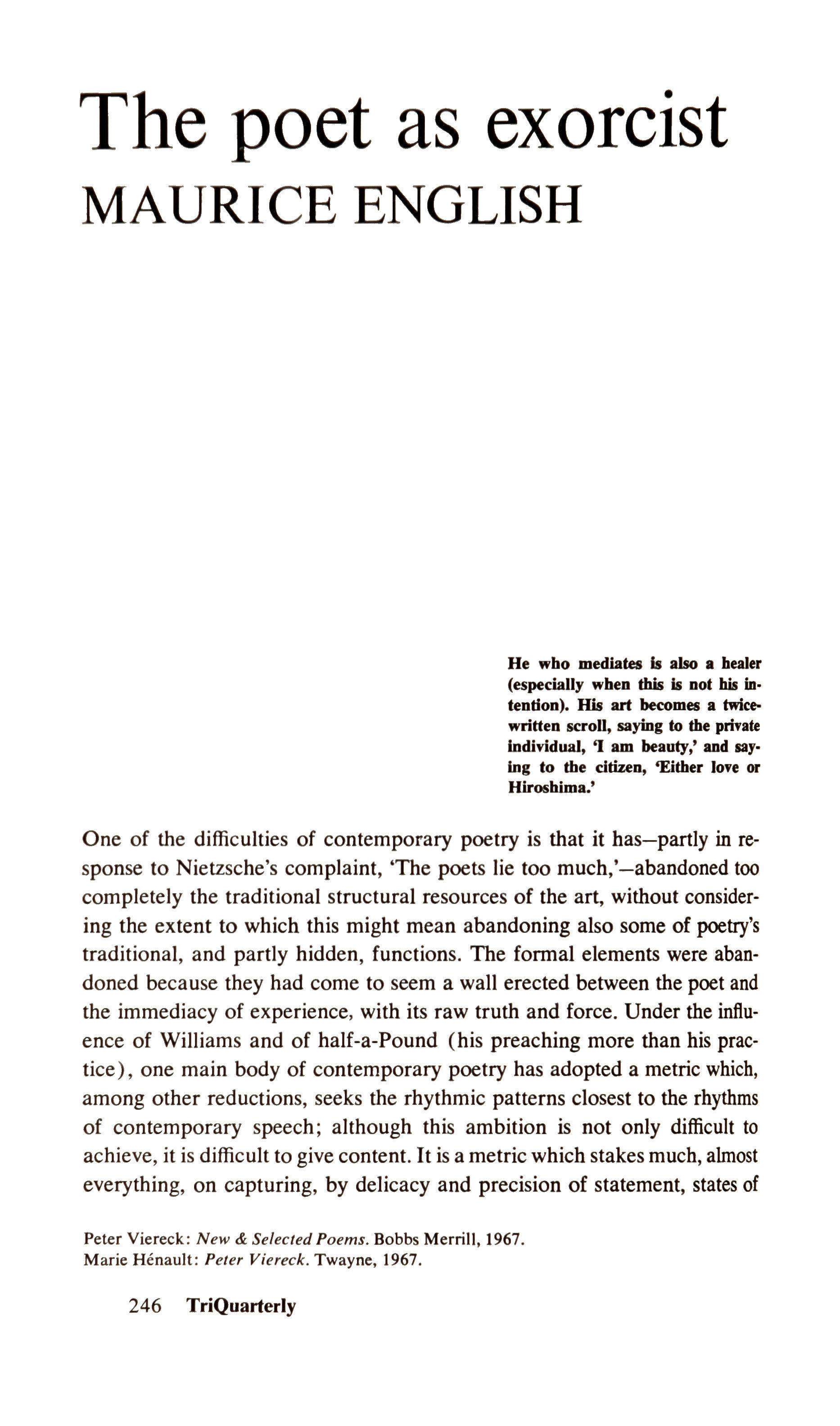
He who mediates Is a"o a healer (especially when this is not his in· tention). His art becomes a twicewritten scroD, saying to the private Individual, 'I am beauty,' and say· Ing to the citiun, 'Either love or Hiroshima.'
One of the difficulties of contemporary poetry is that it has partly in response to Nietzsche's complaint, 'The poets lie too much,' abandoned too completely the traditional structural resources of the art, without considering the extent to which this might mean abandoning also some of poetry's traditional, and partly hidden, functions. The formal elements were abandoned because they had come to seem a wall erected between the poet and the immediacy of experience, with its raw truth and force. Under the influence of Williams and of half-a-Pound (his preaching more than his practice), one main body of contemporary poetry has adopted a metric which, among other reductions, seeks the rhythmic patterns closest to the rhythms of contemporary speech; although this ambition is not only difficult to achieve, it is difficult to give content. It is a metric which stakes much, almost everything, on capturing, by delicacy and precision of statement, states of
Peter Viereck: New & Selected Poems. Bobbs Merrill, 1967.
Marie Henault: Peter Viereck. Twayne, 1967.
246 TriQuarterly
•

feeling that are linked so finely to the Immediate perception of an event or an emotion, as to risk being destroyed by being set in any wide or objective frame of reference.
I have already insisted on the losses that result in these pages (TriQuarterly, Fall, 1966) and will not blow that horn again. I want now simply to point out that, from the readiness to sacrifice the formal aspects of poetry, those which link it with its aristocratic and hieratic origins, in favor of a highly personal and spontaneous response to experience, there has been a contradictory result: much of the characteristic poetry of our time, the poetry which is the logical development and extension of the practice of Williams through poets like Charles Olson, tends toward anonymity through the sacrifice of style, a sacrifice facilitated one could say, required by the giving up of the formal in poetry. The anonymity is not literal or absolute, of course, but it is the impression created by a pervasive exiguity of tone and feeling, by the renunciation of all that can be established in the mind by intricacies and elaborations of rhythm, imagery and vocabulary. Who feels the impulse to memorize the poems to which I allude? And how easy would they be to memorize? They are everywhere around, drifted into the little magazines on a breeze of personal sensibility, but carrying no personal signature.
Does it matter?
Yes, for this paradoxical sacrifice of individuality means a sacrifice of variety, of much-ness, of that meeting of the whole poetic experience by the whole poet, which gives a poem its lasting resonance. The formal elements, the way rhythm is structured, somehow help to retrieve more material from the unconscious, and to weave it into a seamless whole. One can see how this is true, not only by turning to the most memorably idiosyncratic poets of the past, from Skelton to Thomas, but also by turning to the contemporaries who, despite occasional exploratory rebellions, have returned again and again to the formal resources of their art Roethke, Shapiro, Lowell, Wilbur, Nemerov, Belitt and, in the present instance, Peter Viereck.
Is my impression correct, that in the last decade or so, Viereck has been a somewhat neglected poet? Despite what I assume to be his continued popularity as a campus reader, he is best-known Mrs. Henault confirms this as a prose writer, a role in which he has sometimes required indulgence as well as admiration. But the appearance of this selection of about twenty new poems, along with eighty reprinted from his previous five books of poetry, coincides with the publication of Mrs. Henault's study, the first one of book length, devoted to 'him. Perhaps attention is about to swing back to his work, with its Gothic fantasy, its serious fun, its love of risk, its elan in
247
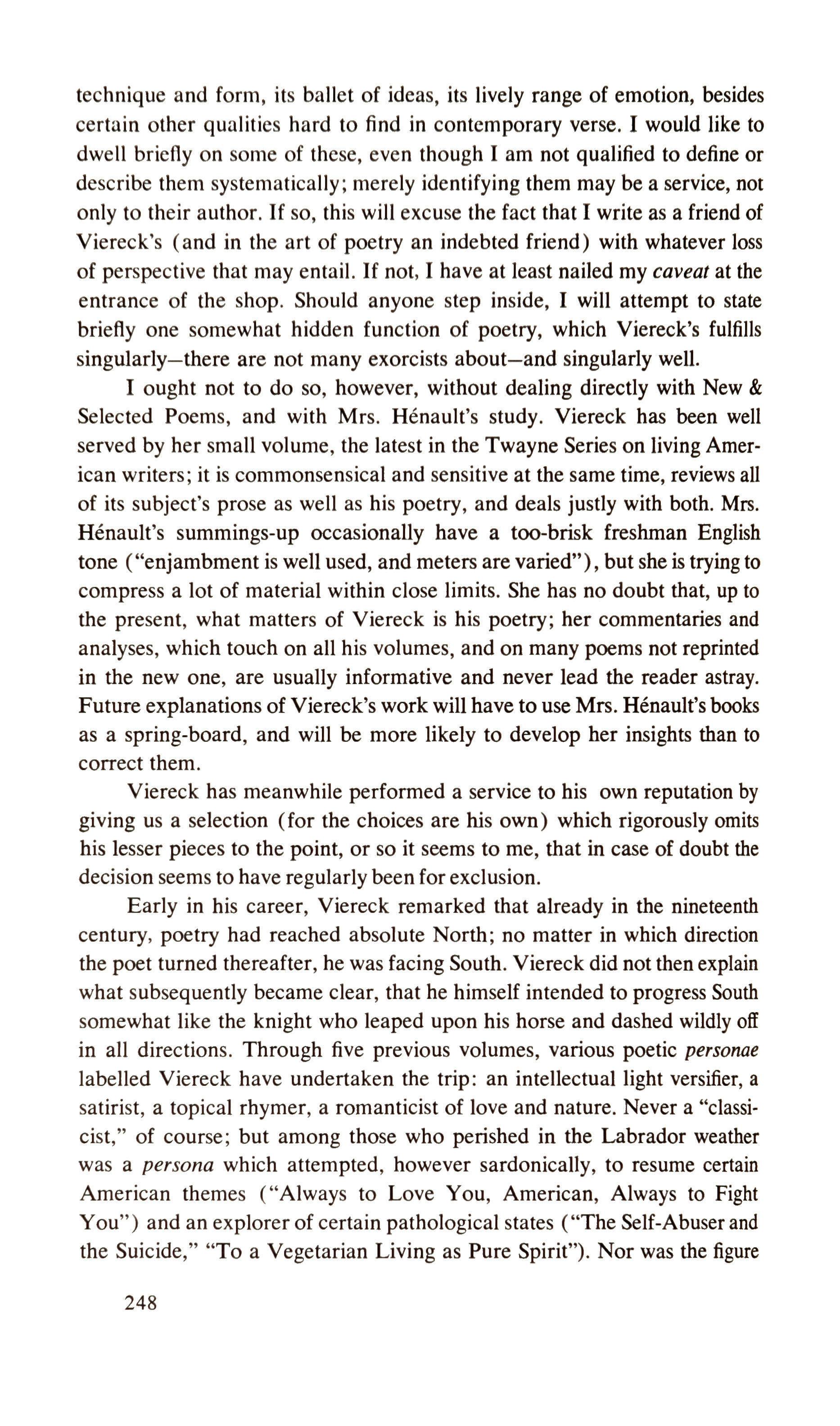
technique and form, its ballet of ideas, its lively range of emotion, besides certain other qualities hard to find in contemporary verse. I would like to dwell briefly on some of these, even though I am not qualified to define or describe them systematically; merely identifying them may be a service, not only to their author. If so, this will excuse the fact that I write as a friend of Viereck's (and in the art of poetry an indebted friend) with whatever loss of perspective that may entail. If not, I have at least nailed my caveat at the entrance of the shop. Should anyone step inside, I will attempt to state briefly one somewhat hidden function of poetry, which Viereck's fulfills singularly there are not many exorcists about and singularly well.
I ought not to do so, however, without dealing directly with New & Selected Poems, and with Mrs. Henault's study. Viereck has been well served by her small volume, the latest in the Twayne Series on living American writers; it is commonsensical and sensitive at the same time, reviews all of its subject's prose as well as his poetry, and deals justly with both. Mrs. Henault's summings-up occasionally have a too-brisk freshman English tone ("enjalllbment is well used, and meters are varied"), but she is trying to compress a lot of material within close limits. She has no doubt that, up to the present, what matters of Viereck is his poetry; her commentaries and analyses, which touch on all his volumes, and on many poems not reprinted in the new one, are usually informative and never lead the reader astray. Future explanations of Viereck's work will have to use Mrs. Henault's books as a spring-board, and will be more likely to develop her insights than to correct them.
Viereck has meanwhile performed a service to his own reputation by giving us a selection (for the choices are his own) which rigorously omits his lesser pieces to the point, or so it seems to me, that in case of doubt the decision seems to have regularly been for exclusion.
Early in his career, Viereck remarked that already in the nineteenth century, poetry had reached absolute North; no matter in which direction the poet turned thereafter, he was facing South. Viereck did not then explain what subsequently became clear, that he himself intended to progress South somewhat like the knight who leaped upon his horse and dashed wildly off in all directions. Through five previous volumes, various poetic personae labelled Viereck have undertaken the trip: an intellectual light versifier, a satirist, a topical rhymer, a romanticist of love and nature. Never a "classicist," of course; but among those who perished in the Labrador weather was a persona which attempted, however sardonically, to resume certain American themes ("Always to Love You, American, Always to Fight You") and an explorer of certain pathological states ("The Self-Abuser and the Suicide," "To a Vegetarian Living as Pure Spirit"). Nor was the figure
248

of the real Peter Viereck, which has kept on corning, easily identified through the mists of critical comment which identified him with poets with whom he has little in common (e. e. cummings), or overemphasized his wit and thus obscured his real achievement (as has happened to Howard Nemerov), or dismissed him as "not tragic."
Some poems are missing from New & Selected Poems that I myself regret, like "The Big Graveyard," and imaginative explorations like the two studies in pathology named above. The arrangement of the book is deliberately not chronological, but it is not arbitrary, either. The poems are arranged in groups around a particular theme or "obsession" of their author. The first group is called "The Tree Menagerie" and we therefore find ourselves at once in a world of fancy which is four-square Viereckian, with its amused and reckless play with rhyme and meter, its lapses and retrievals of taste, its surprises of imagery and invention, its grotesqueries which suddenly become brilliant condensations:
Their health is parch. Their moral code is gash ("Cacti: Paysage Moralise") or poignantly lyrical:
How long, 0 fruit, since ripeness burst your skin? Commemorate that second birth. You bore What every triviality of flesh Is pregnant with: the perfect bone within.
("To My Playmate, with Thanks for Carefree Days Together")
Less than half serious, sardonic, this group strikes a tone which is Viereck's own, and which as one reads deeper into the book grows surer, more dramatic, more resonant. Mrs. Henault is right to insist on the high quality of Viereck's auditory imagination; when he betrays himself, it is by other organs than his ear.
I will not dwell on those faults of Viereck which other writers, including Mrs. Henault, have emphasized (though not sufficiently to induce total abstinence) brashness and stridency, example and symbol of which is the insistent capitalization of words for emphasis; the puns, wisecracks and gags which are even more out-of-place in his poetry than in his prose ("The Slacker Need not Apologize" has, as epigraph, a punning mistranslation of Pascal which is irritating in itself, and out of tone with the poem).
Much more regrettable, because they thrust more fatally at the life of very good poems, are a certain self-defeating patness, easily seduced by effects of antithesis and alliteration; and a failure to test imagery for its ultimate propriety. That surprising, persuasive, delightful poem, which should be wholly admirable, "Small Perfect Manhattan," is marred by a line:
249
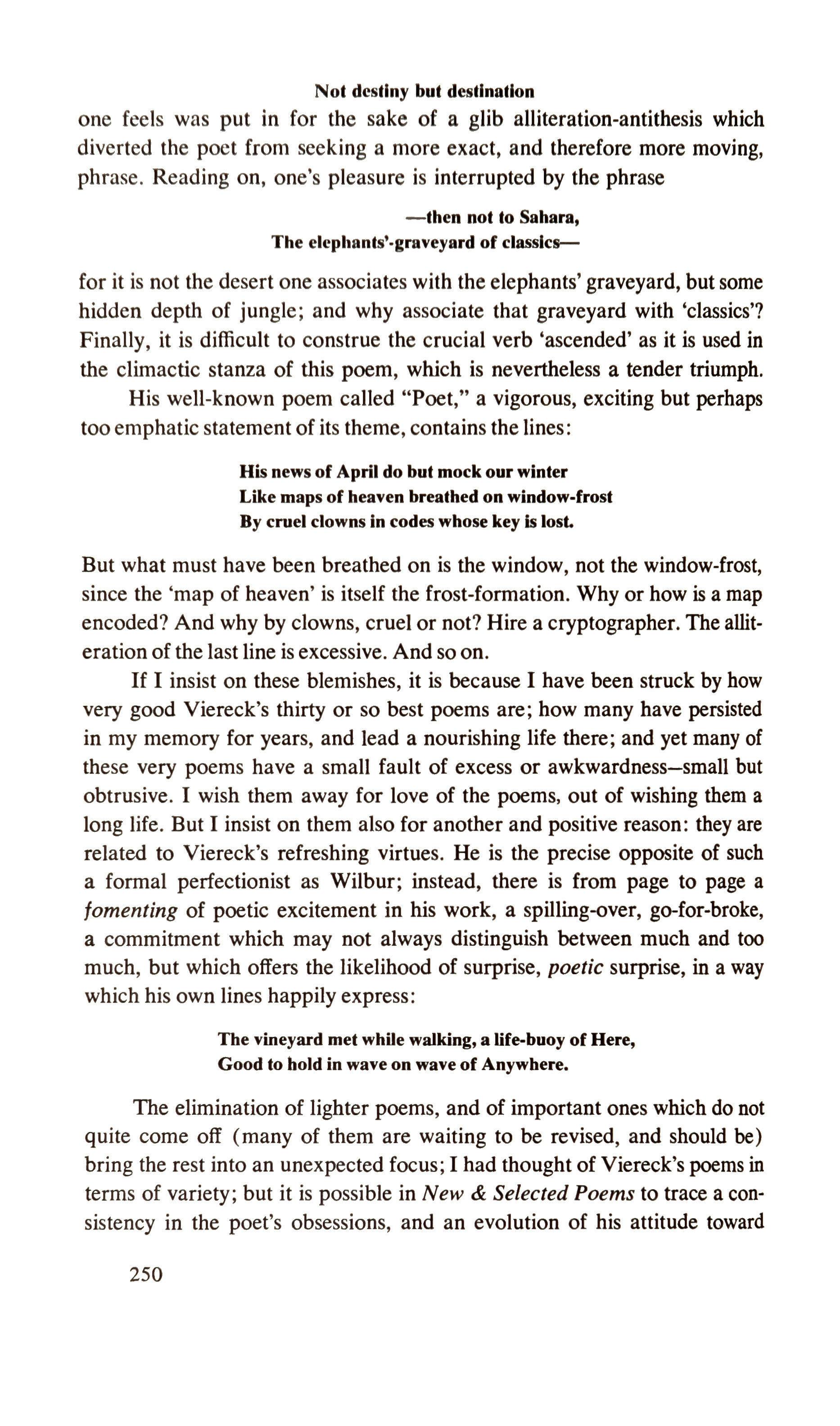
Not destiny but destination one feels was put in for the sake of a glib alliteration-antithesis which diverted the poet from seeking a more exact, and therefore more moving, phrase. Reading on, one's pleasure is interrupted by the phrase -then not to Sahara, The elcpllants'.graveyard of classlcss-for it is not the desert one associates with the elephants' graveyard, but some hidden depth of jungle; and why associate that graveyard with 'classics'? Finally, it is difficult to construe the crucial verb 'ascended' as it is used in the climactic stanza of this poem, which is nevertheless a tender triumph. His well-known poem called "Poet," a vigorous, exciting but perhaps too emphatic statement of its theme, contains the lines:
His news of April do but mock our winter
Like maps of heaven breathed on window-frost
By cruel clowns in codes whose key is lost.
But what must have been breathed on is the window, not the window-frost, since the 'map of heaven' is itself the frost-formation. Why or how is a map encoded? And why by clowns, cruel or not? Hire a cryptographer. The alliteration of the last line is excessive. And so on.
If I insist on these blemishes, it is because I have been struck by how very good Viereck's thirty or so best poems are; how many have persisted in my memory for years, and lead a nourishing life there; and yet many of these very poems have a small fault of excess or awkwardness small but obtrusive. I wish them away for love of the poems, out of wishing them a long life. But I insist on them also for another and positive reason: they are related to Viereck's refreshing virtues. He is the precise opposite of such a formal perfectionist as Wilbur; instead, there is from page to page a fomenting of poetic excitement in his work, a spilling-over, go-for-broke, a commitment which may not always distinguish between much and too much, but which offers the likelihood of surprise, poetic surprise, in a way which his own lines happily express:
The vineyard met while walking, a life-buoy of Here, Good to bold in wave on wave of Anywhere.
The elimination of lighter poems, and of important ones which do not quite come off (many of them are waiting to be revised, and should be) bring the rest into an unexpected focus; I had thought of Viereck's poems in terms of variety; but it is possible in New & Selected Poems to trace a consistency in the poet's obsessions, and an evolution of his attitude toward
250
these obsessions which I had not looked for. His work takes on a greater coherence, and thus a greater interest as a whole.
It becomes apparent that even in the fun-and-games, the tomfoolery, of his first poems, Viereck has been seriously preoccupied with the place of man in nature (often equating man with the poet, the form of man most yearning for a response from nature) and with a question about God which is apparently asked more often in other literature than in ours not only, can He hear us? not only, is He neutral, or benevolent? but also, and too repetitively to be wholly in jest: is He evil? perhaps even malevolent? 'I'hrough the successive volumes from Terror & Decorum, the question has been raised insistently how man should interpret the silences around him. Viereck recurrently suspects that there is occasion for a stronger emotion than amazement, he is recurrently tempted toward a jesting reply which, in this century, is not so much of a jest:
"At school they never used to talk like You."
"No, not like me."
"People back home don't want such things to do."
"Perhaps. We'll see."
"Men won't splash harmless blood just for Your thirst."
"No, not at first."
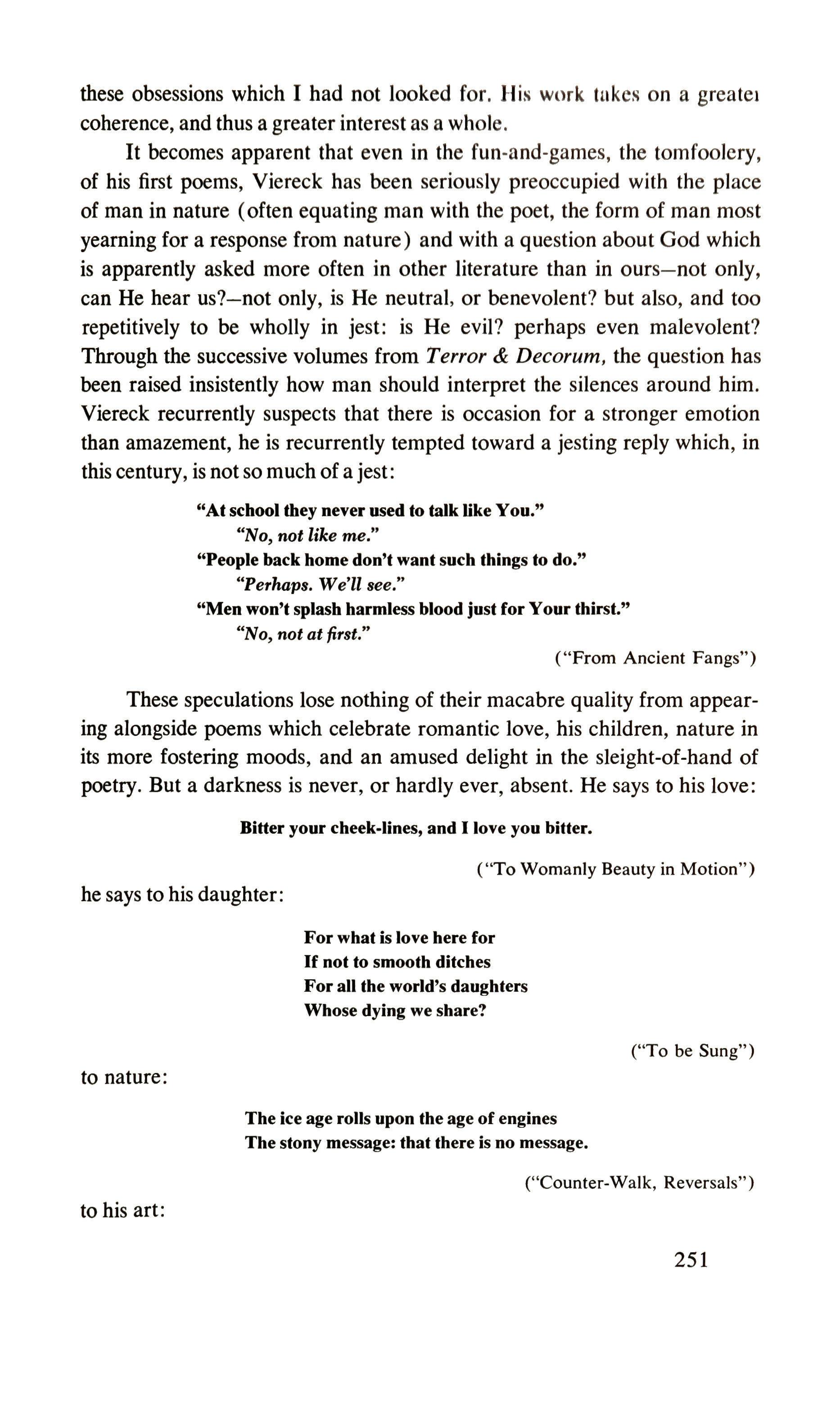
("From Ancient Fangs")
These speculations lose nothing of their macabre quality from appearing alongside poems which celebrate romantic love, his children, nature in its more fostering moods, and an amused delight in the sleight-of-hand of poetry. But a darkness is never, or hardly ever, absent. He says to his love:
Bitter your cheek-lines, and I love you bitter.
("To Womanly Beauty in Motion") he says to his daughter:
For what is love here for
If not to smooth ditches
For all the world's daughters Whose dying we share?
("To be Sung") to nature:
The ice age rolls upon the age of engines
The stony message: that there is no message.
("Counter-Walk, Reversals") to his art:
251
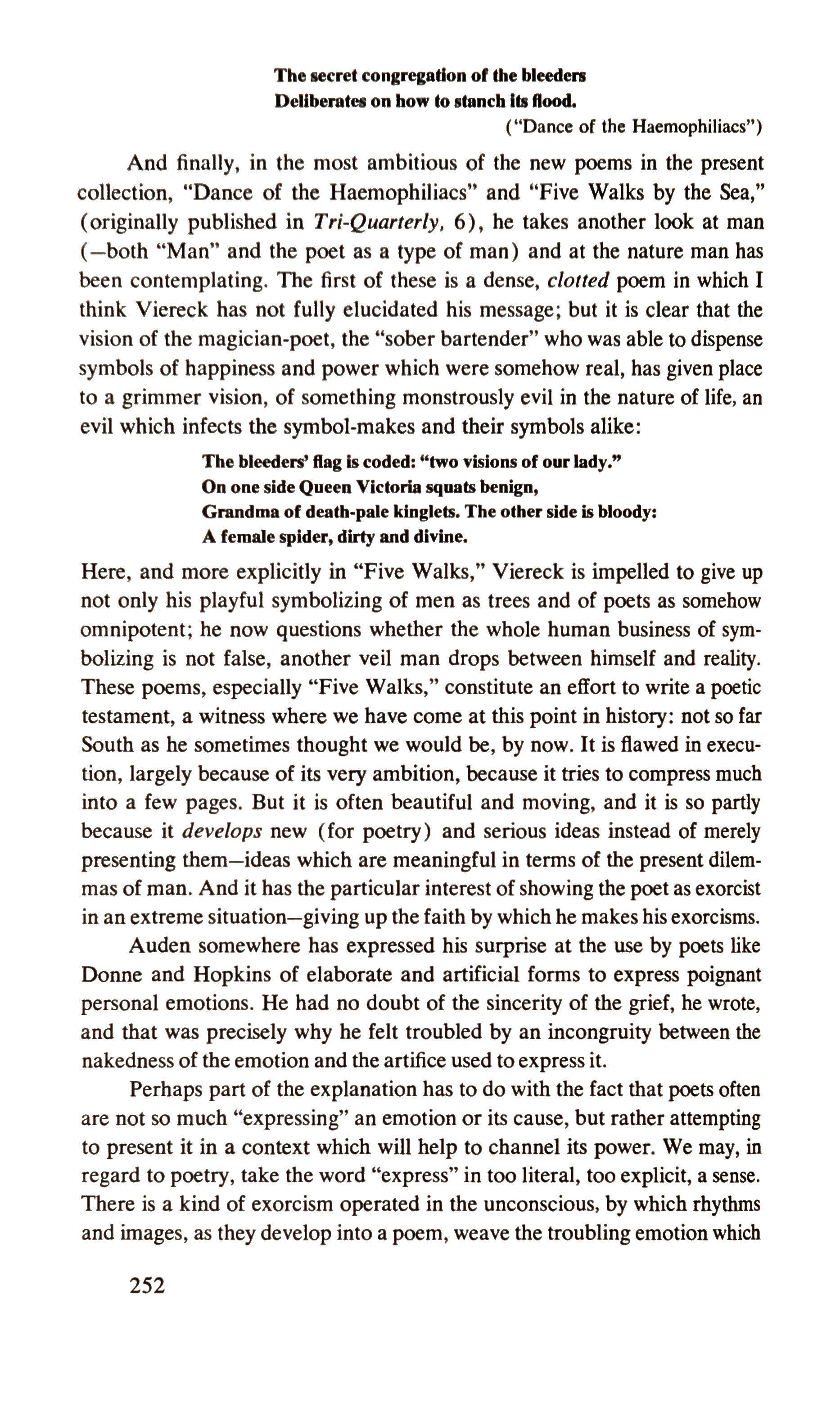
The secret congregadon of the bleeden DeUberatet on how to .tanch Ita flood.
("Dance of the Haemophiliacs")
And finally, in the most ambitious of the new poems in the present collection, "Dance of the Haemophiliacs' and "Five Walks by the Sea," (originally published in Tri-Quarterly, 6), he takes another look at man ( both "Man" and the poet as a type of man) and at the nature man has been contemplating. The first of these is a dense, clotted poem in which I think Viereck has not fully elucidated his message; but it is clear that the vision of the magician-poet, the "sober bartender" who was able to dispense symbols of happiness and power which were somehow real, has given place to a grimmer vision, of something monstrously evil in the nature of life, an evil which infects the symbol-makes and their symbols alike:
The bleeders' flag Is coded: "two visions of our lady."
On one side Queen Victoria squats benign, Grandma of death-pale kinglets. The other side is bloody: A female spider, dirty and divine.
Here, and more explicitly in "Five Walks," Viereck is impelled to give up not only his playful symbolizing of men as trees and of poets as somehow omnipotent; he now questions whether the whole human business of symbolizing is not false, another veil man drops between himself and reality. These poems, especially "Five Walks," constitute an effort to write a poetic testament, a witness where we have come at this point in history: not so far South as he sometimes thought we would be, by now. It is flawed in execution, largely because of its very ambition, because it tries to compress much into a few pages. But it is often beautiful and moving, and it is so partly becallse it develops new (for poetry) and serious ideas instead of merely presenting them ideas which are meaningful in terms of the present dilemmas of man. And it has the particular interest of showing the poet as exorcist in an extreme situation giving up the faith by which he makes his exorcisms. Auden somewhere has expressed his surprise at the use by poets like Donne and Hopkins of elaborate and artificial forms to express poignant personal emotions. He had no doubt of the sincerity of the grief, he wrote, and that was precisely why he felt troubled by an incongruity between the nakedness of the emotion and the artifice used to express it.
Perhaps part of the explanation has to do with the fact that poets often are not so much "expressing" an emotion or its cause, but rather attempting to present it in a context which will help to channel its power. We may, in regard to poetry, take the word "express" in too literal, too explicit, a sense. There is a kind of exorcism operated in the unconscious, by which rhythms and images, as they develop into a poem, weave the troubling emotion which
252
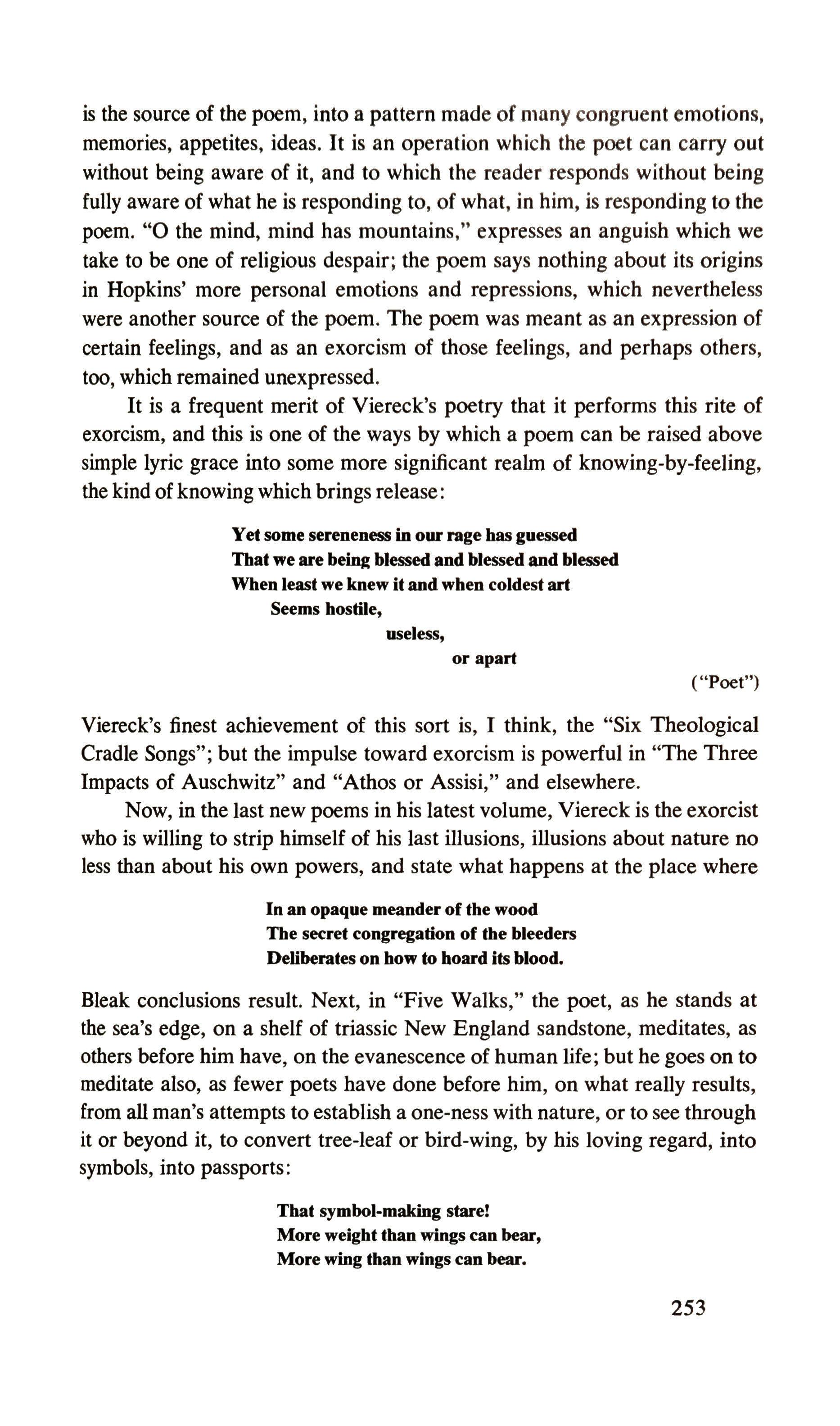
is the source of the poem, into a pattern made of many congruent emotions, memories, appetites, ideas. It is an operation which the poet can carry out without being aware of it, and to which the reader responds without being fully aware of what he is responding to, of what, in him, is responding to the poem. "0 the mind, mind has mountains," expresses an anguish which we take to be one of religious despair; the poem says nothing about its origins in Hopkins' more personal emotions and repressions, which nevertheless were another source of the poem. The poem was meant as an expression of certain feelings, and as an exorcism of those feelings, and perhaps others, too, which remained unexpressed.
It is a frequent merit of Viereck's poetry that it performs this rite of exorcism, and this is one of the ways by which a poem can be raised above simple lyric grace into some more significant realm of knowing-by-feeling, the kind of knowing which brings release:
Yet some sereneness in our rage has guessed
That we are beiD2 blessed and blessed and blessed When least we knew it and when coldest art Seems hostile, useless, or apart
Viereck's finest achievement of this sort is, I think, the "Six Theological Cradle Songs"; but the impulse toward exorcism is powerful in "The Three Impacts of Auschwitz" and "Athos or Assisi," and elsewhere.
Now, in the last new poems in his latest volume, Viereck is the exorcist who is willing to strip himself of his last illusions, illusions about nature no less than about his own powers, and state what happens at the place where
In an opaque meander of the wood
The secret congregation of the bleeders Deliberates on how to hoard its blood.
Bleak conclusions result. Next, in "Five Walks," the poet, as he stands at the sea's edge, on a shelf of triassic New England sandstone, meditates, as others before him have, on the evanescence of human life; but he goes on to meditate also, as fewer poets have done before him, on what really results, from all man's attempts to establish a one-ness with nature, or to see through it or beyond it, to convert tree-leaf or bird-wing, by his loving regard, into symbols, into passports:
That symbol-making stare! More weight than wings can bear, More wing than wings can bear.
("Poet")
253
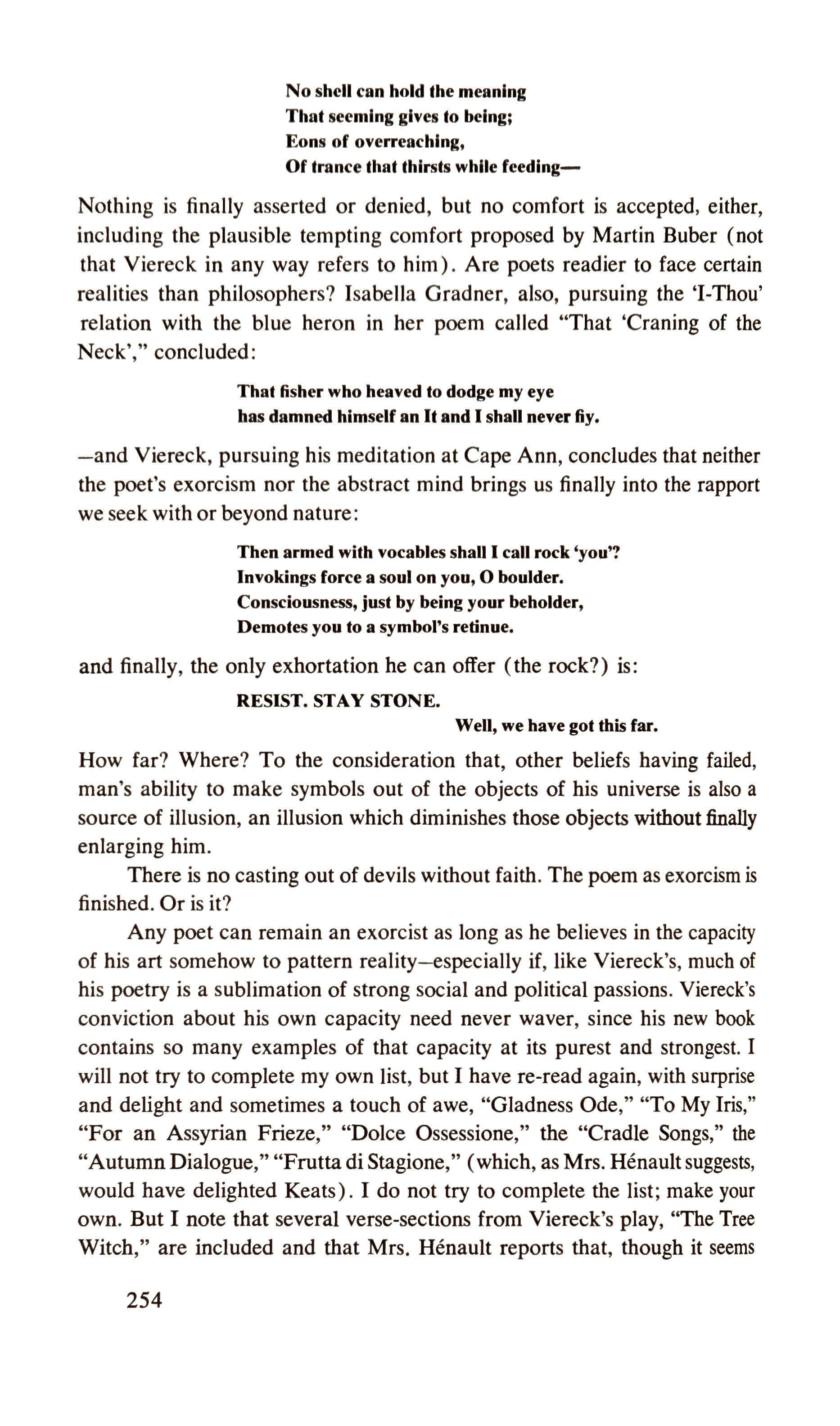
No shell can hold the meaning That seeming gives to being; Eons of overreaching, Of trance that thirsts while feedlng-
Nothing is finally asserted or denied, but no comfort is accepted, either, including the plausible tempting comfort proposed by Martin Buber (not that Viereck in any way refers to him). Are poets readier to face certain realities than philosophers? Isabella Gradner, also, pursuing the 'I-Thou' relation with the blue heron in her poem called "That 'Craning of the Neck'," concluded:
That fisher who heaved to dodge my eye has damned himself an It and I shaD never fiy.
-and Viereck, pursuing his meditation at Cape Ann, concludes that neither the poet's exorcism nor the abstract mind brings us finally into the rapport we seek with or beyond nature:
Then armed with vocables shall I call rock 'you'? Invokfngs force a soul on you, 0 boulder. Consciousness, just by being your beholder, Demotes you to a symbol's retinue. and finally, the only exhortation he can offer (the rock?) is: RESIST. STAY STONE.
Well, we have got this far.
How far? Where? To the consideration that, other beliefs having failed, man's ability to make symbols out of the objects of his universe is also a source of illusion, an illusion which diminishes those objects without finally enlarging him.
There is no casting out of devils without faith. The poem as exorcism is finished. Or is it?
Any poet can remain an exorcist as long as he believes in the capacity of his art somehow to pattern reality especially if, like Viereck's, much of his poetry is a sublimation of strong social and political passions. Viereck's conviction about his own capacity need never waver, since his new book contains so many examples of that capacity at its purest and strongest. I will not try to complete my own list, but I have re-read again, with surprise and delight and sometimes a touch of awe, "Gladness Ode," "To My Iris," "For an Assyrian Frieze," "Dolce Ossessione," the "Cradle Songs," the "Autumn Dialogue," "Frutta di Stagione," (which, as Mrs. Henault suggests, would have delighted Keats). I do not try to complete the list; make your own. But I note that several verse-sections from Viereck's play, "The Tree Witch," are included and that Mrs. Henault reports that, though it seems
254
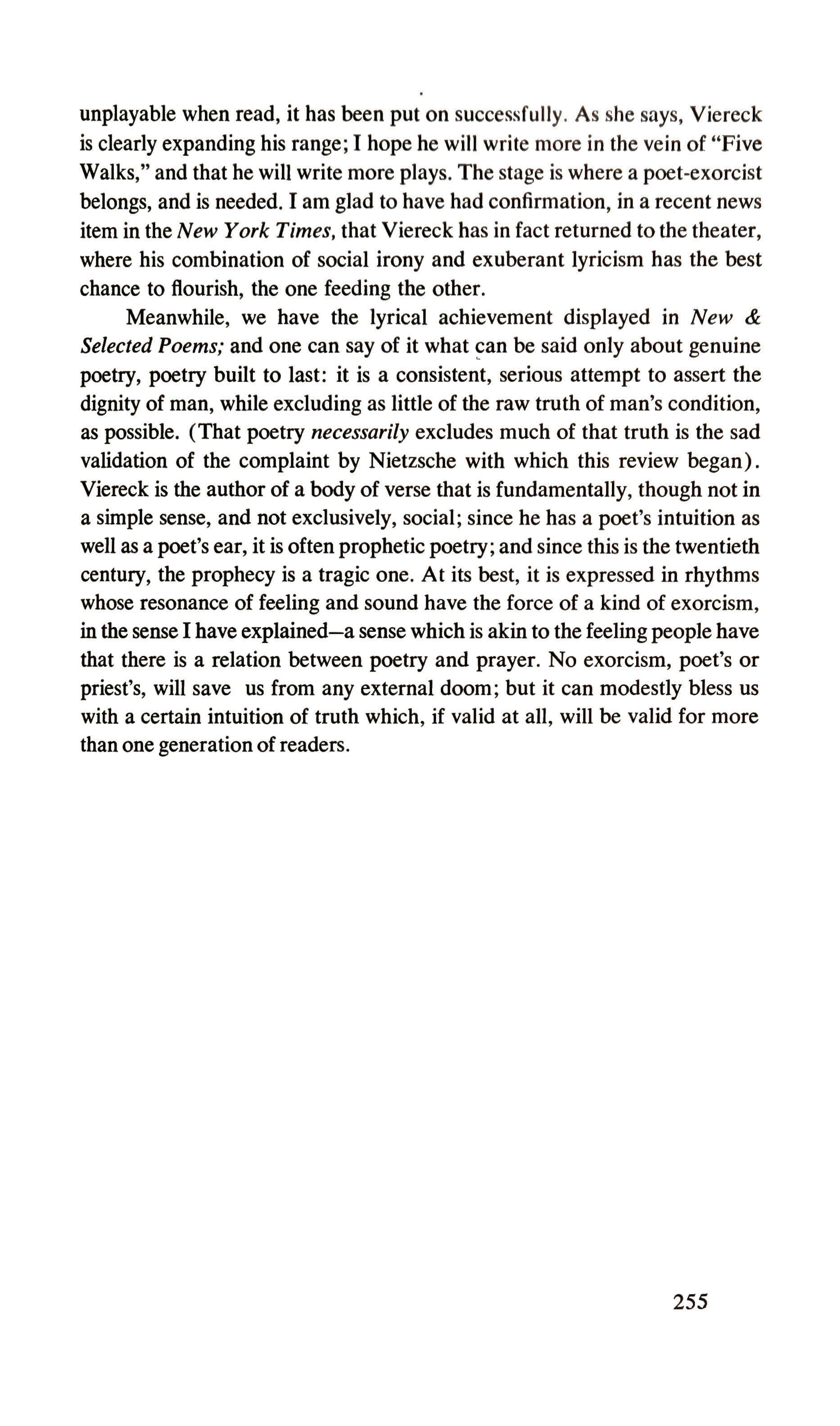
unplayable when read, it has been put on successfully. As she says, Viereck is clearly expanding his range; I hope he will write more in the vein of "Five Walks," and that he will write more plays. The stage is where a poet-exorcist belongs, and is needed. I am glad to have had confirmation, in a recent news item in the New York Times, that Viereck has in fact returned to the theater, where his combination of social irony and exuberant lyricism has the best chance to flourish, the one feeding the other.
Meanwhile, we have the lyrical achievement displayed in New & Selected Poems,' and one can say of it what can be said only about genuine poetry, poetry built to last: it is a consistent, serious attempt to assert the dignity of man, while excluding as little of the raw truth of man's condition, as possible. (That poetry necessarily excludes much of that truth is the sad validation of the complaint by Nietzsche with which this review began). Viereck is the author of a body of verse that is fundamentally, though not in a simple sense, and not exclusively, social; since he has a poet's intuition as well as a poet's ear, it is often prophetic poetry; and since this is the twentieth century, the prophecy is a tragic one. At its best, it is expressed in rhythms whose resonance of feeling and sound have the force of a kind of exorcism, in the sense I have explained a sense which is akin to the feelingpeople have that there is a relation between poetry and prayer. No exorcism, poet's or priest's, will save us from any external doom; but it can modestly bless us with a certain intuition of truth which, if valid at all, will be valid for more than one generation of readers.
255
one ouse
Half the house is cloud-wrapped. In winter, in a wadded coat, The priest turns from his book, Lies on his meditation board. The fire goes out, blue ends burn. The sun is three feet above the ground.
LY DAO TAl (1254-1334)
translated from the Vietnamese by Nguyen Ngoc Bich and Burton Raffel
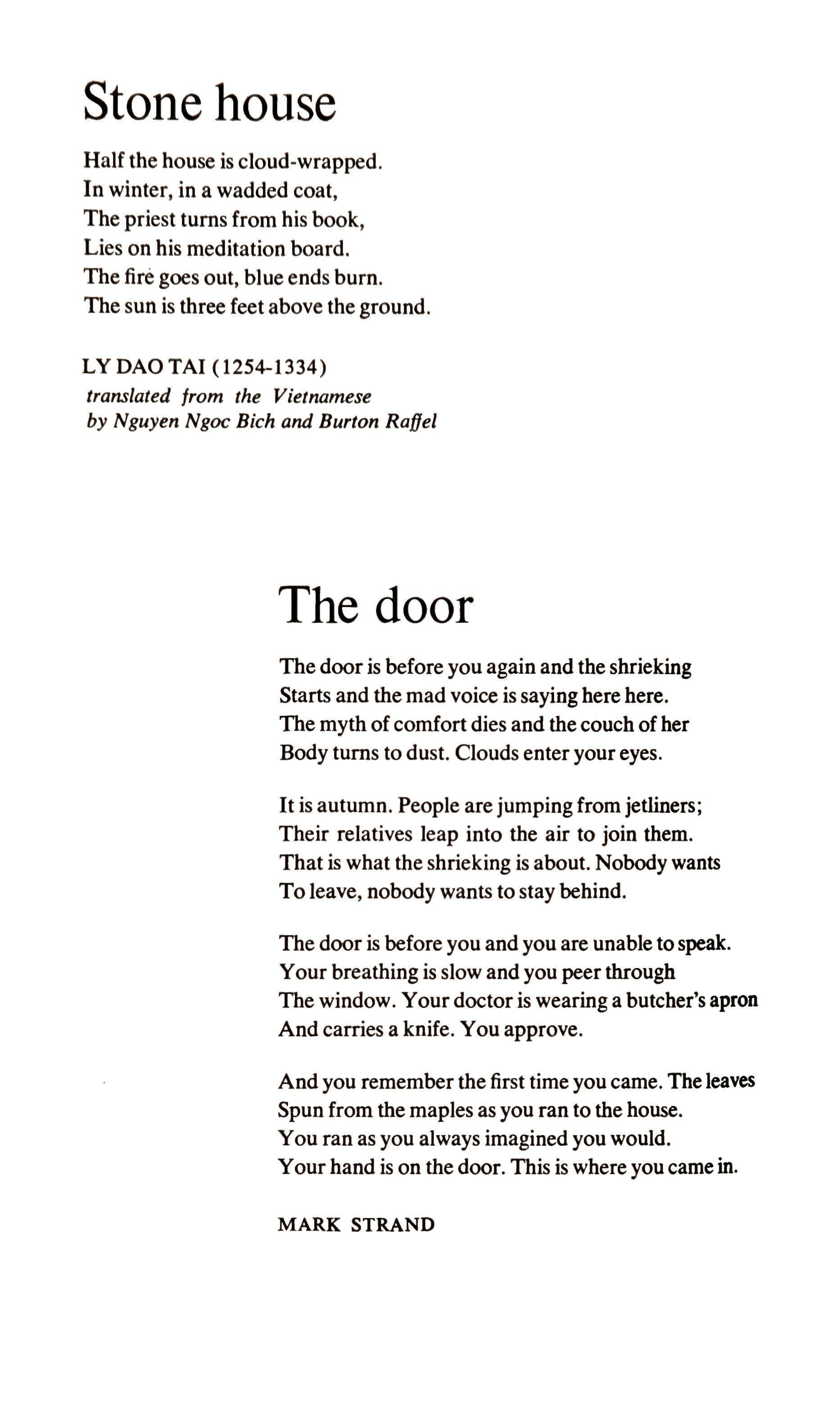
oor
The door is before you again and the shrieking Starts and the mad voice is saying here here. The myth ofcomfort dies and the couch of her Body turns to dust. Clouds enter your eyes.
It is autumn. People are jumping from jetliners; Their relatives leap into the air to join them. That is what the shrieking is about. Nobody wants To leave, nobody wants to stay behind.
The door is before you and you are unable to s Your breathing is slow and you peer through The window. Your doctor is wearing a butcher's apron And call ies a knife. You approve.
And you remember the first time you callIe. The leaves Spun from the maples as you ran to the house. You ran as you always imagined you would. Your hand is on the door. This is where you came in.
MARK STRAND









































 W. D. SNODGRASS
W. D. SNODGRASS












































































































































































































 lor R�, &. Naomi Pollack
lor R�, &. Naomi Pollack











